|
Newsletter
Seminar Material
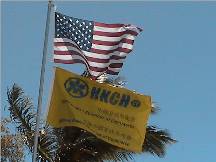



Biz:
China
Hong
Kong Hawaii


What people
said about us

China
Earthquake Relief
Tax &
Government
Hawaii Voter Registration
 Biz-Video
Biz-Video
 Hawaii's
China Connection Hawaii's
China Connection

 CDP#1780962
CDP#1780962

 Doing Business in
Hong Kong & China
Doing Business in
Hong Kong & China
| |
Hong Kong, China & Hawaii Biz*




Do you know our dues
paying members attend events sponsored by our collaboration partners worldwide
at their membership rates - go to our event page to find out more!
After
attended a China/Hong Kong Business/Trade Seminar in Hawaii...still unsure what
to do next, contact us, our Officers, Directors and Founding Members are
actively engaged in China/Hong Kong/Asia trade - we can help!
Are you ready to export your product or
service? You will find out in 3 minutes with resources to help you -
enter
to give it a try

 China Central TV - live webcast
China Central TV - live webcast
 Skype - FREE
Voice Over IP Skype - FREE
Voice Over IP
 View Hawaii's China Connection
Video Trailer
View Hawaii's China Connection
Video Trailer

 Direct link
PDF file
Direct link
PDF file

 Year of the Pig - February 18, 2007
Year of the Pig - February 18, 2007
May 31, 2007
 Hong Kong:
Green Futures (Hong Kong) Limited, a leading Chinese mainland-based financial
group Tuesday announced that it becomes the first mainland futures starting
business in Hong Kong after receiving permission from Hong Kong Securities and
Futures Commission. Analysts believe, Green Futures, the first out of 180
futures companies in the Chinese mainland, with its expanding business to Hong
Kong is the fruit of the recently expanded Closer Economic Partnership
Arrangement III (CEPA III), the provisions of the free trade between Hong Kong
and Chinese Mainland, which allow for Chinese mainland securities and futures
companies to run businesses in Hong Kong. Wang Shuan-hong, Chairman and
President of the Green Group, believe its establishment in Hong Kong will
provide a strong platform for the group to speed up alignment with international
markets. While the Director-General of Investment Promotion at Invest Hong Kong,
Mike Rowse, echoed that Hong Kong, aiming at strengthening its role of financial
center of the region, wants to offer a highly mature financial market for
qualifying mainland companies to develop closer ties with their Hong Kong and
overseas counterparts and clients. Hong Kong:
Green Futures (Hong Kong) Limited, a leading Chinese mainland-based financial
group Tuesday announced that it becomes the first mainland futures starting
business in Hong Kong after receiving permission from Hong Kong Securities and
Futures Commission. Analysts believe, Green Futures, the first out of 180
futures companies in the Chinese mainland, with its expanding business to Hong
Kong is the fruit of the recently expanded Closer Economic Partnership
Arrangement III (CEPA III), the provisions of the free trade between Hong Kong
and Chinese Mainland, which allow for Chinese mainland securities and futures
companies to run businesses in Hong Kong. Wang Shuan-hong, Chairman and
President of the Green Group, believe its establishment in Hong Kong will
provide a strong platform for the group to speed up alignment with international
markets. While the Director-General of Investment Promotion at Invest Hong Kong,
Mike Rowse, echoed that Hong Kong, aiming at strengthening its role of financial
center of the region, wants to offer a highly mature financial market for
qualifying mainland companies to develop closer ties with their Hong Kong and
overseas counterparts and clients.
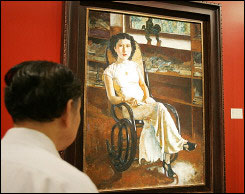 A prospective buyer views an oil on
canvas painting by Chinese artist Xu Beihong entitled "Portrait of a Lady". Two
contemporary Chinese works of art sold Sunday for record prices at auction in
Hong Kong, underlining a growing demand for modern Asian art. An abstract
painting by Zhao Wuji entitled "14.12.59" set a record for the artist when it
went under the hammer for 29.44 million Hong Kong dollars (3.78 million US
dollars). And two hulking brass sculptures called "Taiji Series -- Big Sparring"
by Ju Ming also set a record for the artist at 14.89 million dollars. The two
items were among hundreds of lots worth more than a billion dollars that are
going under the hammer at the Christie's Spring sale of Asian art over the next
four days. Although the identity of the buyers was not revealed, Eric Chang,
senior vice-president of 20th century Chinese art at Christie's, said all buyers
were Asia-based. Among other big sellers was the elegant "Portrait of a Lady" by
Xu Beihong, the current darling of the Asian art world, which fetched nearly 30
million dollars with fees taken into account. Xu's "Put Down That Whip" sold
earlier this year for 72 million dollars -- the highest price commanded for a
Chinese painting at auction. Also on Sunday, the stark "Scenery of Northern
China" by Wu Guangzhong sold for 31.68 million dollars. Christie's and its rival
Sotheby's have been holding twice-yearly sales in Hong Kong since the mid-1990s
as growing wealth in China has fuelled a bonanza in the Asian art market. Some
art historians have criticized the recent explosion in the prices for Asian art,
which 10 years ago was struggling to attract any interest, and have criticized
over-exuberant first-time buyers for sending prices sky-high.
A prospective buyer views an oil on
canvas painting by Chinese artist Xu Beihong entitled "Portrait of a Lady". Two
contemporary Chinese works of art sold Sunday for record prices at auction in
Hong Kong, underlining a growing demand for modern Asian art. An abstract
painting by Zhao Wuji entitled "14.12.59" set a record for the artist when it
went under the hammer for 29.44 million Hong Kong dollars (3.78 million US
dollars). And two hulking brass sculptures called "Taiji Series -- Big Sparring"
by Ju Ming also set a record for the artist at 14.89 million dollars. The two
items were among hundreds of lots worth more than a billion dollars that are
going under the hammer at the Christie's Spring sale of Asian art over the next
four days. Although the identity of the buyers was not revealed, Eric Chang,
senior vice-president of 20th century Chinese art at Christie's, said all buyers
were Asia-based. Among other big sellers was the elegant "Portrait of a Lady" by
Xu Beihong, the current darling of the Asian art world, which fetched nearly 30
million dollars with fees taken into account. Xu's "Put Down That Whip" sold
earlier this year for 72 million dollars -- the highest price commanded for a
Chinese painting at auction. Also on Sunday, the stark "Scenery of Northern
China" by Wu Guangzhong sold for 31.68 million dollars. Christie's and its rival
Sotheby's have been holding twice-yearly sales in Hong Kong since the mid-1990s
as growing wealth in China has fuelled a bonanza in the Asian art market. Some
art historians have criticized the recent explosion in the prices for Asian art,
which 10 years ago was struggling to attract any interest, and have criticized
over-exuberant first-time buyers for sending prices sky-high.
Two plots of land went under the
hammer in Hong Kong on Tuesday, fetching a total of HK$1.74 billion (US$223
million), at the lower end of analysts expectations.
 Riyo Mori, Miss Japan 2007, right, reacts as she wins the Miss Universe 2007
title in Mexico City, early on Tuesday (HK time) as Zuleyka Rivera, Miss
Universe 2006, looks on.
Riyo Mori, Miss Japan 2007, right, reacts as she wins the Miss Universe 2007
title in Mexico City, early on Tuesday (HK time) as Zuleyka Rivera, Miss
Universe 2006, looks on.
The tax on wine should be cut
further, to less than 20 per cent, to help make Hong Kong an international
wine-selling hub, Liberal Party chairman James Tien Pei-chun said yesterday.
China was on course to catch up with
the United States and join the front ranks of world economic powers but that was
little cause for concern, even among Americans, according to a global survey
released on Monday. But the same poll showed there was generally as much
distrust of the United States as there was of China to "act responsibly" in
world affairs. Most respondents in 13 countries agreed it was "likely that
someday China's economy will grow to be as large as the US economy", according
to the opinion poll by the Chicago Council on Global Affairs and
WorldPublicOpinion.org. "What is particularly striking is that despite the
tectonic significance of China catching up with the US, overall the world
public's response is low key - almost philosophical," said Steven Kull, editor
of WorldPublicOpinion.org. In no country was there a majority who felt that
China's economic rise would be mostly negative, but that was not because China
was particularly trusted, the pollsters said. Majorities in 10 out of 15
countries said they did not trust China "to act responsibly in the world". But
the same number also said they distrusted the US. "Though people are not
threatened by the rise of China, they do not appear to be assuming that it will
be a new benign world leader," Mr Kull said. "They seem to have a clear-eyed
view that China is largely acting on its own interests." The Chinese themselves
are among the more sceptical populations, with only half saying that their
economy will catch up with that of the US. Among Americans, the percentage was
60 per cent. Only in India and the Philippines did a plurality of respondents
say the US would always remain a bigger economy than China. The highest level of
concern about the implications of China's economic march was in the US, where
one in three is worried. But 54 per cent of Americans said that its rise would
be "neither positive nor negative" while one in 10 said it would be mostly
positive. Only in Iran did a majority - 60 per cent - say that it would be
"mostly positive for China to catch up". "Their favourable outlook may stem in
part from heavy Chinese investment in Iranian oil as well as Iranian desires to
have a counterweight to American power," the pollsters said. The survey included
18 countries: Australia, Argentina, Armenia, China, France, India, Iran, Israel,
Mexico, Peru, the Philippines, Poland, Russia, South Korea, Thailand, Ukraine,
and the US, plus the Palestinian territories. Not every question of the poll was
asked in each country, so that the results for some questions covered less than
18 countries.
 China: China
has allowed its currency, the yuan, to appreciate by more than 7.5 percent
against the U.S. dollar since it scrapped the yuan-dollar peg in July 2005, said
the country's central bank.
China: China
has allowed its currency, the yuan, to appreciate by more than 7.5 percent
against the U.S. dollar since it scrapped the yuan-dollar peg in July 2005, said
the country's central bank.
Visiting Chinese Commerce Minister Bo Xilai in Ottawa
Monday held talks with Canada's International Trade Minister David Emerson on
ways to boost bilateral trade.
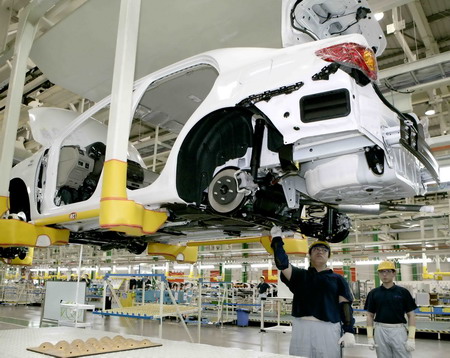 Tianjin FAW
Toyota Motor Co., LTD. holds the unveiling ceremony for its third plant and
Corolla at Tianjin Economic and Technological Development Zone on Monday. The
plant occupies 400,000 square meters, with an annual output capacity of 200,000
popular sedans. Tianjin FAW
Toyota Motor Co., LTD. holds the unveiling ceremony for its third plant and
Corolla at Tianjin Economic and Technological Development Zone on Monday. The
plant occupies 400,000 square meters, with an annual output capacity of 200,000
popular sedans.
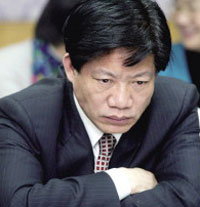 Zheng Xiaoyu,
former director of China's State Food and Drug Administration (SFDA), was
sentenced to death by a Beijing court Tuesday morning. Zheng, 63, was convicted
of taking bribes and dereliction of duty, according to the first instance
hearing of the Beijing Municipal No. 1 Intermediate People's Court. He received
the death penalty on the graft charge and 7 years in imprisonment for the charge
of dereliction of duty. All Zheng's personal property was confiscated and he was
deprived of his political rights for life. The death sentence was appropriate,
according to the court, given the "huge bribes involved and the great damage
inflicted on the country and the public by Zheng's dereliction of duty". The
bribes taken by Zheng, including cash and gifts, were worth more than 6.49
million yuan (about 850,000 U.S. dollars), according to the court. The bribes
were given either directly or through his wife and son. The court said Zheng
"sought benefits" for eight pharmaceutical companies by approving their drugs
and medical devices during his tenure as China's chief drug and food official
from June 1997 to December 2006. "(Zheng's acts) greatly undermined the
uprightness of an official post and the efficiency of China's drug monitoring
and supervision, endangered public life and health and had a very negative
social impact," the court said. Zheng violated reporting rules and
decision-making processes when approving medicines from 2001 to 2003. He failed
to make careful arrangements for the supervision of medicine production, which
is of critical importance to people's lives, said the court. The consequences of
Zheng's dereliction of duty have proved extremely serious. Six types of medicine
approved by the administration during that period were fake medicines. Some
pharmaceutical companies used false documents to apply for approvals, the court
said. It is not yet known whether Zheng will appeal. Zheng Xiaoyu,
former director of China's State Food and Drug Administration (SFDA), was
sentenced to death by a Beijing court Tuesday morning. Zheng, 63, was convicted
of taking bribes and dereliction of duty, according to the first instance
hearing of the Beijing Municipal No. 1 Intermediate People's Court. He received
the death penalty on the graft charge and 7 years in imprisonment for the charge
of dereliction of duty. All Zheng's personal property was confiscated and he was
deprived of his political rights for life. The death sentence was appropriate,
according to the court, given the "huge bribes involved and the great damage
inflicted on the country and the public by Zheng's dereliction of duty". The
bribes taken by Zheng, including cash and gifts, were worth more than 6.49
million yuan (about 850,000 U.S. dollars), according to the court. The bribes
were given either directly or through his wife and son. The court said Zheng
"sought benefits" for eight pharmaceutical companies by approving their drugs
and medical devices during his tenure as China's chief drug and food official
from June 1997 to December 2006. "(Zheng's acts) greatly undermined the
uprightness of an official post and the efficiency of China's drug monitoring
and supervision, endangered public life and health and had a very negative
social impact," the court said. Zheng violated reporting rules and
decision-making processes when approving medicines from 2001 to 2003. He failed
to make careful arrangements for the supervision of medicine production, which
is of critical importance to people's lives, said the court. The consequences of
Zheng's dereliction of duty have proved extremely serious. Six types of medicine
approved by the administration during that period were fake medicines. Some
pharmaceutical companies used false documents to apply for approvals, the court
said. It is not yet known whether Zheng will appeal.
China will release the country's first regulation on food
recall by the end of this year as part of efforts to improve food safety, a
senior official has said. The move by the General Administration of Quality
Supervision, Inspection and Quarantine comes in response to a recent spate of
food safety scandals. Wu Jianping, director general of the food production and
supervision department of the administration, told China Daily that the recall
system mainly targets potentially dangerous and unapproved food products. The
regulation - whose final draft will be ready by the end of the year and will be
in line with international practices - stipulates that food production and sales
companies should take back their products which are confirmed to endanger
people's health, Wu said. "All domestic and foreign food producers and
distributors will be obliged to follow the system," he said. Till now, only one
section in a regulation on product inspection - issued in 2002 - touches upon
food recall and the need for such a system. Among major food recall cases are
enterobacter sakazakii-affected Wyeth milk powder in 2002 and Sudan-red related
products in 2005. "Implementing the recall system for all food products will be
a gradual process," Wu emphasized. Despite tainted-food scandals in recent
years, the official said the quality of food products in China has been on the
rise, especially after the country set standards for food-related products in
2002. To date, more than 525 kinds of food products in 28 categories, and more
than 80,000 food enterprises have acquired market access permits. This year,
another seven categories, such as food utensils, additives, detergents and
disinfectants, will be required to get market permits. In a related development,
the State Food and Drug Administration (SFDA) plans to blacklist food producers
which break rules; and serious violators could be barred from the market. The
SFDA yesterday launched a nationwide campaign on drug safety inspection. From
May 28 to June 8, a total of 90 officials will be sent to 15 provinces.
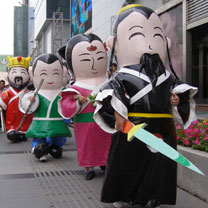 Residents
dressed as cartoon characters parade during the opening of the Jinlv traditional
cultural festival in Suzhou, East China's Jiangsu Province May 29, 2007. Residents
dressed as cartoon characters parade during the opening of the Jinlv traditional
cultural festival in Suzhou, East China's Jiangsu Province May 29, 2007.
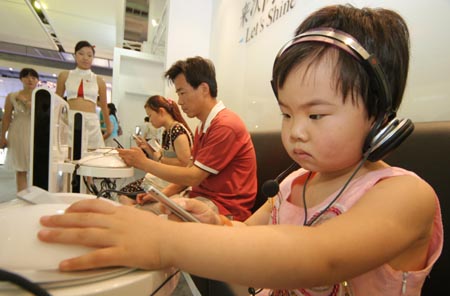 A girl is listening to cell phone music in Beijing
International High-tech Expo May 27, 2007. Up to the end of April, the country's
cell phone penetration ratio has hit 35.3%, according to the latest statistics
from the Ministry of Information Industry. The number of China's cell phone
users amounted to 480.43 million by the end of April, increasing 26.35 million
from the end of last year. About 182.6 billion short messages were sent in April
with a 38.1 percent growth year-on-year.
A girl is listening to cell phone music in Beijing
International High-tech Expo May 27, 2007. Up to the end of April, the country's
cell phone penetration ratio has hit 35.3%, according to the latest statistics
from the Ministry of Information Industry. The number of China's cell phone
users amounted to 480.43 million by the end of April, increasing 26.35 million
from the end of last year. About 182.6 billion short messages were sent in April
with a 38.1 percent growth year-on-year.
Hitachi is to build a new elevator factory in Shanghai
with an annual output capacity of 10,000 units, according to company sources.
Hitachi, which already has elevator factories in Guangzhou and Tianjin, expects
the completion of the Shanghai facility in January. It involves a registered
capital of 40 million U.S. dollars and covers a 185,000-square-meter site.
Completion of the facility will boost Hitachi's annual elevator production
capacity in China to 35,000 units, the company said. China's elevator market saw
an annual growth rate of 25 percent since 2000. The country became the largest
elevator market, buying more than 150,000 units in 2006, sources said. The
upcoming Beijing Olympic Games, Shanghai's World Expo and Guangzhou's Asia Games
were bound to expand the market, analysts said.
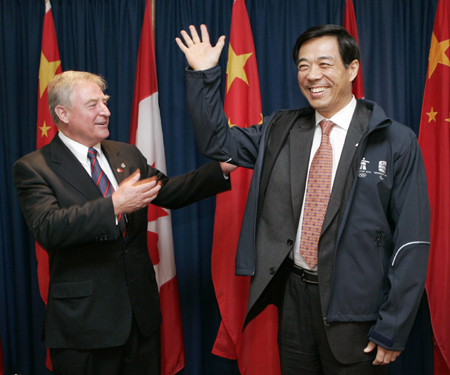 China's Commerce Minister Bo Xilai (R) reacts
after being presented with a 2010 Vancouver Olympic Winter Games jacket by
Canada's International Trade Minister David Emerson before the start of a
meeting in Ottawa May 28, 2007.
China's Commerce Minister Bo Xilai (R) reacts
after being presented with a 2010 Vancouver Olympic Winter Games jacket by
Canada's International Trade Minister David Emerson before the start of a
meeting in Ottawa May 28, 2007.
May 30, 2007
 Hong Kong:
The Hong Kong Monetary Authority, the city's de-facto central bank, warned
Monday that excessive liquidity in the mainland has led to soaring property
prices and feverish activity in the stock market. Such signs, it said, could
affect the local equity market as there is "a higher degree of volatile
transmission" from the frenzied Chinese stocks. "The February fall is an example
of contagion via market sentiment changes," the HKMA said in its briefing notes
to the Legislative Council Panel on Financial Affairs, which meets June 4. The
Hang Seng Index fell 1,157.72 points in the last four trading days of February
as the plunge in Chinese stock markets triggered a massive selloff globally. The
mainland bourses recorded the sharpest drop in a decade February 27, tumbling
8.84 percent when investors were worried Beijing would cool down the stock
market. HKMA chief executive Joseph Yam Chi-kwong said a decline of domestic
demand in the mainland could reduce exports to China as well as outbound tourist
traffic. "The local equity market will be resilient to mainland shocks, although
investor sentiment could be affected through the financial market channel," the
briefing notes said. "The impact of [yuan] appreciation on inflation is likely
to be modest." Analysts have said a rising Chinese currency could bring more
consumers from the mainland into Hong Kong as the local dollar remains weak,
partly because of a potential carry trade using the unit by currency traders.
Yam said Hong Kong's economy remains sound as the environment is largely
favorable for businesses. He attributed his optimism to "robust growth,
declining unemployment, a benign inflation outlook, renewed fiscal strength and
normal behavior of property and stock markets." He had suggested in February
that Beijing's tightening measures may lead to "consequences beyond
imagination." Its recent measures to raise interest rates, widen the currency
trading band and increase the reserve requirement ratio for domestic banks have
all failed to deter investors. Yam also said there are concerns in the US
economy that could affect the macroeconomic environment. "A sudden and sharp
depreciation of the US dollar, the disoderly unwinding of global imbalances and
a spillover of US housing market weakness are external risks to the currency
stability in Hong Kong," Yam said. "Financial instability and volatile capital
flows are induced by an increased risk aversion of market participants and
higher market volatility and the destabilizing activities of hedge funds." He
said the HKMA's foreign exchange reserves have already been aggressive enough as
it has a 23 percent composition of stocks in its portfolio. Hong Kong:
The Hong Kong Monetary Authority, the city's de-facto central bank, warned
Monday that excessive liquidity in the mainland has led to soaring property
prices and feverish activity in the stock market. Such signs, it said, could
affect the local equity market as there is "a higher degree of volatile
transmission" from the frenzied Chinese stocks. "The February fall is an example
of contagion via market sentiment changes," the HKMA said in its briefing notes
to the Legislative Council Panel on Financial Affairs, which meets June 4. The
Hang Seng Index fell 1,157.72 points in the last four trading days of February
as the plunge in Chinese stock markets triggered a massive selloff globally. The
mainland bourses recorded the sharpest drop in a decade February 27, tumbling
8.84 percent when investors were worried Beijing would cool down the stock
market. HKMA chief executive Joseph Yam Chi-kwong said a decline of domestic
demand in the mainland could reduce exports to China as well as outbound tourist
traffic. "The local equity market will be resilient to mainland shocks, although
investor sentiment could be affected through the financial market channel," the
briefing notes said. "The impact of [yuan] appreciation on inflation is likely
to be modest." Analysts have said a rising Chinese currency could bring more
consumers from the mainland into Hong Kong as the local dollar remains weak,
partly because of a potential carry trade using the unit by currency traders.
Yam said Hong Kong's economy remains sound as the environment is largely
favorable for businesses. He attributed his optimism to "robust growth,
declining unemployment, a benign inflation outlook, renewed fiscal strength and
normal behavior of property and stock markets." He had suggested in February
that Beijing's tightening measures may lead to "consequences beyond
imagination." Its recent measures to raise interest rates, widen the currency
trading band and increase the reserve requirement ratio for domestic banks have
all failed to deter investors. Yam also said there are concerns in the US
economy that could affect the macroeconomic environment. "A sudden and sharp
depreciation of the US dollar, the disoderly unwinding of global imbalances and
a spillover of US housing market weakness are external risks to the currency
stability in Hong Kong," Yam said. "Financial instability and volatile capital
flows are induced by an increased risk aversion of market participants and
higher market volatility and the destabilizing activities of hedge funds." He
said the HKMA's foreign exchange reserves have already been aggressive enough as
it has a 23 percent composition of stocks in its portfolio.
 David Eldon,
former chairman of the influential Hong Kong General Chamber of Commerce,
published an article in the chamber newsletter urging the government to further
simplify its immigration procedures for foreign employees of local businesses.
His view is a reflection of the strong demand for foreign talent by local
businesses. It is part of coping with economic restructuring to meet rising
competition from various mainland cities, particularly Shanghai. Many business
leaders in Hong Kong are beginning to realize that the biggest talent pool
waiting to be tapped lies on the mainland. This was not obvious in the past.
Mainland business executives and professionals were seen by many Hong Kong
business people as unsuitable for a fast changing and highly competitive
business environment which rewards only those with initiative and daring. But
this bias against mainland managers is fast melting away. Rapid economic
development and the opening of the mainland market have produced a new crop of
mainland managers and professionals. They have shown that they can be as
adaptable to a competitive environment as their Hong Kong counterparts. This
change is anything but subtle. In our office in Shanghai, I have the pleasure of
watching the transformation of a few young and timid interns, fresh out of
college, into hard-charging, inquisitive and thoughtful reporters full of
self-confidence. All they needed was a bit of guidance, encouragement and, more
importantly, a keen sense of competitiveness not only with reporters on the
rival papers but also with their colleagues in other bureaus. My personal
judgment was confirmed when I had dinner with a senior expatriate editor in
Beijing the other evening. He asked me about a reporter in the Shanghai bureau
whom he thought was particularly outstanding on her beat. He was hugely
surprised when I told him that this reporter joined us about six months ago and
had never worked at any foreign media as he had assumed. She is simply more
combative than others. To survive in a work environment where rewards are
closely tied to individual performance, most young Hong Kong executives learn
the lesson of competitiveness early on. Such a lesson has taught them to be
efficient, adaptive and innovative, the common traits widely attributed to Hong
Kong people. There is, of course, a less flattering side to the stereotype. Hong
Kongers, who are also characterized as needlessly aggressive, inconsiderate to
the point of rudeness, uncaring and impatient. But on balance, most Hong Kong
people feel pretty comfortable about how they are seen by outsiders. Based on my
experience in working with young reporters on the mainland, I believe that most
young mainland executives will have no problem picking up the lesson on
competitiveness very quickly if they have a chance to work in Hong Kong. This
would be an excellent opportunity for them to gain the exposure to a free
international marketplace that is so close to home. It appears that a growing
number of Hong Kong business owners are keen on recruiting talent from the
mainland. To satisfy their needs, it may make sense for the Chamber of Commerce,
one of Hong Kong's more powerful business groups, to take the initiative of
setting up recruitment offices in Beijing, Shanghai and some other major cities
to publicize employment opportunities in Hong Kong and to build a data base of
qualified talent willing to work in Hong Kong. David Eldon,
former chairman of the influential Hong Kong General Chamber of Commerce,
published an article in the chamber newsletter urging the government to further
simplify its immigration procedures for foreign employees of local businesses.
His view is a reflection of the strong demand for foreign talent by local
businesses. It is part of coping with economic restructuring to meet rising
competition from various mainland cities, particularly Shanghai. Many business
leaders in Hong Kong are beginning to realize that the biggest talent pool
waiting to be tapped lies on the mainland. This was not obvious in the past.
Mainland business executives and professionals were seen by many Hong Kong
business people as unsuitable for a fast changing and highly competitive
business environment which rewards only those with initiative and daring. But
this bias against mainland managers is fast melting away. Rapid economic
development and the opening of the mainland market have produced a new crop of
mainland managers and professionals. They have shown that they can be as
adaptable to a competitive environment as their Hong Kong counterparts. This
change is anything but subtle. In our office in Shanghai, I have the pleasure of
watching the transformation of a few young and timid interns, fresh out of
college, into hard-charging, inquisitive and thoughtful reporters full of
self-confidence. All they needed was a bit of guidance, encouragement and, more
importantly, a keen sense of competitiveness not only with reporters on the
rival papers but also with their colleagues in other bureaus. My personal
judgment was confirmed when I had dinner with a senior expatriate editor in
Beijing the other evening. He asked me about a reporter in the Shanghai bureau
whom he thought was particularly outstanding on her beat. He was hugely
surprised when I told him that this reporter joined us about six months ago and
had never worked at any foreign media as he had assumed. She is simply more
combative than others. To survive in a work environment where rewards are
closely tied to individual performance, most young Hong Kong executives learn
the lesson of competitiveness early on. Such a lesson has taught them to be
efficient, adaptive and innovative, the common traits widely attributed to Hong
Kong people. There is, of course, a less flattering side to the stereotype. Hong
Kongers, who are also characterized as needlessly aggressive, inconsiderate to
the point of rudeness, uncaring and impatient. But on balance, most Hong Kong
people feel pretty comfortable about how they are seen by outsiders. Based on my
experience in working with young reporters on the mainland, I believe that most
young mainland executives will have no problem picking up the lesson on
competitiveness very quickly if they have a chance to work in Hong Kong. This
would be an excellent opportunity for them to gain the exposure to a free
international marketplace that is so close to home. It appears that a growing
number of Hong Kong business owners are keen on recruiting talent from the
mainland. To satisfy their needs, it may make sense for the Chamber of Commerce,
one of Hong Kong's more powerful business groups, to take the initiative of
setting up recruitment offices in Beijing, Shanghai and some other major cities
to publicize employment opportunities in Hong Kong and to build a data base of
qualified talent willing to work in Hong Kong.
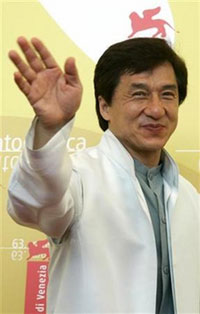 Cast member Jackie Chan attends a photocall to introduce
his film 'Rob-B-Hood' at the Venice Film Festival September 8, 2006. Jackie
Chan's production company has sold the remake rights for the action-comedy
"Enter the Phoenix" to a producer of "The Bourne Ultimatum." The 2004
Cantonese-language original was directed and co-written by its star, Stephen
Fung. The plot centers on the gay son of a boss whose dying wish is that he take
over the family business. Chan was one of the producers. Hollywood remakes of
Asian films are hot, with such properties as "The Grudge" and "The Ring"
storming the box office. Earlier this year "The Departed," Martin Scorsese's
remake of Hong Kong box office winner "Infernal Affairs," won four Oscars,
including best picture and director. Andrew Tennenbaum will produce the remake,
according to a statement from his L.A.-based Flashpoint Entertainment. "This is
my first Asian film remake and I couldn't be more excited," said Tennenbaum, who
also helped make "The Bourne Supremacy." He said he was meeting with writers and
directors to create the adaptation.
Cast member Jackie Chan attends a photocall to introduce
his film 'Rob-B-Hood' at the Venice Film Festival September 8, 2006. Jackie
Chan's production company has sold the remake rights for the action-comedy
"Enter the Phoenix" to a producer of "The Bourne Ultimatum." The 2004
Cantonese-language original was directed and co-written by its star, Stephen
Fung. The plot centers on the gay son of a boss whose dying wish is that he take
over the family business. Chan was one of the producers. Hollywood remakes of
Asian films are hot, with such properties as "The Grudge" and "The Ring"
storming the box office. Earlier this year "The Departed," Martin Scorsese's
remake of Hong Kong box office winner "Infernal Affairs," won four Oscars,
including best picture and director. Andrew Tennenbaum will produce the remake,
according to a statement from his L.A.-based Flashpoint Entertainment. "This is
my first Asian film remake and I couldn't be more excited," said Tennenbaum, who
also helped make "The Bourne Supremacy." He said he was meeting with writers and
directors to create the adaptation.
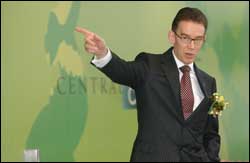 Nicholas
Sallnow-Smith, chairman of the controversy-laden Link REIT (0823), has accepted
a job as regional chief executive for northeast Asia at Standard Chartered
(2888) - less than two months after he took over the politically charged helm at
the real estate investment trust. He will assume his new position at Standard
Chartered July 1, the lender announced Monday. While Sallnow-Smith plans to hold
down both posts, market watchers are dubious. "It may send signals that he may
not see his employment with The Link as a long-term relationship," said Phillip
Securities director Louis Wong Wai-kit. "Already, for The Link, the reshuffle at
the senior level has undermined confidence in the investor community." Fulbright
Securities general manager Francis Leung Sheung-nim said: "He wants to work for
a bigger company. Basically, he's getting the best of both worlds." His
independent, non-executive role at The Link has drawn fire from lawmakers and
public housing residents. "I think it's quite hard to take up two important
jobs," said Tung Tai Securities director Kenny Tang Sing-hing. "I think
eventually he may need to give up one job, maybe The Link." Sallnow-Smith became
chairman at Link REIT April 1 after Paul Cheng Ming-fun resigned for personal
reasons. It was then expected that Sallnow- Smith's extensive experience as
chairman of Hongkong Land could help improve returns at The Link. "Apparently,
people will be very disappointed," said Lun. "They placed their faith in the
wrong person." Three senior executives have left Link REIT since the beginning
of the year amid repeated demands from the largest shareholder, British hedge
fund The Children's Fund Investment Management, for significant rent increases.
Sallnow-Smith, whose Standard Chartered position will be based in Hong Kong,
will oversee governance, strategy and financial performance in northeast Asia
for the emerging- markets lender. Nicholas
Sallnow-Smith, chairman of the controversy-laden Link REIT (0823), has accepted
a job as regional chief executive for northeast Asia at Standard Chartered
(2888) - less than two months after he took over the politically charged helm at
the real estate investment trust. He will assume his new position at Standard
Chartered July 1, the lender announced Monday. While Sallnow-Smith plans to hold
down both posts, market watchers are dubious. "It may send signals that he may
not see his employment with The Link as a long-term relationship," said Phillip
Securities director Louis Wong Wai-kit. "Already, for The Link, the reshuffle at
the senior level has undermined confidence in the investor community." Fulbright
Securities general manager Francis Leung Sheung-nim said: "He wants to work for
a bigger company. Basically, he's getting the best of both worlds." His
independent, non-executive role at The Link has drawn fire from lawmakers and
public housing residents. "I think it's quite hard to take up two important
jobs," said Tung Tai Securities director Kenny Tang Sing-hing. "I think
eventually he may need to give up one job, maybe The Link." Sallnow-Smith became
chairman at Link REIT April 1 after Paul Cheng Ming-fun resigned for personal
reasons. It was then expected that Sallnow- Smith's extensive experience as
chairman of Hongkong Land could help improve returns at The Link. "Apparently,
people will be very disappointed," said Lun. "They placed their faith in the
wrong person." Three senior executives have left Link REIT since the beginning
of the year amid repeated demands from the largest shareholder, British hedge
fund The Children's Fund Investment Management, for significant rent increases.
Sallnow-Smith, whose Standard Chartered position will be based in Hong Kong,
will oversee governance, strategy and financial performance in northeast Asia
for the emerging- markets lender.
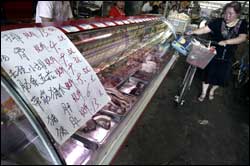 Spiraling pork prices in the mainland have fanned prices of food and
agricultural products as well as shares of companies listed in Hong Kong with no
direct link to the sector. Shares of China Yurun Food (1068), the mainland pork
distributor and meat processor that is also a wholesale supplier to Hong Kong,
hit a high of HK$9.52 Wednesday. They eased 0.85 percent to close at HK$9.37
Monday. However, edible oil trader Aptus Holdings (8212) and edible oil refiner
Hop Hing Holdings (0047) started the week with surges of about 30 percent.
Shares of CP Pokphand (0043), which mainly trades agricultural products as well
as operate feedmills and poultry farms, also drove up 17.11 percent to close at
HK$0.445. Analysts said investors believe pork prices will continue to rise for
at least six to nine months and that the increases will spill over into other
food categories, causing speculative buying. According to Ministry of Commerce
data, wholesale pork prices in 36 major cities jumped 43.1 percent in the first
three weeks of this month from a year earlier, or 17 percent up from March.
"Pork accounted for about 5-6 percent of the mainland CPI basket in the past
but, with the price gains, it now makes up more than 20 percent," Chen Xindong,
senior economist at BNP Paribas Securities, told The Standard. With the surge in
pork prices, economists said, inflation in the coming months will surpass the 3
percent target set by Premier Wen Jiabao in March. The price increases came as
Beijing was having initial success in inflation, with the consumer price index
dipping to 3 percent last month following a 3.3 percent increase in March over a
year earlier.
Spiraling pork prices in the mainland have fanned prices of food and
agricultural products as well as shares of companies listed in Hong Kong with no
direct link to the sector. Shares of China Yurun Food (1068), the mainland pork
distributor and meat processor that is also a wholesale supplier to Hong Kong,
hit a high of HK$9.52 Wednesday. They eased 0.85 percent to close at HK$9.37
Monday. However, edible oil trader Aptus Holdings (8212) and edible oil refiner
Hop Hing Holdings (0047) started the week with surges of about 30 percent.
Shares of CP Pokphand (0043), which mainly trades agricultural products as well
as operate feedmills and poultry farms, also drove up 17.11 percent to close at
HK$0.445. Analysts said investors believe pork prices will continue to rise for
at least six to nine months and that the increases will spill over into other
food categories, causing speculative buying. According to Ministry of Commerce
data, wholesale pork prices in 36 major cities jumped 43.1 percent in the first
three weeks of this month from a year earlier, or 17 percent up from March.
"Pork accounted for about 5-6 percent of the mainland CPI basket in the past
but, with the price gains, it now makes up more than 20 percent," Chen Xindong,
senior economist at BNP Paribas Securities, told The Standard. With the surge in
pork prices, economists said, inflation in the coming months will surpass the 3
percent target set by Premier Wen Jiabao in March. The price increases came as
Beijing was having initial success in inflation, with the consumer price index
dipping to 3 percent last month following a 3.3 percent increase in March over a
year earlier.
Local
companies sending spam e-mails have been warned of the stiff penalties when the
anti-spam law comes into effect Friday, but the telecoms watchdog says it may be
difficult to deal with overseas firms involved in the practice.
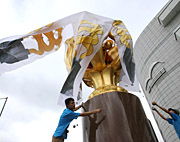 Greenpeace activists turn the Golden
Bauhinia into a symbolic energy-efficient light bulb to demand stronger action
on climate change. The three-day International Conference on Climate Change has
brought hundreds of representatives from 26 nations to Hong Kong. Greenpeace activists turn the Golden
Bauhinia into a symbolic energy-efficient light bulb to demand stronger action
on climate change. The three-day International Conference on Climate Change has
brought hundreds of representatives from 26 nations to Hong Kong.
Hong Kong has been urged by a
leading international environmental scientist to set its own target for reducing
greenhouse gas emissions, even though Beijing has yet to set any national
targets.
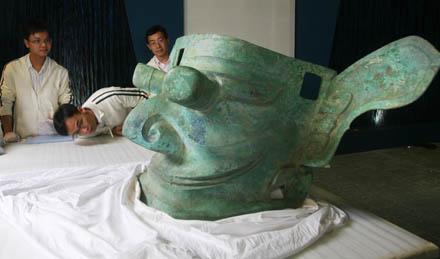 Hong Kong Heritage Museum staff check the
mounting of Bronze Mask with Protruding Pupils, which will be on display at the
museum from June 6. The piece, dated 1200 BC, is among 120 treasures on display
from the Sanxingdui Museum, Chengdu Museum and Sichuan Provincial Institute of
Archaeology, all in Sichuan. Hong Kong Heritage Museum staff check the
mounting of Bronze Mask with Protruding Pupils, which will be on display at the
museum from June 6. The piece, dated 1200 BC, is among 120 treasures on display
from the Sanxingdui Museum, Chengdu Museum and Sichuan Provincial Institute of
Archaeology, all in Sichuan.
 China: The
Beijing Traffic Management Bureau announced on May 26th that Beijing's motor
vehicles have exceeded three million, and Beijing has become a city built on an
"car's wheels." One in every five residents owns a vehicle, and the proportion
of private car ownership reaches over eighty percent. With these three million
cars, Beijing will endure pressure from heavy traffic and traffic jams,
environmental damage, and parking availability. However, the relevant department
of government expressed that Beijing has the confidence to meet these new
challenges. Data shows that it took twenty-nine years for Beijing's motor
vehicle ownership to increase from 2,300 in 1949 to 77,000 in 1978; but it took
only six years to increase from one million to two million. Many Beijing drivers
still remembered the August of 2003 when the Beijing Traffic Management Bureau
announced that "Beijing's motor vehicles had reached two million." There was
much surprise. Although feelings of surprise still exist, the number of motor
vehicles has already exceeded three million. A chief member of the Beijing
Traffic Management Bureau said that from May 26th to the end of this year,
Beijing's traffic may most likely go through a tough period: motor vehicle
ownership will continue to grow rapidly. The construction project that will
cover the roads cannot be completed in a short time; the new subways are not put
into use yet; and the organization of bus lines are still adjusting. However, it
was reported that, " Beijing already has plenty of experience in dealing with
traffic jams; although the number of vehicles has increased by one million, the
situation of traffic jams is not as aggravating as they were in 2003."
China: The
Beijing Traffic Management Bureau announced on May 26th that Beijing's motor
vehicles have exceeded three million, and Beijing has become a city built on an
"car's wheels." One in every five residents owns a vehicle, and the proportion
of private car ownership reaches over eighty percent. With these three million
cars, Beijing will endure pressure from heavy traffic and traffic jams,
environmental damage, and parking availability. However, the relevant department
of government expressed that Beijing has the confidence to meet these new
challenges. Data shows that it took twenty-nine years for Beijing's motor
vehicle ownership to increase from 2,300 in 1949 to 77,000 in 1978; but it took
only six years to increase from one million to two million. Many Beijing drivers
still remembered the August of 2003 when the Beijing Traffic Management Bureau
announced that "Beijing's motor vehicles had reached two million." There was
much surprise. Although feelings of surprise still exist, the number of motor
vehicles has already exceeded three million. A chief member of the Beijing
Traffic Management Bureau said that from May 26th to the end of this year,
Beijing's traffic may most likely go through a tough period: motor vehicle
ownership will continue to grow rapidly. The construction project that will
cover the roads cannot be completed in a short time; the new subways are not put
into use yet; and the organization of bus lines are still adjusting. However, it
was reported that, " Beijing already has plenty of experience in dealing with
traffic jams; although the number of vehicles has increased by one million, the
situation of traffic jams is not as aggravating as they were in 2003."
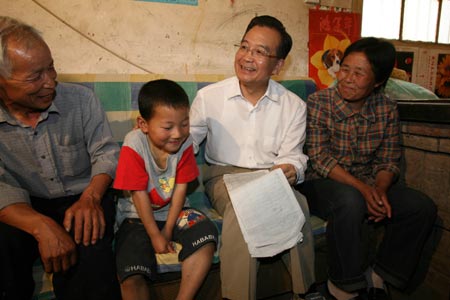 Chinese Premier Wen Jiabao looks
through the exercise book of a boy Yang Saike in a village of Xingping City,
North China's Shaanxi Province, May 26, 2007. Yang Saike, whose parents were
working in the coastal province of Fujian, thousands of kilometers away, was
cared for by his grandparents. His parents fail to go home even once a year. Wen
has extended greetings to the "left-behind" children of rural migrant workers in
cities ahead of the Children's Day, which falls on June 1.
Chinese Premier Wen Jiabao looks
through the exercise book of a boy Yang Saike in a village of Xingping City,
North China's Shaanxi Province, May 26, 2007. Yang Saike, whose parents were
working in the coastal province of Fujian, thousands of kilometers away, was
cared for by his grandparents. His parents fail to go home even once a year. Wen
has extended greetings to the "left-behind" children of rural migrant workers in
cities ahead of the Children's Day, which falls on June 1.
Mainland
piped-gas distributor China Gas Holdings (0384) will invest 1.2 billion yuan
(HK$1.23 billion) in a second gas liquefaction plant in the northeast of Sichuan
province.
Tingyi
(Cayman Islands) Holding (0322), China's biggest packaged- food maker, reported
first-quarter net profit jumped 20.6 percent year on year while market share for
the group's core products continued to climb.
Shanghai reappointed Mayor Han Zheng
as a Communist Party deputy secretary yesterday, indicating he will remain in
the city for now after a corruption case that led to the sacking of the city's
previous party secretary.
Despite official efforts to counter
the soaring price of pork on the mainland, shoppers were still concerned
yesterday that the price of other everyday necessities would follow the rising
cost of the meat.
A former employee of BNP Paribas
allegedly bribed a mainland official to gain an underwriting contract for the
country's first euro-denominated foreign bonds, according to a mainland media
report.
Bank of China is planning to tap the
Hong Kong debt market by selling as much as three billion yuan worth of bonds
denominated in the Chinese currency, the lender said.
May 29, 2007
 Hong Kong:
The controversial issue of Hong
Kong being required to communicate with the central government over its chief
executive candidates will go public when Basic Law Committee director Qiao
Xiaoyang arrives in the SAR for a Basic Law seminar in mid-June. Hong Kong:
The controversial issue of Hong
Kong being required to communicate with the central government over its chief
executive candidates will go public when Basic Law Committee director Qiao
Xiaoyang arrives in the SAR for a Basic Law seminar in mid-June.
 Walker Group, Hong Kong shoe maker with growing business both in Hong Kong and
Chinese mainland, Sunday announced its initial public offering plan of 150
million shares starting from Monday. It said the listing on the Main Board of
the Stock Exchange of Hong Kong is to raise approximately 665.9 million HK
dollars (85.4 million U.S. dollars) for its business expansion. About 90 percent
of the offering will be for placing and 10 percent will be offered to the public
with the price range between 3.86 HK dollars to 3.18 HK dollars. The placing
offer has attracted two institutional investors -- ITOCHU Corporation, a
Japanese conglomerate and Gaoling Yali Fund, a investing fund indirectly owned
by Yale University. The public offering will last from Monday to Thursday and
start trading on June 7.
Walker Group, Hong Kong shoe maker with growing business both in Hong Kong and
Chinese mainland, Sunday announced its initial public offering plan of 150
million shares starting from Monday. It said the listing on the Main Board of
the Stock Exchange of Hong Kong is to raise approximately 665.9 million HK
dollars (85.4 million U.S. dollars) for its business expansion. About 90 percent
of the offering will be for placing and 10 percent will be offered to the public
with the price range between 3.86 HK dollars to 3.18 HK dollars. The placing
offer has attracted two institutional investors -- ITOCHU Corporation, a
Japanese conglomerate and Gaoling Yali Fund, a investing fund indirectly owned
by Yale University. The public offering will last from Monday to Thursday and
start trading on June 7.
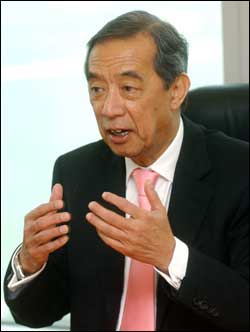 Hong Kong will continue to strengthen its role as China's
international financial center, although the stock exchange will not be the sole
beneficiary of mainland policies, a senior executive said. Ronald Arculli,
chairman of Hong Kong Exchanges and Clearing (0388), told The Standard the
exchange is ready to play a greater role in China's economic development, while
also aiming to become a leading regional market by attracting more overseas
listings. Arculli said the exchange could not depend entirely on the mainland to
develop further despite the expansion of the qualified domestic institutional
investor scheme. The move, announced May 11, helped to drive turnover May 14 up
to HK$94.99 billion and lifted the Hang Seng Index to a record closing high of
20,979.24 points. "QDII is not only designed for the Hong Kong market. It is a
measure to give mainlanders more investment choices," he said. "[The quotas] may
be enlarged, but we can't absorb it all." Arculli said the news that about US$7
billion (HK$54.6 billion) would be made available for investment propelled daily
turnover to a record and that it meant the bourse would be swamped with huge
capital flows if all of the mainland's financial policies were to be decided in
favor of Hong Kong. And as the bourse evolves, the exchange is strengthening its
market infrastructure. "Our trading system is ready. It can handle more than 1.5
million transactions per day, while the current daily average is only 400,000
transactions." Since the 1970s, Hong Kong has played an important role in
China's economic development, contributing to and benefiting from the country's
robust economic growth, Arculli said. Now, 10 years after the handover, Hong
Kong should look at the bigger picture and develop a tighter relationship with
the nation, Arculli said. "China has upcoming macro plans. Areas such as
railways development, customs cooperation and financial market convergence are
areas in which Hong Kong has a role. This will be long term and might need more
than three to five years to be implemented. The central government has clearly
said Hong Kong's status as an international financial center is irreplaceable.
Their support for us will not change." He said the bourse is eager to become the
region's leading financial center. "We have been focused on attracting mainland
enterprises to use Hong Kong as a platform for overseas fund raising. And now
our goal is to be the time zone's regional financial center, like London or New
York," Arculli said. "We do not fear competition from our mainland peers.
Competition is not only from the mainland but also from overseas counterparts
such as Nasdaq." Overseas exchanges such as the New York Stock Exchange, Nasdaq
and Deutsche Borse are planning to set foot in China with the aim of attracting
major issuers. Rules allowing them to open offices take effect July 1.
Hong Kong will continue to strengthen its role as China's
international financial center, although the stock exchange will not be the sole
beneficiary of mainland policies, a senior executive said. Ronald Arculli,
chairman of Hong Kong Exchanges and Clearing (0388), told The Standard the
exchange is ready to play a greater role in China's economic development, while
also aiming to become a leading regional market by attracting more overseas
listings. Arculli said the exchange could not depend entirely on the mainland to
develop further despite the expansion of the qualified domestic institutional
investor scheme. The move, announced May 11, helped to drive turnover May 14 up
to HK$94.99 billion and lifted the Hang Seng Index to a record closing high of
20,979.24 points. "QDII is not only designed for the Hong Kong market. It is a
measure to give mainlanders more investment choices," he said. "[The quotas] may
be enlarged, but we can't absorb it all." Arculli said the news that about US$7
billion (HK$54.6 billion) would be made available for investment propelled daily
turnover to a record and that it meant the bourse would be swamped with huge
capital flows if all of the mainland's financial policies were to be decided in
favor of Hong Kong. And as the bourse evolves, the exchange is strengthening its
market infrastructure. "Our trading system is ready. It can handle more than 1.5
million transactions per day, while the current daily average is only 400,000
transactions." Since the 1970s, Hong Kong has played an important role in
China's economic development, contributing to and benefiting from the country's
robust economic growth, Arculli said. Now, 10 years after the handover, Hong
Kong should look at the bigger picture and develop a tighter relationship with
the nation, Arculli said. "China has upcoming macro plans. Areas such as
railways development, customs cooperation and financial market convergence are
areas in which Hong Kong has a role. This will be long term and might need more
than three to five years to be implemented. The central government has clearly
said Hong Kong's status as an international financial center is irreplaceable.
Their support for us will not change." He said the bourse is eager to become the
region's leading financial center. "We have been focused on attracting mainland
enterprises to use Hong Kong as a platform for overseas fund raising. And now
our goal is to be the time zone's regional financial center, like London or New
York," Arculli said. "We do not fear competition from our mainland peers.
Competition is not only from the mainland but also from overseas counterparts
such as Nasdaq." Overseas exchanges such as the New York Stock Exchange, Nasdaq
and Deutsche Borse are planning to set foot in China with the aim of attracting
major issuers. Rules allowing them to open offices take effect July 1.
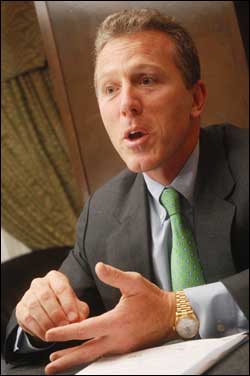 As the mainland continues to reform
its economy to align its business environment with international standards, it
will become one of the top three epicenters for private equity money. Gene
Donnelly, global managing partner, advisory and tax, at PricewaterhouseCoopers,
said there will soon be "three epicenters of private equity in the world - New
York, London, and we think China is going to be the third." He told The Standard
private equity activity in the mainland is "booming." "There are too many firms
to mention that are opening." Changes in the tax law that take effect from the
start of next year provide a high degree of certainty. The unified tax system, a
major part of the mainland's accession to the World Trade Organization, provides
a clarity that will help foreign investors such as private equity firms manage
their risks better. At the moment, foreign-funded enterprises get preferential
tax treatment - 15 percent on average as opposed to 25 percent for domestic
companies. "I think this tax change is a good example of how China is quickly
conforming to the rules of the game around the world," Donnelly said. Private
equity firms have so far been taking smaller stakes in mainland deals, than in
other markets. As they adapt to the culture, however, big value deals will
become possible. "Learning the new culture, learning how to get along with
regulators, who the regulators are, is all part of the natural evolution of
private equity as it moves into new markets," Donnelly said. Private equity
players still have a lot to learn about doing deals in China.
As the mainland continues to reform
its economy to align its business environment with international standards, it
will become one of the top three epicenters for private equity money. Gene
Donnelly, global managing partner, advisory and tax, at PricewaterhouseCoopers,
said there will soon be "three epicenters of private equity in the world - New
York, London, and we think China is going to be the third." He told The Standard
private equity activity in the mainland is "booming." "There are too many firms
to mention that are opening." Changes in the tax law that take effect from the
start of next year provide a high degree of certainty. The unified tax system, a
major part of the mainland's accession to the World Trade Organization, provides
a clarity that will help foreign investors such as private equity firms manage
their risks better. At the moment, foreign-funded enterprises get preferential
tax treatment - 15 percent on average as opposed to 25 percent for domestic
companies. "I think this tax change is a good example of how China is quickly
conforming to the rules of the game around the world," Donnelly said. Private
equity firms have so far been taking smaller stakes in mainland deals, than in
other markets. As they adapt to the culture, however, big value deals will
become possible. "Learning the new culture, learning how to get along with
regulators, who the regulators are, is all part of the natural evolution of
private equity as it moves into new markets," Donnelly said. Private equity
players still have a lot to learn about doing deals in China.
Shanghai Fosun Group, one of the largest privately owned conglomerates in the
mainland and parent of developer Shanghai Forte (2337), is looking to raise US$1
billion (HK$7.8 billion) in a listing in Hong Kong.
The People's Liberation Army's 8-1 Parachute Brigade will make its debut in Hong
Kong June 28 as part of celebrations marking the 10th anniversary of the
handover. Carrying the national, HKSAR and PLA flags, members of the brigade
will descend from 2,000 meters during a free 40-minute performance at the Happy
Valley racecourse. The brigade, a nationally renowned team, has won about 240
championships so far and broken the world record eight times with its
spectacular shows. The team performed at the Macau handover ceremony in 1999,
but this is the first time for it to visit Hong Kong. Cheng Yiu-tong, convenor
of the Hong Kong Celebrations Preparatory Association, said team members have
visited the racecourse and are satisfied the ground is suitable for landing. The
brigade will put on another show at the "Together We Grow, Together We Dream"
July 1 parade. Cheng said he expects more than 20,000 people to watch the
racecourse event, which will also include a flag- raising ceremony by the city's
PLA garrison and marches. The parade will start from the racecourse at noon, to
be followed by performances by the parachute brigade and garrison. It will pass
through Tin Lok Lane and Hennessy Road and end at Southorn Playground in Wan
Chai. Four performance zones will be set up along the route to allow spectators
to take a closer look at the performers. Program director Lee Fung-king said the
parade will include about 5,000 participants from organizations in Hong Kong and
the mainland. "We already have 14 groups of performers from various mainland
provinces," Lee said. "We're still contacting other parties who may be
interested in taking part in the parade." The groups will perform lion dances,
juggling and other traditional Chinese skills. About 30 children born July 1,
1997, have been invited to accompany a huge birthday cake during the parade. The
children cut a cake with Secretary for Home Affairs Patrick Ho Chi- ping at a
press conference Sunday to mark the start of the celebrations. Animals and vets
from the Society for the Prevention of Cruelty to Animals will also participate
in the parade. Apart from the parade and performances, a fireworks display will
light up Victoria Harbour at night from July 1 to July 8. More details of
tickets and performances to mark the handover will be released later. Cheng said
he hopes senior officials from the mainland will attend the activities, but he
is not sure who will be coming. He said the organizers will spend about HK$2
million on the parade and another HK$8 million on the fireworks displays. Asked
whether the parade will clash with the democrats' planned annual march, Cheng
said the event will end at about 3pm.
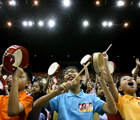 Nine thousand children take part in a
mass drum-banging rehearsal at the Hong Kong Coliseum, for the Dragon Jamboree.
The students will join hundreds of others from the mainland, Taiwan and Macau
for a 10,000-strong event on June 30 in an attempt to set a Guinness world
record for the largest simultaneous percussion performance. Nine thousand children take part in a
mass drum-banging rehearsal at the Hong Kong Coliseum, for the Dragon Jamboree.
The students will join hundreds of others from the mainland, Taiwan and Macau
for a 10,000-strong event on June 30 in an attempt to set a Guinness world
record for the largest simultaneous percussion performance.
Longhu Real Estate, a Chongqing-based
luxury developer, is planning an initial public offering of up to US$1 billion
in Hong Kong this year, capitalising on investors' appetite for mainland
property plays.
 China: Wang
Liqin shut the last non-Chinese out of the world table tennis championships on
Sunday, ensuring China's clean sweep of gold and silver medals for the third
time.
China: Wang
Liqin shut the last non-Chinese out of the world table tennis championships on
Sunday, ensuring China's clean sweep of gold and silver medals for the third
time.
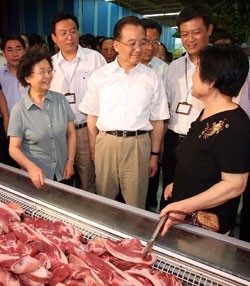 Chinese Premier Wen Jiabao (C) talks with
customers on the pork prices at a supermarket in Xi'an, capital of northwest
China's Shaanxi Province, May 26, 2007. Wen visited Shaanxi Saturday for an
investigation into pig-raising and pork market. Chinese Premier Wen Jiabao (C) talks with
customers on the pork prices at a supermarket in Xi'an, capital of northwest
China's Shaanxi Province, May 26, 2007. Wen visited Shaanxi Saturday for an
investigation into pig-raising and pork market.
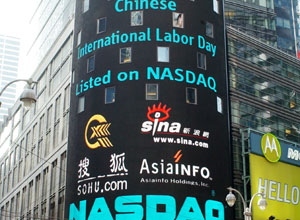 Nasdaq is working closely with the
Chinese authorities to open a representative office in Beijing, said Nasdaq's
chief representative of China Xu Guangxun on Sunday.
Nasdaq is working closely with the
Chinese authorities to open a representative office in Beijing, said Nasdaq's
chief representative of China Xu Guangxun on Sunday.
The Shanghai Stock Exchange (SSE) on
Monday ordered all Special Treatment (ST) companies to publicize a biweekly
report to inform investors about possible risks, according to a statement on its
website.
April saw the value of total exports
of goods in Hong Kong rise to 212.6 billion HK dollars (27. 2 U.S. dollars), up
12.6 percent on the same month last year, official figures indicated Monday. The
figures came after a year-on-year rise of 6.9 percent in March, according to
figures released by the Census and Statistics Department of the Hong Kong
Special Administrative Region. Within this total, the value of re-exports grew
14.3 percent to 204 billion HK dollars, while the value of domestic exports fell
16.1 percent to 8.6 billion HK dollars. The value of imports of goods rose 14.7
percent to 233.2 billion HK dollars, after a year-on-year increase of 11.1
percent in March. A visible trade deficit of 20.6 billion HK dollars, equivalent
to 8.8 percent of the value of imports of goods, was recorded in April. For the
first four months of the year, the value of total exports of goods rose 10
percent over the same period last year. Within this total, the value of
re-exports grew 12.5 percent, while the value of domestic exports dropped 29.3
percent. The department said the trade prospects in the near term will continue
to hinge on the global economic situation, in particular the demand in the US.
Also of crucial significance to Hong Kong's trade outlook is continued strength
in the Mainland economy and its vibrant trade flow. (One U.S. dollar equals
7.813 HK dollars).
Xi Jinping
was elected secretary of the Communist Party of China (CPC) Shanghai Municipal
Committee on Monday.
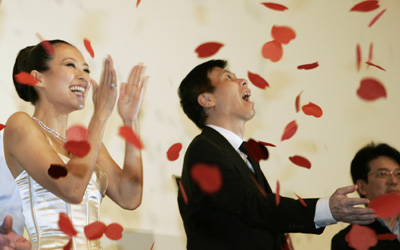 Chinese
actress Zhang Ziyi (L) and movie director Feng Xiaogang react after they throw
paper flowers to wish the success of their movie "the Banquet" at its Japanese
premiere in Tokyo May 28, 2007.
Chinese
actress Zhang Ziyi (L) and movie director Feng Xiaogang react after they throw
paper flowers to wish the success of their movie "the Banquet" at its Japanese
premiere in Tokyo May 28, 2007.
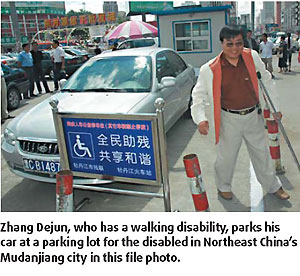 For
paraplegic Wu Runling, visiting a doctor in Beijing is like climbing Qomolangma
(Mt. Everest). Wu, paralyzed since the age of two, went to have a leg illness
checked out last month but found a huge set of stairs blocking his way from the
parking lot to the hospital's registration room. "For healthy people, those
stairs are just a few steps," said Wu, who runs an NGO providing services for
people with disabilities. "But for crutch users, they are like Qomolangma." Next
year, thanks to a raft of changes being implemented ahead of the 2008 Beijing
Games, life will become easier for Wu and China's 83-million disabled
population. One of the keynote changes involves a partial makeover to the
country's most famous landmark, the Great Wall. "A vertical lift will be
installed at the Badaling section of the Wall. It is being designed now so that
disabled people can have better access," Wang Bingyang, a senior member of the
organizing committee for the Beijing Paralympics, told China Daily. Badaling
lies 70km northwest of Beijing and welcomes over 5 million tourists each year.
"Now there are several designs, but the government wants to see more. They hope
the lift will be ready for the 2008 Beijing Games but they don't want to damage
the Great Wall, so they are looking for the perfect design," said Wang. With $40
billion promised by Beijing, the 2008 Games which includes the Olymics and
Paralympics, are set to be the most expensive ever and leave the biggest
legacies behind. Billed as a "Games of Equal Splendor," the Paralympics will run
from September 6-17 in Beijing, Qingdao and Hong Kong, one month after the
Olympic Games. The planned arrival of 4,000-plus disabled athletes has breathed
new life into urban renovation projects. For some officials, Beijing faces a
race against time if it hopes to meet their transport requirements. "I worry
more about the public transport," said Shen Zhifei,, vice-president of the China
Disabled Persons' Federation (CDPF). "You cannot have all the athletes and
special athletes staying in the Olympic Village all the time. The biggest
challenge is the subway system, because few of the existing lines have any
lifts." More special alleyways for the blind, retractable slopes on bus doors
and a growing awareness of the needs of the disabled are just some of the
changes taking place in the Chinese capital. Wheelchair ramps have been added at
the Summer Palace and an elevating ramp at the Noon Gate of the Forbidden City.
Beijing is currently building six new subway lines to complement the existing
three as a way of overhauling a public transport network that has not kept pace
with the city's explosive growth. The difference is that each of the new lines
will include barrier-free facilities. "In the last two decades, Beijing has
built a lot of accessible facilities, but after we were awarded the 2008 Olympic
Games, it accelerated construction, especially in the last five years," said
Wang, deputy director of the Paralympic Games Department of the Beijing
Organizing Committee for the Games of the XXIX Olympiad (BOCOG). "Now, when they
are planning urban construction, they take into account the needs of the
disabled." International Paralympic Committee President Philip Craven likened
the Great Wall makeover to the accessibility of the Acropolis at the Athens
Games in 2004.
For
paraplegic Wu Runling, visiting a doctor in Beijing is like climbing Qomolangma
(Mt. Everest). Wu, paralyzed since the age of two, went to have a leg illness
checked out last month but found a huge set of stairs blocking his way from the
parking lot to the hospital's registration room. "For healthy people, those
stairs are just a few steps," said Wu, who runs an NGO providing services for
people with disabilities. "But for crutch users, they are like Qomolangma." Next
year, thanks to a raft of changes being implemented ahead of the 2008 Beijing
Games, life will become easier for Wu and China's 83-million disabled
population. One of the keynote changes involves a partial makeover to the
country's most famous landmark, the Great Wall. "A vertical lift will be
installed at the Badaling section of the Wall. It is being designed now so that
disabled people can have better access," Wang Bingyang, a senior member of the
organizing committee for the Beijing Paralympics, told China Daily. Badaling
lies 70km northwest of Beijing and welcomes over 5 million tourists each year.
"Now there are several designs, but the government wants to see more. They hope
the lift will be ready for the 2008 Beijing Games but they don't want to damage
the Great Wall, so they are looking for the perfect design," said Wang. With $40
billion promised by Beijing, the 2008 Games which includes the Olymics and
Paralympics, are set to be the most expensive ever and leave the biggest
legacies behind. Billed as a "Games of Equal Splendor," the Paralympics will run
from September 6-17 in Beijing, Qingdao and Hong Kong, one month after the
Olympic Games. The planned arrival of 4,000-plus disabled athletes has breathed
new life into urban renovation projects. For some officials, Beijing faces a
race against time if it hopes to meet their transport requirements. "I worry
more about the public transport," said Shen Zhifei,, vice-president of the China
Disabled Persons' Federation (CDPF). "You cannot have all the athletes and
special athletes staying in the Olympic Village all the time. The biggest
challenge is the subway system, because few of the existing lines have any
lifts." More special alleyways for the blind, retractable slopes on bus doors
and a growing awareness of the needs of the disabled are just some of the
changes taking place in the Chinese capital. Wheelchair ramps have been added at
the Summer Palace and an elevating ramp at the Noon Gate of the Forbidden City.
Beijing is currently building six new subway lines to complement the existing
three as a way of overhauling a public transport network that has not kept pace
with the city's explosive growth. The difference is that each of the new lines
will include barrier-free facilities. "In the last two decades, Beijing has
built a lot of accessible facilities, but after we were awarded the 2008 Olympic
Games, it accelerated construction, especially in the last five years," said
Wang, deputy director of the Paralympic Games Department of the Beijing
Organizing Committee for the Games of the XXIX Olympiad (BOCOG). "Now, when they
are planning urban construction, they take into account the needs of the
disabled." International Paralympic Committee President Philip Craven likened
the Great Wall makeover to the accessibility of the Acropolis at the Athens
Games in 2004.
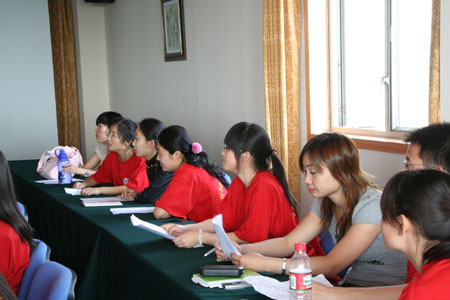 Volunteers from University of International Business and Economics gave
the English traning course for desk clerks from three-star Sardonyx
Hotel,located nearby Olympic main venues area.
Volunteers from University of International Business and Economics gave
the English traning course for desk clerks from three-star Sardonyx
Hotel,located nearby Olympic main venues area.
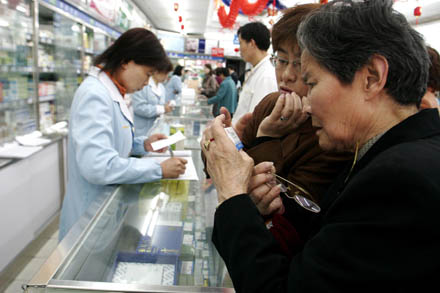 Manulife Financial, the Canadian
insurer and wealth management firm, is pulling out one of its two ventures, a
move that is making the industry regulator nervous as it is unprecedented and
the deal could help it set up related rules, according to an industry source.
Manulife's sale of its John Hancock Tianan Life stake comes as foreign insurers
seek to tap China's largely uninsured 1.3 billion people. For most foreign
insurance firms, a licence in the mainland is much coveted as a large portion of
the country's 1.3 billion people is still uninsured and the economy has been
rising rapidly, boosting policy sales. But Manulife Financial, the Canadian
insurer and wealth management firm, is pulling out one of its two ventures, a
move that is making the industry regulator nervous as it is unprecedented and
the deal could help it set up related rules, according to an industry source.
Manulife was in talks with several non-Chinese insurers to sell its 50 per cent
stake in John Hancock Tianan Life Insurance because it wanted to focus on its
first venture with Sinochem International, Robert Cook, Manulife Financial's
newly appointed senior executive vice-president and general manager of its Asia
division, said in an interview. An insurance industry source said the China
Insurance Regulatory Commission was deeply worried about the deal as this would
the first time the regulator had to handle a stake sale of a Sino-foreign
insurance joint venture. "The procedures and regulations applied to this case
may well become a precedent of how Sino-foreign joint ventures will have their
stakes change hands in future," the source said. "The CIRC is very careful in
making a decision because it wants to make sure the negotiations and the sale
will be smooth and orderly." China has not yet set clear rules on stake sales by
a foreign firm in a domestic venture because foreign insurers are still hungry
for a licence to tap the market and few would consider a retreat. With more
global mergers and acquisitions, it appears the CIRC will need to come up with
related rules. The Netherlands-based ING also has two life insurance ventures in
the mainland - Pacific Antai, which it inherited from a merger, and ING Capital
Life. ING has expressed its desire to keep both ventures. Manulife bought out
the global operations of US insurance company John Hancock in 2004, in a deal
that also gave it 50 per cent of John Hancock Tianan Life Insurance - a joint
venture between John Hancock and Tianan Insurance. That was Manulife's second
venture, as the Canadian insurer and Sinochem International set up
Manulife-Sinochem Life Insurance in 1996, the first and now the largest
Sino-foreign insurance venture in the mainland. Mr Cook said the group wanted to
sell the stake in John Hancock Tianan to allow Manulife to concentrate on its
joint venture with Sinochem International. "We have a very good relationship
with Sinochem for the past 10 years and we want to focus on this first joint
venture. We do not want to engage in another joint venture to compete against
it," Mr Cook said. "We also consider merging the two joint ventures would not
work as they have different set-ups and management." Mr Cook said several
non-Chinese companies had shown interest in the stake, while its mainland
partner, Tianan Insurance, might also buy it out. "We are still negotiating with
all the potential buyers and the regulator. We keep a close dialogue with the
China Insurance Regulatory Commission. I hope we can reach a solution by the end
of this year," he said. "Tianan Insurance also understands our position and why
we want to sell the shares. We would continue to keep a good relationship with
the company." Mr Cook said although John Hancock Tianan is smaller than
Manulife-Sinochem, it was growing fast. Last year, John Hancock Tianan had
premium income of 200 million yuan, three times that of 2004, compared with 890
million yuan at Manulife-Sinochem. Mr Cook said although Sinochem was not an
insurance company, it provided good knowledge and network to support Manulife in
China. "Manulife is an insurance company and we do not need another firm to tell
us how to do insurance business," Mr Cook said. "Sinochem has been a terrific,
good joint-venture partner. It helped us establish the joint venture and helped
us understand the market and regulations in China. It is a true partnership and
not just someone providing some money for the company to grow." Manulife Financial, the Canadian
insurer and wealth management firm, is pulling out one of its two ventures, a
move that is making the industry regulator nervous as it is unprecedented and
the deal could help it set up related rules, according to an industry source.
Manulife's sale of its John Hancock Tianan Life stake comes as foreign insurers
seek to tap China's largely uninsured 1.3 billion people. For most foreign
insurance firms, a licence in the mainland is much coveted as a large portion of
the country's 1.3 billion people is still uninsured and the economy has been
rising rapidly, boosting policy sales. But Manulife Financial, the Canadian
insurer and wealth management firm, is pulling out one of its two ventures, a
move that is making the industry regulator nervous as it is unprecedented and
the deal could help it set up related rules, according to an industry source.
Manulife was in talks with several non-Chinese insurers to sell its 50 per cent
stake in John Hancock Tianan Life Insurance because it wanted to focus on its
first venture with Sinochem International, Robert Cook, Manulife Financial's
newly appointed senior executive vice-president and general manager of its Asia
division, said in an interview. An insurance industry source said the China
Insurance Regulatory Commission was deeply worried about the deal as this would
the first time the regulator had to handle a stake sale of a Sino-foreign
insurance joint venture. "The procedures and regulations applied to this case
may well become a precedent of how Sino-foreign joint ventures will have their
stakes change hands in future," the source said. "The CIRC is very careful in
making a decision because it wants to make sure the negotiations and the sale
will be smooth and orderly." China has not yet set clear rules on stake sales by
a foreign firm in a domestic venture because foreign insurers are still hungry
for a licence to tap the market and few would consider a retreat. With more
global mergers and acquisitions, it appears the CIRC will need to come up with
related rules. The Netherlands-based ING also has two life insurance ventures in
the mainland - Pacific Antai, which it inherited from a merger, and ING Capital
Life. ING has expressed its desire to keep both ventures. Manulife bought out
the global operations of US insurance company John Hancock in 2004, in a deal
that also gave it 50 per cent of John Hancock Tianan Life Insurance - a joint
venture between John Hancock and Tianan Insurance. That was Manulife's second
venture, as the Canadian insurer and Sinochem International set up
Manulife-Sinochem Life Insurance in 1996, the first and now the largest
Sino-foreign insurance venture in the mainland. Mr Cook said the group wanted to
sell the stake in John Hancock Tianan to allow Manulife to concentrate on its
joint venture with Sinochem International. "We have a very good relationship
with Sinochem for the past 10 years and we want to focus on this first joint
venture. We do not want to engage in another joint venture to compete against
it," Mr Cook said. "We also consider merging the two joint ventures would not
work as they have different set-ups and management." Mr Cook said several
non-Chinese companies had shown interest in the stake, while its mainland
partner, Tianan Insurance, might also buy it out. "We are still negotiating with
all the potential buyers and the regulator. We keep a close dialogue with the
China Insurance Regulatory Commission. I hope we can reach a solution by the end
of this year," he said. "Tianan Insurance also understands our position and why
we want to sell the shares. We would continue to keep a good relationship with
the company." Mr Cook said although John Hancock Tianan is smaller than
Manulife-Sinochem, it was growing fast. Last year, John Hancock Tianan had
premium income of 200 million yuan, three times that of 2004, compared with 890
million yuan at Manulife-Sinochem. Mr Cook said although Sinochem was not an
insurance company, it provided good knowledge and network to support Manulife in
China. "Manulife is an insurance company and we do not need another firm to tell
us how to do insurance business," Mr Cook said. "Sinochem has been a terrific,
good joint-venture partner. It helped us establish the joint venture and helped
us understand the market and regulations in China. It is a true partnership and
not just someone providing some money for the company to grow."
The Industrial and Commercial Bank
of China, the nation’s largest lender, said on Monday it plans to boost the
budget for fixed-asset investment by nine billion yuan (US$1.17 billion) this
year.
Beijing plans to make a major push
to develop solar energy projects this year in a bid to meet its 2010 target and
it is likely to award projects by open bidding to keep costs down, according to
a policymaker.
Greater China has become the largest
market for high-end "smart phones" made by Nokia, the world's biggest maker of
mobile telephones, and is a growing source of product innovation in mobile
applications, according to executives of the Finnish company.
China, the biggest producer of
Bluetooth headsets, will also become one of the world's largest markets for the
wireless accessories as communications network operators and mobile-telephone
vendors expand their marketing efforts, an industry expert says.
Global telecommunications equipment
supplier Ericsson is reviewing its alliance with mainland peer ZTE Corp on the
development of TD-SCDMA wireless technology solutions, according to the Swedish
company's Greater China president.
May 28, 2007
 Hong Kong:
Hong Kong stocks closed sharply lower Friday after the suspension on Thursday
for a public holiday, tracking performance in overseas markets. The benchmark
Hang Seng Index opened 1.18 percent lower, and went down 278.31 points, or 1.34
percent, to close at 20520.66, fluctuating between 20,474.03 and 20,566.26
during the day's trading. The total turnover rose to 67,976 million HK dollars
(8715 million U.S. dollars) from 59,107 million dollars (7578 million U. S.
dollars on Wednesday. All the four major stock categories lost ground. The
Finance went down 326.79 points, or 1 percent to close at 32,309.64. The
Utilities moved down 293.67 points, or 0.82 percent to close at 35, 695.40. The
Properties dropped 320.05 points, or 1.27 percent to close at 24,859.88. The
Commerce and Industry sank 193.02 points, or 1.70 percent to close at 11,144.35.
HSBC, the largest stock by market capitalization, edged down 0. 35 percent to
end at 144.3 HK dollars after Lehman Brothers cuts back holding to below 3
percent. China-related shares fell when the market reopened Friday, after the
former U.S. Federal Reserve Chairman Alan Greenspan warned on Wednesday a
"dramatic contraction" is in sight for China equity market. Hang Seng China
Enterprises Index closed down 224.54 points, or 2.06 percent. Heavyweight China
Mobile, the country's largest telecommunication operator, fell 2 percent to
close at 72.15 HK dollars. Chinese financial stocks also closed lower. China
Life dropped 3 percent to close at 24.85 HK dollars. ICBC fell 2 percent to
close at 4.11 HK dollars, and Bank of China lost 1 percent to close at 3.85 HK
dollars. The property sub-index shed 1 percent. Cheung Kong fell 1 percent to
end at 102.10 HK dollars. Sun Hung Kai Properties dropped 1 percent to end at
91.60 HK dollars. Hang Lung Properties declined 2 percent to close at 24.35 HK
dollars. Local properties are very sensitive to news on interest rates. The
strong U.S. housing data for April have dashed hopes of an interest rate cut,
and this put a drag on the property sector, said Castor Pang, a strategist at
Sun Hung Kai Financial Group. Lenovo soared 14 percent to close at 3.66 HK
dollars after posting better-than-expected fourth-quarter results. It recorded a
60 million U.S. dollars net profit in the fourth quarter ended March 2007,
compared with a net loss of 116 million U.S. dollars the year before. "We
believe Lenovo should stabilize overseas market share through increasing channel
sales, while gradually improving margins through further efficiency improvement
and control of operating expense," JP Morgan said in a research report Friday.
"The correction in the HSI is absolutely reasonable," says Celestial's Kitty
Chan, adding the index will stay around 20,5000 for now. Hong Kong:
Hong Kong stocks closed sharply lower Friday after the suspension on Thursday
for a public holiday, tracking performance in overseas markets. The benchmark
Hang Seng Index opened 1.18 percent lower, and went down 278.31 points, or 1.34
percent, to close at 20520.66, fluctuating between 20,474.03 and 20,566.26
during the day's trading. The total turnover rose to 67,976 million HK dollars
(8715 million U.S. dollars) from 59,107 million dollars (7578 million U. S.
dollars on Wednesday. All the four major stock categories lost ground. The
Finance went down 326.79 points, or 1 percent to close at 32,309.64. The
Utilities moved down 293.67 points, or 0.82 percent to close at 35, 695.40. The
Properties dropped 320.05 points, or 1.27 percent to close at 24,859.88. The
Commerce and Industry sank 193.02 points, or 1.70 percent to close at 11,144.35.
HSBC, the largest stock by market capitalization, edged down 0. 35 percent to
end at 144.3 HK dollars after Lehman Brothers cuts back holding to below 3
percent. China-related shares fell when the market reopened Friday, after the
former U.S. Federal Reserve Chairman Alan Greenspan warned on Wednesday a
"dramatic contraction" is in sight for China equity market. Hang Seng China
Enterprises Index closed down 224.54 points, or 2.06 percent. Heavyweight China
Mobile, the country's largest telecommunication operator, fell 2 percent to
close at 72.15 HK dollars. Chinese financial stocks also closed lower. China
Life dropped 3 percent to close at 24.85 HK dollars. ICBC fell 2 percent to
close at 4.11 HK dollars, and Bank of China lost 1 percent to close at 3.85 HK
dollars. The property sub-index shed 1 percent. Cheung Kong fell 1 percent to
end at 102.10 HK dollars. Sun Hung Kai Properties dropped 1 percent to end at
91.60 HK dollars. Hang Lung Properties declined 2 percent to close at 24.35 HK
dollars. Local properties are very sensitive to news on interest rates. The
strong U.S. housing data for April have dashed hopes of an interest rate cut,
and this put a drag on the property sector, said Castor Pang, a strategist at
Sun Hung Kai Financial Group. Lenovo soared 14 percent to close at 3.66 HK
dollars after posting better-than-expected fourth-quarter results. It recorded a
60 million U.S. dollars net profit in the fourth quarter ended March 2007,
compared with a net loss of 116 million U.S. dollars the year before. "We
believe Lenovo should stabilize overseas market share through increasing channel
sales, while gradually improving margins through further efficiency improvement
and control of operating expense," JP Morgan said in a research report Friday.
"The correction in the HSI is absolutely reasonable," says Celestial's Kitty
Chan, adding the index will stay around 20,5000 for now.
The officials of Hong Kong Special
Administrative Region (HKSAR) will be invited to attend a fashion show and even
walk on the catwalk early next month to encourage more casual dressing in the
workplace for saving energy, local press reported on Friday. Chief Executive
Donald Tsang has agreed to officiate the event, and all 14 secretaries have been
invited to attend the show on June 3, Sing Tao Daily cited a government source
as saying. The event, currently entitled "Dress smart-casual for work for
energy-saving's sake", will be held two days before the annual United Nations
World Environment Day on June 5, which focuses on climate change and the effects
of global warming. Among those already prepared to exchange their suits and ties
or formal wear for a more casual look on the catwalk are Secretary for Health,
Welfare and Food York Chow and Secretary for the Environment, Transport and
Works Sarah Liao, according to the report. The catwalking officials will have
advice from experts on what to wear. In July 2006 the government began promoting
light dressing for work in its Action Blue Sky Campaign.
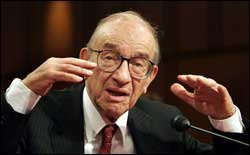 Mainland bourses
are likely to remain jittery today after falling slightly in volatile trade
Thursday following comments by former US Federal Reserve chairman Alan Greenspan
that shares are overvalued and might be heading for a "dramatic contraction."
Analysts in Hong Kong believe sentiment has weakened, while retail investors in
the mainland are treating the 81-year-old retired Fed chief's comments with
skepticism. Still, investor nervousness will be further exacerbated by the
"Friday effect" - announcements of recent tightening measures have come as the
working week winds down. Speaking to a conference in Madrid via satellite
Wednesday, Greenspan said the bull run in the mainland market could not last for
much longer. "It is clearly unsustainable. There is going to be a dramatic
contraction at some point," he was quoted by Reuters as saying. His remarks
spurred some selloffs in New York and Asia. The benchmark CSI 300, which tracks
A shares listed on the two mainland exchanges, fell 19.20 points or 0.49 percent
to 3,919.75 after swinging between gains and losses earlier in the day.
Foreign-currency B shares, open to both Chinese and overseas investors, plunged
for the third straight day after gaining 70 percent in the previous three weeks.
The Shanghai B-share Index fell 7.97 percent or 25.79 after losing 5.03 percent
Wednesday, while the Shenzhen B-share Index fell 4.41 percent or 32.80 points to
711.17. Stocks fell after the China Securities Regulatory Commission also
demanded brokerage houses step up investor education programs. Mainland
officials, senior Hong Kong government figures and tycoons have also raised the
alarm about a bubble. Last week, billionaire Li Ka- shing, Financial Secretary
Henry Tang Ying-yen and Lee Shau-kee, chairman of Henderson Land Development
(0012), warned of a possible plunge. " I think sentiment in the A-share market
has turned a little weak after several influential people warned about a bubble
and a correction," said Eugene Law Sheung-pui, head of research at Cash
Securities. "[Thursday's] correction will have some effect psychologically, but
there is still quite a lot of liquidity, plus China expanded the QFII investment
quota. So I don't think there will be a big correction in the short term." The
People's Bank of China has raised interest rates four times in the past 12
months, and revised the reserve ratio for banks eight times in 10 months, but
investors have continued to bet on stocks, driving a rally. Law said the Hong
Kong market, closed Thursday for a holiday, is likely to track the A-share
market. "Hong Kong investors are quite worried about the bubble in the A-share
market. So I think both the Hang Seng and H-share indexes will have a correction
Friday," he said. "I will closely look at the turnover. If the turnover, which
has dropped quite a lot in the past few days, continues to fall, then it
indicates investors have lost [the risk appetite] on concerns over the A-share
market." Mainland bourses
are likely to remain jittery today after falling slightly in volatile trade
Thursday following comments by former US Federal Reserve chairman Alan Greenspan
that shares are overvalued and might be heading for a "dramatic contraction."
Analysts in Hong Kong believe sentiment has weakened, while retail investors in
the mainland are treating the 81-year-old retired Fed chief's comments with
skepticism. Still, investor nervousness will be further exacerbated by the
"Friday effect" - announcements of recent tightening measures have come as the
working week winds down. Speaking to a conference in Madrid via satellite
Wednesday, Greenspan said the bull run in the mainland market could not last for
much longer. "It is clearly unsustainable. There is going to be a dramatic
contraction at some point," he was quoted by Reuters as saying. His remarks
spurred some selloffs in New York and Asia. The benchmark CSI 300, which tracks
A shares listed on the two mainland exchanges, fell 19.20 points or 0.49 percent
to 3,919.75 after swinging between gains and losses earlier in the day.
Foreign-currency B shares, open to both Chinese and overseas investors, plunged
for the third straight day after gaining 70 percent in the previous three weeks.
The Shanghai B-share Index fell 7.97 percent or 25.79 after losing 5.03 percent
Wednesday, while the Shenzhen B-share Index fell 4.41 percent or 32.80 points to
711.17. Stocks fell after the China Securities Regulatory Commission also
demanded brokerage houses step up investor education programs. Mainland
officials, senior Hong Kong government figures and tycoons have also raised the
alarm about a bubble. Last week, billionaire Li Ka- shing, Financial Secretary
Henry Tang Ying-yen and Lee Shau-kee, chairman of Henderson Land Development
(0012), warned of a possible plunge. " I think sentiment in the A-share market
has turned a little weak after several influential people warned about a bubble
and a correction," said Eugene Law Sheung-pui, head of research at Cash
Securities. "[Thursday's] correction will have some effect psychologically, but
there is still quite a lot of liquidity, plus China expanded the QFII investment
quota. So I don't think there will be a big correction in the short term." The
People's Bank of China has raised interest rates four times in the past 12
months, and revised the reserve ratio for banks eight times in 10 months, but
investors have continued to bet on stocks, driving a rally. Law said the Hong
Kong market, closed Thursday for a holiday, is likely to track the A-share
market. "Hong Kong investors are quite worried about the bubble in the A-share
market. So I think both the Hang Seng and H-share indexes will have a correction
Friday," he said. "I will closely look at the turnover. If the turnover, which
has dropped quite a lot in the past few days, continues to fall, then it
indicates investors have lost [the risk appetite] on concerns over the A-share
market."
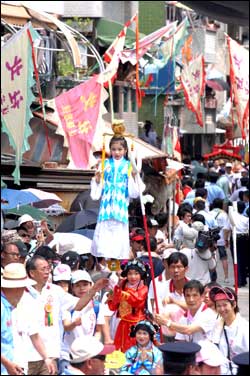
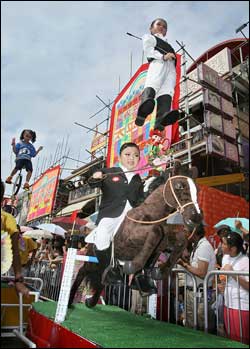 More than 20,000 visitors packed the streets of Cheung
Chau Thursday as celebrations marking the annual Bun Festival got underway, with
the traditional bun-scrambling competition and parade of "floating" children
being the highlights. The atmosphere was jubilant, although the number of
visitors was well short of the 40,000 expected by event organizers. Thousands
went to the island to watch the bun-scrambling contest, held at midnight Friday
as part of the festival that was started in 1894 by survivors of a deadly
epidemic. Eleven men and a woman took part in the scramble up the 14-meter bun
tower at the Pak Tai Temple playground, watched by an excited crowd. The
scramble, restored for the third straight year with tighter security precautions
after a bun tower collapse in 1978 led to the competition being banned for 26
years, involves athletes racing to the top of the tower to collect as many buns
as possible. But the buns, which used to be edible, were replaced by plastic
ones this year as they had become rotten and were deemed unhygienic after being
exposed to rain and sunlight over the years. A three-hour parade through the
island's streets, which began at 2pm from Pak Tai Temple, kicked off the
celebrations. "Floating" girls, dressed in costumes denoting characters from
ancient myths to current affairs personalities, riding tiny seats attached to
steel rods, stole the show. Among 15 groups of "floating" children, a remarkable
pair of characters were dressed like Education and Manpower Secretary Arthur Li
Kwok- cheung and former permanent secretary for education Fanny Law Fan Chiu-fun
- in a suit and tie and green mandarin gown, respectively.
More than 20,000 visitors packed the streets of Cheung
Chau Thursday as celebrations marking the annual Bun Festival got underway, with
the traditional bun-scrambling competition and parade of "floating" children
being the highlights. The atmosphere was jubilant, although the number of
visitors was well short of the 40,000 expected by event organizers. Thousands
went to the island to watch the bun-scrambling contest, held at midnight Friday
as part of the festival that was started in 1894 by survivors of a deadly
epidemic. Eleven men and a woman took part in the scramble up the 14-meter bun
tower at the Pak Tai Temple playground, watched by an excited crowd. The
scramble, restored for the third straight year with tighter security precautions
after a bun tower collapse in 1978 led to the competition being banned for 26
years, involves athletes racing to the top of the tower to collect as many buns
as possible. But the buns, which used to be edible, were replaced by plastic
ones this year as they had become rotten and were deemed unhygienic after being
exposed to rain and sunlight over the years. A three-hour parade through the
island's streets, which began at 2pm from Pak Tai Temple, kicked off the
celebrations. "Floating" girls, dressed in costumes denoting characters from
ancient myths to current affairs personalities, riding tiny seats attached to
steel rods, stole the show. Among 15 groups of "floating" children, a remarkable
pair of characters were dressed like Education and Manpower Secretary Arthur Li
Kwok- cheung and former permanent secretary for education Fanny Law Fan Chiu-fun
- in a suit and tie and green mandarin gown, respectively.
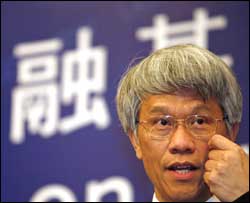 The Hong Kong
Monetary Authority, the territory's de facto central bank, said Thursday it is
worried about the persistent weakening of the Hong Kong dollar as the city may
suffer from an interest rate shock if lagging local rates suddenly jump to match
US rates. "I fear that if the gap closes abruptly, then firms and households and
the financial system in Hong Kong might suffer from a large interest rate shock,
which is not good for financial stability," HKMA chief executive Joseph Yam Chi-kwong
said in his weekly online column Viewpoint. The local currency hit a 22-year low
Wednesday, trading at 7.8256 to the US dollar as the Hong Kong dollar has been
used by many arbitrage traders as a "carry trade" tool owing to its relatively
low interest rates. Carry trade is the process by which traders borrow a
low-interest-rate currency - in this case the Hong Kong dollar - to purchase
higher-yielding equities elsewhere to make a profit. Yam said he could not be
certain for now how the market would react if the Hong Kong dollar continues to
fall, and the authority will have to intervene with the market, ensuring the
currency is traded between the convertibility zone of 7.75 to 7.85 against the
greenback. "It remains to be seen how the spot exchange rate will behave when it
is close to the weak-side convertibility undertaking," Yam said. "But I can
assure you that the HKMA has both the will and the wherewithal to defend the
linked exchange rate system." Yam said he is not so much worried about how low
the Hong Kong dollar will hit, but is more concerned about the pace of the
currency's weakening. "Under the refined regime, the natural tendency for the
interest rate spreads to become zero may not necessarily happen," Yam said. "It
is the speed of change rather than the level of the interest rate spreads that
concerns me more." HKMA introduced refinement measures in 2005 to better align
Hong Kong dollar interest rates with their US dollar counterparts. The Hong Kong
Monetary Authority, the territory's de facto central bank, said Thursday it is
worried about the persistent weakening of the Hong Kong dollar as the city may
suffer from an interest rate shock if lagging local rates suddenly jump to match
US rates. "I fear that if the gap closes abruptly, then firms and households and
the financial system in Hong Kong might suffer from a large interest rate shock,
which is not good for financial stability," HKMA chief executive Joseph Yam Chi-kwong
said in his weekly online column Viewpoint. The local currency hit a 22-year low
Wednesday, trading at 7.8256 to the US dollar as the Hong Kong dollar has been
used by many arbitrage traders as a "carry trade" tool owing to its relatively
low interest rates. Carry trade is the process by which traders borrow a
low-interest-rate currency - in this case the Hong Kong dollar - to purchase
higher-yielding equities elsewhere to make a profit. Yam said he could not be
certain for now how the market would react if the Hong Kong dollar continues to
fall, and the authority will have to intervene with the market, ensuring the
currency is traded between the convertibility zone of 7.75 to 7.85 against the
greenback. "It remains to be seen how the spot exchange rate will behave when it
is close to the weak-side convertibility undertaking," Yam said. "But I can
assure you that the HKMA has both the will and the wherewithal to defend the
linked exchange rate system." Yam said he is not so much worried about how low
the Hong Kong dollar will hit, but is more concerned about the pace of the
currency's weakening. "Under the refined regime, the natural tendency for the
interest rate spreads to become zero may not necessarily happen," Yam said. "It
is the speed of change rather than the level of the interest rate spreads that
concerns me more." HKMA introduced refinement measures in 2005 to better align
Hong Kong dollar interest rates with their US dollar counterparts.
Senior government officials are to
take to the catwalk early next month in an attempt to get Hong Kong's army of
executives and overdressed salesmen to cut down on energy waste by dressing
"smart-casual," according to a source within the administration.
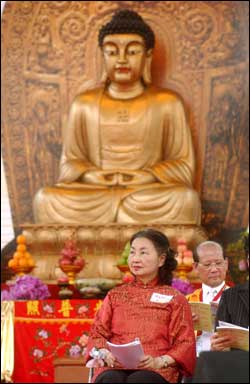 More than 10,000 people crowded into
the Hong Kong Convention and Exhibition Centre in Wan Chai Thursday for the
official ceremony marking the Buddha's birthday. The eighth day of the fourth
lunar month marked the 2,551st anniversary of the birth of the Buddha. Hong Kong
Buddhist Association president Kok Kwong presided at the ceremony and led other
Buddhist leaders in prayers. The official guests included the commissioner of
the Ministry of Foreign Affairs in the HKSAR Gao Siren, Secretary for Home
Affairs Patrick Ho Chi-ping, Legislative Council president Rita Fan Hsu Lai-tai,
and former secretary of justice Elsie Leung Oi- sie. Among others at the
ceremony were National People's Congress Standing Committee delegate Tsang Hin-chi,
Confucian Academy president Tong Yun-kai and Cantonese opera star Liza Wang
Ming-chuen. They performed a ceremony called "bathing the Buddha," by pouring
consecrated water and flower petals on a statue of the Buddha. The organizer
expects that up to 50,000 people will attend the four-day function, for which
entrance is free. Kok said this year's celebrations were a "doubly happy" event
for Hong Kong as it marked the ninth year since the Buddha's birthday became a
recognized holiday and the 10th year since the territory rejoined the
motherland. "This shows the central government's commitment to the freedom of
religion and the SAR's government fair treatment of all religions in Hong Kong,"
Kok said. "The public holiday also allows Hong Kong people the opportunity to
leave their work behind and to understand more about Buddhism."
More than 10,000 people crowded into
the Hong Kong Convention and Exhibition Centre in Wan Chai Thursday for the
official ceremony marking the Buddha's birthday. The eighth day of the fourth
lunar month marked the 2,551st anniversary of the birth of the Buddha. Hong Kong
Buddhist Association president Kok Kwong presided at the ceremony and led other
Buddhist leaders in prayers. The official guests included the commissioner of
the Ministry of Foreign Affairs in the HKSAR Gao Siren, Secretary for Home
Affairs Patrick Ho Chi-ping, Legislative Council president Rita Fan Hsu Lai-tai,
and former secretary of justice Elsie Leung Oi- sie. Among others at the
ceremony were National People's Congress Standing Committee delegate Tsang Hin-chi,
Confucian Academy president Tong Yun-kai and Cantonese opera star Liza Wang
Ming-chuen. They performed a ceremony called "bathing the Buddha," by pouring
consecrated water and flower petals on a statue of the Buddha. The organizer
expects that up to 50,000 people will attend the four-day function, for which
entrance is free. Kok said this year's celebrations were a "doubly happy" event
for Hong Kong as it marked the ninth year since the Buddha's birthday became a
recognized holiday and the 10th year since the territory rejoined the
motherland. "This shows the central government's commitment to the freedom of
religion and the SAR's government fair treatment of all religions in Hong Kong,"
Kok said. "The public holiday also allows Hong Kong people the opportunity to
leave their work behind and to understand more about Buddhism."
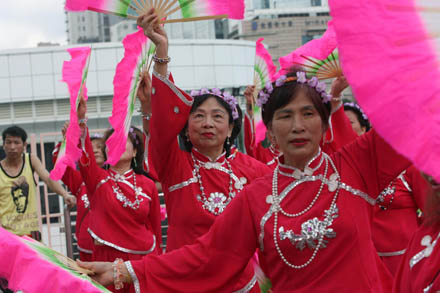 People
parade in Kowloon Park as part of a project to encourage senior citizens to do
more exercise. Up to 1,000 people worked out together in the park's sports
centre. The project is jointly organized by 17 welfare groups. People
parade in Kowloon Park as part of a project to encourage senior citizens to do
more exercise. Up to 1,000 people worked out together in the park's sports
centre. The project is jointly organized by 17 welfare groups.
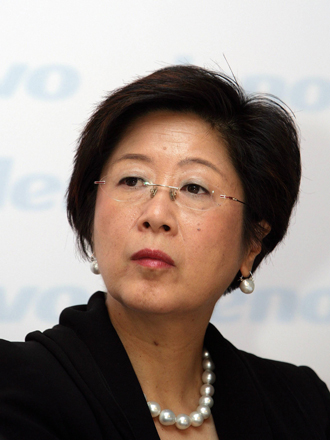 Mary Ma to take a non-executive
advisory role at Lenovo.
Mary Ma to take a non-executive
advisory role at Lenovo.
 China: Shanghai's
new Communist Party chief said corruption has done enormous harm to the nation's
economic hub, as he vowed to stamp out graft and build the city into a global
financial center. "No matter who they are or how high their position, if they
have violated party discipline or state laws they must be seriously investigated
and punished severely," Xi Jinping told the opening of the city's five-yearly
party congress. Xi, 53, was appointed in March in the wake of last year's
financial scandal that led to the sacking of his predecessor, Chen Liangyu, and
implicated more than 20 other leading communist officials and businessmen. The
case, which saw US$480 million (HK$3.74 billion) of the city's retirement funds
illegally plowed into speculative real estate and road investment projects, has
done "enormous harm," Xi said. "It caused damage to the party and the country,
harmed the prestige and image of municipal government, caused injury to
Shanghai's reform and development, and had a negative impact on Shanghai
cadres." Making his first public comments since taking over the city's top post,
Xi said the case has revealed inadequate supervision of senior bureaucrats and a
lack of integrity among some leaders. He called for improved transparency in the
financial and assets management sectors. Making it clear that his loyalties lie
with President Hu Jintao, Xi emphasized that Shanghai would take its orders from
Beijing. "We will unite more closely with the Central Committee led by comrade
Hu Jintao to accelerate the construction of a harmonious socialist society and
to write a new chapter of Shanghai's reform," Xi said. Xi's appointment is
regarded as a pivotal step by Hu to ensure that Shanghai toes the line. Xi gave
no economic growth targets but pledged to continue the strong development of a
city that over the past five years has powered ahead at annual average growth
rates of 12.2 percent, pushing its gross domestic product last year to more than
US$130 billion. Xi also said his administration would ensure the city continues
to develop into a global center for finance, business, trade and shipping over
the next five years. "The building of an international trade center has to
achieve remarkable results and the building of an international shipping center
has to have a major breakthrough." Critical to that plan would be the closer
integration of Shanghai with Jiangsu, Zhejiang and Anhui provinces. "Shanghai
should give full play to the center city's comprehensive service functions to
better serve the Yangtze River Delta region and serve the country." And, while
Xi said his government would be more concerned with the welfare of Shanghai's
citizens, security was tight outside the venue. A photographer witnessed three
arrests as an estimated 200 police including undercover and special armed
officers patrolled for any sign of public unrest. Discontented citizens often
use key political meetings to air grievances, which in Shanghai often have to do
with claims of inadequate compensation for property.
China: Shanghai's
new Communist Party chief said corruption has done enormous harm to the nation's
economic hub, as he vowed to stamp out graft and build the city into a global
financial center. "No matter who they are or how high their position, if they
have violated party discipline or state laws they must be seriously investigated
and punished severely," Xi Jinping told the opening of the city's five-yearly
party congress. Xi, 53, was appointed in March in the wake of last year's
financial scandal that led to the sacking of his predecessor, Chen Liangyu, and
implicated more than 20 other leading communist officials and businessmen. The
case, which saw US$480 million (HK$3.74 billion) of the city's retirement funds
illegally plowed into speculative real estate and road investment projects, has
done "enormous harm," Xi said. "It caused damage to the party and the country,
harmed the prestige and image of municipal government, caused injury to
Shanghai's reform and development, and had a negative impact on Shanghai
cadres." Making his first public comments since taking over the city's top post,
Xi said the case has revealed inadequate supervision of senior bureaucrats and a
lack of integrity among some leaders. He called for improved transparency in the
financial and assets management sectors. Making it clear that his loyalties lie
with President Hu Jintao, Xi emphasized that Shanghai would take its orders from
Beijing. "We will unite more closely with the Central Committee led by comrade
Hu Jintao to accelerate the construction of a harmonious socialist society and
to write a new chapter of Shanghai's reform," Xi said. Xi's appointment is
regarded as a pivotal step by Hu to ensure that Shanghai toes the line. Xi gave
no economic growth targets but pledged to continue the strong development of a
city that over the past five years has powered ahead at annual average growth
rates of 12.2 percent, pushing its gross domestic product last year to more than
US$130 billion. Xi also said his administration would ensure the city continues
to develop into a global center for finance, business, trade and shipping over
the next five years. "The building of an international trade center has to
achieve remarkable results and the building of an international shipping center
has to have a major breakthrough." Critical to that plan would be the closer
integration of Shanghai with Jiangsu, Zhejiang and Anhui provinces. "Shanghai
should give full play to the center city's comprehensive service functions to
better serve the Yangtze River Delta region and serve the country." And, while
Xi said his government would be more concerned with the welfare of Shanghai's
citizens, security was tight outside the venue. A photographer witnessed three
arrests as an estimated 200 police including undercover and special armed
officers patrolled for any sign of public unrest. Discontented citizens often
use key political meetings to air grievances, which in Shanghai often have to do
with claims of inadequate compensation for property.
President Hu and Japanese PM Abe are likely to meet on the
sidelines of the G8 summit in Germany next month. Foreign Ministry spokeswoman
Jiang Yu said yesterday that the officials of the two countries are working to
coordinate the talks and the result would be announced next week. Japanese media
said the nuclear issue on the Korean Peninsula and the dispute over gas
exploration rights in the East China Sea would be high on the agenda of Hu-Abe
talks. It would be the third meeting between the two leaders since Abe visited
China last October soon after taking office in a bid to mend bilateral ties.
They met again a month later in Vietnam on the sidelines of the Asia-Pacific
Economic Cooperation Forum.
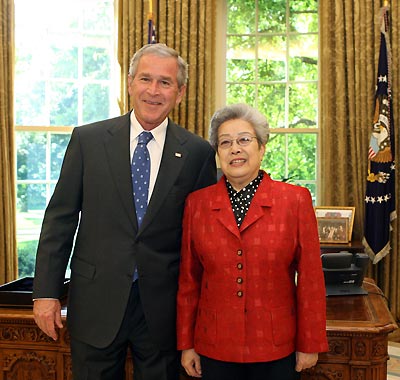 Chinese Vice Premier Wu Yi (R) meets with US President
George W. Bush in the White House, Washington, capital of US, May 24, 2007. Wu
Yi led a Chinese high-level delegation for the second meeting of China-U.S.
Strategic Economic Dialogue (SED). Bush says China-U.S. Strategic Economic
Dialogue "important" - U.S. President George W. Bush, at a White House press
conference on Thursday, said the just- concluded China-U.S. Strategic Economic
Dialogue is "important" and there has been some progress achieved at the
dialogue. "This is an important dialogue. And it's one that I thank the Chinese
government for engaging in," Bush said. Bush said he met with Chinese Vice
Premier Wu Yi in the White House Oval Office on Thursday, and asked her to pass
a message to Chinese President Hu Jintao that he appreciates China's willingness
"to work with strategic dialogues in order to put in place the type of measures
that reflect a complex relationship." Bush also said that the United States
values its relationship with China. The president made the remarks after the
second China-U.S. Strategic Economic Dialogue, co-chaired by Chinese Vice
Premier Wu Yi and U.S. Secretary of Treasury Henry Paulson, concluded on
Wednesday. During the two-day closed-door talks in Washington, top economic
officials from the two countries, including dozens of cabinet ministers,
discussed topics covering areas of service, investment and transparency, energy
and environment, as well as growth balance and innovation. Both sides reached
consensus on how to move forward in financial services, civil aviation, and
energy and environment, and signed a number of specific agreements. The United
States, by right of its competitive advantages, has become the biggest
beneficiary of the opening of services by China, Chinese Vice Premier Wu Yi said
in Washington Thursday. In the past five year, for example, shares held by
American financial institutions in Chinese banks have taken up nearly 40 percent
of the total FDI (foreign direct investment) used by China's banking industry,
Wu said while delivering a speech at a welcome banquet hosted by six American
organizations. According to Wu, the number of representative offices of American
law firms in China has accounted for nearly 45 percent of the total of overseas
firms, and their business revenues have accounted for more than 50 percent of
the aggregate. The number of American companies awarded a direct selling license
has been 55 percent of FIEs (foreign invested enterprises) in China. China has
imported 121 American movies on both lump-sum and revenue-sharing basis,
accounting for 52 percent of all films imported and the share of imported
American AV products has always been between 50 percent to 75 percent. Of the
nearly 50,000 American invested enterprises in China, over 90 percent have
obtained right to trading and to distribution, the vice premier said. Wu said
that the rapid development of services market in China and the notable
advantages of modern American services sector mean enormous cooperation
potential enjoyed by the two sides. "We agree to the U.S. proposal on developing
an innovative and effective services sector," she said. "But at the same time,
we want to draw the American attention to the fact that China is a developing
country, whose modern services industry starts late and is still at a very low
level." Further opening up of China's services sector can only be realized
steadily and safely in light of its national conditions and cannot be achieved
overnight, Wu said, adding "acting with undue haste will harm both sides'
interests instead." China is willing to strengthen cooperation with the United
States in services on the basis of equality, mutual benefit and complementarity,
addressing problems emerging from bilateral cooperation through consultation and
striving for a balanced outcome, the vice premier said. The six organizations
are the U.S.-China Business Council, the U.S. Chamber of Commerce, the China
General Chamber of Commerce-USA, the American Bankers Association, the American
Council of Life Insurers and Financial Services Forum.
Chinese Vice Premier Wu Yi (R) meets with US President
George W. Bush in the White House, Washington, capital of US, May 24, 2007. Wu
Yi led a Chinese high-level delegation for the second meeting of China-U.S.
Strategic Economic Dialogue (SED). Bush says China-U.S. Strategic Economic
Dialogue "important" - U.S. President George W. Bush, at a White House press
conference on Thursday, said the just- concluded China-U.S. Strategic Economic
Dialogue is "important" and there has been some progress achieved at the
dialogue. "This is an important dialogue. And it's one that I thank the Chinese
government for engaging in," Bush said. Bush said he met with Chinese Vice
Premier Wu Yi in the White House Oval Office on Thursday, and asked her to pass
a message to Chinese President Hu Jintao that he appreciates China's willingness
"to work with strategic dialogues in order to put in place the type of measures
that reflect a complex relationship." Bush also said that the United States
values its relationship with China. The president made the remarks after the
second China-U.S. Strategic Economic Dialogue, co-chaired by Chinese Vice
Premier Wu Yi and U.S. Secretary of Treasury Henry Paulson, concluded on
Wednesday. During the two-day closed-door talks in Washington, top economic
officials from the two countries, including dozens of cabinet ministers,
discussed topics covering areas of service, investment and transparency, energy
and environment, as well as growth balance and innovation. Both sides reached
consensus on how to move forward in financial services, civil aviation, and
energy and environment, and signed a number of specific agreements. The United
States, by right of its competitive advantages, has become the biggest
beneficiary of the opening of services by China, Chinese Vice Premier Wu Yi said
in Washington Thursday. In the past five year, for example, shares held by
American financial institutions in Chinese banks have taken up nearly 40 percent
of the total FDI (foreign direct investment) used by China's banking industry,
Wu said while delivering a speech at a welcome banquet hosted by six American
organizations. According to Wu, the number of representative offices of American
law firms in China has accounted for nearly 45 percent of the total of overseas
firms, and their business revenues have accounted for more than 50 percent of
the aggregate. The number of American companies awarded a direct selling license
has been 55 percent of FIEs (foreign invested enterprises) in China. China has
imported 121 American movies on both lump-sum and revenue-sharing basis,
accounting for 52 percent of all films imported and the share of imported
American AV products has always been between 50 percent to 75 percent. Of the
nearly 50,000 American invested enterprises in China, over 90 percent have
obtained right to trading and to distribution, the vice premier said. Wu said
that the rapid development of services market in China and the notable
advantages of modern American services sector mean enormous cooperation
potential enjoyed by the two sides. "We agree to the U.S. proposal on developing
an innovative and effective services sector," she said. "But at the same time,
we want to draw the American attention to the fact that China is a developing
country, whose modern services industry starts late and is still at a very low
level." Further opening up of China's services sector can only be realized
steadily and safely in light of its national conditions and cannot be achieved
overnight, Wu said, adding "acting with undue haste will harm both sides'
interests instead." China is willing to strengthen cooperation with the United
States in services on the basis of equality, mutual benefit and complementarity,
addressing problems emerging from bilateral cooperation through consultation and
striving for a balanced outcome, the vice premier said. The six organizations
are the U.S.-China Business Council, the U.S. Chamber of Commerce, the China
General Chamber of Commerce-USA, the American Bankers Association, the American
Council of Life Insurers and Financial Services Forum.
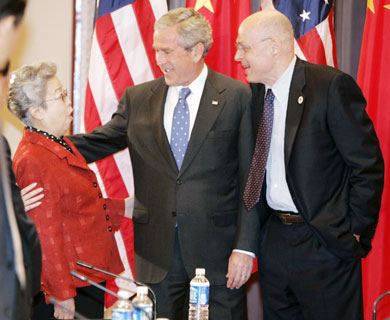 Any attempt to impose pressure on the Chinese currency,
the yuan or RMB, to force a considerable revaluation cannot help at all, Chinese
Vice-Premier Wu Yi said in Washington Thursday. Since China introduced a RMB
exchange rate reform in July, 2005, the new RMB exchange rate mechanism has been
functioning smoothly, said Wu while giving a speech at the welcome banquet
hosted by six American organizations. She said that the RMB has now appreciated
by 8.1 percent in cumulative terms. "I believe the floating band of the RMB
exchange rate will be constantly expanded with the market change," Wu said.
"China's exchange rate reform will be advanced in an orderly way under the
principle of self-initiative, controllability and gradual progress," she added.
Wu said that the elasticity of the RMB exchange rate will be continuously
increased through the reform, with a roughly stable RMB exchange rate maintained
at a reasonable equilibrium. "In the meantime, we must take measures to
effectively control and duly dispose of risks within the financial system," she
said. Wu said that it is recognized by many internationally renowned economists
that the RMB exchange rate is not the main cause of the huge U.S. trade deficit.
"Any attempt to impose pressure on the RMB for its considerable revaluation
cannot help at all and could probably injure the interests of the two countries
and the public," she stressed. The six organizations hosting the banquet are the
U.S.-China Business Council, the U.S. Chamber of Commerce, the China General
Chamber of Commerce-USA, the American Bankers Association, the American Council
of Life Insurers and the Financial Services Forum.
Any attempt to impose pressure on the Chinese currency,
the yuan or RMB, to force a considerable revaluation cannot help at all, Chinese
Vice-Premier Wu Yi said in Washington Thursday. Since China introduced a RMB
exchange rate reform in July, 2005, the new RMB exchange rate mechanism has been
functioning smoothly, said Wu while giving a speech at the welcome banquet
hosted by six American organizations. She said that the RMB has now appreciated
by 8.1 percent in cumulative terms. "I believe the floating band of the RMB
exchange rate will be constantly expanded with the market change," Wu said.
"China's exchange rate reform will be advanced in an orderly way under the
principle of self-initiative, controllability and gradual progress," she added.
Wu said that the elasticity of the RMB exchange rate will be continuously
increased through the reform, with a roughly stable RMB exchange rate maintained
at a reasonable equilibrium. "In the meantime, we must take measures to
effectively control and duly dispose of risks within the financial system," she
said. Wu said that it is recognized by many internationally renowned economists
that the RMB exchange rate is not the main cause of the huge U.S. trade deficit.
"Any attempt to impose pressure on the RMB for its considerable revaluation
cannot help at all and could probably injure the interests of the two countries
and the public," she stressed. The six organizations hosting the banquet are the
U.S.-China Business Council, the U.S. Chamber of Commerce, the China General
Chamber of Commerce-USA, the American Bankers Association, the American Council
of Life Insurers and the Financial Services Forum.
More than 1.9 million couples got divorced in China in
2006, an increase of 128,000 couples or 7 percent on the previous year, a report
said.
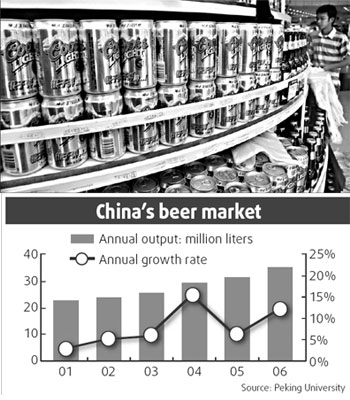 Beer firms
must focus on top end - To fend off international giants from gobbling up
Chinese market share, local beer makers need to produce profitable beers aimed
at the high-end market. There's no doubt the local premium beer market is the
key to long-tern growth: profits from one bottle of high-end beer are over 10
times of that of a low-end substitute. Additionally, market size is growing
rapidly. It's estimated that by the end of 2010, China will have the largest
middle-class in the world at over 490 million. Public entertainment venues,
including KTV, cafs and Western-style restaurants and bars, are the hottest
sellers of premium beers. Take Beijing's many bars, for example. There are about
500 bars in the capital, dotted around Sanlitun, Houhai, Chaoyang Park and
Weigongcun. A recent study shows about 70 percent of beer consumption takes
place in bars. Frequent bar visitors usually come from the middle-class. They
are around 35 years old, fashionable and generous spenders. Local beer producers
have been losing ground to international competitors in China's high-end market.
Their sales volume may be smaller, but international brands continue to grow in
China simply because they dominate the lucrative high-end market. They are also
strengthening efforts to increase their share of the pie. Companies such as
UK-based InBev and Canadian-based Molson Coors are launching their best-selling
premium brands in China and are seeking out mergers and acquisitions to increase
local market share. Their marketing strategy is simple but straightforward -
target the bars. The study indicates four major international breweries are best
sellers in Beijing's bars, and 90 percent of bars are selling all four brands,
including US-based Budweiser, Holland-based Heineken, Denmark-based Carlsberg,
and Mexico-based Corona. But local brands are trying to catch with their global
competitors. In 2005, two local brands - Tsingtao and Yanjing - entered the Top
10 World Brewery Brands list, ranking ninth and tenth place respectively. In
recent years, the top three local brands - Tsingtao, Yanjing and China Resources
Snow - have been leading the way by throwing huge sums of money into high-end
brands, which has lifted sales volume and revenue. Pearl River Beer, Harbin
Beer, Kingway Beer and Chongqing Beer have all followed with premium brands. But
there seems to be only a small difference between the high-end products and
other brands, and local beers sell for much less than international competitors.
More importantly, local brands haven't caught on in the bars and suffer from
weak marketing and promotional initiatives. According to the study, about 70
percent of Beijing's bars sell Tsingtao beer, and just 14 percent sell Yanjing
beer. There is always a misconception circling the brewery industry that says
local brands can't compete with international ones. This statement is false.
Local brands can eventually succeed through strategic and innovating marketing
campaigns. After all, there is little difference between the brewery techniques
of local and global brands. In terms of branding, local brewers should promote
unique taste, top-quality packaging and novelty brand names. Marketing
initiatives should be consistent and comprehensive. Prices should be set at the
average premium level, or offered at a higher price than international brands to
draw consumers' attention. Setting up at bars that only serve local brands'
high-end beers is another effective practice, although it is costly. From a
long-term perspective, the practice will drive profits and brand image as well.
Lastly, local manufactures should be trendsetters and create innovate lifestyle
concepts whenever launching a new product. The author is an expert in beer
marketing. Beer firms
must focus on top end - To fend off international giants from gobbling up
Chinese market share, local beer makers need to produce profitable beers aimed
at the high-end market. There's no doubt the local premium beer market is the
key to long-tern growth: profits from one bottle of high-end beer are over 10
times of that of a low-end substitute. Additionally, market size is growing
rapidly. It's estimated that by the end of 2010, China will have the largest
middle-class in the world at over 490 million. Public entertainment venues,
including KTV, cafs and Western-style restaurants and bars, are the hottest
sellers of premium beers. Take Beijing's many bars, for example. There are about
500 bars in the capital, dotted around Sanlitun, Houhai, Chaoyang Park and
Weigongcun. A recent study shows about 70 percent of beer consumption takes
place in bars. Frequent bar visitors usually come from the middle-class. They
are around 35 years old, fashionable and generous spenders. Local beer producers
have been losing ground to international competitors in China's high-end market.
Their sales volume may be smaller, but international brands continue to grow in
China simply because they dominate the lucrative high-end market. They are also
strengthening efforts to increase their share of the pie. Companies such as
UK-based InBev and Canadian-based Molson Coors are launching their best-selling
premium brands in China and are seeking out mergers and acquisitions to increase
local market share. Their marketing strategy is simple but straightforward -
target the bars. The study indicates four major international breweries are best
sellers in Beijing's bars, and 90 percent of bars are selling all four brands,
including US-based Budweiser, Holland-based Heineken, Denmark-based Carlsberg,
and Mexico-based Corona. But local brands are trying to catch with their global
competitors. In 2005, two local brands - Tsingtao and Yanjing - entered the Top
10 World Brewery Brands list, ranking ninth and tenth place respectively. In
recent years, the top three local brands - Tsingtao, Yanjing and China Resources
Snow - have been leading the way by throwing huge sums of money into high-end
brands, which has lifted sales volume and revenue. Pearl River Beer, Harbin
Beer, Kingway Beer and Chongqing Beer have all followed with premium brands. But
there seems to be only a small difference between the high-end products and
other brands, and local beers sell for much less than international competitors.
More importantly, local brands haven't caught on in the bars and suffer from
weak marketing and promotional initiatives. According to the study, about 70
percent of Beijing's bars sell Tsingtao beer, and just 14 percent sell Yanjing
beer. There is always a misconception circling the brewery industry that says
local brands can't compete with international ones. This statement is false.
Local brands can eventually succeed through strategic and innovating marketing
campaigns. After all, there is little difference between the brewery techniques
of local and global brands. In terms of branding, local brewers should promote
unique taste, top-quality packaging and novelty brand names. Marketing
initiatives should be consistent and comprehensive. Prices should be set at the
average premium level, or offered at a higher price than international brands to
draw consumers' attention. Setting up at bars that only serve local brands'
high-end beers is another effective practice, although it is costly. From a
long-term perspective, the practice will drive profits and brand image as well.
Lastly, local manufactures should be trendsetters and create innovate lifestyle
concepts whenever launching a new product. The author is an expert in beer
marketing.
People's Bank of China governor Zhou Xiaochuan said
yesterday that the government will not exercise any monetary restraints in the
near future. "The government needs time to observe the feedback of recent
policies before taking further measures to cool down the economy," Zhou told
reporters after meeting with the United States' senators during the U.S.-China
Strategic Economic Dialogue in Washington. Last Friday, the central bank raised
the benchmark one-year interest rate by 0.27 percentage points to 3.06 percent,
and one-year lending rate by 0.18 percentage points to 6.57 percent. It also
ordered commercial banks to set side 11.5 percent, of their deposits as
reserves, up from 11 percent. That marked the first simultaneous use of two
monetary tools in a decade, as well as the eighth increase in reserve ratio
since last July and fourth interest rate hike since last April. Also on Friday,
the reminbi's daily trading limit against the US dollar was widened to 0.5
percent from 0.3 percent. Undaunted by the latest tightening measures, Chinese
stocks has rebounded this week, though with strong daily up-and-downs. Xiang
Huaicheng, Chairman of the National Council for Social Security Fund, admitted
that the Chinese mainland's stock market has turned somewhat overheated
recently. "The bubbles exist", he said. "But the stock market is just like beer,
it is good to have some bubbles unless there are too many." However, he pointed
out that investors should be fully aware of the risksin the market.
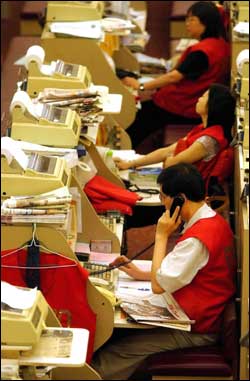 Chinese plans to
resume issuing licenses for securities ventures in the second half of this year
could allow a long line of foreign hopefuls to enter a market long tainted by
scandals and poor management. Since a huge, two-year overhaul of the country's
brokerage sector, hard lobbying for Beijing to allow foreign players to set up
brokerage joint ventures has largely fallen on deaf ears. But China heeded US
calls for further opening its financial sector during high-level talks in
Washington Wednesday, unveiling its intention to resume licensing for securities
firms, including joint ventures, this year. "It is very positive that China has
agreed to give foreign financial firms greater access to the booming domestic
market," said Jing Ulrich, managing director and chairman of China Equities at
JPMorgan. "Over time, this will help improve the efficiency and governance of
the Chinese brokerage industry," she said. Beijing was scant on detail and all
eyes will be on the speed at which the securities regulator allows in foreign
players. "We welcome the further opening of China's financial sector and look
forward to additional details regarding the new policy," said Hans Schuettler,
chief executive of Morgan Stanley Asia. Overseas players have long argued they
could help bring much-needed expertise to a domestic securities market famed for
its insider trading scandals and poor management. With a surging stock market,
the stakes are high. As of Monday, Chinese brokerages had already earned a total
of 66 billion yuan (HK$67.46 billion) in stock trading commissions this year,
according to the China Securities Journal - more than double the sum for all of
last year. Overseas banks looking for new sources of growth see a winning ticket
as long as they can get a toe-hold in a market benefiting from growing
investments by a nation of savers. Citigroup and Merrill Lynch are tipped to be
among the first beneficiaries of the fresh market opening, China watchers say.
Others circling China's brokerage market include HSBC (0005), Credit Suisse and
JPMorgan. Those already active in China and those looking to enter will watch
closely for signs that the authorities may lift investment caps in securities
joint ventures. Chinese plans to
resume issuing licenses for securities ventures in the second half of this year
could allow a long line of foreign hopefuls to enter a market long tainted by
scandals and poor management. Since a huge, two-year overhaul of the country's
brokerage sector, hard lobbying for Beijing to allow foreign players to set up
brokerage joint ventures has largely fallen on deaf ears. But China heeded US
calls for further opening its financial sector during high-level talks in
Washington Wednesday, unveiling its intention to resume licensing for securities
firms, including joint ventures, this year. "It is very positive that China has
agreed to give foreign financial firms greater access to the booming domestic
market," said Jing Ulrich, managing director and chairman of China Equities at
JPMorgan. "Over time, this will help improve the efficiency and governance of
the Chinese brokerage industry," she said. Beijing was scant on detail and all
eyes will be on the speed at which the securities regulator allows in foreign
players. "We welcome the further opening of China's financial sector and look
forward to additional details regarding the new policy," said Hans Schuettler,
chief executive of Morgan Stanley Asia. Overseas players have long argued they
could help bring much-needed expertise to a domestic securities market famed for
its insider trading scandals and poor management. With a surging stock market,
the stakes are high. As of Monday, Chinese brokerages had already earned a total
of 66 billion yuan (HK$67.46 billion) in stock trading commissions this year,
according to the China Securities Journal - more than double the sum for all of
last year. Overseas banks looking for new sources of growth see a winning ticket
as long as they can get a toe-hold in a market benefiting from growing
investments by a nation of savers. Citigroup and Merrill Lynch are tipped to be
among the first beneficiaries of the fresh market opening, China watchers say.
Others circling China's brokerage market include HSBC (0005), Credit Suisse and
JPMorgan. Those already active in China and those looking to enter will watch
closely for signs that the authorities may lift investment caps in securities
joint ventures.
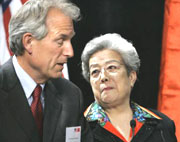 Chinese Vice Premier Wu
Yi, right, looks at chairman and CEO of Boeing and chairman of the China-US
Business Council Jim McNemey, left, as he reads her a question, during a dinner
reception in her honor on Friday. The agreements reached during the Strategic
Economic Dialogue talks between the mainland and the US in Washington this week
failed to placate critics in the US Senate, who lashed out at the moves as too
little too late. Many now advocate legislation to force the Bush administration
to impose sanctions on Beijing. "For years we have heard vague assurances of
greater market access for American financial institutions, but they rarely seem
to become reality from China," Democratic Senator Charles Schumer, a leading
critic of Beijing, said in a statement. "In addition, there is a glaring
omission to the White House press release: an eight-letter word, `currency'."
The two-day economic summit ended on Wednesday. US Secretary Treasury Henry
Paulson and Vice-Premier Wu Yi announced new agreements that will lift a ban on
new foreign firms and joint-ventures entering the mainland's securities industry
and allow overseas banks to offer yuan-denominated credit and debit cards.
Beijing will also raise the maximum limit for approved international investors
to purchase domestic Chinese stocks from US$10 billion to US$30 billion.
However, there was no accord on the appreciation of the yuan, although the
People's Bank of China did increase the trading band for the currency last week.
Democrat Max Baucus, the chairman of the Senate finance committee, expressed
"deep concern" that the currency issue was not addressed. While welcoming the
agreements, Democratic Senator Chris Dodd said significant discriminatory
policies remained that protected the mainland's financial sector from foreign
competition, such as restrictions on foreign banks offering full domestic
currency services. "These policies hinder the ability of US firms to compete in
China and to expand their market presence among a consumer population in need of
financial services, products and expertise," Senator Dodd said. The criticism of
the financial agreements follows intense negotiations during the dialogue
meetings, with Mr Paulson unsuccessfully seeking to persuade Beijing to lift the
25 per cent ceiling on foreign ownership of domestic banks. At a Senate security
and international trade and finance subcommittee session, Democratic Senator
Evan Bayh said the financial reforms, and particularly the appreciation of the
yuan, were symbolic and moving at a "glacial" pace and warned that Washington
must take action. "The Chinese don't seem to take us seriously," he said. The
senators said they would push legislation seeking to impose sanctions on the
mainland over the value of the yuan, which they said was undervalued by as much
as 40 per cent. Senator Dodd has asked the US Treasury Department to cite the
mainland as a currency manipulator. The designation would allow the US to impose
sanctions on imported Chinese goods.
Chinese Vice Premier Wu
Yi, right, looks at chairman and CEO of Boeing and chairman of the China-US
Business Council Jim McNemey, left, as he reads her a question, during a dinner
reception in her honor on Friday. The agreements reached during the Strategic
Economic Dialogue talks between the mainland and the US in Washington this week
failed to placate critics in the US Senate, who lashed out at the moves as too
little too late. Many now advocate legislation to force the Bush administration
to impose sanctions on Beijing. "For years we have heard vague assurances of
greater market access for American financial institutions, but they rarely seem
to become reality from China," Democratic Senator Charles Schumer, a leading
critic of Beijing, said in a statement. "In addition, there is a glaring
omission to the White House press release: an eight-letter word, `currency'."
The two-day economic summit ended on Wednesday. US Secretary Treasury Henry
Paulson and Vice-Premier Wu Yi announced new agreements that will lift a ban on
new foreign firms and joint-ventures entering the mainland's securities industry
and allow overseas banks to offer yuan-denominated credit and debit cards.
Beijing will also raise the maximum limit for approved international investors
to purchase domestic Chinese stocks from US$10 billion to US$30 billion.
However, there was no accord on the appreciation of the yuan, although the
People's Bank of China did increase the trading band for the currency last week.
Democrat Max Baucus, the chairman of the Senate finance committee, expressed
"deep concern" that the currency issue was not addressed. While welcoming the
agreements, Democratic Senator Chris Dodd said significant discriminatory
policies remained that protected the mainland's financial sector from foreign
competition, such as restrictions on foreign banks offering full domestic
currency services. "These policies hinder the ability of US firms to compete in
China and to expand their market presence among a consumer population in need of
financial services, products and expertise," Senator Dodd said. The criticism of
the financial agreements follows intense negotiations during the dialogue
meetings, with Mr Paulson unsuccessfully seeking to persuade Beijing to lift the
25 per cent ceiling on foreign ownership of domestic banks. At a Senate security
and international trade and finance subcommittee session, Democratic Senator
Evan Bayh said the financial reforms, and particularly the appreciation of the
yuan, were symbolic and moving at a "glacial" pace and warned that Washington
must take action. "The Chinese don't seem to take us seriously," he said. The
senators said they would push legislation seeking to impose sanctions on the
mainland over the value of the yuan, which they said was undervalued by as much
as 40 per cent. Senator Dodd has asked the US Treasury Department to cite the
mainland as a currency manipulator. The designation would allow the US to impose
sanctions on imported Chinese goods.
May 26 - 27, 2007
 Hong Kong:
Beijing Foreign Studies University (BFSU) students won the top prize at the
Third Chinese Universities Shakespeare Festival which ended yesterday at the
Chinese University of Hong Kong (CUHK). Of the twelve finalists from the
mainland, Hong Kong and Macao, the BFSU students came first with their
interpretation of 'Othello'. Lingnan University, the only finalist from Hong
Kong, was the first runner-up with their performance of 'The Taming of the
Shrew'. Macao Polytechnic University that staged the same drama was the second
runner-up. One of the judges of the festival, Chair Professor of English at
University of Wisconsin-Madison Susanne Wofford applauded the students, saying
that the productions were highly imaginative. "Some of the students conveyed an
incredible understanding of Shakespeare's drama through the use of Chinese
images and setting, which is a real mixture of intellectual capacity and drama,"
said Wofford. Besides bringing out young Chinese acting talents, the festival
also served as a platform for exchanges between students from Hong Kong, Macao
and mainland. "We learnt a great deal from the mainland participants, who
treated drama with the utmost respect and had taken their work very seriously,"
said Maggie Wang, Director of the Macao Polytechnic University's team.
Corroborating Wang, the students from Lingnan University noted that it was a
very special occasion for the young actors to participate in a national
competition and to learn from international professionals. "Drama has yet to
become an important part of our cultural programme, leave alone plays in
English," said Cyrus Tam. "The festival should hopefully introduce the genre to
more people, especially secondary school students." Director of the Lingnan
University's team, Associate Professor of English Mike Ingham, agreed that the
festival was a great opportunity to promote English drama in Hong Kong. "It's
not easy to get backing from local universities to organize a large-scale event
of this kind," said Ingham. "Most people see English drama as an imported art,
but it can be a part of our culture." The winners from Beijing will get an
all-expense-paid trip to London in August, while other winners have been awarded
prizes donated by Shun Hing Education and Charity Fund. Hong Kong:
Beijing Foreign Studies University (BFSU) students won the top prize at the
Third Chinese Universities Shakespeare Festival which ended yesterday at the
Chinese University of Hong Kong (CUHK). Of the twelve finalists from the
mainland, Hong Kong and Macao, the BFSU students came first with their
interpretation of 'Othello'. Lingnan University, the only finalist from Hong
Kong, was the first runner-up with their performance of 'The Taming of the
Shrew'. Macao Polytechnic University that staged the same drama was the second
runner-up. One of the judges of the festival, Chair Professor of English at
University of Wisconsin-Madison Susanne Wofford applauded the students, saying
that the productions were highly imaginative. "Some of the students conveyed an
incredible understanding of Shakespeare's drama through the use of Chinese
images and setting, which is a real mixture of intellectual capacity and drama,"
said Wofford. Besides bringing out young Chinese acting talents, the festival
also served as a platform for exchanges between students from Hong Kong, Macao
and mainland. "We learnt a great deal from the mainland participants, who
treated drama with the utmost respect and had taken their work very seriously,"
said Maggie Wang, Director of the Macao Polytechnic University's team.
Corroborating Wang, the students from Lingnan University noted that it was a
very special occasion for the young actors to participate in a national
competition and to learn from international professionals. "Drama has yet to
become an important part of our cultural programme, leave alone plays in
English," said Cyrus Tam. "The festival should hopefully introduce the genre to
more people, especially secondary school students." Director of the Lingnan
University's team, Associate Professor of English Mike Ingham, agreed that the
festival was a great opportunity to promote English drama in Hong Kong. "It's
not easy to get backing from local universities to organize a large-scale event
of this kind," said Ingham. "Most people see English drama as an imported art,
but it can be a part of our culture." The winners from Beijing will get an
all-expense-paid trip to London in August, while other winners have been awarded
prizes donated by Shun Hing Education and Charity Fund.
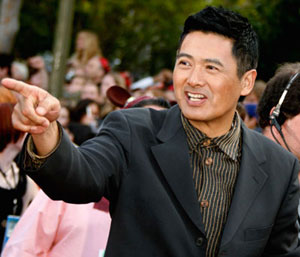 International
action star and heartthrob Chow Yun-Fat, who plays the pirate lord Captain Sao
Feng in "Pirates of the Caribbean: At World's End," says he'd like to snag a
leading-man role in a Hollywood drama or romance but is getting lost in
translation. Chow, whose acting range and stature in Asia have been compared
with that of Robert De Niro, voiced frustration at racial barriers that persist
in America's movie industry. "Honestly, I prefer (to do) more dramas. In
American society ... Asian actors are not accepted as leading men," he said in
an interview last week for the "Pirates" publicity tour. "Maybe we have to wait
for a few more years." "Pirates" director Gore Verbinski said that as soon as
the writers decided the plot would take the film to Singapore, he knew he would
try to cast Chow. "Once we knew that, there was nobody else," Verbinski said. "Yun-Fat
is a living legend." The 51-year-old Hong Kong actor is known to Asian audiences
as a cross between Cary Grant and James Bond, but in Hollywood he has had
trouble moving beyond the period films like "Anna and the King" and martial arts
fare like "Crouching Tiger, Hidden Dragon" that U.S. audiences know best. "He
has experienced a glass ceiling in Hollywood," said filmmaker Jeff Adachi, who
explored the topic in his PBS documentary "The Slanted Screen." "The tragedy is
that there are roles that should be offered to Asian leading men but people are
not used to seeing that ... so it's something that studios are not willing to
invest in," Adachi said. SILENT FILM PHENOMENON - The first Asian actor to
achieve stardom rivaling that of Caucasian actors in U.S. films was Japanese
actor Sessue Hayakawa, who became a silent film phenomenon after his turn as a
merchant who extorts a white woman to have an affair with him, then brands her
when she tries to leave him, in Cecil B. DeMille's "The Cheat" in 1915. The role
propelled Hayakawa to silent film superstardom, and saw him playing romantic
leads frequently opposite white actresses, said Stephen Gong, executive director
of the Center for Asian American Media in San Francisco. "The amazing thing that
happened is that suddenly Hayakawa overnight became a huge star and his fan base
was American women," Gong said. "They didn't know what to make of him."
Hawaiian-born actor James Shigeta also broke the racial barrier in the late
1950s and 1960 with leading roles including "Bridge to the Sun," opposite
Carroll Baker and the 1961 musical "Flower Drum Song." But those roles have been
less plentiful than "Yellow Peril" villain roles, such as Ming the Merciless
from "Flash Gordon," "asexual beings" like the comic character Long Duk Dong
from "Sixteen Candles," or martial arts roles made popular by Hong Kong imports
Jackie Chan and Jet Li, Adachi said. Film historian David Thomson said that
while Chow has a shot at landing dramatic roles of the type popularized by
action star Harrison Ford, he still faces an uphill struggle for romantic leads.
"We break down these barriers very slowly and I don't think we are doing we are
doing it quickly enough to encourage an actor like Chow to think he will get
away with it," Thomson said. "I think there is a great deal of racism in the
country too." International
action star and heartthrob Chow Yun-Fat, who plays the pirate lord Captain Sao
Feng in "Pirates of the Caribbean: At World's End," says he'd like to snag a
leading-man role in a Hollywood drama or romance but is getting lost in
translation. Chow, whose acting range and stature in Asia have been compared
with that of Robert De Niro, voiced frustration at racial barriers that persist
in America's movie industry. "Honestly, I prefer (to do) more dramas. In
American society ... Asian actors are not accepted as leading men," he said in
an interview last week for the "Pirates" publicity tour. "Maybe we have to wait
for a few more years." "Pirates" director Gore Verbinski said that as soon as
the writers decided the plot would take the film to Singapore, he knew he would
try to cast Chow. "Once we knew that, there was nobody else," Verbinski said. "Yun-Fat
is a living legend." The 51-year-old Hong Kong actor is known to Asian audiences
as a cross between Cary Grant and James Bond, but in Hollywood he has had
trouble moving beyond the period films like "Anna and the King" and martial arts
fare like "Crouching Tiger, Hidden Dragon" that U.S. audiences know best. "He
has experienced a glass ceiling in Hollywood," said filmmaker Jeff Adachi, who
explored the topic in his PBS documentary "The Slanted Screen." "The tragedy is
that there are roles that should be offered to Asian leading men but people are
not used to seeing that ... so it's something that studios are not willing to
invest in," Adachi said. SILENT FILM PHENOMENON - The first Asian actor to
achieve stardom rivaling that of Caucasian actors in U.S. films was Japanese
actor Sessue Hayakawa, who became a silent film phenomenon after his turn as a
merchant who extorts a white woman to have an affair with him, then brands her
when she tries to leave him, in Cecil B. DeMille's "The Cheat" in 1915. The role
propelled Hayakawa to silent film superstardom, and saw him playing romantic
leads frequently opposite white actresses, said Stephen Gong, executive director
of the Center for Asian American Media in San Francisco. "The amazing thing that
happened is that suddenly Hayakawa overnight became a huge star and his fan base
was American women," Gong said. "They didn't know what to make of him."
Hawaiian-born actor James Shigeta also broke the racial barrier in the late
1950s and 1960 with leading roles including "Bridge to the Sun," opposite
Carroll Baker and the 1961 musical "Flower Drum Song." But those roles have been
less plentiful than "Yellow Peril" villain roles, such as Ming the Merciless
from "Flash Gordon," "asexual beings" like the comic character Long Duk Dong
from "Sixteen Candles," or martial arts roles made popular by Hong Kong imports
Jackie Chan and Jet Li, Adachi said. Film historian David Thomson said that
while Chow has a shot at landing dramatic roles of the type popularized by
action star Harrison Ford, he still faces an uphill struggle for romantic leads.
"We break down these barriers very slowly and I don't think we are doing we are
doing it quickly enough to encourage an actor like Chow to think he will get
away with it," Thomson said. "I think there is a great deal of racism in the
country too."
The government Wednesday won the
first round of its battle to dismantle and relocate Queen's Pier when the
Legislative Council's public works subcommittee approved its request for HK$50
million to do the job.
Pavements
along Mong Kok's famous Tung Choi Street - one of Hong Kong's most popular open
bazaars - are to be widened under an ambitious program to improve and upgrade
major shopping areas in the district.
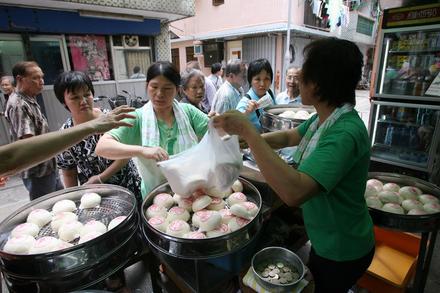 Fresh buns, with characters denoting peace and safety, are sold on Cheung Chau -
Cheung Chau's bakers have been busy churning out thousands of fresh buns for
today's festival after rain in the past few days ruined about 20,000 of them. As
skies cleared yesterday, the festival's committee chairman, Yung Chi-ming, said
he expected the festivities to run smoothly despite a forecast of a few showers
for today and a few thunderstorms tomorrow. Heavy rain earlier in the week
damaged buns stacked on three towers outside the Pak Tai Temple for distribution
to the public. "We have made another 6,000 fresh buns to replace the loss and we
will give them away at 8am on Friday," Mr Yung said. Bakers and owners of
holiday villas are crossing their fingers that the mixed weather won't keep away
festival visitors who usually give their businesses a boost. One of the two
master bakers on the island, Kwok Kam-chuen, said yesterday he had already made
20,000 buns and was making more for customers who are expected to form long
queues outside the bakery today. "As we have for the past, we keep making fresh
festive buns for people. The business has been good these past two days and I
expect it will get even better [today]." Mr Kwok, who sells the buns for HK$5
each, said not everyone bought the buns to eat, as many would buy one or two to
perform rituals at the temple. The buns - round and white, with red characters
on top denoting peace and safety - are an essential part of the Tai Ping Qing
Jiao festival, which began to pacify spirits believed to haunt the island after
an outbreak of the plague in 1894. The 70 rooms in the Warwick Hotel - the only
hotel on Cheung Chau - are booked out, with the earliest reservation made two
months ago. Agents for holiday villas say about 90 per cent of their
accommodation has been let. The main event, the parade featuring children in
colourful costumes "floating" above the crowd on concealed poles starts at 2pm.
It will climax at midnight with the bun-scrambling competition in which 12
individuals and eight teams - including entrants from Shenzhen, Guangdong and
Macau - will set out to grab the most plastic buns from a steel tower next to
the three towers bearing the real buns. The 15-metre tower is decorated with
8,000 plastic replicas, which are being used for the first time this year. A
crowd of 1,500 will receive tickets to enter the Pak Tai Temple playground where
the competition will be held. Up to 1,000 people will be able to watch it on a
big screen at the Cheung Chau Sports Centre. There will be extra ferry sailings
after midnight when visitors leave after watching the bun scramble.
Fresh buns, with characters denoting peace and safety, are sold on Cheung Chau -
Cheung Chau's bakers have been busy churning out thousands of fresh buns for
today's festival after rain in the past few days ruined about 20,000 of them. As
skies cleared yesterday, the festival's committee chairman, Yung Chi-ming, said
he expected the festivities to run smoothly despite a forecast of a few showers
for today and a few thunderstorms tomorrow. Heavy rain earlier in the week
damaged buns stacked on three towers outside the Pak Tai Temple for distribution
to the public. "We have made another 6,000 fresh buns to replace the loss and we
will give them away at 8am on Friday," Mr Yung said. Bakers and owners of
holiday villas are crossing their fingers that the mixed weather won't keep away
festival visitors who usually give their businesses a boost. One of the two
master bakers on the island, Kwok Kam-chuen, said yesterday he had already made
20,000 buns and was making more for customers who are expected to form long
queues outside the bakery today. "As we have for the past, we keep making fresh
festive buns for people. The business has been good these past two days and I
expect it will get even better [today]." Mr Kwok, who sells the buns for HK$5
each, said not everyone bought the buns to eat, as many would buy one or two to
perform rituals at the temple. The buns - round and white, with red characters
on top denoting peace and safety - are an essential part of the Tai Ping Qing
Jiao festival, which began to pacify spirits believed to haunt the island after
an outbreak of the plague in 1894. The 70 rooms in the Warwick Hotel - the only
hotel on Cheung Chau - are booked out, with the earliest reservation made two
months ago. Agents for holiday villas say about 90 per cent of their
accommodation has been let. The main event, the parade featuring children in
colourful costumes "floating" above the crowd on concealed poles starts at 2pm.
It will climax at midnight with the bun-scrambling competition in which 12
individuals and eight teams - including entrants from Shenzhen, Guangdong and
Macau - will set out to grab the most plastic buns from a steel tower next to
the three towers bearing the real buns. The 15-metre tower is decorated with
8,000 plastic replicas, which are being used for the first time this year. A
crowd of 1,500 will receive tickets to enter the Pak Tai Temple playground where
the competition will be held. Up to 1,000 people will be able to watch it on a
big screen at the Cheung Chau Sports Centre. There will be extra ferry sailings
after midnight when visitors leave after watching the bun scramble.
 China: NATO
Secretary General Jaap de Hoop Scheffer said on Wednesday in Taranto that the
relations between the North Atlantic Treaty Organization (NATO) and China are
developing "very well." The NATO chief made the remarks on the USS Roosevelt
missile destroyer after a NATO naval force conducted an anti-terrorist
demonstration in the Mediterranean Sea close to the Southern Italian city of
Taranto. Answering a Xinhua question at a press conference, Scheffer said NATO's
relations with Chinese diplomats in Brussels are developing "in a positive
manner," and the NATO-China relations are developing "very well." "China is an
important nation, we do not neglect China and China does not neglect NATO," he
said. On the question of whether NATO might invite Chinese navy to participate
in NATO's military exercise just as it invited Russian and Ukrainian navies last
year and this year, Scheffer explained the differences. He said both Russia and
Ukraine are NATO's partnership countries, but China is not. "I do not expect at
this stage any invitation on our side," he said. However, NATO has always sent
friendly signal to China aiming to improve bilateral relations, citing its
invitation of the Chinese media to cover the military demonstration as an
example. "Your presence here is the best example," Scheffer said.
China: NATO
Secretary General Jaap de Hoop Scheffer said on Wednesday in Taranto that the
relations between the North Atlantic Treaty Organization (NATO) and China are
developing "very well." The NATO chief made the remarks on the USS Roosevelt
missile destroyer after a NATO naval force conducted an anti-terrorist
demonstration in the Mediterranean Sea close to the Southern Italian city of
Taranto. Answering a Xinhua question at a press conference, Scheffer said NATO's
relations with Chinese diplomats in Brussels are developing "in a positive
manner," and the NATO-China relations are developing "very well." "China is an
important nation, we do not neglect China and China does not neglect NATO," he
said. On the question of whether NATO might invite Chinese navy to participate
in NATO's military exercise just as it invited Russian and Ukrainian navies last
year and this year, Scheffer explained the differences. He said both Russia and
Ukraine are NATO's partnership countries, but China is not. "I do not expect at
this stage any invitation on our side," he said. However, NATO has always sent
friendly signal to China aiming to improve bilateral relations, citing its
invitation of the Chinese media to cover the military demonstration as an
example. "Your presence here is the best example," Scheffer said.
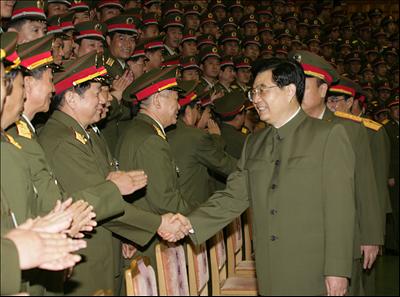 Chinese President Hu Jintao,who is also chairman of the
Central Military Commission, meets delegates to the Beijing Military Area
Command's ninth congress of the Communist Party of China, in Beijing, capital of
China.
Chinese President Hu Jintao,who is also chairman of the
Central Military Commission, meets delegates to the Beijing Military Area
Command's ninth congress of the Communist Party of China, in Beijing, capital of
China.
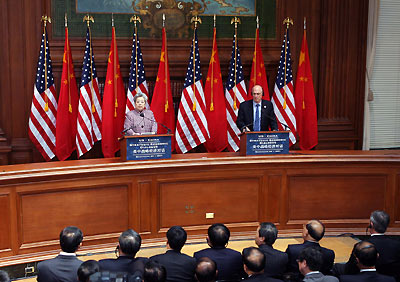 Chinese Vice
Premier Wu Yi (L) and US Treasury Secretary Henry Paulson deliver statements at
the conclusion of the second meeting of the China-US Strategic Economic Dialogue
in Washington, capital of U.S., May 23, 2007. US Treasury Secretary Henry
Paulson, ending a meeting with China's top economic leaders, said the
negotiations had produced "tangible results" including agreement on financial
services and aviation that would help build confidence in bilateral trade ties.
His counterpart, Vice-Premier Wu Yi , called the two days of top-level talks a
"great success". "While we have much more work to do, we have tangible results
for our efforts thus far," Mr Paulson said at the end of the two-day "strategic
economic dialogue". Ms Wu said the high-powered lineup of officials representing
each side in the talks showed the importance the countries attached to
maintaining an ongoing dialogue. She again called for the United States to
rebuff protectionist trade pressures. "The China-US economic and trade
relationship is one of the most complicated in today's world," Ms Wu said. "It
calls for direct consultation and dialogue between us, instead of easy resort to
threat or sanctions. "Secretary Paulson and myself have the responsibility and
courage to carry out the important task of [removing] barriers of all kinds and
[making] the strategic economic dialogue a genuine, important platform for
China-US economic trade relations and overall bilateral relations to grow." The
strategic-level talks began in Beijing last year. The "tangible results" to
which Mr Paulson referred included greater access for US firms to the coveted
mainland financial sector. Beijing will remove a bar on new foreign securities
firms and resume licensing securities companies, including joint ventures, in
the second half of this year, the US Treasury said. Beijing also agreed to allow
foreign securities firms to expand their operations on the mainland to include
brokerage, proprietary trading and fund management, the Treasury said. Mr
Paulson said: "[We] spent a lot of time talking about financial and capital
markets. One of the points I made is that China has come a long way on its
economy. It has achieved meaningful reform of financial markets but this is not
reflective of the overall economy." Mr Paulson made no mention of progress on
achieving a stronger exchange rate for the yuan, the main bone of contention
among US lawmakers, but he emphasised that the "real test of flexibility on the
yuan is whether it moves on a daily basis and over time". "The way I think about
it is this - the Chinese clearly see the need and stated in principle the need
for greater [yuan] flexibility," he said. Legislators have pledged to proceed
with sanctions on Chinese imports unless the yuan climbs faster than its 8 per
cent gain against the dollar since July 2005. Mr Paulson said both sides agreed
on the need for China to "rebalance its economic growth, encourage consumption
and spread development more broadly among its people". The US trade deficit with
China, which reached a record US$232.5 billion last year, is fuelling complaints
in the Congress that the US is becoming a dumping ground for China's excess
production, harming American businesses. Ms Wu will today meet President George
W. Bush at the White House, and members of the US Congress. What was agreed: 1)
China to allow foreign securities firms to expand their activities, including
brokerage, proprietary trading and fund management 2) China to raise the quota
for Qualified Foreign Institutional Investors from US$10 billion to US$30
billion 3) Foreign-invested banks to be allowed to offer own-brand, yuan-denominated
credit and debit cards 4) US, China to develop up to 15 coal-mine methane
capture plants 5) Enforcement of intellectual property rights laws to be
strengthened through exchange of information on fake-goods seizures and dialogue
among customs officers on both sides 6) Both sides committed to further
liberalising air services rights and signed a declaration of intent to negotiate
facilitating Chinese group tours to US. Chinese Vice
Premier Wu Yi (L) and US Treasury Secretary Henry Paulson deliver statements at
the conclusion of the second meeting of the China-US Strategic Economic Dialogue
in Washington, capital of U.S., May 23, 2007. US Treasury Secretary Henry
Paulson, ending a meeting with China's top economic leaders, said the
negotiations had produced "tangible results" including agreement on financial
services and aviation that would help build confidence in bilateral trade ties.
His counterpart, Vice-Premier Wu Yi , called the two days of top-level talks a
"great success". "While we have much more work to do, we have tangible results
for our efforts thus far," Mr Paulson said at the end of the two-day "strategic
economic dialogue". Ms Wu said the high-powered lineup of officials representing
each side in the talks showed the importance the countries attached to
maintaining an ongoing dialogue. She again called for the United States to
rebuff protectionist trade pressures. "The China-US economic and trade
relationship is one of the most complicated in today's world," Ms Wu said. "It
calls for direct consultation and dialogue between us, instead of easy resort to
threat or sanctions. "Secretary Paulson and myself have the responsibility and
courage to carry out the important task of [removing] barriers of all kinds and
[making] the strategic economic dialogue a genuine, important platform for
China-US economic trade relations and overall bilateral relations to grow." The
strategic-level talks began in Beijing last year. The "tangible results" to
which Mr Paulson referred included greater access for US firms to the coveted
mainland financial sector. Beijing will remove a bar on new foreign securities
firms and resume licensing securities companies, including joint ventures, in
the second half of this year, the US Treasury said. Beijing also agreed to allow
foreign securities firms to expand their operations on the mainland to include
brokerage, proprietary trading and fund management, the Treasury said. Mr
Paulson said: "[We] spent a lot of time talking about financial and capital
markets. One of the points I made is that China has come a long way on its
economy. It has achieved meaningful reform of financial markets but this is not
reflective of the overall economy." Mr Paulson made no mention of progress on
achieving a stronger exchange rate for the yuan, the main bone of contention
among US lawmakers, but he emphasised that the "real test of flexibility on the
yuan is whether it moves on a daily basis and over time". "The way I think about
it is this - the Chinese clearly see the need and stated in principle the need
for greater [yuan] flexibility," he said. Legislators have pledged to proceed
with sanctions on Chinese imports unless the yuan climbs faster than its 8 per
cent gain against the dollar since July 2005. Mr Paulson said both sides agreed
on the need for China to "rebalance its economic growth, encourage consumption
and spread development more broadly among its people". The US trade deficit with
China, which reached a record US$232.5 billion last year, is fuelling complaints
in the Congress that the US is becoming a dumping ground for China's excess
production, harming American businesses. Ms Wu will today meet President George
W. Bush at the White House, and members of the US Congress. What was agreed: 1)
China to allow foreign securities firms to expand their activities, including
brokerage, proprietary trading and fund management 2) China to raise the quota
for Qualified Foreign Institutional Investors from US$10 billion to US$30
billion 3) Foreign-invested banks to be allowed to offer own-brand, yuan-denominated
credit and debit cards 4) US, China to develop up to 15 coal-mine methane
capture plants 5) Enforcement of intellectual property rights laws to be
strengthened through exchange of information on fake-goods seizures and dialogue
among customs officers on both sides 6) Both sides committed to further
liberalising air services rights and signed a declaration of intent to negotiate
facilitating Chinese group tours to US.
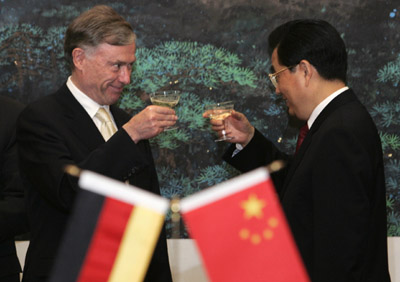 China's President Hu Jintao (R) and Germany's
President Horst Koehler toast during a signing ceremony at the Great Hall of the
People in Beijing May 24, 2007.
China's President Hu Jintao (R) and Germany's
President Horst Koehler toast during a signing ceremony at the Great Hall of the
People in Beijing May 24, 2007.
Passenger
flights between the United States and China would more than double by 2012 under
an agreement between the two countries on Wednesday, good news for the biggest
US airlines aiming to shake their domestic woes. The announcement by the
Transportation and Treasury departments at the conclusion of a US-China economic
forum is the second important international aviation services agreement sealed
by the Bush administration in recent months. Earlier this spring, the United
States and the European Union agreed to further open transatlantic service to
more competition, a deal that favored overseas rivals but still could mean more
business to London and other key destinations for American carriers. The China
agreement was a small surprise after transportation regulators recently
concluded that full liberalization or "open skies" would have to wait. The US
aviation sector dwarfs its Chinese counterpart. The two sides will resume talks
in 2010 on a timetable for "open skies." "Piece by piece, we are making it
easier, cheaper, and more convenient to fly people and ship goods between our
two countries," Transportation Secretary Mary Peters said in a statement.
Chinese officials did not comment immediately on the agreement but China would
be allowed the same number of daily round-trips as US carriers, US
transportation officials said. The Transportation Department estimated the
increased service would be worth $5 billion to US airlines, especially those
that will be able to capitalize on flights to the 2008 summer Olympic Games in
Beijing. US carriers currently fly to Beijing; Shanghai, the leading financial
center, and Guangzhou, a prosperous southern commercial city. Under the new
agreement, the number of daily round-trip flights will jump to 23 from the
current 10 within five years. One flight will be awarded this year and next
followed by four in 2009, three in 2010 and two each in 2011 and 2012. The 2008
service will be limited to Guangzhou. The United States will designate three
additional passenger carriers to fly to China - one in 2007 and two in 2009.
Transportation officials said the 2007 slot would go to an airline that
currently does not fly to China. The agreement would also knock down barriers to
cargo service by 2011, a boost for FedEx and UPS. Currently, United Airlines,
American Airlines, Continental Airlines and Northwest Airlines offer passenger
service to China. American, Northwest, United and Delta Air Lines immediately
welcomed the announcement in separate statements. All would like more
international flying to offset weakness in domestic performance due to stepped
up competition and sharply lower fares. Delta wants to fly from its Atlanta hub
to Shanghai. US Airways also intends to seek service. Neither currently flies to
China. Transportation officials said they would move as quickly as possible to
award the 2007 slot, possibly this summer.
 World famous Chinese
actor Zhang Ziyi is expected to play a supporting role in a film about Peking
Opera legend Mei Lanfang. Zhang Ziyi will play the role of Meng Xiaodong, a
female friend and rumored lover of Mei Lanfang. Whilst the films director Chen
Kaige has met with the actress during the Cannes Film Festival in France. He
said it would "take some time" before a final agreement is reached. Another
Chinese actor, Chen Hong, also the wife of the director, will play the heroine,
or wife of the renowned artist. Three actors of different ages, including Hong
Kong star Leon Lai, will portray the life story of Mei Lanfang. All the cast
members will undergo training in performing Peking Opera before the film starts
shooting in the second half of the year. World famous Chinese
actor Zhang Ziyi is expected to play a supporting role in a film about Peking
Opera legend Mei Lanfang. Zhang Ziyi will play the role of Meng Xiaodong, a
female friend and rumored lover of Mei Lanfang. Whilst the films director Chen
Kaige has met with the actress during the Cannes Film Festival in France. He
said it would "take some time" before a final agreement is reached. Another
Chinese actor, Chen Hong, also the wife of the director, will play the heroine,
or wife of the renowned artist. Three actors of different ages, including Hong
Kong star Leon Lai, will portray the life story of Mei Lanfang. All the cast
members will undergo training in performing Peking Opera before the film starts
shooting in the second half of the year.
Bank of China (3988), the second-
largest lender in the mainland, said Wednesday it is confident the
diversification of its business will help offset the adverse effects caused by
Beijing's tightening measures, as the bank has recorded robust growth in
non-interest income in the first four months.
Lenovo Group (0992), which recently
slipped down one place in the personal computer stakes to fourth, said its net
profit for the year to the end of March jumped more than sixfold to US$161
million (HK$1.25 billion), thanks to improvement in sales and restructuring
costs.
Shanghai Media Group, China's
second-largest media group by revenue, is expected to launch next week the
country's first TV service broadcast directly to mobile phones, sources said.
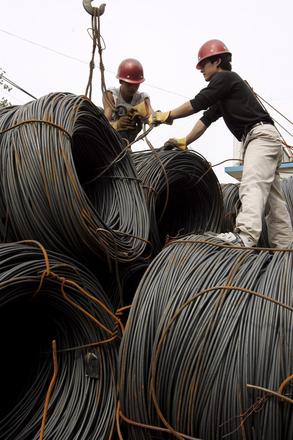 China produces more steel than the
US, Russia and Japan combined. These workers are loading steel cables onto a
truck in Beijing - Huang Yong, the top economic-policy official in Zhejiang
province , boasts of the prosperity that textile and shoe manufacturing have
brought to his area. And that's just the beginning - no matter what the
officials who met in Washington this week might think - he said in an interview
at a tea house in Hangzhou . The next step is developing industries like
petrochemicals, pharmaceuticals and steel. Such aspirations, typical of Mr
Huang's counterparts throughout mainland China, frustrate Beijing's efforts to
slow expansion in industries that are plagued with overcapacity. Too much
investment in unneeded factories may lead to lower profits, national financial
instability and increased tensions with the US. "As long as producers have the
support of local governments, who are most worried about employment and growth
in their own backyards, they will find ways to put the central government off,"
said Jonathan Anderson, chief Asia economist for UBS in Hong Kong. As
Vice-Premier Wu Yi was on her way to Washington, the Finance Ministry announced
an export tax of as much as 15 per cent on steel slabs and 10 per cent on steel
wire and rods to reduce exports of "energy consuming, polluting and
resource-intensive products". But Tom Danjczek, the president of the
Washington-based Steel Manufacturers Association, said he did not expect the tax
to do much to curb overproduction. "Will the tax possibly close any of the
inefficient 60 to 80 million tons of subsidized capacity?" he said. "Probably
not." Since 2003 the central government has been trying to reduce overcapacity
in industries including steel, aluminium, cement and cars, creating a list of
"no go" sectors where investment would be restricted. The plan has not worked.
"It's difficult to think of a single sector where the moratorium on investment
approvals was actually effective," UBS analysts said in August. Over the past
three years, mainland authorities have tightened lending and closed smaller,
inefficient steel mills, efforts they predict will eliminate 35 million tonnes
of capacity this year. In reality, mainland China will not only replace that
amount, but add another 70 million tonnes this year, bringing total steelmaking
capacity to 591 million tonnes, according to a forecast by CBI Research &
Consulting in Shanghai. By comparison, total US capacity this year will be about
115 million tonnes, according to the Steel Manufacturers Association, which
represents 45 mainly North American steel manufacturers. Beijing's ambitions in
steelmaking date back to the 1950s, when backyard mills were part of Mao
Zedong's "Great Leap Forward". Now, mainland China's modern mills turn out more
than the US, Japan and Russia combined. "China has more unused capacity than we
have capacity," Mr Danjczek said. More is being added. Baosteel Group, the
mainland's biggest steelmaker, and Handan Iron & Steel Group plan to build a
19-billion-yuan plant in Handan , Hebei province , to boost production. "China's
steel industry has no concept of profits and costs, and is only interested in
creating jobs," said Daniel Dimicco, chairman of Nucor Corp, the second-largest
US steelmaker. "In many product categories it has destroyed pricing." The
aluminium industry looks much the same. Investment in smelting more than doubled
this year, and the National Development and Reform Commission reiterated last
month plans to halt construction on new plants that breach rules designed to
curb overcapacity.
China produces more steel than the
US, Russia and Japan combined. These workers are loading steel cables onto a
truck in Beijing - Huang Yong, the top economic-policy official in Zhejiang
province , boasts of the prosperity that textile and shoe manufacturing have
brought to his area. And that's just the beginning - no matter what the
officials who met in Washington this week might think - he said in an interview
at a tea house in Hangzhou . The next step is developing industries like
petrochemicals, pharmaceuticals and steel. Such aspirations, typical of Mr
Huang's counterparts throughout mainland China, frustrate Beijing's efforts to
slow expansion in industries that are plagued with overcapacity. Too much
investment in unneeded factories may lead to lower profits, national financial
instability and increased tensions with the US. "As long as producers have the
support of local governments, who are most worried about employment and growth
in their own backyards, they will find ways to put the central government off,"
said Jonathan Anderson, chief Asia economist for UBS in Hong Kong. As
Vice-Premier Wu Yi was on her way to Washington, the Finance Ministry announced
an export tax of as much as 15 per cent on steel slabs and 10 per cent on steel
wire and rods to reduce exports of "energy consuming, polluting and
resource-intensive products". But Tom Danjczek, the president of the
Washington-based Steel Manufacturers Association, said he did not expect the tax
to do much to curb overproduction. "Will the tax possibly close any of the
inefficient 60 to 80 million tons of subsidized capacity?" he said. "Probably
not." Since 2003 the central government has been trying to reduce overcapacity
in industries including steel, aluminium, cement and cars, creating a list of
"no go" sectors where investment would be restricted. The plan has not worked.
"It's difficult to think of a single sector where the moratorium on investment
approvals was actually effective," UBS analysts said in August. Over the past
three years, mainland authorities have tightened lending and closed smaller,
inefficient steel mills, efforts they predict will eliminate 35 million tonnes
of capacity this year. In reality, mainland China will not only replace that
amount, but add another 70 million tonnes this year, bringing total steelmaking
capacity to 591 million tonnes, according to a forecast by CBI Research &
Consulting in Shanghai. By comparison, total US capacity this year will be about
115 million tonnes, according to the Steel Manufacturers Association, which
represents 45 mainly North American steel manufacturers. Beijing's ambitions in
steelmaking date back to the 1950s, when backyard mills were part of Mao
Zedong's "Great Leap Forward". Now, mainland China's modern mills turn out more
than the US, Japan and Russia combined. "China has more unused capacity than we
have capacity," Mr Danjczek said. More is being added. Baosteel Group, the
mainland's biggest steelmaker, and Handan Iron & Steel Group plan to build a
19-billion-yuan plant in Handan , Hebei province , to boost production. "China's
steel industry has no concept of profits and costs, and is only interested in
creating jobs," said Daniel Dimicco, chairman of Nucor Corp, the second-largest
US steelmaker. "In many product categories it has destroyed pricing." The
aluminium industry looks much the same. Investment in smelting more than doubled
this year, and the National Development and Reform Commission reiterated last
month plans to halt construction on new plants that breach rules designed to
curb overcapacity.
International hedge funds have
poured as much as US$50 billion into the China's stock markets, becoming a force
that regulators cannot afford to ignore, according to a top China think-tank.
PetroChina, the nation's largest oil producer, may exercise its right to
pre-empt Citic Resources Holdings' planned US$150 million acquisition of the
development right in a mainland oil project, according to a source close to
PetroChina.
May 25, 2007
 Hong Kong:
It appears certain that Singapore Airlines will buy a certain stake in the
money-loosing China Eastern Airlines as both companies have said they will soon
make a major announcement. The two companies halted trading of their shares on
Tuesday and insiders say an announcement could come as early as Friday. "We are
waiting for word from the headquarters," said Wang Yong, manager of Public
Relations Department of Singapore Airlines' China office when asked about the
potential deal. For China Eastern, the deal would provide a major cash injection
and help improve the quality of its assets. China Eastern Airlines lost 510.86
million yuan in the first quarter of 2007, down from 955.1 million yuan in
losses for the same period last year, according to its unaudited quarterly
report. Singapore Airlines would also bring to China Eastern managerial
expertise and in return get access to China's rapidly growing mainland aviation
market. Li Fenghua, chairman of China Eastern, said earlier that Singapore
Airlines would not get more than 25 percent of his company, which is the maximum
allowed by Chinese law. Li was also quoted earlier as saying the deal needed
policy support from the government. The agreement does require approval from
regulators. Goldman Sachs calculates that 25 percent of China Eastern is worth
about one billion U.S. dollars based on its share price on the Hong Kong
exchange on Monday of 3.73 Hong Kong dollars (0.47 U.S. dollars). China
Eastern's A-share price has nearly tripled since February. It settled at 9.60
yuan before trading was suspended on the Shanghai market on Tuesday. Li Lei,
analyst of China Securities Co., Ltd., says Singapore Airlines is likely to buy
the relatively lower-priced Hong Kong shares. (one yuan equals about 0.13 U.S.
dollars) Hong Kong:
It appears certain that Singapore Airlines will buy a certain stake in the
money-loosing China Eastern Airlines as both companies have said they will soon
make a major announcement. The two companies halted trading of their shares on
Tuesday and insiders say an announcement could come as early as Friday. "We are
waiting for word from the headquarters," said Wang Yong, manager of Public
Relations Department of Singapore Airlines' China office when asked about the
potential deal. For China Eastern, the deal would provide a major cash injection
and help improve the quality of its assets. China Eastern Airlines lost 510.86
million yuan in the first quarter of 2007, down from 955.1 million yuan in
losses for the same period last year, according to its unaudited quarterly
report. Singapore Airlines would also bring to China Eastern managerial
expertise and in return get access to China's rapidly growing mainland aviation
market. Li Fenghua, chairman of China Eastern, said earlier that Singapore
Airlines would not get more than 25 percent of his company, which is the maximum
allowed by Chinese law. Li was also quoted earlier as saying the deal needed
policy support from the government. The agreement does require approval from
regulators. Goldman Sachs calculates that 25 percent of China Eastern is worth
about one billion U.S. dollars based on its share price on the Hong Kong
exchange on Monday of 3.73 Hong Kong dollars (0.47 U.S. dollars). China
Eastern's A-share price has nearly tripled since February. It settled at 9.60
yuan before trading was suspended on the Shanghai market on Tuesday. Li Lei,
analyst of China Securities Co., Ltd., says Singapore Airlines is likely to buy
the relatively lower-priced Hong Kong shares. (one yuan equals about 0.13 U.S.
dollars)

 China Eastern Airlines (0670), the nation's No3 carrier, plans to bring in
Singapore Airlines as a strategic investor to acquire a 24 percent stake for a
total equity injection of HK$15.8 billion, in a bid to compete with rival
strategic alliance Air China (0753) and Cathay Pacific Airways (0293). China
Eastern and Singapore Airlines halted trading of their shares on the Hong Kong,
Shanghai and Singapore bourses. China Eastern will issue new Hshares to
Singapore Airlines, while the state, the major shareholder, will buy new A
shares to keep its stake no lower than the regulatory requirement of 51 percent,
according to one source. China Eastern's H shares closed at HK$3.73, while its A
shares closed Monday at 9.6 yuan. Singapore Airlines, the world's biggest
airline by market value, said in a statement late Tuesday to the Singapore
exchange that it is in advanced discussions for a potential strategic investment
- but did not say if it is in talks with China Eastern. At this stage, the
statement said: "The agreement has not been finalized and is subject to official
approval." Singapore Airlines said trading in its shares would resume today.
Talks between China Eastern and Singapore Airlines have been in progress for a
year. The carrier had been asking the government about restrictions on foreign
strategic investors for a long time but had failed to obtain approval.
Currently, a single foreign investor can own up to 25 percent of a mainland
airline, while multiple investors can hold a combined 49 percent. China
Eastern's share price has gained 60 percent in the past three weeks amid
speculation it was close to a deal with the Singaporean carrier. China Southern
Airlines (1055), the mainland's largest carrier by fleet size, has also
benefited from Beijing's cash injection into China Eastern to secure a foreign
partner. Its shares rose 3.37 percent Tuesday to a record HK$4.60. "Emirates and
Air France-KLM [are the] most likely suitors for CSA," Merrill Lynch said
earlier this month. From Singapore Airlines' viewpoint, buying a stake gives it
access to Shanghai and helps it compete with rivals Cathay Pacific and Air China
to attract more international travelers to China from Singapore. Meanwhile, Air
China plans to use its alliance with Cathay to capitalize on networking between
Hong Kong, Shanghai and Beijing and to attract more passengers through Beijing.
It has also gained 12 percent of Shanghai market share while China Eastern has
kept 33 percent in its hub market, Air China president Cai Jianjiang said in
March. Analysts said the introduction of a foreign investor is undoubtedly
positive for China Eastern, which is facing fierce competition as Air China and
Shanghai Airlines increase their presence in the Shanghai passenger market. Its
cargo business is also under assault from start- up cargo carriers, and Cathay
Pacific. China Eastern posted a loss of 2.78 billion yuan (HK$2.84 billion) for
2006 and expects to post a first-half loss this year. Air China and China
Southern Airlines were both profitable last year.
China Eastern Airlines (0670), the nation's No3 carrier, plans to bring in
Singapore Airlines as a strategic investor to acquire a 24 percent stake for a
total equity injection of HK$15.8 billion, in a bid to compete with rival
strategic alliance Air China (0753) and Cathay Pacific Airways (0293). China
Eastern and Singapore Airlines halted trading of their shares on the Hong Kong,
Shanghai and Singapore bourses. China Eastern will issue new Hshares to
Singapore Airlines, while the state, the major shareholder, will buy new A
shares to keep its stake no lower than the regulatory requirement of 51 percent,
according to one source. China Eastern's H shares closed at HK$3.73, while its A
shares closed Monday at 9.6 yuan. Singapore Airlines, the world's biggest
airline by market value, said in a statement late Tuesday to the Singapore
exchange that it is in advanced discussions for a potential strategic investment
- but did not say if it is in talks with China Eastern. At this stage, the
statement said: "The agreement has not been finalized and is subject to official
approval." Singapore Airlines said trading in its shares would resume today.
Talks between China Eastern and Singapore Airlines have been in progress for a
year. The carrier had been asking the government about restrictions on foreign
strategic investors for a long time but had failed to obtain approval.
Currently, a single foreign investor can own up to 25 percent of a mainland
airline, while multiple investors can hold a combined 49 percent. China
Eastern's share price has gained 60 percent in the past three weeks amid
speculation it was close to a deal with the Singaporean carrier. China Southern
Airlines (1055), the mainland's largest carrier by fleet size, has also
benefited from Beijing's cash injection into China Eastern to secure a foreign
partner. Its shares rose 3.37 percent Tuesday to a record HK$4.60. "Emirates and
Air France-KLM [are the] most likely suitors for CSA," Merrill Lynch said
earlier this month. From Singapore Airlines' viewpoint, buying a stake gives it
access to Shanghai and helps it compete with rivals Cathay Pacific and Air China
to attract more international travelers to China from Singapore. Meanwhile, Air
China plans to use its alliance with Cathay to capitalize on networking between
Hong Kong, Shanghai and Beijing and to attract more passengers through Beijing.
It has also gained 12 percent of Shanghai market share while China Eastern has
kept 33 percent in its hub market, Air China president Cai Jianjiang said in
March. Analysts said the introduction of a foreign investor is undoubtedly
positive for China Eastern, which is facing fierce competition as Air China and
Shanghai Airlines increase their presence in the Shanghai passenger market. Its
cargo business is also under assault from start- up cargo carriers, and Cathay
Pacific. China Eastern posted a loss of 2.78 billion yuan (HK$2.84 billion) for
2006 and expects to post a first-half loss this year. Air China and China
Southern Airlines were both profitable last year.
Foreign Ministry spokeswoman Jiang
Yu said Hong Kong's democratic political system is developing in a steady and
gradual way in accordance with its actual situation, and within the framework of
the Basic Law. Jiang made the remarks after British Foreign Secretary Margaret
Beckett called on Hong Kong's leaders on Monday to allow full democracy in the
Special Administrative Region by introducing universal suffrage. In the 10 years
after 1997, the "one country, two systems" has been successfully implemented in
Hong Kong, Jiang said. "The legitimate rights of the Hong Kong people have been
sufficiently safeguarded and Hong Kong is widely acknowledged as having the
world's freest economy," Jiang said yesterday in a regular press briefing. She
said the central government will continue to unswervingly carry out the
principle of "one country, two systems", "Hong Kong people governing Hong Kong"
and a high degree of autonomy to maintain its prosperity and stability. Jiang
yesterday rebutted Western accusations that China was worsening Africa's debt
crisis through major loan packages. She said China was not going to add to the
burden of African countries. Jiang said China's assistance and interest free
loans to African countries have no political strings attached and China wants
them to be fair, just and transparent. Speaking just several days after Shanghai
hosted the annual meeting of the African Development Bank Group, Jiang called on
the international community, especially the developed countries to "make earnest
efforts to reduce the debt of African nations so as to free them from the
vicious cycle of debt". She also stressed Beijing's wish to help lift African
people out of poverty by building their capacity for self-development. Jiang
reiterated China's determination to attach great importance to food and drug
safety. She said the government has gradually set up a comprehensive legal
system to regulate the market to ensure food and drug safety, adding that China
is willing to work together with the international community on the issue. The
safety of Chinese food and pharmaceutical exports has been questioned in recent
months following reports that Chinese-made medicinal ingredients have killed
people in Panama, and tainted pet food in the United States. In the latest case,
Chinese-made toothpaste in Panama has been found to contain a potentially deadly
chemical. Jiang said investigations are continuing into "some cases".
The Town Planning Board has given the green light for a
residential development in an old part of southern Wan Chai proposed by the
Urban Renewal Authority and estimated to cost HK$10 billion.
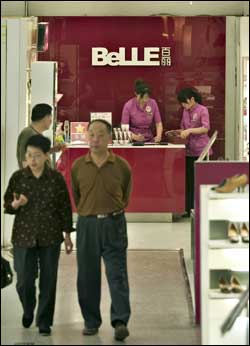
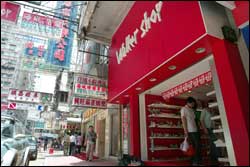 Belle
International, which begins trading under the stock code 1880 today, is poised
for a strong performance after surging 40 percent in the gray market Tuesday.
The mainland shoe retail chain traded at HK$8.71 in the gray market, up 40
percent over its offer price of HK$6.20, according to the trading platform run
by Phillip Securities. "The market likes consumer-related China stocks,
encouraged by the country's growing affluence," said a fund manager. Belle,
which runs more than 3,800 outlets in Greater China, was 515 times
oversubscribed in its retail tranche, locking up HK$443.8 billion. It surpassed
Industrial and Commercial Bank of China (1398), which tied up a record of HK$416
billion when it listed October 27 last year. Belle's HK$8.6 billion share sale
received 687,000 retail application forms, and the probability of being allotted
a board lot of 1,000 shares was only 25 percent, according to a company
announcement. Such overwhelming demand for the shares was also partly due to
support from reputable investors. The family of French billionaire Bernard
Arnault, chairman of luxury goods group LVMH Moet Hennessy Louis Vuitton, took a
US$30 million stake in the company's IPO. The deal is led by Morgan Stanley and
Credit Suisse. Meanwhile, listing candidate Walker Group is targeting HK$579
million by offering 150 million shares in an indicative price range of HK$3.18
to HK$3.86. This values the stock at 23.3 times to 28.2 times forecast earnings,
compared with its peer, footwear chain Mirabell (1179), at 27.6 times earnings.
Belle is estimated to post no less than HK$80 million net profit for the year
ending March 2007, a 48 percent increase over a year ago, according to a fund
manager who attended the investor presentation Tuesday. Walker Group has 392
points of sale in Greater China, including 330 in the mainland, covering 23
provinces and 50 cities. It has 56 in Hong Kong and six franchise stores in
Taiwan. Walker has six in-house brands - Couber.G, Artemis, Forleria, Ox-x-ox,
Tru-Nari and Walaci. These account for 90 percent of turnover. The company will
use 66 percent of the proceeds to expand its network while 15 percent will be
used for developing two licensed brands, Acupuncture and Pink Panther. The
remainder of the proceeds will be used for marketing and general working
capital. Belle
International, which begins trading under the stock code 1880 today, is poised
for a strong performance after surging 40 percent in the gray market Tuesday.
The mainland shoe retail chain traded at HK$8.71 in the gray market, up 40
percent over its offer price of HK$6.20, according to the trading platform run
by Phillip Securities. "The market likes consumer-related China stocks,
encouraged by the country's growing affluence," said a fund manager. Belle,
which runs more than 3,800 outlets in Greater China, was 515 times
oversubscribed in its retail tranche, locking up HK$443.8 billion. It surpassed
Industrial and Commercial Bank of China (1398), which tied up a record of HK$416
billion when it listed October 27 last year. Belle's HK$8.6 billion share sale
received 687,000 retail application forms, and the probability of being allotted
a board lot of 1,000 shares was only 25 percent, according to a company
announcement. Such overwhelming demand for the shares was also partly due to
support from reputable investors. The family of French billionaire Bernard
Arnault, chairman of luxury goods group LVMH Moet Hennessy Louis Vuitton, took a
US$30 million stake in the company's IPO. The deal is led by Morgan Stanley and
Credit Suisse. Meanwhile, listing candidate Walker Group is targeting HK$579
million by offering 150 million shares in an indicative price range of HK$3.18
to HK$3.86. This values the stock at 23.3 times to 28.2 times forecast earnings,
compared with its peer, footwear chain Mirabell (1179), at 27.6 times earnings.
Belle is estimated to post no less than HK$80 million net profit for the year
ending March 2007, a 48 percent increase over a year ago, according to a fund
manager who attended the investor presentation Tuesday. Walker Group has 392
points of sale in Greater China, including 330 in the mainland, covering 23
provinces and 50 cities. It has 56 in Hong Kong and six franchise stores in
Taiwan. Walker has six in-house brands - Couber.G, Artemis, Forleria, Ox-x-ox,
Tru-Nari and Walaci. These account for 90 percent of turnover. The company will
use 66 percent of the proceeds to expand its network while 15 percent will be
used for developing two licensed brands, Acupuncture and Pink Panther. The
remainder of the proceeds will be used for marketing and general working
capital.
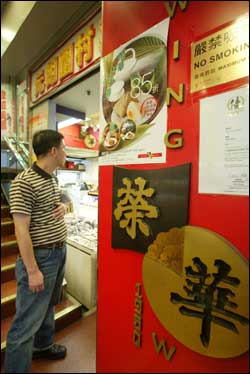 A rice dumpling sample collected from a Chinese restaurant in Yuen Long
contained a trace amount of Sudan Red dye, the Centre for Food Safety said
Tuesday. It was the only one of 49 samples that tested positive and contained
just 0.12 parts per million of the banned dye. "The Sudan Red level is very low,
under normal consumption we do not expect any adverse health effects on humans,
but it is an industrial dye and is banned from being used as a food additive,"
said Tina Mok, the center's principal medical officer. She said the center had
requested the restaurant in Yuen Long to stop selling the batch of rice
dumplings in question, and also ordered the supplier - a food factory in Yuen
Long - to withdraw it from the market. The center is investigating the source of
the dye and the number of dumplings the food supplier had distributed. Mok said
prosecutions would be brought depending on evidence. This year the center tested
more than 80 food samples, including products containing eggs, meat, herbs and
sauces, but has not found contamination. The tainted sample is believed to come
from the Tai Wing Wah restaurant in Yuen Long, which belongs to the Wing Wah
Group of restaurants and cake shops with a long history of specializing in
Chinese delicacies. Wing Wah Group spokeswoman Lee Ying-kuen said the rice
dumplings in question are believed to have contained duck eggs tainted with
Sudan Red dye. Lee said the problematic batch comprised 1,200 rice dumplings, of
which more than 170 had been sold. People may return the dumplings to the
restaurant or call its hotline on 2477-9947. Apart from Sudan coloring, the
center has also conducted chemical tests on the samples to detect preservatives
(such as boric acid, salicylic acid and benzoic acid), heavy metals (such as
arsenic, cadmium and mercury), pesticide residues (such as methamidophos and
DDT) and microbiological tests on pathogenic bacteria (such as salmonella,
Staphylococcus aureus and Bacillus cereus), all of which had negative results.
Mok said consumers should store rice dumplings at below four degrees Celsius.
A rice dumpling sample collected from a Chinese restaurant in Yuen Long
contained a trace amount of Sudan Red dye, the Centre for Food Safety said
Tuesday. It was the only one of 49 samples that tested positive and contained
just 0.12 parts per million of the banned dye. "The Sudan Red level is very low,
under normal consumption we do not expect any adverse health effects on humans,
but it is an industrial dye and is banned from being used as a food additive,"
said Tina Mok, the center's principal medical officer. She said the center had
requested the restaurant in Yuen Long to stop selling the batch of rice
dumplings in question, and also ordered the supplier - a food factory in Yuen
Long - to withdraw it from the market. The center is investigating the source of
the dye and the number of dumplings the food supplier had distributed. Mok said
prosecutions would be brought depending on evidence. This year the center tested
more than 80 food samples, including products containing eggs, meat, herbs and
sauces, but has not found contamination. The tainted sample is believed to come
from the Tai Wing Wah restaurant in Yuen Long, which belongs to the Wing Wah
Group of restaurants and cake shops with a long history of specializing in
Chinese delicacies. Wing Wah Group spokeswoman Lee Ying-kuen said the rice
dumplings in question are believed to have contained duck eggs tainted with
Sudan Red dye. Lee said the problematic batch comprised 1,200 rice dumplings, of
which more than 170 had been sold. People may return the dumplings to the
restaurant or call its hotline on 2477-9947. Apart from Sudan coloring, the
center has also conducted chemical tests on the samples to detect preservatives
(such as boric acid, salicylic acid and benzoic acid), heavy metals (such as
arsenic, cadmium and mercury), pesticide residues (such as methamidophos and
DDT) and microbiological tests on pathogenic bacteria (such as salmonella,
Staphylococcus aureus and Bacillus cereus), all of which had negative results.
Mok said consumers should store rice dumplings at below four degrees Celsius.
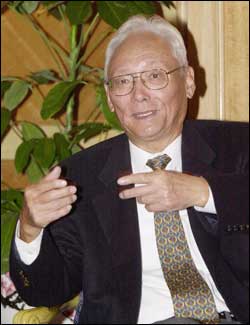 The former director of the State
Council's Hong Kong and Macau Affairs Office, Lu Ping, said that when he helped
draft the Basic Law he did not foresee that the right-of-abode issue would have
to be reinterpreted by the Standing Committee of the National People's Congress.
Lu also said Hong Kong had missed many economic partnership opportunities with
mainland cities, such as the Hong Kong-Zhuhai-Macau Bridge. In a Cable TV
interview broadcast Tuesday, Lu said the Basic Law drafters had intended to be
very specific with the wording concerning Hong Kong citizenship, but that some
others had disagreed and suggested they use the same wording that appeared in
the Sino- British Joint Declaration. "We thought of the possibility that this
could put pressure on the population of Hong Kong. But I thought it's a Hong
Kong issue and Hong Kong would be able to solve it by passing certain laws. I
did not foresee problems. I was subjective and I took it for granted." From the
point of view of the mainland authority, there was no need for the Standing
Committee to reinterpret the Basic Law, Lu said. "The interpretation was not
done for the mainland but for Hong Kong's sake, to relieve any population
pressure." Lu said another point that was not foreseen was the soaring number of
pregnant mainland women traveling to Hong Kong to give birth in order to obtain
citizenship rights for their children. Lu said Hong Kong's position as an
international trade capital has not been marginalized - yet. But there was now a
sense of crisis as there had been substantial economic development in the Pearl
River Delta area. He said the construction of the Hong Kong-Zhuhai-Macau Bridge
had been on the agenda for a long time. "We had forecast it would be beneficial
to Hong Kong when we were in the preparatory committee of the National People's
Congress on the HKSAR. It is the only way for Hong Kong to expand its
transportation channels in the mainland as the Pearl River Delta area will reach
its maximum capacity soon. I said to my Hong Kong friends it was a project that
had to be speeded up. But Hong Kong paid no attention to the proposal and
refused to talk to the mainland," he said. "Now Hong Kong is very anxious but
Guangdong isn't anxious anymore. Guangdong had raised many proposals for
partnership but Hong Kong kept turning a blind eye. Guangdong could not wait and
conducted its own developments," Lu said. He said Hong Kong needs a strong
economic structure and can not rely on CEPA or the independent visitors scheme
for its future prosperity. Lu, who retired 10 years ago, has maintained contact
with Hong Kong. He surfs the Web sites of Hong Kong newspapers every day and
checks the Hang Seng Index at 4.30pm daily. "I do not have a single share and I
do not invest in the stock market. Yet I care about it and it is a must-read, as
an index of Hong Kong's economy," he said. Lu also said he believes that Hong
Kong people are more concerned with economic issues rather than political ones.
The former director of the State
Council's Hong Kong and Macau Affairs Office, Lu Ping, said that when he helped
draft the Basic Law he did not foresee that the right-of-abode issue would have
to be reinterpreted by the Standing Committee of the National People's Congress.
Lu also said Hong Kong had missed many economic partnership opportunities with
mainland cities, such as the Hong Kong-Zhuhai-Macau Bridge. In a Cable TV
interview broadcast Tuesday, Lu said the Basic Law drafters had intended to be
very specific with the wording concerning Hong Kong citizenship, but that some
others had disagreed and suggested they use the same wording that appeared in
the Sino- British Joint Declaration. "We thought of the possibility that this
could put pressure on the population of Hong Kong. But I thought it's a Hong
Kong issue and Hong Kong would be able to solve it by passing certain laws. I
did not foresee problems. I was subjective and I took it for granted." From the
point of view of the mainland authority, there was no need for the Standing
Committee to reinterpret the Basic Law, Lu said. "The interpretation was not
done for the mainland but for Hong Kong's sake, to relieve any population
pressure." Lu said another point that was not foreseen was the soaring number of
pregnant mainland women traveling to Hong Kong to give birth in order to obtain
citizenship rights for their children. Lu said Hong Kong's position as an
international trade capital has not been marginalized - yet. But there was now a
sense of crisis as there had been substantial economic development in the Pearl
River Delta area. He said the construction of the Hong Kong-Zhuhai-Macau Bridge
had been on the agenda for a long time. "We had forecast it would be beneficial
to Hong Kong when we were in the preparatory committee of the National People's
Congress on the HKSAR. It is the only way for Hong Kong to expand its
transportation channels in the mainland as the Pearl River Delta area will reach
its maximum capacity soon. I said to my Hong Kong friends it was a project that
had to be speeded up. But Hong Kong paid no attention to the proposal and
refused to talk to the mainland," he said. "Now Hong Kong is very anxious but
Guangdong isn't anxious anymore. Guangdong had raised many proposals for
partnership but Hong Kong kept turning a blind eye. Guangdong could not wait and
conducted its own developments," Lu said. He said Hong Kong needs a strong
economic structure and can not rely on CEPA or the independent visitors scheme
for its future prosperity. Lu, who retired 10 years ago, has maintained contact
with Hong Kong. He surfs the Web sites of Hong Kong newspapers every day and
checks the Hang Seng Index at 4.30pm daily. "I do not have a single share and I
do not invest in the stock market. Yet I care about it and it is a must-read, as
an index of Hong Kong's economy," he said. Lu also said he believes that Hong
Kong people are more concerned with economic issues rather than political ones.
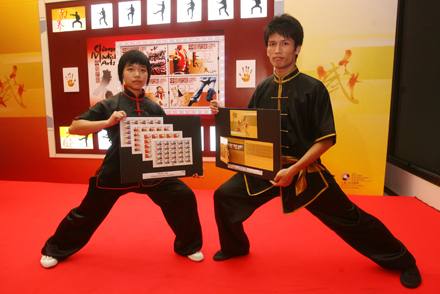 Li Sze-man
(left) and Wong Wing-chung at the post office's launch of special stamps
featuring the Chinese martial arts styles "Southern Lion Dance", "Nanquan",
"Northern Lion Dance" and "Beitui". Li Sze-man
(left) and Wong Wing-chung at the post office's launch of special stamps
featuring the Chinese martial arts styles "Southern Lion Dance", "Nanquan",
"Northern Lion Dance" and "Beitui".
The government planned to extend the
use of Octopus cards to tunnel tolls, Financial Services and the Treasury
Secretary Frederick Ma Si-hang said on Wednesday.
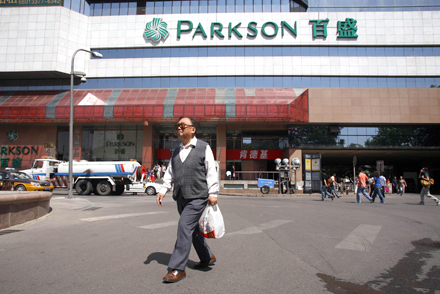 Parkson Retail
Group, the Beijing department store unit of Malaysia's Lion Group, received more
than US$1 billion in initial orders when it returned to the Asian high-yield
bond market yesterday to raise US$125 million, a source said. Pricing for the
five-year bond sale would be fixed today after the market close to include one
London investor, said the source, who expected total orders to top US$2 billion.
The bond was expected to be priced between 7.125 per cent and 7.25 per cent, the
source said. The sale is being arranged by JP Morgan, which arranged the
company's first bond sale in November last year when Parkson raised US$200
million. Parkson, which owns 25 stores and manages 11 in 26 cities, will use the
new funds for acquisitions and refinancing. The only mainland retailer so far to
sell high-yield or below investment-grade bonds, Parkson saw strong demand for
the paper even as it faces intensifying competition from larger local rivals and
overseas entrants to the mainland retail stores market. Overseas high-yield
investors were keen to hold the Parkson bond as a way to gain exposure to the
booming retail sector, the source said. The high-yield market in Asia has seen
five new issues from the mainland this year, with four from property developers.
Parkson will use US$50 million of the proceeds to repay a bridge loan from JP
Morgan Chase Bank, which the company took out in March. Another US$50 million
will help fund acquisitions the company announced last month. It plans to pay
730 million yuan for the 49 per cent it does not already own in its flagship
store in Anshan, Liaoning province and the property in which it is located. The
store's after-tax profit rose 55.5 per cent to 32.2 million yuan last year while
operating revenue rose 25 per cent to 130.5 million yuan. The rest of the bond
proceeds will go to general corporate and working capital purposes. The bond was
not callable for three years, an option designed to help the company to seek
cheaper financing on the expectation that Parkson will attract an
investment-grade rating in about three years, the source said. The proposed bond
was rated Ba1 by Moody's, one step below investment grade and one step lower at
BB by Standard & Poor's. Parkson raised US$200 million in November by selling a
five-year senior note that attracted orders of US$1.45 billion, giving room for
the note to be priced tighter at 7.85 per cent from a proposed 8 per cent. The
old Parkson bond was bid at 6.57 per cent mid-day yesterday, according to a Hong
Kong-based trader in a European bank. Parkson, whose first-quarter earnings also
jumped 55.5 per cent to 160.5 million yuan from 103.2 million yuan a year ago,
earlier said that it planned to spend up to 150 million yuan to open five stores
this year. The retailer last night said it would buy the 40 per cent stake it
does not already own in a store in Mianyang, Sichuan province, for 99.9 million
yuan. Shares of Parkson, which have gained 42 per cent this year and were
suspended from trading yesterday pending an announcement, will resume trading
today. The stock closed 1.28 per cent lower at HK$54 on Monday. Parkson Retail
Group, the Beijing department store unit of Malaysia's Lion Group, received more
than US$1 billion in initial orders when it returned to the Asian high-yield
bond market yesterday to raise US$125 million, a source said. Pricing for the
five-year bond sale would be fixed today after the market close to include one
London investor, said the source, who expected total orders to top US$2 billion.
The bond was expected to be priced between 7.125 per cent and 7.25 per cent, the
source said. The sale is being arranged by JP Morgan, which arranged the
company's first bond sale in November last year when Parkson raised US$200
million. Parkson, which owns 25 stores and manages 11 in 26 cities, will use the
new funds for acquisitions and refinancing. The only mainland retailer so far to
sell high-yield or below investment-grade bonds, Parkson saw strong demand for
the paper even as it faces intensifying competition from larger local rivals and
overseas entrants to the mainland retail stores market. Overseas high-yield
investors were keen to hold the Parkson bond as a way to gain exposure to the
booming retail sector, the source said. The high-yield market in Asia has seen
five new issues from the mainland this year, with four from property developers.
Parkson will use US$50 million of the proceeds to repay a bridge loan from JP
Morgan Chase Bank, which the company took out in March. Another US$50 million
will help fund acquisitions the company announced last month. It plans to pay
730 million yuan for the 49 per cent it does not already own in its flagship
store in Anshan, Liaoning province and the property in which it is located. The
store's after-tax profit rose 55.5 per cent to 32.2 million yuan last year while
operating revenue rose 25 per cent to 130.5 million yuan. The rest of the bond
proceeds will go to general corporate and working capital purposes. The bond was
not callable for three years, an option designed to help the company to seek
cheaper financing on the expectation that Parkson will attract an
investment-grade rating in about three years, the source said. The proposed bond
was rated Ba1 by Moody's, one step below investment grade and one step lower at
BB by Standard & Poor's. Parkson raised US$200 million in November by selling a
five-year senior note that attracted orders of US$1.45 billion, giving room for
the note to be priced tighter at 7.85 per cent from a proposed 8 per cent. The
old Parkson bond was bid at 6.57 per cent mid-day yesterday, according to a Hong
Kong-based trader in a European bank. Parkson, whose first-quarter earnings also
jumped 55.5 per cent to 160.5 million yuan from 103.2 million yuan a year ago,
earlier said that it planned to spend up to 150 million yuan to open five stores
this year. The retailer last night said it would buy the 40 per cent stake it
does not already own in a store in Mianyang, Sichuan province, for 99.9 million
yuan. Shares of Parkson, which have gained 42 per cent this year and were
suspended from trading yesterday pending an announcement, will resume trading
today. The stock closed 1.28 per cent lower at HK$54 on Monday.
Shanghai Hua Hong NEC Electronics, a
chipmaker half-owned by Japan's NEC, is trying to revive its long-awaited plan
to list in Hong Kong by raising up to US$300 million in the next quarter,
according to a source yesterday.
 China: U.S.
Commerce Secretary Carlos Gutierrez said on Tuesday that the key economic
dialogue with China makes a good start, adding the talks would get more
penetrating as dialogues continue. "What we are achieving here is a tremendously
valuable strategic dialogue on two of the world's largest economies," said
Gutierrez, who attended the second meeting of Strategic Economic Dialogue which
kicked off earlier Tuesday. He played down the expectation for specific results
from the SED, which he and other U.S. officials defined as a forum to manage the
U.S.-China relationship on a long-term strategic basis. "These are not
negotiating sessions," he said. "This is not intended to walk out with specific
short-term deliverables." U.S. Trade Representative Susan Schwab also said the
talks are candid, adding the high-level meeting is a "straightforward, mature"
dialogue between the two countries. The second meeting of the Strategic Economic
Dialogue, co- chaired by Chinese Vice Premier Wu Yi and U.S. Treasury Secretary
Henry Paulson, was designed to address outstanding issues in bilateral economic
and trade relations. Dozens of ministers from the two countries, including
Gutierrez and Schwab, participated in the meeting. China and the United States
held their first strategic economic dialogue last December. The dialogue
mechanism has already become an important platform for the two nations to
discuss long-term strategic and economic issues.
China: U.S.
Commerce Secretary Carlos Gutierrez said on Tuesday that the key economic
dialogue with China makes a good start, adding the talks would get more
penetrating as dialogues continue. "What we are achieving here is a tremendously
valuable strategic dialogue on two of the world's largest economies," said
Gutierrez, who attended the second meeting of Strategic Economic Dialogue which
kicked off earlier Tuesday. He played down the expectation for specific results
from the SED, which he and other U.S. officials defined as a forum to manage the
U.S.-China relationship on a long-term strategic basis. "These are not
negotiating sessions," he said. "This is not intended to walk out with specific
short-term deliverables." U.S. Trade Representative Susan Schwab also said the
talks are candid, adding the high-level meeting is a "straightforward, mature"
dialogue between the two countries. The second meeting of the Strategic Economic
Dialogue, co- chaired by Chinese Vice Premier Wu Yi and U.S. Treasury Secretary
Henry Paulson, was designed to address outstanding issues in bilateral economic
and trade relations. Dozens of ministers from the two countries, including
Gutierrez and Schwab, participated in the meeting. China and the United States
held their first strategic economic dialogue last December. The dialogue
mechanism has already become an important platform for the two nations to
discuss long-term strategic and economic issues.
China's decades-long household
registration system, which divides the population into urban and rural
residents, may be reformed.
The handling capacity of China's
ports is expected to hit 8 billion tons and 170 million TEUs (twenty-foot
container equivalent units) in 2010, according to information from the on-going
China Ports and Terminals Summit held in north China's Tianjin Municipality. The
cargo handling capacity of all China's ports totaled 5.6 billion tons and 93
million TEUs last year, both the biggest in the world for four consecutive
years, said Qian Yongchang, head of the China Communication and Transportation
Association, at the summit on Tuesday. Last year, China had 12 ports with
throughput capacities exceeding 100 million tons. Shanghai port handled 530
million tons of cargo last year, making it the busiest in the world. Qian said
China has been investing heavily in port construction as the national economy
sores and foreign trade increases steadily. In 2006, more than 160 construction
projects kicked off on China's seaports, involving 60 billion yuan, up 30
percent year-on-year. The priority of the investment in port construction will
be put on expanding capacity and improving comprehensive services, Qian said.
The China
Securities Regulatory Commission (CSRC) announced Wednesday it has fined a
former company manager US$26,130 in the latest case of insider trading.
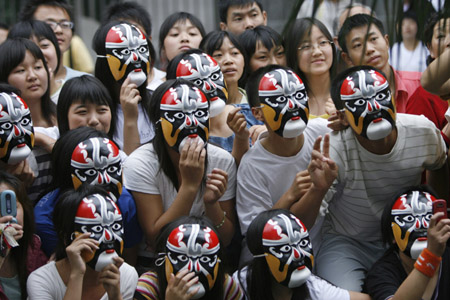 People, wearing Sichuan opera masks,
watch performances during the 1st International Festival of the Intangible
Cultural Heritage in Chengdu, southwest China's Sichuan province, May 23, 2007.
The festival is the first one of its kind on the globe involving protection and
conservation of intangible cultural heritage of the human world, according to
the local government.
People, wearing Sichuan opera masks,
watch performances during the 1st International Festival of the Intangible
Cultural Heritage in Chengdu, southwest China's Sichuan province, May 23, 2007.
The festival is the first one of its kind on the globe involving protection and
conservation of intangible cultural heritage of the human world, according to
the local government.
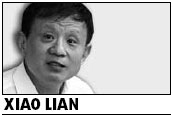 Playing to each other in the press, the stage was set for productive diplomacy
at the current round of China-US Strategic Economic Dialogue with US Secretary
of Treasury Henry Paulson's interview in the Chinese newspaper 21st Century
Business Herald and Chinese Vice-Premier Wu Yi's writing in the Wall Street
Journal. As the second day of the two-day talks unfolds in Washington, key
players not at the table are the US Congresspeople putting heat on the Bush
administration in its China dealings. Ignoring Congress for the moment, the two
countries' expectations can be summarized as: China and the US should handle
their bilateral issues with an eye on the world economy as a whole and
strategic, long-term and macro-thinking rather than handling issues with local,
tactical, short-term and micro-thinking; adhere to and implement the principles
of the World Trade Organization (WTO) as best they can and join efforts in
opposing trade protectionism; avoid politicizing bilateral trade issues and
attempts to use trade issues for political gains. In the first round of dialogue
last year, the two countries reached an understanding that caught the world's
attention. But some US lawmakers still question the framework of the dialogue
and its effectiveness. Their main argument is that China is achieving economic
modernization (building the world's factory) on two wheels - one is manipulating
the low exchange rate of the renminbi to gain a huge trade surplus; the other is
violating intellectual property rights (IPR) and stealing other countries'
technology to gain competitive advantages. They believe these two wheels have
been turning faster, not slowing, since the first round of the bilateral
strategic dialogue last year. As congressional pressure increased, Treasury
Secretary Paulson came under attack by the "contain China" camp, which accused
him of maintaining good personal relations with Chinese leaders at the expense
of US interests. Soon afterwards, Washington announced the decision to slap
anti-dumping tariffs on several Chinese glossy paper exporters and threatened to
bring the issue of alleged China's of intellectual property rights (IPR)
violation to the WTO. Some US lawmakers plan to demand an investigation into
supposed exchange rate manipulation by China and launch economic sanctions
accordingly. In terms of unilateral measures, the US has put China on the
blacklist of countries to be investigated for unfair trade as prescribed in the
US Trade Representative Special 301 Report and will apply anti-dumping or
anti-subsidy tariffs on imports from China. In terms of bilateral measures, the
US has signed free trade agreements with China's trade rivals including Peru,
Colombia and the Republic of Korea to offset China's impact with trade favors.
In terms of regional measures, the US has Europe's and Japan's cooperation in
tightening their China-oriented economic policies, especially in China-specific
policies on IPR and related export control, to maintain an advantage over China
in science and technology. In terms of multilateral measures, the US plans to
bring issues related to bilateral trade and IPR to the WTO if the unilateral and
bilateral measures fail to achieve results. Of course, the second round of
dialogue cannot cover all the issues, but US concerns will focus on whether
Congress is satisfied with the results of the two-day meeting. In fact, the
dialogue is actually between the Chinese government and the US Congress.
Therefore, it is particularly important for both countries to have Paulson help
steer the dialogue between Wu Yi and the United States. This arrangement will
facilitate communication and understanding between the two governments. It is
important in efforts to clear up misunderstandings between the two countries
while building mutual trust over economic and trade issues. The
checks-and-balances power struggle between the US Congress and the executive
branch is one of the major factors affecting the China-US dialogue.
Congresspersons answer to the voters in their districts and the bills they
present usually reflect their constituents' interests. Some bills relating to
Sino-US economic and trade ties may appear beneficial to local districts but
could harm long-term US interests on an overall and strategic level. They could
also hurt sustainable development of the two countries' economies. Above all, US
lawmakers care about votes. They will say anything necessary to win votes
whether the bilateral trade issue is appropriate or not. Thus, one important
goal of the second round of dialogue is to placate Congress. The series of
hard-hitting moves taken by the Bush administration against China was apparently
meant to prevent Congress from passing legislation harmful to long-term benefits
from a healthy bilateral economic and trade relationship. As for the issue of
the renminbi exchange rate, which Congress seems to believe is key to the trade
imbalance, both former Federal Reserve Chairman Alan Greenspan and current
Chairman Ben Bernanke believe the renminbi exchange rate is China's own business
and has no direct effect on the US trade deficit. Some members of Congress have
linked the renminbi exchange rate to US-China trade policy, threatening trade
sanctions against China if their demand for revaluation is not satisfied. But
the exchange rate is an economic issue whereas trade policy is political. It
will only complicate the matter if the two are forcibly tied together. As China
speeds up its economic reform and process of opening to the world, the
internationalization of the renminbi will also accelerate. Compared with
America's mature management of its market economy, China is still faced with the
problems of a weak banking industry and too many bad debts owed by State-owned
enterprises. Besides, China also suffers from inadequate domestic consumption, a
widening gap between rich and poor and a growing population of the unemployed.
These economic and social problems dictate that it is not wise for China to
appreciate the yuan too fast, a move that would seriously affect China's
economic development and hurt that of the US as well. In fact, US companies with
investments in China, including members of the American Manufacturers'
Association, are among the loudest voices against drastic rises in the value of
the renminbi. An unstable yuan will directly hurt their economic interests in
China. Morgan Stanley's chief economist and Vice-President Leo Roche recently
pointed out that many fundamental economic factors will cause trade imbalance
between China and the US even if the yuan exchange rate is raised by a large
margin. For instance, the American people's savings rate has remained at a
meager 1 percent over the past three years. This has forced the country to tread
the trade deficit path. It is relying on growing imports to sustain economic
growth, because only by running a huge current account and trade deficit can it
attract foreign investment. The fact that China accounts for a large portion of
the US trade deficit indicates China enjoys a relative advantage in supplying
Americans with the commodities they need. The US has only itself to blame for
the economic problems it is suffering, but some US politicians refuse to
acknowledge this, blaming China. It is easier to find a scapegoat elsewhere than
at home. In fact, China's foreign trade policies have undertaken significant
changes. The country's 11th Five-Year Plan (2006-10) states clearly that the
country will try to maintain economic growth and sustain foreign trade balance
and macroeconomic stability by increasing domestic demand, especially consumer
demand. It will also take effective measures to limit the export of
"energy-consuming, polluting and natural resource-based" products and increase
imports by simplifying procedures. Obviously, it won't be so hard to solve the
issue of the renminbi exchange rate in relation to bilateral trade imbalance if
the two countries both make some concessions and compromises. Another bad habit
the United States should get rid of is its double standards. Economists at the
Federal Reserve believe it is more important to appreciate the Japanese yen
against the dollar than revalue the Chinese yuan. This view is based on the fact
that Japan's trade surplus with the US is increasing faster than that of
China's. However, the Fed's view on Chinese yuan and Japanese yen exchange rates
is different from that of the US Treasury Department. It is fair to say the
Federal Reserve is more realistic. The US Treasury Department's emphasis on the
appreciation of the yuan rather than on a stronger yen is apparently motivated
by political concerns. This kind of double standard won't help resolve foreign
exchange rate issues. The other issue that Congress has been heating up is IPR
protection. Personally, I am still of the view I had during the first round of
dialogue. Intellectual property rights constitute a critical part of the
competitive advantages that affect America's well-being. No wonder the United
States will stop at nothing to protect its property rights. China is a member of
the WTO and will follow the international rules without question. When handling
the issue of IPR protection, the two countries should treat three relationships
with extra care. 1) The relationship between securing national interests and
fulfilling international obligations. This means they should strike a balance
between protecting sovereignty and being a responsible stakeholder. A country's
IPR protection can only be as good as a its economic and social development. The
subjects and focus of such protection change in different stages of development.
No one should take a country's economic and social development out of the
equation when talking about IPR protection. 2) The relationship between IPR
protection (monopoly) and market competition. We should balance the promotion of
creativity and competitiveness. 3) The relationship between IPR protection
(monopoly) and the public interest. This refers to the need to balance the
interests of IPR owners and that of society as a whole. We should oppose both
the violation of IPR and violation of the public interest by abusing IPR. The
strategic economic dialogue offers an opportunity for the representatives of the
two countries to sit down and try to resolve WTO-related issues through amicable
discussion. I believe, on the basis of the WTO mechanism for resolving trade
disputes, China and the US will ultimately find a solution to each and every one
of their trade disputes. The second round of China-US Strategic Economic
Dialogue is all about enhancing mutual trust, reducing friction, reaching
compromises and achieving win-win results. The author is a researcher with
the Institute of World Economics and Politics of the Chinese Academy of Social
Sciences
Playing to each other in the press, the stage was set for productive diplomacy
at the current round of China-US Strategic Economic Dialogue with US Secretary
of Treasury Henry Paulson's interview in the Chinese newspaper 21st Century
Business Herald and Chinese Vice-Premier Wu Yi's writing in the Wall Street
Journal. As the second day of the two-day talks unfolds in Washington, key
players not at the table are the US Congresspeople putting heat on the Bush
administration in its China dealings. Ignoring Congress for the moment, the two
countries' expectations can be summarized as: China and the US should handle
their bilateral issues with an eye on the world economy as a whole and
strategic, long-term and macro-thinking rather than handling issues with local,
tactical, short-term and micro-thinking; adhere to and implement the principles
of the World Trade Organization (WTO) as best they can and join efforts in
opposing trade protectionism; avoid politicizing bilateral trade issues and
attempts to use trade issues for political gains. In the first round of dialogue
last year, the two countries reached an understanding that caught the world's
attention. But some US lawmakers still question the framework of the dialogue
and its effectiveness. Their main argument is that China is achieving economic
modernization (building the world's factory) on two wheels - one is manipulating
the low exchange rate of the renminbi to gain a huge trade surplus; the other is
violating intellectual property rights (IPR) and stealing other countries'
technology to gain competitive advantages. They believe these two wheels have
been turning faster, not slowing, since the first round of the bilateral
strategic dialogue last year. As congressional pressure increased, Treasury
Secretary Paulson came under attack by the "contain China" camp, which accused
him of maintaining good personal relations with Chinese leaders at the expense
of US interests. Soon afterwards, Washington announced the decision to slap
anti-dumping tariffs on several Chinese glossy paper exporters and threatened to
bring the issue of alleged China's of intellectual property rights (IPR)
violation to the WTO. Some US lawmakers plan to demand an investigation into
supposed exchange rate manipulation by China and launch economic sanctions
accordingly. In terms of unilateral measures, the US has put China on the
blacklist of countries to be investigated for unfair trade as prescribed in the
US Trade Representative Special 301 Report and will apply anti-dumping or
anti-subsidy tariffs on imports from China. In terms of bilateral measures, the
US has signed free trade agreements with China's trade rivals including Peru,
Colombia and the Republic of Korea to offset China's impact with trade favors.
In terms of regional measures, the US has Europe's and Japan's cooperation in
tightening their China-oriented economic policies, especially in China-specific
policies on IPR and related export control, to maintain an advantage over China
in science and technology. In terms of multilateral measures, the US plans to
bring issues related to bilateral trade and IPR to the WTO if the unilateral and
bilateral measures fail to achieve results. Of course, the second round of
dialogue cannot cover all the issues, but US concerns will focus on whether
Congress is satisfied with the results of the two-day meeting. In fact, the
dialogue is actually between the Chinese government and the US Congress.
Therefore, it is particularly important for both countries to have Paulson help
steer the dialogue between Wu Yi and the United States. This arrangement will
facilitate communication and understanding between the two governments. It is
important in efforts to clear up misunderstandings between the two countries
while building mutual trust over economic and trade issues. The
checks-and-balances power struggle between the US Congress and the executive
branch is one of the major factors affecting the China-US dialogue.
Congresspersons answer to the voters in their districts and the bills they
present usually reflect their constituents' interests. Some bills relating to
Sino-US economic and trade ties may appear beneficial to local districts but
could harm long-term US interests on an overall and strategic level. They could
also hurt sustainable development of the two countries' economies. Above all, US
lawmakers care about votes. They will say anything necessary to win votes
whether the bilateral trade issue is appropriate or not. Thus, one important
goal of the second round of dialogue is to placate Congress. The series of
hard-hitting moves taken by the Bush administration against China was apparently
meant to prevent Congress from passing legislation harmful to long-term benefits
from a healthy bilateral economic and trade relationship. As for the issue of
the renminbi exchange rate, which Congress seems to believe is key to the trade
imbalance, both former Federal Reserve Chairman Alan Greenspan and current
Chairman Ben Bernanke believe the renminbi exchange rate is China's own business
and has no direct effect on the US trade deficit. Some members of Congress have
linked the renminbi exchange rate to US-China trade policy, threatening trade
sanctions against China if their demand for revaluation is not satisfied. But
the exchange rate is an economic issue whereas trade policy is political. It
will only complicate the matter if the two are forcibly tied together. As China
speeds up its economic reform and process of opening to the world, the
internationalization of the renminbi will also accelerate. Compared with
America's mature management of its market economy, China is still faced with the
problems of a weak banking industry and too many bad debts owed by State-owned
enterprises. Besides, China also suffers from inadequate domestic consumption, a
widening gap between rich and poor and a growing population of the unemployed.
These economic and social problems dictate that it is not wise for China to
appreciate the yuan too fast, a move that would seriously affect China's
economic development and hurt that of the US as well. In fact, US companies with
investments in China, including members of the American Manufacturers'
Association, are among the loudest voices against drastic rises in the value of
the renminbi. An unstable yuan will directly hurt their economic interests in
China. Morgan Stanley's chief economist and Vice-President Leo Roche recently
pointed out that many fundamental economic factors will cause trade imbalance
between China and the US even if the yuan exchange rate is raised by a large
margin. For instance, the American people's savings rate has remained at a
meager 1 percent over the past three years. This has forced the country to tread
the trade deficit path. It is relying on growing imports to sustain economic
growth, because only by running a huge current account and trade deficit can it
attract foreign investment. The fact that China accounts for a large portion of
the US trade deficit indicates China enjoys a relative advantage in supplying
Americans with the commodities they need. The US has only itself to blame for
the economic problems it is suffering, but some US politicians refuse to
acknowledge this, blaming China. It is easier to find a scapegoat elsewhere than
at home. In fact, China's foreign trade policies have undertaken significant
changes. The country's 11th Five-Year Plan (2006-10) states clearly that the
country will try to maintain economic growth and sustain foreign trade balance
and macroeconomic stability by increasing domestic demand, especially consumer
demand. It will also take effective measures to limit the export of
"energy-consuming, polluting and natural resource-based" products and increase
imports by simplifying procedures. Obviously, it won't be so hard to solve the
issue of the renminbi exchange rate in relation to bilateral trade imbalance if
the two countries both make some concessions and compromises. Another bad habit
the United States should get rid of is its double standards. Economists at the
Federal Reserve believe it is more important to appreciate the Japanese yen
against the dollar than revalue the Chinese yuan. This view is based on the fact
that Japan's trade surplus with the US is increasing faster than that of
China's. However, the Fed's view on Chinese yuan and Japanese yen exchange rates
is different from that of the US Treasury Department. It is fair to say the
Federal Reserve is more realistic. The US Treasury Department's emphasis on the
appreciation of the yuan rather than on a stronger yen is apparently motivated
by political concerns. This kind of double standard won't help resolve foreign
exchange rate issues. The other issue that Congress has been heating up is IPR
protection. Personally, I am still of the view I had during the first round of
dialogue. Intellectual property rights constitute a critical part of the
competitive advantages that affect America's well-being. No wonder the United
States will stop at nothing to protect its property rights. China is a member of
the WTO and will follow the international rules without question. When handling
the issue of IPR protection, the two countries should treat three relationships
with extra care. 1) The relationship between securing national interests and
fulfilling international obligations. This means they should strike a balance
between protecting sovereignty and being a responsible stakeholder. A country's
IPR protection can only be as good as a its economic and social development. The
subjects and focus of such protection change in different stages of development.
No one should take a country's economic and social development out of the
equation when talking about IPR protection. 2) The relationship between IPR
protection (monopoly) and market competition. We should balance the promotion of
creativity and competitiveness. 3) The relationship between IPR protection
(monopoly) and the public interest. This refers to the need to balance the
interests of IPR owners and that of society as a whole. We should oppose both
the violation of IPR and violation of the public interest by abusing IPR. The
strategic economic dialogue offers an opportunity for the representatives of the
two countries to sit down and try to resolve WTO-related issues through amicable
discussion. I believe, on the basis of the WTO mechanism for resolving trade
disputes, China and the US will ultimately find a solution to each and every one
of their trade disputes. The second round of China-US Strategic Economic
Dialogue is all about enhancing mutual trust, reducing friction, reaching
compromises and achieving win-win results. The author is a researcher with
the Institute of World Economics and Politics of the Chinese Academy of Social
Sciences
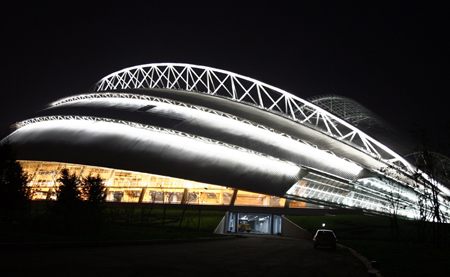
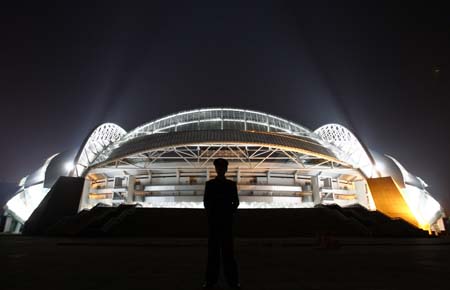 A night view of the
Shenyang Olympic Sports Centre Stadium, one of the five football venues of the
2008 Beijing Olympic Games, in Shenyang, capital of northeast China's Liaoning
province May 21, 2007. Picture take May 21, 2007.
A night view of the
Shenyang Olympic Sports Centre Stadium, one of the five football venues of the
2008 Beijing Olympic Games, in Shenyang, capital of northeast China's Liaoning
province May 21, 2007. Picture take May 21, 2007.
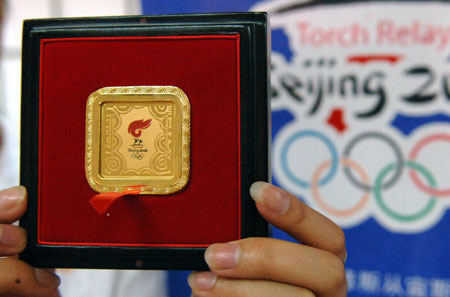 A woman displays the Olympic Torch Golden Brick
in Heifei, capital city of Central China's Anhui Province. Granted by BOCOG,
China Gold Coin Incorporation issued 10 Olympic Torch golden and silk bricks.
A woman displays the Olympic Torch Golden Brick
in Heifei, capital city of Central China's Anhui Province. Granted by BOCOG,
China Gold Coin Incorporation issued 10 Olympic Torch golden and silk bricks.
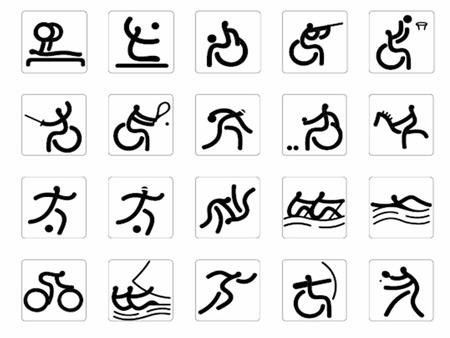 A designer
was inspired by physically-challenged athletes when he created the pictograms
for the Beijing 2008 Paralympic Games. The 20 logos were unveiled at a press
conference Wednesday held by the Beijing Organizing Committee for the Games of
the XXIX Olympiad (BOCOG), which coincided with the Month for Publicity for the
17th National Help-the-Disabled Day. Hang Hai is an associate professor of the
Central Academy of Fine Arts and chief designer of the Beijing 2008 Paralympics
Games Pictograms. "Before, I didn't know anything about the Paralympics. But as
I got to know some physically-challenged athletes and their stories, I was moved
many times," he explained. "So I just tried to convey the dynamics of their body
movements through the pictograms," said Hang. Following the design styles of the
pictograms of the Beijing Olympic Games, the Paralympics Pictograms use the
Chinese seal script as their basic form while incorporating the pictographic
elements of oracle bone writing (jia gu wen, dating back from 14th century B.C.)
and the bronze-ware script (jin wen) with the individual event. The logo for
wheelchair basketball features a stick figure seated in a wheelchair while
getting ready to shoot the basketball. Hang explained they chose the seal script
as the basic from because it is graceful and liquid, which embodies Chinese
traditional aesthetics. "The pictogram is a good combination of body movement
and rich cultural connotation," Hang said. "Pictograms must be easy to recognize
even without captions, so we incorporated the charm of oracle bone writing,"
Hang told Chinadaily.com.cn. When asked if he had considered other Chinese
writing styles, Hang replied the other scripts would have been too complex to
modify into a pictogram.
A designer
was inspired by physically-challenged athletes when he created the pictograms
for the Beijing 2008 Paralympic Games. The 20 logos were unveiled at a press
conference Wednesday held by the Beijing Organizing Committee for the Games of
the XXIX Olympiad (BOCOG), which coincided with the Month for Publicity for the
17th National Help-the-Disabled Day. Hang Hai is an associate professor of the
Central Academy of Fine Arts and chief designer of the Beijing 2008 Paralympics
Games Pictograms. "Before, I didn't know anything about the Paralympics. But as
I got to know some physically-challenged athletes and their stories, I was moved
many times," he explained. "So I just tried to convey the dynamics of their body
movements through the pictograms," said Hang. Following the design styles of the
pictograms of the Beijing Olympic Games, the Paralympics Pictograms use the
Chinese seal script as their basic form while incorporating the pictographic
elements of oracle bone writing (jia gu wen, dating back from 14th century B.C.)
and the bronze-ware script (jin wen) with the individual event. The logo for
wheelchair basketball features a stick figure seated in a wheelchair while
getting ready to shoot the basketball. Hang explained they chose the seal script
as the basic from because it is graceful and liquid, which embodies Chinese
traditional aesthetics. "The pictogram is a good combination of body movement
and rich cultural connotation," Hang said. "Pictograms must be easy to recognize
even without captions, so we incorporated the charm of oracle bone writing,"
Hang told Chinadaily.com.cn. When asked if he had considered other Chinese
writing styles, Hang replied the other scripts would have been too complex to
modify into a pictogram.
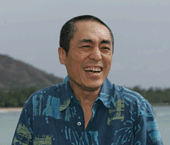 Internationally acclaimed Chinese
director Zhang Yimou will chair the jury of this year's Venice film festival,
organizers said on Tuesday. Zhang, a member of China's "Fifth generation" of
filmmakers, is best known in the West for his movies "Raise the Red Lantern"
(1991) and "House of Flying Daggers" (2004), both of which were nominated for
Oscars. He is a darling on the Venice Lido, where his films have scooped four
major awards in less than 10 years, making him the festival's biggest prize
winner. He took the Golden Lion in 1992 and 1999 and a Silver Lion in 1991. Once
the bad boy of Chinese cinema whose films were banned on the mainland, Zhang has
been recruited by Beijing's Olympics organizers to direct the opening and
closing ceremonies of the 2008 Games. He is the second Chinese national to have
presided on the jury of the world's oldest film festival, at its 75th edition
this year. Actress Gong Li, whom Zhang made into an international star and with
whom he had a long personal relationship, chaired the Venice jury in 2002. She
stars in Zhang's latest film, "Curse of the Golden Flower," which has been
criticized at home for its violent content and skimpily attired actresses. The
festival runs from Aug 29 to Sept 8. Internationally acclaimed Chinese
director Zhang Yimou will chair the jury of this year's Venice film festival,
organizers said on Tuesday. Zhang, a member of China's "Fifth generation" of
filmmakers, is best known in the West for his movies "Raise the Red Lantern"
(1991) and "House of Flying Daggers" (2004), both of which were nominated for
Oscars. He is a darling on the Venice Lido, where his films have scooped four
major awards in less than 10 years, making him the festival's biggest prize
winner. He took the Golden Lion in 1992 and 1999 and a Silver Lion in 1991. Once
the bad boy of Chinese cinema whose films were banned on the mainland, Zhang has
been recruited by Beijing's Olympics organizers to direct the opening and
closing ceremonies of the 2008 Games. He is the second Chinese national to have
presided on the jury of the world's oldest film festival, at its 75th edition
this year. Actress Gong Li, whom Zhang made into an international star and with
whom he had a long personal relationship, chaired the Venice jury in 2002. She
stars in Zhang's latest film, "Curse of the Golden Flower," which has been
criticized at home for its violent content and skimpily attired actresses. The
festival runs from Aug 29 to Sept 8.
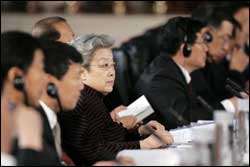 The United
States and China have opened a new round of high-level economic talks with the
Bush administration pushing for concrete results and China saying efforts to
politicize trade disagreements would be a mistake. Breakthroughs were expected
in the areas of boosting sales of American energy technology and banking
services in China. Both sides were also scheduled to review the issue of food
safety, highlighted by the deaths of pets after eating Chinese-made pet food.
Speaking in an ornate auditorium decked out with flags from both nations, Vice
Premier Wu Yi said it was important to resist "trade protectionism of all
kinds." She said attempts to "politicize" the economic relationship between the
two nations would be "absolutely unacceptable." "We should not easily blame the
other side for our own domestic problems," she said, speaking through an
interpreter. "Confrontation does no good at all to problem-solving." Treasury
Secretary Henry Paulson called the second round of meetings under the Strategic
Economic Dialogue historic because of the number of cabinet officials from both
sides who are participating. "Never before have so many ministers from China
gathered in one place in the United States. We both realize how critical it is
for our countries that we get our long-term economic relationship right,"
Paulson said. He said it was important for the two countries to work toward
"near-term agreements that build confidence on both sides." In an interview on
cable television CNBC earlier, Paulson said: "We obviously need some concrete
progress. It is very important to have some signposts along the way ... so we
can have enough confidence on both sides to keep moving forward." The Chinese
are expected to announce that they are cutting tariffs on the imports of energy
services and technologies, which would boost the market for US products. The
Chinese are also expected to increase the stake US and other foreign companies
can own in Chinese banks. That ownership level is currently capped at 25
percent. The administration also hopes to reach a deal expanding opportunities
for US airlines in China. Among the officials participating in the talks are
Health and Human Services Secretary Michael Leavitt and Agriculture Secretary
Mike Johanns, whose agencies are dealing with issues of food safety from Chinese
imports. Paulson was leading a US delegation that includes top officials from 11
cabinet-level agencies and Federal Reserve chairman Ben Bernanke. Wu's team
includes 14 cabinet-level ministers. A similar collection of high- powered
talent assembled for the first session of the dialogue last December in Beijing.
Under an agreement announced last fall, the two countries plan to meet twice a
year to discuss a wide range of economic issues. The two sides were scheduled to
dine Tuesday night at the State Department, and the Chinese delegation was
scheduled to meet with President George W Bush during the visit and to have
closed-door talks with key members of Congress. Unhappiness about America's
growing trade deficit with China is threatening to provoke a protectionist
backlash in Congress. Lawmakers are expressing outrage over a trade gap that
last year hit US$232.5 billion (HK$1.81 trillion), the largest deficit ever
recorded with a single country. Members of Congress are promoting a number of
bills that would slam penalty tariffs on Chinese products unless China does more
to halt what US critics see as unfair trade practices such as China's currency
system and the rampant piracy of American products. China in recent days has
made a number of moves in an effort to defuse American unhappiness. In addition
to announcing the slight change in its currency band, China earlier in the month
said it would purchase US$4.3 billion in American high-technology products and
in recent days announced that it would invest US$3 billion of its US$1.2
trillion in foreign currency reserves in Blackstone Group, the second-largest US
private equity firm.
The United
States and China have opened a new round of high-level economic talks with the
Bush administration pushing for concrete results and China saying efforts to
politicize trade disagreements would be a mistake. Breakthroughs were expected
in the areas of boosting sales of American energy technology and banking
services in China. Both sides were also scheduled to review the issue of food
safety, highlighted by the deaths of pets after eating Chinese-made pet food.
Speaking in an ornate auditorium decked out with flags from both nations, Vice
Premier Wu Yi said it was important to resist "trade protectionism of all
kinds." She said attempts to "politicize" the economic relationship between the
two nations would be "absolutely unacceptable." "We should not easily blame the
other side for our own domestic problems," she said, speaking through an
interpreter. "Confrontation does no good at all to problem-solving." Treasury
Secretary Henry Paulson called the second round of meetings under the Strategic
Economic Dialogue historic because of the number of cabinet officials from both
sides who are participating. "Never before have so many ministers from China
gathered in one place in the United States. We both realize how critical it is
for our countries that we get our long-term economic relationship right,"
Paulson said. He said it was important for the two countries to work toward
"near-term agreements that build confidence on both sides." In an interview on
cable television CNBC earlier, Paulson said: "We obviously need some concrete
progress. It is very important to have some signposts along the way ... so we
can have enough confidence on both sides to keep moving forward." The Chinese
are expected to announce that they are cutting tariffs on the imports of energy
services and technologies, which would boost the market for US products. The
Chinese are also expected to increase the stake US and other foreign companies
can own in Chinese banks. That ownership level is currently capped at 25
percent. The administration also hopes to reach a deal expanding opportunities
for US airlines in China. Among the officials participating in the talks are
Health and Human Services Secretary Michael Leavitt and Agriculture Secretary
Mike Johanns, whose agencies are dealing with issues of food safety from Chinese
imports. Paulson was leading a US delegation that includes top officials from 11
cabinet-level agencies and Federal Reserve chairman Ben Bernanke. Wu's team
includes 14 cabinet-level ministers. A similar collection of high- powered
talent assembled for the first session of the dialogue last December in Beijing.
Under an agreement announced last fall, the two countries plan to meet twice a
year to discuss a wide range of economic issues. The two sides were scheduled to
dine Tuesday night at the State Department, and the Chinese delegation was
scheduled to meet with President George W Bush during the visit and to have
closed-door talks with key members of Congress. Unhappiness about America's
growing trade deficit with China is threatening to provoke a protectionist
backlash in Congress. Lawmakers are expressing outrage over a trade gap that
last year hit US$232.5 billion (HK$1.81 trillion), the largest deficit ever
recorded with a single country. Members of Congress are promoting a number of
bills that would slam penalty tariffs on Chinese products unless China does more
to halt what US critics see as unfair trade practices such as China's currency
system and the rampant piracy of American products. China in recent days has
made a number of moves in an effort to defuse American unhappiness. In addition
to announcing the slight change in its currency band, China earlier in the month
said it would purchase US$4.3 billion in American high-technology products and
in recent days announced that it would invest US$3 billion of its US$1.2
trillion in foreign currency reserves in Blackstone Group, the second-largest US
private equity firm.
China Netcom
Group Corp, the smaller of the mainland's two dominant fixed-line telephone
operators, would prefer to sell existing shares once listed on the domestic
stock market in order to avoid diluting the stakes held by current shareholders,
according to the company's chief financial officer Li Fushen.
May 24, 2007
 Hong Kong:
The Hong Kong Center for Food Safety Tuesday announced that the processing of
applications for importing poultry and poultry products from Miyazaki and
Okayama Prefectures of Japan would resume with immediate effect. The center
suspended processing of applications following confirmation of an outbreak of
the highly pathogenic avian influenza H5N1 on a poultry farm in Miyazaki in
January. Another outbreak was confirmed on a poultry farm in Okayama in
February. The center lifted the restrictions for Japan (except Miyazaki and
Okayama) in April while continuing to monitor the situation in Miyazaki and
Okayama. "In view of the control measures taken by Japan and the fact that there
are no other cases of avian influenza reported in the two prefectures, we decide
to resume processing of applications," a center spokesman said. Hong Kong:
The Hong Kong Center for Food Safety Tuesday announced that the processing of
applications for importing poultry and poultry products from Miyazaki and
Okayama Prefectures of Japan would resume with immediate effect. The center
suspended processing of applications following confirmation of an outbreak of
the highly pathogenic avian influenza H5N1 on a poultry farm in Miyazaki in
January. Another outbreak was confirmed on a poultry farm in Okayama in
February. The center lifted the restrictions for Japan (except Miyazaki and
Okayama) in April while continuing to monitor the situation in Miyazaki and
Okayama. "In view of the control measures taken by Japan and the fact that there
are no other cases of avian influenza reported in the two prefectures, we decide
to resume processing of applications," a center spokesman said.
Hong Kong-based Hang Seng Bank and Singapore's DBS Group Holdings said yesterday
that they had received approval from China's banking regulator to incorporate
locally, paving the way for them to tap the renminbi retail business. The two
lenders were among the second batch of eight overseas banks allowed to prepare
for local incorporation, but names of the other six were not immediately
available and the China Banking Regulatory Commission (CBRC) could not be
reached last night. Earlier, HSBC, Standard Chartered Bank, Bank of East Asia
and Citigroup secured the nod to start operations as locally incorporated
companies and have begun offering renminbi retail services. In addition, Mizuho
Corporate Bank, Bank of Tokyo-Mitsubishi UFJ Ltd, ABN AMRO, Oversea-Chinese
Banking Corp, JPMorgan Chase Bank and Wing Hang Bank are preparing to register
their local subsidiaries in Shanghai, Beijing or Shenzhen. "We are very pleased
that the CBRC has granted approval for Hang Seng to set up a
mainland-incorporated subsidiary," Raymond Or, vice-chairman and chief executive
of Hang Seng Bank, said yesterday. "The establishment of Hang Seng Bank (China)
Limited marks a significant new phase in Hang Seng's mainland business strategy
and is in line with our longstanding commitment to this fast-growing market," he
added. To be headquartered in Shanghai, Hang Seng Bank (China) Ltd is expected
to begin business shortly. Or will be the chairman of the bank's mainland
subsidiary and Johnson Fu, head of China Business, will serve as chief
executive. DBS Group Holdings, Southeast Asia's largest bank, confirmed to China
Daily last night that it had also received the green light from the regulator.
"With the setting up of the local subsidiary, and in time to come, we hope to
provide the full suite of wealth management services to our customers in Hong
Kong and Singapore, and to local and foreign residents on the mainland," DBS
spokeswoman Eunice Woo said earlier. Hang Seng Bank, a principal member of the
HSBC Group, has a network of 17 outlets on the Chinese mainland, including seven
branches, nine sub-branches and one representative office; while DBS has 10
outlets on the mainland, including those owned by DBS Bank (Hong Kong) Limited.
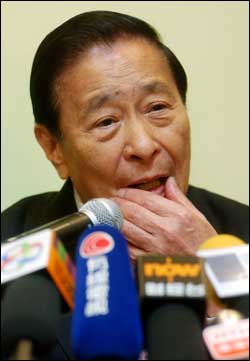
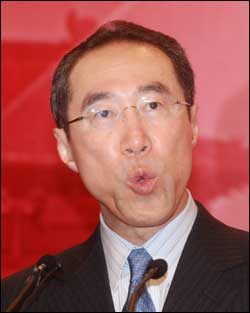 Hong Kong's
financial chief and yet another billionaire weighed in with warnings Monday over
a possible correction in mainland equities as investors gave a wide berth to
news of monetary tightening and continued to pour money into a raging bull
market, which rallied to another high. Henderson Land Development (0012)
chairman Lee Shau-kee, dubbed "Asia's Warren Buffett" for his stock- picking
prowess, said mainland investors were fast losing their senses chasing A shares
which have reached unrealistic levels. Speaking after the annual general meeting
of Hong Kong and China Gas (003), of which he is chairman, Lee said investors
were "crazy," adding that Ashares are much more expensive than H shares. "Some
of the A shares have a 50 percent premium over the H shares, which is
unreasonable," Lee said. "Investors in the mainland are too keen to win in the
stock market, chasing stocks no matter how high prices are, which is
irrational." Financial Secretary Henry Tang Ying-yen said mainland stocks will
become more volatile and this will also have a major impact on Hong Kong and
global equity markets. "We expect the mainland authorities to heighten
macroeconomic tightening measures, increasing the volatility in the Chinese
stock market," Tang said. "Unavoidably, the Hong Kong market will also
experience more volatility." Investment bank Morgan Stanley also said Beijing
will likely introduce more macroeconomic measures. "I have always held the view
that China needs unconventional tightening measures to bring domestic prices
under control, especially in its stock market, [and] the People's Bank of China
hints of more in the pipeline," research analyst Jerry Lou said. "Even more
worrying, the last time the [central bank] raised the saving rate more than the
lending rate was in 1993, before the crash of the property and stock markets."
Last week, billionaire Li Ka-shing, the chairman of Cheung Kong (Holdings)
(0001) and Hutchison Whampoa (0013), cautioned "there is indeed a bubble
phenomenon." "As a Chinese, I am worried about the [mainland] stock market," Li
said. Despite warning signals from various quarters, shares rallied again. The
CSI 300 Index, which tracks yuan- denominated A shares on the Shanghai and
Shenzhen exchanges, rose 1.45 percent Monday to close at a record 3,831.44
points. So far this year it has surged 87.7 percent, compared with a modest 4.8
percent gain for the Hang Seng Index. He Guangbei, vice chairman and chief
executive of BOC Hong Kong (2388), said measures to curb growth were "timely and
necessary" and he expects another round sooner or later. But he foresees only a
limited impact on the domestic banking industry. However, sources cited China
Securities Regulatory Commission chairman Shang Fulin as saying domestic retail
investors were actually not as crazy as depicted by the media. In a meeting
Monday, Shang said while there were 90 million investors, only 30 million were
active traders, so the figure "may not be that serious." Hong Kong's
financial chief and yet another billionaire weighed in with warnings Monday over
a possible correction in mainland equities as investors gave a wide berth to
news of monetary tightening and continued to pour money into a raging bull
market, which rallied to another high. Henderson Land Development (0012)
chairman Lee Shau-kee, dubbed "Asia's Warren Buffett" for his stock- picking
prowess, said mainland investors were fast losing their senses chasing A shares
which have reached unrealistic levels. Speaking after the annual general meeting
of Hong Kong and China Gas (003), of which he is chairman, Lee said investors
were "crazy," adding that Ashares are much more expensive than H shares. "Some
of the A shares have a 50 percent premium over the H shares, which is
unreasonable," Lee said. "Investors in the mainland are too keen to win in the
stock market, chasing stocks no matter how high prices are, which is
irrational." Financial Secretary Henry Tang Ying-yen said mainland stocks will
become more volatile and this will also have a major impact on Hong Kong and
global equity markets. "We expect the mainland authorities to heighten
macroeconomic tightening measures, increasing the volatility in the Chinese
stock market," Tang said. "Unavoidably, the Hong Kong market will also
experience more volatility." Investment bank Morgan Stanley also said Beijing
will likely introduce more macroeconomic measures. "I have always held the view
that China needs unconventional tightening measures to bring domestic prices
under control, especially in its stock market, [and] the People's Bank of China
hints of more in the pipeline," research analyst Jerry Lou said. "Even more
worrying, the last time the [central bank] raised the saving rate more than the
lending rate was in 1993, before the crash of the property and stock markets."
Last week, billionaire Li Ka-shing, the chairman of Cheung Kong (Holdings)
(0001) and Hutchison Whampoa (0013), cautioned "there is indeed a bubble
phenomenon." "As a Chinese, I am worried about the [mainland] stock market," Li
said. Despite warning signals from various quarters, shares rallied again. The
CSI 300 Index, which tracks yuan- denominated A shares on the Shanghai and
Shenzhen exchanges, rose 1.45 percent Monday to close at a record 3,831.44
points. So far this year it has surged 87.7 percent, compared with a modest 4.8
percent gain for the Hang Seng Index. He Guangbei, vice chairman and chief
executive of BOC Hong Kong (2388), said measures to curb growth were "timely and
necessary" and he expects another round sooner or later. But he foresees only a
limited impact on the domestic banking industry. However, sources cited China
Securities Regulatory Commission chairman Shang Fulin as saying domestic retail
investors were actually not as crazy as depicted by the media. In a meeting
Monday, Shang said while there were 90 million investors, only 30 million were
active traders, so the figure "may not be that serious."
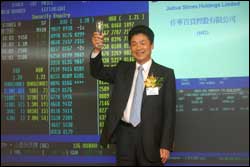 Listing candidate Sichuan Xinhua Winshare Chainstore, which closed its order
book Monday with the retail offer more than 100 times oversubscribed, will price
its shares near the high end. "The response was positive, although Belle
[International Holdings] locked up a huge amount of funds," a source said. Belle
begins trading tomorrow. Sichuan Xinhua, which runs 193 bookstores in Sichuan,
tied up at least HK$21 billion in its retail tranche, while the institutional
portion is more than 30 times covered. Considering the overwhelming retail
demand for its offer, the allotment will be raised from 10 percent to 50 percent
of the total available shares. Sichuan Xinhua aims to raise HK$2.1 billion by
offering 369.4 million H shares in an indicative price range of between HK$4.50
and HK$5.80 per share. The price range represents 11 times to 15 times 2006
earnings. Trading of its shares is set for May 30. The deal is led by BOC
International. Meanwhile, Jiahua Stores Holdings (0602) surged 39 percent on its
trading debut Monday as investors continued to flock to consumer-related
mainland stocks. The Shenzhen-based department store operator hit a high of
HK$1.48 before easing to close at HK$1.45, up 39 percent over the offer price of
HK$1.04, with HK$397 million worth of shares traded. Taifook Securities is
sponsoring the deal.
Listing candidate Sichuan Xinhua Winshare Chainstore, which closed its order
book Monday with the retail offer more than 100 times oversubscribed, will price
its shares near the high end. "The response was positive, although Belle
[International Holdings] locked up a huge amount of funds," a source said. Belle
begins trading tomorrow. Sichuan Xinhua, which runs 193 bookstores in Sichuan,
tied up at least HK$21 billion in its retail tranche, while the institutional
portion is more than 30 times covered. Considering the overwhelming retail
demand for its offer, the allotment will be raised from 10 percent to 50 percent
of the total available shares. Sichuan Xinhua aims to raise HK$2.1 billion by
offering 369.4 million H shares in an indicative price range of between HK$4.50
and HK$5.80 per share. The price range represents 11 times to 15 times 2006
earnings. Trading of its shares is set for May 30. The deal is led by BOC
International. Meanwhile, Jiahua Stores Holdings (0602) surged 39 percent on its
trading debut Monday as investors continued to flock to consumer-related
mainland stocks. The Shenzhen-based department store operator hit a high of
HK$1.48 before easing to close at HK$1.45, up 39 percent over the offer price of
HK$1.04, with HK$397 million worth of shares traded. Taifook Securities is
sponsoring the deal.
Hong Kong's
consumer prices rose 1.3 percent last month from last April, lower than the 2.4
percent rise in March, as the headline figure was cushioned by the waiver of
property rates announced in this year's budget, the government said Monday.
The
government is expected to recommend a pay increase of between 4 and 6 percent
for 160,000 civil servants for 2007-2008, a Civil Service Bureau spokesman said
Monday.
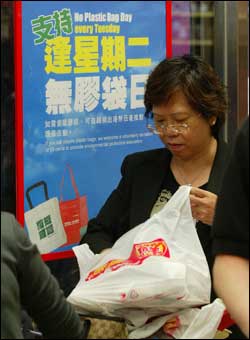 Plans are
afoot to impose a tax of 50 HK cents on each plastic bag by the end of next year
as part of the government's campaign to reduce indiscriminate use of bags by
shoppers. The Environmental Protection Department plans to introduce the scheme
in phases, with supermarkets, convenience stores, and personal health and beauty
stores the first to enforce the levy. According to a government source Monday,
the retailers involved in the scheme will include those selling three categories
of products - food and beverages, including confectionery or snacks;
nonprescribed medicine, first- aid items and dietary or herbal supplements; and
personal hygiene and beauty products. Such businesses will either have two or
more retail outlets owned or controlled by a person; or businesses with a single
retail outlet and a retail floor area of not less than 200 square meters. The
environmental levy will apply to plastic shopping bags that are made wholly or
predominantly of plastic; and have carrying handles, holes or strings. Bags with
no carrying handles, holes or strings for wrapping unpacked fresh food would be
exempted. Sealed plastic bags applied before goods are offered for sale, such as
rice, boxes of tissues; plastic bags sold as packaging materials, such as
sandwich bags, or bin liners, would also not be covered. Reusable shopping bags
sold for HK$5 or more each would be exempted too. Plans are
afoot to impose a tax of 50 HK cents on each plastic bag by the end of next year
as part of the government's campaign to reduce indiscriminate use of bags by
shoppers. The Environmental Protection Department plans to introduce the scheme
in phases, with supermarkets, convenience stores, and personal health and beauty
stores the first to enforce the levy. According to a government source Monday,
the retailers involved in the scheme will include those selling three categories
of products - food and beverages, including confectionery or snacks;
nonprescribed medicine, first- aid items and dietary or herbal supplements; and
personal hygiene and beauty products. Such businesses will either have two or
more retail outlets owned or controlled by a person; or businesses with a single
retail outlet and a retail floor area of not less than 200 square meters. The
environmental levy will apply to plastic shopping bags that are made wholly or
predominantly of plastic; and have carrying handles, holes or strings. Bags with
no carrying handles, holes or strings for wrapping unpacked fresh food would be
exempted. Sealed plastic bags applied before goods are offered for sale, such as
rice, boxes of tissues; plastic bags sold as packaging materials, such as
sandwich bags, or bin liners, would also not be covered. Reusable shopping bags
sold for HK$5 or more each would be exempted too.
A fireman was killed and six of his
colleagues injured battling a No3 alarm fire at an electroplating workshop in
Tsuen Wan overnight.
Hong Kong share prices closed 0.40
per cent lower on Tuesday as caution set in ahead of US-China economic talks in
Washington, driving investors to the sidelines to consolidate recent gains,
dealers said.
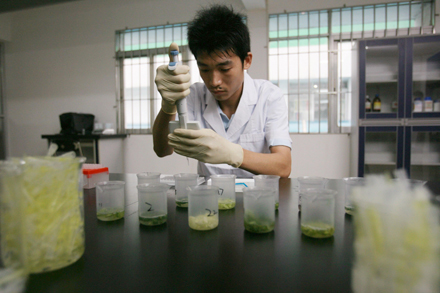 A chemist tests vegetable samples
for contaminants yesterday at the Nanshan distribution centre under tightened
regulations governing exports to Hong Kong. Mainland authorities have stepped up
regulation of vegetable exports to Hong Kong this year, but a survey shows more
than 75 per cent of Hongkongers have no confidence in the new measures. After a
series of food scares last year, the Shenzhen Entry-Exit Inspection and
Quarantine Bureau last month introduced a new management system to step up
regulation of vegetable exports to the city. From April 1, the bureau has
required all suppliers of vegetables to Hong Kong to be registered with its
Nanshan agricultural products wholesale distribution centre. All vegetable
exports to Hong Kong are transported to the centre, where samples are tested and
the exports are labelled after preliminary inspections. The trucks are also
sealed to prevent contamination before they set off to Hong Kong. But as tests
may take 40 minutes to two days, some of the vegetables will be transported to
Hong Kong before the results are available. The head of the quarantine bureau's
department for vegetable inspection, Chen Xiaoying, said if samples were
contaminated, the centre would immediately notify suppliers and importers to
recall vegetables. Between April 1 and May 15, Mr Chen said, the centre took
more than 4,200 samples and only six were found to be contaminated with
excessive pesticides or heavy metals. The contaminated vegetables had been
recalled, he told Hong Kong reporters on a media tour. Meanwhile a political
party's telephone survey of 869 adults found more than three-quarters had no
confidence in the new measures. But their views were not entirely the result of
doubts about the mainland authorities. Almost 40 per cent said their lack of
confidence was because of food smuggling, while 36.5 per cent said local
inspections were not strict enough. "The government should carry out inspections
at borders and in wholesale and retailing markets more often," said legislator
Wong Yung-kan, food safety spokesman for the Democratic Alliance for the
Betterment and Progress of Hong Kong, which carried out the poll between May 12
and 17. Nearly 60 per cent of the interviewees gave a bare pass to the Hong Kong
government for its efforts in ensuring food safety. More than 30 per cent said
it had totally failed. And almost 70 per cent of the respondents said they had
seen little improvement in food safety since the Centre for Food Safety was set
up last May.
A chemist tests vegetable samples
for contaminants yesterday at the Nanshan distribution centre under tightened
regulations governing exports to Hong Kong. Mainland authorities have stepped up
regulation of vegetable exports to Hong Kong this year, but a survey shows more
than 75 per cent of Hongkongers have no confidence in the new measures. After a
series of food scares last year, the Shenzhen Entry-Exit Inspection and
Quarantine Bureau last month introduced a new management system to step up
regulation of vegetable exports to the city. From April 1, the bureau has
required all suppliers of vegetables to Hong Kong to be registered with its
Nanshan agricultural products wholesale distribution centre. All vegetable
exports to Hong Kong are transported to the centre, where samples are tested and
the exports are labelled after preliminary inspections. The trucks are also
sealed to prevent contamination before they set off to Hong Kong. But as tests
may take 40 minutes to two days, some of the vegetables will be transported to
Hong Kong before the results are available. The head of the quarantine bureau's
department for vegetable inspection, Chen Xiaoying, said if samples were
contaminated, the centre would immediately notify suppliers and importers to
recall vegetables. Between April 1 and May 15, Mr Chen said, the centre took
more than 4,200 samples and only six were found to be contaminated with
excessive pesticides or heavy metals. The contaminated vegetables had been
recalled, he told Hong Kong reporters on a media tour. Meanwhile a political
party's telephone survey of 869 adults found more than three-quarters had no
confidence in the new measures. But their views were not entirely the result of
doubts about the mainland authorities. Almost 40 per cent said their lack of
confidence was because of food smuggling, while 36.5 per cent said local
inspections were not strict enough. "The government should carry out inspections
at borders and in wholesale and retailing markets more often," said legislator
Wong Yung-kan, food safety spokesman for the Democratic Alliance for the
Betterment and Progress of Hong Kong, which carried out the poll between May 12
and 17. Nearly 60 per cent of the interviewees gave a bare pass to the Hong Kong
government for its efforts in ensuring food safety. More than 30 per cent said
it had totally failed. And almost 70 per cent of the respondents said they had
seen little improvement in food safety since the Centre for Food Safety was set
up last May.
Hong Kong’s high-end apartments are
the world’s most expensive to rent, followed by Tokyo and New York, reflecting
high living costs in those cities, a survey on expatriate accommodation showed
on Tuesday.
Singapore Airlines (SIA) and China
Eastern Airlines suspended trading of their shares on Tuesday amid reports of a
possible investment deal. SIA did not state a reason for their suspension of
trade at the Singapore Exchange but said it would make an announcement after the
stock market closes at 5pm. The stock last traded at S$18.40. Trading of China
Eastern Airlines was also halted at the Hong Kong stock exchange, where the
stock last traded at HK$3.73. China Eastern said it requested the trading halt
pending the release of a "price-sensitive" announcement. SIA chief executive
Chew Choon Seng said on May 11 that the Singapore carrier was in discussions
with China Eastern but that talks "have not progressed to a stage where we have
any announcements to make". The Shanghai Securities News reported from Beijing
on Monday that talks were going on smoothly. "So far, the talks with Singapore
Airlines are smooth ... but the conclusion of an agreement will depend on the
support of the government," the newspaper quoted China Eastern chairman Li
Fenghua as saying. Mr Li said China Eastern planned to sell a stake of as much
as 25 per cent to a foreign strategic investor.
 China: The
export-import banks of China and the United States signed agreements on Monday
designed to expedite financing for transactions that will help support U.S.
export jobs and promote China's sustainable development. These agreements, which
were announced under the auspices of the upcoming U.S.-China Strategic Economic
Dialogue, delivered results and established a strong foundation for working
together to support America's exporters and China's development, said U.S.
Export-Import Bank Chairman and President James H. Lambright. "The cooperation
between our two banks embodies the essence of the Strategic Economic Dialogue,"
he said. Specifically, the two institutions signed a memorandum of understanding
on a form of standard Long-Term Credit Agreement that will provide financing for
most U.S. export transactions to China that exceed 20 million dollars. The first
transaction to use this product is already underway. The U.S. Export-Import Bank
also announced its willingness to consider financing the sale of 164 million
dollars in heavy-duty railway maintenance equipment by the Harsco Corporation to
the Chinese Ministry of Railways. "We are grateful that the Export-Import Bank
is willing to consider financing which would play a pivotal role in enabling us
to further expand Harsco's support of the China market," said Harsco Chairman
and CEO Derek C. Hathaway. Li Ruogu, chairman and president of the Export-Import
Bank of China, hailed the results. The agreements "shall be of significance in
promoting the U.S. export of innovative technology to China, creating job
opportunities for the U.S. people and stepping up Sino-U.S. economic and trade
ties," he said.
China: The
export-import banks of China and the United States signed agreements on Monday
designed to expedite financing for transactions that will help support U.S.
export jobs and promote China's sustainable development. These agreements, which
were announced under the auspices of the upcoming U.S.-China Strategic Economic
Dialogue, delivered results and established a strong foundation for working
together to support America's exporters and China's development, said U.S.
Export-Import Bank Chairman and President James H. Lambright. "The cooperation
between our two banks embodies the essence of the Strategic Economic Dialogue,"
he said. Specifically, the two institutions signed a memorandum of understanding
on a form of standard Long-Term Credit Agreement that will provide financing for
most U.S. export transactions to China that exceed 20 million dollars. The first
transaction to use this product is already underway. The U.S. Export-Import Bank
also announced its willingness to consider financing the sale of 164 million
dollars in heavy-duty railway maintenance equipment by the Harsco Corporation to
the Chinese Ministry of Railways. "We are grateful that the Export-Import Bank
is willing to consider financing which would play a pivotal role in enabling us
to further expand Harsco's support of the China market," said Harsco Chairman
and CEO Derek C. Hathaway. Li Ruogu, chairman and president of the Export-Import
Bank of China, hailed the results. The agreements "shall be of significance in
promoting the U.S. export of innovative technology to China, creating job
opportunities for the U.S. people and stepping up Sino-U.S. economic and trade
ties," he said.
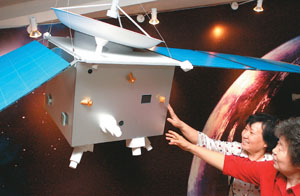 A life-sized Mars probe model is
displayed on Shanghai Aerospace Technology Exhibition in on May 21, 2007. China
will launch its first Mars probe in October 2009 as part of a joint mission with
Russia, said sources with the Shanghai Space Administration, the main developer
of the probe, on Monday.
A life-sized Mars probe model is
displayed on Shanghai Aerospace Technology Exhibition in on May 21, 2007. China
will launch its first Mars probe in October 2009 as part of a joint mission with
Russia, said sources with the Shanghai Space Administration, the main developer
of the probe, on Monday.
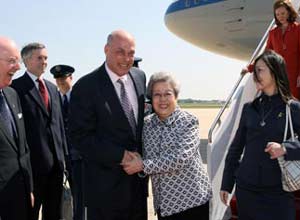 Chinese Vice-Premier Wu Yi arrived in
Washington Monday morning to co-chair with US Secretary of Treasury Henry
Paulson the second meeting of the Strategic Economic Dialogue (SED) scheduled to
begin Tuesday. This meeting will focus on topics in areas of service, investment
and transparency, energy and environment, growth balance and innovation,
according to Chinese Foreign Ministry. Henry Paulson says reducing trade
friction with China is mostly a matter of time - something he is running out of.
Tomorrow, the US Treasury secretary opens a two-day meeting in Washington with
China's top economic officials, the second such gathering of his term and the
first on US soil. After December talks in Beijing failed to produce the progress
Paulson wants, his strategy of seeking to coax policy changes will now play out
in direct view of members of Congress who demand he employ a cudgel rather than
persuasion. "Paulson, as somebody who understood China, was trying to reach a
conciliatory approach," said Nobel laureate Joseph Stiglitz, an economics
professor at Columbia University in New York. "The question is, has the
political pressure taken away his freedom to move?" Paulson, 61, went to Capitol
Hill last week to make plans for mainland officials, led by Vice Premier Wu Yi,
to meet with members of the Senate Finance and House Ways and Means committees,
which are responsible for trade policy. "It's up to the Chinese to give tangible
signals or action on the things that concern Congress, or else they are going to
end up with a piece of legislation that they are not going to like," said
Senator Charles Grassley of Iowa, the ranking Republican on the finance panel.
The record US trade deficit with China - US$232.5 billion (HK$1.81 trillion)
last year, up from US$201.5 billion in 2005 - is feeding complaints in Congress
that China artificially keeps its currency cheap to give its exporters an
advantage. China said Friday it will allow the yuan to rise or fall as much as
0.5 percent from the daily fixing rate against the dollar. The government also
raised interest rates and ordered banks to put aside more money for reserves.
While the changes are "a useful step," the United States "will continue to press
the Chinese" to move faster toward a more flexible currency, Alan Holmer, the
top China official at the Treasury, said. "To widen the band is well and good,
but if they don't use the band, nothing will happen," said Senator Charles
Schumer, the New York Democrat sponsoring the main China sanctions bill. "In the
past, most of their gestures have not produced any concrete change." One Senate
subcommittee has scheduled a hearing on currency manipulation tomorrow. At this
week's session, officials including Federal Reserve chairman Ben Bernanke, 53,
People's Bank of China governor Zhou Xiaochuan, 59, and Wu, 68, will pick up
where they left off in December. Sino-United States economic talks are under
pressure to make progress because of the looming US presidential election, US
Treasury Secretary Henry Paulson said in remarks published in Chinese state
media on Tuesday. Chinese Vice-Premier Wu Yi arrived in
Washington Monday morning to co-chair with US Secretary of Treasury Henry
Paulson the second meeting of the Strategic Economic Dialogue (SED) scheduled to
begin Tuesday. This meeting will focus on topics in areas of service, investment
and transparency, energy and environment, growth balance and innovation,
according to Chinese Foreign Ministry. Henry Paulson says reducing trade
friction with China is mostly a matter of time - something he is running out of.
Tomorrow, the US Treasury secretary opens a two-day meeting in Washington with
China's top economic officials, the second such gathering of his term and the
first on US soil. After December talks in Beijing failed to produce the progress
Paulson wants, his strategy of seeking to coax policy changes will now play out
in direct view of members of Congress who demand he employ a cudgel rather than
persuasion. "Paulson, as somebody who understood China, was trying to reach a
conciliatory approach," said Nobel laureate Joseph Stiglitz, an economics
professor at Columbia University in New York. "The question is, has the
political pressure taken away his freedom to move?" Paulson, 61, went to Capitol
Hill last week to make plans for mainland officials, led by Vice Premier Wu Yi,
to meet with members of the Senate Finance and House Ways and Means committees,
which are responsible for trade policy. "It's up to the Chinese to give tangible
signals or action on the things that concern Congress, or else they are going to
end up with a piece of legislation that they are not going to like," said
Senator Charles Grassley of Iowa, the ranking Republican on the finance panel.
The record US trade deficit with China - US$232.5 billion (HK$1.81 trillion)
last year, up from US$201.5 billion in 2005 - is feeding complaints in Congress
that China artificially keeps its currency cheap to give its exporters an
advantage. China said Friday it will allow the yuan to rise or fall as much as
0.5 percent from the daily fixing rate against the dollar. The government also
raised interest rates and ordered banks to put aside more money for reserves.
While the changes are "a useful step," the United States "will continue to press
the Chinese" to move faster toward a more flexible currency, Alan Holmer, the
top China official at the Treasury, said. "To widen the band is well and good,
but if they don't use the band, nothing will happen," said Senator Charles
Schumer, the New York Democrat sponsoring the main China sanctions bill. "In the
past, most of their gestures have not produced any concrete change." One Senate
subcommittee has scheduled a hearing on currency manipulation tomorrow. At this
week's session, officials including Federal Reserve chairman Ben Bernanke, 53,
People's Bank of China governor Zhou Xiaochuan, 59, and Wu, 68, will pick up
where they left off in December. Sino-United States economic talks are under
pressure to make progress because of the looming US presidential election, US
Treasury Secretary Henry Paulson said in remarks published in Chinese state
media on Tuesday.
As ministers and high-ranking
officials gathered for the China-US Strategic Economic Dialogue discussions in
Washington beginning Tuesday, the Renminbi (RMB), the Chinese currency, reached
a new high of 7.65 for one US dollar.
Booming Guangdong province faces
unprecedented challenges as it struggles to keep its economy ahead of the pack
and maintain stability in the next five years. Guangdong's economy aims to grow
at an annual rate of 9 percent and surpass 4 trillion yuan (HK$4.08 trillion) by
2011, provincial party secretary Zhang Dejiang said Monday at the opening of the
province's weeklong party congress, which meets every five years. But Zhang
warned that economic turbulence and social instability could undercut its
ambitions. "We fully realize that development is the No1 concern, and stability
is the No1 responsibility," Zhang said in a speech to delegates. "In the next
five years our province faces unprecedented opportunities ... at the same time,
our province faces unprecedented challenges." The export-driven province faces
increasing competition from home and abroad, fluctuating energy prices, rising
capital costs in the Pearl River Delta area, environmental degradation, growing
sources of social conflict and "increasingly intense infiltration and sabotage
activities of hostile forces," he said. Last year the province accounted for an
eighth of the country's overall economic growth, Zhang said. But since he took
the helm in 2002 the province has also been beset by a handful of high-profile
crises. SARS surfaced in Guangdong in 2003, and a news blackout did little to
help bring the mysterious disease under control. Also that year, the death in
police custody of Sun Zhigang, a designer from another province who was detained
for not having proper identification, sparked a national outcry. An ensuing
media crackdown met with strong resistance. In 2005, thugs terrorized the
Guangdong village of Taishi, where residents were petitioning to sack their
elected village chief, who they said was corrupt. Then came strife in Dongzhou,
where police opened fire on protesters angry over the loss of land to power
projects. Protesters said up to 20 of them died. The government put the figure
at three. The party must "view soberly" the problems of the past five years,
Zhang said. "Public security, health care, food and drug safety, protection of
the livelihood of farmers who have had their land appropriated, protection of
the rights of migrant laborers and their environment, safe production and other
such problems are pronounced." He added, though, that the number of "mass
incidents" was down, though he did not give figures.
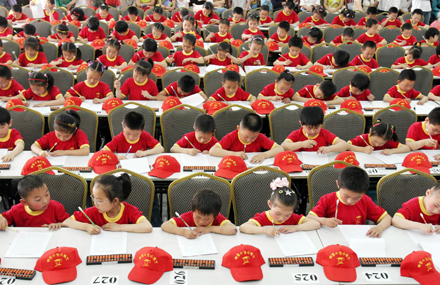 Young
colleagues compare notes (front row) in an abacus and mental arithmetic contest
in Huaibei in eastern Anhui province, on Sunday. The contest for the northern
part of the province attracted more than 200 participants aged between 4 and 8
years old. Young
colleagues compare notes (front row) in an abacus and mental arithmetic contest
in Huaibei in eastern Anhui province, on Sunday. The contest for the northern
part of the province attracted more than 200 participants aged between 4 and 8
years old.
Shanghai has turned the flamboyant
chief of Formula One racing in China, Yu Zhifei, and three government officials
over to the courts for prosecution on charges of corruption.
May 23, 2007
 Hong Kong:
The pay package of the Hong
Kong Tourism Board's new executive director will be cut by 10 percent, according
to chairman and Liberal Party leader James Tien Pei-chun. Hong Kong:
The pay package of the Hong
Kong Tourism Board's new executive director will be cut by 10 percent, according
to chairman and Liberal Party leader James Tien Pei-chun.
 Global economic growth remains robust and is becoming more balanced across
regions, finance ministers from the Group of Eight major industrial nations said
on Saturday.
Global economic growth remains robust and is becoming more balanced across
regions, finance ministers from the Group of Eight major industrial nations said
on Saturday.
 Listing candidate
Walker Group, a footwear retailer with a portfolio of several brands, has
earmarked HK$200 million in capital expenditure to open 190 points of sale in
Hong Kong and the mainland over the next two years. Listing candidate
Walker Group, a footwear retailer with a portfolio of several brands, has
earmarked HK$200 million in capital expenditure to open 190 points of sale in
Hong Kong and the mainland over the next two years.
Market sources said the shoe chain plans to raise up to HK$600 million through
an initial public offering in Hong Kong, which is scheduled for the end of this
month. The shares are likely to debut in the middle of next month. DBS and
Taifook Securities Group are handling the float. In addition to the 190 points
of sale, Walker Group plans to add 150 franchise shops over next two years,
chairman and chief executive Huang Wenyi said Sunday. Huang said 90 percent of
the proposed shops will be in the mainland. Walker Group has 392 points of sale
in Greater China, including 330 in the mainland, covering 23 provinces and 50
cities, 56 in Hong Kong and six franchise stores in Taiwan. Walker has six
inhouse brands - Couber.G, Artemis, Forleria, Ox-x-ox, Tru-Nari and Walaci -
that account for 90 percent of turnover. It also sells Acupuncture, Pink
Panther, Borse Mogan, Kenford and Vert Dense under franchise. Compared with
Belle International, the mainland's largest women's shoe retailer, also a
manufacturer, Walker Group also designs and sells footwear. Itochu Corp, the
Japanese trading company and The Yale Endowment are said to be among its
strategic investors. "Management can put in a greater effort to develop sales
and the design business if we outsource production," said executive director
Kenneth Kiu, adding that not operating its own manufacturing facility can help
reduce heavy capital expenditure. Chief financial officer and executive director
Eamon Chu said the group, which has operated for six years in the mainland, can
maintain a relatively high growth rate.
 A secret working group set up by
Britain and China was responsible for setting a fixed exchange rate between the
Hong Kong and US currencies even before the Sino-British joint declaration was
signed in 1984, according to Lu Ping, former director of the State Council's
Hong Kong and Macau Affairs Office. In an interview with Cable TV broadcast
Sunday, he revealed that the group was created behind-the-scenes with the aim of
maintaining economic and financial stability in the territory, with pegging the
local currency with the greenback one of the issues discussed. "Representatives
from both sides met up regularly in complete secrecy, and the final decision was
made jointly. I was the first leader of the China team in the group," Lu said in
the interview - his first with the Hong Kong media since his retirement in 1997.
The fixed exchange rate of HK$7.80 to US$1, announced by then-Financial
Secretary John Bremridge October 17, 1983, came after the local currency
experienced rapid decline for a few weeks. The Hong Kong government, then headed
by Edward Youde, had been under fire for its inability to maintain confidence in
the volatile and vulnerable Hong Kong dollar, which fluctuated from HK$5.13 in
1981 to an alarming HK$9.60 in 1983. Continuous budgetary deficits, a series of
poor land sales and political uncertainties with regards to the 1997 handover
were among the culprits for the drop, according to the then-chairman of the
Forex group of companies Stanley Au. "The solution to [the problem of a wavering
local currency] was a successful conclusion to the Sino-British talks on Hong
Kong's future," said Baptist College economics lecturer Tang Shu- hung a week
before the peg was announced. Lu, who was also formerly deputy secretary-general
of the Basic Law Drafting Committee, said China had also considered setting up
an insurance scheme in the form of a company in Switzerland, to cover business
enterprises for politically induced losses after 1997. "To us, that was an
absolutely no-loss proposal. It will definitely make money, 100 percent certain
profit, because I was confident we would not let any enterprise suffer any
post-reunification losses caused by political reasons. We were to insure any
amount you want. You want HK$100 million coverage, we would cover it; you want
HK$10 billion, we would still cover it," Lu said, referring to people who had no
confidence in the future of Hong Kong. He said the top concern during pre-
handover policy formulation was the interests of consortiums. "Our biggest
concern was that big businesses, particularly the ones overseas, might pull
out," Lu said. He said the thinking then was that the welfare of the
middle-class and grassroots levels would naturally be taken care of once the
worries of the consortiums were relieved. Lu admitted, looking back now, that
the aspirations of the middle and lower classes could have been taken care of
better. "Although we had paid attention to people in the middle-class and
grassroots levels, who make up the majority after all, it wasn't enough. More
could have been done for them," he said. Lu, who celebrates his 80th birthday in
September, described the handover ceremony nearly 10 years ago as a "touching
yet relieving" experience. "I was overwhelmed by emotions when I saw on stage
the national flag being raised, the British flag being lowered, with the
national anthem being played at the background. Tears just rolled down my face,"
he recalled. He admitted overexerting himself for many years before the 1997
watershed, when he was already 70. "The completion of the mission allowed me to
bow out. I could move on and do the things I like to do. It was really a moment
of relief," he said.
A secret working group set up by
Britain and China was responsible for setting a fixed exchange rate between the
Hong Kong and US currencies even before the Sino-British joint declaration was
signed in 1984, according to Lu Ping, former director of the State Council's
Hong Kong and Macau Affairs Office. In an interview with Cable TV broadcast
Sunday, he revealed that the group was created behind-the-scenes with the aim of
maintaining economic and financial stability in the territory, with pegging the
local currency with the greenback one of the issues discussed. "Representatives
from both sides met up regularly in complete secrecy, and the final decision was
made jointly. I was the first leader of the China team in the group," Lu said in
the interview - his first with the Hong Kong media since his retirement in 1997.
The fixed exchange rate of HK$7.80 to US$1, announced by then-Financial
Secretary John Bremridge October 17, 1983, came after the local currency
experienced rapid decline for a few weeks. The Hong Kong government, then headed
by Edward Youde, had been under fire for its inability to maintain confidence in
the volatile and vulnerable Hong Kong dollar, which fluctuated from HK$5.13 in
1981 to an alarming HK$9.60 in 1983. Continuous budgetary deficits, a series of
poor land sales and political uncertainties with regards to the 1997 handover
were among the culprits for the drop, according to the then-chairman of the
Forex group of companies Stanley Au. "The solution to [the problem of a wavering
local currency] was a successful conclusion to the Sino-British talks on Hong
Kong's future," said Baptist College economics lecturer Tang Shu- hung a week
before the peg was announced. Lu, who was also formerly deputy secretary-general
of the Basic Law Drafting Committee, said China had also considered setting up
an insurance scheme in the form of a company in Switzerland, to cover business
enterprises for politically induced losses after 1997. "To us, that was an
absolutely no-loss proposal. It will definitely make money, 100 percent certain
profit, because I was confident we would not let any enterprise suffer any
post-reunification losses caused by political reasons. We were to insure any
amount you want. You want HK$100 million coverage, we would cover it; you want
HK$10 billion, we would still cover it," Lu said, referring to people who had no
confidence in the future of Hong Kong. He said the top concern during pre-
handover policy formulation was the interests of consortiums. "Our biggest
concern was that big businesses, particularly the ones overseas, might pull
out," Lu said. He said the thinking then was that the welfare of the
middle-class and grassroots levels would naturally be taken care of once the
worries of the consortiums were relieved. Lu admitted, looking back now, that
the aspirations of the middle and lower classes could have been taken care of
better. "Although we had paid attention to people in the middle-class and
grassroots levels, who make up the majority after all, it wasn't enough. More
could have been done for them," he said. Lu, who celebrates his 80th birthday in
September, described the handover ceremony nearly 10 years ago as a "touching
yet relieving" experience. "I was overwhelmed by emotions when I saw on stage
the national flag being raised, the British flag being lowered, with the
national anthem being played at the background. Tears just rolled down my face,"
he recalled. He admitted overexerting himself for many years before the 1997
watershed, when he was already 70. "The completion of the mission allowed me to
bow out. I could move on and do the things I like to do. It was really a moment
of relief," he said.
Hong Kong was experiencing mild
annual price rises - but inflationary pressures in the economy were generally
under control, a government spokesman said on Monday
Hong Kong University graduates last
year had an average gross income of more than HK$15,000 a month, a survey found
on Monday.
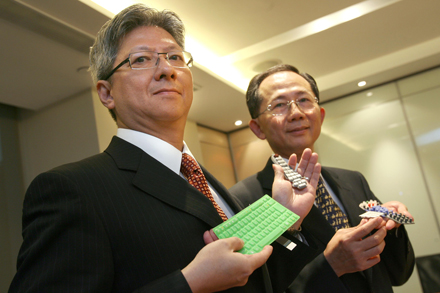 Ta Yang
chairman Huang Sheng-shun (left) and chief executive Wu Ih-chen will control
about 60 per cent of the firm's post IPO shares. Taiwan-based Ta Yang Group, the
world's biggest maker of silicone rubber parts and components, plans to raise up
to HK$700 million in a Hong Kong initial public offering next month. Sources
said the company, which kicks off its roadshow today, aims to sell 200 million
new shares for between HK$2.72 and HK$3.50 each. Pricing will be set on June 1,
ahead of a trading debut scheduled for June 8, the source familiar with the deal
said. Ta Yang will use 70 to 80 per cent of the proceeds from the share sale to
increase capacity and purchase new machinery, chairman Huang Sheng-shun said
yesterday at a press briefing. The deal is being arranged by Cazenove Asia. Ta
Yang has five manufacturing plants on the mainland making components such as
rubber-based keypad underlays for electronics companies such as Casio,
Mitsubishi, Panasonic, Tectronic and Thompson. Last year, it launched a new
facility in Dongguan to supply parts to mobile handset companies Nokia and
Motorola. Mr Huang said revenue growth had averaged 20 per cent in the past
three years while net profit had increased at a 30 per cent rate. In addition to
components, the company in-sources production of steel moulds and rubber-based
raw materials at a dedicated facility in Dongguan - a strategy that helps
control costs and increase profit margins. Raw materials account for between 33
per cent and 50 per cent of all input costs. By next year, the company aims to
lift its monthly raw materials manufacturing capacity to 700 tons, up from 500
tons. Ta Yang, the first Taiwan company in its field to establish manufacturing
facilities on the mainland, employs 5,000 workers at its four plants in Dongguan
and one in Huzhou, Zhejiang province. Last year the company held 9.9 per cent of
the global market for silicone rubber parts, and 14.6 per cent of the mainland
market, according to executives. Last year, consumer electronics companies
accounted for 59 per cent of Ta Yang's revenue, with computer makers making up
21 per cent and the remainder coming from mobile phones and auto parts
manufacturers. By 2010, Ta Yang hopes each of the three segments will contribute
an equal share of revenue. Strategic investors in Ta Yang include Japanese
partners Mitsubishi and Shin-Etsu Polymer which will each hold a 1.5 per cent
stake in Ta Yang following the share shale. Their shares are subject to a
one-year lockup. Following the listing, the company's public float will be 25
per cent. Mr Huang and co-founder Ted Wu Ih-chen will control around 60 per cent
of Ta Yang's shares with other management and directors holding another 8 per
cent. Established in 1991, Ta Yang produces a wide range of silicone and
plastic-related products for global electronics and telecommunications
manufacturers including Casio, Philips and Microsoft. Ta Yang
chairman Huang Sheng-shun (left) and chief executive Wu Ih-chen will control
about 60 per cent of the firm's post IPO shares. Taiwan-based Ta Yang Group, the
world's biggest maker of silicone rubber parts and components, plans to raise up
to HK$700 million in a Hong Kong initial public offering next month. Sources
said the company, which kicks off its roadshow today, aims to sell 200 million
new shares for between HK$2.72 and HK$3.50 each. Pricing will be set on June 1,
ahead of a trading debut scheduled for June 8, the source familiar with the deal
said. Ta Yang will use 70 to 80 per cent of the proceeds from the share sale to
increase capacity and purchase new machinery, chairman Huang Sheng-shun said
yesterday at a press briefing. The deal is being arranged by Cazenove Asia. Ta
Yang has five manufacturing plants on the mainland making components such as
rubber-based keypad underlays for electronics companies such as Casio,
Mitsubishi, Panasonic, Tectronic and Thompson. Last year, it launched a new
facility in Dongguan to supply parts to mobile handset companies Nokia and
Motorola. Mr Huang said revenue growth had averaged 20 per cent in the past
three years while net profit had increased at a 30 per cent rate. In addition to
components, the company in-sources production of steel moulds and rubber-based
raw materials at a dedicated facility in Dongguan - a strategy that helps
control costs and increase profit margins. Raw materials account for between 33
per cent and 50 per cent of all input costs. By next year, the company aims to
lift its monthly raw materials manufacturing capacity to 700 tons, up from 500
tons. Ta Yang, the first Taiwan company in its field to establish manufacturing
facilities on the mainland, employs 5,000 workers at its four plants in Dongguan
and one in Huzhou, Zhejiang province. Last year the company held 9.9 per cent of
the global market for silicone rubber parts, and 14.6 per cent of the mainland
market, according to executives. Last year, consumer electronics companies
accounted for 59 per cent of Ta Yang's revenue, with computer makers making up
21 per cent and the remainder coming from mobile phones and auto parts
manufacturers. By 2010, Ta Yang hopes each of the three segments will contribute
an equal share of revenue. Strategic investors in Ta Yang include Japanese
partners Mitsubishi and Shin-Etsu Polymer which will each hold a 1.5 per cent
stake in Ta Yang following the share shale. Their shares are subject to a
one-year lockup. Following the listing, the company's public float will be 25
per cent. Mr Huang and co-founder Ted Wu Ih-chen will control around 60 per cent
of Ta Yang's shares with other management and directors holding another 8 per
cent. Established in 1991, Ta Yang produces a wide range of silicone and
plastic-related products for global electronics and telecommunications
manufacturers including Casio, Philips and Microsoft.
City Telecom, one of Hong Kong's
largest fixed-line carriers, returned to profit in the first half after cutting
expenditure and operating expenses and on improved performance by its broadband
business.
 China: China
securities regulator Sunday unveiled management rules that give green lights to
the establishment of representative offices of overseas stock exchanges in
China.
China: China
securities regulator Sunday unveiled management rules that give green lights to
the establishment of representative offices of overseas stock exchanges in
China.
The Ministry of Agriculture
confirmed over the weekend an outbreak of the H5N1 bird flu virus among poultry
in the central province of Hunan, but said there were no cases of human
infection.
The central parity rate for yuan
against U.S. dollar rose to new high on Monday, the first trading day when the
daily floating band for the spot rate in the interbank foreign exchange market
is expanded.
Europe's largest engineering firm
Siemens has signed an agreement to become the sixth global partner of World Expo
2010 Shanghai.
China's state foreign exchange
investment company, still under preparation for establishment, has agreed to
invest three billion U.S. dollars in U.S. private equityfirm the Blackstone
Group, according to a joint news release. Wang Jianxi, Chairman of the China
Jianyin Investment Limited (China Jianyin), told Xinhua Monday that under an
agreement signedon Sunday, the new state forex investment company will buy less
than 10 percent non-voting stake in Blackstone. As a state-owned investment
company, China Jianyin will be merged into the state forex investment company
after its establishment. According to the joint news release from the state
forex investment company and the Blackstone, the deal will be closed
concurrently with Blackstone's four billion U.S. dollars initial public offering
(IPO) planned to be launched in mid June. The Chinese investment company will
buy the shares at 95.5 percent of the IPO price and hold them for at least four
years.
China was "losing no time" in
preparing its first lunar orbiter, Chang'e I, which will most likely be launched
in the second half of 2007, a space official said here on Sunday. "The moon
probe project is the third milestone in China's space technology after satellite
and manned spacecraft projects, and a first step for us in exploring deep
space," said Sun Laiyan, chief of the China National Space Administration. Sun,
also vice director of the Commission of Science Technology and Industry for
National Defence, made the remarks when briefing students at Beijing Jiaotong
University on China's space program. China's moon exploration program is divided
into three phases -- "circling the moon", "landing on the moon" and "back to
earth", said Sun.
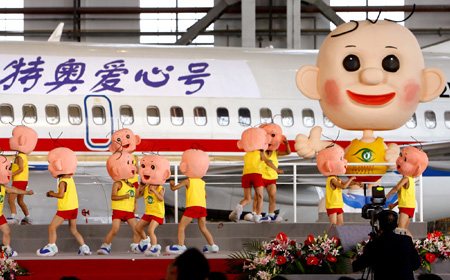 The posters of famous Chinese
cartoon figure Sanmao, who was chosen as the mascot for 2007 Special Olympics
World Summer Games, are unveiled in Shanghai May 20,2007.
The posters of famous Chinese
cartoon figure Sanmao, who was chosen as the mascot for 2007 Special Olympics
World Summer Games, are unveiled in Shanghai May 20,2007.
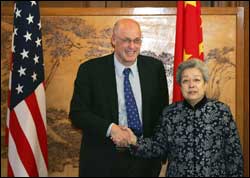 After extending an
olive branch to the United States by broadening its yuan trading range, mainland
officials are likely to focus on other issues to cement progress in high-level
discussions this week in Washington focusing on long- term strategic issues and
economic challenges. Senior officials of both countries meet in Washington
tomorrow and Wednesday in the second session of the strategic economic dialogue,
which was launched in December in Beijing. Vice Premier Wu Yi will head the
mainland delegation, which will include 14 Cabinet-level ministers, while
Treasury Secretary Henry Paulson will head the US team, which includes officials
from 10 Cabinet-level departments and Federal Reserve chairman Ben Bernanke. Few
analysts on either side of the Pacific read Friday's move by the People's Bank
of China to let the yuan range up or down by 0.5 percent each day as a sign that
it was ready to let the currency's gradual climb gather more pace, as US
lawmakers, including senator Charles Schumer - one of the harshest China critics
- have demanded. A bipartisan group of 42 House members Thursday filed a
petition pushing for a trade case. Officials will probably aim to identify new
fields - such as energy and the environment - where the two can find win-win
solutions, analysts say. "There won't be any big breakthroughs on problems like
the yuan and market access, but there will definitely be some small
improvements," said Shi Yinhong, a professor at the People's University of China
in Beijing. "China will tell the Americans: `We shouldn't just look at how much
progress has been made specifically on old points of contention - we need to
look at all of these little improvements in both new and old areas."' Much of
the frustration in Washington over the US trade deficit with the mainland -
which hit US$233 billion (HK$1.82 trillion) last year - has focused on the yuan.
The mainland has plenty of reasons for standing firm on letting the yuan
strengthen only gradually, said Yin Jianfeng, a researcher at the Chinese
Academy of Social Sciences. "There's little chance of making concessions - not
from the economic angle nor the political one," Yin said. Authorities will want
to avoid mass layoffs in export industries such as textiles and light
manufacturing that employ millions of rural migrant workers, Yin added. Further,
with the five-yearly Communist Party congress in the fall - at which key posts
in the party bureaucracy will be filled - officials will avoid bold reforms that
could cause economic bumps, he said. One area where Beijing might hold out a
carrot is financial services, lifting the 25 percent cap on foreign ownership of
banks and allowing more joint- ventures of securities firms. Beijing's
willingness to move will no doubt depend on whether the United States
compromises on issues such as curbs on exports of high-tech goods with dual
civil-military applications. "Everything is on a give-and-take basis. If the
United States moved unilaterally on some anti-subsidy policies, it could cause
the process to backfire," said Ha Jiming, chief economist at China International
Capital Corp. After extending an
olive branch to the United States by broadening its yuan trading range, mainland
officials are likely to focus on other issues to cement progress in high-level
discussions this week in Washington focusing on long- term strategic issues and
economic challenges. Senior officials of both countries meet in Washington
tomorrow and Wednesday in the second session of the strategic economic dialogue,
which was launched in December in Beijing. Vice Premier Wu Yi will head the
mainland delegation, which will include 14 Cabinet-level ministers, while
Treasury Secretary Henry Paulson will head the US team, which includes officials
from 10 Cabinet-level departments and Federal Reserve chairman Ben Bernanke. Few
analysts on either side of the Pacific read Friday's move by the People's Bank
of China to let the yuan range up or down by 0.5 percent each day as a sign that
it was ready to let the currency's gradual climb gather more pace, as US
lawmakers, including senator Charles Schumer - one of the harshest China critics
- have demanded. A bipartisan group of 42 House members Thursday filed a
petition pushing for a trade case. Officials will probably aim to identify new
fields - such as energy and the environment - where the two can find win-win
solutions, analysts say. "There won't be any big breakthroughs on problems like
the yuan and market access, but there will definitely be some small
improvements," said Shi Yinhong, a professor at the People's University of China
in Beijing. "China will tell the Americans: `We shouldn't just look at how much
progress has been made specifically on old points of contention - we need to
look at all of these little improvements in both new and old areas."' Much of
the frustration in Washington over the US trade deficit with the mainland -
which hit US$233 billion (HK$1.82 trillion) last year - has focused on the yuan.
The mainland has plenty of reasons for standing firm on letting the yuan
strengthen only gradually, said Yin Jianfeng, a researcher at the Chinese
Academy of Social Sciences. "There's little chance of making concessions - not
from the economic angle nor the political one," Yin said. Authorities will want
to avoid mass layoffs in export industries such as textiles and light
manufacturing that employ millions of rural migrant workers, Yin added. Further,
with the five-yearly Communist Party congress in the fall - at which key posts
in the party bureaucracy will be filled - officials will avoid bold reforms that
could cause economic bumps, he said. One area where Beijing might hold out a
carrot is financial services, lifting the 25 percent cap on foreign ownership of
banks and allowing more joint- ventures of securities firms. Beijing's
willingness to move will no doubt depend on whether the United States
compromises on issues such as curbs on exports of high-tech goods with dual
civil-military applications. "Everything is on a give-and-take basis. If the
United States moved unilaterally on some anti-subsidy policies, it could cause
the process to backfire," said Ha Jiming, chief economist at China International
Capital Corp.
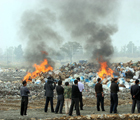 (Fake medicines, such as these being
burned by officials in Liaoning province, will be a key point of debate at this
week's Sino-US dialogue) Copyright piracy row casts shadow over Sino-US talks -
American drug firms raise concerns over counterfeits, We don't have any pirated
products here," the saleswoman at Chaoyang Hospital pharmacy in central Beijing
said firmly, pointing towards an expensive pack of genuine Viagra. But at the
sex shop across the road, anxious men could choose from an impressive array of
chemical pick-me-ups, including a seductively packaged box of "Viagia", a packet
of genuine-looking Viagra and fluorescent blue "Wei Ge" ("mighty brother") pills
- all sold at a fraction of the price of the Viagra in the hospital pharmacy.
When Vice-Premier Wu Yi and US Treasury Secretary Henry Paulson meet for the
second round of the US-China Strategic Economic Dialogue (SED) in Washington
this week, the abuse of intellectual property rights (IPR) - including the issue
of counterfeit drugs - will be a key point of contention. Pfizer, the US
pharmaceuticals company that makes Viagra, recently lost a long-running battle
to block mainland drug companies from branding their product "wei ge", the
popular translation for Viagra. Pfizer sells Viagra as "Wan Ai Ke", which few
customers have heard of. American firms such as Pfizer, whose business is based
on intellectual property ownership, complain that IPR breaches on the mainland
threaten to make doing business untenable. Having spent nothing on research and
development, domestic copycats undercut established foreign brands and skim off
the profits. "Pharmaceutical companies are cautious about manufacturing in China
because of concerns about jeopardising IPR protection. The IPR issue remains
extremely significant and is a priority issue at the SED," said Lester Ross,
managing partner in Beijing for US law firm WilmerHale. Another concern for US
drug makers is the prevalence of chemical companies on the mainland that legally
sell bulk pharmaceutical ingredients to downstream counterfeiters, which are
then processed into unregulated drugs. Some of these find their way into the US
market. In a recent white paper, the American Chamber of Commerce in China said
"improving the IPR environment in China is a key to strengthening the US-China
commercial dialogue". It also maintains that widespread counterfeiting
effectively closes the mainland market to many US technology firms. Improvements
in enforcement would encourage US exports and "help to redress the trade
imbalance", the key sticking point of Sino-US economic relations, it said. Shi
Yinhong , director of the Centre for American Studies at Renmin University in
Beijing, takes the view that market access is at the heart of American aims.
"The true goal of the US government is not to protect IPR per se, but to give US
companies greater access to the Chinese market," he said. "IPR connects with
various structural problems of the Chinese economy, as well as problems with
domestic governance. "In this area, China is worse than any of the other big
developing countries, and it will take a lot of time and effort to turn the
situation around." Some foreign pharmaceuticals companies could also be more
vigilant about protecting their intellectual property from theft, Mr Ross said.
"Not everybody has been as zealous as they should have been with respect to the
protection that Chinese law provides," he said. "There is a problem among
western companies in not filing for patents because it is very costly and time
consuming. But if you miss that opportunity, generic-drug manufacturers will
move in before you have legal protection." The central government argues that it
has done much to improve the general IPR situation. Aside from strengthening the
legal framework for IPR protection, it conducts well-publicised periodic
crackdowns on illegal DVDs and clothing. Last year, it took action before
President Hu Jintao's visit to Washington by replacing pirated computer software
used in government departments with legal copies. "I believe there has been a
significant improvement in the overall environment for IPR, but there are still
some gaps in the law and in terms of penalties for violations and enforcement,"
Mr Ross said.
(Fake medicines, such as these being
burned by officials in Liaoning province, will be a key point of debate at this
week's Sino-US dialogue) Copyright piracy row casts shadow over Sino-US talks -
American drug firms raise concerns over counterfeits, We don't have any pirated
products here," the saleswoman at Chaoyang Hospital pharmacy in central Beijing
said firmly, pointing towards an expensive pack of genuine Viagra. But at the
sex shop across the road, anxious men could choose from an impressive array of
chemical pick-me-ups, including a seductively packaged box of "Viagia", a packet
of genuine-looking Viagra and fluorescent blue "Wei Ge" ("mighty brother") pills
- all sold at a fraction of the price of the Viagra in the hospital pharmacy.
When Vice-Premier Wu Yi and US Treasury Secretary Henry Paulson meet for the
second round of the US-China Strategic Economic Dialogue (SED) in Washington
this week, the abuse of intellectual property rights (IPR) - including the issue
of counterfeit drugs - will be a key point of contention. Pfizer, the US
pharmaceuticals company that makes Viagra, recently lost a long-running battle
to block mainland drug companies from branding their product "wei ge", the
popular translation for Viagra. Pfizer sells Viagra as "Wan Ai Ke", which few
customers have heard of. American firms such as Pfizer, whose business is based
on intellectual property ownership, complain that IPR breaches on the mainland
threaten to make doing business untenable. Having spent nothing on research and
development, domestic copycats undercut established foreign brands and skim off
the profits. "Pharmaceutical companies are cautious about manufacturing in China
because of concerns about jeopardising IPR protection. The IPR issue remains
extremely significant and is a priority issue at the SED," said Lester Ross,
managing partner in Beijing for US law firm WilmerHale. Another concern for US
drug makers is the prevalence of chemical companies on the mainland that legally
sell bulk pharmaceutical ingredients to downstream counterfeiters, which are
then processed into unregulated drugs. Some of these find their way into the US
market. In a recent white paper, the American Chamber of Commerce in China said
"improving the IPR environment in China is a key to strengthening the US-China
commercial dialogue". It also maintains that widespread counterfeiting
effectively closes the mainland market to many US technology firms. Improvements
in enforcement would encourage US exports and "help to redress the trade
imbalance", the key sticking point of Sino-US economic relations, it said. Shi
Yinhong , director of the Centre for American Studies at Renmin University in
Beijing, takes the view that market access is at the heart of American aims.
"The true goal of the US government is not to protect IPR per se, but to give US
companies greater access to the Chinese market," he said. "IPR connects with
various structural problems of the Chinese economy, as well as problems with
domestic governance. "In this area, China is worse than any of the other big
developing countries, and it will take a lot of time and effort to turn the
situation around." Some foreign pharmaceuticals companies could also be more
vigilant about protecting their intellectual property from theft, Mr Ross said.
"Not everybody has been as zealous as they should have been with respect to the
protection that Chinese law provides," he said. "There is a problem among
western companies in not filing for patents because it is very costly and time
consuming. But if you miss that opportunity, generic-drug manufacturers will
move in before you have legal protection." The central government argues that it
has done much to improve the general IPR situation. Aside from strengthening the
legal framework for IPR protection, it conducts well-publicised periodic
crackdowns on illegal DVDs and clothing. Last year, it took action before
President Hu Jintao's visit to Washington by replacing pirated computer software
used in government departments with legal copies. "I believe there has been a
significant improvement in the overall environment for IPR, but there are still
some gaps in the law and in terms of penalties for violations and enforcement,"
Mr Ross said.
China
Automotive Systems is opening a Detroit-area office to sell steering systems to
US automakers as it looks to expand beyond the mainland's own rapidly growing
car companies.
Chery
Automobile, China's largest carmaker with a local brand, plans to build large
sedans, shedding its image as an assembler of low-priced models to attract a
growing number of drivers who can afford bigger cars.
In China, irrational, speculative
and herd-like investment behavior is not just endemic of retail investors in its
red-hot stock markets. Erratic investment boom-bust cycles are also a hallmark
of many industries, including wind power.
May 22, 2007
 Hong Kong:
Hong Kong's economy continued to grow in the first quarter, with GDP rising 5.6
percent in real terms, Acting Government Economist Helen Chan said on Friday.
The figure marked the 14th consecutive quarter that Hong Kong's GDP growth
exceeded the average trend growth. Chan said that given the outturn so far, Hong
Kong's economy should be able to attain GDP growth of 4.5 to 5.5 percent as
forecast in the Budget. According to the figure released from the government of
Hong Kong Special Administrative Region (HKSAR), external trade still fared well
in the first quarter, as the Chinese mainland's thriving trade flow and strong
domestic demand cushioned the continued slack in the U.S. market. Merchandise
exports grew 8.2 percent in real terms. Bolstered by the surge in exports of
financial and business services and the expansion of both offshore trade and
inbound tourism, exports of services rose 8.4 percent in real terms. With rising
labor income and the wealth effect stemming from the buoyant performance of the
stock market, private consumption expenditure grew 5.6 percent in real terms.
Overall investment spending grew by 3.9 percent, after several quarters of
notable growth. The economic upturn continued to give rise to a stronger demand
for labor, pushing the seasonally adjusted unemployment rate lower to 4.3
percent in the first quarter, Chan said. Although the global economy is able to
sustain strong growth momentum, there are uncertainties that warrant a close
watch over, Chan said. However, continuous economic expansion in Europe and
Japan may fill the gap from a slowing U.S. economy, and the vibrant Chinese
mainland economy will continue to be a plus factor for Hong Kong, she added.
Chan also said that tighter labor market conditions, the weakness of the U.S.
dollar and renminbi appreciation will see cost pressure creep up. Hong Kong:
Hong Kong's economy continued to grow in the first quarter, with GDP rising 5.6
percent in real terms, Acting Government Economist Helen Chan said on Friday.
The figure marked the 14th consecutive quarter that Hong Kong's GDP growth
exceeded the average trend growth. Chan said that given the outturn so far, Hong
Kong's economy should be able to attain GDP growth of 4.5 to 5.5 percent as
forecast in the Budget. According to the figure released from the government of
Hong Kong Special Administrative Region (HKSAR), external trade still fared well
in the first quarter, as the Chinese mainland's thriving trade flow and strong
domestic demand cushioned the continued slack in the U.S. market. Merchandise
exports grew 8.2 percent in real terms. Bolstered by the surge in exports of
financial and business services and the expansion of both offshore trade and
inbound tourism, exports of services rose 8.4 percent in real terms. With rising
labor income and the wealth effect stemming from the buoyant performance of the
stock market, private consumption expenditure grew 5.6 percent in real terms.
Overall investment spending grew by 3.9 percent, after several quarters of
notable growth. The economic upturn continued to give rise to a stronger demand
for labor, pushing the seasonally adjusted unemployment rate lower to 4.3
percent in the first quarter, Chan said. Although the global economy is able to
sustain strong growth momentum, there are uncertainties that warrant a close
watch over, Chan said. However, continuous economic expansion in Europe and
Japan may fill the gap from a slowing U.S. economy, and the vibrant Chinese
mainland economy will continue to be a plus factor for Hong Kong, she added.
Chan also said that tighter labor market conditions, the weakness of the U.S.
dollar and renminbi appreciation will see cost pressure creep up.
The Hong Kong government announced
Friday that the Companies Ordinance (Amendment of 8th Schedule) Order 2007,
which amends the fees concerning overseas companies, has been gazetted. The
order restructures the filing fees for overseas companies, introduces a new fee
for the issue of registration certificates and amends Part V of the 8th Schedule
insofar as it relates to the renaming of 'overseas' companies as 'non-Hong Kong'
companies. The proposed single filing fee is set on the basis of the ' revenue
neutral' principle, i.e. overseas companies, on average, would not pay more when
compared with the fees payable at present as long as their annual returns are
filed within the deadline prescribed in the Companies Ordinance (i.e. within 42
days after the anniversary date of registration). Other proposed fees are
basically the same as those applicable to existing local companies. Subject to
completion of the negative vetting process in the Legislative Council, the order
is planned to come into effect in the fourth quarter of 2007 to synchronize with
the completion of the necessary modifications to the Companies Registry's
information system. The Registrar of Companies will prescribe that date by means
of a commencement notice once the implementation date of the modifications is
confirmed.
The government of the Macao Special
Administrative Region has collected 8.95 billion patacas (1.12 billion U.S.
dollars) in direct gaming taxes in the first four months of this year, a
year-on-year rise of 46.8 percent. The statistics issued Friday by the Finance
Services Bureau ( FSB) showed that the gaming taxes accounted for 73.9 percent
of the government total revenue during the period. Macao's 26 casinos pay 35
percent of their gross receipts as direct tax to the government. The region,
with a population of 508,000, has a 150-year history of gaming industry and is
the only part of China where casino gaming is legitimate.
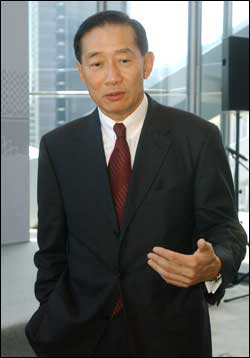 A top executive at Hongkong and Shanghai Banking Corporation said Friday that
China's decision to raise interest rates is likely to dampen Hong Kong stocks,
40 percent of which are related to China. "China will definitely implement some
policies to cool down the market, and when they do that, these [Chinese] stocks
will be directly affected," said HSBC executive director Peter Wong Tung-shun
during a radio show. As retail investors turned cautious towards the weekend,
the Shanghai Composite Index closed Friday at 4,030.258 points, down 18.035
points or 0.45 percent, with turnover at 166.3 billion yuan (HK$169.48 billion).
Despite widely held fears of a developing A-share market bubble, HSBC chief
executive Michael Smith said the bank "would love to" bring the London-based
banking group back to its roots - Shanghai. "The market will change at some
stage and we would love to be first off the rail," Smith said Friday. Louis Shum
Chun-ying, director at Sincere Securities, said Chinese stocks are seriously
overpriced as there is too much money in the market with too few stocks to
absorb the funds. "The situation in Hong Kong is not any better, with retail
investors coming to us [fund managers] asking for numbers [stock codes] all the
time without even bothering to know what the companies' names are."
A top executive at Hongkong and Shanghai Banking Corporation said Friday that
China's decision to raise interest rates is likely to dampen Hong Kong stocks,
40 percent of which are related to China. "China will definitely implement some
policies to cool down the market, and when they do that, these [Chinese] stocks
will be directly affected," said HSBC executive director Peter Wong Tung-shun
during a radio show. As retail investors turned cautious towards the weekend,
the Shanghai Composite Index closed Friday at 4,030.258 points, down 18.035
points or 0.45 percent, with turnover at 166.3 billion yuan (HK$169.48 billion).
Despite widely held fears of a developing A-share market bubble, HSBC chief
executive Michael Smith said the bank "would love to" bring the London-based
banking group back to its roots - Shanghai. "The market will change at some
stage and we would love to be first off the rail," Smith said Friday. Louis Shum
Chun-ying, director at Sincere Securities, said Chinese stocks are seriously
overpriced as there is too much money in the market with too few stocks to
absorb the funds. "The situation in Hong Kong is not any better, with retail
investors coming to us [fund managers] asking for numbers [stock codes] all the
time without even bothering to know what the companies' names are."
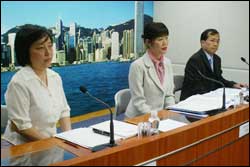 The Hong Kong economy grew slower than
expected in the first quarter, due to weak investment spending and exports. The Hong Kong economy grew slower than
expected in the first quarter, due to weak investment spending and exports.
Government figures released Friday showed gross domestic product rose 5.6
percent from a year ago, lagging behind the revised 7.3 percent growth for the
final quarter of last year. On a seasonally-adjusted quarter-to- quarter basis,
the economy expanded by just 0.5 percent, its weakest performance since economic
recovery began nearly four years ago. The first-quarter growth in GDP was well
below market expectations. "It was below our expectation, largely due to the
slowdown in the investment component," said Bank of East Asia chief economist
Paul Tang Sai-on. Investment in building and construction fell 5.4 percent year
on year, a faster decline than the 2.8 percent in the final quarter of last
year. Investment in machinery and equipment, which grew rapidly throughout last
year, moderated to 6.8 percent year on year, from 14.9 percent. "We think that
the weak investment is a temporary adjustment, after robust growth last year,
and with continued strong consumption, we expect the business sector will
increase investment again in coming months," said Citigroup economist Joe Lo,
who predicts the economy will grow 6 percent this year, which is unchanged from
his previous estimate. The slowdown in investment may have resulted from the
cautious approach taken by firm against the backdrop of uncertainty in US
growth, said Daniel Chan, economist at DBS bank.
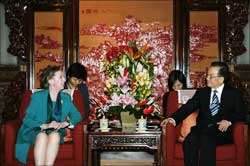 The Hong Kong and
central governments have turned down requests for Britain to take part in the
celebrations planned to mark the 10th anniversary of the handover. Officials
have made it clear there is to be no role for Hong Kong's former rulers in the
ceremonies, which include a flag-raising event on the morning of July 1 and the
swearing-in of chief executive Donald Tsang Yam-kuen for a new five-year term.
The Communist Party leadership in Beijing will be well represented. President Hu
Jintao and Prime Minister Wen Jiabao are both expected to attend. "We were
rebuffed," one diplomat in Beijing told The Daily Telegraph. A British Foreign
Office source added: "We didn't quite beg. But when we asked what representation
we would be likely to have, we were basically shuffled from pillar to post." The
source said after initial inquiries of the Hong Kong government were
unsuccessful, there was an "appeal" to the central government in Beijing which
also foundered. Responding to The Standard, a spokeswoman from the Celebrations
Coordination Office of the Home Affairs Bureau said: "The invitation lists to
the various 10th anniversary events are still being finalized. The Hong Kong and
central governments have turned down requests for Britain to take part in the
celebrations planned to mark the 10th anniversary of the handover. Officials
have made it clear there is to be no role for Hong Kong's former rulers in the
ceremonies, which include a flag-raising event on the morning of July 1 and the
swearing-in of chief executive Donald Tsang Yam-kuen for a new five-year term.
The Communist Party leadership in Beijing will be well represented. President Hu
Jintao and Prime Minister Wen Jiabao are both expected to attend. "We were
rebuffed," one diplomat in Beijing told The Daily Telegraph. A British Foreign
Office source added: "We didn't quite beg. But when we asked what representation
we would be likely to have, we were basically shuffled from pillar to post." The
source said after initial inquiries of the Hong Kong government were
unsuccessful, there was an "appeal" to the central government in Beijing which
also foundered. Responding to The Standard, a spokeswoman from the Celebrations
Coordination Office of the Home Affairs Bureau said: "The invitation lists to
the various 10th anniversary events are still being finalized.
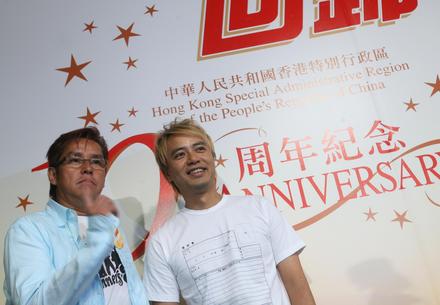 Canto-pop singers Alan Tam Wing-lun
(left) and Hacken Lee Hak-kan help promote RTHK shows to mark the 10th
anniversary of the handover. Tam and Lee are among stars who have recorded a
theme song for the event.
Canto-pop singers Alan Tam Wing-lun
(left) and Hacken Lee Hak-kan help promote RTHK shows to mark the 10th
anniversary of the handover. Tam and Lee are among stars who have recorded a
theme song for the event.
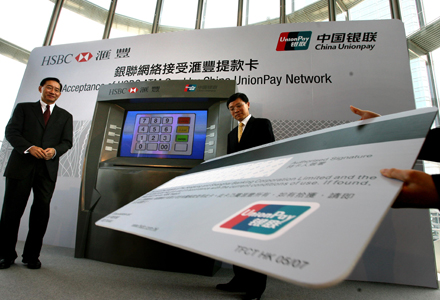 Card spending in Hong Kong and Macau by
mainland visitors rose 70 per cent in the first quarter, according to Wan
Jianhua, the president of China UnionPay. Mr Wan (right) joined HSBC executive
director Peter Wong Tung-shun at the launch of HSBC's new ATM card yesterday.
UnionPay, a provider of payment networks, reported spending of HK$8.9 billion
with its cards in the two markets; HK$4.2 billion was in Hong Kong. Card spending in Hong Kong and Macau by
mainland visitors rose 70 per cent in the first quarter, according to Wan
Jianhua, the president of China UnionPay. Mr Wan (right) joined HSBC executive
director Peter Wong Tung-shun at the launch of HSBC's new ATM card yesterday.
UnionPay, a provider of payment networks, reported spending of HK$8.9 billion
with its cards in the two markets; HK$4.2 billion was in Hong Kong.
City Telecom, one of Hong Kong's
largest fixed-line carriers, returned to profit in the first half after cutting
expenditure and operating expenses and on improved performance by its broadband
business.
 China: In
the first quarter, the consumer Price Index (CPI) of China rose 2.7%,
approaching the alarm line of 3%, according to latest statistics from the NBS.
China: In
the first quarter, the consumer Price Index (CPI) of China rose 2.7%,
approaching the alarm line of 3%, according to latest statistics from the NBS.
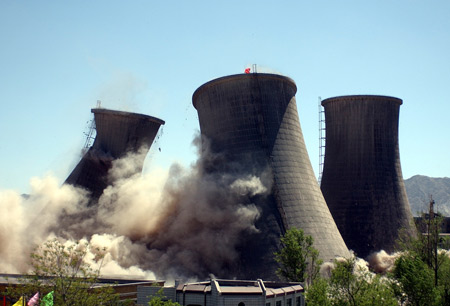 Cooling
towers are imploded at Yongchang Power Plant in Yongchang, Southwest China's
Gansu Province, May 16, 2007. Gansu Province plans to shut down more
high-energy-consuming power stations in an effort to save the energy and reduce
the pollution. Chinese Premier Wen Jiabao said in late April that the current
macro-control policy must focus on energy conservation and emission reduction in
order to develop the economy while protecting the environment. Cooling
towers are imploded at Yongchang Power Plant in Yongchang, Southwest China's
Gansu Province, May 16, 2007. Gansu Province plans to shut down more
high-energy-consuming power stations in an effort to save the energy and reduce
the pollution. Chinese Premier Wen Jiabao said in late April that the current
macro-control policy must focus on energy conservation and emission reduction in
order to develop the economy while protecting the environment.
China to widen RMB floating range
against U.S. dollar - China will widen the floating band of yuan against U.S.
dollar for daily spot trading on the interbank market from 0.3 percent to 0.5
percent as of May 21, the People's Bank of China, or the central bank, announced
on Friday. "The higher flexibility indicated that the fluctuations of yuan will
rely more on market forces. It's a good step forward in the correct direction, "
said Zuo Xiaolei, an analyst with Galaxy Securities. The central parity rate of
yuan against US dollar has accumulatively appreciated by 5.54 percent since July
21, 2005, when China scrapped the yuan-dollar peg amid drastic currency reforms.
"The new move will also be conducive to containing inflow of speculative money
and to mitigating pressure on yuan to appreciate more quickly," said Zuo. As a
related measure against inflow of hot money, the State Administration of Foreign
Exchange has since April been carrying out a special campaign to scrutinize
inrush of foreign currencies in 10 coastal provinces and cities. They are
Guangdong, Jiangsu, Zhejiang, Shandong, Fujian, Liaoning, Ningbo, Qingdao,
Xiamen and Dalian. "These regions boast most speculative money flowing from
abroad in the country. The check-up in the areas will be able to improve
transparency of capital inflow," said Tan Yaling, a researcher with the global
financial market department of the Bank of China. Sources with the
administration said Friday that one of the major tasks for foreign exchange
control at the present time is intensifying regulation over inflow of hot money.
China will raise the one-year
deposit and loan interest rates by 0.27 and 0.18 percentage points,
respectively, to 3.06 and 6.57 percent as of May 19.
Overseas companies earned US$31
billion last year in China from acquisitions, three times the total volume from
2001 to 2005, according to Beijing Business Today. The figures were released
yesterday in a report titled "Investing In China: Working With Headquarters",
jointly published by Ernst & Young and the Economist Intelligence Unit. The
report shows that overseas companies spent about 12 to 24 months on a single
acquisition in China. But in the United States, an acquisition needs only three
to nine months. It goes on to say communication is critically important, with
nearly 60 percent of those surveyed saying they spent more than 20 percent of
their time involving their head offices during the transaction and execution
process, whether to seek approvals or to keep them informed of developments, the
study found. A little over one-quarter said they spent 10 to 20 percent of their
time interacting with their headquarters. Crucially, of those surveyed reported
that less than 50 percent of the deals their companies evaluated fell through,
20 percent said they spent between one-fifth to one- third of their time during
the transaction process dealing with their headquarters. For those with an
over-50 percent success rate, they spent twice as much time, or 44 percent
dealing with their head office. Spending more time is by no means a guarantee
that any of that time is spent wisely, however. What the study found was that
head offices' involvement in the deal process is often beneficial, but not
always. Nearly 72 percent thought it increased the likelihood of a deal
happening. Conversely, 27 percent said it had no impact on a deal at all, or
could even decrease the chances of success. Those that said head office
involvement was detrimental to the success of a deal cited inappropriate
valuation standards and a poor understanding of the China market, which meant
local managers often had to spend a good deal of time explaining local
conditions to executives at their headquarters. "The findings show that using
China teams for negotiations, together with help from independent financial
advisers, actually helps reduce deal times, and the frustration for company
executives all around," said Bob Partridge, managing director and transaction
advisory services leader for Ernst & Young China. "Having the right kind of help
is important, and that is where local expertise plays a major role in helping
deals from start to finish." In the first four months of this year, China
approved 12,349 foreign-invested enterprises, down 2.29 percent from the
previous year. China received US$20.4 billion in foreign direct investment (FDI)
from January to April, up 10.2 percent from a year earlier, according to
statistics from the Ministry of Commerce. China also saw 3,052 foreign-invested
enterprises approved in April, down 18.18 percent from the previous year. The
country received US$4.47 billion in FDI in April, an increase of 5.49 percent
from last year, the ministry says.
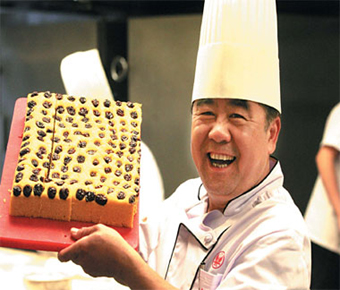 Ding Haiquan,chief chef at the
pastry department,shows off his freshly baked cornflour cake topped with dates -
From hamburgers to ancient herbs, cooking for China's Olympic athletes requires
an element of compromise, a wide knowledge of regional cuisine and, for some, a
basic grounding in traditional Chinese medicine. "I used to add some herbs into
the soups to help athletes balance the yin and yang factors in their body," said
Xue Yuhuan, a former director of the canteen where many of the athletes eat at
their training base in Beijing. "I feel more like a doctor now." For almost 27
years, chef Han Jianjing has cooked for the 13 national sports teams who train
at the General Administration of Sport in Beijing's Chongwen District. Like the
rest of his colleagues, he starts at 6 a.m. and ends when the last dinner plate
is clean in the evening. This grueling regime continues for six days a week, but
there are no complaints from the 100-plus chefs. "I feel so happy when the
athletes are scrambling for the dishes I cooked," said head chef Liu Yumin. "My
family and friends all envy my job. They always ask what their favorite athletes
are like in real life." Some 86 of China's 112 Olympic gold medalists graduated
from the training centers of the General Administration of Sport, as well as
over 782 of the country's 1,899 world champions. All of them ate at what has now
been dubbed the "gold medalists' canteen." Deputy director Han said the culinary
team does its best to please them all. "Different teams have different
preferences about food. We try our best to satisfy their individual needs," he
said. For example, most of the paddling and badminton team members are from the
south of China, where people prefer lightly flavored food, while those from the
athletic, swimming and weightlifting teams are mostly from the north, where
people regularly eat food braised in soy sauce. "The food for those young
athletes from the gymnastic and diving teams is cooked separately because they
have to eat less greasy food to keep slim. "Some of the athletes in these two
teams are just kids, so we have to give them pizza or McDonald's hamburgers once
a week to keep them happy," said Han. The food allowance is 60 yuan ($8) a day
for each of the 600 athletes - not quite enough to make ends meet at the
canteen, which tries to maintain high standards. It provides everything to the
athletes for free. The fridge is loaded with fruit drinks that sell for 7 yuan
in the market, compared to a tin of Coca Cola that only costs 2 yuan. Some
swimmers will eat as much as 500 grams of shrimp in a meal to get enough
protein.
Ding Haiquan,chief chef at the
pastry department,shows off his freshly baked cornflour cake topped with dates -
From hamburgers to ancient herbs, cooking for China's Olympic athletes requires
an element of compromise, a wide knowledge of regional cuisine and, for some, a
basic grounding in traditional Chinese medicine. "I used to add some herbs into
the soups to help athletes balance the yin and yang factors in their body," said
Xue Yuhuan, a former director of the canteen where many of the athletes eat at
their training base in Beijing. "I feel more like a doctor now." For almost 27
years, chef Han Jianjing has cooked for the 13 national sports teams who train
at the General Administration of Sport in Beijing's Chongwen District. Like the
rest of his colleagues, he starts at 6 a.m. and ends when the last dinner plate
is clean in the evening. This grueling regime continues for six days a week, but
there are no complaints from the 100-plus chefs. "I feel so happy when the
athletes are scrambling for the dishes I cooked," said head chef Liu Yumin. "My
family and friends all envy my job. They always ask what their favorite athletes
are like in real life." Some 86 of China's 112 Olympic gold medalists graduated
from the training centers of the General Administration of Sport, as well as
over 782 of the country's 1,899 world champions. All of them ate at what has now
been dubbed the "gold medalists' canteen." Deputy director Han said the culinary
team does its best to please them all. "Different teams have different
preferences about food. We try our best to satisfy their individual needs," he
said. For example, most of the paddling and badminton team members are from the
south of China, where people prefer lightly flavored food, while those from the
athletic, swimming and weightlifting teams are mostly from the north, where
people regularly eat food braised in soy sauce. "The food for those young
athletes from the gymnastic and diving teams is cooked separately because they
have to eat less greasy food to keep slim. "Some of the athletes in these two
teams are just kids, so we have to give them pizza or McDonald's hamburgers once
a week to keep them happy," said Han. The food allowance is 60 yuan ($8) a day
for each of the 600 athletes - not quite enough to make ends meet at the
canteen, which tries to maintain high standards. It provides everything to the
athletes for free. The fridge is loaded with fruit drinks that sell for 7 yuan
in the market, compared to a tin of Coca Cola that only costs 2 yuan. Some
swimmers will eat as much as 500 grams of shrimp in a meal to get enough
protein.
 A man leads his donkeys across a dusty
track in Huining county, northwestern Gansu. Drought has affected 730,000 people
and about 300,000 hectares of crops in the province, where there is an acute
shortage of safe drinking water, state media has said.
A man leads his donkeys across a dusty
track in Huining county, northwestern Gansu. Drought has affected 730,000 people
and about 300,000 hectares of crops in the province, where there is an acute
shortage of safe drinking water, state media has said.
Beijing has appointed United States
private equity firm Blackstone Group to invest US$3 billion of the country's
ballooning foreign reserves, according to the semi-official China Business News.
The central government will set up
an 800 million yuan fund to protect investors from failures at futures brokers,
as it prepares for more trading in such contracts to spur capital market
development.
China Mobile continued its strong
momentum last month by adding a record of 5.26 million new users during the
month at the expense of fixed-line rival China Telecom, which added only 900,000
users.
May 21, 2007
 Hong Kong:
The Hong Kong dollar may
slide to its lowest level since 1989 in three months' time as investors use the
currency for "carry trades" to fund purchases of higher-return equities in other
parts of the world, Standard Chartered (2888) said. Hong Kong:
The Hong Kong dollar may
slide to its lowest level since 1989 in three months' time as investors use the
currency for "carry trades" to fund purchases of higher-return equities in other
parts of the world, Standard Chartered (2888) said.
The per-capita spending of visitors
in Macao stood at 1,649 patacas (206.125 U.S. dollars) in the first quarter of
this year, up 6 percent year on year, official statistics issued Thursday
showed. The figures released by the government-run Statistics and Census Service
(SCS) showed visitors from the Chinese mainland took the lead on the expenditure
list in the January-March period with 3,192 patacas (399 U.S. dollars). The
per-capita shopping spending rose by 2 percent year-on-year to 757 patacas
(94.625 U.S. dollars) in the three-month period, the figures showed. Meanwhile,
the per-capita non-shopping spending increased by 9 percent year-on-year to 892
patacas (111.5 U.S. dollars) in the period, according to the statistics.
 Hutchison Whampoa
(0013), the ports-to-telecoms conglomerate controlled by Li Ka-shing, said its
telecom business in Britain has been stabilizing and fewer customers are
abandoning its network. Speaking after the company's annual general meeting,
group managing director Canning Fok Kin- ning said: "The churn rate is
improving. But today is not the time to announce details. The business has
progressed according to plans." The churn rate refers to the rate of customer
loss in the telecom industry. The company declined to give any financial data
related to the telecom business. Fok also said there are no plans to spin off
any of its global telecom operations. According to Hutchison, the 3 UK operation
had a combined 3.9 million customers as of March this year, while the churn rate
improved to 3.8 percent in the second half last year from 6 percent in the first
half. The 3 Group narrowed losses, reporting a HK$19.9 billion loss before
interest and tax, against HK$36.2 billion a year ago. Chairman Li Ka-shing said
in March that he remained confident of achieving break-even in earnings before
interest, tax, depreciation and amortization, or EBITDA, this year. "This result
was achieved by effectively not competing for new subscribers last year. We
estimate the average active subscriber base in the UK increased only 1.5 percent
to 2,719,000 subscribers last year," Citigroup wrote in a report. "With the
competitive landscape in Europe, we do not expect the group to break even on an
EBIT basis until late 2009." The 3 Group operates mobile networks in Italy,
Britain, Ireland, Australia, Sweden, Denmark and Austria. Hutchison Whampoa
(0013), the ports-to-telecoms conglomerate controlled by Li Ka-shing, said its
telecom business in Britain has been stabilizing and fewer customers are
abandoning its network. Speaking after the company's annual general meeting,
group managing director Canning Fok Kin- ning said: "The churn rate is
improving. But today is not the time to announce details. The business has
progressed according to plans." The churn rate refers to the rate of customer
loss in the telecom industry. The company declined to give any financial data
related to the telecom business. Fok also said there are no plans to spin off
any of its global telecom operations. According to Hutchison, the 3 UK operation
had a combined 3.9 million customers as of March this year, while the churn rate
improved to 3.8 percent in the second half last year from 6 percent in the first
half. The 3 Group narrowed losses, reporting a HK$19.9 billion loss before
interest and tax, against HK$36.2 billion a year ago. Chairman Li Ka-shing said
in March that he remained confident of achieving break-even in earnings before
interest, tax, depreciation and amortization, or EBITDA, this year. "This result
was achieved by effectively not competing for new subscribers last year. We
estimate the average active subscriber base in the UK increased only 1.5 percent
to 2,719,000 subscribers last year," Citigroup wrote in a report. "With the
competitive landscape in Europe, we do not expect the group to break even on an
EBIT basis until late 2009." The 3 Group operates mobile networks in Italy,
Britain, Ireland, Australia, Sweden, Denmark and Austria.
Beijing's move to expand the
investment scope for qualified domestic institutional investors will allow an
orderly outflow of funds from the mainland and ease upward pressure on the yuan,
Hong Kong Monetary Authority chief executive Joseph Yam Chi-kwong said Thursday.
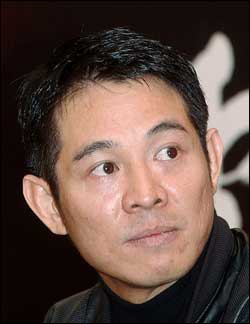
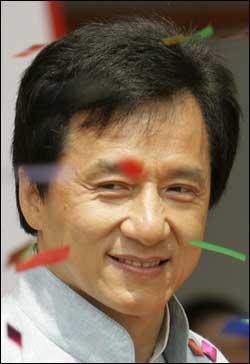 Jackie Chan
Kong-sang vs Jet Li, the kung fu movie fan's fantasy has become reality. Chan
and Li are currently in China shooting their first movie together, the Hollywood
production The Forbidden Kingdom, and Chan said in his Chinese-language blog
Thursday they recently shot their first on-screen duel. "I finally `fought' with
Jet Li today. We've never fought before having known each other for so many
years," he said. The fight scene went smoothly and the two actors finished what
was expected to be a daylong shoot in a few hours. "The short sparring that
lasted a few moves went very smoothly. It was like fighting with a brother from
the same school of martial arts. We blended easily on every move, be it in terms
of timing or rhythm," he said. "The feeling was like shooting with Sammo Hung or
Yuen Biao. Whether it's a look, an expression or a turn, we were well
coordinated. It feels great," Chan wrote, referring to two fellow action stars.
He added he and Li also worked well with choreographer Yuen Woo-ping, who
designed action sequences for The Matrix trilogy. "We worked together
seamlessly," Chan said. The Forbidden Kingdom is about an American teenager's
fantasy journey to ancient China to rescue a mythological monkey king. The idea
for the film originates with the classic Chinese novel Journey to the West, in
which a monkey king, a pig and a friar help guard a Buddhist monk searching for
religious texts. Jackie Chan
Kong-sang vs Jet Li, the kung fu movie fan's fantasy has become reality. Chan
and Li are currently in China shooting their first movie together, the Hollywood
production The Forbidden Kingdom, and Chan said in his Chinese-language blog
Thursday they recently shot their first on-screen duel. "I finally `fought' with
Jet Li today. We've never fought before having known each other for so many
years," he said. The fight scene went smoothly and the two actors finished what
was expected to be a daylong shoot in a few hours. "The short sparring that
lasted a few moves went very smoothly. It was like fighting with a brother from
the same school of martial arts. We blended easily on every move, be it in terms
of timing or rhythm," he said. "The feeling was like shooting with Sammo Hung or
Yuen Biao. Whether it's a look, an expression or a turn, we were well
coordinated. It feels great," Chan wrote, referring to two fellow action stars.
He added he and Li also worked well with choreographer Yuen Woo-ping, who
designed action sequences for The Matrix trilogy. "We worked together
seamlessly," Chan said. The Forbidden Kingdom is about an American teenager's
fantasy journey to ancient China to rescue a mythological monkey king. The idea
for the film originates with the classic Chinese novel Journey to the West, in
which a monkey king, a pig and a friar help guard a Buddhist monk searching for
religious texts.
 China: China's
imports and exports of goods will likely amount to 2.1 trillion U.S. dollars for
the whole year, a growth of 20 percent over the year-earlier level, according to
a report released Thursday by the Ministry of Commerce. The report says in 2006,
China's foreign trade stood at 1.76 trillion U.S. dollars, up 23.6 percent
year-on-year, ranking third in the world. External trade has continued to grow
rapidly since the beginning of the year, the report says. Foreign sales of
machinery, electronics, textiles and clothing and footwear posted sustained
growth. Trade with major partners, including the European Union, the United
States and Japan, has increased continuously. According to the report, China
realized 457.7 billion U.S. dollars in foreign trade in the first quarter of
this year, up 23.2 percent from a year earlier. The trade surplus soared 99.4
percent to 46.4 billion U.S. dollars. The report believes the overall
environment is still favorable for China's foreign trade.
China: China's
imports and exports of goods will likely amount to 2.1 trillion U.S. dollars for
the whole year, a growth of 20 percent over the year-earlier level, according to
a report released Thursday by the Ministry of Commerce. The report says in 2006,
China's foreign trade stood at 1.76 trillion U.S. dollars, up 23.6 percent
year-on-year, ranking third in the world. External trade has continued to grow
rapidly since the beginning of the year, the report says. Foreign sales of
machinery, electronics, textiles and clothing and footwear posted sustained
growth. Trade with major partners, including the European Union, the United
States and Japan, has increased continuously. According to the report, China
realized 457.7 billion U.S. dollars in foreign trade in the first quarter of
this year, up 23.2 percent from a year earlier. The trade surplus soared 99.4
percent to 46.4 billion U.S. dollars. The report believes the overall
environment is still favorable for China's foreign trade.
"You have the right to remain
silent. Anything you say can and will be used against you in a court of law..."
These words, familiar to many from Hollywood movies or cops-and-robbers TV
shows, could be uttered by Chinese police if an amendment to the Criminal
Procedure Law, scheduled for October, is approved. "There's little debate over
whether to include the stipulation that suspects shall not be forced to admit
guilt," Chen Ruihua, a law professor at Peking University involved in the
amendment of the law, said. "If approved, it means that suspects will have the
right to keep silent in interrogations." Chen Guangzhong, a professor at China
University of Political Science and Law who also participated in drafting the
amendment, said legislators were also considering whether to allow lawyers to be
present during the whole interrogation process. A draft amendment the All- China
Lawyers Association (ACLA) submitted last month to the Standing Committee of the
National People's Congress (NPC), the top legislature, included both
stipulations. The existing Criminal Procedure Law, amended in 1997, requires
suspects to truthfully answer investigators' questions during interrogations. It
also stipulates that lawyers are allowed in the case only after the first
interrogation.
China Unicom yesterday launched data
services based on the GPRS standard, which could give the company a leg-up in
the booming value-added telecoms service market. The GPRS data services will
enable Unicom's GSM users to surf the mobile Internet, send MMS (multimedia
messaging service) messages and download data, including music, using their
mobile phones. Unicom, the smaller of China's two cellular operators, has been
operating cellular networks based on second-generation (2G) mobile telephony
standards, GSM and CDMA. The CDMA networks have already been upgraded to the
high-speed CDMA1x-2000, usually billed as a 2.75G service, which offers users a
number of data services, such as mobile Internet access and MMS. But its GSM
subscribers could only make voice calls and send short text messages. An upgrade
from GSM to GPRS, a 2.5G mobile technology, could boost the competitiveness of
Unicom's GSM networks, said company vice-president Li Gang. The upgrade marks
Unicom's shifting focus from the CDMA service to GSM networks. The company has
been investing heavily on CDMA networks to snap up subscribers from its larger
rival, China Mobile, while investing little in its GSM networks.
'Adept tourism staff needed' for
Games - China should better train its tourism industry professionals to make the
experience of millions of travelers during the 2008 Beijing Olympic Games a
memorable one. That's the majority opinion of nearly 300 government officials
and experts from home and abroad who have gathered for a two-day forum in
Qingdao, the coastal city of East China's Shandong Province. Co-sponsored by the
China National Tourism Administration and the United Nations World Tourism
Organization, the forum aims to exchange knowledge and learn from other
countries' experiences, such as Japan, Republic of Korea, the United States,
Australia, Greece and Spain. Pacific Asia Travel Association (PATA) Chairman
Brian Deeson said China's focus should be "less on stimulating travel demand and
more on managing the flow (of travelers) and ensuring that satisfaction levels
are maintained at an appropriately high level". "Since the choice available to
the consumer continues to expand, service quality and delivery will be the key
differentiators between products and destinations." The 2008 Beijing Olympic
Games has acted as a stimulus for China's "tourism hardware", with a massive
investment in related infrastructure. PATA estimates the cumulative public and
private investment into China's tourism industry will reach $170 billion this
year. "But we also need to focus on the software - the people - which plays such
a critical role in delivering the Olympic experience," he said. Language is
still a top issue. Staff, especially in the hospitality sector, should be
trained not only in English, but also in other foreign languages, he suggested.
Tu Mingde, assistant to the president of the Beijing Organizing Committee for
the Games of the XXIX Olympiad (BOCOG), agreed with Deeson, saying China is
indeed facing a problem because the massive influx of people would pose a
challenge to the tourism industry, especially in providing high quality
services. "The challenge includes the impact on the current industrial structure
of tourism in China, as well as the service quality of our tourism enterprises,"
he said. The Beijing Olympics is being widely seen as an unprecedented
opportunity for China's tourism industry. The BOCOG has estimated that several
million people from home and abroad will visit Beijing to watch the Games and
visit tourist attractions. They will include 16,000 athletes and officials,
nearly 5,000 members of the Olympic family, 7,000 Olympic sponsors and their
customers and 21,600 registered journalists. The experience of previous Olympic
hosts shows such travelers also visit tourist attractions in and around the
cities, and even in far off places. Six cities that will stage part of the
Games, also, stand to gain from the event. Hong Kong, Shanghai, Qingdao, Tianjin,
Shenyang and Qinhuangdao are expected to expand their influence worldwide and
attract more tourists, he said.
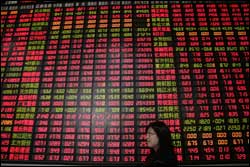 Many red chips are considering a return to the domestic equity markets to raise
capital or as a way of supporting Beijing's policy to enhance the quality of
bourses - but only few of them can issue yuan-denominated A shares, given the
relatively high requirements. Red chips are companies registered and listed in
Hong Kong but controlled by mainland shareholders and have a majority of assets
or business in the mainland. They are required to report a minimum annual net
profit of 1 billion yuan (HK$1.02 billion) to be eligible to list on mainland
bourses, state-run Securities Times reported Thursday, citing unidentified
sources. The regulator aims to attract mainly large corporations to the domestic
market and will not encourage small enterprises. But those with a history of
less than three years in business are exempted from the 1 billion yuan rule. Red
chips with a parent or subsidiaries listed in Shenzhen or Shanghai are not
eligible to issue A shares. Market watchers generally believe China Mobile
(0941) will be the first red chip to return to the domestic market, issuing
shares in the second half of this year, to be followed on to the market by CNOOC
(0883).
Many red chips are considering a return to the domestic equity markets to raise
capital or as a way of supporting Beijing's policy to enhance the quality of
bourses - but only few of them can issue yuan-denominated A shares, given the
relatively high requirements. Red chips are companies registered and listed in
Hong Kong but controlled by mainland shareholders and have a majority of assets
or business in the mainland. They are required to report a minimum annual net
profit of 1 billion yuan (HK$1.02 billion) to be eligible to list on mainland
bourses, state-run Securities Times reported Thursday, citing unidentified
sources. The regulator aims to attract mainly large corporations to the domestic
market and will not encourage small enterprises. But those with a history of
less than three years in business are exempted from the 1 billion yuan rule. Red
chips with a parent or subsidiaries listed in Shenzhen or Shanghai are not
eligible to issue A shares. Market watchers generally believe China Mobile
(0941) will be the first red chip to return to the domestic market, issuing
shares in the second half of this year, to be followed on to the market by CNOOC
(0883).
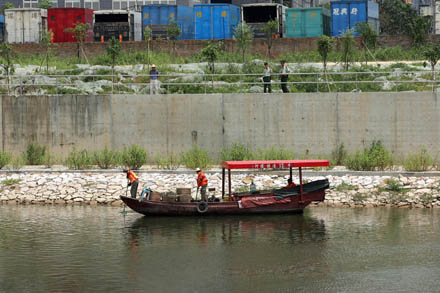 Mainland
workers collect rubbish floating on the Shenzhen River, which has been widened,
straightened and deepened under a 12-year project commissioned by Shenzhen and
Hong Kong. The HK$645 million program, which is now complete, has made the 18km
waterway four times wider on average. It should now be able to take heavier
flows, ending flooding caused by downpours and water releases that has plagued
parts of the northern New Territories. Mainland
workers collect rubbish floating on the Shenzhen River, which has been widened,
straightened and deepened under a 12-year project commissioned by Shenzhen and
Hong Kong. The HK$645 million program, which is now complete, has made the 18km
waterway four times wider on average. It should now be able to take heavier
flows, ending flooding caused by downpours and water releases that has plagued
parts of the northern New Territories.
 The Houkeng
Timber-Arched Corridor Bridge spans a river in Qingyuan county, Zhejiang
province. Originally erected during the 17th century, the bridge was built
without nails. Restoration work on the bridge was rewarded with Unesco's Award
of Excellence during the organisation's 2005 Asia-Pacific Heritage Award for
Culture Heritage Conservation. The Houkeng
Timber-Arched Corridor Bridge spans a river in Qingyuan county, Zhejiang
province. Originally erected during the 17th century, the bridge was built
without nails. Restoration work on the bridge was rewarded with Unesco's Award
of Excellence during the organisation's 2005 Asia-Pacific Heritage Award for
Culture Heritage Conservation.
China Overseas Land & Investment, a
mainland property developer, has shelved its planned flotation in Shanghai to
make way for the initial public offering of its state-owned parent, China State
Construction & Engineering Corp, chairman Kong Qingping said.
May 19 - 20, 2007
 Hong Kong:
The gold price in Hong Kong dipped 62 HK dollars to 6,171 HK dollars per tael on
Thursday, according to the Bank of China (Hong Kong). The price is equivalent to
663 U.S. dollars a troy ounce, down seven U.S. dollars at Thursday's exchange
rate of one U.S. dollar against 7.812 HK dollars. Hong Kong:
The gold price in Hong Kong dipped 62 HK dollars to 6,171 HK dollars per tael on
Thursday, according to the Bank of China (Hong Kong). The price is equivalent to
663 U.S. dollars a troy ounce, down seven U.S. dollars at Thursday's exchange
rate of one U.S. dollar against 7.812 HK dollars.
Hong Kong Financial Secretary Henry
Tang invited Swiss bankers in Geneva on Wednesday to use Hong Kong as a regional
base to manage their banking businesses in Asia. According to news from
Information Services Department of the government of Hong Kong Special
Administrative Region (HKSAR) obtained Thursday, Tang explained to the bankers
the competitive strengths of Hong Kong on the last day of his duty visit to
Switzerland. Tang attended a breakfast meeting hosted by the Swiss Private
Bankers' Association. The private bankers in Switzerland are a group of
entrepreneurs in the privately owned banking sector who conduct their business
using their own assets and assuming unlimited liabilities. Tang told them that
with Asia's high savings rate and strong economic growth, Hong Kong benefited
from having a relatively fast growing economic hinterland, especially the
Chinese mainland, which could be one of the fastest growing wealth management
markets in the world. Noting that it would take time for private bankers to
build their reputation in this niche market, Tang pointed out the importance for
them to come in early. "You should consider whether you wish to be a leader or a
follower in this growing market," Tang said. Tang also met Chairman of the Swiss
Bankers' Association Pierre Mirabaud before attending a lunch meeting hosted by
the association, which is the most representative umbrella organization in the
banking industry of Switzerland.
The HK financial secretary updated the Swiss banking community on Hong Kong's
latest economic development and highlighted Hong Kong's role as an international
financial center and a gateway to the Chinese mainland, both for overseas
companies to tap into the mainland market and for mainland enterprises to reach
out to the world. "Switzerland and Hong Kong are both relatively small but
outward-looking economies with huge economic hinterlands," Tang said. Tang will
leave Geneva on Thursday for Cannes, where he will attend promotional events for
Hong Kong's film industry at the Festival de Cannes.
 Actress Andie MacDowell arrives for
an evening gala screening of Chinese director Wong Kar Wai's in-competition film
"My Blueberry Nights" at the 60th Cannes Film Festival May 16, 2007.
Actress Andie MacDowell arrives for
an evening gala screening of Chinese director Wong Kar Wai's in-competition film
"My Blueberry Nights" at the 60th Cannes Film Festival May 16, 2007.

 Shu Ki and Gong Li arrives for
an evening gala screening of Chinese director Wong Kar Wai's in-competition film
"My Blueberry Nights" at the 60th Cannes Film Festival May 16, 2007.
Shu Ki and Gong Li arrives for
an evening gala screening of Chinese director Wong Kar Wai's in-competition film
"My Blueberry Nights" at the 60th Cannes Film Festival May 16, 2007.
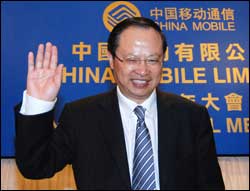 Telecom behemoth China Mobile (0941)
will move to a caller-pays policy and eliminate roaming fees - two central
government initiatives designed to reform the telecom industry - but in a
gradual way, according to senior officials. Chairman Wang Jianzhou said the
red-chip company is actively working to return home to float shares in the
A-share market. The mainland authorities are supportive of the plan, according
to Wang, who did not give a timetable for the listing. Current regulations
prevent companies such as China Mobile, which are registered outside the
mainland, from issuing yuan-denominated shares on a mainland bourse. After an
annual general meeting in Hong Kong Wednesday, vice president and chief
financial officer Xue Taohai said that 50 percent of its customers were already
on plans under "one-way billing," or "caller-pays policy," at the end of 2006.
Although he did not specify exact numbers, Xue said he believed more than 50
percent of customers were on such plans at the end of the first quarter of 2007. Telecom behemoth China Mobile (0941)
will move to a caller-pays policy and eliminate roaming fees - two central
government initiatives designed to reform the telecom industry - but in a
gradual way, according to senior officials. Chairman Wang Jianzhou said the
red-chip company is actively working to return home to float shares in the
A-share market. The mainland authorities are supportive of the plan, according
to Wang, who did not give a timetable for the listing. Current regulations
prevent companies such as China Mobile, which are registered outside the
mainland, from issuing yuan-denominated shares on a mainland bourse. After an
annual general meeting in Hong Kong Wednesday, vice president and chief
financial officer Xue Taohai said that 50 percent of its customers were already
on plans under "one-way billing," or "caller-pays policy," at the end of 2006.
Although he did not specify exact numbers, Xue said he believed more than 50
percent of customers were on such plans at the end of the first quarter of 2007.
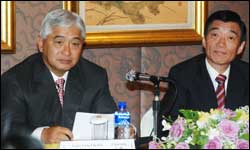 CITIC Pacific (0267) plans to sell its 25 percent interest in a mainland air
cargo joint venture to Air China (0753), clearing the way for Cathay Pacific
(0293) to buy a stake. "We are talking with Air China and intend to sell the
whole stake," managing director Henry Fan Hung Ling said after the annual
general meeting. The joint venture, in which Air China holds a 51 percent stake
and Beijing Capital International Airport (0694) owns 24 percent, handles all of
the carrier's international and domestic cargo and related ground service
business. The total freight handled by the venture increased 15 percent to
817,178 tonnes last year compared with 2005. But it recorded a HK$1 million loss
compared with a HK$44 million profit in 2005. Fan said the stake sale is
intended to clear the way for Cathay Pacific to invest in the venture after Air
China sold its indirectly held 43.29 percent stake in Dragonair to Cathay for
HK$430 million in cash and 289 million shares in Cathay in September, giving the
mainland carrier a 10.16 percent strategic stake.
CITIC Pacific (0267) plans to sell its 25 percent interest in a mainland air
cargo joint venture to Air China (0753), clearing the way for Cathay Pacific
(0293) to buy a stake. "We are talking with Air China and intend to sell the
whole stake," managing director Henry Fan Hung Ling said after the annual
general meeting. The joint venture, in which Air China holds a 51 percent stake
and Beijing Capital International Airport (0694) owns 24 percent, handles all of
the carrier's international and domestic cargo and related ground service
business. The total freight handled by the venture increased 15 percent to
817,178 tonnes last year compared with 2005. But it recorded a HK$1 million loss
compared with a HK$44 million profit in 2005. Fan said the stake sale is
intended to clear the way for Cathay Pacific to invest in the venture after Air
China sold its indirectly held 43.29 percent stake in Dragonair to Cathay for
HK$430 million in cash and 289 million shares in Cathay in September, giving the
mainland carrier a 10.16 percent strategic stake.
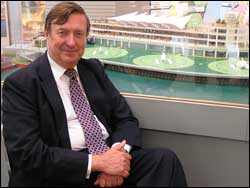 A
helicopter industry group is stepping up efforts to get support for a proposal
to connect Pearl River Delta cities with a "flying taxi" service following
lukewarm responses from the government. The Hong Kong Regional Heliport Working
Group - of which the Heliservices company, owned by the Kadoorie family, is a
prominent member - has revived a 2005 proposal for a four-pad ground-level
heliport at the northeast corner of Golden Bauhinia Square in Wan Chai. The
working group's proposal is an expansion of a Planning Department blueprint that
features two helipads in Wan Chai North, which is under review by the Town
Planning Board. The two helipads on the government blueprint are primarily for
Government Flying Service use even though the administration has agreed to share
them with a commercial operator for domestic services on condition government
operations have priority. A
helicopter industry group is stepping up efforts to get support for a proposal
to connect Pearl River Delta cities with a "flying taxi" service following
lukewarm responses from the government. The Hong Kong Regional Heliport Working
Group - of which the Heliservices company, owned by the Kadoorie family, is a
prominent member - has revived a 2005 proposal for a four-pad ground-level
heliport at the northeast corner of Golden Bauhinia Square in Wan Chai. The
working group's proposal is an expansion of a Planning Department blueprint that
features two helipads in Wan Chai North, which is under review by the Town
Planning Board. The two helipads on the government blueprint are primarily for
Government Flying Service use even though the administration has agreed to share
them with a commercial operator for domestic services on condition government
operations have priority.
Hong Kong business magnate Li Ka-shing
on Thursday warned that investors should be cautious in trading on mainland
stock markets, saying he was ''worried'' over high share prices following their
record-breaking run. "I am worried about the China stock market because of its
high [price to earnings] ratio," Mr Li, Asia's wealthiest businessman, said
after the annual general meeting of conglomerates Cheung Kong (Holdings) and
Hutchison Whampoa, which he controls. Last week, the Shanghai Composite Index
breached the historic 4,000-point level for the first time, putting stocks there
on PE ratios of about 50 times compared with the Asian average of between 14 and
18. As the Chinese markets have gone from one record to the next in massive
volumes sometimes second only to Wall Street, officials have repeatedly warned
of the dangers of a bubble bursting which would hit small investors hardest. The
extent of China's stock market fever was outlined in a recent central bank
survey which showed 30.7 per cent of the public planned to tap their
low-interest savings accounts to buy into equities. It is this frantic
investment that has experts calling for Beijing to take action or eventually
face serious economic consequences. Mr Li, who has been a buyer of shares in
many mainland Chinese companies, said volatility in the mainland market and the
economy could affect the Hong Kong exchange. However, he did not rule out a
listing of his own in China, saying the move was possible but only when the
market there had reached a certain level of maturity. "Listing on the mainland
is possible but only when the market matures," he told reporters. He did not
mention which of his companies might be listed on the mainland nor did he
elaborate about what market conditions would make a listing possible.
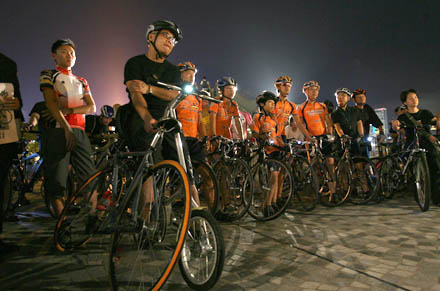 Cyclists pedal in the Ride of
Silence last night in Kowloon. Yan Kin-wai, a member of the Cycling Alliance
which organised the event, urged drivers to be more alert.
Cyclists pedal in the Ride of
Silence last night in Kowloon. Yan Kin-wai, a member of the Cycling Alliance
which organised the event, urged drivers to be more alert.
 China: Microsoft
will further expand its R&D institutes in Beijing, Shanghai and Shenzhen, as
well as invest in R&D parks in Beijing and Shanghai.
China: Microsoft
will further expand its R&D institutes in Beijing, Shanghai and Shenzhen, as
well as invest in R&D parks in Beijing and Shanghai.
 China's
Ministry of Information Industry approved Wednesday the use of European and
American standards for third generation (3G) mobile phones that are rivals to
China's homegrown TD-SCDMA. China's TD-SCDMA has been called the "Chinese 3G
standard", WCDMA is European and CDMA2000 is American. TD-SCDMA, a Chinese
home-grown standard for third-generation (3G) mobile telephony, is set to
dominate the country's 3G market, an industry group said. China's
Ministry of Information Industry approved Wednesday the use of European and
American standards for third generation (3G) mobile phones that are rivals to
China's homegrown TD-SCDMA. China's TD-SCDMA has been called the "Chinese 3G
standard", WCDMA is European and CDMA2000 is American. TD-SCDMA, a Chinese
home-grown standard for third-generation (3G) mobile telephony, is set to
dominate the country's 3G market, an industry group said.
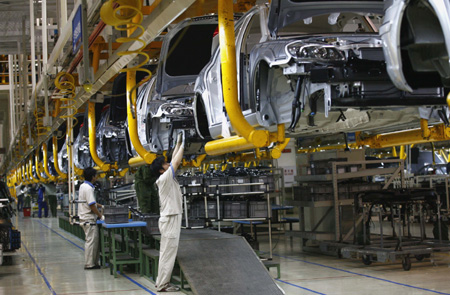 Employees of
Chinese carmaker Brilliance Auto work at a factory in Shenyang, capital of
northeast China's Liaoning province, May 16, 2007. Chinese factory output grew
by a robust 17.4 percent in April from a year earlier, reflecting a rebound in
exports and the underlying strength of the world's fourth-biggest economy.
Employees of
Chinese carmaker Brilliance Auto work at a factory in Shenyang, capital of
northeast China's Liaoning province, May 16, 2007. Chinese factory output grew
by a robust 17.4 percent in April from a year earlier, reflecting a rebound in
exports and the underlying strength of the world's fourth-biggest economy.
DaimlerChrysler AG's sale of its US
arm will not affect its businesses in China, the world's second-biggest vehicle
market, according to the automaker's Northeast Asian operation. "China will
continue to be an important market for Daimler and Chrysler, and we are
continuing to move forward with all our projects," Trevor Hale, the
Beijing-based spokesman for DaimlerChrysler Northeast Asia, told China Daily.
Hale's remark refutes speculation that some of Chrysler's China plans will be
suspended as a result of DaimlerChrysler's $7.4-billion deal on Monday to sell
80.1 percent stakes of Chrysler Group, its troubled US arm, to the private
equity group Cerberus Capital Management. The automaker will be renamed Daimler
AG in the fall. Chrysler agreed with China's Chery Automobile Co in January to
make cars in China under the Dodge brand for the US and European markets. "It is
still in the process of being approved by (Chinese) regulators," said Jin Yibo,
a spokesman for Chery based in East China's Anhui Province, denying the project
has run aground. Last month, Chrysler announced that the Dodge Caravan minivan
will be assembled at the end of this year at a joint venture between Fujian
Automotive Industry Corp and Japan's Mitsubishi Motors in coastal Fujian
Province. It will also bring a Sebring mid-sized sedan into DaimlerChrysler's
joint venture with Beijing Automotive Industry Corp later this year. The venture
started producing the Chrysler 300C and new Mercedes-Benz E-Class sedans last
year. Another source from DaimlerChrysler Northeast Asia said the plans in
Fujian and Beijing will be carried out according to schedule. Yale Zhang, the
Shanghai-based director of Greater China vehicle forecasts for US auto
consultancy CSM Worldwide Corp, said there's no reason for Chrysler to slacken
its pace in China. "I believe Chrysler will beef up its efforts in China as this
market is too important to give up," Zhang said. DaimlerChrysler is lagging
behind its rivals, such as General Motors, Volkswagen and Toyota, in China's
fast-growing vehicle market. Sales of China-made vehicles grew by 21.46 percent
year-on-year to 2.93 million units in the first four months of this year,
according to data from China Association of Automobile Manufacturers. Full-year
sales are predicted to reach 8.5 million units, up from 7.22 million units in
2006.
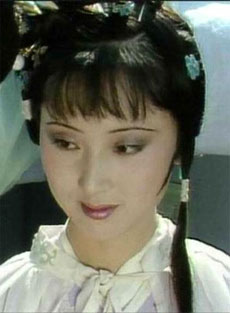 This undated photo features former
Chinese actress Chen Xiaoxu in famous Chinese TV series "Dream of the Red
Mansion" back in 1980s. Chen Xiaoxu, the actress starring as Lin Daiyu in "Dream
of the Red Mansion" passed away on May 13 in Shenzhen. She took the tonsure at a
Buddhist temple in Changchun, capital of Jilin province in northeast China in
February. Chen Xiaoxu became a household name in China in the 1980s after being
cast the lead role as Lin Daiyu in the TV soap opera "Dream of the Red Mansion",
an adaptation of the Chinese Qing Dynasty literary classic of the same name.
Following this popular role, however, Chen Xiaoxu did not pursue an acting
career. She disappeared from public view for several years until re-catching
people's attention as a successful businesswoman and billionaire in advertising.
The news of her tonsure was first disclosed by some "well-informed" fans online
and was confirmed by her husband, Hao Tong, who, he had himself said, would soon
follow his wife's suit to become a monk in another monastery. Hao said such
decision, which however sounds much striking to the public, was their ideal.
Chen Xiaoxu was reported to be at Baiguoxinglong Temple, the Buddhist monastery
where she received the tonsure ceremony. Chen then concentrated on Buddhist
studies at the monastery, according to staff from her company. An unconfirmed
source added that Chen Xiaoxu had been following the Buddhist life credo for
seven years.
This undated photo features former
Chinese actress Chen Xiaoxu in famous Chinese TV series "Dream of the Red
Mansion" back in 1980s. Chen Xiaoxu, the actress starring as Lin Daiyu in "Dream
of the Red Mansion" passed away on May 13 in Shenzhen. She took the tonsure at a
Buddhist temple in Changchun, capital of Jilin province in northeast China in
February. Chen Xiaoxu became a household name in China in the 1980s after being
cast the lead role as Lin Daiyu in the TV soap opera "Dream of the Red Mansion",
an adaptation of the Chinese Qing Dynasty literary classic of the same name.
Following this popular role, however, Chen Xiaoxu did not pursue an acting
career. She disappeared from public view for several years until re-catching
people's attention as a successful businesswoman and billionaire in advertising.
The news of her tonsure was first disclosed by some "well-informed" fans online
and was confirmed by her husband, Hao Tong, who, he had himself said, would soon
follow his wife's suit to become a monk in another monastery. Hao said such
decision, which however sounds much striking to the public, was their ideal.
Chen Xiaoxu was reported to be at Baiguoxinglong Temple, the Buddhist monastery
where she received the tonsure ceremony. Chen then concentrated on Buddhist
studies at the monastery, according to staff from her company. An unconfirmed
source added that Chen Xiaoxu had been following the Buddhist life credo for
seven years.
China will
further increase the flexibility of its exchange rate and take measures to curb
the growing trade surplus, Premier Wen Jiabao said Wednesday, a week before
high-level Chinese officials meet in Washington with their US counterparts to
discuss ways to reduce trade imbalances.
Beijing’s top Communist Party
official called on Thursday for a law-and-order crackdown as he set maintaining
stability and hosting a successful Olympic Games next year as key goals facing
the leadership.
Shanghai overtook Hong Kong to
become the world's second-largest container port in the first quarter as
containers handled rose 28.1 per cent year on year during the period, media said
on Thursday.
May 18, 2007
 Hong Kong:
The Cannes Film Festival's best director award
winner in 1997 for "Happy Together" and president of the Competition jury in
2006, Wong Kar Wai returns to the Croisette Wednesday to open the 2007 festival
with his first English-language film, "My Blueberry Nights." Hong Kong:
The Cannes Film Festival's best director award
winner in 1997 for "Happy Together" and president of the Competition jury in
2006, Wong Kar Wai returns to the Croisette Wednesday to open the 2007 festival
with his first English-language film, "My Blueberry Nights."
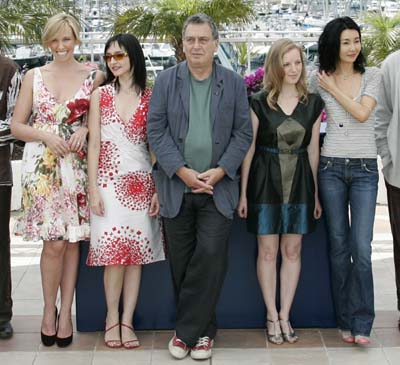 Jury president
Stephen Frears (C) stands with fellow jury members, from L-R, Toni Collette,
Maria De Medeiros, Sarah Polley and Maggie Cheung during a photocall at the 60th
Cannes Film Festival May 16, 2007.
Jury president
Stephen Frears (C) stands with fellow jury members, from L-R, Toni Collette,
Maria De Medeiros, Sarah Polley and Maggie Cheung during a photocall at the 60th
Cannes Film Festival May 16, 2007.
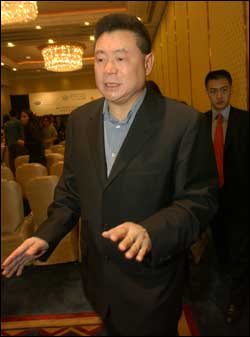 Tycoon Joseph Lau
Luen-hung has abandoned a HK$30 billion privatization plan for Chinese Estates
Holdings (0127) after failing to rally support from major shareholders including
institutional stakeholders. Hedge fund The Children's Investment Fund
Management, which holds 7.9 percent of Chinese Estates, is understood to have
demanded a price too high for Lau to accept. His decision to withdraw the buyout
offer came a few days after Chinese Estates announced a possible deal last
Thursday. Shares of Chinese Estates jumped nearly 9 percent Tuesday. The
property investment and development firm is controlled by Lau and his younger
brother Thomas Lau Luen-hung, who hold a combined 53.6 interest. The shares
closed at a record high HK$12.76 on the news that the buyout plan was dropped.
Joseph Lau halted talks with other unidentified major shareholders, saying the
gap between the price demanded by the shareholders and his expectations was
between HK$3 and HK$4 per share. He declined to reveal the price. Analysts
estimated the plan to acquire the shares the Lau brothers do not already own in
Chinese Estates, at between HK$14 and HK$15 apiece, priced the deal at about
HK$15 billion, excluding costs. TCI was not available for comment Tuesday. The
HK$30 billion outlay is a combination of the buyout of shares, Chinese Estates
debts of HK$9 billion, as well as its HK$6 billion property project in Chengdu,
Sichuan province, Lau said after the annual general meeting Tuesday. "The
privatization proposal is to make it easier for the company to operate. The
[fund] shareholders are now more demanding. For example, some shareholders
usually ask for share buybacks, hopefully at higher prices so they can take
profit. Tycoon Joseph Lau
Luen-hung has abandoned a HK$30 billion privatization plan for Chinese Estates
Holdings (0127) after failing to rally support from major shareholders including
institutional stakeholders. Hedge fund The Children's Investment Fund
Management, which holds 7.9 percent of Chinese Estates, is understood to have
demanded a price too high for Lau to accept. His decision to withdraw the buyout
offer came a few days after Chinese Estates announced a possible deal last
Thursday. Shares of Chinese Estates jumped nearly 9 percent Tuesday. The
property investment and development firm is controlled by Lau and his younger
brother Thomas Lau Luen-hung, who hold a combined 53.6 interest. The shares
closed at a record high HK$12.76 on the news that the buyout plan was dropped.
Joseph Lau halted talks with other unidentified major shareholders, saying the
gap between the price demanded by the shareholders and his expectations was
between HK$3 and HK$4 per share. He declined to reveal the price. Analysts
estimated the plan to acquire the shares the Lau brothers do not already own in
Chinese Estates, at between HK$14 and HK$15 apiece, priced the deal at about
HK$15 billion, excluding costs. TCI was not available for comment Tuesday. The
HK$30 billion outlay is a combination of the buyout of shares, Chinese Estates
debts of HK$9 billion, as well as its HK$6 billion property project in Chengdu,
Sichuan province, Lau said after the annual general meeting Tuesday. "The
privatization proposal is to make it easier for the company to operate. The
[fund] shareholders are now more demanding. For example, some shareholders
usually ask for share buybacks, hopefully at higher prices so they can take
profit.
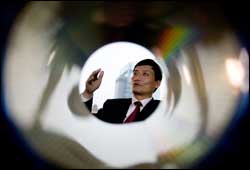 Aluminum Corp of China
(2600), the mainland's largest alumina maker, said Tuesday it may sell as much
as 5 billion yuan (HK$5.09 billion) of short-term financing bills to replenish
capital and fund raw materials purchases. It plans to issue the bills to
domestic institutional investors on the interbank debt market. The bills will
have a maturity of no longer than one year, according to a statement filed with
the Shanghai bourse. Chalco said the interest rate will depend on market
sentiment, but will not be higher than the prime rate, with the same maturity
set by the People's Bank of China. Proceeds from the bill issuance will be
mainly used to buy raw materials such as alumina imports, as well as to pay off
bank loans if there were to be a surplus, Chalco said. The proposed bills
issuance is subject to shareholder approval at the annual general meeting
Friday. Earlier, Chalco, one the biggest metals stocks traded in the domestic
market in terms of market capitalization, set a target of 16 billion yuan capex
to boost capacity and for acquisitions. Chalco aims to boost output of alumina -
the raw material used to produce aluminum - by 13.5 percent to 10 million tonnes
this year, while production of aluminum will reach 2.48 million tonnes, 28.5
percent more than last year, chairman and chief executive Xiao Yaqing said in
March. Chalco produced 2.39 million tonnes of alumina in the three months ended
March 31, compared with 2.11 million tonnes during the same period last year. Aluminum Corp of China
(2600), the mainland's largest alumina maker, said Tuesday it may sell as much
as 5 billion yuan (HK$5.09 billion) of short-term financing bills to replenish
capital and fund raw materials purchases. It plans to issue the bills to
domestic institutional investors on the interbank debt market. The bills will
have a maturity of no longer than one year, according to a statement filed with
the Shanghai bourse. Chalco said the interest rate will depend on market
sentiment, but will not be higher than the prime rate, with the same maturity
set by the People's Bank of China. Proceeds from the bill issuance will be
mainly used to buy raw materials such as alumina imports, as well as to pay off
bank loans if there were to be a surplus, Chalco said. The proposed bills
issuance is subject to shareholder approval at the annual general meeting
Friday. Earlier, Chalco, one the biggest metals stocks traded in the domestic
market in terms of market capitalization, set a target of 16 billion yuan capex
to boost capacity and for acquisitions. Chalco aims to boost output of alumina -
the raw material used to produce aluminum - by 13.5 percent to 10 million tonnes
this year, while production of aluminum will reach 2.48 million tonnes, 28.5
percent more than last year, chairman and chief executive Xiao Yaqing said in
March. Chalco produced 2.39 million tonnes of alumina in the three months ended
March 31, compared with 2.11 million tonnes during the same period last year.
Blue-chip sourcing company Li &
Fung (0494) said it plans to use most of the US$500 million (HK$3.9 billion)
proceeds from a bond sale to acquire Hong Kong companies exporting to Europe to
capture business opportunities on the continent.
China Central Properties, the
specialist real-estate arm of businessman Vincent Lo Hong-sui which buys up
distressed projects in the mainland, intends to raise HK$3.89 billion by selling
new shares and convertible bonds in a planned listing on the London Stock
Exchange's Alternative Investments Market next month.
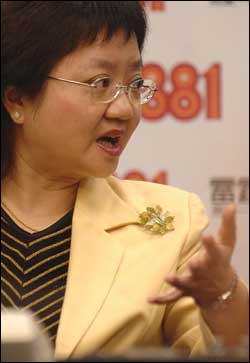 Hong Kong and the
mainland are to step up food-safety measures by tightening rules on the export
of food products to the territory. Vegetables from the mainland will not be
allowed into the SAR unless they are from approved farms and processing plants.
Live freshwater fish and eggs will need to be accompanied by certificates to be
allowed into Hong Kong in the future. The measures were agreed Tuesday at the
second working meeting in Beijing of mainland and SAR officials to promote
cross-border food safety. Permanent Secretary for Health, Welfare and Food
Carrie Yau Tsang Ka-lai, who led the Hong Kong delegation, said putting in place
an effective importer or supplier registration system is very important. "This
can help trace the source of food, identify problems early on and proactively
guard against dubious food entering the supply chain to protect the public
health," she said. Yau said Hong Kong will seek a consensus with the mainland on
food-safety inspection standards. "We want the mainland authorities to issue
health certificates for food, so we must reach a consensus on what these
certificates will contain," Yau said. Hong Kong and the
mainland are to step up food-safety measures by tightening rules on the export
of food products to the territory. Vegetables from the mainland will not be
allowed into the SAR unless they are from approved farms and processing plants.
Live freshwater fish and eggs will need to be accompanied by certificates to be
allowed into Hong Kong in the future. The measures were agreed Tuesday at the
second working meeting in Beijing of mainland and SAR officials to promote
cross-border food safety. Permanent Secretary for Health, Welfare and Food
Carrie Yau Tsang Ka-lai, who led the Hong Kong delegation, said putting in place
an effective importer or supplier registration system is very important. "This
can help trace the source of food, identify problems early on and proactively
guard against dubious food entering the supply chain to protect the public
health," she said. Yau said Hong Kong will seek a consensus with the mainland on
food-safety inspection standards. "We want the mainland authorities to issue
health certificates for food, so we must reach a consensus on what these
certificates will contain," Yau said.
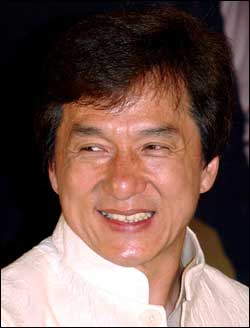 Aspiring action stars take note: You
do not have to crack heads in kung fu to make it big. And that is coming from
Jackie Chan Kong-sang, one of the biggest names in the business. Chan has been
canvassing applicants to his new talent TV show, The Disciple, and he is
frustrated by the emphasis placed on kung fu skills. He said in a blog entry on
his Web site Monday that he is looking for grace in movement, be it from sports,
dance or kung fu. "One of the people who registered for the competition did a
sword dance on her demo tape. It was awful! But then she also did a regular
dance and it was just beautiful. She was a terrific dancer," the actor wrote.
Chan said a background in kung fu was not necessary to succeed as an action
star, citing former Bond girl Michelle Yeoh Choo Kheng and Crouching Tiger,
Hidden Dragon star Zhang Ziyi as examples. "Michelle Yeoh and Zhang Ziyi knew
nothing about kung fu - but they were dancers. "With their dancing skills, they
quickly and easily learned the stunts and movements from the stunt
choreographers." Chan said modern movie technology can enhance the look of kung
fu moves. "Action actors today are not required to be able to knock down an
opponent such as George Foreman! "As long as you have basic skills in action or
movement and you can take direction from the stunt choreographers, the skills of
the cameraman and the other technical staff will make you look like a kung fu
master even if you're not," he said. "In my movies, I don't want any violent
action. "I'm looking for people who have beautiful and rhythmic movement so that
the action can look something like dancing." Chan was trained in Peking Opera
and is known for his comical, dance-like moves and stunts. By contrast, another
action star, Jet Li, was a national kung fu champion in China before he crossed
over to the film industry.
Aspiring action stars take note: You
do not have to crack heads in kung fu to make it big. And that is coming from
Jackie Chan Kong-sang, one of the biggest names in the business. Chan has been
canvassing applicants to his new talent TV show, The Disciple, and he is
frustrated by the emphasis placed on kung fu skills. He said in a blog entry on
his Web site Monday that he is looking for grace in movement, be it from sports,
dance or kung fu. "One of the people who registered for the competition did a
sword dance on her demo tape. It was awful! But then she also did a regular
dance and it was just beautiful. She was a terrific dancer," the actor wrote.
Chan said a background in kung fu was not necessary to succeed as an action
star, citing former Bond girl Michelle Yeoh Choo Kheng and Crouching Tiger,
Hidden Dragon star Zhang Ziyi as examples. "Michelle Yeoh and Zhang Ziyi knew
nothing about kung fu - but they were dancers. "With their dancing skills, they
quickly and easily learned the stunts and movements from the stunt
choreographers." Chan said modern movie technology can enhance the look of kung
fu moves. "Action actors today are not required to be able to knock down an
opponent such as George Foreman! "As long as you have basic skills in action or
movement and you can take direction from the stunt choreographers, the skills of
the cameraman and the other technical staff will make you look like a kung fu
master even if you're not," he said. "In my movies, I don't want any violent
action. "I'm looking for people who have beautiful and rhythmic movement so that
the action can look something like dancing." Chan was trained in Peking Opera
and is known for his comical, dance-like moves and stunts. By contrast, another
action star, Jet Li, was a national kung fu champion in China before he crossed
over to the film industry.
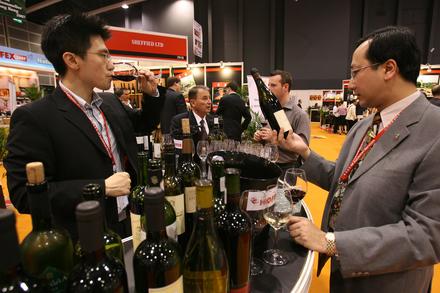 Connoisseurs try
out a range of boutique red and white Australian wines at the Convention and
Exhibition Centre yesterday during Hofex, the international food, drink and
hospitality exhibition. Connoisseurs try
out a range of boutique red and white Australian wines at the Convention and
Exhibition Centre yesterday during Hofex, the international food, drink and
hospitality exhibition.
 China: Germany
plays forward in EU-China relations - German ambassador to China Dr. Volker
Stanzel visited Strong China Forum hosted by People's Daily and answered
questions by netizens on the subject of "The Role Germany plays in EU and EU-China
Relations" on May 14. Germany's role in EU and EU-China relations - In
responding to a reader's analogy that the Sino-EU relations are like a friendly
soccer game, Dr. Stanzel said Germany played the forward in the game and what he
wanted to know was whether a goal would be scored. The foreign policies in
Europe have been based on agreement of all its member countries. As an EU
country which has very close and friendly relationship with China, Germany has
been devoted to contributing to the development of the EU-China relations.
Germany, as one of the six founding nations of the EU, has been promoting the
integration process of the biggest unity of nations in the world. It is still
making efforts on the formulation of the EU Constitution. The EU has expanded to
27 members from 6. It is much easier to take care of interests of six nations
than to reach consensus among 27 members. But it will make much more sense to
achieve the goal of bringing all members together in such a big union. The
theory of "China threat" - Dr. Stanzel held that an emerging power, economically
or politically, normally draws much attention of the rest of the world, which
leads to both positive and negative assumptions. The theory of "China threat",
for example, reflects the feeling some people have on the new reality that China
is rising. Dr. Stanzel explained that by making Japan as an example. There were
many books on the "Japan threat", shortly after the East Asian country's rise on
the international arena. To that point, he maintained that people should adopt
an easy attitude when handling this sensitive issue. More and more people now
are focusing on China. Some are concerned about the rise of China. Others hold a
more positive attitude toward China. For China itself, the most important thing
is to hold rational, pragmatic as well as concrete dialogues with all these
people. Germany-China relations - Some Chinese think the Sino-German
relationship is not as good as that in former Chancellor Schroeder's era. Dr.
Stanzel assured that there was no "problem" in the relationship. He explained it
is just a matter of the different styles. Chinese government and Merkel's
administration are still making sustained efforts in improving bilateral
relations. German Chancellor Angela Merkel and Chinese Premier Wen Jiabao have
decided to launch a three-year campaign to facilitate the cultural, economic,
social as well as political understanding and exchanges between the two
countries. The German Embassy has been working on this big project for some
time. The Nationalism - Many countries in Europe have euro as common currency in
trade, and European citizens do not need passport when traveling around EU
member countries. There is desire for competition among the youth as the result
of the integration. However, the patriotism now is quite different from the
nationalism in the past. Dr. Stanzel's impression about the Chinese youth comes
from his experience with Chinese college students. He is quite impressed by
their pride in the achievements made in China's modernization drive. However,
the ambassador does not hope the youth feel complacent over the success, because
the achievements are made by their parents or older generations instead of
themselves. It is understandable that the youth are proud of the success
achieved by their parents or grand-parents. But sometimes such pride may turn
into a kind of nationalism. What's more, if a country achieves success, it does
not mean the country can exercise its power at will on anybody and any other
countries. On 2008 Beijing Olympic Games - Dr. Stanzel thinks that the year 2008
is crucial not only for Beijing, but also for China, because it offers the world
a wonderful opportunity to learn more about China and the development made in
the past ten years. He stressed that the prime goal of Olympic Game is to
compete in sports. He hopes journalists could pay more attention to that point
when covering this great international sporting event. He looks forward to a
wonderful sporting feast for all.
China: Germany
plays forward in EU-China relations - German ambassador to China Dr. Volker
Stanzel visited Strong China Forum hosted by People's Daily and answered
questions by netizens on the subject of "The Role Germany plays in EU and EU-China
Relations" on May 14. Germany's role in EU and EU-China relations - In
responding to a reader's analogy that the Sino-EU relations are like a friendly
soccer game, Dr. Stanzel said Germany played the forward in the game and what he
wanted to know was whether a goal would be scored. The foreign policies in
Europe have been based on agreement of all its member countries. As an EU
country which has very close and friendly relationship with China, Germany has
been devoted to contributing to the development of the EU-China relations.
Germany, as one of the six founding nations of the EU, has been promoting the
integration process of the biggest unity of nations in the world. It is still
making efforts on the formulation of the EU Constitution. The EU has expanded to
27 members from 6. It is much easier to take care of interests of six nations
than to reach consensus among 27 members. But it will make much more sense to
achieve the goal of bringing all members together in such a big union. The
theory of "China threat" - Dr. Stanzel held that an emerging power, economically
or politically, normally draws much attention of the rest of the world, which
leads to both positive and negative assumptions. The theory of "China threat",
for example, reflects the feeling some people have on the new reality that China
is rising. Dr. Stanzel explained that by making Japan as an example. There were
many books on the "Japan threat", shortly after the East Asian country's rise on
the international arena. To that point, he maintained that people should adopt
an easy attitude when handling this sensitive issue. More and more people now
are focusing on China. Some are concerned about the rise of China. Others hold a
more positive attitude toward China. For China itself, the most important thing
is to hold rational, pragmatic as well as concrete dialogues with all these
people. Germany-China relations - Some Chinese think the Sino-German
relationship is not as good as that in former Chancellor Schroeder's era. Dr.
Stanzel assured that there was no "problem" in the relationship. He explained it
is just a matter of the different styles. Chinese government and Merkel's
administration are still making sustained efforts in improving bilateral
relations. German Chancellor Angela Merkel and Chinese Premier Wen Jiabao have
decided to launch a three-year campaign to facilitate the cultural, economic,
social as well as political understanding and exchanges between the two
countries. The German Embassy has been working on this big project for some
time. The Nationalism - Many countries in Europe have euro as common currency in
trade, and European citizens do not need passport when traveling around EU
member countries. There is desire for competition among the youth as the result
of the integration. However, the patriotism now is quite different from the
nationalism in the past. Dr. Stanzel's impression about the Chinese youth comes
from his experience with Chinese college students. He is quite impressed by
their pride in the achievements made in China's modernization drive. However,
the ambassador does not hope the youth feel complacent over the success, because
the achievements are made by their parents or older generations instead of
themselves. It is understandable that the youth are proud of the success
achieved by their parents or grand-parents. But sometimes such pride may turn
into a kind of nationalism. What's more, if a country achieves success, it does
not mean the country can exercise its power at will on anybody and any other
countries. On 2008 Beijing Olympic Games - Dr. Stanzel thinks that the year 2008
is crucial not only for Beijing, but also for China, because it offers the world
a wonderful opportunity to learn more about China and the development made in
the past ten years. He stressed that the prime goal of Olympic Game is to
compete in sports. He hopes journalists could pay more attention to that point
when covering this great international sporting event. He looks forward to a
wonderful sporting feast for all.
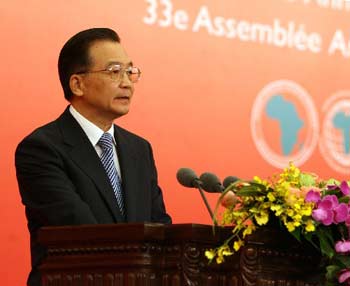 Chinese Premier Wen Jiabao speaks during the opening
ceremony of the 2007 Annual Meetings of the Boards of Governors of the African
Development Bank (ADB) Group in Shanghai, east China, May 16, 2007. The ADB
Wednesday opened its annual board meetings in Shanghai, which are widely seen as
a move to deepen China-Africa cooperation.
Chinese Premier Wen Jiabao speaks during the opening
ceremony of the 2007 Annual Meetings of the Boards of Governors of the African
Development Bank (ADB) Group in Shanghai, east China, May 16, 2007. The ADB
Wednesday opened its annual board meetings in Shanghai, which are widely seen as
a move to deepen China-Africa cooperation.
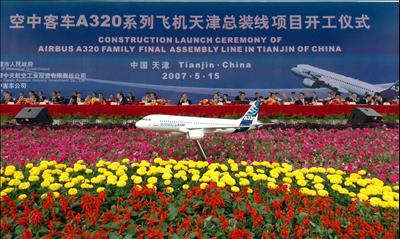 Construction of an assembly line for Airbus A320 planes
began on Tuesday in north China's port city Tianjin with a ceremony to mark the
occasion. The plant in the Tianjin Binhai New Area, the first for Airbus outside
Europe, is expected to start operating in August next year and have an annual
capacity of 44 aircraft in 2011, sources with the project said.
Construction of an assembly line for Airbus A320 planes
began on Tuesday in north China's port city Tianjin with a ceremony to mark the
occasion. The plant in the Tianjin Binhai New Area, the first for Airbus outside
Europe, is expected to start operating in August next year and have an annual
capacity of 44 aircraft in 2011, sources with the project said.
China and the United States will hold talks on the
protection of intellectual property rights and the market access of publications
in China from June 5 to 8, said Wang Xinpei, spokesman for the Ministry of
Commerce on Wednesday. The Chinese delegation to the World Trade Organization
formally accepted the request from the U.S. side to talk on these issues on
April 20, and both sides agreed to have the discussion in Geneva next month,
Wang told a routine press conference. The United States filed two WTO complaints
against China over copyright piracy and restrictions on the sale of U.S. books,
music, videos and movies on April 10, maintaining that piracy levels in China
"remain unacceptably high". The Chinese government expressed "great regret and
strong dissatisfaction" over the U.S. action on the same day, saying the
decision runs contrary to the consensus between leaders of the two nations on
strengthening bilateral trade ties and properly solving trade disputes. The new
cases were reported to be aimed at easing "rising political anger over America's
soaring trade deficit", as some U.S. officials believed American companies were
losing billions of dollars every year due to piracy activities in China.
Chinese Premier Wen Jiabao told the ongoing 2007 Annual
Meetings of the Board of Governors of the African Development Bank Group in
Shanghai that China is deepening reforms of its foreign exchange management
system. The nation is improving the Renminbi exchange rate mechanism, giving
greater scope to the role of the market and introducing greater interest rate
flexibility, according to Wen. The premier's remarks are testimony to China's
continuing commitment to progressive reform of the Renminbi exchange rate, said
Tan Yaling, an expert in international finance in Shanghai. Wen's words on
"giving great scope to the role of the market" showed that China intends to
follow the global trend in its ongoing exchange rate reform, according to Ding
Chun, deputy head of the European issues research institute in Shanghai-based
Fudan University. Ding said this implied a move from a controlled to a
market-oriented economy and the gradual abandonment of administrative
instruments in exchange rate fixing. "One of the major problems challenging
China's development is the long-term trade surplus, which has led to swollen
foreign exchange reserves and excess liquidity at home," said Li Yang, head of
the finance research institute of the Chinese Academy of Social Sciences.
Reforming the Renminbi foreign exchange rate mechanism will aid China's
fast-growing economy, Li said.
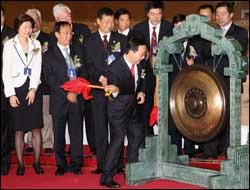 Bank of Communications (3328), the
fifth-largest lender in China, saw its A shares soar as much as 80 percent on
its first trading day, bucking the plunge of stock markets in the mainland and
registering a substantial premium over its Hong Kong-listed counterpart. The
wider investment scope for the mainland's Qualified Domestic Institutional
Investor scheme - intended in part to narrow the gap between the yuan-denominated
A shares and Hong Kong's H shares - did not sour the mood as investors grabbed
the more expensive BoCom A shares. These beat analysts' forecasts to close at
14.11 yuan in the morning trading session on the Shanghai Stock Exchange. The
early surge brought BoCom's Hong Kong-listed counterpart to HK$8.88 per share,
the highest in four months. BoCom's A shares closed at 13.54 yuan Tuesday. This
represented a 58.9 percent premium over the H shares, which closed at HK$8.52
per share, up 1.07 percent or 9 HK cents. The China Banking Regulatory
Commission said last week it would permit banks to invest in overseas equity
markets, allowing them to place up to 50 percent of their existing QDII quotas
into foreign stock markets.
Bank of Communications (3328), the
fifth-largest lender in China, saw its A shares soar as much as 80 percent on
its first trading day, bucking the plunge of stock markets in the mainland and
registering a substantial premium over its Hong Kong-listed counterpart. The
wider investment scope for the mainland's Qualified Domestic Institutional
Investor scheme - intended in part to narrow the gap between the yuan-denominated
A shares and Hong Kong's H shares - did not sour the mood as investors grabbed
the more expensive BoCom A shares. These beat analysts' forecasts to close at
14.11 yuan in the morning trading session on the Shanghai Stock Exchange. The
early surge brought BoCom's Hong Kong-listed counterpart to HK$8.88 per share,
the highest in four months. BoCom's A shares closed at 13.54 yuan Tuesday. This
represented a 58.9 percent premium over the H shares, which closed at HK$8.52
per share, up 1.07 percent or 9 HK cents. The China Banking Regulatory
Commission said last week it would permit banks to invest in overseas equity
markets, allowing them to place up to 50 percent of their existing QDII quotas
into foreign stock markets.
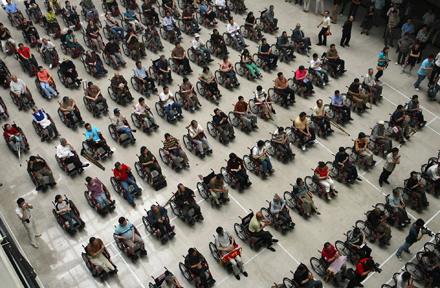 Handicapped people gather in wheelchairs given by the Beilin district government
of Xian, Shaanxi province, ahead of Aiding the Handicapped Day on Sunday. The
gift was organised by the Beilin District Handicapped Association and the World
Wheelchair Foundation.
Handicapped people gather in wheelchairs given by the Beilin district government
of Xian, Shaanxi province, ahead of Aiding the Handicapped Day on Sunday. The
gift was organised by the Beilin District Handicapped Association and the World
Wheelchair Foundation.
Treasury Secretary Henry Paulson
will lead a high-level delegation when United States and Chinese officials get
together next week for a second round of talks on economic issues.
May 17, 2007
 Hong Kong:
Hong Kong Ocean Park announced Tuesday its attendance record has reached 4.5
million within this fiscal year, breaking last year's record. Welcoming the 4.5
millionth visitor of Ocean Park in a ceremony on Tuesday, Chairman of the park
Allan Zeman said that in just about 10 months within this fiscal year beginning
July 1, 2006, the park surpassed its previous attendance record of 4.38 million,
and has reached a new height as the record of 4.5 million was first broken. "We
have topped our records for three successive years, and we are confident the
trend will continue into the future," said Zeman. The lucky guest, the Cheng's
family who visit the park almost once every week, received a giant gift box
filled with panda toys and souvenirs from the park's gift shop. Of the 4.5
million visitors, 48 percent were from the Chinese mainland and 45 percent from
the local, Zeman said, adding that during the Labor Day Golden Week in early
May, mainland visitors' attendance was 157,000, which surpassed last year's
123,000. When asked about the latest condition of the pandas pairs, a gift
presented to Hong Kong by the Central Government of China which arrived at the
park last month, Zeman said that the cubs are doing well and they have gained
weights. "The park will double the amount of attractions in the coming five
years," said Zeman. The park has started a 5.5 billion six- year redevelopment
project which is expected to be finished in 2010. Forbes Traveler, a famous
international travel magazine, recently ranked Ocean Park in their list of the
top 50 most visited tourist attractions in the world. Hong Kong:
Hong Kong Ocean Park announced Tuesday its attendance record has reached 4.5
million within this fiscal year, breaking last year's record. Welcoming the 4.5
millionth visitor of Ocean Park in a ceremony on Tuesday, Chairman of the park
Allan Zeman said that in just about 10 months within this fiscal year beginning
July 1, 2006, the park surpassed its previous attendance record of 4.38 million,
and has reached a new height as the record of 4.5 million was first broken. "We
have topped our records for three successive years, and we are confident the
trend will continue into the future," said Zeman. The lucky guest, the Cheng's
family who visit the park almost once every week, received a giant gift box
filled with panda toys and souvenirs from the park's gift shop. Of the 4.5
million visitors, 48 percent were from the Chinese mainland and 45 percent from
the local, Zeman said, adding that during the Labor Day Golden Week in early
May, mainland visitors' attendance was 157,000, which surpassed last year's
123,000. When asked about the latest condition of the pandas pairs, a gift
presented to Hong Kong by the Central Government of China which arrived at the
park last month, Zeman said that the cubs are doing well and they have gained
weights. "The park will double the amount of attractions in the coming five
years," said Zeman. The park has started a 5.5 billion six- year redevelopment
project which is expected to be finished in 2010. Forbes Traveler, a famous
international travel magazine, recently ranked Ocean Park in their list of the
top 50 most visited tourist attractions in the world.
The Hong Kong Special Administrative
Region (HKSAR) government announced on Tuesday it will join the Chinese mainland
departments to study ways to better the food regulatory mechanism. According to
news from the Information Services Department of HKSAR government, Hong Kong
Permanent Secretary for Health, Welfare and Food Carrie Yau attended the
Inaugural Meeting of Steering Group on Safe Food Supply to Hong Kong held in
Beijing on Tuesday. Speaking at the meeting, Yau said the HKSAR government will
review the food regulatory infrastructure and complementary facilities to cope
with developments in the testing and regulatory mechanism. According to Yau, the
HKSAR government and its counterparts in the Chinese mainland are considering
widening the scope of imported food that needs to be accompanied with health
certificates, putting more categories of food under regulation and control, and
opening new modes of food testing. At Tuesday's meeting, Hong Kong health
officials told their mainland counterparts that the food safety bill now being
drafted will integrate the existing laws regulating food safety. It will bring
under regulation food which has higher safety risk or of wide public concern,
including farmed aquatic products, vegetables and fruit. To comply with the
legislative requirements, the Chinese mainland and other exporting sources have
to provide health certificates for their food supplies to Hong Kong. The city
will also introduce a more comprehensive and clearer subsidiary legislation to
impose control on the standard of pesticide residues, Yau said.
Most Asian markets fell Tuesday, as
Japanese stocks were dragged down by worse-than-expected machinery order data,
while warnings from Chinese regulators against speculative trading triggered
losses in the Chinese mainland and Hong Kong. Philippine shares, however, surged
to their highest level in 10 years, inspired by relatively smooth midterm
elections. In Tokyo, the benchmark Nikkei 225 stock index fell 164.96 points, or
0.93 percent, to finish at 17,512.98 points. Losers included machinery makers
Okuma Ltd., which fell 4.06 percent to 1,559 yen (US$12.99), and Fanuc, which
lost 0.97 percent to 11,200 yen (US$93.33). Japanese core machinery orders in
March fell 4.5 percent on month for a second straight month as firms predicted
gloomier performance ahead, raising concerns that lower capital spending could
dampen economic growth. "Machinery numbers are affecting us on an intraday
basis, but overall there is very little directional trend for this market," said
Stefan Rheinwald, strategist at CLSA Asia-Pacific Markets in Tokyo. In Hong
Kong, shares retreated from a record high in the previous session, dragged down
by profit taking in blue chips and lingering worries of economic tightening
measures in China. The blue chip Hang Seng Index fell 111.09 points, or 0.53
percent, to 20,868.15. Traders said the index was taking a breather after
hitting a record close of 20,979 Monday. But the index is still on an upward
trend, they said, due to abundant liquidity and an expected influx of funds from
China's expanded overseas investment program.
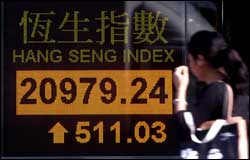 Hong Kong-listed
mainland shares surged Monday after Beijing Friday allowed mainland investors to
purchase overseas equities for the first time, sending the Hang Seng Index to a
new record on unprecedented turnover. Analysts said the strong momentum may
continue, at least in the short term. But some mainland stocks listed on the
local exchange had outpaced their fundamentals, making them vulnerable to a
correction. The Hang Seng Index set a new record closing high of 20,979.24, a
jump of 511 points, or 2.5 percent, on record turnover of HK$94.99 billion. The
last closing record high was 20,896.64 set May 7. The previous record turnover,
HK$80.49 billion, was registered February 28. Monday's intraday high of
21,065.59 - hit in early trading - was just 4.62 points away from the all-time
intraday high of 21,070.21. The H-share gauge, the Hang Seng China Enterprises
Index, outperformed the blue-chip index, surging 556.71 points or 5.36 percent
to close at 10,948.72, a record. Regional markets were mostly up after the Dow
Jones Industrial Average made a triple-digit gain Friday on mild inflation data.
Although Hong Kong blue chips shot up Monday, lifted by
news that billions of dollars from the qualified domestic institutional investor
program have been allowed to pour into Hong Kong equities, strategists said this
would only be a shortlived boost to the market and would not achieve the goal of
taking the heat off the red-hot A-share market. Hong Kong-listed
mainland shares surged Monday after Beijing Friday allowed mainland investors to
purchase overseas equities for the first time, sending the Hang Seng Index to a
new record on unprecedented turnover. Analysts said the strong momentum may
continue, at least in the short term. But some mainland stocks listed on the
local exchange had outpaced their fundamentals, making them vulnerable to a
correction. The Hang Seng Index set a new record closing high of 20,979.24, a
jump of 511 points, or 2.5 percent, on record turnover of HK$94.99 billion. The
last closing record high was 20,896.64 set May 7. The previous record turnover,
HK$80.49 billion, was registered February 28. Monday's intraday high of
21,065.59 - hit in early trading - was just 4.62 points away from the all-time
intraday high of 21,070.21. The H-share gauge, the Hang Seng China Enterprises
Index, outperformed the blue-chip index, surging 556.71 points or 5.36 percent
to close at 10,948.72, a record. Regional markets were mostly up after the Dow
Jones Industrial Average made a triple-digit gain Friday on mild inflation data.
Although Hong Kong blue chips shot up Monday, lifted by
news that billions of dollars from the qualified domestic institutional investor
program have been allowed to pour into Hong Kong equities, strategists said this
would only be a shortlived boost to the market and would not achieve the goal of
taking the heat off the red-hot A-share market.
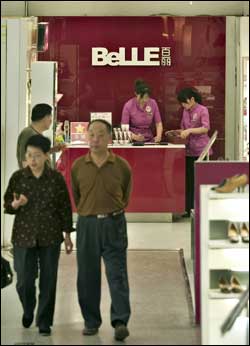 Belle International
Holdings reached an initial public offering milestone Monday, locking up a
record HK$430 billion in funds - the biggest amount in Hong Kong IPO history.
Sources said the shoe retail chain's share sale is at least 500 times
oversubscribed. It surpassed Industrial and Commercial Bank of China (1398),
which tied up a record HK$416 billion when it listed October 27 last year. In
the wake of such a staggering demand for its shares, Belle may price its offer
at the high end, sources said. The company, which is set to begin trading May
23, will raise the allotment from 10 percent to 50 percent of the total
available shares. The deal is led by Morgan Stanley and Credit Suisse. The
scramble for its shares is being partly attributed to support from reputed
investors. LVMH Group, which has a portfolio of 60 prestigious brands, is
subscribing to about HK$234.6 million worth of shares in Belle, or 3.1 percent
of the offering. On the other hand, investors continue to flock to
consumer-related China stocks, encouraged by the mainland's growing affluence.
Most brokerages reached the limit of their loan quotas on the first day of
Belle's share offering. Belle International
Holdings reached an initial public offering milestone Monday, locking up a
record HK$430 billion in funds - the biggest amount in Hong Kong IPO history.
Sources said the shoe retail chain's share sale is at least 500 times
oversubscribed. It surpassed Industrial and Commercial Bank of China (1398),
which tied up a record HK$416 billion when it listed October 27 last year. In
the wake of such a staggering demand for its shares, Belle may price its offer
at the high end, sources said. The company, which is set to begin trading May
23, will raise the allotment from 10 percent to 50 percent of the total
available shares. The deal is led by Morgan Stanley and Credit Suisse. The
scramble for its shares is being partly attributed to support from reputed
investors. LVMH Group, which has a portfolio of 60 prestigious brands, is
subscribing to about HK$234.6 million worth of shares in Belle, or 3.1 percent
of the offering. On the other hand, investors continue to flock to
consumer-related China stocks, encouraged by the mainland's growing affluence.
Most brokerages reached the limit of their loan quotas on the first day of
Belle's share offering.
Henderson Investment (0097) has
been given approval to sell its property and hotel assets to parent Henderson
Land Development (0012), allowing it to move closer to any privatization
initiatives it may still be pondering.
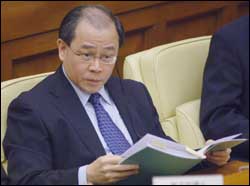 The Hong Kong Applied
Science and Technology Research Institute - already reeling from a feng-shui
scandal and allegations of mismanagement - suffered a further blow Monday when
it was revealed a senior director had bypassed the government's recruitment
procedures and interviewed candidates overseas without first conducting a local
recruitment exercise. Permanent Secretary for Commerce, Industry and Technology
Francis Ho Suen-wai also came under fire when he said he had supported the
decision of the board of directors to renew the contract of former chief
executive Robert Yang Jih-chang in March even though he thought Yang lacked
management skills. The latest revelation came at Monday's meeting of Legco's
public accounts committee meeting when Kitty Lam Lee Mei-hung, the institute's
human resources director, said a research and development director, who she
declined to name, had breached recruitment guidelines. When asked by legislators
to explain, she said the director conducted several interviews with individuals
in the United States while attempting to fill three posts in early 2006 without
first advertising the vacancies in the local press. The Hong Kong Applied
Science and Technology Research Institute - already reeling from a feng-shui
scandal and allegations of mismanagement - suffered a further blow Monday when
it was revealed a senior director had bypassed the government's recruitment
procedures and interviewed candidates overseas without first conducting a local
recruitment exercise. Permanent Secretary for Commerce, Industry and Technology
Francis Ho Suen-wai also came under fire when he said he had supported the
decision of the board of directors to renew the contract of former chief
executive Robert Yang Jih-chang in March even though he thought Yang lacked
management skills. The latest revelation came at Monday's meeting of Legco's
public accounts committee meeting when Kitty Lam Lee Mei-hung, the institute's
human resources director, said a research and development director, who she
declined to name, had breached recruitment guidelines. When asked by legislators
to explain, she said the director conducted several interviews with individuals
in the United States while attempting to fill three posts in early 2006 without
first advertising the vacancies in the local press.
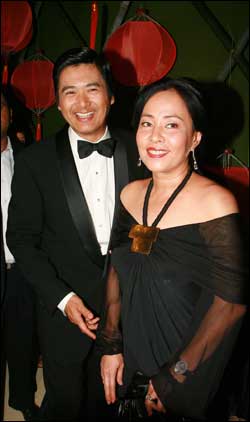
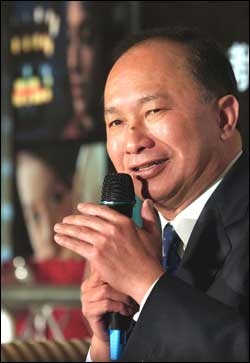 John Woo must be wondering: will the
musical chairs ever end? Woo's new Chinese epic, Red Cliff, has gone through a
dizzying and embarrassing round of casting changes that saw another twist
Monday. After dropping out earlier, actor Chow Yun-fat has tentatively agreed to
rejoin the cast, a publicist for one of the film's investors said. Chow and
Cannes best actor winner Tony Leung Chiu-wai were originally slated to play the
general Zhou Yu and strategist Zhuge Liang in the movie about an ancient Chinese
battle. Leung first dropped out, saying Red Cliff came too closely to his last
movie. He was replaced by Taiwanese-Japanese heartthrob Takeshi Kaneshiro. Then
Chow followed, saying he got the movie's script late, an allegation Woo's
producer has disputed. In the first unexpected development, Leung, sympathetic
to Woo's predicament, agreed to return to the movie to take Chow's old role as
general Zhou. Now Chow wants back in too, after a round of negative press that
has given the impression that the Lamma-Island born actor was behaving like a
prima donna. Spokesman Wen Wengli of state- run China Film Group said Monday
Chow has verbally agreed to return to Red Cliff for a role to be determined,
although he hasn't signed a contract yet. "This big production has more than 400
characters," he said, adding, however, the major casting decisions will not be
changed. Chow's departure generated headlines because of his famous on-screen
partnership with Woo. Woo made Chow an icon after casting him as a trenchcoat-wearing,
gun-toting gangster in the 1986 Hong Kong classic A Better Tomorrow. At a press
conference Thursday, Woo said Chow's withdrawal dealt him a heavy blow while he
paid an emotional tribute to Leung for taking Chow's place. The casting changes
put pressure on Woo because Red Cliff is a politically important big-budget
production. Red Cliff's producer says the Chinese government wants the film
released before the 2008 Olympic Games so that foreigners can learn more about
the country's history. Woo, however, said Thursday that the shoot is going
smoothly despite the casting problems.
John Woo must be wondering: will the
musical chairs ever end? Woo's new Chinese epic, Red Cliff, has gone through a
dizzying and embarrassing round of casting changes that saw another twist
Monday. After dropping out earlier, actor Chow Yun-fat has tentatively agreed to
rejoin the cast, a publicist for one of the film's investors said. Chow and
Cannes best actor winner Tony Leung Chiu-wai were originally slated to play the
general Zhou Yu and strategist Zhuge Liang in the movie about an ancient Chinese
battle. Leung first dropped out, saying Red Cliff came too closely to his last
movie. He was replaced by Taiwanese-Japanese heartthrob Takeshi Kaneshiro. Then
Chow followed, saying he got the movie's script late, an allegation Woo's
producer has disputed. In the first unexpected development, Leung, sympathetic
to Woo's predicament, agreed to return to the movie to take Chow's old role as
general Zhou. Now Chow wants back in too, after a round of negative press that
has given the impression that the Lamma-Island born actor was behaving like a
prima donna. Spokesman Wen Wengli of state- run China Film Group said Monday
Chow has verbally agreed to return to Red Cliff for a role to be determined,
although he hasn't signed a contract yet. "This big production has more than 400
characters," he said, adding, however, the major casting decisions will not be
changed. Chow's departure generated headlines because of his famous on-screen
partnership with Woo. Woo made Chow an icon after casting him as a trenchcoat-wearing,
gun-toting gangster in the 1986 Hong Kong classic A Better Tomorrow. At a press
conference Thursday, Woo said Chow's withdrawal dealt him a heavy blow while he
paid an emotional tribute to Leung for taking Chow's place. The casting changes
put pressure on Woo because Red Cliff is a politically important big-budget
production. Red Cliff's producer says the Chinese government wants the film
released before the 2008 Olympic Games so that foreigners can learn more about
the country's history. Woo, however, said Thursday that the shoot is going
smoothly despite the casting problems.
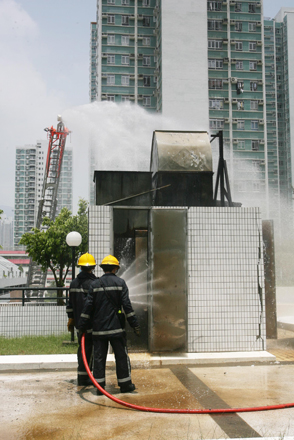 Firemen pour
water into a duct atop the City One Plaza in Sha Tin just before noon yesterday.
More than 250 people had to flee the shopping centre when fire broke out in the
Fook Choi Seafood Restaurant's vents. Firemen pour
water into a duct atop the City One Plaza in Sha Tin just before noon yesterday.
More than 250 people had to flee the shopping centre when fire broke out in the
Fook Choi Seafood Restaurant's vents.
Financial Secretary Henry Tang
Ying-yen was in Geneva on Tuesday for talks with leading members of the World
Trade Organisation, in a bid to take the struggling Doha round of negotiations
forward.
Leading European politicians
yesterday urged Hong Kong to join a network of cities sharing their experiences
on climate change and to put all climate-change policies in the hands of a
single, powerful top official.
 China: Beijing
is in the process of introducing further tax reforms that will complement the
country's overall plan to promote sustainable economic growth and reduce
pollution, according to delegates of the Hong Kong General Chamber of Commerce
who met with senior officials in Beijing in March.
China: Beijing
is in the process of introducing further tax reforms that will complement the
country's overall plan to promote sustainable economic growth and reduce
pollution, according to delegates of the Hong Kong General Chamber of Commerce
who met with senior officials in Beijing in March.
 Students and designers for the Harbin Institute of
Technology Robot Soccer Team watch a match in Wuhan, China's Hubei, May 14. The
winners will represent China at the Federation of Int'l Robot-soccer Association
World Cup in San Francisco on June 13.
Students and designers for the Harbin Institute of
Technology Robot Soccer Team watch a match in Wuhan, China's Hubei, May 14. The
winners will represent China at the Federation of Int'l Robot-soccer Association
World Cup in San Francisco on June 13.
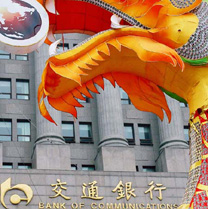 Shares in Bank of
Communications surged a much stronger-than-expected 80 percent on their debut in
Shanghai on Tuesday after the offering attracted a record 1.455 trillion yuan
($189 billion) in subscriptions. Shares in Bank of
Communications surged a much stronger-than-expected 80 percent on their debut in
Shanghai on Tuesday after the offering attracted a record 1.455 trillion yuan
($189 billion) in subscriptions.
Retail sales grew 15.5 percent in April from a year
earlier as rising incomes and a stock market boom encouraged the world's most
populous nation to spend.
More people in Guangdong have been turning to overseas
banks since they started providing retail yuan services on the Chinese mainland,
a recent survey said yesterday.
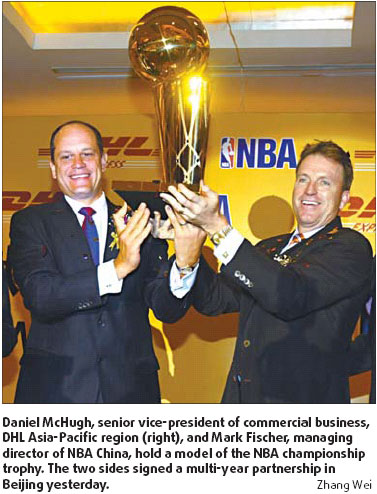 Jerry Hsu, president of DHL Greater
China and South Korea, told China Daily yesterday in Beijing that his company
will announce the Northeast Asia regional hub within two months, and Shanghai
and a South Korean city are in the running for the status. "We are still
evaluating factors like landing rights, oil prices and local infrastructure, and
will make a decision soon," said Hsu. If Shanghai is chosen, the investment to
build the facility may double the German logistics giant's total investment on
the mainland in the past five years. DHL has committed to invest $325 million on
the mainland from 2003 to 2007. China has been one of the fastest-growing
markets for the logistics firm under Deutsche Post, growing by about 35 percent
a year. Hsu said DHL has a 30 percent market share in the Chinese express
delivery segment, far ahead of its competitors such as Fedex, UPS or local
rivals like China Post and private firms. UPS, a major competitor of DHL, also
announced last month that it will establish an air delivery hub in Shanghai, the
fourth such facility in the Asia-Pacific region, with an initial investment of
$20 million. Fedex said in March that it would open a China regional hub in
Hangzhou, with a first-stage investment of $2 million. It also bought out its
Chinese partner DTW in their joint venture. DHL, the first foreign delivery firm
to launch domestic services in China, also announced yesterday that it will
partner the National Basketball Association (NBA) to promote its brand among the
Chinese. The firm will be the official express and logistics provider for NBA in
China and Asia for at least three years to ship equipment like professional
floors and backboards for NBA games in the region. DHL, following the other 18
marketing partners of NBA in China, including Adidas and Lenovo Group, will ship
the NBA trophy for a tour in Asia in 2007 and 2008 and participate in the
"Basketball without Borders" campaign in the region.
Jerry Hsu, president of DHL Greater
China and South Korea, told China Daily yesterday in Beijing that his company
will announce the Northeast Asia regional hub within two months, and Shanghai
and a South Korean city are in the running for the status. "We are still
evaluating factors like landing rights, oil prices and local infrastructure, and
will make a decision soon," said Hsu. If Shanghai is chosen, the investment to
build the facility may double the German logistics giant's total investment on
the mainland in the past five years. DHL has committed to invest $325 million on
the mainland from 2003 to 2007. China has been one of the fastest-growing
markets for the logistics firm under Deutsche Post, growing by about 35 percent
a year. Hsu said DHL has a 30 percent market share in the Chinese express
delivery segment, far ahead of its competitors such as Fedex, UPS or local
rivals like China Post and private firms. UPS, a major competitor of DHL, also
announced last month that it will establish an air delivery hub in Shanghai, the
fourth such facility in the Asia-Pacific region, with an initial investment of
$20 million. Fedex said in March that it would open a China regional hub in
Hangzhou, with a first-stage investment of $2 million. It also bought out its
Chinese partner DTW in their joint venture. DHL, the first foreign delivery firm
to launch domestic services in China, also announced yesterday that it will
partner the National Basketball Association (NBA) to promote its brand among the
Chinese. The firm will be the official express and logistics provider for NBA in
China and Asia for at least three years to ship equipment like professional
floors and backboards for NBA games in the region. DHL, following the other 18
marketing partners of NBA in China, including Adidas and Lenovo Group, will ship
the NBA trophy for a tour in Asia in 2007 and 2008 and participate in the
"Basketball without Borders" campaign in the region.
Although China's consumer price
inflation eased back to the government target level last month, Beijing is
expected to continue a tightening strategy in the short term, as April's
monetary and trade figures showed no sign of an economic slowdown, while the
stock market continues to be high.
Chinese officials on Tuesday warned
US critics of Beijing’s trade and currency polices against threatening punitive
measures ahead of high-level trade talks and said there are no plans to change
in pace of exchange rate reform despite American pressure.
The central government had launched
a probe into unusually steep salary increases at some state-owned enterprises,
addressing a growing wealth gap that has reached alarming levels, state press
said on Tuesday.
China Security & Surveillance
Technology, a Shenzhen-based supplier of digital surveillance products, is on
track to complete three strategic acquisitions worth almost 400 million yuan to
become the industry's market leader on the mainland.
May 16, 2007
 Hong Kong:
Hong Kong auteur Wong Kar-wai finds success - The 48-year-old auteur, who this
week becomes the first Chinese filmmaker to open the Cannes film festival with
"My Blueberry Nights," his debut English-language work, has won praise for his
visual style and sensual art films as well as a clutch of international awards.
Wong was the first Chinese director to head the jury at last year's Cannes
festival and the first to win the best director award there in 1997 for "Happy
Together", the tale of a strained relationship between two Chinese gay lovers
living in Buenos Aires. But it was his later film "In The Mood For Love,"
released in 2000, which earned him wider international plaudits. It was
nominated for a Palme d'Or at Cannes and went on to earn some 2.7 million
dollars at the US box office. Despite global recognition, Wong's films are not
box-office hits back home, where the media prefers to dwell on his reputation
for being eccentric and laborious, working without a script or sometimes even a
plot outline. "Wong Kar-wai's films aren't box office hits here because they
don't suit the taste of the Hong Kong people. Most of the movie-goers are
attracted to commercial movies with strong visuals," film critic Lam Keeto said.
"The mainstream audience in Hong Kong don't understand the deeper meaning of his
movies. Some of them would even find it boring," he said. Born in Shanghai, Wong
moved to Hong Kong when he was five. Despite no formal training, he enrolled in
a television drama training programme after graduating from a local college in
graphic design in 1980. He later worked as a production assistant before
becoming a TV scriptwriter. Wong made his directorial debut in 1988 with "As
Tears Go By" which was shown in Cannes. His 1990 follow-up "Days of Being Wild"
regularly tops local critics' polls of the best films ever made despite being a
financial failure. International praise was heaped on the 1994 "Chungking
Express", a quirky romantic comedy that Quentin Tarantino liked so much that he
selected it as the first product of his Rolling Thunder distribution company.
Lam said Wong knows how to appeal to the Western audience with carefully crafted
strategies. "You can see Wong Kar-wai is very calculated in his market
strategies -- in the whole filmmaking and in casting. He uses actors who appeal
to the international market. His film scores are always in European style," he
said. Wong, who is always seen in his trademark dark glasses, is highly regarded
for his ability to bring out the best in his actors, making international stars
out of Tony Leung Chiu-wai and Maggie Cheung. His partnership with
cinematographer Christopher Doyle has been another key to his success. "You can
see how Tony Leung can have a mediocre performance with some directors but with
Wong Kar-wai, he is very different," Lam said. Former beauty queen Cheung won
best actress at Cannes in 2004 for her role as a junkie rock star in ex-husband
Olivier Assayas's "Clean". Actors, however, temper their praise of Wong with
frustration over his methods. After it took five years to complete the
futuristic love epic "2046", which was shown at Cannes in 2004, star Leung
described the process as torture. Still, that has not put off multiple
Grammy-award winner Norah Jones, who stars in "My Blueberry Nights," and
Hollywood heavyweight Nicole Kidman, who will appear in "The Lady from
Shanghai". Hong Kong:
Hong Kong auteur Wong Kar-wai finds success - The 48-year-old auteur, who this
week becomes the first Chinese filmmaker to open the Cannes film festival with
"My Blueberry Nights," his debut English-language work, has won praise for his
visual style and sensual art films as well as a clutch of international awards.
Wong was the first Chinese director to head the jury at last year's Cannes
festival and the first to win the best director award there in 1997 for "Happy
Together", the tale of a strained relationship between two Chinese gay lovers
living in Buenos Aires. But it was his later film "In The Mood For Love,"
released in 2000, which earned him wider international plaudits. It was
nominated for a Palme d'Or at Cannes and went on to earn some 2.7 million
dollars at the US box office. Despite global recognition, Wong's films are not
box-office hits back home, where the media prefers to dwell on his reputation
for being eccentric and laborious, working without a script or sometimes even a
plot outline. "Wong Kar-wai's films aren't box office hits here because they
don't suit the taste of the Hong Kong people. Most of the movie-goers are
attracted to commercial movies with strong visuals," film critic Lam Keeto said.
"The mainstream audience in Hong Kong don't understand the deeper meaning of his
movies. Some of them would even find it boring," he said. Born in Shanghai, Wong
moved to Hong Kong when he was five. Despite no formal training, he enrolled in
a television drama training programme after graduating from a local college in
graphic design in 1980. He later worked as a production assistant before
becoming a TV scriptwriter. Wong made his directorial debut in 1988 with "As
Tears Go By" which was shown in Cannes. His 1990 follow-up "Days of Being Wild"
regularly tops local critics' polls of the best films ever made despite being a
financial failure. International praise was heaped on the 1994 "Chungking
Express", a quirky romantic comedy that Quentin Tarantino liked so much that he
selected it as the first product of his Rolling Thunder distribution company.
Lam said Wong knows how to appeal to the Western audience with carefully crafted
strategies. "You can see Wong Kar-wai is very calculated in his market
strategies -- in the whole filmmaking and in casting. He uses actors who appeal
to the international market. His film scores are always in European style," he
said. Wong, who is always seen in his trademark dark glasses, is highly regarded
for his ability to bring out the best in his actors, making international stars
out of Tony Leung Chiu-wai and Maggie Cheung. His partnership with
cinematographer Christopher Doyle has been another key to his success. "You can
see how Tony Leung can have a mediocre performance with some directors but with
Wong Kar-wai, he is very different," Lam said. Former beauty queen Cheung won
best actress at Cannes in 2004 for her role as a junkie rock star in ex-husband
Olivier Assayas's "Clean". Actors, however, temper their praise of Wong with
frustration over his methods. After it took five years to complete the
futuristic love epic "2046", which was shown at Cannes in 2004, star Leung
described the process as torture. Still, that has not put off multiple
Grammy-award winner Norah Jones, who stars in "My Blueberry Nights," and
Hollywood heavyweight Nicole Kidman, who will appear in "The Lady from
Shanghai".
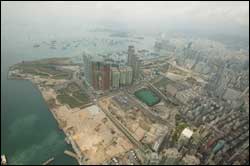 Commercial and
residential sites in the proposed West Kowloon cultural district will be sold to
pay for an arts component in an attempt to prevent a recurrence of the
controversy, a panel has recommended. This may breathe new life into a project
that ran into a firestorm of public anger, forcing a government climbdown last
year. The West Kowloon Consultative Committee, headed by Chief Secretary Rafael
Hui Si-yan, has recommended that residential and commercial sites be offloaded
through government land sales and that arts and cultural facilities be left in
government hands. The consultative panel was appointed to review the 40-hectare
cultural hub after it was shelved amid criticism that it is a property project
being palmed off on property heavyweights. An authority will be set up to manage
the cultural facilities and amenities with a HK$20 billion injection from the
government, compared with the HK$30 billion the government originally proposed
developers pay up front, Sing Tao Daily, sister newspaper of The Standard, has
learned. The committee will submit a comprehensive report to Chief Executive
Donald Tsang Yam-kuen shortly, sources said. Details are expected to be
announced in the second half. Commercial and
residential sites in the proposed West Kowloon cultural district will be sold to
pay for an arts component in an attempt to prevent a recurrence of the
controversy, a panel has recommended. This may breathe new life into a project
that ran into a firestorm of public anger, forcing a government climbdown last
year. The West Kowloon Consultative Committee, headed by Chief Secretary Rafael
Hui Si-yan, has recommended that residential and commercial sites be offloaded
through government land sales and that arts and cultural facilities be left in
government hands. The consultative panel was appointed to review the 40-hectare
cultural hub after it was shelved amid criticism that it is a property project
being palmed off on property heavyweights. An authority will be set up to manage
the cultural facilities and amenities with a HK$20 billion injection from the
government, compared with the HK$30 billion the government originally proposed
developers pay up front, Sing Tao Daily, sister newspaper of The Standard, has
learned. The committee will submit a comprehensive report to Chief Executive
Donald Tsang Yam-kuen shortly, sources said. Details are expected to be
announced in the second half.
Beijing's announcement Friday that it is expanding the
investment scope of the qualified domestic institutional investor scheme, which
drove American depositary receipts of several mainland companies sharply higher
on Wall Street, will also provide a strong boost to Hong Kong blue chips today,
analysts said.
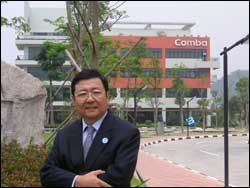 Comba Telecom Systems
Holdings (2342), which provides equipment for mobile network operators, is
keeping its eyes on demand for technologies in the mainland once
third-generation mobile services are widely adopted. These include mobile WiMax,
or worldwide interoperability for microwave access. "We have started research
and development on WiMax, and I believe the business will be as huge as 3G in
the mainland," chairman Tony Fok Tung- ling told The Standard. Mobile WiMax -
generally regarded as a 4G standard - delivers wireless access to the Internet
at speeds faster than traditional wired broadband lines. "It is believed that
when 3G [licenses are] further postponed, telcos may switch to WiMax directly,
and I don't rule out that possibility." He said that 3G is slower than WiMax in
terms of Internet access and data transmission. But the company's growth drivers
will be mobile services expansion in rural areas and equipment orders for the
time-division synchronous code division multiple access mobile standard. TD-SCDMA
is a mobile services standard developed domestically. "The government plans to
introduce mobile services in rural areas in the next five years. So 2G will
still be our core business." Comba Telecom Systems
Holdings (2342), which provides equipment for mobile network operators, is
keeping its eyes on demand for technologies in the mainland once
third-generation mobile services are widely adopted. These include mobile WiMax,
or worldwide interoperability for microwave access. "We have started research
and development on WiMax, and I believe the business will be as huge as 3G in
the mainland," chairman Tony Fok Tung- ling told The Standard. Mobile WiMax -
generally regarded as a 4G standard - delivers wireless access to the Internet
at speeds faster than traditional wired broadband lines. "It is believed that
when 3G [licenses are] further postponed, telcos may switch to WiMax directly,
and I don't rule out that possibility." He said that 3G is slower than WiMax in
terms of Internet access and data transmission. But the company's growth drivers
will be mobile services expansion in rural areas and equipment orders for the
time-division synchronous code division multiple access mobile standard. TD-SCDMA
is a mobile services standard developed domestically. "The government plans to
introduce mobile services in rural areas in the next five years. So 2G will
still be our core business."
Oriental Investment Corp (0735),
which is involved in property and renewable energy projects, is set to
capitalize on mainland policy measures that encourage environmentally
sustainable electricity supply, after signing agreements May 9 to spend a total
of HK$438 million on securing large stakes in two green power plants.
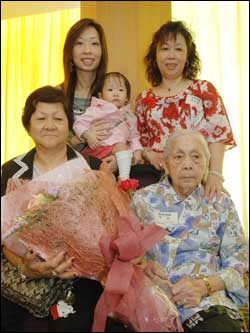 Five generations of one family,
ranging from a 13-month baby to a 101-year- old great-great-grandmother, shared
their joy and tips for a harmonious relationship while celebrating Mother's Day
Sunday. Surrounded by her daughter and grandchildren, centenarian Shum Siu
quietly sipped her tea and enjoyed dim sum. Although she could not speak
clearly, she replied "very happy" and looked at her 13-month-old granddaughter
when asked how she felt on this special day. Shum helped raise her first five
grandchildren when her only daughter and daughter-in-law had to work in
factories for a living. Shum's daughter, Lau Sau-ying, 70, said she was grateful
to her mother. "We were very poor at that time. My husband and I had to work 18
hours a day. Sometimes we stayed overnight in the factories," Lau said, "My
father had left the family when I was young. I know it's been hard work for her
to take care of the five kids. I'm very grateful to my mother. We've been living
together for 50 years." The "great great" grandmother's efforts have enabled the
family to grow into an extensive but closely knitted household with 30 members
across five generations. Her family took up two tables at Sunday's celebration.
"We've been going to yum cha with our grandmothers every day for almost 30
consecutive years," third-generation Ling Chi-leung said. "Grandmother Shum
loves to play mahjong, about about three times a week, with my mother and other
relatives.
Five generations of one family,
ranging from a 13-month baby to a 101-year- old great-great-grandmother, shared
their joy and tips for a harmonious relationship while celebrating Mother's Day
Sunday. Surrounded by her daughter and grandchildren, centenarian Shum Siu
quietly sipped her tea and enjoyed dim sum. Although she could not speak
clearly, she replied "very happy" and looked at her 13-month-old granddaughter
when asked how she felt on this special day. Shum helped raise her first five
grandchildren when her only daughter and daughter-in-law had to work in
factories for a living. Shum's daughter, Lau Sau-ying, 70, said she was grateful
to her mother. "We were very poor at that time. My husband and I had to work 18
hours a day. Sometimes we stayed overnight in the factories," Lau said, "My
father had left the family when I was young. I know it's been hard work for her
to take care of the five kids. I'm very grateful to my mother. We've been living
together for 50 years." The "great great" grandmother's efforts have enabled the
family to grow into an extensive but closely knitted household with 30 members
across five generations. Her family took up two tables at Sunday's celebration.
"We've been going to yum cha with our grandmothers every day for almost 30
consecutive years," third-generation Ling Chi-leung said. "Grandmother Shum
loves to play mahjong, about about three times a week, with my mother and other
relatives.
Hong Kong had missed golden
opportunities for even greater economic integration with the mainland and this
was something to be regretted, according to executive councillor and Hong Kong
Federation of Trade Unions president Cheng Yiu- tong. "Due to strong resistance
from former colonial- mindset bureaucrats and pan-democrats, and partly due to
the hands-off policy of central government leaders after the handover, Hong Kong
skipped the chance to grasp the merits of implementing the `one country two
systems' concept. "Since the handover, the Hong Kong and Macau Affairs Office
has been acting like a goalkeeper in fending off mainland influence on the SAR
government. "But such a well-intentioned policy had inhibited normal ties and
cross-border integration concerning social, economic and cultural communication,
hindering greater integration until quite recent years," Cheng said. He said
many timely and significant well- thought proposals studied by the Commission on
Long-Term Strategy Development set up by former chief executive Tung Chee-hwa
during his first term were shelved or swept under the carpet. "Hong Kong could
have progressed in better shape and more swiftly if the community had
implemented various proposals like a 24-hour border checkpoint, a one-stop
checkpoint at the border, the opening up of border restricted areas and greater
integration with the Pan-Pearl River Delta in the first half of the last
decade," Cheng said. On livelihood issues, the worker-turned unionist leader
said he also regretted that Hong Kong continued to be plagued by a serious
income gap that could generate social uneasiness and even sow the seeds of
unrest. "Our workforce is diversified when it comes to earnings. The top 10
percent of income earners, and the lowest 20 percent of earners are shifting
upwards and downwards, respectively," he said. "The sandwiched income earners,
on the other hand, are passively waiting for a chance to benefit from an
economic boom." Cheng warned of a time bomb among the newly arrived migrants
from the mainland who are not eligible for social welfare until after they have
been in the territory for seven years. He urged the government to lend a
sympathetic ear to their demand for social allowances and benefits that could be
obtained from outside Hong Kong once these migrants have settled across the
border in a Hong Kong-subsidized estate located in Shenzhen. Cheng also called
on the mainland authorities to grant a one-year grace period to new migrants who
opt to return to the mainland.
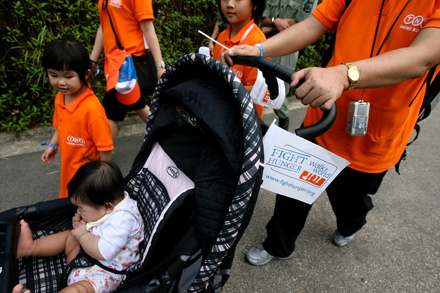 Children
accompany their parents on a "Fight Hunger: Walk the World" event held yesterday
at The Peak. They were joined by hundreds of thousands of people worldwide who
took to the streets in support of the UN World Food Programme initiative against
child hunger. Funds raised will go to the Global School Feeding Program. Members
of the Commission on Poverty fear that the soon-to-be-disbanded body is trying
to minimise the number of measures to be adopted, after finding a draft report
only focuses on a few courses of action to ease poverty. Children
accompany their parents on a "Fight Hunger: Walk the World" event held yesterday
at The Peak. They were joined by hundreds of thousands of people worldwide who
took to the streets in support of the UN World Food Programme initiative against
child hunger. Funds raised will go to the Global School Feeding Program. Members
of the Commission on Poverty fear that the soon-to-be-disbanded body is trying
to minimise the number of measures to be adopted, after finding a draft report
only focuses on a few courses of action to ease poverty.
Hong Kong's re-exports rose 8 per
cent by volume in March compared with a year earlier, Census and Statistics
Department figures released on Monday showed.
 China: Beckett
has said relations between Britain and China are now "in the best shape ever,"
hoping to further strengthen bilateral ties in areas of shared interests.
China: Beckett
has said relations between Britain and China are now "in the best shape ever,"
hoping to further strengthen bilateral ties in areas of shared interests.
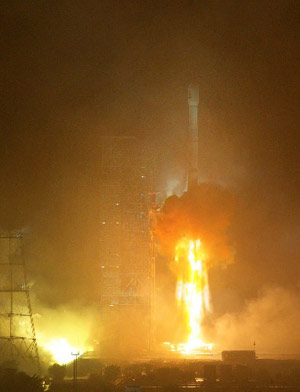 China on
early Monday morning launched a communications satellite for Nigeria, the first
of its kind in Africa and the first time a foreign buyer has purchased a Chinese
satellite and its launching service. China on
early Monday morning launched a communications satellite for Nigeria, the first
of its kind in Africa and the first time a foreign buyer has purchased a Chinese
satellite and its launching service.
China's largest optical astronomical telescope was put
into operation on Saturday or May 12, in southwest China's Yunnan province.
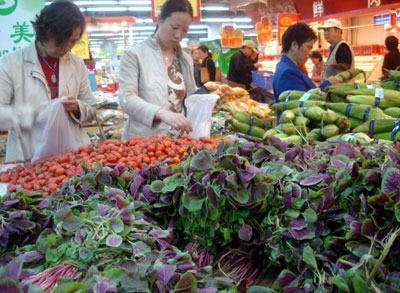 Consumers shop at a supermarket in Suzhou, East China's
Jiangsu Province April 27, 2007. China's Consumer Price Index, a barometer of
inflation, rose three percent year-on-year, down from 3.3 percent in March, the
National Bureau of Statistics said on Monday.
Consumers shop at a supermarket in Suzhou, East China's
Jiangsu Province April 27, 2007. China's Consumer Price Index, a barometer of
inflation, rose three percent year-on-year, down from 3.3 percent in March, the
National Bureau of Statistics said on Monday.
The pirated software sold on Chinese market accounted for
24 percent of the value of the country's total software industry in 2006, down
two percentages from that in 2005. The turnover of China's software sector in
2006 reached 480 billion yuan (61.5 billion U.S. dollars), said an annual report
on China's software piracy, according to a press conference on Monday. The
report was based on studies carried out by Chinalabs, a leading domestic
internet research institute. In 2005 the State Intellectual Property Office
tasked Chinalabs with researching software piracy. It attributed the decline to
the robust growth of free software, a continuous government anti-piracy
campaign, and the development of competitive domestic IT companies, producing
reliable and affordable software products. Ye Xiumin, a researcher with
Chinalabs, said the report is more accurate than estimates by some international
organizations which mistakenly count free software as counterfeit products. She
cited a 2003 estimate by The Business Software Alliance which claimed that the
piracy rate in China was as high as 92 percent. "We have deducted free software
from the research pool to make sure the results reflect the true piracy
situation in China," Ye said. Industrial data, polls and expert estimates were
used to systematically calculate piracy rates, she said. Piracy has been a
bickering issue between China and the United States. Washington last month filed
World Trade Organization complaints against Beijing, over copyright
infringements and restrictions on the sale of U.S. books, music, videos and
movies. China criticized the move, saying much of its painstaking efforts to
tackle piracy and its remarkable progress were ignored by the United States.
Last year in China more than 73 million pirated products, including 3.79 million
software discs, were confiscated. The Chinese courts also lowered the threshold
for prosecuting manufacturers and vendors of counterfeit intellectual property
products. Anyone who manufactures 500 or more counterfeit copies (discs) of
computer software, music, movies, TV shows and other audio-video products can be
prosecuted and face a prison term of up to seven years.
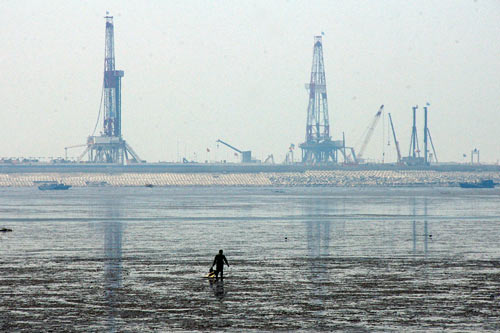 A
laborer walks toward the Jidong Nanpu oilfield in Bohai Bay of North China's
Hebei Province May 10, 2007. China's newly found oilfield in Bohai Bay has a
reserve of one billion tons, or about 7.35 billion barrels, the largest
discovery in the country over four decades, announced the China National
Petroleum Corporation. A
laborer walks toward the Jidong Nanpu oilfield in Bohai Bay of North China's
Hebei Province May 10, 2007. China's newly found oilfield in Bohai Bay has a
reserve of one billion tons, or about 7.35 billion barrels, the largest
discovery in the country over four decades, announced the China National
Petroleum Corporation.
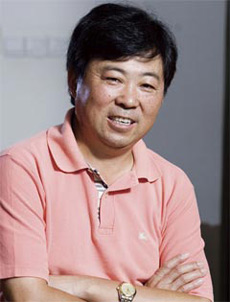 Rumors increase as shares suspended - Rumours the general
manager of prestigious liquor maker Guizhou Moutai Co Ltd is under investigation
grew louder on Friday, after the company's shares were suddenly suspended from
trading on the Shanghai Stock Exchange on Thursday. The Beijing Times reported
yesterday that Qiao Hong was being investigated by the Guizhou provincial Party
commission for discipline inspection on April 30. His wife, youngest brother,
brother's wife and younger sister were all already being investigated. The only
members of Qiao's family not yet under investigation are his other younger
brother and son, but they have been told on several occasions to voluntarily
come in for questioning or face "legal proceedings", the newspaper said. Several
of Qiao's friends are also being investigated, as are other figures connected
with Moutai including former sales agents and suppliers. In the meantime, more
than 30 company officers nearly half the middle and top managers have had their
jobs reshuffled in a massive reorganisation of Moutai's executive structure. In
an effort to clean up the company's image, Moutai has moved junior managers less
closely associated with Qiao up the ranks, while those seen as "Qiao's men" have
been demoted. An insider said the reshuffle will be completed before next
Tuesday. Qiao, 54, became general manager of Moutai in 2000, his duties mainly
revolved around managing sales. Before taking the job he had been a
vice-director of Guizhou's provincial department for light industry management.
The investigation is believed to have been triggered by a series of anonymous
letters that claimed Qiao took bribes and sought to benefit other members of his
family through shady deals. Neither the distillery nor local discipline
department was willing to provide details of the case when China Daily contacted
them yesterday. Despite the investigation, company reshuffle and the shares'
suspension, Qiao has had a successful six years at Moutai, playing on the
liquor's well-known name to build strong profits. Sales value jumped from 980
million yuan ($127 million) in 1999 to 6.2 billion yuan ($807 million) last
year. Net profit in 2006 soared by 34.47 percent to 1.5 billion yuan ($195
million). The stock, a favorite with domestic and foreign investors, in January
became the first mainland stock to rise above 100 yuan ($13) in nearly six
years.
Rumors increase as shares suspended - Rumours the general
manager of prestigious liquor maker Guizhou Moutai Co Ltd is under investigation
grew louder on Friday, after the company's shares were suddenly suspended from
trading on the Shanghai Stock Exchange on Thursday. The Beijing Times reported
yesterday that Qiao Hong was being investigated by the Guizhou provincial Party
commission for discipline inspection on April 30. His wife, youngest brother,
brother's wife and younger sister were all already being investigated. The only
members of Qiao's family not yet under investigation are his other younger
brother and son, but they have been told on several occasions to voluntarily
come in for questioning or face "legal proceedings", the newspaper said. Several
of Qiao's friends are also being investigated, as are other figures connected
with Moutai including former sales agents and suppliers. In the meantime, more
than 30 company officers nearly half the middle and top managers have had their
jobs reshuffled in a massive reorganisation of Moutai's executive structure. In
an effort to clean up the company's image, Moutai has moved junior managers less
closely associated with Qiao up the ranks, while those seen as "Qiao's men" have
been demoted. An insider said the reshuffle will be completed before next
Tuesday. Qiao, 54, became general manager of Moutai in 2000, his duties mainly
revolved around managing sales. Before taking the job he had been a
vice-director of Guizhou's provincial department for light industry management.
The investigation is believed to have been triggered by a series of anonymous
letters that claimed Qiao took bribes and sought to benefit other members of his
family through shady deals. Neither the distillery nor local discipline
department was willing to provide details of the case when China Daily contacted
them yesterday. Despite the investigation, company reshuffle and the shares'
suspension, Qiao has had a successful six years at Moutai, playing on the
liquor's well-known name to build strong profits. Sales value jumped from 980
million yuan ($127 million) in 1999 to 6.2 billion yuan ($807 million) last
year. Net profit in 2006 soared by 34.47 percent to 1.5 billion yuan ($195
million). The stock, a favorite with domestic and foreign investors, in January
became the first mainland stock to rise above 100 yuan ($13) in nearly six
years.
Consecutive farm trade deficits over the past three years
has been the biggest change in the country's agricultural sector after China's
entry into the World Trade Organization (WTO). The imbalance reached $4.64
billion in 2004 when the country first experienced such a deficit. The figures
were trimmed downed to $1.14 billion and $670 million in 2005 and 2006. How did
this happen? Do such farm trade deficits have a big impact on the domestic farm
goods market? The emergence of a trade deficit is a natural result of China
opening its agricultural sector to the outside world. China is now one of the
countries with the lowest tariffs on agricultural imports. So far, the average
tariff on farm products has been 15.3 percent, which is far lower than the world
average of 62 percent. Also, with the rapid development of the textile, oil-fat
and rubber industries, the demand for relevant agricultural raw material imports
has grown substantially. Meanwhile, China's export of agricultural products,
especially labor-intensive ones, continued to increase. But exports have been
running into more difficulties. Last year, Japan implemented the positive list
system; the European Union implemented the new food safety law and increased the
scope of, and standards in, the inspection of noxious substances. Exports of
agricultural products such as vegetables, fruits and aquatic products, in which
China has an advantage, have been falling. These changes have led to the
appearance of a trade deficit in farm trade. There are worries in some quarters
about this trade deficit. There are apprehensions that imports of staple
agricultural products, especially cotton and soybeans, may affect the
development of domestic production. Two aspects of this issue need to be
considered before any conclusion can be reached: whether domestic production is
decreasing and whether the potential for domestic production is being
restricted.
Central China Television (CCTV) and the BBC are jointly
producing a 12 episode television series called "Beautiful China" to offer as a
tribute to the 2008 Beijing Olympics Games. The production crew has just
finished shooting one of the episodes in Aoluguya Ewenki village in Inner
Mongolia Autonomous Region. Post-production work is underway on the remaining
episodes. CCTV will air the entire series and the BBC will show six episodes
before the Beijing Olympic Games in 2008.
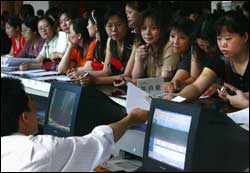 Investors are
throwing money into China's share markets and the fever is nowhere more apparent
than in the speculative trade involving the mountain of money-losing listed
companies. Take Jiaozuo Xin'an Science and Technology. Last year the chemical
manufacturer lost 218.3 million yuan (HK$221.8 million) but its share price has
tripled in the last three months. According to various media reports the
inexorable rise was triggered by rumors that the troubled firm was in talks to
serve as a shell for a backdoor listing of a securities brokerage. The group
denied it repeatedly, but its share price only climbed higher - a reflection of
how China's overheated stock markets are defying economic logic and will
eventually cause major economic fallout. The shares of hundreds of low- quality
firms have rocketed in value, propped up by speculative retail funds, contrary
to developed bourses where a lack of demand for such stocks would mean certain
delisting. But in China, where last week the Shanghai Composite Index breached
the historic 4,000-point level for the first time, many, usually inexperienced
investors plunk down cash no matter what firm's balance sheet looks like. "These
retail investors enter the stock market for the first time and tend to avoid
large caps whose prices are already pushed to high levels by institutions and
favor cheap ones," Huang Yizhi, senior analyst with BNP Paribas Asset
Management, said. Investors are
throwing money into China's share markets and the fever is nowhere more apparent
than in the speculative trade involving the mountain of money-losing listed
companies. Take Jiaozuo Xin'an Science and Technology. Last year the chemical
manufacturer lost 218.3 million yuan (HK$221.8 million) but its share price has
tripled in the last three months. According to various media reports the
inexorable rise was triggered by rumors that the troubled firm was in talks to
serve as a shell for a backdoor listing of a securities brokerage. The group
denied it repeatedly, but its share price only climbed higher - a reflection of
how China's overheated stock markets are defying economic logic and will
eventually cause major economic fallout. The shares of hundreds of low- quality
firms have rocketed in value, propped up by speculative retail funds, contrary
to developed bourses where a lack of demand for such stocks would mean certain
delisting. But in China, where last week the Shanghai Composite Index breached
the historic 4,000-point level for the first time, many, usually inexperienced
investors plunk down cash no matter what firm's balance sheet looks like. "These
retail investors enter the stock market for the first time and tend to avoid
large caps whose prices are already pushed to high levels by institutions and
favor cheap ones," Huang Yizhi, senior analyst with BNP Paribas Asset
Management, said.
The new commander of US forces in the Pacific, Admiral
Timothy Keating, said he wants to intensify joint exercises and other exchanges
with China's military as quickly and broadly as the mainland government will
allow. The goals laid out by Keating, on his first visit to China since taking
over the Honolulu-based Pacific Command March 26, suggested he intends to
continue to increase US-Chinese contacts at all ranks, in the same vein as his
predecessor, Admiral William Fallon. The objective, Keating said, is to learn
more about China's military and dispel mutual suspicions to reduce chances of
conflict as China expands its power and influence across Asia. Mainland military
leaders with whom he has spoken since arriving in Beijing Thursday also endorsed
the idea, he added. Keating has aligned himself with US officials who say
China's increased ability to project military power into the Pacific does not
have to be a source of tension with the United States, if well managed.
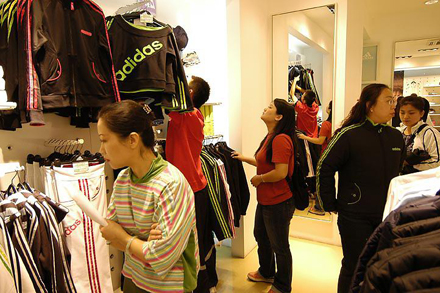 Adidas Group, the German footwear and sports apparel firm that also owns Reebok,
plans to increase the number of its self-owned and branded retail shops on the
mainland to 5,000 by 2010 from 3,000 today, according to Asia-Pacific chief
executive for marketing and sales Christophe Bezu. The company is targeting 30
per cent annual growth from China sales and expects turnover to hit €1 billion
(HK$10.57 billion) in three years. The ambitious goals would put China on par
with Japan as the group's second-largest global sales market after the US. "We
are walking with two legs in Asia - China and Japan," Mr Bezu said. "By 2009 or
2010, China will be even bigger than Japan." Adidas' aggressive introduction of
retail locations in the rapidly expanding mainland market aims to strengthen its
position against larger rival Nike and local competitors like Li Ning. Asia
accounts for about 24 per cent of the group's sales and profit, and that figure
is expected to rise as the company broadens its mainland retail network at a
rate of one to two new stores per day. "The impact of China when it grows so
fast is enormous for the region," Mr Bezu said. "We want to be No 1 in China
before the Olympics." Following the completion of its US$3.8 billion acquisition
of Reebok in January last year, Adidas now plans to launch a big push for the US
brand. The company aims to expand the network of Reebok-branded stores on the
mainland to 2,200 outlets by 2010, up from 550 today. Rivals are also expanding.
Adidas and Li Ning each has about 13 per cent of the mainland's sportswear
market, against Nike's 30 per cent share, according to estimates by Merrill
Lynch.
Adidas Group, the German footwear and sports apparel firm that also owns Reebok,
plans to increase the number of its self-owned and branded retail shops on the
mainland to 5,000 by 2010 from 3,000 today, according to Asia-Pacific chief
executive for marketing and sales Christophe Bezu. The company is targeting 30
per cent annual growth from China sales and expects turnover to hit €1 billion
(HK$10.57 billion) in three years. The ambitious goals would put China on par
with Japan as the group's second-largest global sales market after the US. "We
are walking with two legs in Asia - China and Japan," Mr Bezu said. "By 2009 or
2010, China will be even bigger than Japan." Adidas' aggressive introduction of
retail locations in the rapidly expanding mainland market aims to strengthen its
position against larger rival Nike and local competitors like Li Ning. Asia
accounts for about 24 per cent of the group's sales and profit, and that figure
is expected to rise as the company broadens its mainland retail network at a
rate of one to two new stores per day. "The impact of China when it grows so
fast is enormous for the region," Mr Bezu said. "We want to be No 1 in China
before the Olympics." Following the completion of its US$3.8 billion acquisition
of Reebok in January last year, Adidas now plans to launch a big push for the US
brand. The company aims to expand the network of Reebok-branded stores on the
mainland to 2,200 outlets by 2010, up from 550 today. Rivals are also expanding.
Adidas and Li Ning each has about 13 per cent of the mainland's sportswear
market, against Nike's 30 per cent share, according to estimates by Merrill
Lynch.
 Weak payment
solutions have for some time been highlighted as a big obstacle to e-commerce
growth in China. Researchers claim this is one reason why virtual currencies
such as QQ coins have found a niche as a popular online exchange medium, despite
government disapproval. However, online payments have been gaining a foothold in
China over the past year or two, and are now much more accessible in the world's
second-largest internet market than many people realise. Beijing market research
firm Analysys estimates that 60 per cent of China's 130 million-strong internet
population has tried online payments, with 8 per cent active users who make
online payments at least once a month. The firm estimated that online
transactions totalled 50 billion yuan last year, and forecast 150 billion yuan
by 2009. By the end of last year, Alipay, the largest online payment service in
China, recorded 460,000 transactions a day, totalling 100 million yuan. The
number of registered users surpassed 33 million - almost 25 per cent of China's
internet population. The move towards e-payments is also leading to real revenue
for operators. Alipay, operated by Hangzhou-based Alibaba, is free for users of
Alibaba's business-to-business sites and its online auction service Taobao, but
it charges 1.5 per cent on third-party transactions. Weak payment
solutions have for some time been highlighted as a big obstacle to e-commerce
growth in China. Researchers claim this is one reason why virtual currencies
such as QQ coins have found a niche as a popular online exchange medium, despite
government disapproval. However, online payments have been gaining a foothold in
China over the past year or two, and are now much more accessible in the world's
second-largest internet market than many people realise. Beijing market research
firm Analysys estimates that 60 per cent of China's 130 million-strong internet
population has tried online payments, with 8 per cent active users who make
online payments at least once a month. The firm estimated that online
transactions totalled 50 billion yuan last year, and forecast 150 billion yuan
by 2009. By the end of last year, Alipay, the largest online payment service in
China, recorded 460,000 transactions a day, totalling 100 million yuan. The
number of registered users surpassed 33 million - almost 25 per cent of China's
internet population. The move towards e-payments is also leading to real revenue
for operators. Alipay, operated by Hangzhou-based Alibaba, is free for users of
Alibaba's business-to-business sites and its online auction service Taobao, but
it charges 1.5 per cent on third-party transactions.
May 15, 2007
 Hong Kong:
Hong Kong environmental technology companies will be able to borrow US$800
million from international banks to help devise ways to reduce pollution and
energy consumption on the mainland. The loans have been pulled together under
the Pollution Prevention and Energy Efficiency (P2E2) program, which was
launched by the US consulate in Hong Kong in 2005. They will enable Hong Kong
firms to provide services - including installing pollution-reducing and
energy-saving equipment - for mainland factories, and in return take a share of
what the factories save in energy costs. The projects will be monitored by an
independent technical auditor. Giving a speech yesterday at a conference
organized by the Chinese General Chamber of Commerce, US consul-general James
Cunningham said 30 projects had already been launched on the mainland under the
program. Mr Cunningham said two-thirds of those projects were in the Pearl River
Delta region. He said the Asian Development Bank and other international lenders
would make up to US$800 million available to commercial banks in Hong Kong by
autumn to support the initiative. At least nine commercial banks and 20 service
companies in Hong Kong are presently involved in the program. But the
consulate-general did not disclose the amount of investment in the existing
projects. They include a cement plant, a textile factory and a beer factory in
Guangdong, along with coal-fired and gas-fired power plants in Jiangsu province.
The Jiangsu plants are already enjoying an annual reduction in operating costs
of US$375,000 after upgrading pumps and fans. They have also reduced their
carbon dioxide emissions by 5,528 tons a year. Mr Cunningham said that the
Shenzhen factory of Qingdao-Asahi Brewery had achieved a 55 per cent reduction
in energy consumption through heat and biogas recovery. However, representatives
from polluting industries in the delta region said few businesses had joined the
program because it was not beneficial to small- and medium-sized producers and
the payoff was not enough to attract service providers. Hong Kong Electronic
Industries Association chairman Chan Kei-biu predicted that the cost savings for
the polluting firms would not be attractive enough for the green companies
providing the services. Most mainland companies joining the program were
multinationals, and more incentives were needed to encourage small businesses to
join and make their operations more environment-friendly. Hong Kong Leather
Traders Association chairman Wong King-hang said he did not know about the
program. Mr Wong said more than 40 leather factories in the Pearl River Delta
area had investors from Hong Kong but he suspected their cost savings would not
be enough to entice the green technology companies to help them upgraded their
facilities. Hong Kong:
Hong Kong environmental technology companies will be able to borrow US$800
million from international banks to help devise ways to reduce pollution and
energy consumption on the mainland. The loans have been pulled together under
the Pollution Prevention and Energy Efficiency (P2E2) program, which was
launched by the US consulate in Hong Kong in 2005. They will enable Hong Kong
firms to provide services - including installing pollution-reducing and
energy-saving equipment - for mainland factories, and in return take a share of
what the factories save in energy costs. The projects will be monitored by an
independent technical auditor. Giving a speech yesterday at a conference
organized by the Chinese General Chamber of Commerce, US consul-general James
Cunningham said 30 projects had already been launched on the mainland under the
program. Mr Cunningham said two-thirds of those projects were in the Pearl River
Delta region. He said the Asian Development Bank and other international lenders
would make up to US$800 million available to commercial banks in Hong Kong by
autumn to support the initiative. At least nine commercial banks and 20 service
companies in Hong Kong are presently involved in the program. But the
consulate-general did not disclose the amount of investment in the existing
projects. They include a cement plant, a textile factory and a beer factory in
Guangdong, along with coal-fired and gas-fired power plants in Jiangsu province.
The Jiangsu plants are already enjoying an annual reduction in operating costs
of US$375,000 after upgrading pumps and fans. They have also reduced their
carbon dioxide emissions by 5,528 tons a year. Mr Cunningham said that the
Shenzhen factory of Qingdao-Asahi Brewery had achieved a 55 per cent reduction
in energy consumption through heat and biogas recovery. However, representatives
from polluting industries in the delta region said few businesses had joined the
program because it was not beneficial to small- and medium-sized producers and
the payoff was not enough to attract service providers. Hong Kong Electronic
Industries Association chairman Chan Kei-biu predicted that the cost savings for
the polluting firms would not be attractive enough for the green companies
providing the services. Most mainland companies joining the program were
multinationals, and more incentives were needed to encourage small businesses to
join and make their operations more environment-friendly. Hong Kong Leather
Traders Association chairman Wong King-hang said he did not know about the
program. Mr Wong said more than 40 leather factories in the Pearl River Delta
area had investors from Hong Kong but he suspected their cost savings would not
be enough to entice the green technology companies to help them upgraded their
facilities.
A widely expected move by Ping An Insurance (2318) into the ranks of the Hang
Seng Index was confirmed Friday after HSI Services released the results of its
quarterly review. Ping An will join the other blue-chip stocks early next month.
The index compiler said Ping An will be the only stock to be added to the index
in the move effective June 4. No stocks will be taken off the index. The
addition of Ping An will bring the total number of HSI constituents to 39 and
the total number of H shares in the index to six. The mainland insurance stock
will have around 1.14 percent weighting. "Part of the impact of the stock's
addition has already been factored into the price, given that the listing was
widely expected," said Nomura analyst Sandy Lee. "As June 4 approaches, the
impact of the buying of passive index funds may be more apparent." She said the
impact of the index fund rebalancing move is estimated to be one day's turnover
based on a daily average turnover over 20 days. Ping An closed Friday at
HK$44.45, down HK$1.30 or 2.84 percent. The stock has climbed 6.2 percent since
the beginning of this month. After the change, the HSI will have five mainland
financial stocks and one oil stock with a combined total weighting of 14.87
percent of the H shares on the index. The five financials - three banks and two
insurance stocks - will have a weighting of 12.46 percent. HSI Services also
said that as the current weighting of HSBC (0005), the largest stock by market
capitalization in the index, was below 20 percent, a recapping of the stock to a
20 percent weighting, a plan announced earlier, will not apply after the market
closes June 1, regardless of its weighting on that day. According to Nomura's
Lee, the move is to prevent an increase in turnover on the stock since its
weighting will be capped at 15 percent after the market closes September 7. HSI
Services also fine-tuned the definition of certain sectors within the Hang Seng
industry classification system. It is believed this was done to make it easier
for more mainland companies to become members of the index. Lee predicts the
next stock to join the index will be Bank of Communications (3328), China's No5
lender.
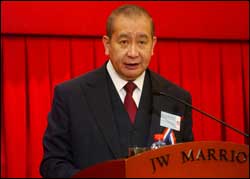 Prominent Hong Kong
banker David Li Kwok-po may step away from boardroom discussions at Dow Jones
where he is a director while the US regulatory inquiry into alleged insider
trading continues. Meanwhile, Dow Jones Friday denied media reports that Li has
been put under internal investigation regarding the leaking of sensitive
information regarding a pending bid by Rupert Murdoch's News Corporation for Dow
Jones. The New York Times reported Thursday that Dow Jones had opened an
internal review of Li, citing sources close to the investigation. "That report
is wrong. There is no internal investigation of Li," Joe Spitzer, a spokesman
for Dow Jones, told The Standard. Li, who attended the annual general meeting of
Hongkong and Shanghai Hotels (0045) Friday in his capacity as a director of the
hotel company, did not make any comment on the investigation. The Times report
also said the US Securities and Exchange Commission and the attorney general for
New York State may also question Li about the leak of confidential information
which enabled Hong Kong- based couple Charlotte Wong Leung Ka-on and her husband
Wong Kan-king to make a profit of US$8.2 million (HK$63.96 million). The focus
was on Li because of his close business relationship with Charlotte Wong's
father, Michael Leung Kai-hung. The Telegraph Friday reported that Li may offer
to absent himself from board discussions during the SEC investigation. A Dow
Jones board meeting is scheduled for next week. The Hong Kong couple bought a
total of 415,000 Dow Jones shares between April 13 and April 30 for US$15
million - about 20 percent of the daily trading turnover in Dow Jones shares -
before the buyout offer was made public on May 1. A transfer of US$3.1 million
from Leung was used to partly finance the stock purchase. The Times reported
Tuesday the SEC had accused the couple of insider trading, without indicating
how they had received information or mentioning Li. Prominent Hong Kong
banker David Li Kwok-po may step away from boardroom discussions at Dow Jones
where he is a director while the US regulatory inquiry into alleged insider
trading continues. Meanwhile, Dow Jones Friday denied media reports that Li has
been put under internal investigation regarding the leaking of sensitive
information regarding a pending bid by Rupert Murdoch's News Corporation for Dow
Jones. The New York Times reported Thursday that Dow Jones had opened an
internal review of Li, citing sources close to the investigation. "That report
is wrong. There is no internal investigation of Li," Joe Spitzer, a spokesman
for Dow Jones, told The Standard. Li, who attended the annual general meeting of
Hongkong and Shanghai Hotels (0045) Friday in his capacity as a director of the
hotel company, did not make any comment on the investigation. The Times report
also said the US Securities and Exchange Commission and the attorney general for
New York State may also question Li about the leak of confidential information
which enabled Hong Kong- based couple Charlotte Wong Leung Ka-on and her husband
Wong Kan-king to make a profit of US$8.2 million (HK$63.96 million). The focus
was on Li because of his close business relationship with Charlotte Wong's
father, Michael Leung Kai-hung. The Telegraph Friday reported that Li may offer
to absent himself from board discussions during the SEC investigation. A Dow
Jones board meeting is scheduled for next week. The Hong Kong couple bought a
total of 415,000 Dow Jones shares between April 13 and April 30 for US$15
million - about 20 percent of the daily trading turnover in Dow Jones shares -
before the buyout offer was made public on May 1. A transfer of US$3.1 million
from Leung was used to partly finance the stock purchase. The Times reported
Tuesday the SEC had accused the couple of insider trading, without indicating
how they had received information or mentioning Li.
Li Ning (2331), the mainland's
second-biggest sportswear company in terms of market share, expects sales of its
new sportswear brand Z-do to reach 1 billion yuan (HK$1.02 billion) in three to
four years.
The Peninsula Hong Kong, the
flagship property of Hongkong & Shanghai Hotels (0045), has set a new rate
record for the SAR. The Hong Kong-listed owner of the Peninsula chain,
controlled by the family of chairman Michael Kadoorie, said the average room
rate at The Peninsula Hong Kong increased by 17 percent year on year to a record
HK$3,601 in the first quarter. The hotel group did not provide figures on
revenue per available room, or RevPAR, during the quarter. "Both the March and
April average room rates broke the Peninsula Hong Kong hotel's own record and
also among Hong Kong hotels," a spokeswoman for Hongkong & Shanghai Hotels said
without giving the latest figures. The group said it benefited from several key,
citywide trade, sports and cultural events, which coincided with the peak season
for long-haul arrivals. The Peninsula Hong Kong's occupancy rate was 80 percent
in the first quarter, down slightly from 83 percent a year earlier. The hotel
performed well during the May Day Golden Week but figures were not immediately
available. Speaking after the hotel group's annual general meeting Friday,
Kadoorie said while global economic conditions improved and international travel
increased, its hotels and other properties and businesses benefited from strong
market conditions and the strength of the brand. Chief executive Clement Kwok
King-man said: "Following our good results in 2006, we have seen a continued
positive trend in occupancies, average room rates and yields across our
businesses in 2007, although the first quarter tends to be a low business season
for some of our properties." The group also invests in commercial and
residential properties around the world. Apart from Hong Kong, it owns and
operates hotels in the United States and Asia. It is also proceeding with new
projects in Shanghai and Tokyo. Shares of Hongkong & Shanghai Hotels gained 1.25
percent Friday to close at HK$12.94.
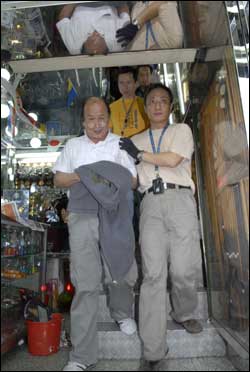 The owner of a
sports-equipment shop in Mong Kok has been sentenced to three months' jail for
possessing 800 prohibited weapons, including martial- arts accessories, without
a license. The weapo The owner of a
sports-equipment shop in Mong Kok has been sentenced to three months' jail for
possessing 800 prohibited weapons, including martial- arts accessories, without
a license. The weapo
ns seized from Lo Tong- kai's shop included crossbows,
knuckle-dusters, nunchakus and Chinese-style throwing darts, the Kwun Tong
Magistrates' Court heard. Acting-Principal Magistrate Jane Woodcock Friday
described the offense as serious, saying some of the weapons could cause serious
injuries. Lo, 73, had pleaded guilty to one count of possessing prohibited
weapons and another to dealing in arms without a license. He was given a
concurrent three- month jail term for each of the two charges. Woodcock ruled
out a suspended term, given the sheer size of the haul and its potential threat
to public safety. She also dismissed Lo's argument that the weapons were
intended for customers who would buy them for display purposes. She said some of
the weapons were very sharp and could cause serious injuries. Lo was arrested in
November when police seized weapons from his Sai Yee Street shop. Detectives had
launched an undercover operation following a tip-off the shop was selling
prohibited weapons.
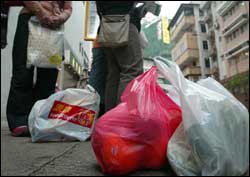 The long anticipated plastic-bag
levy may soon become a reality. Secretary for the Environment, Transport and
Works Sarah Liao Sau-tung told legislators in a panel hearing Friday the
government would propose by July a bill calling for a levy of 50 HK cents on
every plastic bag distributed by supermarkets, retail chains and convenience
stores. Liao said the proposal would be released for public consultation and
debate by legislators, who have already suggested they will support the move.
Nevertheless, she said the details of how and when the levy can be implemented
needs to be carefully addressed. Liao said later that she believed the proposed
bill would have the support of the public. She said that action was needed to
drastically reduce the use of plastic bags because the remaining three landfills
in the territory would reach capacity in six to 10 years. Wet markets and small
retailers will be exempted at the beginning. Green Student Council chairman
Angus Ho Hon-wai said the government should start with supermarkets and
convenience stores before pushing the levy onto other retailers.
The long anticipated plastic-bag
levy may soon become a reality. Secretary for the Environment, Transport and
Works Sarah Liao Sau-tung told legislators in a panel hearing Friday the
government would propose by July a bill calling for a levy of 50 HK cents on
every plastic bag distributed by supermarkets, retail chains and convenience
stores. Liao said the proposal would be released for public consultation and
debate by legislators, who have already suggested they will support the move.
Nevertheless, she said the details of how and when the levy can be implemented
needs to be carefully addressed. Liao said later that she believed the proposed
bill would have the support of the public. She said that action was needed to
drastically reduce the use of plastic bags because the remaining three landfills
in the territory would reach capacity in six to 10 years. Wet markets and small
retailers will be exempted at the beginning. Green Student Council chairman
Angus Ho Hon-wai said the government should start with supermarkets and
convenience stores before pushing the levy onto other retailers.
Swire
Properties, the real-estate arm of conglomerate Swire Pacific (0019), is hoping
the revamp of one of its anchor retail tenants and Hong Kong's love affair with
all things Japanese will drum up more business at its flagship shopping mall,
Cityplaza, in Tai Koo.
The central government has allowed
mainland investors for the first time to buy overseas equities through
commercial banks. The long-awaited move will provide a significant boost to the
Hong Kong stock market as the local bourse appears to be the sole beneficiary in
the short term.
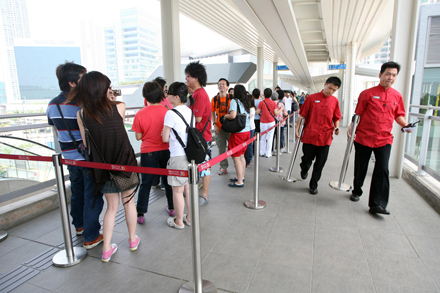 Passengers
queue at the Tung Chung terminal of the Ngong Ping 360 cable car yesterday,
forced to wait when a fault suspended operations for two hours. Staff were
alerted to the problem at 11.06am when an alarm sounded, indicating a rope used
to pull the cabins might be out of place. Service resumed briefly at 11.41am to
allow stranded passengers to finish their journey, after which staff carried out
system checks and inspections. Passengers
queue at the Tung Chung terminal of the Ngong Ping 360 cable car yesterday,
forced to wait when a fault suspended operations for two hours. Staff were
alerted to the problem at 11.06am when an alarm sounded, indicating a rope used
to pull the cabins might be out of place. Service resumed briefly at 11.41am to
allow stranded passengers to finish their journey, after which staff carried out
system checks and inspections.
 China: China's
State Council, or the cabinet, in principle, approved the country's 11th
five-year plan on space development at a conference on Thursday. Addressing the
conference, Chinese Vice Premier Zeng Peiyan stressed that the 11th five-year
period (2006-2010) is key to China's space development. China should give
priority to a manned space flight, lunar exploration, new launch vehicle,
high-resolution earth observation, he said. Zeng said that China should promote
industrialization of space technologies and attach great importance to the
development of telecommunication, navigation and remote sensing satellites.
Space technologies should support and push China's economy and provide stable,
continuous and high-quality services for telecommunication, weather forecasting
and maritime investigation, among others, he said. Zeng stressed that China
should also encourage non-governmental investment in the space sector.
China: China's
State Council, or the cabinet, in principle, approved the country's 11th
five-year plan on space development at a conference on Thursday. Addressing the
conference, Chinese Vice Premier Zeng Peiyan stressed that the 11th five-year
period (2006-2010) is key to China's space development. China should give
priority to a manned space flight, lunar exploration, new launch vehicle,
high-resolution earth observation, he said. Zeng said that China should promote
industrialization of space technologies and attach great importance to the
development of telecommunication, navigation and remote sensing satellites.
Space technologies should support and push China's economy and provide stable,
continuous and high-quality services for telecommunication, weather forecasting
and maritime investigation, among others, he said. Zeng stressed that China
should also encourage non-governmental investment in the space sector.
 Kindergarteners learn to
wash the feet for their moms and dads as a way to express their gratitude
towards their parents on the eve of the Mother's Day in Hangzhou, east China's
Zhejiang Province May 11, 2007. Saturday is the 100th Mother's Day.
Kindergarteners learn to
wash the feet for their moms and dads as a way to express their gratitude
towards their parents on the eve of the Mother's Day in Hangzhou, east China's
Zhejiang Province May 11, 2007. Saturday is the 100th Mother's Day.
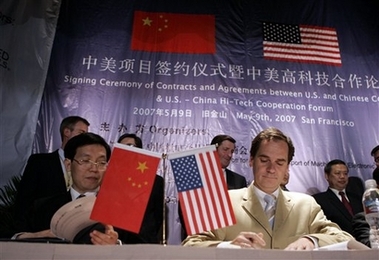 Hewlett Packard Company chief sales
officer Andy Mattes, right, and Wan Shou Gu, left, from a Chinese company, sign
papers of agreement in San Francisco, Wednesday, May 9, 2007 during a formal
signing ceremony between US and Chinese companies. The April trade gap of $16.88
billion was below February's $23.7 billion - the second-highest level on record
- but in line with steady increases in monthly trade surpluses over the past
year. Chinese and US trade envoys are due to meet May 23-24 in Washington for
talks on Beijing's surpluses and other contentious issues. Some US lawmakers are
pushing for punitive tariffs on imports of Chinese goods. Washington is hoping
the "strategic economic dialogue," led by Treasury Secretary Henry Paulson and
Chinese Vice Premier Wu Yi, helps to mollify critics and avert disruption in
trade ties. Chinese President Hu Jintao expressed hopes for "positive progress"
in a phone call with President Bush. The Chinese government say it is not
actively pursuing such large surpluses and has taken steps to rein in exports.
Beijing also is trying to reduce reliance on exports by encouraging more
domestic consumer spending, which could boost imports and narrow the trade gap.
But an official campaign under way to cool off an economic boom has cut imports
of factory equipment and other goods while foreign demand for low-cost Chinese
products has surged ahead.
Hewlett Packard Company chief sales
officer Andy Mattes, right, and Wan Shou Gu, left, from a Chinese company, sign
papers of agreement in San Francisco, Wednesday, May 9, 2007 during a formal
signing ceremony between US and Chinese companies. The April trade gap of $16.88
billion was below February's $23.7 billion - the second-highest level on record
- but in line with steady increases in monthly trade surpluses over the past
year. Chinese and US trade envoys are due to meet May 23-24 in Washington for
talks on Beijing's surpluses and other contentious issues. Some US lawmakers are
pushing for punitive tariffs on imports of Chinese goods. Washington is hoping
the "strategic economic dialogue," led by Treasury Secretary Henry Paulson and
Chinese Vice Premier Wu Yi, helps to mollify critics and avert disruption in
trade ties. Chinese President Hu Jintao expressed hopes for "positive progress"
in a phone call with President Bush. The Chinese government say it is not
actively pursuing such large surpluses and has taken steps to rein in exports.
Beijing also is trying to reduce reliance on exports by encouraging more
domestic consumer spending, which could boost imports and narrow the trade gap.
But an official campaign under way to cool off an economic boom has cut imports
of factory equipment and other goods while foreign demand for low-cost Chinese
products has surged ahead.
 Chinese women's national soccer
team player Qu Feifei (M) displays her skills during a visit to Zhengjiang
University of Technology of East China May 10, 2007.
Chinese women's national soccer
team player Qu Feifei (M) displays her skills during a visit to Zhengjiang
University of Technology of East China May 10, 2007.
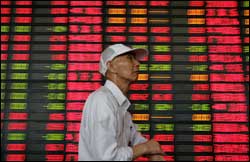 China will allow commercial banks
and funds to buy overseas stocks in an effort to encourage more fund outflow and
ease the excess liquidity which has sent the domestic stock market to new highs.
Economists and analysts said the move would have a spillover effect onto the
H-share market and help ease upward pressure on the yuan, despite the fact that
the total amount allowed for investment under the Qualified Domestic
Institutional Investors scheme currently stands at only US$14.2 billion
(HK$110.76 billion). On Friday, the China Banking Regulatory Commission unveiled
its long- awaited plan to widen the investment scope of the QDII scheme to also
cover equities and structured products. The plan is effective immediately. "It
is definitely positive for the Hong Kong market because it means you have new
source of money for the Hong Kong bourse. "I think H shares will be the bigger
beneficiaries, especially those with complementary A shares, as many of those
are trading at a big discount to their A-share counterparts," said Lillian Co,
head of Hong Kong China equity at Baring Asset Management (Asia). "There will
certainly be some money flowing out from the A-share market to overseas stocks,
and Hong Kong H shares will benefit most," said Jun Ma, chief China economist at
Deutsche Bank. He estimates about US$10 billion will flow out of China over the
next 12 months, but the impact on the A-share market will be mild. "There will
be a
China will allow commercial banks
and funds to buy overseas stocks in an effort to encourage more fund outflow and
ease the excess liquidity which has sent the domestic stock market to new highs.
Economists and analysts said the move would have a spillover effect onto the
H-share market and help ease upward pressure on the yuan, despite the fact that
the total amount allowed for investment under the Qualified Domestic
Institutional Investors scheme currently stands at only US$14.2 billion
(HK$110.76 billion). On Friday, the China Banking Regulatory Commission unveiled
its long- awaited plan to widen the investment scope of the QDII scheme to also
cover equities and structured products. The plan is effective immediately. "It
is definitely positive for the Hong Kong market because it means you have new
source of money for the Hong Kong bourse. "I think H shares will be the bigger
beneficiaries, especially those with complementary A shares, as many of those
are trading at a big discount to their A-share counterparts," said Lillian Co,
head of Hong Kong China equity at Baring Asset Management (Asia). "There will
certainly be some money flowing out from the A-share market to overseas stocks,
and Hong Kong H shares will benefit most," said Jun Ma, chief China economist at
Deutsche Bank. He estimates about US$10 billion will flow out of China over the
next 12 months, but the impact on the A-share market will be mild. "There will
be a
cooling effect but not a crash," he said.
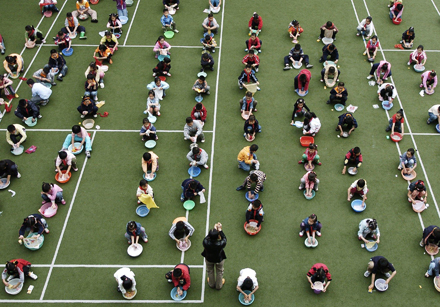 Pupils at a
primary school in Jinan, Shandong province, hunker down over wash bowls in the
playground as they learn how to wash their own clothes. The activity was aimed
at helping the youngsters ease their mums' burden on Mother's Day, to be
celebrated tomorrow. Pupils at a
primary school in Jinan, Shandong province, hunker down over wash bowls in the
playground as they learn how to wash their own clothes. The activity was aimed
at helping the youngsters ease their mums' burden on Mother's Day, to be
celebrated tomorrow.
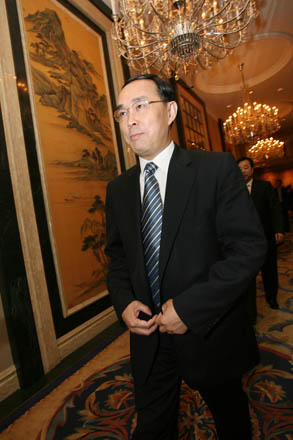 China Unicom's income would be
affected by the scrapping of charges on incoming calls, said chairman Chang
Xiaobing. Mr Chang said the company hoped volume would increase to offset the
impact of the new call-party-pays billing rules, and the reduction of roaming
fees.
China Unicom's income would be
affected by the scrapping of charges on incoming calls, said chairman Chang
Xiaobing. Mr Chang said the company hoped volume would increase to offset the
impact of the new call-party-pays billing rules, and the reduction of roaming
fees.
Foreign investors who have been
tapping mainland A-share markets through qualified funds are starting to cash
out or demanding more generous discounts. This was despite monthly returns in
April hitting a high for the year, underscoring growing concern that frenzied
mainland investors have pushed up stock values to dangerous levels.
Eastday.com is preparing for an
initial public offering in Shanghai early next year that will make it the first
online news provider to sell shares on the domestic stock market. Sources said
Shanghai's government, which owns the website through several units, agreed in
principle at an internal meeting on April 30 to allow the company to list, as
part of the central government's plan to boost the media industry before the
2008 Olympic Games. Launched in 2000 and operated by the Shanghai government's
news office, Eastday held its first listing preparation meeting last Thursday to
seek the advice of potential financial advisers. Shanghai Oriental, which
operates the city's landmark Oriental Pearl TV Tower, has invested 72 million
yuan for a 12 per cent stake in Eastday. It will remain its biggest shareholder
following the public offering. Eastday also counts several Shanghai television
and radio stations among its major shareholders. The mainland's media industry
is highly regulated by the Communist Party and few media companies have floated
shares at home or overseas - in part because of the fear that public listing may
decrease government control in the sector. But the iron grip appears the have
loosened recently. Last month, Shanghai Communist Party publishing unit Jiefang
Daily sold its advertising and distribution operations to Xinhua Media, a book
publisher listed on the A-share market in a two billion yuan back-door listing.
The publisher of the 21st Century Business Herald financial newspaper, 21st
Century Media, which is part-owned by the Communist Party's Nanfang Daily
newspaper, was also planning a flotation on the share market this year to fund
expansion, sources said earlier. "Many new media companies, such as Sina and
Focus Media, are already listed on the stock exchange. This provides financial
strength for future development - funding mergers and acquisitions, and talent
acquisition for growth," Morgan Stanley analyst Richard Ji said. "Moreover,
getting listed will help them improve transparency, corporate governance and
financial performance." Media regulators in Beijing have picked Eastday,
People.com, website of the People's Daily, and Xinhuanet.com, the online version
of the Xinhua News Agency, as three pilot portals that the government is
considering for possible public listing. Eastday contained less potentially
sensitive content, such as political news and opinion, than the other two, which
were more closely connected to the State Council, the source added. "We believe
that 2007 will mark the year Chinese media groups tapped into the capital
market. Strong media companies can use the capital to grow, breaking the
regional barrier and form national groups," Haitong Securities analyst Yip
Lingfei said.
May 14, 2007
 Hong Kong:
Hong Kong's position as a gateway through which developing provinces in
southwestern China can reach the world will receive a boost in 2009 when an
electronic system to speed up border customs clearance is in place. Announcing
the schedule at the opening of the Pan-Pearl River Delta Customs Forum Thursday,
Chief Executive Donald Tsang Yam-kuen said Hong Kong customs is now going full
speed to develop an electronic manifestation system to ease the traffic of goods
at the border. Tsang said although the SAR and provinces are making electronic
platforms of their own, they are being developed with a view to interfacing with
each other. Hong Kong customs commissioner Timothy Tong Hin-ming said the
current system is too slow to meet future growth in cross-border traffic, adding
a pilot scheme will be launched soon whereby preregistered trucks will go
through simplified checks. In 2006, trade between Hong Kong and the Pan-Pearl
River Delta provinces leaped 24.9 percent to US$121.5 billion (HK$947.7
billion). The provinces' imports and exports through Hong Kong increased 16.1
percent to US$246.1 billion (HK$1.92 trillion) for the same year. Tsang said the
SAR, as a developed international financial center, could bridge the developing
hinterland provinces with the rest of the world. Mainland customs chief Mou
Xinsheng said national authorities will work closely with Hong Kong and Macau to
stamp out smuggling as customs checks at the border are simplified. Participants
at the forum will sign an agreement today to strengthen cooperation on the
movement of goods within the Pan-Pearl River Delta region. The forum was held
ahead of the impending opening of facilities shared by Hong Kong and mainland
customs at Shenzhen Bay Port, part of the Hong Kong-Shenzhen Western Corridor.
Work on the corridor, the first cross- border infrastructure between Hong Kong
and the mainland to share one- stop customs and immigration clearance, started
in 2003. The new link will reduce traveling time from Shekou to the territory's
Route 3 to about 20 minutes. It was originally planned to be open last year, but
was delayed because of construction delays on the Shenzhen side and legal
disputes over the application of Hong Kong laws in the mainland. Hong Kong:
Hong Kong's position as a gateway through which developing provinces in
southwestern China can reach the world will receive a boost in 2009 when an
electronic system to speed up border customs clearance is in place. Announcing
the schedule at the opening of the Pan-Pearl River Delta Customs Forum Thursday,
Chief Executive Donald Tsang Yam-kuen said Hong Kong customs is now going full
speed to develop an electronic manifestation system to ease the traffic of goods
at the border. Tsang said although the SAR and provinces are making electronic
platforms of their own, they are being developed with a view to interfacing with
each other. Hong Kong customs commissioner Timothy Tong Hin-ming said the
current system is too slow to meet future growth in cross-border traffic, adding
a pilot scheme will be launched soon whereby preregistered trucks will go
through simplified checks. In 2006, trade between Hong Kong and the Pan-Pearl
River Delta provinces leaped 24.9 percent to US$121.5 billion (HK$947.7
billion). The provinces' imports and exports through Hong Kong increased 16.1
percent to US$246.1 billion (HK$1.92 trillion) for the same year. Tsang said the
SAR, as a developed international financial center, could bridge the developing
hinterland provinces with the rest of the world. Mainland customs chief Mou
Xinsheng said national authorities will work closely with Hong Kong and Macau to
stamp out smuggling as customs checks at the border are simplified. Participants
at the forum will sign an agreement today to strengthen cooperation on the
movement of goods within the Pan-Pearl River Delta region. The forum was held
ahead of the impending opening of facilities shared by Hong Kong and mainland
customs at Shenzhen Bay Port, part of the Hong Kong-Shenzhen Western Corridor.
Work on the corridor, the first cross- border infrastructure between Hong Kong
and the mainland to share one- stop customs and immigration clearance, started
in 2003. The new link will reduce traveling time from Shekou to the territory's
Route 3 to about 20 minutes. It was originally planned to be open last year, but
was delayed because of construction delays on the Shenzhen side and legal
disputes over the application of Hong Kong laws in the mainland.
Shangri-La Asia (0069), the region's biggest luxury hotel operator, has agreed
to invest for the first time in the US hotel market, committing to a project on
New York's Park Avenue. The company will manage and take a 26 percent stake in
the 206-room hotel to be named Shangri-La, New York, Elizabeth Demotte, a
spokeswoman for the Hong Kong-based company, said in an interview Thursday. The
hotel, scheduled to open in 2010, will cost between US$500 million (HK$3.9
billion) and US$550 million to build including buying the land, she said.
Shangri-La, controlled by Robert Kuok Hock-nien, is expanding beyond its home
market in Asia into North America, where it manages five hotels, and Europe. US
business travel will grow about 1 to 2 percent in 2007, according to the Travel
Industry Association. "Having a presence in a first-tier city in the West is
important," said Ken Yeung, a Hong Kong-based analyst at BOCI Securities. "Right
now they may not be too familiar with the market there, but I'd expect them to
take a bigger share in projects in Europe and North America in the future." The
project will be financed by shareholder equity and debt, Demotte said. RFR
Holding, a New York-based investment company and a client of ING Clarion
Partners that was not identified, are the other investors in the project,
according to a press release. Shangri-La manages hotels in Chicago, Miami,
Toronto, Vancouver and Las Vegas. Worldwide, Shangri- La has stakes in 37 hotels
with 19,385 rooms, the company said. Shares of Shangri-La rose 3.2 percent to
end Thursday at HK$21. The stock has gained 4.7 percent this year, compared with
a 3.9 percent increase in the benchmark Hang Seng Index. The group, which
manages 50 hotels, said in March that 2006 profit climbed to US$202.2 million
from US$151 million a year earlier, mainly because occupancy rates improved and
it charged more for rooms.
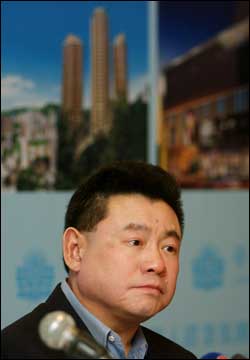 Financial wizard Joseph Lau Luen-hung
is said to be contemplating an estimated HK$16 billion privatization bid for
Chinese Estates Holdings (0127), a property investment and development company
he controls along with his younger brother. Analysts believe Lau's intention is
to fully reflect the hidden value of the company's redevelopment projects. The
firm also invests in securities and treasury products. The privatization move
marks the group's third buyout plan in six years. In 2005, the mid-sized
developer took its unit, Kwong Sang Hong International, private following the
privatization of Evergo China Holdings in late 2001. Capitalizing on the recent
stock market rally and robust luxury housing market, Lau and younger brother
Thomas Lau Luen-hung personally have enough financial strength to buy out shares
they do not already own in Chinese Estates, analysts said. The possible buyout
offer announcement came after Chinese Estates shares jumped 3.7 percent Thursday
morning to HK$11.72 - a record high since the stock's listing in 1983. Joseph
Lau is chairman and the largest shareholder of Chinese Estates with a 47 percent
stake, followed by British-based hedge fund The Children's Investment Fund
Management, which holds 7.9 percent, and then Thomas Lau with 6.6 percent.
Chinese Estates' market capitalization exceeds HK$25.54 billion.
Financial wizard Joseph Lau Luen-hung
is said to be contemplating an estimated HK$16 billion privatization bid for
Chinese Estates Holdings (0127), a property investment and development company
he controls along with his younger brother. Analysts believe Lau's intention is
to fully reflect the hidden value of the company's redevelopment projects. The
firm also invests in securities and treasury products. The privatization move
marks the group's third buyout plan in six years. In 2005, the mid-sized
developer took its unit, Kwong Sang Hong International, private following the
privatization of Evergo China Holdings in late 2001. Capitalizing on the recent
stock market rally and robust luxury housing market, Lau and younger brother
Thomas Lau Luen-hung personally have enough financial strength to buy out shares
they do not already own in Chinese Estates, analysts said. The possible buyout
offer announcement came after Chinese Estates shares jumped 3.7 percent Thursday
morning to HK$11.72 - a record high since the stock's listing in 1983. Joseph
Lau is chairman and the largest shareholder of Chinese Estates with a 47 percent
stake, followed by British-based hedge fund The Children's Investment Fund
Management, which holds 7.9 percent, and then Thomas Lau with 6.6 percent.
Chinese Estates' market capitalization exceeds HK$25.54 billion.
Hutchison
Whampoa (0013) patriarch Li Ka-shing has made a personal investment in
technology startup Joost, which delivers broadcast-quality television over the
Internet, and plans to work with the company to expand distribution in China and
the rest of Asia.
Hongkong
Electric Holdings (0006), controlled by Li Ka-shing, expects 30 percent of total
electricity supply can be generated from gas sources by upgrading existing
plants, with the aim of meeting the government's targets of emissions reduction.
A former
nurse of electronics tycoon Wong Wha- san left the High Court Thursday with her
title to Wong's multi-million-dollar bequest upheld after the industrialist's
children abruptly halted a legal battle to recover the wealth.
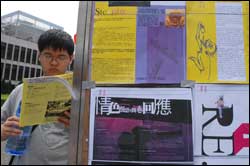 A Chinese University
disciplinary committee said Thursday sex-related pages in its student newspaper
were causing unease and concern, but the paper's editorial board remained
defiant. The Television and Entertainment Licensing Authority said it had
received 26 complaints from the public since the controversy surfaced Monday and
that issues of the journal Student Press had been sent to the Obscene Articles
Tribunal for examination. However, the university committee comprising a student
and four teachers said the publication had damaged the reputation of the
university. "Material published in recent issues [since December] is way beyond
the commonly accepted standards of the community," the committee said. In a
stern warning, the university also demanded the board stop publishing or
distributing offensive material. A Chinese University
disciplinary committee said Thursday sex-related pages in its student newspaper
were causing unease and concern, but the paper's editorial board remained
defiant. The Television and Entertainment Licensing Authority said it had
received 26 complaints from the public since the controversy surfaced Monday and
that issues of the journal Student Press had been sent to the Obscene Articles
Tribunal for examination. However, the university committee comprising a student
and four teachers said the publication had damaged the reputation of the
university. "Material published in recent issues [since December] is way beyond
the commonly accepted standards of the community," the committee said. In a
stern warning, the university also demanded the board stop publishing or
distributing offensive material.
Asia was unlikely to suffer another
financial crisis like that in 1997-98, former United States Federal Reserve
chief Alan Greenspan said on Friday, but he warned that America faced a "two to
one" chance of falling into a recession.
The government planned to put a levy
on plastic shopping bags, Secretary for Environment, Transport and Works Sarah
Liao Sau-tung said on Friday.
 Le Le and Ying Ying are realizing
there is more to life than bamboo. Fans of the cuddly pair can simply check the
pandas' blog to find out what the twosome have been up to since their move last
month to Ocean Park
Le Le and Ying Ying are realizing
there is more to life than bamboo. Fans of the cuddly pair can simply check the
pandas' blog to find out what the twosome have been up to since their move last
month to Ocean Park
 China: Commander-in-Chief
of the U.S. Pacific Command Timothy Keating arrived in Beijing on Thursday
afternoon for his first China visit since taking office. During his stay in
Beijing, Keating will meet with senior Chinese generals and officials, including
Guo Boxiong, vice chairman of the Central Military Commission, China's top
military institution. The five-day visit will also take Keating to Nanjing,
capital of East China's Jiangsu Province where Keating is scheduled to visit
military institutions and bases. Also on Thursday, a delegation from the U.S.
National Defense University Capstone Program, headed by retired general William
Nyland, visited Beijing and met with Deputy Chief of General Staff of the
Chinese People's Liberation Army Zhang Li. The 19-member delegation will also
tour Chongqing in southwest China and Nanchang in east China. Keating took the
helm of the U.S. forces in the Pacific in late March, replacing William Fallon.
In late March, Chairman of the U.S. Joint Chiefs of Staff Peter Pace paid his
first visit to China since being sworn in as Chairman of the Joint Chiefs of
Staff in 2005.
China: Commander-in-Chief
of the U.S. Pacific Command Timothy Keating arrived in Beijing on Thursday
afternoon for his first China visit since taking office. During his stay in
Beijing, Keating will meet with senior Chinese generals and officials, including
Guo Boxiong, vice chairman of the Central Military Commission, China's top
military institution. The five-day visit will also take Keating to Nanjing,
capital of East China's Jiangsu Province where Keating is scheduled to visit
military institutions and bases. Also on Thursday, a delegation from the U.S.
National Defense University Capstone Program, headed by retired general William
Nyland, visited Beijing and met with Deputy Chief of General Staff of the
Chinese People's Liberation Army Zhang Li. The 19-member delegation will also
tour Chongqing in southwest China and Nanchang in east China. Keating took the
helm of the U.S. forces in the Pacific in late March, replacing William Fallon.
In late March, Chairman of the U.S. Joint Chiefs of Staff Peter Pace paid his
first visit to China since being sworn in as Chairman of the Joint Chiefs of
Staff in 2005.
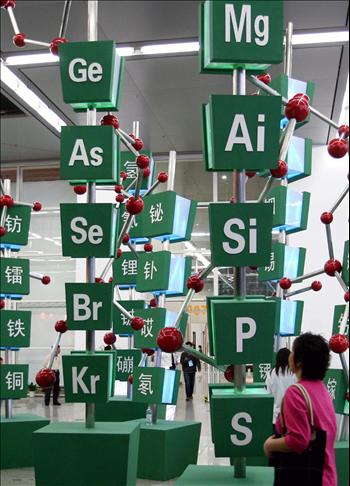 A visitor watches statues featuring periodic table of
chemical elements at the 2007 Shanghai International Science and Arts
Exhibition, May 10, 2007. More than 70 works from eleven countries will be shown
at the exhibition that opened on Thursday.
A visitor watches statues featuring periodic table of
chemical elements at the 2007 Shanghai International Science and Arts
Exhibition, May 10, 2007. More than 70 works from eleven countries will be shown
at the exhibition that opened on Thursday.
China would send an engineering unit of 275 members to
Darfur in Sudan "in the near future" to participate in a UN support plan for the
African Union (AU) peace-keeping mission in the region.
The growth of loans for housing purchases accelerated in
the first quarter, according to the monetary policy report released by the
People Bank of China in Beijing on Thursday.
China's two major steel producers, BaoSteel in Shanghai
and the Handan Iron and Steel Group Co Ltd in north China's Hebei Province, have
signed a contract to build a joint venture iron and steel plant in Handan.
China central bank said yesterday that the country will
not sell large amounts of US dollar-denominated assets to diversify its foreign
exchange reserves. The People's Bank of China also warned of a risk of rising
inflation and a rebound in investment as the economy steamed ahead in the first
quarter, growing by 11.1 percent year on year. Authorities have said the country
will diversify part of its foreign exchange reserves, which amounted to $1.02
trillion by the end of March and are believed to be invested mainly in dollar
bonds. The central bank said it will mainly address the issue of newly added
reserves by widening the foreign currency investment channel and reaffirmed the
importance of its US dollar-denominated assets. They will remain an important
part of China's outbound investment, the bank said in its monetary policy report
for the first quarter, which was published on its website yesterday.
Li Jinhua, China's top auditor, outlined five problems
that drain stated-owned assets, according to a report from Chinanews.com. He
says some Stated-owned enterprises are in collusion with other companies and
sell stated-owned assets without going through relevant legal procedures.
Another issue is that some businesses take their high-quality stated-owned
assets and transfer them into auxiliary companies, in which the executives of
the major business units have or control the stakes. The third problem outlined
in the report says leaders of some highly-profitable stated-owned enterprises
give profitable businesses to their friends and relatives through subcontracts.
Li adds some businesses unfairly distribute profits or waste money through
extravagant spending. And finally, there is a drain of some non-economical
stated-owned assets, including money losses in construction of office buildings
of the government and other institutional units and their training bases.
Despite cooling measures, in the year's first quarter real
estate investment increased 26.9 percent year-on-year, while housing prices
continuously rose, although by smaller margins, according to Zhang Qi, deputy
director of the Institute of Economic and Resource Management, Beijing Normal
University. There are a number of factors contributing to this. First, rapid
economic growth created a favorable climate for increased real estate
investment. Second, large amounts of capital entered the real estate market
because of the favorable macroeconomic climate and positive economic results
enjoyed by enterprises. This drove up land property investment. Third, the
wait-and-see attitude of the local governments poses a stumbling block to the
implementation of the central government's macroeconomic readjustment policy.
For example, some local governments are foot dragging in carrying out the
central government's policy that small-area apartments (90 square meters or
less) make up 80 percent of the total. Furthermore, some local governments
prefer to do nothing to reign in runaway housing prices in the absence of
administrative pressure from above. This is because rises in real estate prices
mean increases in local revenue. Fourth, construction of low-price housing
trails demand so low-rent apartments are short of supply. Fifth, speculation in
the real estate sector goes largely unchecked. Among other factors, this
explains much of why housing prices could not significantly decrease. Interest
rates and bank reserve ratios have been raised steadily over the last couple of
years to increase the costs of real estate investment and speculation to a
certain extent. However, these cost increases pale beside the fat profits reaped
from the housing price hike. In fact, it is investment and speculation that
power the rise of housing prices. So, rooting out speculative activities in the
real estate market provides the right prescription for controlling runaway
prices. The increase in real estate markets in the second quarter will fluctuate
between 24 percent and 26 percent, by my estimate. The growth usually slows in
the second quarter of a year.
China will face labor shortage in 2009, says a report
issued yesterday by the Institute of Population and Labor Economics under the
Chinese Academy of Social Sciences, the Beijing Times reported. The shortage
will trigger the growth of wages for rural laborers, the report said. Currently
China only has a 52.12 million surplus in rural labor under 40 years-old, far
lower than other media reports which estimated the number to be around 100 to
150 million, said Cai Fang, director of the institute. In recent years, China's
labor force supply has changed from a time of excessive supply to a state of
demand-and-supply balance and soon to enter an era of labor shortage in the near
future. The current labor shortage is starting from the coastal areas and
spreading to central regions of China, where most of the labor force comes from.
Cai delivered a speech with the theme of China Employment Growth and Structure
Change at the 30th anniversary of the academy yesterday. China's labor shortage
also can be blamed on an aging population, an earlier report said. In the past
25 years, China's economy maintained high growth thanks to sufficient numbers of
young and middle-aged workers. But today, China's aging population has reached
the world's average level, while per capita GDP is one fifth of the world
average.
The Council Office has announced its first five-year plan
on biotech industry. The aim is to achieve a goal of 500 billion yuan (US$65
billion) in 2010, and 2 trillion yuan by 2020. In the five-year plan of the
biotech industry, the focus area will be biomedicine, bio-agriculture,
bio-energy and bio-manufacturing, according to the Shanghai Securities News. To
reach this high goals, the plan has four detailed objectives. The first is to
initially form a supporting system to help developthe biotech industry. The
second is to enhance innovation. The next objective is to optimize and upgrade
the industry¡¯s structure. And finallyto expand the the biotech industry output.
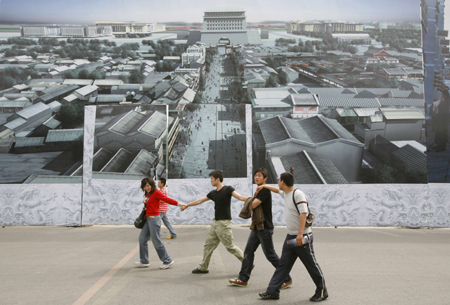 Young people walk in front of a huge picture of a city planning project at a
construction site in Beijing May 11, 2007. China's central bank vowed on
Thursday to use open market operations and higher bank reserve requirements to
mop up excess liquidity and prevent the world's fourth-largest economy from
overheating.
Young people walk in front of a huge picture of a city planning project at a
construction site in Beijing May 11, 2007. China's central bank vowed on
Thursday to use open market operations and higher bank reserve requirements to
mop up excess liquidity and prevent the world's fourth-largest economy from
overheating.
Singapore Airlines, the world's
biggest airline by stock market value, has started to negotiate the price of a
share sale from China Eastern Airlines (0670), the third-largest mainland
carrier, after talks between the two carriers had been confirmed last July.
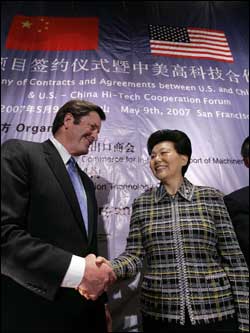 A delegation of mainland business leaders has promised to
buy US$4.3 billion (HK$33.54 billion) in US technology, hoping to soften a
political backlash to the massive trade imbalance dividing the two economic
powers. The agreements were trumpeted at a ceremony in San Francisco Wednesday,
two weeks before government talks in Washington where leaders will try to tackle
the United States' US$232 billion trade deficit with China and other prickly
issues. California Lieutenant Governor John Garamendi hailed the 27 contracts
signed as an "important step in furthering the deep relationship between this
state, this country and China." But the event's timing spurred skepticism about
the sincerity of China's efforts to narrow a trade gap that has tormented the
United States for years. "They are not going to change their ways. This is all
part of a political smoke screen," said Peter Morici, a business professor at
the University of Maryland and the former chief economist for the US
International Trade Commission. To underscore China's resolve to explore more US
investments, executives from more than 200 mainland companies are meeting their
US counterparts in 24 cities across 23 states, Vice Minister of Commerce Ma
Xiuhong said. In its first stop, just north of Silicon Valley's high-tech
heartland, the mainland party primarily sealed deals with computer software,
semiconductor and telecommunications companies. The beneficiaries included
high-tech bellwethers Microsoft, Oracle, Cisco Systems and Hewlett-Packard.
China has become an increasingly attractive market for makers of high- tech gear
as its rapid economic growth feeds the demand for more powerful computers and
more sophisticated mobile phones. China's previous shopping sprees in the United
States have had little impact because of perceptions that mainland companies
were merely bundling together deals that were going to be made anyway, said
Nicholas Lardy, a China expert at the Peterson Institute for International
Economics in Washington.
A delegation of mainland business leaders has promised to
buy US$4.3 billion (HK$33.54 billion) in US technology, hoping to soften a
political backlash to the massive trade imbalance dividing the two economic
powers. The agreements were trumpeted at a ceremony in San Francisco Wednesday,
two weeks before government talks in Washington where leaders will try to tackle
the United States' US$232 billion trade deficit with China and other prickly
issues. California Lieutenant Governor John Garamendi hailed the 27 contracts
signed as an "important step in furthering the deep relationship between this
state, this country and China." But the event's timing spurred skepticism about
the sincerity of China's efforts to narrow a trade gap that has tormented the
United States for years. "They are not going to change their ways. This is all
part of a political smoke screen," said Peter Morici, a business professor at
the University of Maryland and the former chief economist for the US
International Trade Commission. To underscore China's resolve to explore more US
investments, executives from more than 200 mainland companies are meeting their
US counterparts in 24 cities across 23 states, Vice Minister of Commerce Ma
Xiuhong said. In its first stop, just north of Silicon Valley's high-tech
heartland, the mainland party primarily sealed deals with computer software,
semiconductor and telecommunications companies. The beneficiaries included
high-tech bellwethers Microsoft, Oracle, Cisco Systems and Hewlett-Packard.
China has become an increasingly attractive market for makers of high- tech gear
as its rapid economic growth feeds the demand for more powerful computers and
more sophisticated mobile phones. China's previous shopping sprees in the United
States have had little impact because of perceptions that mainland companies
were merely bundling together deals that were going to be made anyway, said
Nicholas Lardy, a China expert at the Peterson Institute for International
Economics in Washington.
May 12 - 13, 2007
 Hong Kong:
Standard Chartered Bank (2888) aims to double client revenue from wholesale
banking in Greater China between this year and 2011, and also plans to be one of
the top three banks foreign banks in the mainland within the next four years, an
executive said. Andrew Bester, regional head of wholesale banking client
relationships in Greater China and Japan at Standard Chartered, said Wednesday
client revenue from Greater China surged 39 percent last year. Among all
wholesale banking operations across the world, the biggest growth - 80 percent -
was in the mainland, he said, without giving comparative figures. In the last
three years, revenue and profit from the China division grew at a compound
annual rate of more than 50 percent, while client revenue and profit almost
doubled, Bester said. Profit at the Hong Kong unit of the wholesale banking
operation surged 84 percent to a record US$350 million (HK$2.73 billion) last
year, with client income rising 28 percent. "I would attribute the strong result
to successful implementation of our client-led strategy," said Gloria Chow Lee
Cheuk-kuen, head of wholesale banking client relationships in Hong Kong. The
wholesale banking unit provides services such as trade finance, cash management,
lending, securities services, and foreign exchange for corporate and
institutional clients. Chow said StanChart plans to add 10 percent more staff to
its 1,100-strong Hong Kong wholesale banking team this year. The bank's
wholesale banking income worldwide grew 28 percent to US$3.92 billion last year.
Client income increased 23 percent while pre-tax profit jumped 28 percent. Hong
Kong generates the largest slice of wholesale banking revenue, followed by
India, Singapore, Korea, Dubai and China. Hong Kong:
Standard Chartered Bank (2888) aims to double client revenue from wholesale
banking in Greater China between this year and 2011, and also plans to be one of
the top three banks foreign banks in the mainland within the next four years, an
executive said. Andrew Bester, regional head of wholesale banking client
relationships in Greater China and Japan at Standard Chartered, said Wednesday
client revenue from Greater China surged 39 percent last year. Among all
wholesale banking operations across the world, the biggest growth - 80 percent -
was in the mainland, he said, without giving comparative figures. In the last
three years, revenue and profit from the China division grew at a compound
annual rate of more than 50 percent, while client revenue and profit almost
doubled, Bester said. Profit at the Hong Kong unit of the wholesale banking
operation surged 84 percent to a record US$350 million (HK$2.73 billion) last
year, with client income rising 28 percent. "I would attribute the strong result
to successful implementation of our client-led strategy," said Gloria Chow Lee
Cheuk-kuen, head of wholesale banking client relationships in Hong Kong. The
wholesale banking unit provides services such as trade finance, cash management,
lending, securities services, and foreign exchange for corporate and
institutional clients. Chow said StanChart plans to add 10 percent more staff to
its 1,100-strong Hong Kong wholesale banking team this year. The bank's
wholesale banking income worldwide grew 28 percent to US$3.92 billion last year.
Client income increased 23 percent while pre-tax profit jumped 28 percent. Hong
Kong generates the largest slice of wholesale banking revenue, followed by
India, Singapore, Korea, Dubai and China.
After months of waiting, seeking
approvals from Indian government departments, and facing the specter of lawsuits
from its Indian joint-venture partner, Hutchison Telecommunications
International Ltd (2332) has finally completed the sale to Vodafone of its 67
percent stake in Indian mobile operator Hutchison Essar.
CITIC Resources (1205), the
commodity and energy investment arm of state-owned CITIC Group, said it will
acquire an oil asset in Kazakhstan and an oil field in Bohai Bay for US$1.15
billion (HK$8.97 billion).
Inefficient airspace routing in the Pearl River Delta is costing mainland and
global airlines nearly US$130,000 (HK$1.01 million) a day and needs to be
remedied quickly, an international airline industry group said Wednesday. The
International Air Transport Association also urged China's airlines to raise
fuel-efficiency standards and make air traffic management more transparent and
efficient. "The inefficient airspace design in the Pearl River Delta is costing
HK$1 million a day with mainland carriers being the most affected," IATA head
Giovanni Bisignani said. "We need a solution quickly." Bisignani praised China
for opening up new air routes to Europe last year, but urged the nation to bring
its air routing up to international standards. "The goal is to use global
standards to make Chinese airspace among the most effective in the world to meet
demand safely and efficiently," he said. He also urged China to join the IATA
environment agenda to improve fuel efficiency, make air traffic management as
efficient as possible and adopt global solutions for emissions trading. China's
air passenger transport grew by 15.9 percent year on year in the first quarter
amid a surge in outbound travel. Passenger transport volume reached 40.9
million, while travelers on international routes jumped by 23.9 percent to 3.8
million, official figures show. The IATA estimates passenger numbers will grow
by 9.6 percent annually until 2009 as China remains one of the fastest growing
air markets.
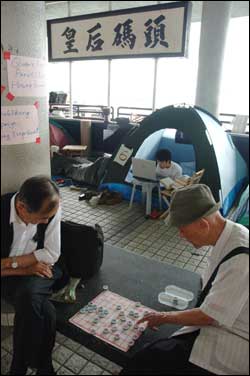
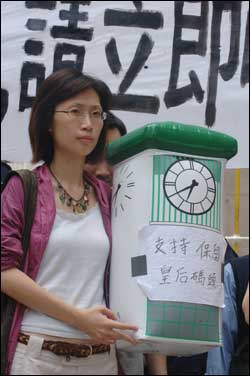 The aging
Queen's Pier in Central was Wednesday given a temporary stay of execution when
the Antiquities Advisory Board declared it a grade one monument, capping a day
of ferocious debate on the issue with the government standing firm on its plans
to relocate it. Twelve of the 25 voting board members supported giving the pier
a non- binding grade one status after an afternoon-long board meeting and a
public hearing at the Heritage Discovery Centre in Tsim Sha Tsui. Board chairman
Edmond Ho Sing- tin said the status meant the government must make every effort
to preserve the pier. "The government must now have very solid reasons if it
wants to demolish the site," Ho said. He agreed the best option would be to
leave the pier intact. Local Action representative Chu Hoi-dick, an activist who
took part in hunger strikes in an attempt to save the Star Ferry pier, declared
the decision a victory for the people. "The government must not treat the voice
of the people lightly," Chu said. But Secretary for Housing, Planning and Lands
Michael Suen Ming-yeung stressed it was not important whether the pier was
granted grade-one status. "There is no direct relationship between the grading
and whether we will demolish and relocate the pier. It does not mean we can't do
so," Suen said. He said there remains room for discussion on the pier's future.
"I strongly urge all stakeholders not to resort to the use of force to express
their views," Suen said. He stressed the government will apply to the
Legislative Council for funding to relocate the pier at the next public works
subcommittee meeting. Deputy Secretary for Home Affairs Esther Leung Yuet-yin
said the government had no plans to list the pier as a declared monument - which
would mean lawful protection for the site - as there were no suggestions from
the Antiquities Advisory Board that it should do so. Diverging views within the
board, which Ho admitted, were apparent during the open meeting. Barrister
Laurence Li Lu-jen said the pier was of great historical interest. "We need to
let our future generations know [the pier] was where former British governors,
in full military uniform, expressed their authority when they arrived in the
territory," Li said. However, National People's Congress deputy Yeung Yiu-chung
disagreed. "The Convention and Exhibition Center also held many ceremonies,
including leadership handovers, of historical importance," Yeung said. Urban
Renewal Authority managing director Billy Lam Chung-lun said the social value of
the pier was less significant when compared with the demolished Blake and Star
Ferry piers. But Simon Shen Xu-hui, a research assistant professor at the
Chinese University's Hong Kong Institute of Asia- Pacific Studies said: "Queen's
Pier's rarity now is exactly why we need to preserve it." The board meeting came
after 17 concern groups had, at a public hearing, overwhelmingly expressed their
desire for the government to leave the Queen's Pier intact. Harbor protection
activist Paul Zimmerman stressed the pier was part of a cluster, along with the
Edinburgh Place and the City Hall, which must be linked together. Hong Kong
University comparative literature assistant professor Mirana May Szeto stressed
the pier represented the people's public space. "The pier is not just a sign of
the colonial past. Diaoyu activists also departed from the pier, and doesn't
that represent the love for our country?" Szeto asked. Earlier in the day,
furious opposition from all parties during a Legco public works subcommittee
meeting forced the government to temporarily shelve its HK$50 million funding
application to relocate the pier. Medical-sector legislator and harbor
protection activist Kwok Ka-ki said the government's decision to apply for
funding before the board meeting later in the day was a humiliation for its
members. "It was also an insult to the people and Legco," Kwok said. Permanent
Secretary for Housing, Planning and Lands Rita Lau Ng Wai- lan stressed the
timing of the fund application was a coincidence. Assistant Director of Leisure
and Cultural Services Louis Ng Chi-wa stressed that even if the site was
pronounced a first-class monument, there remained no legally binding prohibition
against its demolition. Democratic Party lawmaker Yeung Sum took exception to
Ng's comment. "You don't even deserve to be in your post," Yeung said. Civic
Party lawmaker Fernando Cheung Chiu-hung accused the government of preempting
the funding. "From the government's attitude you can see there is no sincerity
to preserve historic venues," Cheung said. The hour-long exchange of furious
arguments between officials and legislators led to the shelving of the funding
plans. Lau's announcement that the funding application would be temporarily
shelved was met with cheers from observers in the conference room. The aging
Queen's Pier in Central was Wednesday given a temporary stay of execution when
the Antiquities Advisory Board declared it a grade one monument, capping a day
of ferocious debate on the issue with the government standing firm on its plans
to relocate it. Twelve of the 25 voting board members supported giving the pier
a non- binding grade one status after an afternoon-long board meeting and a
public hearing at the Heritage Discovery Centre in Tsim Sha Tsui. Board chairman
Edmond Ho Sing- tin said the status meant the government must make every effort
to preserve the pier. "The government must now have very solid reasons if it
wants to demolish the site," Ho said. He agreed the best option would be to
leave the pier intact. Local Action representative Chu Hoi-dick, an activist who
took part in hunger strikes in an attempt to save the Star Ferry pier, declared
the decision a victory for the people. "The government must not treat the voice
of the people lightly," Chu said. But Secretary for Housing, Planning and Lands
Michael Suen Ming-yeung stressed it was not important whether the pier was
granted grade-one status. "There is no direct relationship between the grading
and whether we will demolish and relocate the pier. It does not mean we can't do
so," Suen said. He said there remains room for discussion on the pier's future.
"I strongly urge all stakeholders not to resort to the use of force to express
their views," Suen said. He stressed the government will apply to the
Legislative Council for funding to relocate the pier at the next public works
subcommittee meeting. Deputy Secretary for Home Affairs Esther Leung Yuet-yin
said the government had no plans to list the pier as a declared monument - which
would mean lawful protection for the site - as there were no suggestions from
the Antiquities Advisory Board that it should do so. Diverging views within the
board, which Ho admitted, were apparent during the open meeting. Barrister
Laurence Li Lu-jen said the pier was of great historical interest. "We need to
let our future generations know [the pier] was where former British governors,
in full military uniform, expressed their authority when they arrived in the
territory," Li said. However, National People's Congress deputy Yeung Yiu-chung
disagreed. "The Convention and Exhibition Center also held many ceremonies,
including leadership handovers, of historical importance," Yeung said. Urban
Renewal Authority managing director Billy Lam Chung-lun said the social value of
the pier was less significant when compared with the demolished Blake and Star
Ferry piers. But Simon Shen Xu-hui, a research assistant professor at the
Chinese University's Hong Kong Institute of Asia- Pacific Studies said: "Queen's
Pier's rarity now is exactly why we need to preserve it." The board meeting came
after 17 concern groups had, at a public hearing, overwhelmingly expressed their
desire for the government to leave the Queen's Pier intact. Harbor protection
activist Paul Zimmerman stressed the pier was part of a cluster, along with the
Edinburgh Place and the City Hall, which must be linked together. Hong Kong
University comparative literature assistant professor Mirana May Szeto stressed
the pier represented the people's public space. "The pier is not just a sign of
the colonial past. Diaoyu activists also departed from the pier, and doesn't
that represent the love for our country?" Szeto asked. Earlier in the day,
furious opposition from all parties during a Legco public works subcommittee
meeting forced the government to temporarily shelve its HK$50 million funding
application to relocate the pier. Medical-sector legislator and harbor
protection activist Kwok Ka-ki said the government's decision to apply for
funding before the board meeting later in the day was a humiliation for its
members. "It was also an insult to the people and Legco," Kwok said. Permanent
Secretary for Housing, Planning and Lands Rita Lau Ng Wai- lan stressed the
timing of the fund application was a coincidence. Assistant Director of Leisure
and Cultural Services Louis Ng Chi-wa stressed that even if the site was
pronounced a first-class monument, there remained no legally binding prohibition
against its demolition. Democratic Party lawmaker Yeung Sum took exception to
Ng's comment. "You don't even deserve to be in your post," Yeung said. Civic
Party lawmaker Fernando Cheung Chiu-hung accused the government of preempting
the funding. "From the government's attitude you can see there is no sincerity
to preserve historic venues," Cheung said. The hour-long exchange of furious
arguments between officials and legislators led to the shelving of the funding
plans. Lau's announcement that the funding application would be temporarily
shelved was met with cheers from observers in the conference room.
Oscar-winning Taiwanese director Ang Lee is deeply engrossed in editing his new
spy thriller Lust, Caution and the movie isn't ready to be entered in any film
festivals yet, his assistant said Wednesday. The comments contradicted a report
on the Web site of state-run China Film Group saying the movie will premiere at
the Venice Film Festival in early September. "Ang is currently deep in post-
production. He is still in the process of cutting the film," his assistant David
Lee said. "We have not planned when and where the premiere will be. We are not
ready for film festivals yet." Lust, Caution, based on a short story by famed
Chinese writer Eileen Chang, is about a group of patriotic students who plot to
assassinate the intelligence chief in the Japanese-backed Chinese government
during the World War II era. It features Cannes best actor winner Tony Leung
Chiu-wai, Joan Chen from The Last Emperor and Chinese-American pop star Wang
Leehom. Ang Lee won the best director Oscar in 2006 for the gay romance
Brokeback Mountain.
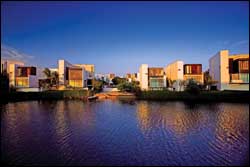 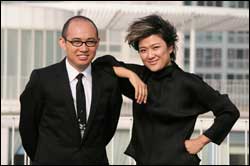 Despite the widely held belief that guanxi,
or connections, hold the key to success for every business in the Chinese world,
Pan Shiyi said this was not the case for him and his Beijing- based property
development company, SOHO China. The firm, which he and his wife co- founded in
1995, has become the No 1 tax contributor among its peers in the mainland
capital and No 2 overall in the country in recent years - even without the all
important guanxi. Instead, Pan and his wife, Zhang Xin, rely on their Taoist
beliefs to guide their actions. "When I left the government in 1992 and started
doing my own business, there were two choices: either doing trade business or
entering the property market. I did not have any connections so I chose to be a
property developer," the 44-year-old Pan recalls. He experimented with property
investments in Hainan with five friends before moving to Beijing to start SOHO
China.
Despite the widely held belief that guanxi,
or connections, hold the key to success for every business in the Chinese world,
Pan Shiyi said this was not the case for him and his Beijing- based property
development company, SOHO China. The firm, which he and his wife co- founded in
1995, has become the No 1 tax contributor among its peers in the mainland
capital and No 2 overall in the country in recent years - even without the all
important guanxi. Instead, Pan and his wife, Zhang Xin, rely on their Taoist
beliefs to guide their actions. "When I left the government in 1992 and started
doing my own business, there were two choices: either doing trade business or
entering the property market. I did not have any connections so I chose to be a
property developer," the 44-year-old Pan recalls. He experimented with property
investments in Hainan with five friends before moving to Beijing to start SOHO
China.
Receipts at Hong Kong restaurants grew 11.8
per cent year on year in the first quarter despite a smoking ban, government
figures released on Thursday showed. Census and Statistics Department figures
showed the value of restaurant receipts reached HK$16.8 billion in the first
quarter, up 11.8 per cent from the same period in 2006. Restaurant purchases
also increased, by 14.6 per cent, to HK$5.7 billion during the period, the
figures showed. After discounting the effect of price changes, the restaurant
receipts' rise in volume was 9.6 per cent, according to the department. This
growth was recorded after smoking was banned in all indoor restaurants from
January 1. The ban also covers karaoke lounges, bars and workplaces. In the
first quarter of this year, receipts of non-Chinese restaurants jumped 15.2 per
cent in value, or 13.2 per cent in volume, compared with a year earlier.
Receipts of Chinese restaurants grew 12.6 per cent in value, or 10.5 per cent in
volume. Fast-food shops and miscellaneous eating and drinking places recorded a
business growth of between 7.2 per cent and 10.3 per cent in value. However,
receipts of bars fell 0.7 per cent in value, or 6.7 per cent in volume. On a
seasonally adjusted basis, the volume of restaurant receipts increased 3.3 per
cent in the first quarter of this year compared with the fourth quarter of last
year.
 China: China's
overall competitiveness keeps rising, with its world ranking jumpimg from 18th
in 2006 to 15th this year, IMD, one of the world's top business schools, said in
a latest report on Thursday.
China: China's
overall competitiveness keeps rising, with its world ranking jumpimg from 18th
in 2006 to 15th this year, IMD, one of the world's top business schools, said in
a latest report on Thursday.
 A herdsman
walks among his flock during snowfall in Tianshan, Northwest China's Xinjiang
Uygur Autonomous Region, May 9, 2007. A sudden wind-storm pushed the temperature
below 0 c. As much as 10 cm of snow fell in some mountainous regions. A herdsman
walks among his flock during snowfall in Tianshan, Northwest China's Xinjiang
Uygur Autonomous Region, May 9, 2007. A sudden wind-storm pushed the temperature
below 0 c. As much as 10 cm of snow fell in some mountainous regions.
Chinese President Hu Jintao and his U.S. counterpart
George W. Bush exchanged views in a telephone conversation on bilateral
relations and the upcoming second round of Sino-US strategic economic dialogue.
Chinese President Hu Jintao and US President George W. Bush on Wednesday
discussed an upcoming visit to Washington by a senior Chinese official aimed at
bridging trade differences. US Treasury Secretary Henry Paulson and Chinese Vice
Premier Wu Yi are to hold trade talks in Washington May 22-24. White House
spokesman Gordon Johndroe said Bush phoned Hu from Air Force One as he traveled
to Kansas to view a tornado-stricken town. "The president welcomes the visit to
Washington of Vice Premier Wu Yi and her delegation later this month aimed at
deepening our economic ties in a mutually beneficial fashion," Johndroe said.
President Hu stressed that China and the US can properly settle problems arising
from bilateral economic and trade cooperation through frank and sincere
dialogue. Hu said he believes that with concerted efforts by both sides,
positive achievements will be scored in the upcoming second round of strategic
economic dialogue between the two countries, which will contribute to giving
fresh impetus to China-US economic and trade cooperation. According to Chinese
statistics, China's trade surplus with the United States widened to a record
$144 billion last year, sparking concern in the United States and triggering a
number of disputes between the two countries. On bilateral relations, both Hu
and Bush considered that China-US relations have been kept in a momentum of
favorable development and that the two sides should beef up dialogue and
cooperation, to promote healthy and stable progress of the constructive and
cooperative relations between the two countries. The two leaders also agreed on
the need for North Korea to meet its nuclear obligations, Johndroe said. The two
presidents will meet in Germany next month during the summit of the Group of
Eight countries.
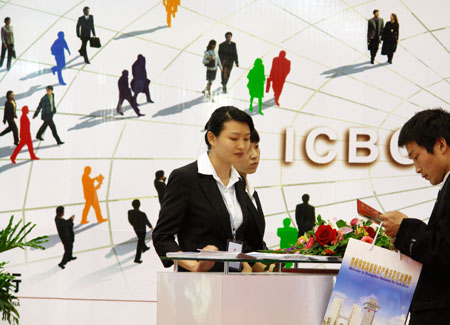 Industrial and Commercial Bank of China (ICBC), on May 8 denied that it is in
talks about buying UK-based Travelex, which runs an airport currency exchange
network. If the deal proceeded, it would be one of the largest overseas
acquisitions for a Chinese company, said South China Morning Post, citing
unnamed sources close to the mainland firm.
Industrial and Commercial Bank of China (ICBC), on May 8 denied that it is in
talks about buying UK-based Travelex, which runs an airport currency exchange
network. If the deal proceeded, it would be one of the largest overseas
acquisitions for a Chinese company, said South China Morning Post, citing
unnamed sources close to the mainland firm.
China: Asia's largest outbound travel market - Shanghai
resident Song Min planned to travel overseas during the seven-day Golden Week
vacation in May. But when he entered a travel agency's office, he found he was
not the only one who had the idea. The agency was full of people interested in
joining a tour abroad, and every other tour companies' offices were just as
busy. China's ever-growing outbound travel market has become one of Asia's
largest sources of tourists according to the Pacific Asia Tourism Association (PATA).
Based on the statistic result of China National Tourism Administration (CNTA),
about 34.52 million Chinese people travel overseas last year and some 179
million Chinese went abroad for holiday during this year's Golden Week in May.
The forecast from the World Travel Fair 2007 predicts some 37.4 million Chinese
will travel abroad this year, an increase of 10 percent over last year. The
World Travel Organization also predicted in 2020, China will be the fourth
largest tourist source nation and in 15 years, about 100 million Chinese
tourists will travel abroad annually. Asia is the top foreign traveling
destination for Chinese tourists. In the first half of 2005, about 13.104
million people visited China's neighboring countries, which accounted for 90.4
percent of the total Chinese travelers traveled overseas. The major reason for
the increasing number of outbound travelers is China's growth domestic product
(GDP) growth. Professor Wang Qiyan, director of the leisure economy research
institute of the Renmin University, said when a country's average GDP exceeds
US$3,000, it will experience a tourism boom. In 2006 Shanghai's average GDP
reached US$7,490 so more than 2 million of locals made trips abroad that year.
China's increasing number of outbound travelers has attracted international
travel organizations around the world to promote their products and services. By
the end of 2006, 132 foreign countries and regions have opened travel markets to
China. According to China National Tourism Administration, 19 overseas travel
agencies have offices in China. Three American states, Hawaii and Nevada have
tourism counselors in China. Besides these states, California is a popular
destination for Chinese travelers and Los Angeles has a travel office in China
as well. According to Caroline Beteta, executive director of California Travel
and Tourism Commission, China will most probably become the state's largest
overseas tourist source market in 10 years. In European countries, the UK will
attract at least 200 thousand Chinese tourists in 2010 and 500 thousand in 2020,
said Sir Michael Lickiss, chairman of the British Tourist Authority. China has
three seven-day long national holidays during the Spring Festival, in May and
October, which are regarded as Golden Weeks.
The Chinese mainland's competitiveness has moved up to the
world's 15th position in 2007 from 18th last year. Taiwan dropped one spot to
18th this year, according to the most recent World Competitiveness Yearbook
issued by the International Institute for Management Development (IMD) based in
Lausanne, Switzerland. IMD established the rankings based on the growing
competitiveness of emerging world economies, said the Chinanews.com. Among
countries and areas with a population of more than 20 million, Taiwan's
competitiveness fell to the Asia's sixth position. But its ranking still
maintained fifth in Asia and Pacific Region. Singapore came up on top, followed
by Hong Kong, Australia and the mainland. Taiwan performed poorly in basic
infrastructure and government efficiency, with their rankings of the world's
51st, 50th and 48th respectively. Taiwan also did not perform well in other
criteria such as financial risk, financial transparency, stock market index and
cell phone fees. Taiwan's listings in business efficiency slipped to 17th place
from 13th last year, its infrastructure ranking goes down to 21st from 18th,
according to the annual yearbook.
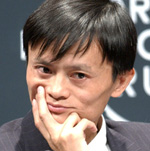 Jack Ma , chairman and
chief executive officer of Alibaba Group, China's largest e-commerce company, is
reportedly joining SoftBank Corporation's board of directors, the Beijing Times
reported yesterday, citing a company statement. The news followed an earlier
report that Alibaba is seeking a Hong Kong or NASDAQ IPO for its core
business-to-business (B2B) unit. Alibaba will raise $700 million to $1 billion,
reports said. Jack Ma , chairman and
chief executive officer of Alibaba Group, China's largest e-commerce company, is
reportedly joining SoftBank Corporation's board of directors, the Beijing Times
reported yesterday, citing a company statement. The news followed an earlier
report that Alibaba is seeking a Hong Kong or NASDAQ IPO for its core
business-to-business (B2B) unit. Alibaba will raise $700 million to $1 billion,
reports said.
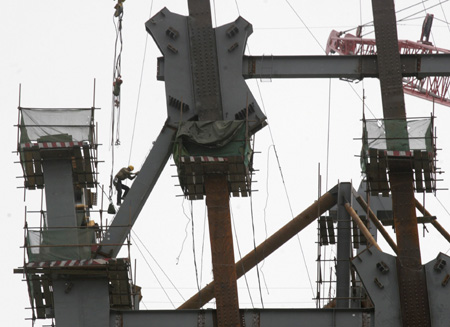 A
worker climbs at a construction site in Beijing's central business district May
8, 2007. China's gross domestic product is forecast to rise 10.8 percent in the
second quarter of 2007, while the consumer price index is expected to gain 3
percent over the period, the State Information Center said on Tuesday. China's
gross domestic product is forecast to rise 10.8 percent in the second quarter of
2007, while the consumer price index is expected to gain 3 percent over the
period, the State Information Centre said on Tuesday. A
worker climbs at a construction site in Beijing's central business district May
8, 2007. China's gross domestic product is forecast to rise 10.8 percent in the
second quarter of 2007, while the consumer price index is expected to gain 3
percent over the period, the State Information Center said on Tuesday. China's
gross domestic product is forecast to rise 10.8 percent in the second quarter of
2007, while the consumer price index is expected to gain 3 percent over the
period, the State Information Centre said on Tuesday.
May 11, 2007
 Hong Kong:
Christie's Hong Kong displayed prized imperial Chinese ceramics and works of art
that will be on sale in its spring auctions in a media preview Wednesday.
Christie's Spring auction Imperial Sale and Fine Chinese Ceramics and Works of
Art Sale will take place on May 29. They include myriad of rare and splendid
Chinese porcelain, works art and jade carvings made for the Imperial court, as
well as exquisite pieces ranging from Longquan celadon ceramics to important
lacquer and cloisonne wares. A pair of famille rose peach bowls from the
Yongzheng period (1723-1735), estimated 30 million HK dollars (about 3.85
million U. S. dollars), represents the highly desired collectors' pieces amongst
the Qing dynasty polychrome ceramics on offer. The bowls rank among the
masterpieces of the overglaze enameled porcelain from the Chinese Imperial
kilns. Each bowl is decorated with luscious peaches growing on branches that
extend from the exterior, rising from just above the foot ring the branches
emerge over the mouth rim and grow into the interior cavetto. This continuous
painting technique on ceramics reached a peak in the Yongzheng reign in terms of
superb enameling quality. Also featured at the preview is an important
gilt-incised lacquered "dragon" throne from the Kangxi period (1662-1772) that
is expected to realize in excess of 12 million HK dollars (about 1. 53 million
U.S. dollars). Equally noteworthy is an Imperial yellow embroidered "twelve-
symbol dragon" robe from the Qianlong period (1736-1795) with an estimated price
3,000,000 to 4,000,000 HK dollars (about 390,000 to 510,000 U.S. dollars).
Finely couched in gold and silver tread with nine contorted five-clawed dragons
clutching "flaming pearls," it is further embodied with 12 Imperial symbols
including mountains, flames and mountains. The entire combination of these
motifs, when used together, was exclusively reserved for the Emperor, signifying
The Ruler of the Universe. Hong Kong:
Christie's Hong Kong displayed prized imperial Chinese ceramics and works of art
that will be on sale in its spring auctions in a media preview Wednesday.
Christie's Spring auction Imperial Sale and Fine Chinese Ceramics and Works of
Art Sale will take place on May 29. They include myriad of rare and splendid
Chinese porcelain, works art and jade carvings made for the Imperial court, as
well as exquisite pieces ranging from Longquan celadon ceramics to important
lacquer and cloisonne wares. A pair of famille rose peach bowls from the
Yongzheng period (1723-1735), estimated 30 million HK dollars (about 3.85
million U. S. dollars), represents the highly desired collectors' pieces amongst
the Qing dynasty polychrome ceramics on offer. The bowls rank among the
masterpieces of the overglaze enameled porcelain from the Chinese Imperial
kilns. Each bowl is decorated with luscious peaches growing on branches that
extend from the exterior, rising from just above the foot ring the branches
emerge over the mouth rim and grow into the interior cavetto. This continuous
painting technique on ceramics reached a peak in the Yongzheng reign in terms of
superb enameling quality. Also featured at the preview is an important
gilt-incised lacquered "dragon" throne from the Kangxi period (1662-1772) that
is expected to realize in excess of 12 million HK dollars (about 1. 53 million
U.S. dollars). Equally noteworthy is an Imperial yellow embroidered "twelve-
symbol dragon" robe from the Qianlong period (1736-1795) with an estimated price
3,000,000 to 4,000,000 HK dollars (about 390,000 to 510,000 U.S. dollars).
Finely couched in gold and silver tread with nine contorted five-clawed dragons
clutching "flaming pearls," it is further embodied with 12 Imperial symbols
including mountains, flames and mountains. The entire combination of these
motifs, when used together, was exclusively reserved for the Emperor, signifying
The Ruler of the Universe.
International Business Machines Corp is seeking to sell
223 million shares in Lenovo Group Ltd, for as much as HK$669 million (US$86
million).
Prominent banker David Li Kwok-po has strongly denied he
passed on information that allowed a Hong Kong couple to reap an estimated
US$8.2 million (HK$63.96 million) profit from alleged insider trading of Dow
Jones shares. Dow Jones has launched an internal investigation into whether Li -
chairman of Bank of East Asia (0023) and a Dow Jones director - leaked
confidential information to a friend, Hong Kong entrepreneur Michael Leung
Kai-hung, about an imminent offer by Rupert Murdoch's News Corp to buy the
company, which publishes the Wall Street Journal. Leung is the father of
Charlotte Wong Leung Ka-on who, with her husband Wong Kan-king, is under
investigation by the US Securities and Exchange Commission for suspected insider
trading. News Corp has also launched an internal investigation to determine if
anyone inside the firm leaked information to the couple, sources close to the
media firm said. Li admitted he had knowledge of Murdoch's interest in Dow Jones
before News Corp made public its intentions, according to a report in the Wall
Street Journal Asia. But he denied leaking information relating to the deal to
anyone. "Not even my wife," Li told the newspaper.
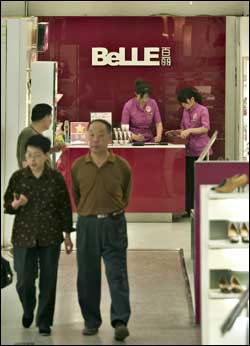 Market watchers said the retail offering of shoe chain Belle International
Holdings is likely to be 300 times covered after investors responded well to the
share sale Wednesday, the first day of its public flotation. Belle's public
offer attracted margin orders worth HK$50.9 billion, according to eight
brokerage firms polled by The Standard. The amount represents about 58 times
more than the shares available for retail investors. "The response is hot. It is
likely that Belle will be more than 300 times oversubscribed," said Kingston Lin
King-kam, associate director at Prudential Brokerage. At least HK$258 billion in
capital could be tied up if the issue were more than 300 times covered. Sources
said Belle's international tranche was more than 10 times covered. Margin
financing choices offered by brokerages for three share sales this week
commanded interest rates ranging from 5 percent to 6.1 percent. Banks are
offering rates that are even more competitive. Hang Seng Bank, for example, is
providing margin financing at a rate as low as 4.95 percent. An investor may
borrow HK$450,000 for a fee of about HK$588, including interest. Most brokerages
have reached the limit of their loan quotas. Phillip Securities, for example,
has loaned about HK$8.7 billion for the initial public offerings, almost
reaching the limit of its loan quota of HK$9 billion. Cherrie Yan, analyst at
Phillip Securities, said the brokerage will end financing once the limit is
reached. "The overwhelming response [for Belle] is mainly because it is the
market leader in the sector and also its high profit growth," a fund manager
said. Belle, which runs more than 3,800 outlets in Hong Kong and the mainland,
aims to raise HK$8.6 billion by offering 1.39 billion shares at a price range of
HK$5.35 to HK$6.20 per share. Over the past few years, Belle has achieved high
profit growth. Income grew to 977 million yuan (HK$992.5 million) last year,
from 75 million yuan in 2004. The retail offering closes May 14 and trading is
set for May 23. Morgan Stanley and Credit Suisse are handling the deal. Belle
stole the market focus from two other IPO candidates, Pacific Textiles and
Jiahua Stores Holdings, which also kicked off their retail offerings this week.
Pacific Textiles drew the smallest orders for margin financing among the three
new flotations. Applications for loans to buy shares of the Hong Kong- based
textiles company amounted to HK$1.18 billion, just six times more than shares
available in the retail tranche, according to a poll of six brokers by The
Standard. Market watchers said some investors switched their orders from Pacific
Textiles to Belle. Department store operator Jiahua Stores received about
HK$1.85 billion in orders. Its retail tranche is at least 70 times covered.
Pacific Textiles closes the offering today and Jiahua closes its order book
tomorrow.
Market watchers said the retail offering of shoe chain Belle International
Holdings is likely to be 300 times covered after investors responded well to the
share sale Wednesday, the first day of its public flotation. Belle's public
offer attracted margin orders worth HK$50.9 billion, according to eight
brokerage firms polled by The Standard. The amount represents about 58 times
more than the shares available for retail investors. "The response is hot. It is
likely that Belle will be more than 300 times oversubscribed," said Kingston Lin
King-kam, associate director at Prudential Brokerage. At least HK$258 billion in
capital could be tied up if the issue were more than 300 times covered. Sources
said Belle's international tranche was more than 10 times covered. Margin
financing choices offered by brokerages for three share sales this week
commanded interest rates ranging from 5 percent to 6.1 percent. Banks are
offering rates that are even more competitive. Hang Seng Bank, for example, is
providing margin financing at a rate as low as 4.95 percent. An investor may
borrow HK$450,000 for a fee of about HK$588, including interest. Most brokerages
have reached the limit of their loan quotas. Phillip Securities, for example,
has loaned about HK$8.7 billion for the initial public offerings, almost
reaching the limit of its loan quota of HK$9 billion. Cherrie Yan, analyst at
Phillip Securities, said the brokerage will end financing once the limit is
reached. "The overwhelming response [for Belle] is mainly because it is the
market leader in the sector and also its high profit growth," a fund manager
said. Belle, which runs more than 3,800 outlets in Hong Kong and the mainland,
aims to raise HK$8.6 billion by offering 1.39 billion shares at a price range of
HK$5.35 to HK$6.20 per share. Over the past few years, Belle has achieved high
profit growth. Income grew to 977 million yuan (HK$992.5 million) last year,
from 75 million yuan in 2004. The retail offering closes May 14 and trading is
set for May 23. Morgan Stanley and Credit Suisse are handling the deal. Belle
stole the market focus from two other IPO candidates, Pacific Textiles and
Jiahua Stores Holdings, which also kicked off their retail offerings this week.
Pacific Textiles drew the smallest orders for margin financing among the three
new flotations. Applications for loans to buy shares of the Hong Kong- based
textiles company amounted to HK$1.18 billion, just six times more than shares
available in the retail tranche, according to a poll of six brokers by The
Standard. Market watchers said some investors switched their orders from Pacific
Textiles to Belle. Department store operator Jiahua Stores received about
HK$1.85 billion in orders. Its retail tranche is at least 70 times covered.
Pacific Textiles closes the offering today and Jiahua closes its order book
tomorrow.
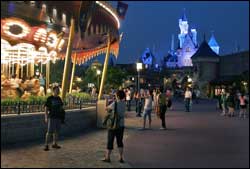 Declining attendance
numbers and guest spending at Hong Kong Disneyland are likely to leave Walt
Disney Co unable to draw on a US$294 million (HK$2.29 billion) revolving credit
facility, the company said. "Hong Kong Disneyland may require alternative
sources of financing to meet its operating and development needs," Burbank,
California-based Disney said in a filing with the US securities regulator. "Hong
Kong Disneyland is engaged in discussions with the Walt Disney Company and Hong
Kong Disneyland's other shareholder regarding financing options aimed at
advancing its long-term financial and development needs," a spokesperson for
Hong Kong Disneyland said. The Hong Kong government owns 57 percent of Hongkong
International Theme Parks, which operates Hong Kong Disneyland in a joint
venture with the US giant, which holds the remaining 43 percent interest. "Our
discussion does not involve seeking additional funds from the government," the
spokesperson said. Disney expects to make an additional investment as part of
the new financing arrangement. Alternative financing arrangements would need to
be completed before September 30, when the performance stipulations of the
revolving credit facility will be measured. "Although there is no assurance that
acceptable financial arrangements can be obtained prior to September 30, 2007,
management currently expects that Hong Kong Disneyland will be successful in
developing financial arrangements necessary to meet its financial and
development needs," Disney said. Disney announced Wednesday that second-quarter
profits jumped 27 percent on the success of road-trip movie Wild Hogs and growth
at cable sports channel ESPN. Second-quarter revenues from Disney's parks and
resorts division climbed 9 percent to US$2.4 billion and segment operating
income increased 19 percent to US$254 million. Revenue increases from higher
theme park attendance, guest spending, and hotel occupancy at Disneyland Resort
Paris "were partially offset by lower guest spending and theme park attendance
at Hong Kong Disneyland Resort," Disney said. Hong Kong Disneyland also saw a
decline in operating income during the second quarter ended March 31. "We're
launching several marketing initiatives to boost attendance and address
seasonality of the [Hong Kong] park," Disney senior executive vice president and
chief financial officer Tom Staggs said in a conference call with analysts. "We
view Hong Kong Disneyland as a valuable asset in a rapidly growing market and
we're confident in and committed to this project. We'll likely continue to
invest in the park to help ensure its long-term success." A spokesperson for
Hong Kong Disneyland said the park recognizes that attendance and guest spending
have fallen short of initial expectations, although "guest satisfaction
continues to climb higher, reflecting continuous improvement in park operations
and guest service." Meanwhile, the Tourism Commission said the SAR government
has no plans to use public funds to increase its investment in the Hong Kong
Disneyland joint venture. Declining attendance
numbers and guest spending at Hong Kong Disneyland are likely to leave Walt
Disney Co unable to draw on a US$294 million (HK$2.29 billion) revolving credit
facility, the company said. "Hong Kong Disneyland may require alternative
sources of financing to meet its operating and development needs," Burbank,
California-based Disney said in a filing with the US securities regulator. "Hong
Kong Disneyland is engaged in discussions with the Walt Disney Company and Hong
Kong Disneyland's other shareholder regarding financing options aimed at
advancing its long-term financial and development needs," a spokesperson for
Hong Kong Disneyland said. The Hong Kong government owns 57 percent of Hongkong
International Theme Parks, which operates Hong Kong Disneyland in a joint
venture with the US giant, which holds the remaining 43 percent interest. "Our
discussion does not involve seeking additional funds from the government," the
spokesperson said. Disney expects to make an additional investment as part of
the new financing arrangement. Alternative financing arrangements would need to
be completed before September 30, when the performance stipulations of the
revolving credit facility will be measured. "Although there is no assurance that
acceptable financial arrangements can be obtained prior to September 30, 2007,
management currently expects that Hong Kong Disneyland will be successful in
developing financial arrangements necessary to meet its financial and
development needs," Disney said. Disney announced Wednesday that second-quarter
profits jumped 27 percent on the success of road-trip movie Wild Hogs and growth
at cable sports channel ESPN. Second-quarter revenues from Disney's parks and
resorts division climbed 9 percent to US$2.4 billion and segment operating
income increased 19 percent to US$254 million. Revenue increases from higher
theme park attendance, guest spending, and hotel occupancy at Disneyland Resort
Paris "were partially offset by lower guest spending and theme park attendance
at Hong Kong Disneyland Resort," Disney said. Hong Kong Disneyland also saw a
decline in operating income during the second quarter ended March 31. "We're
launching several marketing initiatives to boost attendance and address
seasonality of the [Hong Kong] park," Disney senior executive vice president and
chief financial officer Tom Staggs said in a conference call with analysts. "We
view Hong Kong Disneyland as a valuable asset in a rapidly growing market and
we're confident in and committed to this project. We'll likely continue to
invest in the park to help ensure its long-term success." A spokesperson for
Hong Kong Disneyland said the park recognizes that attendance and guest spending
have fallen short of initial expectations, although "guest satisfaction
continues to climb higher, reflecting continuous improvement in park operations
and guest service." Meanwhile, the Tourism Commission said the SAR government
has no plans to use public funds to increase its investment in the Hong Kong
Disneyland joint venture.
Radical options to be considered for
bad air days - Schools will be closed, private cars barred from Causeway Bay and
motorists charged a fee for using premium roads. These will become part of the
standard responses should the community forge a consensus on what to do on days
of very high pollution.
 Infants
(from left) Mark Ho, four, Natsuki Kamohara, four, and Hinata Ozawa, three, were
among those to surprise their mothers by baking them a cake at the "Flowers for
Mama" event at Harbour City in Tsim Sha Tsui. The event, in the run-up to
Mothers' Day on Sunday, gave children an early opportunity to celebrate with
their mothers. Infants
(from left) Mark Ho, four, Natsuki Kamohara, four, and Hinata Ozawa, three, were
among those to surprise their mothers by baking them a cake at the "Flowers for
Mama" event at Harbour City in Tsim Sha Tsui. The event, in the run-up to
Mothers' Day on Sunday, gave children an early opportunity to celebrate with
their mothers.
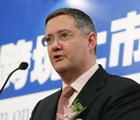 Richard Williams, head of stock
exchange listing committee, confirms that the exchange will review the minimum
public float to catch up with international practice. The Hong Kong stock
exchange will study a plan to relax the 25 per cent minimum public float
requirement for all listed firms to make it easier for mainland companies to
sell shares in the local and mainland markets, according to exchange sources. Richard Williams, head of stock
exchange listing committee, confirms that the exchange will review the minimum
public float to catch up with international practice. The Hong Kong stock
exchange will study a plan to relax the 25 per cent minimum public float
requirement for all listed firms to make it easier for mainland companies to
sell shares in the local and mainland markets, according to exchange sources.
 China: A
German consortium including Siemens AG is close to acquiring final approval from
Chinese authorities to apply its technology to the extended maglev train line to
be built in the city.
China: A
German consortium including Siemens AG is close to acquiring final approval from
Chinese authorities to apply its technology to the extended maglev train line to
be built in the city.
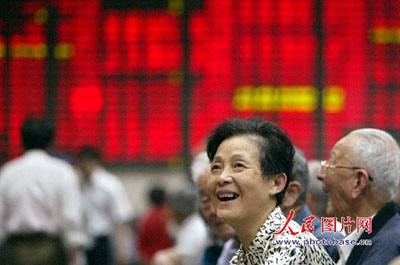 A
shareholder smiles at a stock exchange in Shanghai, May 9, 2007. The benchmark
Shanghai Composite Index, the most widely watched indicator of the mainland's
stock market, sailed past the mark of 4,000 at 10:51am in morning trading. A
shareholder smiles at a stock exchange in Shanghai, May 9, 2007. The benchmark
Shanghai Composite Index, the most widely watched indicator of the mainland's
stock market, sailed past the mark of 4,000 at 10:51am in morning trading.
The People's Bank of China (PBOC), the central bank, is
expected to raise the required reserve ratio of foreign-currency deposits from
four percent to five percent as of May 15.
China's express delivery market is facing a time of
unprecedented change. Four major foreign players, China Post, private local
firms and State-owned companies are all busy adjusting their strategies, and the
government is poised to revise business policies. After UPS broke from its local
partner - Sinotrans, Fedex spent $400 million to acquire the remaining stake of
its joint venture with the Chinese firm DTW Group. It also bought all of DTW's
assets in the domestic and international express delivery markets. And while
foreign giants are expanding in China, the State-owned giant, China Post, is
attempting to gain the upper hand with a possiblly favorable postal law,
sparking cries of foul play from foreign and local private firms. Fedex's buyout
of its local partner signifies the acceleration of foreign express delivery
firms' expansion in China. DTW's domestic express delivery business suffered
losses of 60 million yuan in its first 11 months in 2004, but Fedex still spent
$400 million for DTW, which highlights Fedex's desire for DTW's network.
Industry sources say Fedex's is trying to catch up with its competitors. DHL
announced its entry into the domestic express delivery market in 2004, TNT has
already begun domestic parcel delivery and UPS has the rights to international
express delivery business in tier-one cities. The joint venture agreement with
DTW was originally expected to expire in 2009, but Fedex bought out the Chinese
firm because it wanted immediate exposure to the domestic market. Exit of
domestic players - Since selling to Fedex, DTW has given up its domestic express
delivery business and its chairman, Wang Shusheng, said the firm's focus would
shift to goods logistics, warehousing, international goods forwarding and
distribution. Sinotrans, another domestic delivery giant, seems to be
considering whether it should exit the business, or up investment. Zhang Jianwei,
Sinotrans' president, used to say his company would continue to strengthen its
position in the domestic market. The firm's air delivery arm, Sinotrans Air
Transportation Development Co Ltd, still holds 25 percent of international
express delivery market. Sinotrans Air announced to acquire 51 percent of stakes
in Shentong Express, a domestic express delivery firm, and 49 percent of Sichuan
Airlines. However, since Zhao Luxiang took over the position of chairman,
Sinotrans Air's strategy seems to be changing. The company has recently
suspended cooperation with both Sichuan Airlines and Shentong Express.
 Posing naked isn't
something new for our actress Bai Ling. And the Chinese beauty has agreed to
again bare all, this time for German artist Udo Spreitzenbarth. The sexy actress
will bare all in a new exhibition of life-size prints at the Berlinale gallery
in Germany. A Chinese actress who also has fame in the United States, Bai Ling
once posed naked for the famous men's magazine Playboy back in 2005. She was
reportedly performing research for her upcoming film, an undisclosed film about
the sex trade. Posing naked isn't
something new for our actress Bai Ling. And the Chinese beauty has agreed to
again bare all, this time for German artist Udo Spreitzenbarth. The sexy actress
will bare all in a new exhibition of life-size prints at the Berlinale gallery
in Germany. A Chinese actress who also has fame in the United States, Bai Ling
once posed naked for the famous men's magazine Playboy back in 2005. She was
reportedly performing research for her upcoming film, an undisclosed film about
the sex trade.
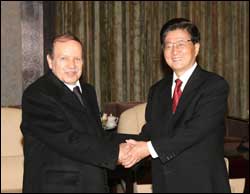 Beijing denied Wednesday media reports that Vice Premier Huang Ju, one of the
nine most powerful men in the Communist Party hierarchy, has died. The denial
came after Britain's The Times and Hong Kong's Phoenix Television both cited
sources as saying that Huang, 68, had died after a long battle with pancreatic
cancer. "It is our understanding that news regarding comrade Huang Ju's death is
totally unfounded," a Cabinet spokesman said. State television and radio made no
mention of Huang's condition, despite months of speculation over his health and
recent widespread rumors that he was in a critical condition. Huang is ranked
sixth in the Communist Party's politburo standing committee, the all-powerful
group of nine that rules China. He has been responsible for the key economic and
financial portfolios.
Beijing denied Wednesday media reports that Vice Premier Huang Ju, one of the
nine most powerful men in the Communist Party hierarchy, has died. The denial
came after Britain's The Times and Hong Kong's Phoenix Television both cited
sources as saying that Huang, 68, had died after a long battle with pancreatic
cancer. "It is our understanding that news regarding comrade Huang Ju's death is
totally unfounded," a Cabinet spokesman said. State television and radio made no
mention of Huang's condition, despite months of speculation over his health and
recent widespread rumors that he was in a critical condition. Huang is ranked
sixth in the Communist Party's politburo standing committee, the all-powerful
group of nine that rules China. He has been responsible for the key economic and
financial portfolios.
China has acknowledged for the first
time it is the source of deadly additives found in US pet foods and vowed to
bring in wider checks amid growing overseas concern over its food product
controls. The bureau in charge of inspecting export products said Wednesday two
firms illegally added the chemical melamine to food additives and mislabelled
them to avoid inspection. The case is just one of several that point to lax
controls in China, which has been criticized previously for not sharing
information on the bird flu virus and the SARS outbreak. "The two companies
illegally added melamine to the wheat gluten and rice protein in a bid to meet
contractual demands for the amount of protein in the products," the General
Administration of Quality Supervision, Inspection and Quarantine said after an
investigation. The firms are Xuzhou Anying Biologic Technology Development in
Jiangsu, and Binzhou Futian Biology Technology in Shandong. China has previously
refrained from detailed comment since US authorities identified the two firms as
the source of the melamine, an organic chemical used in the production of a wide
range of products such as plastics and which can be fatal to animals. US Food
and Drug Administration officials are currently in China to lead the agency's
own melamine probe.
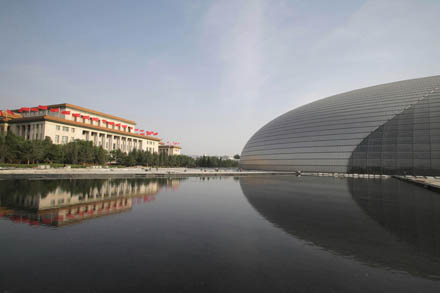 The main building of the National Grand Theatre (right) and the Great Hall of
the People in Beijing are reflected in a large new pool after it was filled with
water for the first time yesterday. The theatre's shell, covered with titanium
panels, houses a 2,416-seat opera house, a 2,017-seat concert hall, a 1,040-seat
theatre and other supporting facilities.
The main building of the National Grand Theatre (right) and the Great Hall of
the People in Beijing are reflected in a large new pool after it was filled with
water for the first time yesterday. The theatre's shell, covered with titanium
panels, houses a 2,416-seat opera house, a 2,017-seat concert hall, a 1,040-seat
theatre and other supporting facilities.
Hewlett-Packard, the world's biggest
maker of personal computers, plans to add sales and marketing employees in about
100 smaller Chinese cities this year to boost sales in Lenovo Group's home
market.
May 10, 2007
 Hong Kong:
PING An Insurance (Group) Co, China mainland's second-biggest insurer, may join
Hong Kong's Hang Seng Index after a quarterly review of the stock benchmark,
according to Nomura Holdings Inc and Core Pacific-Yamaichi International (HK)
Ltd. China Overseas Land & Investment Ltd, a Hong Kong-based developer
controlled by the construction ministry, also may be added, said Kent Yau,
deputy head of research at Core Pacific-Yamaichi in Hong Kong. The addition of
companies incorporated in the mainland, known as H shares, reflects their
growing importance in Hong Kong, Bloomberg News reported. H shares at the end of
March accounted for 23 percent of the value of the Hong Kong stock exchange's
main board, up from 1.5 percent at the end of 1997, the exchange's Website
shows. "We've been seeing H shares becoming increasingly important in recent
years, both in terms of their market cap and turnover," Sandy Lee, a Hong
Kong-based analyst at Nomura, said in a phone interview. "This trend is bound to
continue." Changes to the Hang Seng Index will prompt funds that mirror the
benchmark, such as the HK$26.21 billion (US$3.35 billion) Tracker Fund of Hong
Kong, to adjust their holdings. H shares have been eligible for the city's key
stock index since August. The adjustments for the latest review take effect on
June 4, according to Lee. So far five Chinese mainland stocks have been added to
the Hang Seng. Hong Kong:
PING An Insurance (Group) Co, China mainland's second-biggest insurer, may join
Hong Kong's Hang Seng Index after a quarterly review of the stock benchmark,
according to Nomura Holdings Inc and Core Pacific-Yamaichi International (HK)
Ltd. China Overseas Land & Investment Ltd, a Hong Kong-based developer
controlled by the construction ministry, also may be added, said Kent Yau,
deputy head of research at Core Pacific-Yamaichi in Hong Kong. The addition of
companies incorporated in the mainland, known as H shares, reflects their
growing importance in Hong Kong, Bloomberg News reported. H shares at the end of
March accounted for 23 percent of the value of the Hong Kong stock exchange's
main board, up from 1.5 percent at the end of 1997, the exchange's Website
shows. "We've been seeing H shares becoming increasingly important in recent
years, both in terms of their market cap and turnover," Sandy Lee, a Hong
Kong-based analyst at Nomura, said in a phone interview. "This trend is bound to
continue." Changes to the Hang Seng Index will prompt funds that mirror the
benchmark, such as the HK$26.21 billion (US$3.35 billion) Tracker Fund of Hong
Kong, to adjust their holdings. H shares have been eligible for the city's key
stock index since August. The adjustments for the latest review take effect on
June 4, according to Lee. So far five Chinese mainland stocks have been added to
the Hang Seng.
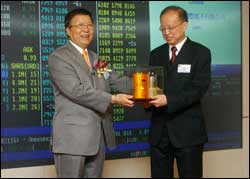 CapXon International Electronic (0469) bucked the trend of the record-setting
Hang Seng Index in its disappointing trading debut Monday as its share price
closed 8.6 percent below its initial public offering price - making it the worst
performing IPO so far this year. With 108.94 million shares changing hands, the
stock of the Shenzhen- based aluminum electrolytic capacitor maker closed at
HK$0.85, compared to its IPO price of HK$0.93. In contrast, the HSI gained 55
points to close Monday at 20,896.64, beating the previous high mark set last
Friday of 20,841.08. CapXon's poor trading debut exceeded that of Sino Gold
Mining (1862), whose shares closed 7.5 percent below their IPO price of HK$42.50
on their March 16 debut at HK$39.30 and have yet to rebound. The Australian gold
miner's stock closed Monday at HK$39.40, up 4.5 percent. Kingston Lin King-kam,
associate director of Prudential Brokerage, said CapXon's performance "would not
affect the IPO fever" in Hong Kong. Lin was not surprised, noting that the
subscription response from CapXon investors had already shown the company was
not that attractive. The company's retail tranche was only 46 times covered,
tying up about HK$870 million of funds, compared to at least 50 times
subscription for other recent IPOs. Of 20 companies that have floated shares so
far in 2007, only four fell below their IPO price on their trading debuts. These
include CapXon, Sino Gold, China Properties Group (1838) and Tai-I International
Holdings (1808). The average growth for the 20 companies was 15 percent. Emperor
Capital (0717) has been the year's best-performing new listing in terms of
percentage growth, jumping 79 percent on its trading debut April 24 to HK$0.68
from the IPO price of HK$0.38. Meanwhile, China Molybdenum (3993) has emerged as
the most profitable IPO so far, providing retail investors a gain of HK$4,020
per board lot of 1,000 shares, as its stock shot up 59 percent on its first
trading day April 26 to HK$10.82 from the IPO price of HK$6.80. Its Moly shares
closed Monday at HK$12.24, down 0.65 percent.
CapXon International Electronic (0469) bucked the trend of the record-setting
Hang Seng Index in its disappointing trading debut Monday as its share price
closed 8.6 percent below its initial public offering price - making it the worst
performing IPO so far this year. With 108.94 million shares changing hands, the
stock of the Shenzhen- based aluminum electrolytic capacitor maker closed at
HK$0.85, compared to its IPO price of HK$0.93. In contrast, the HSI gained 55
points to close Monday at 20,896.64, beating the previous high mark set last
Friday of 20,841.08. CapXon's poor trading debut exceeded that of Sino Gold
Mining (1862), whose shares closed 7.5 percent below their IPO price of HK$42.50
on their March 16 debut at HK$39.30 and have yet to rebound. The Australian gold
miner's stock closed Monday at HK$39.40, up 4.5 percent. Kingston Lin King-kam,
associate director of Prudential Brokerage, said CapXon's performance "would not
affect the IPO fever" in Hong Kong. Lin was not surprised, noting that the
subscription response from CapXon investors had already shown the company was
not that attractive. The company's retail tranche was only 46 times covered,
tying up about HK$870 million of funds, compared to at least 50 times
subscription for other recent IPOs. Of 20 companies that have floated shares so
far in 2007, only four fell below their IPO price on their trading debuts. These
include CapXon, Sino Gold, China Properties Group (1838) and Tai-I International
Holdings (1808). The average growth for the 20 companies was 15 percent. Emperor
Capital (0717) has been the year's best-performing new listing in terms of
percentage growth, jumping 79 percent on its trading debut April 24 to HK$0.68
from the IPO price of HK$0.38. Meanwhile, China Molybdenum (3993) has emerged as
the most profitable IPO so far, providing retail investors a gain of HK$4,020
per board lot of 1,000 shares, as its stock shot up 59 percent on its first
trading day April 26 to HK$10.82 from the IPO price of HK$6.80. Its Moly shares
closed Monday at HK$12.24, down 0.65 percent.
The High Court has started hearing
arguments on whether Hong Kong is obligated by an international covenant to
ensure its citizens have a "decent living" and if Chief Executive Donald Tsang
Yam-kuen is bound by a 67-year- old ordinance to set a minimum wage for workers.
A Sino Land-led consortium won the
land auction for an 86,758-square-foot West Kowloon site on Tuesday with a HK$4
billion bid, below market expectations.
The Independent Commission Against
Corruption on Tuesday said it had arrested 47 people in connection with a
suspected food supply scam involving HK$1 million in bribes.
Some 886,674, tourist arrivals came
to Hong Kong over the Labor Day Golden Week holiday - a 22 per cent increase
from last year, a spokesman for the Tourism Commission said on Tuesday.
The mainland yuan's role in
financial transactions in Asia would expand considerably in future, Hong Kong
Monetary Authority chief executive Joseph Yam Chi-kwong said on Tuesday.
 China: China's
currency, the yuan, broke the 7.70 barrier for the first time on Tuesday, the
first trading day after the week-long May Day holidays.
China: China's
currency, the yuan, broke the 7.70 barrier for the first time on Tuesday, the
first trading day after the week-long May Day holidays.
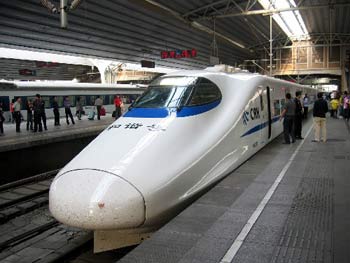 A
bullet train is seen at Beijing railway station May 7, 2007. The new CRH (China
Railway High-speed) bullet train can run at 200km per hour. According to the
Ministry of Railways, a record 5.16 million people travelled on trains on last
Monday alone, and from April 28 to May 7, some 45 million people will take
trains, up 8 percent year-on-year. A
bullet train is seen at Beijing railway station May 7, 2007. The new CRH (China
Railway High-speed) bullet train can run at 200km per hour. According to the
Ministry of Railways, a record 5.16 million people travelled on trains on last
Monday alone, and from April 28 to May 7, some 45 million people will take
trains, up 8 percent year-on-year.
Procurators across China have
brought 62 government officials to court for allegedly protecting criminal gangs
in their precincts, according to China's Supreme People's Procuratorate (SPP).
"Procurators at all levels have detained more than 17,600 criminal gang suspects
from March 2006 to March 2007, and brought more than 10,000 of them to court,"
said a SPP source. Zhou Yongkang, minister of public security, last month
ordered a continued national crackdown on criminal gangs, noting that two big
events -- the 17th National Congress of the Communist Party of China and the
Beijing Olympic Games -- are around the corner. Police say they have broken up
more than 3,000 gangs in the past 14 months, 54 of which involve "protecting
umbrellas" from government officials. The SPP source said local procurators have
set up special working groups to crack down on criminal gangs and to dig out any
official sponsors involved. In one of the most prominent cases, Xu Xiaogang,
former vice director of the provincial public security department of east
China's Jiangxi province, was sentenced earlier this month to life imprisonment
for graft and illegal possession of guns. Xu received bribes -- including cash
bribes of 850,000 yuan (109,000 U.S. dollars) and 10,000 U.S. dollars and two
jade bracelets worth 82,000 yuan (10,500 U.S. dollars) -- from a local gang that
operated a series of business scams, ran underground casinos and possessed a big
stock of guns. Xiong Xinxing, the head of the gang, was sentenced to death and
executed on Jan. 11 this year.
Shares of PetroChina (0857) had a
bumpy ride Monday continuing from its Friday rally, after Berkshire Hathaway
shareholders voted down a proposal asking chairman Warren Buffett to divest its
US$3.31 billion (HK$25.82 billion) stake in the oil giant.
Hong Kong
blue-chip companies wanting to float shares in mainland stock markets may not
see it happen within the next five to 10 years, according to a Hong Kong stock
exchange official.
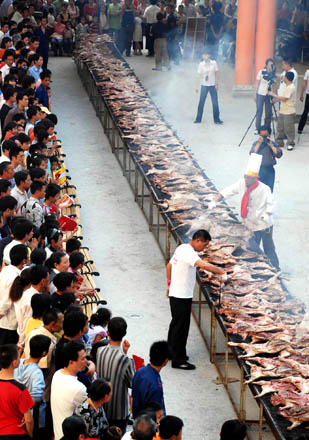 Jiang Bing, known
on the mainland by his nickname the "roasting king", shows off his skills at a
shopping mall plaza in Liuzhou, Guangxi. As part of the "golden week"
festivities, Mr Jiang (in chef's hat) roasted 128 lambs in just two hours on a
40-metre-long grill. Jiang Bing, known
on the mainland by his nickname the "roasting king", shows off his skills at a
shopping mall plaza in Liuzhou, Guangxi. As part of the "golden week"
festivities, Mr Jiang (in chef's hat) roasted 128 lambs in just two hours on a
40-metre-long grill.
Millions of returning holiday-makers
jammed mainland train stations and airports on the final day of the Labour Day
break yesterday criticism again arose of a government policy that puts more than
1.3 billion people on holiday for a week at exactly the same time.
May 9, 2007
 Hong Kong:
New World China Land (0917),
the mainland property development arm of New World Development (0017) aims to
raise up to 2.8 billion yuan (HK$2.84 billion) by issuing five-year zero coupon
convertible bonds to finance a project in Beijing. Hong Kong:
New World China Land (0917),
the mainland property development arm of New World Development (0017) aims to
raise up to 2.8 billion yuan (HK$2.84 billion) by issuing five-year zero coupon
convertible bonds to finance a project in Beijing.
 French
right-wing presidential candidate of the Union for a Popular Movement (UMP)
Nicolas Sarkozy is applauded by the crowd as he arrives to deliver a speech, at
the "salle Gaveau" in Paris. Sarkozy scored an emphatic victory in the French
presidential election Sunday, trouncing Socialist rival Segolene Royal to win a
clear mandate for tough economic and social reforms. French
right-wing presidential candidate of the Union for a Popular Movement (UMP)
Nicolas Sarkozy is applauded by the crowd as he arrives to deliver a speech, at
the "salle Gaveau" in Paris. Sarkozy scored an emphatic victory in the French
presidential election Sunday, trouncing Socialist rival Segolene Royal to win a
clear mandate for tough economic and social reforms.
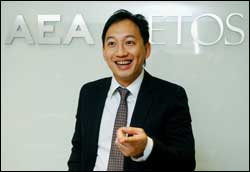 Despite China's
property market expecting another round of austerity measures, foreign investors
believe the sector has undergone consolidation leading to an opportunity to
invest, said Aetos Capital Asia managing director Kenny Tse Chiu-ping. "There
has been a lagged effect on the mainland property market resulting from
austerity measures since 2003," Tse said. "Increasing transparency and a more
regulated market through mergers and acquisitions during past years have made
property a more attractive investment as the risk is lower," he said. Tse said
these merger activities had given rise to new property giants such as Country
Gardens (2007), while eliminating unqualified corporations. This in turn
provided more quality investment choices for overseas investors. "Sustainable
profit growth for mainland developers could be as high 20 percent to 30
percent," Tse said. "We expect the total market capital of overseas listed
mainland property companies could jump to about US$100 billion (HK$780 billion)
from the current US$60 billion by the end of 2008." Despite China's
property market expecting another round of austerity measures, foreign investors
believe the sector has undergone consolidation leading to an opportunity to
invest, said Aetos Capital Asia managing director Kenny Tse Chiu-ping. "There
has been a lagged effect on the mainland property market resulting from
austerity measures since 2003," Tse said. "Increasing transparency and a more
regulated market through mergers and acquisitions during past years have made
property a more attractive investment as the risk is lower," he said. Tse said
these merger activities had given rise to new property giants such as Country
Gardens (2007), while eliminating unqualified corporations. This in turn
provided more quality investment choices for overseas investors. "Sustainable
profit growth for mainland developers could be as high 20 percent to 30
percent," Tse said. "We expect the total market capital of overseas listed
mainland property companies could jump to about US$100 billion (HK$780 billion)
from the current US$60 billion by the end of 2008."
Wealth managers see greater potential in China than in
India and are ready to recommend alternative investments such as hedge funds to
boost investor returns, according to a survey. China has the rosiest prospects
of any wealth market in Asia, said the poll of 73 wealth managers in Europe,
Asia and the United States that oversee more than US$5 trillion (HK$39
trillion). Some 80 percent of those canvassed in the survey by British
investment bank Barclays Capital forecast at least 16 percent annual growth in
the assets run by wealth managers in China. But fewer of the respondents were as
upbeat about India, with 60 percent expecting assets managed by its wealth
experts to increase at least 16 percent annually. "The overall outlook for
wealth generation in Asia is strong while confidence in China is higher than
ever," said Peter Hu, a top investment manager at Barclays Capital. "They are
still bullish on India but less so than on China." Barclays Capital forecast
economic growth in Asia, excluding Japan, of 8.2 percent for this year. China
reported 11.1 percent economic growth in the first three months of the year, and
India is expected to grow by around 8.5 percent in the year to March 2008, down
from an estimated 9.2 percent the previous year. Asian investors are becoming
more "happy to take on non-traditional investments" such as hedge funds, private
equity and property, Hu added. He said many so-called traditional asset classes,
like the stock market or bonds, were near all-time highs. "They're not
compensating investors as much as they have before so they're looking for other
kinds of investments ... to sustain their return profile." The trend toward
alternative investments reflects a rising "level of sophistication among
investors in the region" and a higher "level of younger money being made by
entrepreneurs," Hu said. "They understand risk" and are ready to "look at new
ways to gain returns." "It's a positive for the region, helping to increase
diversification and absorb liquidity," he added, forecasting that alternative
investments will become "mainstream products over the next two years." Right
now, equity-linked products, or equity derivatives, are the most popular
alternative portfolio investments, with foreign exchange-linked products second,
the survey found. "With increased liquidity and transparency, the derivatives
market is set to grow," Hu said.
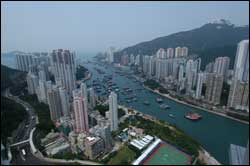 Hong Kong will
have a fisherman's wharf by 2012 as one of the highlights of a redeveloped
Aberdeen traditional fishing harbor, according to the Tourism Commission. But
district councillors are concerned a lack of railway services may be a problem
for the growing number of visitors to the area. The commission said Sunday the
waterfront at both Aberdeen and Ap Lei Chau will be redeveloped with a
fisherman's wharf as the main theme. Work on the project will start in 2009 and
is due to be completed by 2012. Thematic architecture, with Chinese and Western
seafood restaurants, retail shops and open space for alfresco dining will spread
along the waterfront to blend tourism with the area's present culture. The
harborfront will also be a focal point for various festive and cultural
activities, and vantage points for viewing annual Dragon Boat Festival races.
Traditional sampans will be used as transport to connect both sides of the
harbor with Ocean Park. Other facilities such as a dragon boat gallery, a
floating maritime exhibition facility, heritage walks and signs will be
developed to highlight past and present traditions. The government will call for
public tenders to design, build and operate the facilities. However, the
government has ruled out the need to expand the area's transport system, saying
a study has shown that most tourists visit the area during off-peak hours. The
harbor development concept, which was presented to the Southern District Council
last week, has received support from councillors, with reservations. "The
project will help boost tourism in the district, but inadequate transport links
are the main concern," councillor Law Kam-hung said. The Aberdeen tunnel - the
district's main link with the city - is already over-crowded during rush hours
and cannot cope with the growing number of visitors to Aberdeen, he said. The
government should consider extending Mass Transit Railway services to the area
and include it as part of the tourism development plan, Law said. He welcomed
the idea of inviting private developers to design and operate the facilities,
but said he was worried about a possible clash of private property rights in the
area to be developed. Ap Lei Chau's main street, which is aligned with privately
owned shops, is where the government should resolve the issue of property rights
before proceeding with the redevelopment. According to Law, hotel accommodation
in the area is not a problem despite the surge in the number of tourists. He
said more than 10 industrial buildings in the Wong Chuk Hang industrial area
have been rezoned for hotel development. Another councillor, Shek Kwok- keung,
said he hopes the proposed redevelopment will help Aberdeen regain its
attraction. "More than 10 years ago, people came to Aberdeen for seafood, but
now all the seafood restaurants along the waterfront have disappeared, with only
some Chinese eateries left. "Aberdeen's tourism development is 15 years behind
that of other districts," he said. Hong Kong will
have a fisherman's wharf by 2012 as one of the highlights of a redeveloped
Aberdeen traditional fishing harbor, according to the Tourism Commission. But
district councillors are concerned a lack of railway services may be a problem
for the growing number of visitors to the area. The commission said Sunday the
waterfront at both Aberdeen and Ap Lei Chau will be redeveloped with a
fisherman's wharf as the main theme. Work on the project will start in 2009 and
is due to be completed by 2012. Thematic architecture, with Chinese and Western
seafood restaurants, retail shops and open space for alfresco dining will spread
along the waterfront to blend tourism with the area's present culture. The
harborfront will also be a focal point for various festive and cultural
activities, and vantage points for viewing annual Dragon Boat Festival races.
Traditional sampans will be used as transport to connect both sides of the
harbor with Ocean Park. Other facilities such as a dragon boat gallery, a
floating maritime exhibition facility, heritage walks and signs will be
developed to highlight past and present traditions. The government will call for
public tenders to design, build and operate the facilities. However, the
government has ruled out the need to expand the area's transport system, saying
a study has shown that most tourists visit the area during off-peak hours. The
harbor development concept, which was presented to the Southern District Council
last week, has received support from councillors, with reservations. "The
project will help boost tourism in the district, but inadequate transport links
are the main concern," councillor Law Kam-hung said. The Aberdeen tunnel - the
district's main link with the city - is already over-crowded during rush hours
and cannot cope with the growing number of visitors to Aberdeen, he said. The
government should consider extending Mass Transit Railway services to the area
and include it as part of the tourism development plan, Law said. He welcomed
the idea of inviting private developers to design and operate the facilities,
but said he was worried about a possible clash of private property rights in the
area to be developed. Ap Lei Chau's main street, which is aligned with privately
owned shops, is where the government should resolve the issue of property rights
before proceeding with the redevelopment. According to Law, hotel accommodation
in the area is not a problem despite the surge in the number of tourists. He
said more than 10 industrial buildings in the Wong Chuk Hang industrial area
have been rezoned for hotel development. Another councillor, Shek Kwok- keung,
said he hopes the proposed redevelopment will help Aberdeen regain its
attraction. "More than 10 years ago, people came to Aberdeen for seafood, but
now all the seafood restaurants along the waterfront have disappeared, with only
some Chinese eateries left. "Aberdeen's tourism development is 15 years behind
that of other districts," he said.
 China: China's
GDP grows annual average of 9.67 pct from 1978 to 2006 - The annual growth rate
was much higher than that of the world economy, which was about 3.3 percent on
average in the same period.
China: China's
GDP grows annual average of 9.67 pct from 1978 to 2006 - The annual growth rate
was much higher than that of the world economy, which was about 3.3 percent on
average in the same period.
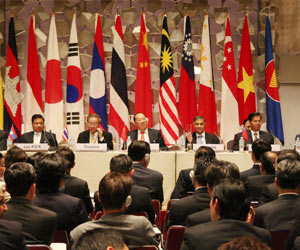 A joint press
conference of the 10th ASEAN+3 Finance Minister's Meeting is held in Kyoto,
Japan, on May 5, 2007. The finance ministers of the Association of Southeast
Asian Nations (ASEAN) as well as China, Japan and South Korea (ASEAN+3)
concluded their 10th meeting on Saturday afternoon in Kyoto, vowing to further
deepen financial cooperation. A joint press
conference of the 10th ASEAN+3 Finance Minister's Meeting is held in Kyoto,
Japan, on May 5, 2007. The finance ministers of the Association of Southeast
Asian Nations (ASEAN) as well as China, Japan and South Korea (ASEAN+3)
concluded their 10th meeting on Saturday afternoon in Kyoto, vowing to further
deepen financial cooperation.
As Taiwan fruit gains popularity on the mainland, Taiwan
businessmen are calling for direct transport links between the island and
mainland to facilitate their expanding market.
China has issued direct selling licenses to 19 companies
since 2005, said sources with the Ministry of Commerce on Monday. Fourteen of
them are foreign-funded companies, including Avon China, Nu Skin China, Ningbo
Sansheng, Oriflame Cosmetics China and Amway China, while the domestic companies
include Nanjing Joymain, Beijing Rolmex Pharmacy and Guangdong Kangli Medicines.
Other companies have applied for the license and are still waiting for
government approval, said the ministry. In 2005, China mapped out regulations on
direct selling in order to regulate the sector and prevent pyramid selling and
open direct selling business as part of its commitment to the World Trade
Organization. Regulations limit direct selling to cosmetics, health food,
sanitary products, body-building equipment and kitchen utensils.
Industrial production took up an increasing share of
China's electricity consumption from 2000 to the first quarter of 2007,
according to the latest report from the China Electricity Council. In the first
quarter this year, China's secondary industry used 540 billion kilowatt-hours of
electricity, up 16.8 percent from the same period last year. The figure was
75.12 percent of China's total electricity consumption in the first quarter,
compared with 74.89 percent in 2006 and 71.75 percent in 2000. Electricity
consumption in light and heavy industries respectively rose 11.5 percent and
18.1 percent, which were 2.1 percentage points and 6.31 percentage points higher
than the rise in the same period of last year. Electricity consumption in the
primary industry, or the agricultural sector, grew 3.5 percent in the first
quarter, while that in the tertiary industry, or the service sector, rose 10.8
percent. China consumed 718.91 billion kilowatt-hours of electricity in the
first quarter, up 14.92 percent year on year.
China's all-time high equity market needs "cool water and
cool heads" after taking a 7-day Golden Week breather, otherwise the stock
bubble runs the danger of a quick bust, experts said. Since its nine-percent
correction in late February, the Shanghai A-share equities have now moved back
up more than 40 percent, and no letup is seen on the horizon, buoyed by a series
of successful initial public offerings as the ranks of investors swell at over
200,000 a day. There are now more than 91 million accounts held at brokers or
mutual funds. Xia Bing, director of the State Council's Development and Research
Center's Finance Department, warned at a recent CCTV talk show program, that the
stock market bubble is building. He and a string of other economists suggested
investors take extra caution before jumping onto the bandwagon.
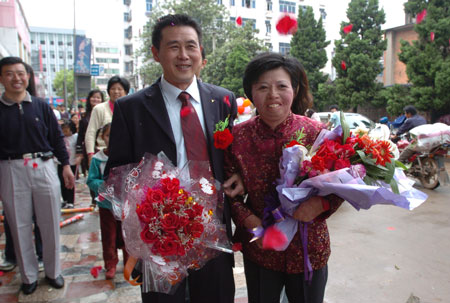 "Internet Mother" Liu Huanrong
(R) and her husband Zhu Qingcai smile at their wedding ceremony in the city of
Shangrao of South China's Jiangxi Province May 5, 2007. Liu, 50, got disabled
after fighting fire when she was small with the burnt area covering 91 per cent
of her body surface. Though disabled, she uses the Internet to help a number of
youngsters addicted to the net and guide them into normal life.
"Internet Mother" Liu Huanrong
(R) and her husband Zhu Qingcai smile at their wedding ceremony in the city of
Shangrao of South China's Jiangxi Province May 5, 2007. Liu, 50, got disabled
after fighting fire when she was small with the burnt area covering 91 per cent
of her body surface. Though disabled, she uses the Internet to help a number of
youngsters addicted to the net and guide them into normal life.
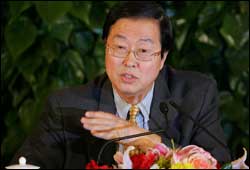 People's Bank of China governor Zhou
Xiaochuan acknowledged Sunday the country's stock market bubble is a concern and
said the central bank is watching asset prices as well as inflation. Zhou also
said there is room to raise the reserve ratio of lenders further after seven
increases in 11 months failed to slow lending and inflation. "There surely is
still room" to raise the reserve requirements, Zhou said on a flight to
Frankfurt. Zhou, on his way to a meeting at the Bank for International
Settlements in Basel, Switzerland, also said an acceleration in inflation to the
fastest pace in two years is "normal" and "not very unexpected." Through policy
moves, Premier Wen Jiabao is trying to prevent excess cash from a record trade
surplus from stoking inflation, fueling wasteful investment and creating more
bad loans. Economic growth accelerated to 11.1 percent in the first quarter from
10.4 percent in the previous three months, largely driven by exports that nearly
doubled the trade surplus to US$46.4 billion (HK$363 billion). The PBOC has
raised interest rates three times since April last year and sold bills to soak
up liquidity in the banking system and stem price increases. On the last
occasion, March 17, the benchmark one-year yuan lending and deposit rates were
adjusted upward by 0.27 percentage points each. That lifted the one-year deposit
rate to 2.79 percent and the lending rate to 6.39 percent. This was an
eight-year high. Despite the rates increases, inflation accelerated to 3.3
percent in March from 2.7 percent in February. It was the highest rate in more
than two years, and banks made 1.4 trillion yuan (HK$1.42 trillion) of new loans
in the first quarter alone, nearly half the lending last year. People's Bank of China governor Zhou
Xiaochuan acknowledged Sunday the country's stock market bubble is a concern and
said the central bank is watching asset prices as well as inflation. Zhou also
said there is room to raise the reserve ratio of lenders further after seven
increases in 11 months failed to slow lending and inflation. "There surely is
still room" to raise the reserve requirements, Zhou said on a flight to
Frankfurt. Zhou, on his way to a meeting at the Bank for International
Settlements in Basel, Switzerland, also said an acceleration in inflation to the
fastest pace in two years is "normal" and "not very unexpected." Through policy
moves, Premier Wen Jiabao is trying to prevent excess cash from a record trade
surplus from stoking inflation, fueling wasteful investment and creating more
bad loans. Economic growth accelerated to 11.1 percent in the first quarter from
10.4 percent in the previous three months, largely driven by exports that nearly
doubled the trade surplus to US$46.4 billion (HK$363 billion). The PBOC has
raised interest rates three times since April last year and sold bills to soak
up liquidity in the banking system and stem price increases. On the last
occasion, March 17, the benchmark one-year yuan lending and deposit rates were
adjusted upward by 0.27 percentage points each. That lifted the one-year deposit
rate to 2.79 percent and the lending rate to 6.39 percent. This was an
eight-year high. Despite the rates increases, inflation accelerated to 3.3
percent in March from 2.7 percent in February. It was the highest rate in more
than two years, and banks made 1.4 trillion yuan (HK$1.42 trillion) of new loans
in the first quarter alone, nearly half the lending last year.
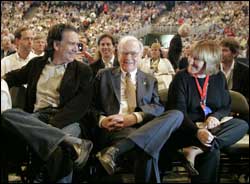 Shareholders of Warren Buffett's
holding company Berkshire Hathaway have overwhelmingly defeated a proposal to
divest a US$3.31 billion (HK$25.81 billion) stake in PetroChina (0857) because
of its parent's alleged links to Sudan. Hong Kong analysts believe Saturday's
vote will help drive up Petrochina's share price further when the market opens
today. The shares rocketed 14 percent to close at HK$10.16 Friday on news that
its Jidong Nanpu field in Bohai Bay has proven reserves of about 3 billion
barrels of oil. Berkshire's shares are up about 3,600 percent since 1987. They
rose US$650, or 0.6 percent, to US$109,250 Friday in New York. At the annual
meeting in Omaha, Nebraska, less than 2 percent of votes were cast in favor of
the proposal by shareholder Judith Porter. Buffett, 76, opposed the proposal. By
the end of last year, Berkshire held a 1.3 percent interest in PetroChina,
making it the top foreign shareholder. Shareholders of Warren Buffett's
holding company Berkshire Hathaway have overwhelmingly defeated a proposal to
divest a US$3.31 billion (HK$25.81 billion) stake in PetroChina (0857) because
of its parent's alleged links to Sudan. Hong Kong analysts believe Saturday's
vote will help drive up Petrochina's share price further when the market opens
today. The shares rocketed 14 percent to close at HK$10.16 Friday on news that
its Jidong Nanpu field in Bohai Bay has proven reserves of about 3 billion
barrels of oil. Berkshire's shares are up about 3,600 percent since 1987. They
rose US$650, or 0.6 percent, to US$109,250 Friday in New York. At the annual
meeting in Omaha, Nebraska, less than 2 percent of votes were cast in favor of
the proposal by shareholder Judith Porter. Buffett, 76, opposed the proposal. By
the end of last year, Berkshire held a 1.3 percent interest in PetroChina,
making it the top foreign shareholder.
China’s top family planning body has
warned that the world’s most populous country could face a “population rebound”
because the newly rich are ignoring population control laws and because of early
marriages in rural areas, state media said on Monday. China’s family planning
policy — implemented in the late 1970s — limits most urban couples to one child
and rural families to two to control population growth and conserve natural
resources.
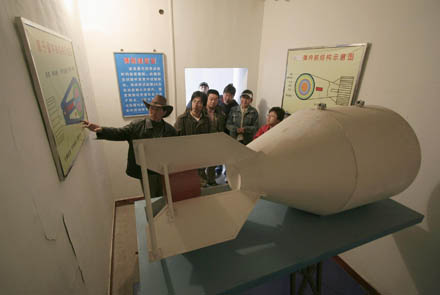 A guide
explains the interior structure of an atomic bomb yesterday at the site of the
mainland's first nuclear weapons base in Haiyan county, Qinghai province.
Beijing has declassified the base and is inviting the public and tourists to
visit the site. A guide
explains the interior structure of an atomic bomb yesterday at the site of the
mainland's first nuclear weapons base in Haiyan county, Qinghai province.
Beijing has declassified the base and is inviting the public and tourists to
visit the site.
May 8, 2007
 Hong Kong:
Rail chiefs have defended
their decision to award bonuses totalling HK$614,000 to senior executives
despite a management feud and a faulty equipment crisis last year. Hong Kong:
Rail chiefs have defended
their decision to award bonuses totalling HK$614,000 to senior executives
despite a management feud and a faulty equipment crisis last year.
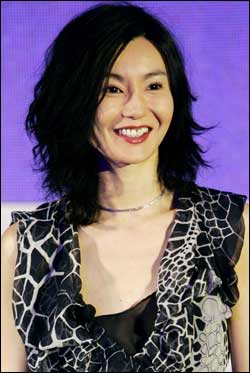 In a rare
public appearance, Cannes best actress winner Maggie Cheung Man-yuk said she has
cut down her output because she does not like life on the set. "I don't take on
that many movies these days because I don't miss the set. "I enjoy the moment
when I'm acting, how to immerse in character, figuring out how to portray
something with my colleagues ... but sometimes waiting on the set for six hours
is very common," the Hong Kong actress said after attending a promotional event
for bank HSBC. "Sometimes I think, `Six hours! How much I could have done. How
many friends I could have seen. How many movies I could have watched,"' said
Cheung, who hasn't appeared in a movie since 2004. Cheung said she's in talks
about several movie projects and has met with directors Tsai Ming-liang of
Malaysia and Jia Zhangke from China, but has not committed to any roles. She
said she wants to stay away from heavy roles. "At this moment, I don't want to
portray characters that are too heavy," Cheung told reporters, adding she enjoys
the break from portraying tragic characters. "Because I haven't made any movies
recently, I don't have to think, `I need to cry in this scene. I need to be
emotionally immersed."' Cheung won the best actress award at the 2004 Cannes
Film Festival for her performance in Clean. Clean and another 2004 movie, Wong
Kar-wai's 2046, are her latest movies. In a rare
public appearance, Cannes best actress winner Maggie Cheung Man-yuk said she has
cut down her output because she does not like life on the set. "I don't take on
that many movies these days because I don't miss the set. "I enjoy the moment
when I'm acting, how to immerse in character, figuring out how to portray
something with my colleagues ... but sometimes waiting on the set for six hours
is very common," the Hong Kong actress said after attending a promotional event
for bank HSBC. "Sometimes I think, `Six hours! How much I could have done. How
many friends I could have seen. How many movies I could have watched,"' said
Cheung, who hasn't appeared in a movie since 2004. Cheung said she's in talks
about several movie projects and has met with directors Tsai Ming-liang of
Malaysia and Jia Zhangke from China, but has not committed to any roles. She
said she wants to stay away from heavy roles. "At this moment, I don't want to
portray characters that are too heavy," Cheung told reporters, adding she enjoys
the break from portraying tragic characters. "Because I haven't made any movies
recently, I don't have to think, `I need to cry in this scene. I need to be
emotionally immersed."' Cheung won the best actress award at the 2004 Cannes
Film Festival for her performance in Clean. Clean and another 2004 movie, Wong
Kar-wai's 2046, are her latest movies.
Emerging-market fund manager Mark
Mobius remains confident about surging Hong Kong-listed mainland plays even
though the rest of the region is expensive. "The Asian market is overdone, but
the Hong Kong-listed H-shares and red chips still look reasonable. We continue
to hold those," said Mr Mobius, president of Templeton Emerging Markets, with
US$34 billion under management. Mr Mobius also said Asian oil and telecoms
companies looked attractive and said there were "bits and pieces in other
sectors". H-shares are Hong Kong-listed mainland companies while red chips are
mainland firms incorporated overseas. The Hang Seng China Enterprise Index
tracking those stocks rose 3.47 per cent last week, to reach a four-month high
of 10,035.01.
 China: China closed down a total of 3,176 polluting enterprises
amid a campaign in which 720,000 companies have been checked for their pollution
discharges last year, according to the country's top environment watchdog.
China: China closed down a total of 3,176 polluting enterprises
amid a campaign in which 720,000 companies have been checked for their pollution
discharges last year, according to the country's top environment watchdog.
China is considering to offer unified insurance packages
tailored to its overseas workers after nine Chinese were killed in Ethiopia,
according to the China Insurance Regulatory Commission (CIRC).
For Chinese who habitually travel during the weeklong May
Day holiday, they may find this year's itinerary involves as much etiquette
education as sightseeing, delicious food and shopping. "On our first day in
Beijing, we were repeatedly told by the tour guide not to litter and spit and
given pamphlets about what to do and what not to do," said Luan Hong, a tourist
from southeast China's Fujian province. Posters telling travelers how to behave
appear in almost every train station, bus stop, hotel and scenic spot. "We are
treated like little kids," Luan said. Tourists' grumbles mean little to
officials who are anxious to correct the embarrassing habits of Chinese
travelers ahead of next year's Olympics Games. And there is no better
opportunity of doing it than the May Day travel spree, when an estimated 150
million Chinese will be on the road. The China National Tourism Administration
has issued a circular, making travel agencies and tour guides responsible for
correcting tourists' bad behavior during the holidays. Jumping the line,
spitting, littering and clearing one's throat loudly in public are some of the
frequently observed practices among Chinese travelers, according to a guideline
prepared and released last year by the Spiritual Civilization Steering Committee
(SCSC) of the Chinese Communist Party, the official etiquette watchdog. "We are
supposed to remind people constantly throughout the tour, and also lead an
etiquette discussion at the end of the tour," said Huang Xiaohui, a tour guide
with a Beijing-based travel agency. "The Olympics are coming, and we don't want
to get disgraced," Huang said, summing up the purpose succinctly. Beijing
expects to receive 550,000 foreign tourists during the Olympics and an estimated
2 million domestic tourists will also visit the capital city. "Promoting
civilized behaviors among Chinese travelers is a long-term task. To harvest
short-term results before the games, we need to focus our resources on the main
problems," said Zhai Weihua, SCSC deputy director. "Tens of thousands of
reporters will come to China to cover the Games next year, which means both
China's positive and negative sides will be amplified. Once bad impressions are
made, they last, " Zhai said. "That's why we should grab the opportunity to
change uncouth behavior," said Wu Jianmin, President of China Foreign Affairs
University, in a TV interview.
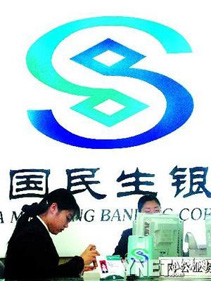 China Minsheng
Banking Corp., one of the country's 10 listed commercial banks, has reported net
profits up 47 percent year-on-year to 1.11 billion yuan (144.2 million U.S.
dollars) in the first quarter of the year. China Minsheng
Banking Corp., one of the country's 10 listed commercial banks, has reported net
profits up 47 percent year-on-year to 1.11 billion yuan (144.2 million U.S.
dollars) in the first quarter of the year.
China has earmarked 900 million yuan (116.9 million U.S.
dollars) for efficient arable land fertilization program this year, sources with
the Ministry of Agriculture said on Sunday.
China's leading private education
and training company New Oriental Education and Technology announced impressive
fiscal third-quarter results, beating Wall Street expectations. The company's
US$33 million (HK$257.4 million) in revenues for the three months ended February
28 were a 51 percent increase from the same period a year ago and exceeded the
high end of the company's guidance of US$27.1 million in revenues for the
quarter.
May 7, 2007
 Hong Kong:
Hongkong and Shanghai Banking Corporation chairman Vincent Cheng Hoi- chuen said
foreign banks will not neglect risk management to compete with mainland players,
who so far have much larger distribution networks than offshore lenders. Hong Kong:
Hongkong and Shanghai Banking Corporation chairman Vincent Cheng Hoi- chuen said
foreign banks will not neglect risk management to compete with mainland players,
who so far have much larger distribution networks than offshore lenders.
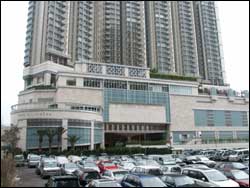 Wheelock Properties (0049) has
triggered an auction for a waterfront site in West Kowloon with a bid of HK$4.2
billion, the biggest by a developer since 2004. The bid also marks another
successful attempt by the company to trigger a sale for a residential site in
the area as it aggressively seeks to replenish its land bank. Wheelock director
Ricky Wong Kwong-yiu confirmed Friday the company had submitted the price for
the latest site at West Kowloon Reclamation. Located at Hoi Fai Road, the
122,204-square-foot site adjacent to One SilverSea - which was developed by Sino
Land (0083) - is likely to draw potential bids from rival developers Sun Hung
Kai Properties (0016), Sino and K Wah International (0173), who have all
indicated they will study the site. The Lands Department announced Friday it had
accepted Wheelock's bid of HK$4.2 billion, or HK$4,583 per square foot, which
will also be the opening bid in the auction June 12. Wheelock Properties (0049) has
triggered an auction for a waterfront site in West Kowloon with a bid of HK$4.2
billion, the biggest by a developer since 2004. The bid also marks another
successful attempt by the company to trigger a sale for a residential site in
the area as it aggressively seeks to replenish its land bank. Wheelock director
Ricky Wong Kwong-yiu confirmed Friday the company had submitted the price for
the latest site at West Kowloon Reclamation. Located at Hoi Fai Road, the
122,204-square-foot site adjacent to One SilverSea - which was developed by Sino
Land (0083) - is likely to draw potential bids from rival developers Sun Hung
Kai Properties (0016), Sino and K Wah International (0173), who have all
indicated they will study the site. The Lands Department announced Friday it had
accepted Wheelock's bid of HK$4.2 billion, or HK$4,583 per square foot, which
will also be the opening bid in the auction June 12.
Xiamen
International Port (3378), the seventh-biggest port in the mainland by
throughput, has formed a joint venture with an associate company of Hutchison
Port, a unit of Hong Kong-based Hutchison Whampoa (0013), to operate a berth in
Fujian at a total investment cost of 737.8 million yuan (HK$748.94 million).
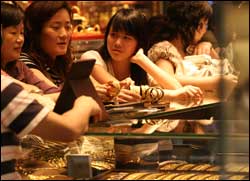 Hong Kong's image as a shoppers'
paradise has not been overly damaged by recent scandals, with the number of
visitors for the first six days of the Labor Day Golden Week soaring 20 percent,
the Tourism Commission said Friday. What damage was done was only noticeable in
the substantial drop in the number of mainlanders arriving in the SAR on group
tours. The commission said the number of mainlanders arriving in the first six
days increased 24 percent to 355,681, accounting for 61.7 percent of the total
576,752 arrivals. However, it said those traveling in tour groups fell 13.5
percent to 20,996 during the period, while those visiting independently jumped
43.5 percent to 238,442. The increase in the number of tourists came despite a
number of negative press reports on Hong Kong tourism that followed a China
Central Television expose last month which accused two local shops of deceiving
mainland visitors by selling counterfeit products passed off as luxury goods.
Since then the SAR and central governments have worked together to stamp out
dishonest retailers. Li Gang, deputy director of the Central Government Liaison
Office, said the increase of tourists showed the recent measures had been
effective. "All the comments I have heard from the mainland tourists were
positive," Li said after a flag-raising ceremony at Golden Bauhinia Square in
Wan Chai to commemorate Youth Day. "I am confident the future development of
tourism will be very good." Meanwhile, Hong Kong police confirmed a report in
The Standard Friday that about 100 tourists were abandoned in Yau Ma Tei
Wednesday night after their tour guide absconded with their money. A police
spokesman said the tourists were found sitting outside a hotel at Temple Street,
Yau Mau Tei, around 3pm Thursday. "We knew they were tourists so we contacted
the tour agency. They have solved the dispute among themselves," the spokesman
said. Hong Kong's image as a shoppers'
paradise has not been overly damaged by recent scandals, with the number of
visitors for the first six days of the Labor Day Golden Week soaring 20 percent,
the Tourism Commission said Friday. What damage was done was only noticeable in
the substantial drop in the number of mainlanders arriving in the SAR on group
tours. The commission said the number of mainlanders arriving in the first six
days increased 24 percent to 355,681, accounting for 61.7 percent of the total
576,752 arrivals. However, it said those traveling in tour groups fell 13.5
percent to 20,996 during the period, while those visiting independently jumped
43.5 percent to 238,442. The increase in the number of tourists came despite a
number of negative press reports on Hong Kong tourism that followed a China
Central Television expose last month which accused two local shops of deceiving
mainland visitors by selling counterfeit products passed off as luxury goods.
Since then the SAR and central governments have worked together to stamp out
dishonest retailers. Li Gang, deputy director of the Central Government Liaison
Office, said the increase of tourists showed the recent measures had been
effective. "All the comments I have heard from the mainland tourists were
positive," Li said after a flag-raising ceremony at Golden Bauhinia Square in
Wan Chai to commemorate Youth Day. "I am confident the future development of
tourism will be very good." Meanwhile, Hong Kong police confirmed a report in
The Standard Friday that about 100 tourists were abandoned in Yau Ma Tei
Wednesday night after their tour guide absconded with their money. A police
spokesman said the tourists were found sitting outside a hotel at Temple Street,
Yau Mau Tei, around 3pm Thursday. "We knew they were tourists so we contacted
the tour agency. They have solved the dispute among themselves," the spokesman
said.
Hong Kong's
two rail operators have promised to speed up the second phase of the
installation of platform screen doors and automatic platform gates, the first
phase of which began 10 years ago.
Macau Chief
Executive Edmund Ho Hau-wah, in his first response to violent Labor Day
protests, stressed police were not trying to suppress protesters and that shots
had been fired only in response to what appeared to be an emergency situation.
Ho said Friday there was no attempt whatever to subdue the protesters and that
senior directors of the force had not instructed frontline police officers to
open fire during Tuesday's demonstration. Ho said police officers do not
normally open fire when handling peaceful demonstrations. The officer who fired
five shots into the air - resulting in a man surnamed Leung being struck by a
stray bullet - did so only after several protesters had fallen and were at the
risk of being trampled, Ho said. Calls made by the protesters, Ho said,
including those asking him to enact tougher laws and implement measures to
combat illegal labor, were rational and would be addressed by the Macau
government. But he said he would not rule out the possibility a minor group of
protesters had other political objectives and deliberately provoked the
demonstrators to act violently. He noted the management of the police force
would review its handling procedures in similar situations in future. Macau's
security police chief Lei Siu-peng had earlier described the violence as a riot.
He also described the shooting as an appropriate act in an emergency situation
so as to save lives. Ten demonstrators were arrested by police during the rally.
Twenty-one police officers were also injured.
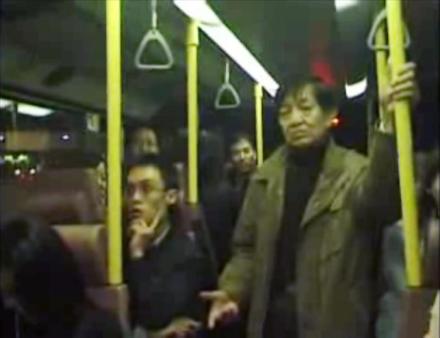 A worthy sequel to
the "Bus Uncle" episode has made its way onto the video sharing website YouTube.
A clip from the video shows the older man standing while the young man stays
put. A worthy sequel to
the "Bus Uncle" episode has made its way onto the video sharing website YouTube.
A clip from the video shows the older man standing while the young man stays
put.
Harbor activists have urged the
government to be more transparent in the tender process for the new government
headquarters on the Tamar site, as a special selection board will have absolute
discretion to choose the winning bid.
 China:
China recorded 19 million new mobile phone users, equivalent to the entire
population of Scandinavia, in the first three months of the year, the government
said on Friday. At the end of March, the number of Chinese mobile phone users
hit 480.7 million, up from 461.1 million at the end of last year, the Ministry
of Information Industry said. Fixed-line users increased to 371 million from
367.8 million during the period, the ministry said in a statement on its
website. The telecommunications industry earned revenue of 165.1 billion yuan in
the first three months, up 8.4 per cent year-on-year, according to the ministry.
China:
China recorded 19 million new mobile phone users, equivalent to the entire
population of Scandinavia, in the first three months of the year, the government
said on Friday. At the end of March, the number of Chinese mobile phone users
hit 480.7 million, up from 461.1 million at the end of last year, the Ministry
of Information Industry said. Fixed-line users increased to 371 million from
367.8 million during the period, the ministry said in a statement on its
website. The telecommunications industry earned revenue of 165.1 billion yuan in
the first three months, up 8.4 per cent year-on-year, according to the ministry.
Shareholders of Berkshire Hathaway
voted by a 50-1 margin against a resolution calling on the company to sell its
US$3.3 billion stake in PetroChina, Berkshire chairman Warren Buffett said.
Protesters claim the investment lets Berkshire profit from the business
activities of PetroChina's parent company, China National Petroleum Corp, in
Sudan, where the government has been accused of supporting genocide in its
Darfur region.
Some shrewd investors in China have
decided not to travel abroad during the golden week holiday, fearing they might
miss another high at the bullish market.
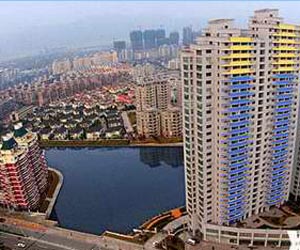 The price-to-rent ratio for
second-hand houses in some of China's big cities have gone over the
international warning line, said the 2007 real estate blue paper released by
China Academy of Social Sciences. The price-to-rent ratio, or the rent for one
sq. m. of floor space divided by its sales price, is an indicator of real estate
market move, said Shan Jingjing with the research center of urban development
and environment protection of CASS, adding that the lower the ratio is the
better the housing market does. A rapid increase of house prices combined with a
flat renting market can signal the onset of a bubble, said the researcher. The
report shows that the price of second hand houses in most large cities including
Beijing, Shenzhen, Shanghai and Hangzhou soared in 2006 while the renting price
were stable. In these cities' downtown areas, the ratio reached from 1:270 to
1:400, according to the report. "The international warning line is 1:200. Once
the ratio goes over the line, the market is in danger of a bubble," said Shan.
The researcher estimated that driven by strong demand and high land and new
house prices, China's second-hand house price would continue to rise with a
slower growing rate. The price-to-rent ratio for
second-hand houses in some of China's big cities have gone over the
international warning line, said the 2007 real estate blue paper released by
China Academy of Social Sciences. The price-to-rent ratio, or the rent for one
sq. m. of floor space divided by its sales price, is an indicator of real estate
market move, said Shan Jingjing with the research center of urban development
and environment protection of CASS, adding that the lower the ratio is the
better the housing market does. A rapid increase of house prices combined with a
flat renting market can signal the onset of a bubble, said the researcher. The
report shows that the price of second hand houses in most large cities including
Beijing, Shenzhen, Shanghai and Hangzhou soared in 2006 while the renting price
were stable. In these cities' downtown areas, the ratio reached from 1:270 to
1:400, according to the report. "The international warning line is 1:200. Once
the ratio goes over the line, the market is in danger of a bubble," said Shan.
The researcher estimated that driven by strong demand and high land and new
house prices, China's second-hand house price would continue to rise with a
slower growing rate.
The successful commissioning nearly
16 years ago of a 300 MW nuclear reactor in Qinshan, east China's Zhejiang
Province marked the birth of the country's nuclear power industry. Development
of the technology began actually earlier, dating back to the late 1970s.
China's banking sector hunger for talents - With the
opening of its banking sector, China now is seeking a great number of talents to
feed the gap between the sector's expanding business and insufficient human
resources, said a report on employment and human resources. Overall, 77 percent
of employer respondents on the Chinese mainland's banking industry said they
would hire more staff in the second quarter, up from 64 percent in the previous
quarter, according to the Hudson Report released on Thursday. The Hudson Report
is a quarterly survey of forward-looking employer hiring expectations. The
expectation to increase or decrease staffing levels is a key indicator of
employers' optimism about their market. China permitted foreign banks to operate
renminbi business from April this year, creating strong demand for experienced
candidates, said the report. The report pointed out that China continues to lead
Asian economies in hiring expectations and attributed this to the country's
rapid economic growth. This survey of 600 executives in key business sectors,
such as banking, consumer and manufacturing, shows that 59 percent plan to
increase headcount in the first quarter of 2007, up from 56 percent in the
previous quarter.
China Huadian Corporation, one of the country's major
power generators, said it had completed a new project in Zou County of the
eastern Shandong province to reclaim water that can satisfy the daily water
demand of 470,000 people. The water reclaiming facility was designed to treat
4,200 tons of wastewater per hour, including the industrial wastewater from the
power plant and the urban sewage. The whole system, the largest of its kind in
the country, is expected to produce 12 million tons of reclaimed water every
year after it is put into operation. The power generating sector is among the
six major industries that have long been blamed for heavy pollution to the
environment.
China has become Australia's biggest trading partner in
stead of Japan, according to latest figures. Exports and imports between China
and Australia reached about 52.7 billion Australian dollars (43.2 billion U.S.
dollars) in the 12 months to March, compared with trade with Japan of 50.6
billion dollars, (41.5 billion U.S. dollars), show figures from the Australian
Bureau of Statistics released Friday. Craig James, chief economist of Commsec,
Australia's leading Internet broker, said it is a significant development. "This
is clearly a red letter day in Australia's history," he was quoted by Australian
Broadcasting Corporation radio as saying. "For the first time, China is
Australia's largest trading partner," he said. "It's usually been the case that
Japan and the U.S. have vied for supremacy, but China has clearly passed Japan
as our biggest trading partner," he said. Meanwhile, the new figures also show
that Australia's trade deficit grew by 894 million dollars (733 million U.S.
dollars) in March to 1.6 billion dollars (1.3 billion U.S. dollars).
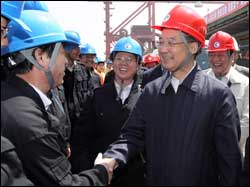 A huge
PetroChina (0857) discovery in Bohai Bay has increased the nation's oil reserves
by one fifth, pushed China past Libya to ninth in the world's oil reserve
rankings and significantly boosted the oil giant's share price and analysts'
outlook. The surging share price pushed PetroChina to overtake BP to become the
world's third-largest oil company by market capitalization, after ExxonMobil and
Royal Dutch Shell. But even though Premier Wen Jiabao called the find "the most
encouraging discovery in over 40 years" - giving him a "sleepless night" - the
high cost of development and the speed that oil can be obtained from the field
are a concern. The news also throws into doubt Berkshire Hathaway Inc's planned
divestment of its 13.35 percent H-share stake in PetroChina as the new oil
reserves have provided a positive boost to the mainland oil producer. Berkshire
Hathaway, controlled by the world's third wealthiest man, Warren Buffett, holds
an extraordinary general meeting this weekend in the United States to vote on
the divestment. Concerns have been raised over links of PetroChina's parent,
China National Petroleum Corp, to the Sudanese government, which has been
condemned for supporting genocide in Darfur. The value of Berkshire Hathaway's
stake in PetroChina has soared fivefold since 2003 when it is reported to have
acquired the shares at an average HK$1.60 apiece. Buffett has said he disagrees
with the divestment as he believes it would not help improve the situation in
Sudan. PetroChina shares rocketed 14 percent Friday to close at HK$10.16, with
1.18 billion shares changing hands for turnover of HK$11.7 billion - nearly four
times that of HSBC (0005), the second most actively traded stock. Meanwhile, the
top 20 gainers and nine out of the 10 losers in the warrants market are all
related to PetroChina, with one of the warrants issued by KBC Financial soaring
2,614 percent in one day. PetroChina announced Thursday its Jidong Nanpu field
in Bohai Bay contained "proven reserves" of 405.07 million tonnes of oil
equivalent, or nearly three billion barrels; "probable reserves" of 298 million
tonnes; and "possible reserves" of 202 million tonnes. It also has 111.6 million
tonnes of oil equivalent natural gas reserve. The reserve in Jidong Nanpu
oilfield is about 68 percent the size of Daqing oilfield - the mainland's
largest, which is also owned by PetroChina - according to Citigroup analyst
Graham Cunningham. "The discovery could transform PetroChina from a company
struggling to keep its oil production flowing to a company with strong crude
growth in the coming years," he added. Goldman Sachs also believes the new
discovery "should help address a recurring concern investors have had over the
past few years about declining oil production from Daqing oil field." A huge
PetroChina (0857) discovery in Bohai Bay has increased the nation's oil reserves
by one fifth, pushed China past Libya to ninth in the world's oil reserve
rankings and significantly boosted the oil giant's share price and analysts'
outlook. The surging share price pushed PetroChina to overtake BP to become the
world's third-largest oil company by market capitalization, after ExxonMobil and
Royal Dutch Shell. But even though Premier Wen Jiabao called the find "the most
encouraging discovery in over 40 years" - giving him a "sleepless night" - the
high cost of development and the speed that oil can be obtained from the field
are a concern. The news also throws into doubt Berkshire Hathaway Inc's planned
divestment of its 13.35 percent H-share stake in PetroChina as the new oil
reserves have provided a positive boost to the mainland oil producer. Berkshire
Hathaway, controlled by the world's third wealthiest man, Warren Buffett, holds
an extraordinary general meeting this weekend in the United States to vote on
the divestment. Concerns have been raised over links of PetroChina's parent,
China National Petroleum Corp, to the Sudanese government, which has been
condemned for supporting genocide in Darfur. The value of Berkshire Hathaway's
stake in PetroChina has soared fivefold since 2003 when it is reported to have
acquired the shares at an average HK$1.60 apiece. Buffett has said he disagrees
with the divestment as he believes it would not help improve the situation in
Sudan. PetroChina shares rocketed 14 percent Friday to close at HK$10.16, with
1.18 billion shares changing hands for turnover of HK$11.7 billion - nearly four
times that of HSBC (0005), the second most actively traded stock. Meanwhile, the
top 20 gainers and nine out of the 10 losers in the warrants market are all
related to PetroChina, with one of the warrants issued by KBC Financial soaring
2,614 percent in one day. PetroChina announced Thursday its Jidong Nanpu field
in Bohai Bay contained "proven reserves" of 405.07 million tonnes of oil
equivalent, or nearly three billion barrels; "probable reserves" of 298 million
tonnes; and "possible reserves" of 202 million tonnes. It also has 111.6 million
tonnes of oil equivalent natural gas reserve. The reserve in Jidong Nanpu
oilfield is about 68 percent the size of Daqing oilfield - the mainland's
largest, which is also owned by PetroChina - according to Citigroup analyst
Graham Cunningham. "The discovery could transform PetroChina from a company
struggling to keep its oil production flowing to a company with strong crude
growth in the coming years," he added. Goldman Sachs also believes the new
discovery "should help address a recurring concern investors have had over the
past few years about declining oil production from Daqing oil field."
China, Japan and South Korea have agreed to pool part of
their foreign- exchange reserves to prevent a repeat of the crisis that depleted
Asia's holdings a decade ago. China's Jin Renqing, Japan's Koji Omi and South
Korea's Kwon Okyu will join 10 finance ministers from Southeast Asia in Kyoto
Saturday to discuss combining some of the region's US$2.7 trillion (HK$21.06
trillion) in foreign reserves to help central banks shield their currencies from
unwelcome outflows of money. "We agree to further strengthen our efforts to
jointly explore ways for a Chiang Mai initiative multilateralization," the
ministers said in a joint statement in Kyoto Friday. The current arrangement,
which only allows for bilateral currency swaps, is named after the Thai city in
which the accord was forged in 2000. Broadening the initiative would allow the
region's governments, stung by conditions attached to loan packages by the
International Monetary Fund during the 1997-98 financial crisis, to reduce
reliance on the Washington-based agency. The unsuccessful defense of their
plunging exchange rates a decade ago depleted the reserves of Indonesia,
Thailand and South Korea, and prompted them to turn to the IMF to shore up their
finances. The IMF arranged over US$100 billion of loans to Thailand, Indonesia
and South Korea during the crisis after their currencies collapsed. In return,
governments were forced to cut spending, raise interest rates and sell
state-owned companies. Critics said the policies deepened the region's
recession, as higher borrowing costs hurt businesses and crimped domestic
consumption. The IMF, in a 1999 assessment of its handling of the crisis, said
it "badly misgauged" the severity of the collapse and acknowledged its fiscal
prescriptions for the three countries were too harsh. The region's holdings of
foreign reserves have since swelled. China's foreign-currency holdings grew by
US$1 million a minute in the first quarter to US$1.2 trillion, the most in the
world. Japan's foreign exchange reserves have doubled since 2000 to US$887.98
billion in March. South Korea's reserves are now the world's fifth largest,
surging to US$244 billion from US$7 billion in November 1997. The three
countries will also help aid the development of an Asian bond market, which
would allow governments to tap the region's US$1.5 trillion of savings to find
projects to build roads, power stations and sewage systems. At present Asia's
reserves are invested in the US bond market with investors from Japan, China,
Korea, Taiwan and Hong Kong owning a combined US$1.2 trillion of Treasuries.
Xinhua rejects US radio's charge -
Claims by official US broadcaster Voice of America that new rules covering the
way foreign media disseminate information on the mainland harm the foreign
players' interests have been rejected by Xinhua. A spokesman for Xinhua's
Foreign Information Administration Centre said foreign news agencies authorized
to release news on the mainland would be free of obstacles as long as they
abided by the new measures, state media reported yesterday. In theory, foreign
news agencies are not allowed to provide news and information to the mainland
media, which have by and large ignored the rule. However, the new measures
introduced last September state that approval must be sought from Xinhua. Last
month, Xinhua said four overseas news agencies were allowed to release news and
information on the mainland after they passed an annual assessment. They are
Reuters Asia, Jiji Press of Japan, ETNet of Hong Kong and a unit of Japan's
iNews Net Asia, NNA China Ltd. A report by VOA on May 1 said some foreign
reporters were concerned that the new measures would restrict foreign media
players' development on the mainland as authorities would only gave the green
light to organizations that bowed before Beijing. The VOA also quoted a
Beijing-based reporter from Japan's NHK network as saying the new measures "let
fertile water flow into Xinhua" because foreign agencies had to pay for a permit
from Xinhua's foreign information centre - a "commercial institution" - in order
to run their businesses. However, the Xinhua spokesman was quoted as saying:
"The centre is not a commercial institution at all. It is a managerial
department established by Xinhua with the authorization of the State Council.
"In the course of providing services, this agent department [Xinhua] neither
shares any profit nor seeks to promote its own interests." Under the 22 new
measures, Xinhua is the only institution authorized to approve foreign
organizations' release of news and information to mainland media. The new
measures state Xinhua has the sole right to select news and information released
by foreign news agencies on the mainland and will delete any material that
undermines the country's national unity, sovereignty or security.
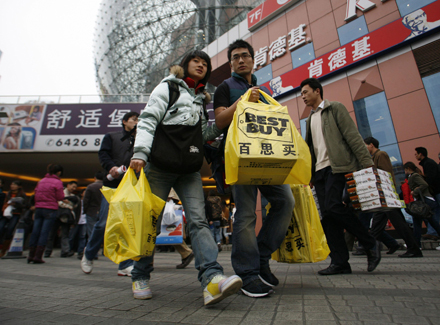 Shanghai's middle class may be embracing consumption, but mainlanders overall
are savers not spenders. For the central government, the country's overall
savings rate - which now stands at about 50 per cent of its gross domestic
product - has inhibited the mainland's evolution into a more mature,
consumption-based economy. For the retail sector and its growing cast of
investors, that thrift presents a major obstacle to unlocking the potential
buying power of mainland consumers. For Beijing's main trading partners, a
decline in savings would provide an easy fix to its huge current account
surplus. Yet even as the calls for a spendthrift mainland have grown louder, the
nation's savings deposits have topped 16 trillion yuan while consumption has
dropped as a percentage of the overall economy. Three recent papers by some of
the top experts on the mainland's economy suggest a significant fall in the
savings rate is unlikely anytime soon. "The high savings rate is not a temporary
problem," says Sun Lijian, an economics professor at Fudan University. "It is a
structural problem." In a historical sense, the mainland's penchant for savings
is a relatively new phenomenon. Until economic reforms began in 1978, household
savings stood at only about 5 per cent of disposable income; by the mid-1990s,
that figure had climbed to 30 per cent, and was widely credited for helping fuel
the country's rapid growth. Household savings have since dipped slightly, to
about 25 per cent, but still remain significantly higher than those of virtually
any other country in the world.
Shanghai's middle class may be embracing consumption, but mainlanders overall
are savers not spenders. For the central government, the country's overall
savings rate - which now stands at about 50 per cent of its gross domestic
product - has inhibited the mainland's evolution into a more mature,
consumption-based economy. For the retail sector and its growing cast of
investors, that thrift presents a major obstacle to unlocking the potential
buying power of mainland consumers. For Beijing's main trading partners, a
decline in savings would provide an easy fix to its huge current account
surplus. Yet even as the calls for a spendthrift mainland have grown louder, the
nation's savings deposits have topped 16 trillion yuan while consumption has
dropped as a percentage of the overall economy. Three recent papers by some of
the top experts on the mainland's economy suggest a significant fall in the
savings rate is unlikely anytime soon. "The high savings rate is not a temporary
problem," says Sun Lijian, an economics professor at Fudan University. "It is a
structural problem." In a historical sense, the mainland's penchant for savings
is a relatively new phenomenon. Until economic reforms began in 1978, household
savings stood at only about 5 per cent of disposable income; by the mid-1990s,
that figure had climbed to 30 per cent, and was widely credited for helping fuel
the country's rapid growth. Household savings have since dipped slightly, to
about 25 per cent, but still remain significantly higher than those of virtually
any other country in the world.
May 5 - 6, 2007
 Hong Kong:
HSBC Holdings (0005) said
Wednesday that listing on the Shanghai stock exchange will be the banking
conglomerate's target in the medium term as the mainland bourse is eager to
invite large foreign corporations to float shares to mop up excess liquidity
that has been worrying the central government. Hong Kong:
HSBC Holdings (0005) said
Wednesday that listing on the Shanghai stock exchange will be the banking
conglomerate's target in the medium term as the mainland bourse is eager to
invite large foreign corporations to float shares to mop up excess liquidity
that has been worrying the central government.
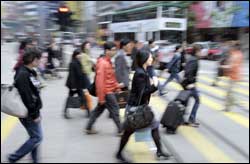 The government
collected a record HK$155 billion in tax revenue during the 2006-07 fiscal year,
it was revealed Wednesday. Commissioner for Inland Revenue Alice Lau Mak Yee-ming
said this was HK$10.1 billion, or 7 percent, higher than the previous year's tax
revenue. She attributed the increase to the rebounding economy, the extensive
improvement in the labor market and very active stock market transactions. Lau
said the biggest percentage growth was in stamp duty which, at HK$25 billion,
was 40 percent up on last year's HK$17 billion. "We attribute this to the
soaring stock market in 2006-07. The stamp duty on stocks alone was HK$15
billion, which was equivalent to 60 percent of the total sum and 250 percent
higher than the stamp duty on stocks collected during 1997-98," Lau said.
Average daily turnover on the stock market in 2006-07 was HK$40 billion, though
on some occasions it reached as high as HK$80 billion. However, Lau said the
department was taking a conservative approach and projecting a drop of around 10
percent on stamp duty for the next fiscal year. Overall, the department is
estimating a drop of 4 percent to HK$148.9 billion in total revenue for 2007-
08. Income from profits tax rose 3 percent to HK$71.9 billion, while income on
salaries tax also grew 3 percent to HK$38.6 billion. The department was
projecting an 8 percent increase in profits tax for 2007-08.
Stamp duty revenues for the 2006-07 financial year soared
40 percent to HK$25.077 billion, compared to HK$17.867 billion in 2005-06. The government
collected a record HK$155 billion in tax revenue during the 2006-07 fiscal year,
it was revealed Wednesday. Commissioner for Inland Revenue Alice Lau Mak Yee-ming
said this was HK$10.1 billion, or 7 percent, higher than the previous year's tax
revenue. She attributed the increase to the rebounding economy, the extensive
improvement in the labor market and very active stock market transactions. Lau
said the biggest percentage growth was in stamp duty which, at HK$25 billion,
was 40 percent up on last year's HK$17 billion. "We attribute this to the
soaring stock market in 2006-07. The stamp duty on stocks alone was HK$15
billion, which was equivalent to 60 percent of the total sum and 250 percent
higher than the stamp duty on stocks collected during 1997-98," Lau said.
Average daily turnover on the stock market in 2006-07 was HK$40 billion, though
on some occasions it reached as high as HK$80 billion. However, Lau said the
department was taking a conservative approach and projecting a drop of around 10
percent on stamp duty for the next fiscal year. Overall, the department is
estimating a drop of 4 percent to HK$148.9 billion in total revenue for 2007-
08. Income from profits tax rose 3 percent to HK$71.9 billion, while income on
salaries tax also grew 3 percent to HK$38.6 billion. The department was
projecting an 8 percent increase in profits tax for 2007-08.
Stamp duty revenues for the 2006-07 financial year soared
40 percent to HK$25.077 billion, compared to HK$17.867 billion in 2005-06.
Hang Seng Bank (0011), the second-
largest bank in Hong Kong by assets, said Wednesday it may acquire a Chinese or
Hong Kong insurance company to meet the assets requirement for setting up a unit
in the mainland this year.
The new director-general of the
Federation of Hong Kong Industries plans to ask the government to set up an
environmental protection industrial park in the Pearl River Delta - known as the
"workshop of the world" - to help Hong Kong manufacturers meet the mainland's
environmental requirements.
Scholars have divergent views on the
future of Macau following Tuesday's violent protest march in which one person
was struck by a bullet, with some suggesting the government could learn
something from Hong Kong and others expecting a short-term bounce back. A Macau
police officer with 15 years' experience fired five shots skyward in a bid to
defuse a rowdy demonstration during which protesters demanded tougher laws
against illegal workers and an end to corruption. Macau police Wednesday
confirmed the 50-year-old motorcyclist who was injured 300 meters away from the
shooting had been struck by a bullet from a 38-caliber revolver, a gun used by
Macau police. Camoes Tam Chi-keung, an assistant professor at Macau
Inter-University Institute, said corruption within the housing sector was partly
to blame for the crowd's anger - an issue that was highlighted last year with
the arrest of former secretary for transport and public works Ao Man-long.
"There are simply no land reserves for the next 20 years, and future chief
executives will not have suitable land on which to build public housing. "They
all went down the drain with Ao," Tam said. Investigators last month alleged the
former minister had amassed a total of 800 million patacas (HK$777 million) in
cash and assets, amounting to 50 times his legal income for the seven years he
served. Tam said another core issue was the government's delay in executing
policies designed to ease escalating housing prices.
Chief
Executive Donald Tsang Yam- kuen is expected to unveil today a revamp of the
government structure, expanding his ruling team to 12 with the creation of a
Development Bureau, and raising pay for the whole team back to 2003 levels.
Local
retailers expect their revenues to climb - some by more than 10 percent - during
the May Day Golden Week despite the recent bad publicity triggered by a China
Central Television report which accused two Hong Kong shops of cheating mainland
tourists by selling fake products.
Two small Hong Kong-listed firms,
Oriental Investment Corp and Catic International Holdings, are raising at least
HK$824 million from share placements, taking advantage of the bull run in their
share prices and investor demand for small stocks, sources said.
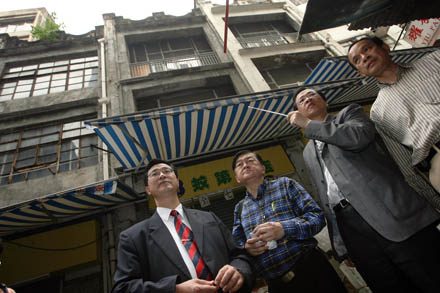 Checking out the site for the
Central redevelopment in Peel Street yesterday are social worker Kam Nai-wan
(left), district councillor Yuen Bun-keung, conservation official Stephen Chan
and Cheng Po-hung, manager of Commonwealth Collections.
Checking out the site for the
Central redevelopment in Peel Street yesterday are social worker Kam Nai-wan
(left), district councillor Yuen Bun-keung, conservation official Stephen Chan
and Cheng Po-hung, manager of Commonwealth Collections.
Chief
Executive Donald Tsang Yam-kuen on Thursday revealed plans to overhaul policy
bureaus and their duties. The biggest change under the plan is formation of a
new bureau, taking the number of policy bureaus to 12. Mr Tsang told a
Legislative Council question and answer session that the new bureau would be
established to oversee development, planning, lands and heritage conservation.
''The re-organization aims to rationalize the distribution of responsibilities
between policy bureaus,'' Mr Tsang explained. Eight of the 11 existing policy
bureaus would undergo a substantial reshuffle of duties. The social welfare
portfolio will be merged with labour, while environment will take in the energy
portfolio to form a bureau. Mr Tsang said education and manpower would be split
in order to allow a bureau to specifically deal with education. Another bureau
will handle housing and transport. ''Putting related responsibilities under one
bureau will help optimise the synergy and enable the government to sharpen its
focus on important and complex issues,'' he added. The Constitutional Affairs
Bureau will be charged with handling mainland affairs. It will also take over
human rights issues from the Home Affairs Bureau. Three bureaus - Security,
Financial Services and the Treasury - as well as Civil Service will remain
unaffected. The changes go into effect on July 1, when Mr Tsang begins his
second term. He said his plan was designed to meet rising public expectations
and would help the government implement policy on important issues.
Hong Kong's second-highest Mark 6
prize - worth HK$70 million - would be drawn on Thursday night, the Hong Kong
Jockey Club said. The club explained on its website on Thursday that the payout
was so high because money from previous draws had been carried forward. ''Since
there have been no first prize winners for the past six Mark Six draws, a
jackpot of more than HK$50 million will be carried forward to the draw,'' the
club said. ''HKJC Lotteries estimates that, if there is only one winning unit
for the first prize, the payout could reach HK$70 million, the second-highest
payout in Mark Six history. Thursday night's top prize will come close to the
largest Mark 6 payout ever. In September 2003, HK$70,962,580 was won. A recent
big payout came in September last year when one person won more than HK$61
million with a single-entry lucky dip. Thursday night's draw will be broadcast
live at 9.30pm on ATV Home. The Mark 6 is managed by the Hong Kong Jockey Club
Lotteries.
Hong Kong residents were more worried about security than many other people in
the Asia-Pacific - even though the city was often called one of the world's
safest, a survey released on Thursday has found.
Las Vegas Sands, the casino company
run by billionaire Sheldon Adelson, on Wednesday said its net profit for the
first quarter fell 25 per cent from a year earlier, saying expenses increased
due to planned casino openings in Macau, Singapore and the United States.
Tom Online advised its minority
shareholders to accept the HK$1.6 billion privatisation scheme by its parent
company, Tom Group, according to the scheme of arrangement document sent
yesterday.
 China:
The Chinese mainland is considering opening six more
airports to non-stop charter flights across the Taiwan Strait to cope with
rising passenger traffic, a senior civil aviation official has said.
China:
The Chinese mainland is considering opening six more
airports to non-stop charter flights across the Taiwan Strait to cope with
rising passenger traffic, a senior civil aviation official has said.
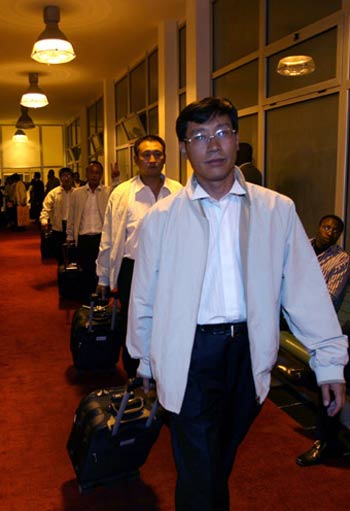 Seven Chinese oil workers kidnapped in a rebels raid on an oilfield in Ethiopia
last Tuesday go on board for home at an airport in Addis Ababa, capitall of of
Ethiopia May 2, 2007. They were released earlier on April 30.
Seven Chinese oil workers kidnapped in a rebels raid on an oilfield in Ethiopia
last Tuesday go on board for home at an airport in Addis Ababa, capitall of of
Ethiopia May 2, 2007. They were released earlier on April 30.
US Treasury Secretary Henry Paulson
pinned hopes on upcoming visit to Washington by Vice-Premier Wu Yi to achieve
agreements on trade and economic integration.
Chinese Foreign Minister Yang
Jiechi announced in Egypt on Thursday that the Chinese government is ready to
substantially reduce and forgive the debts owed by Iraq.
 Black mud-clad visitors play at the Chinese Dead
Sea resort in Daying County, Suning in southwestern China's Sichuan province May
2, 2007. The mineral-rich black mud is thought to be good for the skin. The site
boasts a salt lake where the water contains minerals and salt reportedly nine
times higher than ordinary seawater, thus enabling people to float on the lake.
Black mud-clad visitors play at the Chinese Dead
Sea resort in Daying County, Suning in southwestern China's Sichuan province May
2, 2007. The mineral-rich black mud is thought to be good for the skin. The site
boasts a salt lake where the water contains minerals and salt reportedly nine
times higher than ordinary seawater, thus enabling people to float on the lake.
China's newly
found oilfield in Bohai Bay has a reserve of one billion tons, or about 7.35
billion barrels, the largest discovery in the country over four decades,
announced the China National Petroleum Corporation (CNPC) Thursday.
Chinese real
estate developers invested 1.938 trillion yuan (US$248.4b) in projects last
year, up 21.8 percent year on year, the Chinese Academy of Social Sciences
(CASS) has said.
China's
aggregate trade surplus was expected to surge 42.8 percent from the end of last
year to 254.03 billion US dollars in 2007 although exports might grow less
rapidly, a forecasting agency of the Chinese Academy of Sciences (CAS) has
predicted. The year's total exports were projected at 1.20 trillion US dollars,
up 23.7 percent year-on-year, compared with a rise of 27.2 percent last year.
Total imports were estimated around 946 billion US dollars, up 19.5 percent from
the previous year, said a CAS report. The surplus against the United States
would rose by 23.5 percent to 178.2 billion US dollars, with exports hitting
263.6 billion US dollars, up 29.8 percent year-on-year. The European Union would
remain to be the largest trade partner of China, recording imports of 239.3
billion U.S. dollars from China and exports of 111 billion US dollars. The
report released by the CAS's Center for Forecasting Sciences said that China
would export 29.2 percent more new high-tech products worth 363.6 billion US
dollars in total and import 20 percent more worth 296.7 billion US dollars. It
also predicted a slowdown in clothing, textile and shoe exports with their
annual growth rates ranging from 13.3 to 15.8 percent. Crude oil imports would
grow by a slower 4.8 percent to 69.6 billion US dollars. The import of refined
oil products would edge up only by 4.8 percent to 69.6 billion US dollars while
that of iron ore would surge by 47 percent to 30.75 billion US dollars, the
report said.
The Beijing
2008 Olympic Games will be a spur to Asia's tourism industry as many people
looking to attend the event also plan to spend time exploring other parts of
China and Asia, according to a recent industry survey. Almost nine out of 10
people planning to visit Beijing for the Olympics will visit other Chinese
cities if time permits, while three out of four will visit other destinations,
with Hong Kong the most likely stop, followed by Singapore and Japan. The annual
survey jointly conducted by the Pacific Asia Travel Association (PATA) and Visa
International Asia Pacific identified travelers from India, South Korea and the
United States as "the top three markets most likely to make the journey to the
Games." PATA President and CEO Peter de Jong said the 2008 Olympic Games would
not only be a draw card for Beijing but also generate inbound travel within
China and benefit neighboring destinations. "All markets in the region stand to
benefit from the Games," he said. The survey of the travel intention of more
than 5,000 people from 10 markets over the next two years has identified China
as one of the "five most popular destinations for those planning to visit Asia."
One in five said that the Beijing Olympic Games would be the primary reason for
their visit. Respondents who said they were likely to visit China listed the
fact that China was "a good place to shop" as a key feature. Tourism experts
have estimated that Beijing will receive 4.5 million tourists in 2008. The
number of overseas visitors to Beijing has grown by an average of 7 percent
annually since 2001, when the city won the right to host the 2008 Olympic Games,
official figures reveal. Industry analysts said that inbound spending by
visitors to the 2008 Olympic Games will reach US$4.5 billion. To maximize
potential economic benefits, the Beijing Organizing Committee for the Games has
mapped out a Beijing Olympics Action Plan to develop tourist products with
unique cultural flavors and to offer more shopping facilities for tourists and
athletes during the Olympic Games.
Shimao Group and China Resources
(Holdings) have earmarked a combined 4.4 billion yuan to buy sites in Beijing
and Wuhan as the land acquisition spree by mainland developers shows no sign of
abating.
Shares in Sohu.com, the mainland's
second-largest portal, tumbled 10 per cent in after-hours trading on the Nasdaq
Stock Market after first-quarter profit fell 26 per cent and the company gave
lower than expected guidance for second-quarter earnings.
May 4, 2007
 Hong Kong:
Dubai International Capital, owned by Sheikh Mohammed bin Rashid al- Maktoum,
the ruler of Dubai, said Tuesday it bought shares of HSBC Holdings (0005) for a
fund it manages. DIC did not release details of the purchase made by the US$2
billion (HK$15.6 billion) fund, but said the acquisition makes it "one of the
leading shareholders" in HSBC, Europe's biggest bank. The Global Strategic
Equities Fund, which raised cash from investors, including some from the world's
biggest oil exporting region, was established last year to invest in the world's
largest listed companies. "This is the first of many investments that will see
the fund investing about US$10 billion in global companies," DIC chief executive
Sameer al-Ansari said in a statement. The fund bought the stake over several
days last week, Anand Krishnan, DIC's chief operating officer, told Reuters.
"The risk on the downside is very, very low," Krishnan said. The fund is the
second Gulf Arab investor to announce a purchase of HSBC shares in the past
three weeks. Saudi Arabia's Saad Group said April 18 that it bought a 3.1
percent stake in the lender for 3.3 billion (HK$51.46 billion), which made Saudi
billionaire Maan al-Sanea the second-largest shareholder in HSBC. Shortly after,
Britain-based life insurer Legal & General increased its stake in HSBC to 3.81
percent, from 3.01 percent, bumping al- Sanea down to No3 spot. Barclays Bank -
HSBC's largest single shareholder - has also recently raised its stake, to 4.47
percent from 3.79 percent, by acquiring 80 million more shares. Hong Kong:
Dubai International Capital, owned by Sheikh Mohammed bin Rashid al- Maktoum,
the ruler of Dubai, said Tuesday it bought shares of HSBC Holdings (0005) for a
fund it manages. DIC did not release details of the purchase made by the US$2
billion (HK$15.6 billion) fund, but said the acquisition makes it "one of the
leading shareholders" in HSBC, Europe's biggest bank. The Global Strategic
Equities Fund, which raised cash from investors, including some from the world's
biggest oil exporting region, was established last year to invest in the world's
largest listed companies. "This is the first of many investments that will see
the fund investing about US$10 billion in global companies," DIC chief executive
Sameer al-Ansari said in a statement. The fund bought the stake over several
days last week, Anand Krishnan, DIC's chief operating officer, told Reuters.
"The risk on the downside is very, very low," Krishnan said. The fund is the
second Gulf Arab investor to announce a purchase of HSBC shares in the past
three weeks. Saudi Arabia's Saad Group said April 18 that it bought a 3.1
percent stake in the lender for 3.3 billion (HK$51.46 billion), which made Saudi
billionaire Maan al-Sanea the second-largest shareholder in HSBC. Shortly after,
Britain-based life insurer Legal & General increased its stake in HSBC to 3.81
percent, from 3.01 percent, bumping al- Sanea down to No3 spot. Barclays Bank -
HSBC's largest single shareholder - has also recently raised its stake, to 4.47
percent from 3.79 percent, by acquiring 80 million more shares.
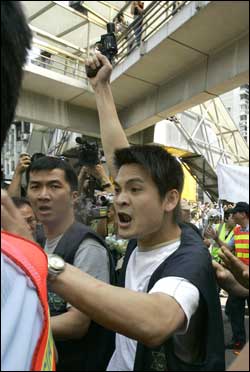 Macau police fired at least five shots into the air Tuesday in one of the most
violent rallies seen in the former Portuguese enclave since the handover in
1999, witnesses said. A labor demonstration demanding tougher laws against
illegal workers entering Macau erupted into a series of violent scuffles. Acting
security police chief Lei Sio- peng said one officer fired blank shots. "The
officer fired the shots with the aim of dispersing the crowd as he saw some
people starting to fall and feared they could trample each other. We see that as
a justified reason [to fire shots]," he said.
Macau police fired at least five shots into the air Tuesday in one of the most
violent rallies seen in the former Portuguese enclave since the handover in
1999, witnesses said. A labor demonstration demanding tougher laws against
illegal workers entering Macau erupted into a series of violent scuffles. Acting
security police chief Lei Sio- peng said one officer fired blank shots. "The
officer fired the shots with the aim of dispersing the crowd as he saw some
people starting to fall and feared they could trample each other. We see that as
a justified reason [to fire shots]," he said.
Hong Kong may soon be facing a threat to its status as the
primary capital- raising center in Greater China, as the Shanghai Stock Exchange
begins courting foreign firms and US listings of Chinese firms reach near-record
highs. "This is a potential threat the Hong Kong stock exchange needs to
monitor," said KGI Asia head of research Ben Kwong Man-bun. "As the China stock
market is very hot, it provides an opportunity for those companies to raise
funds there and get a higher valuation." The Shanghai Stock Exchange is in talks
with HSBC Holdings (0005) and other high-profile foreign companies to list
shares in the mainland, as part of its strategy to revive the stock exchange,
the Financial Times reported Tuesday, citing a senior official of the bourse.
The Shanghai exchange has held discussions with several foreign companies
including UK-based HSBC, James Liu Xiaodong, the exchange's executive vice
president, said in the article. "We have had discussions with HSBC [about a
listing] but what happens now is up to them," Liu said. "I don't know if we will
see it this year or next year, but in the long run, yes, no question it will
happen. We want overseas groups to list here." But no such listings are expected
in the short term and several technical issues still need to be resolved. The
chief executive of HSBC's Asia unit said last year the bank and its Hong
Kong-based subsidiary, Hang Seng Bank (0011), were interested in listing in
China. Bank of East Asia (0023) said earlier this year that it is planning to
become the first overseas lender to list in the mainland. "I don't think it
poses an immediate threat to the Hong Kong stock exchange, but over the long
term, with the further deregulation of the yuan and capital market [in China],
we will see more foreign companies showing interest in listing in China," Kwong
said. Meanwhile, initial public offerings in the United States of Chinese firms
may hit near-record levels this month, according to Thomson Financial, in
another development that sees mainland firms shunning the Hong Kong bourse. A
total of three Chinese firms are set to list on Nasdaq and the New York Stock
Exchange in May 2007. They are looking to raise a combined estimated total of
US$828 million (HK$6.46 billion), the highest monthly total in almost three
years.
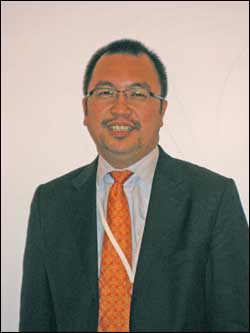 Companies in
Hong Kong and China are missing out on huge business opportunities in the Middle
East because of fear and lack of knowledge, says a Hong Kong business leader who
has been part of efforts to bring closer ties between the two regions. "Most
people will have a major reservation about it," said Hanson Cheah, chief
executive of Silkroad Capital, a Hong Kong-based private equity group. "They
perceive the Middle East as a war zone," he said on the sidelines of a
conference in Singapore. Cheah took part in a recent trade mission to Riyadh,
Saudi Arabia, and Dubai, in the United Arab Emirates, led by Financial Services
Secretary Frederick Ma Si-hing. "It's a perception issue," Cheah said. "People
have not traveled; they read the negative news in the newspaper." According to
Cheah, the safety issue in the Middle East is "not as crazy as what you think."
But "that perception is not going to go away." Ma's recent trip to the Middle
East will be followed by a delegation from Saudi Arabia that will visit Hong
Kong and Shanghai at the end of June. Companies in
Hong Kong and China are missing out on huge business opportunities in the Middle
East because of fear and lack of knowledge, says a Hong Kong business leader who
has been part of efforts to bring closer ties between the two regions. "Most
people will have a major reservation about it," said Hanson Cheah, chief
executive of Silkroad Capital, a Hong Kong-based private equity group. "They
perceive the Middle East as a war zone," he said on the sidelines of a
conference in Singapore. Cheah took part in a recent trade mission to Riyadh,
Saudi Arabia, and Dubai, in the United Arab Emirates, led by Financial Services
Secretary Frederick Ma Si-hing. "It's a perception issue," Cheah said. "People
have not traveled; they read the negative news in the newspaper." According to
Cheah, the safety issue in the Middle East is "not as crazy as what you think."
But "that perception is not going to go away." Ma's recent trip to the Middle
East will be followed by a delegation from Saudi Arabia that will visit Hong
Kong and Shanghai at the end of June.
Data and voice services provider
PCCW Global, a subsidiary of PCCW (0008), and China Network Communications have
signed a letter of intent to enable broadcasts of Olympic equestrian events in
Hong Kong to television viewers across the world.
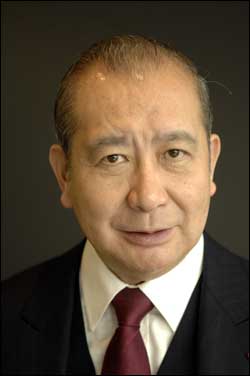 Banker-legislator David Li Kwok-po has topped this year's Honours List and will
be awarded the Grand Bauhinia Medal - the territory's highest honor - along with
four other luminaries. The five recipients, who also include retiring
Legislative Council president Rita Fan Hsu Lai-tai and prominent academic Chung
Chi-yung, are cited for their distinguished work in the social, political and
business fields, and for their lifelong contributions to Hong Kong. Li, 68,
chairman of the Bank of East Asia and also an executive councillor, earned
credit as campaign manager of Chief Executive Tsang Yam-kuen's successful
election campaigns in 2005 and in March this year. The philanthropist was
appointed a member of the Executive Council in October 2005 after abandoning his
British citizenship and is currently pro-chancellor of Hong Kong University. In
2001, Li was awarded the Gold Bauhinia Star by the SAR government, and in June
2005 he was conferred a Knight Bachelor by Britain for his contributions to
educational development.
Banker-legislator David Li Kwok-po has topped this year's Honours List and will
be awarded the Grand Bauhinia Medal - the territory's highest honor - along with
four other luminaries. The five recipients, who also include retiring
Legislative Council president Rita Fan Hsu Lai-tai and prominent academic Chung
Chi-yung, are cited for their distinguished work in the social, political and
business fields, and for their lifelong contributions to Hong Kong. Li, 68,
chairman of the Bank of East Asia and also an executive councillor, earned
credit as campaign manager of Chief Executive Tsang Yam-kuen's successful
election campaigns in 2005 and in March this year. The philanthropist was
appointed a member of the Executive Council in October 2005 after abandoning his
British citizenship and is currently pro-chancellor of Hong Kong University. In
2001, Li was awarded the Gold Bauhinia Star by the SAR government, and in June
2005 he was conferred a Knight Bachelor by Britain for his contributions to
educational development.
Close to
2,000 people in two marches took to the streets of Causeway Bay and Central
Tuesday, calling on the government to enact legislation on a minimum wage and
standard working hours and protesting against the unfair treatment being
experienced by contract workers.
Hong Kong
retailers have been given a confidence boost, with a top mainland official
playing down fears that the recent rash of bad publicity about unscrupulous
local shops will hurt business during the May Day "golden week," which began
Tuesday.
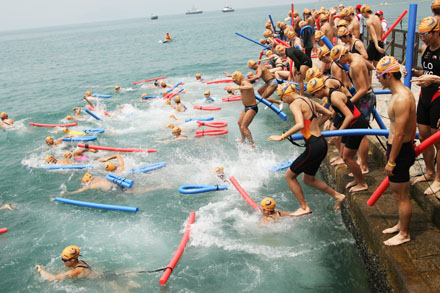 About 300 people
gather in Repulse Bay yesterday for the second Hong Kong 3,000 metres swim
safety campaign, organised by the Swimming Teachers' Association. Organisers
stressed the event was not a competition but aimed at increasing public
awareness of swimming safety. The youngest swimmer taking part was seven, the
oldest was 70, and the event also attracted 10 mentally handicapped people to
take the plunge. About 300 people
gather in Repulse Bay yesterday for the second Hong Kong 3,000 metres swim
safety campaign, organised by the Swimming Teachers' Association. Organisers
stressed the event was not a competition but aimed at increasing public
awareness of swimming safety. The youngest swimmer taking part was seven, the
oldest was 70, and the event also attracted 10 mentally handicapped people to
take the plunge.
The government on Wednesday reported a 7 per cent rise in tax revenue during the
past financial year on the back of higher salaries, company profits and
stock-market transactions.
 China:
A retreat into protectionism and isolationism would be
self-defeating and harm U.S. economy, Federal Reserve Chairman Ben Bernanke said
Tuesday.
China:
A retreat into protectionism and isolationism would be
self-defeating and harm U.S. economy, Federal Reserve Chairman Ben Bernanke said
Tuesday.
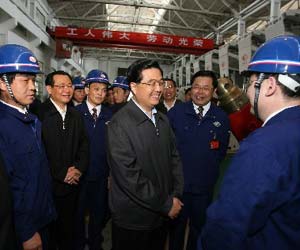 Chinese President Hu
Jintao talks with workers on the International Labor Day in central China's
Henan Province. Talking with some farmers in the wheat field in the outskirts of
Nanyang City, Hu assured them that the government will carry on the bottom price
for grain procurement, and the grain price this year will be no lower than that
in 2006. Chinese President Hu
Jintao talks with workers on the International Labor Day in central China's
Henan Province. Talking with some farmers in the wheat field in the outskirts of
Nanyang City, Hu assured them that the government will carry on the bottom price
for grain procurement, and the grain price this year will be no lower than that
in 2006.
China continued to widen its lead as the top trading
partner for two U.S. major ports last year, according to a study released on
Tuesday. Japan was the second trade partner of the ports of Los Angeles and Long
Beach in Southern California, to be followed by South Korea, according to the
study entitled "International Trade Trends and Impacts". The twin ports rank
fifth globally in container activity. They are expected to handle 17.2 million
containers by the end of 2007, a projected 9.2 percent increase from last year,
said Jack Kyser, chief economist of Los Angeles County Economic Development
Corp. International trade activity in Southern California is set to break a
record this year despite a slowdown in the nation's economy, said Kyser who
prepared the study. The total value of two-way trade at the Los Angeles Customs
District should grow to 375.1 billion dollars, a 13.9 percent increase from last
year, Kyser said. The Los Angeles Customs District recorded 329.4 billion
dollars worth of two-way trade last year, ranking it first in the United States,
according to Kyser.
One in every 16 Chinese mainland
workers last year was either self-employed or working for a domestically-owned
private company, marking a major expansion in China's private sector. The State
Administration for Industry and Commerce (SAIC) has reported 120 million people,
up 9.5 percent from 2005, worked in the private sector, excluding companies with
Hong Kong, Taiwan, Macao and foreign investment. About 9.3 percent of the
national tax revenue, 349.5 billion yuan, came from privately-owned firms last
year, up 28.7 percent from a year earlier and higher than the national average
tax revenue rise of 21.9 percent. The self-employed paid 119.5 billion yuan in
tax, accounting for 3.2 percent of the country's total. The SAIC said private
and individual businesses had maintained their expansion with aggregate output
for companies up 16.1 percent and for the self-employed up 9.4 percent. "Such
steady growth has alleviated the country's employment pressure," said an SAIC
statement. About 132 million new business entities run by the self-employed were
registered in 2006, up 5.4 percent from a year earlier, bringing the country's
total individual business to nearly 26 million. Their total assets grew by 11.4
percent, or 65.93 billion yuan, to 646.9 billion yuan, with the average assets
climbing by 1,343 yuan, or 5.7 percent, to 25,000 yuan. More than 80 percent of
individual business entities were engaged in the service sector, mainly
wholesale and retailing. (One U.S. dollar equals 7.73 yuan.)
 Fu Han, lead singer of
Beijing-based Queensea Big Shark, on the Main Stage at the 2007 Midi Music
Festival in Beijing on Tuesday, May 1, 2007. The Midi Music Festival is widely
known as China's largest outdoor music event. Ninety bands and 57 musicians from
China and abroad will perform across five stages this year.
Fu Han, lead singer of
Beijing-based Queensea Big Shark, on the Main Stage at the 2007 Midi Music
Festival in Beijing on Tuesday, May 1, 2007. The Midi Music Festival is widely
known as China's largest outdoor music event. Ninety bands and 57 musicians from
China and abroad will perform across five stages this year.
 Cargo ships wait to pass a ship
lock during trial navigation at the Three Gorges Dam in central China's Hubei
Province April 30, 2007. The dual-track ship lock of the Three Gorges Dam will
fully reopen to traffic on May 1 after more than seven months' construction and
trial operations.
Cargo ships wait to pass a ship
lock during trial navigation at the Three Gorges Dam in central China's Hubei
Province April 30, 2007. The dual-track ship lock of the Three Gorges Dam will
fully reopen to traffic on May 1 after more than seven months' construction and
trial operations.
Passengers
traveling on Beijing's new No. 5 subway line in 2008 will be able to watch live
coverage of the Olympic Games. The subway line, under construction for the last
four years, will have a transmitter every 200 meters that can receive
above-ground TV signals, said Ding Shukui, assistant general manager of Beijing
Railway Construction and Management Co. Ltd. The locomotive and the last
carriage on the train will be equipped with receivers that can transmit signals
to the eight liquid crystal TV sets in each carriage, said Ding. The new subway
line also provides passengers with good access to mobile phone signals, which
are patchy on the other subway lines. The No. 5 north-south subway line, which
runs from Taipingzhuang North Station in northern Beijing's Changping district
to Songjiazhuang Station in southern Fengtai district, will go into operation in
September.
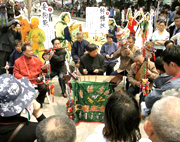 Traditional Chinese musicians
perform at a temple fair on Wednesday on in Shanghai. May Day, on May 1, is
traditionally the day to honor workers, but in modern communist China the day
kicks off a week-long Golden Week holiday which the government hopes will
encourage its citizens to travel and spend, thereby boosting the economy. Traditional Chinese musicians
perform at a temple fair on Wednesday on in Shanghai. May Day, on May 1, is
traditionally the day to honor workers, but in modern communist China the day
kicks off a week-long Golden Week holiday which the government hopes will
encourage its citizens to travel and spend, thereby boosting the economy.
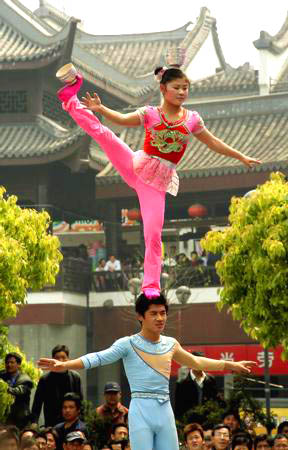 Traditional acrobatic dancers perform at a temple fair in Shanghai as May Day
marks the start of the Golden Week holiday, which the government hopes will
encourage people to boost the economy by travelling and spending.
Traditional acrobatic dancers perform at a temple fair in Shanghai as May Day
marks the start of the Golden Week holiday, which the government hopes will
encourage people to boost the economy by travelling and spending.
China had
formally banned trading in human organs state media reported on Wednesday amid
allegations that the nation is heavily involved in harvesting body parts from
executed prisoners.
May 3, 2007
 Hong Kong:
The number of chartered financial analysts soared from about 200 in 1995 to more
than 3, 600 now, ranking first in Asia and fourth globally, Secretary for
Financial Services & the Treasury Frederick Ma said Monday. In his latest FSTB &
You article on the bureau's website, Ma said Hong Kong's pool of hardworking
financial talent is the key factor contributing to the city's success as a
world-acclaimed international financial hub. "This has been conducive to
attracting capital and investors from around the world to make use of our
capital market. At present, Hong Kong boasts more than 26,000 certified public
accountants and 50,000 insurance intermediaries," he said. Competition in the
financial services industry has become increasingly keen in light of
globalization in recent years, making the nurturing of talent even more
important. To maintain Hong Kong's competitive edge as an international
financial center, the Advisory Committee on Human Resources Development in the
Financial Services Sector was set up in 2000 to foster better co-ordination of
efforts between the industry and academia on financial services manpower
development. Noting the emerging economic importance of China and the rapid
development of Asia as a whole have brought unprecedented opportunities to Hong
Kong's financial services industry, Ma called on young people to equip
themselves fully by developing language and communication skills, broadening
their horizon, committing to life-long learning and acquiring a mindset of "
thinking outside the box". Hong Kong:
The number of chartered financial analysts soared from about 200 in 1995 to more
than 3, 600 now, ranking first in Asia and fourth globally, Secretary for
Financial Services & the Treasury Frederick Ma said Monday. In his latest FSTB &
You article on the bureau's website, Ma said Hong Kong's pool of hardworking
financial talent is the key factor contributing to the city's success as a
world-acclaimed international financial hub. "This has been conducive to
attracting capital and investors from around the world to make use of our
capital market. At present, Hong Kong boasts more than 26,000 certified public
accountants and 50,000 insurance intermediaries," he said. Competition in the
financial services industry has become increasingly keen in light of
globalization in recent years, making the nurturing of talent even more
important. To maintain Hong Kong's competitive edge as an international
financial center, the Advisory Committee on Human Resources Development in the
Financial Services Sector was set up in 2000 to foster better co-ordination of
efforts between the industry and academia on financial services manpower
development. Noting the emerging economic importance of China and the rapid
development of Asia as a whole have brought unprecedented opportunities to Hong
Kong's financial services industry, Ma called on young people to equip
themselves fully by developing language and communication skills, broadening
their horizon, committing to life-long learning and acquiring a mindset of "
thinking outside the box".
Macao's exports saw a year-on-year
drop of 22.4 percent while imports saw a year-on-year rise of 16.7 percent in
March, according to official statistics issued on Monday. The figures released
by the government-run Statistics and Census Services (SCS) showed that textile
and garment exports, which accounted for 62.0 percent of Macao's total export
value in the month, witnessed a year-on-year drop of 26.3 percent. The United
States and the European Union remained as Macao's major export markets in the
period, jointly making up 57.4 percent of the total export value, the figures
showed. Meanwhile, the region's major suppliers of imported goods remained
mainly in Asia, the statistics displayed.
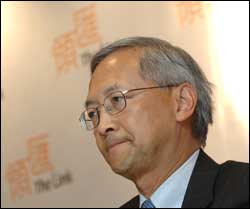 Ending intense speculation over his tenure, the chief executive of The Link Real
Estate Investment Trust (0823) said Monday he is stepping down for health
reasons, becoming the third senior executive to leave the property trust this
year. Victor So Hing-woh announced he will not commit to another three-year term
as The Link's chief executive after his contract expires July 15. "I obtained
medical advice to take more rest as I am suffering from gout. I am still
recovering from surgery in February," So said. So's resignation follows the
departure of chairman Paul Cheng Ming- fun April 1, also for personal reasons.
In February, finance director Thomas Pang Pui-yin headed for the exit. New
chairman Nicholas Sallnow- Smith denied a local Chinese-language newspaper
report that So's departure is linked to growing pressure from The Link's biggest
individual shareholder, British hedge fund The Children's Fund Investment
Management, to improve earnings. The report said So has found it difficult to
entertain repeated demands from TCI for significant rent increases and had
decided to quit. Last July, TCI, which holds an 18.35 percent stake in The Link,
realized its wish to have a greater say in the property trust when it secured
approval to name a representative to the board. It promptly dispatched TCI
director John Ho Chi-on as a non-executive director. Sallnow-Smith, however,
dismissed reports of disagreements in the company's hierarchy. He also denied
plans to offload some of the shopping centers. The Link is made up of 180
shopping arcades and car parks previously owned by the Hong Kong Housing
Authority.
Ending intense speculation over his tenure, the chief executive of The Link Real
Estate Investment Trust (0823) said Monday he is stepping down for health
reasons, becoming the third senior executive to leave the property trust this
year. Victor So Hing-woh announced he will not commit to another three-year term
as The Link's chief executive after his contract expires July 15. "I obtained
medical advice to take more rest as I am suffering from gout. I am still
recovering from surgery in February," So said. So's resignation follows the
departure of chairman Paul Cheng Ming- fun April 1, also for personal reasons.
In February, finance director Thomas Pang Pui-yin headed for the exit. New
chairman Nicholas Sallnow- Smith denied a local Chinese-language newspaper
report that So's departure is linked to growing pressure from The Link's biggest
individual shareholder, British hedge fund The Children's Fund Investment
Management, to improve earnings. The report said So has found it difficult to
entertain repeated demands from TCI for significant rent increases and had
decided to quit. Last July, TCI, which holds an 18.35 percent stake in The Link,
realized its wish to have a greater say in the property trust when it secured
approval to name a representative to the board. It promptly dispatched TCI
director John Ho Chi-on as a non-executive director. Sallnow-Smith, however,
dismissed reports of disagreements in the company's hierarchy. He also denied
plans to offload some of the shopping centers. The Link is made up of 180
shopping arcades and car parks previously owned by the Hong Kong Housing
Authority.
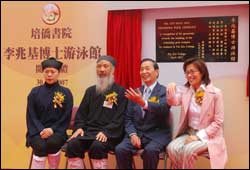 Henderson Land Development (0012) chairman Lee Shau-kee, dubbed "Asia's Warren
Buffett" because of his prowess at picking stocks, warns that investors -
especially mainland ones - may get burned if they lose all sense in their rush
to get rich quick from share trading. He noted that lately, mainland retail
investors have been opening stock trading accounts at a rate of up to 100,000 a
day, and some were borrowing from the bank as well as using their savings to
plow money into the market. With so many buyers, share prices could go in only
one direction. "It will definitely push share [prices] too high and will affect
the economy," Lee said Monday. The Shanghai Composite Index has jumped about 44
percent so far this year. It reached new heights Monday, rising 2.17 percent to
3,841.272 points. This despite China's central bank ordering mainland banks
Sunday to increase their reserves to reduce lending in an effort to cool the
stock market boom. The benchmark CSI 300 stock index, which tracks A shares in
both Shanghai and Shenzhen, has soared about 70 percent to date this year. "It's
getting a bit crazy," Lee added. The mainland's share trading fever was now
affecting the Hong Kong stock market, although investors here were more
rational. The tycoon repeated comments he made in March, saying it was safer to
buy when the Hang Seng Index was at 18,000 points, whereas buying while it was
nearing 22,000 points was risky. "Within this range, you need to balance whether
to buy or not," Lee said, following a ceremony to open a swimming pool named
after him at Pui Kiu College in Tai Wai. Too many investors, he said, were
blinded by the appealing prospect of waking up the next day to find themselves
richer. Instead, they should be patient and take a long-term approach. "Buying
shares cheaply and putting them aside to wait for them [to go up in price] is a
stable investment," Lee said.
Henderson Land Development (0012) chairman Lee Shau-kee, dubbed "Asia's Warren
Buffett" because of his prowess at picking stocks, warns that investors -
especially mainland ones - may get burned if they lose all sense in their rush
to get rich quick from share trading. He noted that lately, mainland retail
investors have been opening stock trading accounts at a rate of up to 100,000 a
day, and some were borrowing from the bank as well as using their savings to
plow money into the market. With so many buyers, share prices could go in only
one direction. "It will definitely push share [prices] too high and will affect
the economy," Lee said Monday. The Shanghai Composite Index has jumped about 44
percent so far this year. It reached new heights Monday, rising 2.17 percent to
3,841.272 points. This despite China's central bank ordering mainland banks
Sunday to increase their reserves to reduce lending in an effort to cool the
stock market boom. The benchmark CSI 300 stock index, which tracks A shares in
both Shanghai and Shenzhen, has soared about 70 percent to date this year. "It's
getting a bit crazy," Lee added. The mainland's share trading fever was now
affecting the Hong Kong stock market, although investors here were more
rational. The tycoon repeated comments he made in March, saying it was safer to
buy when the Hang Seng Index was at 18,000 points, whereas buying while it was
nearing 22,000 points was risky. "Within this range, you need to balance whether
to buy or not," Lee said, following a ceremony to open a swimming pool named
after him at Pui Kiu College in Tai Wai. Too many investors, he said, were
blinded by the appealing prospect of waking up the next day to find themselves
richer. Instead, they should be patient and take a long-term approach. "Buying
shares cheaply and putting them aside to wait for them [to go up in price] is a
stable investment," Lee said.
HSBC Holdings
(0005) has finalized the sale of its London headquarters in Canary Wharf for
1.09 billion pounds (HK$17.03 billion), the largest single property deal in
British history.
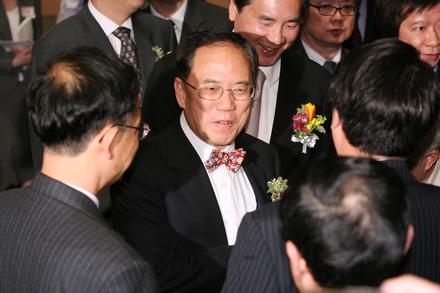 Donald Tsang attends a Labour Day
reception hosted by the Economic Development and Labour Bureau at the Convention
and Exhibition Centre yesterday. Chief Executive Donald Tsang Yam-kuen yesterday
pledged a full-scale change in the government's attitude to policymaking, with
public opinion at the core of its new approach. Donald Tsang attends a Labour Day
reception hosted by the Economic Development and Labour Bureau at the Convention
and Exhibition Centre yesterday. Chief Executive Donald Tsang Yam-kuen yesterday
pledged a full-scale change in the government's attitude to policymaking, with
public opinion at the core of its new approach.
Beijing's gifts of two giant pandas
to Hong Kong has paid off, with a survey showing people's satisfaction with
state policy towards the city surging to a 12-month high.
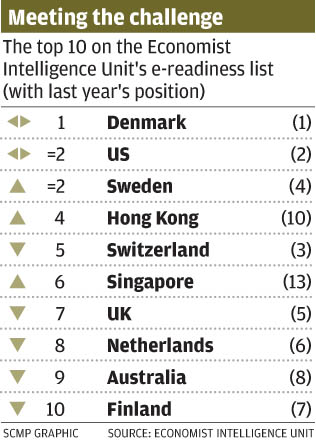 Hong Kong has jumped to fourth place in a global survey on
e-readiness - systems in place for running business electronically -
outperforming neighbours like Singapore (6th) and Japan (18th). Only Denmark,
which was ranked first, and the United States and Sweden, which tied for second,
were above Hong Kong in the rankings put together by the Economist Intelligence
Unit. The rankings are prepared using six categories, with the most weight given
to consumer and business adoption of e-technology (25 per cent), followed by
connectivity and infrastructure (20 per cent). The business environment, social
and cultural environment, and government policy and vision were all given 15 per
cent each, while legal and policy environment accounted for 10 per cent of the
total weighting. The Economist Intelligence Unit said Hong Kong's rise was due
to the government's "vision and commitment in pushing digital development" and
the continued adoption of broadband and other advanced infrastructure. Last
year, Hong Kong was ranked 10th out of 69 places. The mainland ranked 56th, a
slot higher than in last year's rankings, while Taiwan rated 17th in 2007
rankings. Billy Yeung Tak-wa, managing director of Y5Zone, which has 280 WiFi
"hot spots" around the city, said he was surprised Singapore, South Korea and
Japan were not ranked higher because of their emphasis on technological
development. "The survey doesn't reflect how important this is and Hong Kong
still has a way to go before they can catch up to these countries," he said.
"But in terms of infrastructure and business adoption of e-technology, we are
definitely on top of the list." The government recently pledged HK$210 million
over the next two years to install WiFi - as wireless internet is more commonly
known - in more than 200 venues across the city including all libraries, major
cultural and recreation centres and government offices. "Hong Kong people really
are walking robots, carrying at the very least a phone but usually a PDA or
laptop as well," Mr Yeung said. "Nowadays, if you had a choice between losing
your wallet or mobile phone, most people would keep the phone." Internet Society
chairman Charles Mok Nai-kwong, who has just returned from Britain, which
slipped from 5th to 7th place this year, said there was no doubt Hong Kong was
one of the most e-prepared places on the planet. "We are far better than London;
but just because we are e-prepared, it does not mean we are there yet," Mr Mok
said. "We have to make the next step and make sure businesses, especially small
and medium-sized enterprises, know how they can make the most of these
advantages."
Hong Kong has jumped to fourth place in a global survey on
e-readiness - systems in place for running business electronically -
outperforming neighbours like Singapore (6th) and Japan (18th). Only Denmark,
which was ranked first, and the United States and Sweden, which tied for second,
were above Hong Kong in the rankings put together by the Economist Intelligence
Unit. The rankings are prepared using six categories, with the most weight given
to consumer and business adoption of e-technology (25 per cent), followed by
connectivity and infrastructure (20 per cent). The business environment, social
and cultural environment, and government policy and vision were all given 15 per
cent each, while legal and policy environment accounted for 10 per cent of the
total weighting. The Economist Intelligence Unit said Hong Kong's rise was due
to the government's "vision and commitment in pushing digital development" and
the continued adoption of broadband and other advanced infrastructure. Last
year, Hong Kong was ranked 10th out of 69 places. The mainland ranked 56th, a
slot higher than in last year's rankings, while Taiwan rated 17th in 2007
rankings. Billy Yeung Tak-wa, managing director of Y5Zone, which has 280 WiFi
"hot spots" around the city, said he was surprised Singapore, South Korea and
Japan were not ranked higher because of their emphasis on technological
development. "The survey doesn't reflect how important this is and Hong Kong
still has a way to go before they can catch up to these countries," he said.
"But in terms of infrastructure and business adoption of e-technology, we are
definitely on top of the list." The government recently pledged HK$210 million
over the next two years to install WiFi - as wireless internet is more commonly
known - in more than 200 venues across the city including all libraries, major
cultural and recreation centres and government offices. "Hong Kong people really
are walking robots, carrying at the very least a phone but usually a PDA or
laptop as well," Mr Yeung said. "Nowadays, if you had a choice between losing
your wallet or mobile phone, most people would keep the phone." Internet Society
chairman Charles Mok Nai-kwong, who has just returned from Britain, which
slipped from 5th to 7th place this year, said there was no doubt Hong Kong was
one of the most e-prepared places on the planet. "We are far better than London;
but just because we are e-prepared, it does not mean we are there yet," Mr Mok
said. "We have to make the next step and make sure businesses, especially small
and medium-sized enterprises, know how they can make the most of these
advantages."
 China:
China's currency, the yuan, challenged the 7.71 barrier
for the first time on Monday, which was the last trading day of April, according
to the Chinese Foreign Exchange Trading System.
China:
China's currency, the yuan, challenged the 7.71 barrier
for the first time on Monday, which was the last trading day of April, according
to the Chinese Foreign Exchange Trading System.
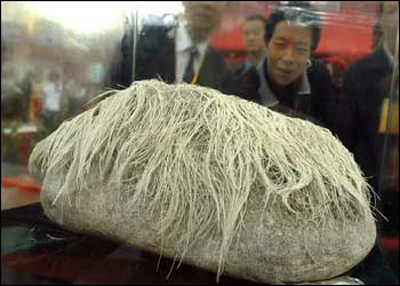 A stone with
"white hair" growing on it is displayed at an odd stone exhibition held in
Chengdu, China's Sichuan Province on April 28, 2007. The "white hair" growing is
a kind of halobios that has been attached to the stone for hundreds of millions
of years. It gradually extends upright and evolves as hollow-pipe-shaped
invertebrate fossil. Its assessed value is as much as 10 million yuan. A stone with
"white hair" growing on it is displayed at an odd stone exhibition held in
Chengdu, China's Sichuan Province on April 28, 2007. The "white hair" growing is
a kind of halobios that has been attached to the stone for hundreds of millions
of years. It gradually extends upright and evolves as hollow-pipe-shaped
invertebrate fossil. Its assessed value is as much as 10 million yuan.
Construction began on the biggest coal mine in northwest
China's Xinjiang Uygur Autonomous Region on Sunday. With a total investment of
about 2.6 billion yuan (336 million U.S. dollars), construction of the mine will
take 42 months to complete. It is expected to have annual revenue of 1.45
billion yuan (188 million U.S. dollars). Located in Ili in western Xinjiang, the
mine will be the first in Xinjiang to have an annual output capacity of 10
million tons. The colliery is being built and financed by Xinwen Mining Group
Corporation, China's eighth largest coal mining group based in east Shandong
Province. Xinjiang is estimated to have coal reserves of 2.19 trillion tons, or
40 percent of the country's total. The region's coal production stood at 43
million tons in 2006. Before the end of the decade two or three mining bases
each with an annual output of 50 million tons along with a number of
10-million-ton mines are expected to be built in Xinjiang. Xinwen Mining Group
also revealed plans to invest in facilities that will be able to process 30
million tons of coal a year for the production of of methanol and olefin in Ili,
where the estimated coal reserve is about 301 billion tons.
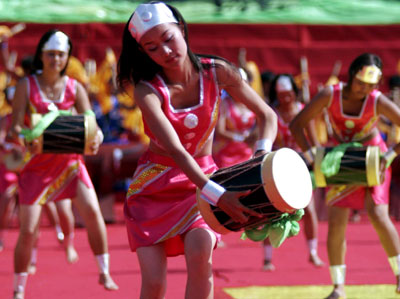 Chinese actresses perform at the opening ceremony
of a tea culture exhibition in Lincang, Southwest China's Yunnan Province April
30, 2007.
Chinese actresses perform at the opening ceremony
of a tea culture exhibition in Lincang, Southwest China's Yunnan Province April
30, 2007.
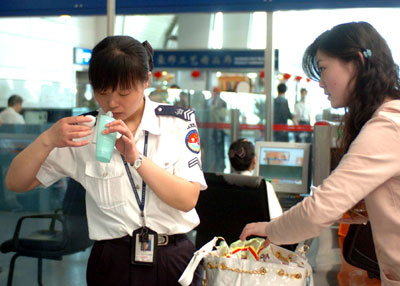 Passengers taking international flights from the Beijing Capital International
Airport during the May Day holiday should arrive at the airport at least 2 hours
before departure because of extended security checks. A new rule starts today,
limiting passengers to carrying no more than 1 liter of liquid in their hand
luggage. "Security checks now may take longer than usual," Lu Haifeng, assistant
manager of quality and safety department at the airport, said. The airport is
expected to receive more than 1 million passengers during the weeklong holiday.
The General Administration of Civil Aviation (CAAC) introduced the new rule in
accordance with the recommendation by the International Civil Aviation
Organization. For passengers on international flights, all liquids carried in
hand luggage must be held in containers with a capacity of no more than 100
milliliters. The containers should be placed in a transparent, re-sealable bag
with a maximum capacity of 1 liter. Each passenger will be allowed to carry only
one bag. Exemptions will be made for baby milk and baby food in the baby's
presence as well as medications with prescriptions. Women passengers should also
be aware that facial cream, lip gloss, perfume and even mascara all come under
the liquid category. "The airport will provide free bags at counters in front of
the security check machine," Lu said. Big screens in the airport have started to
broadcast notices in both Chinese and English, reminding travelers of security
rules. The airport police will also boost patrols during the holiday, and there
will be more staff working at security checkpoints. The restrictions will not
affect customers shopping at duty-free shops, but shoppers must retain all
receipts and not open the package. "Those who need transfer flights at a foreign
airport should consult with their airlines to understand the different rules in
various countries," Lu said. On domestic flights, the restrictions are slightly
looser. Passengers are allowed to take no more than 1 liter of liquid in their
hand luggage, but there is no limit on the size of the containers. The liquid
ban was first introduced on December 11, 2006, after British police foiled a
terrorist plot to smuggle liquid explosives onto an aircraft that was scheduled
to fly from Britain to the United States in August 2006. Soon afterwards, the
CAAC adopted the measures for passengers flying to the US and have been
effective ever since.
Passengers taking international flights from the Beijing Capital International
Airport during the May Day holiday should arrive at the airport at least 2 hours
before departure because of extended security checks. A new rule starts today,
limiting passengers to carrying no more than 1 liter of liquid in their hand
luggage. "Security checks now may take longer than usual," Lu Haifeng, assistant
manager of quality and safety department at the airport, said. The airport is
expected to receive more than 1 million passengers during the weeklong holiday.
The General Administration of Civil Aviation (CAAC) introduced the new rule in
accordance with the recommendation by the International Civil Aviation
Organization. For passengers on international flights, all liquids carried in
hand luggage must be held in containers with a capacity of no more than 100
milliliters. The containers should be placed in a transparent, re-sealable bag
with a maximum capacity of 1 liter. Each passenger will be allowed to carry only
one bag. Exemptions will be made for baby milk and baby food in the baby's
presence as well as medications with prescriptions. Women passengers should also
be aware that facial cream, lip gloss, perfume and even mascara all come under
the liquid category. "The airport will provide free bags at counters in front of
the security check machine," Lu said. Big screens in the airport have started to
broadcast notices in both Chinese and English, reminding travelers of security
rules. The airport police will also boost patrols during the holiday, and there
will be more staff working at security checkpoints. The restrictions will not
affect customers shopping at duty-free shops, but shoppers must retain all
receipts and not open the package. "Those who need transfer flights at a foreign
airport should consult with their airlines to understand the different rules in
various countries," Lu said. On domestic flights, the restrictions are slightly
looser. Passengers are allowed to take no more than 1 liter of liquid in their
hand luggage, but there is no limit on the size of the containers. The liquid
ban was first introduced on December 11, 2006, after British police foiled a
terrorist plot to smuggle liquid explosives onto an aircraft that was scheduled
to fly from Britain to the United States in August 2006. Soon afterwards, the
CAAC adopted the measures for passengers flying to the US and have been
effective ever since.
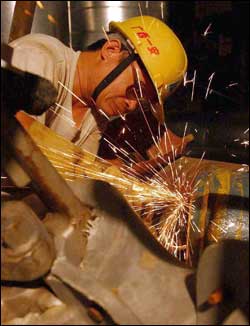 Aluminum Corp of China (2600), or Chalco, the world's No2
aluminum producer - saw its yuan-denominated A shares triple at its Shanghai
debut Monday. Chalco A shares hit 20.10 yuan (HK$20.36) before closing at 18.51
yuan, about three times the 6.6 yuan offering price. Some 315.7 million shares
worth 5.97 billion yuan changed hands. The company's H shares fell 0.4 percent
to HK$9.29. With Chalco's A shares trading at more than double its H shares,
some market watchers said the mainland equities were overpriced. They anticipate
a correction in the shares after the current Golden Week national holiday,
giving time for the frenzy over the new listing to abate. China's bourses will
be closed from today until they resume trading May 8.
Aluminum Corp of China (2600), or Chalco, the world's No2
aluminum producer - saw its yuan-denominated A shares triple at its Shanghai
debut Monday. Chalco A shares hit 20.10 yuan (HK$20.36) before closing at 18.51
yuan, about three times the 6.6 yuan offering price. Some 315.7 million shares
worth 5.97 billion yuan changed hands. The company's H shares fell 0.4 percent
to HK$9.29. With Chalco's A shares trading at more than double its H shares,
some market watchers said the mainland equities were overpriced. They anticipate
a correction in the shares after the current Golden Week national holiday,
giving time for the frenzy over the new listing to abate. China's bourses will
be closed from today until they resume trading May 8.
The Golden Week holidays have
turned into a logistical nightmare as millions of people take off at the same
time - leading to calls for a change from a growing number of economists.
May 2, 2007
 Hong Kong:
Cathay Pacific and Emirates
airlines suspended flights to Sri Lanka following a rebel air strike around
Colombo that forced authorities to cut power to the city and shut the country's
only international airport. Hong Kong:
Cathay Pacific and Emirates
airlines suspended flights to Sri Lanka following a rebel air strike around
Colombo that forced authorities to cut power to the city and shut the country's
only international airport.
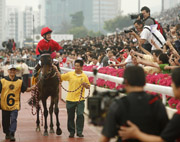 Mick Kinane takes Viva Pataca on a victory
parade after winning the HK$14 million Group One QE II Cup at Sha Tin yesterday.
He earlier won the Champions Mile on Able One. Both horses are trained by John
Moore. Mick Kinane takes Viva Pataca on a victory
parade after winning the HK$14 million Group One QE II Cup at Sha Tin yesterday.
He earlier won the Champions Mile on Able One. Both horses are trained by John
Moore.
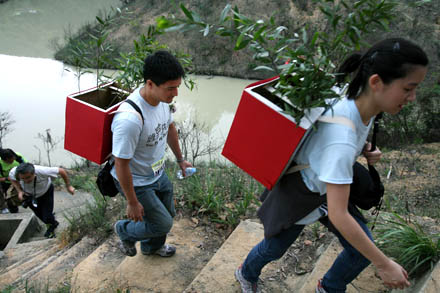 Engaged
couple Edward Chiang and Candice Luk hike yesterday with 12 tree seedlings
weighing 8kg. About 700 people hiked 10km and planted seedlings on hills near
Wong Nai Tun Reservoir as part of Friends of the Earth's Tree Planting
Challenge, which was organised to replace thousands of seedlings destroyed last
year in the Tai Lam Country Park fires. Engaged
couple Edward Chiang and Candice Luk hike yesterday with 12 tree seedlings
weighing 8kg. About 700 people hiked 10km and planted seedlings on hills near
Wong Nai Tun Reservoir as part of Friends of the Earth's Tree Planting
Challenge, which was organised to replace thousands of seedlings destroyed last
year in the Tai Lam Country Park fires.
A new color-coded air pollution alert system similar to the rainstorm warning
system - with mandatory action at the highest level - is proposed in Hong Kong's
first public consultation paper on clean air. Mandatory actions could include
ordering a stop to pollution-creating activity and asking businesses to take
voluntary actions such as halting vehicle use or having employees work from
home. The paper also says the controversial idea of electronic road pricing
should be considered again and suggests use of eco-friendly light bulbs be made
mandatory. Prepared by the semi-official Council for Sustainable to Development,
the paper says the alert would need to be issued in advance of high levels of
air pollution but acknowledges this could cause problems in the event of a false
alarm. Council sources said the current daily air pollution index readings were
only educational and were not prompting people to take positive action. "At
present, children, the elderly and people with respiratory diseases are advised
not be exposed outdoor or do exercise when the index reaches above 100. These
are only passive actions," a source said. "There is a sense of helplessness
among the public when high-API days are announced, because they have no option
but to carry on with normal daily activities." He said a "clear and strong
forward alert system" was needed, like rainstorm warning signals which were
simple and easy to understand. "How about a colour-coding scheme, where green
means the air quality is good, amber means some action must be taken, and red
denotes urgent action must be taken? "Of course, we should consider what needs
to be done should there be a false alert. More importantly we have to ensure the
public appreciates the urgency in taking action on days of high alert, just like
when the black rainstorm warning signal is hoisted, people go home. We need some
mandatory and voluntary measures to go with the alert system." The council's
paper, to be released next month, cited the example of Toronto, where a smog
alert is issued when periods of poor air quality are expected within 24 hours.
On high-smog days, people in Toronto are advised to car-pool, travel by train or
work from home. They are advised to avoid strenuous outdoor activities, while
those with breathing and heart problems are requested to pay special attention
to a worsening of their symptoms. Toronto's action plan also requires government
departments to reduce the use of non-essential petrol- and diesel-powered
vehicles, oil-based paints, solvents and cleaners, as well as postponing the use
of petrol-powered equipment and delaying the refuelling of vehicles until
nightfall. Government staff are asked to take public transport or walk to work,
and to wear casual clothes. Some non-essential services are temporarily reduced
or suspended. The sources said Hong Kong should adopt some of these measures, as
well as introduce road pricing to discourage private vehicle use. The council,
headed by Chief Secretary Rafael Hui Si-yan, will seek public views on
electronic road pricing and ways to reduce energy consumption, such as the
mandatory use of eco-friendly light bulbs. But the existing API may not need to
be replaced. "The API could be used to complement the new alert system," the
source said. "And there could be different alerts for different types of
impending pollution, such as one for haze or low visibility, and another for air
pollution levels. The public will be asked about all these questions."
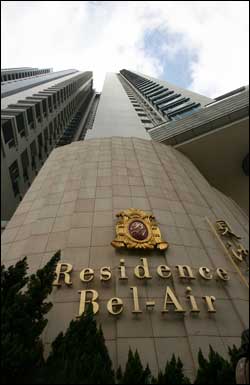 Residential property sales are expected to reach a
22-month high this month, boosted by new project launches and a revival of the
resale market, industry observers say. While official April figures will not be
released by the Land Registry until Wednesday, Patrick Chow Moon-kit, head of
research at Ricacorp Properties, said the number of flat transactions this month
in both the primary and secondary markets may jump by 25 percent to more than
10,000, compared to 8,039 last month. A total of 10,750 residential units were
sold in June 2005, when Hong Kong's home market was hot. "Positive factors such
as the ongoing mortgage rates battle between lenders and the government's recent
move to slash stamp duty for lower- priced flats will be reflected in this
month's Land Registry figures," Chow said. He expects primary market
transactions will more than double to exceed 2,000 units in April month on
month. Meanwhile, transactions in the resale market are likely to climb 13
percent to more than 8,000 units, he said.
Residential property sales are expected to reach a
22-month high this month, boosted by new project launches and a revival of the
resale market, industry observers say. While official April figures will not be
released by the Land Registry until Wednesday, Patrick Chow Moon-kit, head of
research at Ricacorp Properties, said the number of flat transactions this month
in both the primary and secondary markets may jump by 25 percent to more than
10,000, compared to 8,039 last month. A total of 10,750 residential units were
sold in June 2005, when Hong Kong's home market was hot. "Positive factors such
as the ongoing mortgage rates battle between lenders and the government's recent
move to slash stamp duty for lower- priced flats will be reflected in this
month's Land Registry figures," Chow said. He expects primary market
transactions will more than double to exceed 2,000 units in April month on
month. Meanwhile, transactions in the resale market are likely to climb 13
percent to more than 8,000 units, he said.
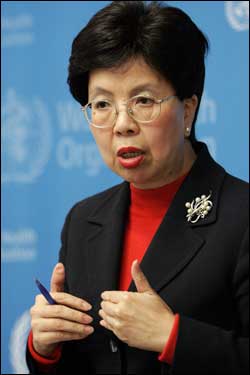 Taiwan's hopes of rejoining the
World Health Organization have been dashed after the United Nations agency,
headed by Hong Kong's former health chief, said the island's membership is now a
"non issue." In a stern reply to a recent letter from President Chen Shui-bian
to the organization, the WHO secretariat said it will not consider Taipei's bid
now or in the future because Taiwan is not a sovereign state recognized by the
world body. It is the first time the WHO has rejected Taipei's bid in such blunt
language since Margaret Chan Fung Fu- chun became director-general in November
last year.
Taiwan's hopes of rejoining the
World Health Organization have been dashed after the United Nations agency,
headed by Hong Kong's former health chief, said the island's membership is now a
"non issue." In a stern reply to a recent letter from President Chen Shui-bian
to the organization, the WHO secretariat said it will not consider Taipei's bid
now or in the future because Taiwan is not a sovereign state recognized by the
world body. It is the first time the WHO has rejected Taipei's bid in such blunt
language since Margaret Chan Fung Fu- chun became director-general in November
last year.
Macau casino
king Stanley Ho Hung- sun Sunday celebrated his greatest day as a racehorse
owner when his five- year-old gelding Viva Pataca came from back in the field to
win the HK$14 million International Group 1 Queen Elizabeth II Cup at Sha Tin
racecourse.
Hong
Kong's 155,000 civil servants are expected to get a pay rise later this year out
of political consideration, as it is in the interest of Chief Executive Donald
Tsang Yam-kuen to have a stable civil service to maintain stability in his new
administration, an academic said.
PCCW, the city's largest telecoms
operator, has seen video downloads on its mobile phones jump threefold since the
service was launched at the end of last year, according to its consumer group
managing director, Tom Chan Kee-sun.
Tom Group, the media business of
Hutchison Whampoa, is undergoing a corporate restructuring but there are no
plans to sell or spin off any units in the next two or three years, according to
chief executive Tommei Tong Mei-kuen.
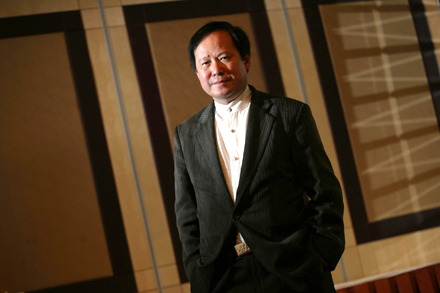
 "I wanted to foster greater affinity
with things Chinese. It's natural for people to be xenophobic," says theatre
writer Dennis Law. Chinese-American surgeon Dennis Law Kai-yen used to run the
show in operating theatres. These days, the 59-year-old presides in stage
theatres, as part of his mission to revamp Chinese performing arts. Although it
seems a radical change of career, turning impresario isn't such a big leap, says
Law, who's in town to promote his action-musical Terracotta Warriors, which
opens at the Hong Kong Cultural Centre next week. "A lot of doctors in America
are also arts lovers. For me, it's a natural evolution from a surgeon to stage
producer because I've always been very fond of art and culture," he says. But
the Hong Kong-raised impresario says his role in the two arenas is totally
different. "In surgery, I'm the boss and don't depend on anybody," Law says. "I
don't have to care about marketing or money. [The patient's] life is in my
hands. Whether I make a right or wrong decision, I'm solely responsible. I
influence people one at a time. "In what I'm doing now, I have to depend on
other people such as creative partners and am subject to marketing campaigns,
labor conditions and different preferences in each city. So success is much more
out of my hands. I have to be more collaborative, which is fine because I
influence people more each time." Terracotta Warriors is a two- hour spectacle
tracing the rise of China's first emperor, Qin Shihuang, using a combination of
martial arts, acrobatics and Chinese dance. The US$3 million production boasts a
cast of 80 performers and an impressive production team from Beijing, including
set designer Tu Juhua and Mo Xiaomin, who created the costumes for the Chen
Kaige epic The Emperor and the Assassin. Hong Kong run is a sort of homecoming
for the company, Law says. Terracotta Warriors is one of seven shows that Law
has written and directed, and is co-produced by his wife, Lee Choi-fung, a
former actress in kung fu films. Law coined the term "action-musical" for his
productions to highlight the rapid pace of the performances. "Our shows are
tailored to give non-Chinese-speaking people a new appreciation for Chinese
performing arts," he says. By telling the story through action, non-Chinese
audiences don't have to keep looking at subtitles to understand what's
unfolding. We don't mimic Broadway shows or Cirque du Soleil. We extract the
best from Chinese arts and techniques, and repackage them into an
international-level production." However, singers will provide simple but
emotional narratives using original scores by Hao Weiya. Some scenes feature qin
qiang, an ancient operatic form with an atonal, dramatic quality. The staging is
based on the impresario's multi-cultural experiences. "I combine my Chinese
background with knowledge of the US to produce a Chinese-themed show that
appeals to North American audiences," says Law, who trained in medicine at the
University of Pennsylvania and practised as a thoracic surgeon in Denver. He
began focusing on Chinese performing arts 10 years ago with his first foray into
entertainment. With financial backing from his father, toy tycoon Joseph Law, he
collaborated with his three brothers, all surgeons, to produce a fantasy film
called Warriors of Virtue, about five kangaroo-like martial art experts who
embody virtuous forces of nature. But the movie - directed by Ronny Yu Yan-tai
and starring Angus Macfadyen - flopped at the box office. Law attributes the
failure to a release at "the wrong time in the wrong place". "We wanted to use
martial arts to give children a virtue lesson," he says. "But American kids
aren't interested in family films. They're taken by movies like Austin Powers."
It was on a trip to Beijing to produce the movie that Law realised he'd
neglected his cultural roots, but he found the mainland's performing arts scene
disappointing. "I went to the capital expecting to see great shows, but the pace
was too slow, the lighting poor and the humor mediocre," he says. Although
technically proficient, many productions were overly melodramatic and weighed
down by political propaganda that he couldn't relate to. Deciding that it would
be a shame if Chinese performing arts, which go back thousands of years, weren't
properly promoted, he set out to produce his own Chinese-themed shows. But
realizing dreams doesn't come cheap. In 2001, the Laws bought an ailing theatre
in Vancouver for US$8 million to test its line of action-musicals. "You don't
always get a chance to buy a theatre," he says. "It's a launch pad to try out
how to stage a Chinese show in North America." To ensure a reliable pool of
talent, he also set up an academy in Beijing, Law Brothers Chinese Performing
Arts International, to train performers. The project took up so much of his time
that Law quit medicine five years ago to concentrate on creating the shows. "I
changed my life because I wanted to foster greater affinity with things
Chinese," he says. "It's natural for people to be xenophobic. Foreigners don't
want to see a Chinese show because they don't understand the language and
culture. I want to bridge the gap with a new package and rich visual elements."
Whether Law's zeal is matched by the quality of the shows remains to be seen.
Terracotta Warriors has met with mixed reviews in North America. Although some
lauded his effort to introduce Chinese performing arts to western audiences, The
Globe and Mail of Toronto described the overall effect as "painfully amateur",
and the Los Angeles Times said the show was "obsessed with picturesque specifics
when there are great lessons to teach about naked ambition". The negative
reviews haven't dampened Law's spirit. "I don't need critics to praise me all
the time. It's good to start a debate," he says. Nevertheless, he blames some
censure on "cultural insensitivity". "Sometimes [critics] pan you because they
don't want to see you succeed. They take the attitude that I'm a rich man
dabbling in art and culture." Law certainly enjoys a luxury denied most
producers: he doesn't worry about making a profit. "I've never made one cent
from any of the shows," he says. "Culture isn't a money-making business."
"I wanted to foster greater affinity
with things Chinese. It's natural for people to be xenophobic," says theatre
writer Dennis Law. Chinese-American surgeon Dennis Law Kai-yen used to run the
show in operating theatres. These days, the 59-year-old presides in stage
theatres, as part of his mission to revamp Chinese performing arts. Although it
seems a radical change of career, turning impresario isn't such a big leap, says
Law, who's in town to promote his action-musical Terracotta Warriors, which
opens at the Hong Kong Cultural Centre next week. "A lot of doctors in America
are also arts lovers. For me, it's a natural evolution from a surgeon to stage
producer because I've always been very fond of art and culture," he says. But
the Hong Kong-raised impresario says his role in the two arenas is totally
different. "In surgery, I'm the boss and don't depend on anybody," Law says. "I
don't have to care about marketing or money. [The patient's] life is in my
hands. Whether I make a right or wrong decision, I'm solely responsible. I
influence people one at a time. "In what I'm doing now, I have to depend on
other people such as creative partners and am subject to marketing campaigns,
labor conditions and different preferences in each city. So success is much more
out of my hands. I have to be more collaborative, which is fine because I
influence people more each time." Terracotta Warriors is a two- hour spectacle
tracing the rise of China's first emperor, Qin Shihuang, using a combination of
martial arts, acrobatics and Chinese dance. The US$3 million production boasts a
cast of 80 performers and an impressive production team from Beijing, including
set designer Tu Juhua and Mo Xiaomin, who created the costumes for the Chen
Kaige epic The Emperor and the Assassin. Hong Kong run is a sort of homecoming
for the company, Law says. Terracotta Warriors is one of seven shows that Law
has written and directed, and is co-produced by his wife, Lee Choi-fung, a
former actress in kung fu films. Law coined the term "action-musical" for his
productions to highlight the rapid pace of the performances. "Our shows are
tailored to give non-Chinese-speaking people a new appreciation for Chinese
performing arts," he says. By telling the story through action, non-Chinese
audiences don't have to keep looking at subtitles to understand what's
unfolding. We don't mimic Broadway shows or Cirque du Soleil. We extract the
best from Chinese arts and techniques, and repackage them into an
international-level production." However, singers will provide simple but
emotional narratives using original scores by Hao Weiya. Some scenes feature qin
qiang, an ancient operatic form with an atonal, dramatic quality. The staging is
based on the impresario's multi-cultural experiences. "I combine my Chinese
background with knowledge of the US to produce a Chinese-themed show that
appeals to North American audiences," says Law, who trained in medicine at the
University of Pennsylvania and practised as a thoracic surgeon in Denver. He
began focusing on Chinese performing arts 10 years ago with his first foray into
entertainment. With financial backing from his father, toy tycoon Joseph Law, he
collaborated with his three brothers, all surgeons, to produce a fantasy film
called Warriors of Virtue, about five kangaroo-like martial art experts who
embody virtuous forces of nature. But the movie - directed by Ronny Yu Yan-tai
and starring Angus Macfadyen - flopped at the box office. Law attributes the
failure to a release at "the wrong time in the wrong place". "We wanted to use
martial arts to give children a virtue lesson," he says. "But American kids
aren't interested in family films. They're taken by movies like Austin Powers."
It was on a trip to Beijing to produce the movie that Law realised he'd
neglected his cultural roots, but he found the mainland's performing arts scene
disappointing. "I went to the capital expecting to see great shows, but the pace
was too slow, the lighting poor and the humor mediocre," he says. Although
technically proficient, many productions were overly melodramatic and weighed
down by political propaganda that he couldn't relate to. Deciding that it would
be a shame if Chinese performing arts, which go back thousands of years, weren't
properly promoted, he set out to produce his own Chinese-themed shows. But
realizing dreams doesn't come cheap. In 2001, the Laws bought an ailing theatre
in Vancouver for US$8 million to test its line of action-musicals. "You don't
always get a chance to buy a theatre," he says. "It's a launch pad to try out
how to stage a Chinese show in North America." To ensure a reliable pool of
talent, he also set up an academy in Beijing, Law Brothers Chinese Performing
Arts International, to train performers. The project took up so much of his time
that Law quit medicine five years ago to concentrate on creating the shows. "I
changed my life because I wanted to foster greater affinity with things
Chinese," he says. "It's natural for people to be xenophobic. Foreigners don't
want to see a Chinese show because they don't understand the language and
culture. I want to bridge the gap with a new package and rich visual elements."
Whether Law's zeal is matched by the quality of the shows remains to be seen.
Terracotta Warriors has met with mixed reviews in North America. Although some
lauded his effort to introduce Chinese performing arts to western audiences, The
Globe and Mail of Toronto described the overall effect as "painfully amateur",
and the Los Angeles Times said the show was "obsessed with picturesque specifics
when there are great lessons to teach about naked ambition". The negative
reviews haven't dampened Law's spirit. "I don't need critics to praise me all
the time. It's good to start a debate," he says. Nevertheless, he blames some
censure on "cultural insensitivity". "Sometimes [critics] pan you because they
don't want to see you succeed. They take the attitude that I'm a rich man
dabbling in art and culture." Law certainly enjoys a luxury denied most
producers: he doesn't worry about making a profit. "I've never made one cent
from any of the shows," he says. "Culture isn't a money-making business."
The contaminated scallop sample
revealed by health officials on Friday is believed to have been imported from
the mainland, seafood traders said. The Centre for Food Safety issued a warning
not to eat scallops after a sample was found to contain a toxin that can cause
paralysis or death. The sample was collected at Ming Kee fish stall at Yeung Uk
road market in mid-April. It was open for business yesterday but scallops were
no longer available. Vendor Mr Chan said 20 catties of scallops were bought from
seafood wholesale stalls in Lau Fau Shan on April 17 and all were sold on that
day. "The source is from the mainland," he said, adding that he had not received
any complaints afterwards. Lee Choi-wah, chairman of the Hong Kong Chamber of
Seafood Merchants, also said nearly all scallops imported to Hong Kong were from
Dalian and they were distributed to different wholesale markets. Mr Lee said the
industry was severely hit by the news and that scallop sales had dropped by as
much as 80 per cent yesterday. He urged the authority to collect more samples to
ascertain the facts. "They have to check if the same toxin level is found in
other scallop samples or it may merely be an individual case," he said. "But if
it is a general case, we might suspend the selling of scallops until the
investigation is completed." A spokesman from the Centre for Food Safety said
yesterday it would continue to gather scallops and fan shells samples from
locations other than Yeung Uk road market including wholesale markets in
Aberdeen and Lau Fau Shan. The level of paralytic shellfish toxin found in the
scallop sample was 1,922 micrograms per 100 grams, more than 20 times the safety
level.
 China:
Government officials in China risk getting sacked if they use their influence to
benefit a lover or become involved in other forms of corrupt behavior, according
to a regulation released by the central government on Sunday. The 55-article
regulation, scheduled to take effect on June 1, details a variety of wrongdoings
and misconduct and is designed "to make sure government officials perform their
duty according to the law." The regulation stipulates that government officials
who engage in corruption, organize superstitious gatherings, use drugs, engage
in sex trade or fail to fulfill their duties can be demoted or fired. The
regulation also allows for the firing of government officials who abuse or
abandon family members or refuse to support their elderly relations. The
regulation is "China's first to systematically stipulate what administrative
punishments civil servants abusing their power will receive," sources said. A
press conference on detailing the regulation was jointly held by the Central
Committee for Discipline Inspection (CCDI) of the Communist Party of China
(CPC), Ministry of Supervision, Ministry of Personnel and the Legislative
Affairs Office of the State Council on Sunday. Qu Wanxiang, Vice Minister of
Supervision, said "the regulation is important for consolidating the CPC's
ruling position, safeguarding state power, improving ethical standards of
officials and persuading them to adopt a clean, honest and down-to-earth work
style to better serve the people." The regulation said if a civil servant's
failure to perform his or her duties results in accidents, disasters,
environmental pollution and "mass protests", they can be reprimanded, demoted or
sacked according to the severity of the incident. The same punishment will be
given to officials who fail to report or deal with major accidents, disasters
and criminal cases in a timely manner. Officials can also be fired if their lax
management causes public funds for disaster relief, poverty relief, citizen
resettlement, social security and land appropriation compensation to be
embezzled, damaged or lost. Officials found guilty of fraud and misleading
leaders and the public will also face punishment, said the regulation.
China:
Government officials in China risk getting sacked if they use their influence to
benefit a lover or become involved in other forms of corrupt behavior, according
to a regulation released by the central government on Sunday. The 55-article
regulation, scheduled to take effect on June 1, details a variety of wrongdoings
and misconduct and is designed "to make sure government officials perform their
duty according to the law." The regulation stipulates that government officials
who engage in corruption, organize superstitious gatherings, use drugs, engage
in sex trade or fail to fulfill their duties can be demoted or fired. The
regulation also allows for the firing of government officials who abuse or
abandon family members or refuse to support their elderly relations. The
regulation is "China's first to systematically stipulate what administrative
punishments civil servants abusing their power will receive," sources said. A
press conference on detailing the regulation was jointly held by the Central
Committee for Discipline Inspection (CCDI) of the Communist Party of China
(CPC), Ministry of Supervision, Ministry of Personnel and the Legislative
Affairs Office of the State Council on Sunday. Qu Wanxiang, Vice Minister of
Supervision, said "the regulation is important for consolidating the CPC's
ruling position, safeguarding state power, improving ethical standards of
officials and persuading them to adopt a clean, honest and down-to-earth work
style to better serve the people." The regulation said if a civil servant's
failure to perform his or her duties results in accidents, disasters,
environmental pollution and "mass protests", they can be reprimanded, demoted or
sacked according to the severity of the incident. The same punishment will be
given to officials who fail to report or deal with major accidents, disasters
and criminal cases in a timely manner. Officials can also be fired if their lax
management causes public funds for disaster relief, poverty relief, citizen
resettlement, social security and land appropriation compensation to be
embezzled, damaged or lost. Officials found guilty of fraud and misleading
leaders and the public will also face punishment, said the regulation.
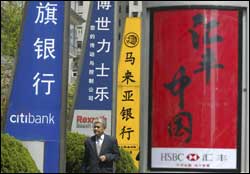 Mainland banks were
ordered Sunday to increase their reserves for the second time this month to
reduce their lending power in an effort to cool a stock boom that is
unprecedented in China's history. In an expected move, the central bank said
lenders are required to put aside another 50 basis points of their deposits as
reserves, bringing the total reserve ratio to 11 percent, effective May 15. The
tightening measure might push the domestic stock market lower today, the last
trading day ahead of the week-long Labor Day holidays, although the measure
alone will not trigger a major sell-off, analysts said. Economists said that
because first- quarter economic figures showed a high trade surplus and high
rates of lending, suggesting a possible rebound in fixed direct investment, the
central bank would be under pressure to impose more stringent measures. Mainland banks were
ordered Sunday to increase their reserves for the second time this month to
reduce their lending power in an effort to cool a stock boom that is
unprecedented in China's history. In an expected move, the central bank said
lenders are required to put aside another 50 basis points of their deposits as
reserves, bringing the total reserve ratio to 11 percent, effective May 15. The
tightening measure might push the domestic stock market lower today, the last
trading day ahead of the week-long Labor Day holidays, although the measure
alone will not trigger a major sell-off, analysts said. Economists said that
because first- quarter economic figures showed a high trade surplus and high
rates of lending, suggesting a possible rebound in fixed direct investment, the
central bank would be under pressure to impose more stringent measures.
The stock exchange run by the Dubai
International Financial Centre is working to attract mainland companies to list
in the Gulf emirate, and the center's investment arm could spend billions of US
dollars in China this year, according to a senior official.
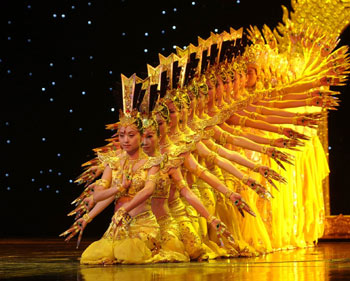 A group
of 21 hearing-impaired artists of the China Disabled People's Performing Arts
Troupe perform repertoire dance -- One Thousand Hands Bodhisattva in
Shijiazhuang, capital of north China's Hebei Province, April 27, 2007. The
troupe gave a charity performance here on Friday night, appearing for public
donation and support for handicapped in Hebei Province. A group
of 21 hearing-impaired artists of the China Disabled People's Performing Arts
Troupe perform repertoire dance -- One Thousand Hands Bodhisattva in
Shijiazhuang, capital of north China's Hebei Province, April 27, 2007. The
troupe gave a charity performance here on Friday night, appearing for public
donation and support for handicapped in Hebei Province.
Six new airports will be built in central China before the
end of the decade, said a senior official with the General Administration of
Civil Aviation of China (CAAC). The six small airports will be built in Bengbu
City in east China's Anhui Province, Yichun in Jiangxi Province, Zhumadian in
Henan Province, Yueyang and Hengyang in Hunan Province. The sixth will be
located near Mount Jiuhua, a well-known Buddhist holy mountain in Anhui.
Airports at six provincial capitals, namely, Zhengzhou, Wuhan, Taiyuan, Changsha,
Nanchang and Hefei will also be upgraded, said Li Yongqi, from the CAAC's
planning section, at a seminar held in this capital of central China's Henan
Province. Central regions include Anhui, Henan, Hubei, Hunan, Jiangxi and Shanxi.
They have a combined population of 361 million. The central regions are
economically less developed as the country's eastern region. The Chinese
government introduced a new strategy in early 2004 known as "the rise of central
regions" to improve the economies of the six provinces. China had 147 civil
airports by the end of 2006, an increase of 26 since 2000. Only 25 are located
in central China, with four in Shanxi, five in Jiangxi, five in Hunan, four in
Hubei, three in Henan and four in Anhui.
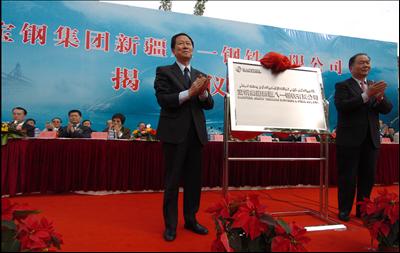 Baosteel Group
Xinjiang Bayi Iron and Steel Co. Ltd. was founded in Urumqi, capital city of
northwest China's Xinjiang Uygur Autonomous Region, on Saturday. Baosteel Group,
China's largest steel maker, acquired Bayi Iron and Steel Co. Ltd. in January by
investing 300,000 yuan in the corporation and becoming its controlling share
holder. Baosteel Group
Xinjiang Bayi Iron and Steel Co. Ltd. was founded in Urumqi, capital city of
northwest China's Xinjiang Uygur Autonomous Region, on Saturday. Baosteel Group,
China's largest steel maker, acquired Bayi Iron and Steel Co. Ltd. in January by
investing 300,000 yuan in the corporation and becoming its controlling share
holder.
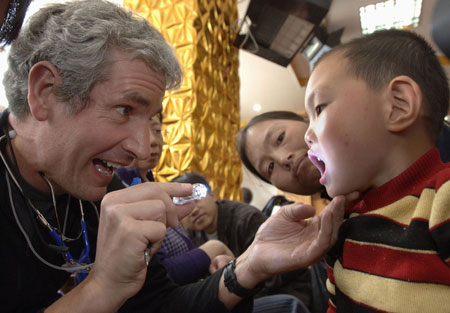 A volunteer doctor of the organization
"International Smile Activity", examines a child with a cleft palate at a
children's hospital in Hefei, Anhui province April 29, 2007.
A volunteer doctor of the organization
"International Smile Activity", examines a child with a cleft palate at a
children's hospital in Hefei, Anhui province April 29, 2007.
China will
this year replace Germany as the world's second largest trader with 2.1 trillion
US dollars in foreign trade and may overtake the world's largest trader, the
United States, by the end of the decade, says a senior Chinese researcher.
"China maintained a growth rate of more than 20 percent in foreign trade in the
first quarter and is likely to maintain the momentum throughout the year," said
Li Yushi, vice president of the Research Institute of International Trade and
Economic Cooperation under the Ministry of Commerce. Despite a growth rate that
declined to 6.9 percent in March, foreign trade in the first three months
totaled 457.7 billion US dollars, up 23.3 percent year-on-year. Exports reached
252.1 billion US dollars, up 27.8 percent, while imports were valued at 205.7
billion US dollars, up 18.2 percent, according to figures released by the
Chinese customs. While the Ministry of Commerce projected foreign trade to grow
by about 10 percent a year between 2006 and 2010, Li's institute predicts the
growth rate will be between 12 and 15 percent. "Based on these predictions, we
can tell that China will overtake the United States to be the world's largest
trader in 2010," Li told a seminar on China's foreign trade prospects in
Guangzhou. China started to lower export tax rebates on numerous items last
September to help bring down its trade surplus, said Li." The government is also
developing policies aimed at expanding imports by encouraging domestic companies
to import state-of-the-art equipment and technologies." China's soaring exports
in 2006 expanded its trade surplus to a record 178 billion dollars, up 74
percent from the previous record of 102 billion dollars set in 2005. China's
trade surplus for the first two months of the year hit 39.6 billion US dollars,
more than the entire first quarter of last year. In March, however, the surplus
dropped to 6.87 billion US dollars, dipping below the 10 billion US dollar mark
for the first time since March 2006. The World Trade Organization said in a
report last week that China's product exports started to exceed those of the
United States in the second half of 2006, but figures for the the entire year
show China ranked third in exports, after Germany and the United States.
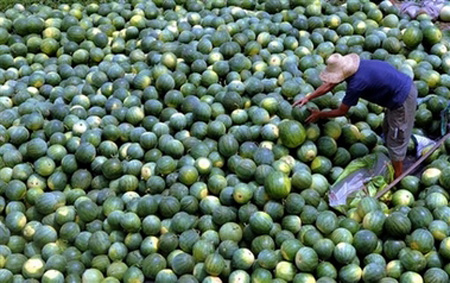 A farmer picks up water melon in Changsa town of
Wenchang City, South China's Hainan Province, on April 28, 2007. Due to the
enlargement of acreage and application of new species of water melon, the city
has a good harvest of water melon this year.
A farmer picks up water melon in Changsa town of
Wenchang City, South China's Hainan Province, on April 28, 2007. Due to the
enlargement of acreage and application of new species of water melon, the city
has a good harvest of water melon this year.
 China's
richest, thanks to an IPO and dad - It sounds like a fairy tale. Yang Huiyan, a
25-year-old woman, has virtually overnight become the richest person in China,
with a net worth of about US$9 billion, Forbes reported on Tuesday. Yang owes
her great fortune to the initial public offering of Country Garden Holdings, a
real estate developer run by her father that posted sharp gains after debuting
on the Hong Kong Stock Exchange on April 20. Shares of Guangdong-based Country
Garden surged 35.1 percent from the issue price of HK$5.38 (69 cents) to HK$7.27
on Friday, following strong demand from institutional and retail investors. The
shares slipped modestly to HK$7.17 today.
China's
richest, thanks to an IPO and dad - It sounds like a fairy tale. Yang Huiyan, a
25-year-old woman, has virtually overnight become the richest person in China,
with a net worth of about US$9 billion, Forbes reported on Tuesday. Yang owes
her great fortune to the initial public offering of Country Garden Holdings, a
real estate developer run by her father that posted sharp gains after debuting
on the Hong Kong Stock Exchange on April 20. Shares of Guangdong-based Country
Garden surged 35.1 percent from the issue price of HK$5.38 (69 cents) to HK$7.27
on Friday, following strong demand from institutional and retail investors. The
shares slipped modestly to HK$7.17 today.
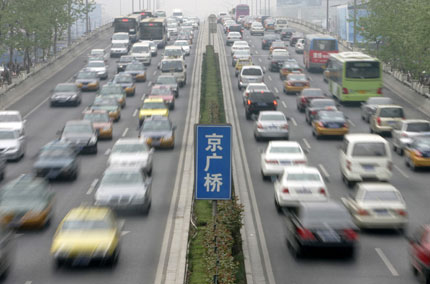 With the Olympics looming, China
goes green - Vehicles are seen on the 3rd ring road during rush hour in Beijing
April 18, 2007. Beijing is hoping a 100 billion yuan ($13 billion) investment in
public transport will be enough to keep the traffic flowing at next year's
Olympic Games. In Beijing, 1,600 students attend the Number Two Middle School,
an institution widely regarded as one of the best secondary schools in China.
The school is revered for producing some of the country's best and brightest,
yielding students who receive top scores on China's annual college entrance
exams. The students at Number Two stand out, however, not only because of their
academic achievement, but because of their enlightened attitude toward the
environment. Over the last few years, especially since Beijing was awarded the
2008 Olympic Games, environmental awareness has gotten a new emphasis among
those who will be the next generation of China's educated leaders. At the
school, there is an environmental curriculum and an active environmental club.
All of the attention paid to the environment poses a fundamental question: Can
China sustain a booming economy and also protect its environment? China's
Schools Going Green - Many at this specific school would say yes, a better
environment makes for a better economy. But the balance is not easy to
accomplish. In fact, Beijing is struggling to improve its air quality in time
for the looming Olympic Games yet the city itself is under construction 24 hours
a day, seven days a week. There is no question China wants to put its best foot
forward for the Olympics, but there is a lot of work to be done. For example,
because the air in China is still many times dirtier than the air in Los Angles,
America's smoggiest city, the government is determined to increase China's air
quality and reduce the amount of air pollution. "We are faced with challenges in
our environmental protection work," said Du Shaozhong, Beijing's deputy director
of the municipality's Environmental Protection Bureau. He showed ABC News how
the city measured air quality around the clock. It turns out the most polluted
time of the day is 10 p.m., when the exhaust-belching commercial trucks make
their deliveries to the city. Olympics and the Environment - In fact, officials
like Du believe the constant clash between economic development and the
environment must be dealt with independent of the Olympics. "If we fail to
balance the relationship between development and the environment, we would not
be in a position to sustain development," he said. In economic terms alone,
pollution has been expensive for China. The World Bank estimates that 10 percent
of China's gross domestic product is lost to pollution, from workers calling in
sick to factory shutdowns. "China itself, it's facing an environmental crisis
across the board," said Elizabeth Economy, director of Asia studies at the
Counsel on Foreign Relations in New York. She says a major problem is 30 percent
of the water in China's rivers is too polluted, even for industrial use. "Just
this past year they're talking about $42 billion lost in industrial output
because the factories don't have enough water to run," she said. At the moment,
however, the Olympics are at the top of the Chinese agenda, not just in Beijing
but all across this country. Six years ago when it was awarded the Olympics, the
city of Beijing pledged $13 billion to clean up the city. China's Solar Cities -
Before the games, coal-burning factories around the city will be shut down.
Already Beijing's biggest industrial polluter, a steel plant, has been moved to
a neighboring province. Traffic will be sharply curtailed during the Games as it
was during the China-Africa summit in the fall. Despite all of this action, some
worry that fundamental changes have yet to come, and that the changes in Beijing
are just cosmetic and temporary. "I think that probably is the case at this
point in time," Economy said. "What we're going to get with these Olympics
really is just a shutdown of the city to make it work for those few weeks." At
the same time there are visible signs of change: Millions of electric bikes have
been sold, alternate energy sources are gaining popularity and China has become
a world leader in solar thermal production and use. The city of Dezhou is the
world's largest producer of solar water heaters and the city of Rizhou is
increasingly becoming a solar city. One in 10 Chinese homes has solar hot water.
"Change in China has got to come from the bottom up," Economy said. "I think
it's going to have to come from a new understanding by the Chinese people of how
to treat the environment and why the environment matters so much to us." And
that understanding is beginning in places like the Number Two Middle School, as
well as the 4,000 environmental groups that have sprung up in China since 1994.
With the Olympics looming, China
goes green - Vehicles are seen on the 3rd ring road during rush hour in Beijing
April 18, 2007. Beijing is hoping a 100 billion yuan ($13 billion) investment in
public transport will be enough to keep the traffic flowing at next year's
Olympic Games. In Beijing, 1,600 students attend the Number Two Middle School,
an institution widely regarded as one of the best secondary schools in China.
The school is revered for producing some of the country's best and brightest,
yielding students who receive top scores on China's annual college entrance
exams. The students at Number Two stand out, however, not only because of their
academic achievement, but because of their enlightened attitude toward the
environment. Over the last few years, especially since Beijing was awarded the
2008 Olympic Games, environmental awareness has gotten a new emphasis among
those who will be the next generation of China's educated leaders. At the
school, there is an environmental curriculum and an active environmental club.
All of the attention paid to the environment poses a fundamental question: Can
China sustain a booming economy and also protect its environment? China's
Schools Going Green - Many at this specific school would say yes, a better
environment makes for a better economy. But the balance is not easy to
accomplish. In fact, Beijing is struggling to improve its air quality in time
for the looming Olympic Games yet the city itself is under construction 24 hours
a day, seven days a week. There is no question China wants to put its best foot
forward for the Olympics, but there is a lot of work to be done. For example,
because the air in China is still many times dirtier than the air in Los Angles,
America's smoggiest city, the government is determined to increase China's air
quality and reduce the amount of air pollution. "We are faced with challenges in
our environmental protection work," said Du Shaozhong, Beijing's deputy director
of the municipality's Environmental Protection Bureau. He showed ABC News how
the city measured air quality around the clock. It turns out the most polluted
time of the day is 10 p.m., when the exhaust-belching commercial trucks make
their deliveries to the city. Olympics and the Environment - In fact, officials
like Du believe the constant clash between economic development and the
environment must be dealt with independent of the Olympics. "If we fail to
balance the relationship between development and the environment, we would not
be in a position to sustain development," he said. In economic terms alone,
pollution has been expensive for China. The World Bank estimates that 10 percent
of China's gross domestic product is lost to pollution, from workers calling in
sick to factory shutdowns. "China itself, it's facing an environmental crisis
across the board," said Elizabeth Economy, director of Asia studies at the
Counsel on Foreign Relations in New York. She says a major problem is 30 percent
of the water in China's rivers is too polluted, even for industrial use. "Just
this past year they're talking about $42 billion lost in industrial output
because the factories don't have enough water to run," she said. At the moment,
however, the Olympics are at the top of the Chinese agenda, not just in Beijing
but all across this country. Six years ago when it was awarded the Olympics, the
city of Beijing pledged $13 billion to clean up the city. China's Solar Cities -
Before the games, coal-burning factories around the city will be shut down.
Already Beijing's biggest industrial polluter, a steel plant, has been moved to
a neighboring province. Traffic will be sharply curtailed during the Games as it
was during the China-Africa summit in the fall. Despite all of this action, some
worry that fundamental changes have yet to come, and that the changes in Beijing
are just cosmetic and temporary. "I think that probably is the case at this
point in time," Economy said. "What we're going to get with these Olympics
really is just a shutdown of the city to make it work for those few weeks." At
the same time there are visible signs of change: Millions of electric bikes have
been sold, alternate energy sources are gaining popularity and China has become
a world leader in solar thermal production and use. The city of Dezhou is the
world's largest producer of solar water heaters and the city of Rizhou is
increasingly becoming a solar city. One in 10 Chinese homes has solar hot water.
"Change in China has got to come from the bottom up," Economy said. "I think
it's going to have to come from a new understanding by the Chinese people of how
to treat the environment and why the environment matters so much to us." And
that understanding is beginning in places like the Number Two Middle School, as
well as the 4,000 environmental groups that have sprung up in China since 1994.
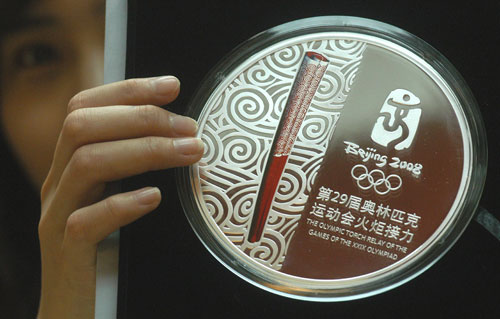 Beijing Olympic torch
relay badge is unveiled April 27,2007 after the Beijing Organizing Committee for
the Games of the XXIX Olympiad (BOCOG) announced its torch relay route and the
torch - a red and silver cloud-design tube shaped like a Chinese scroll.
Beijing Olympic torch
relay badge is unveiled April 27,2007 after the Beijing Organizing Committee for
the Games of the XXIX Olympiad (BOCOG) announced its torch relay route and the
torch - a red and silver cloud-design tube shaped like a Chinese scroll.
May 1, 2007
 Hong Kong:
Three property giants lined up Friday for the HK$6 billion housing project at
Tsuen Wan West railway station, but smaller developers took a more prudent
approach, given the sheer scale of the project and higher-than-expected land
premium. The less-than-enthusiastic response was in stark contrast to the
interest shown in the project by 13 developers in October. Kowloon-Canton
Railway Corporation said Friday that Cheung Kong (Holdings) (0001), Henderson
Land Development (0012) and Sun Hung Kai Properties (0016) have submitted
tenders. Referring to one other developer, KCRC chief executive James Blake said
the corporation received a letter but not a tender submission from Sino Land
(0083). The response, while not being the worst so far, was a disappointment as
the market had expected at least four or five submissions. For another project
in 2005, the government-owned railway operator received only a single bid from
Cheung Kong for the housing development atop West Rail's Tuen Mun station. Sino,
New World Development (0017), K Wah International (0173) and Wheelock Properties
(0049) were among the 13 developers that had expressed interest in West Rail's
Tsuen Wan West station TW7 project last October. They did not lodge bids Friday.
Sino was not available for comment. New World executive director Stewart Leung
Chi-kin said the company skipped the project mainly on cost considerations.
Surveyors said the land premium of HK$3.54 billion, which accounts for 59
percent of the total investment cost, was higher than market expectations of
more than HK$3 billion. Developers pay a premium to the government to convert
land use.
Hong Kong:
Three property giants lined up Friday for the HK$6 billion housing project at
Tsuen Wan West railway station, but smaller developers took a more prudent
approach, given the sheer scale of the project and higher-than-expected land
premium. The less-than-enthusiastic response was in stark contrast to the
interest shown in the project by 13 developers in October. Kowloon-Canton
Railway Corporation said Friday that Cheung Kong (Holdings) (0001), Henderson
Land Development (0012) and Sun Hung Kai Properties (0016) have submitted
tenders. Referring to one other developer, KCRC chief executive James Blake said
the corporation received a letter but not a tender submission from Sino Land
(0083). The response, while not being the worst so far, was a disappointment as
the market had expected at least four or five submissions. For another project
in 2005, the government-owned railway operator received only a single bid from
Cheung Kong for the housing development atop West Rail's Tuen Mun station. Sino,
New World Development (0017), K Wah International (0173) and Wheelock Properties
(0049) were among the 13 developers that had expressed interest in West Rail's
Tsuen Wan West station TW7 project last October. They did not lodge bids Friday.
Sino was not available for comment. New World executive director Stewart Leung
Chi-kin said the company skipped the project mainly on cost considerations.
Surveyors said the land premium of HK$3.54 billion, which accounts for 59
percent of the total investment cost, was higher than market expectations of
more than HK$3 billion. Developers pay a premium to the government to convert
land use.
 South Korean pop star
Rain, a pan-Asian heartthrob, has become the first entertainer from his country
to make People magazine's annual "100 Most Beautiful People" list. "I am very
honoured. This will be a great boon to my efforts to raise public awareness of
me in the United States," Rain, 25, was quoted as saying on his agent's website.
"I never expected this to happen to me. This is the best news for me this year."
Since his debut in 2002 Rain, whose real name is Jung Ji-Hoon, has personified
the "Korean Wave" of pop music, films and TV dramas sweeping across Asia.
Topping the list was former child star and "Charlie's Angels" actress Drew
Barrymore. Others on the list include Brad Pitt, George Clooney, Oprah Winfrey,
Leonardo DiCaprio, Scarlett Johansson, Jennifer Aniston, Reese Witherspoon,
Halle Berry and Jennifer Lopez. South Korean pop star
Rain, a pan-Asian heartthrob, has become the first entertainer from his country
to make People magazine's annual "100 Most Beautiful People" list. "I am very
honoured. This will be a great boon to my efforts to raise public awareness of
me in the United States," Rain, 25, was quoted as saying on his agent's website.
"I never expected this to happen to me. This is the best news for me this year."
Since his debut in 2002 Rain, whose real name is Jung Ji-Hoon, has personified
the "Korean Wave" of pop music, films and TV dramas sweeping across Asia.
Topping the list was former child star and "Charlie's Angels" actress Drew
Barrymore. Others on the list include Brad Pitt, George Clooney, Oprah Winfrey,
Leonardo DiCaprio, Scarlett Johansson, Jennifer Aniston, Reese Witherspoon,
Halle Berry and Jennifer Lopez.
Real estate trust The Link REIT
(0823), which runs shopping centers and car parks formerly owned by the
government, may begin the search for a new chief executive if incumbent Victor
So Hing-woh, were to throw in the towel in July, unable to fulfill demands to
improve performance.
Hong Kong Monetary Authority chief
executive Joseph Yam Chi-kwong saw his total remuneration trimmed to HK$9.57
million last year, from HK$9.97 million in 2005, despite an increment in his
fixed pay, according to the agency's latest annual report.
The telecommunications regulator
has left the door open for service providers to negotiate the contentious
interconnection fees that fixed-line operators charge mobile companies, as it
ended another round of market reform consultations.
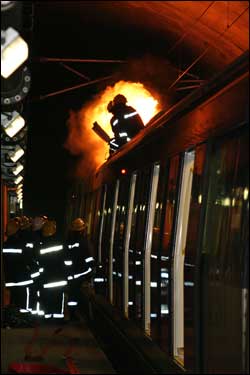 Sparing the
manufacturer and its own maintenance crew from blame, the Kowloon-Canton Railway
Corp said Friday the fire on a West Rail train last February was a one-off
incident caused by an imperfect voltage transformer which had been subjected to
an unexpected surge of electricity. In its report on the February 14 incident to
the Legislative Council's transport panel, company chief executive James Blake
said the railway was planning to replace the transformers on all its 86 trains
with explosion-proof voltage transformers in 2008 for free. But some legislators
were dissatisfied with the company's explanation, fearing the real cause may not
have been uncovered. After weeks of investigation by its technical panel, KCRC
acting general manager (rolling stock) Tony Lee Kar- yun said Friday the smoke
and small fire on a West Rail train inside a tunnel 1.5 kilometers north of
Tsuen Wan station was caused by a voltage transformer failure. The incident
resulted in the evacuation of more than 1,000 passengers, although no one was
injured. Lee said the failure was caused by a combination of an insulation
imperfection hidden at the time of manufacture and a high voltage surge from
severe lightning while the train was in service. This eventually caused a short-
circuit. "We immediately conducted tests on all other voltage transformers after
the incident, but none appears to have problems. It is just a solitary case and
our train fleets are absolutely safe." Lee said investigators believe the
"imperfect" transformer may have been damaged by a severe voltage surge a few
months earlier. Blake said the incident was not the result of any manual or
maintenance error. He also said the KCRC would not seek compensation from the
transformer's manufacturer, as the device had passed all factory acceptance
tests before it was installed on the train. "It needs a combination. It needs
something else to trigger the event. The hypothesis is the lightning surge
through the transformer. It's powerful enough to trigger the imperfection into a
model failure which resulted in the event," Blake said. "That cannot be put down
to the manufacturer alone. That cannot be put down to the maintenance as all of
the maintenance procedures are correct. So we have to put it down to a natural
event in combination with the possible imperfection. In those circumstances, I
don't believe there is any court in the world that could say the manufacturer
should be held responsible." But the manufacturer agreed to replace the voltage
transformers on all 86 trains serving the KCRC's East Rail, West Rail and Ma On
Shan Rail with lightning-resistant and explosion-proof voltage transformers by
2008 free of charge, Blake said. The KCRC has also stepped up its maintenance
and monitoring work such as increasing the frequency of transformer checks from
once in three years to once a month, using the train-borne computer to monitor
the voltage level and conducting a temperature check of each transformer every
three days. But Legco transport panel chairman Andrew Cheng Kar-foo doubts
whether the KCRC had tackled the root of the transformer problem. "I'm most
dissatisfied as it seems the KCRC still has not totally grasped what caused the
transformer to short-circuit. It only said [there are] some potential,
incomplete and inconspicuous areas. Maybe there are many other problems which
have gone unnoticed." Cheng said instead of waiting for 20 months, the company
should replace all voltage transformers immediately. Panel vice chairman Lau
Kong-wah of the Democratic Alliance for the Betterment and Progress of Hong
Kong, was also dissatisfied with Blake's explanation. He said Blake, as project
coordinator of West Rail, should be held responsible. Sparing the
manufacturer and its own maintenance crew from blame, the Kowloon-Canton Railway
Corp said Friday the fire on a West Rail train last February was a one-off
incident caused by an imperfect voltage transformer which had been subjected to
an unexpected surge of electricity. In its report on the February 14 incident to
the Legislative Council's transport panel, company chief executive James Blake
said the railway was planning to replace the transformers on all its 86 trains
with explosion-proof voltage transformers in 2008 for free. But some legislators
were dissatisfied with the company's explanation, fearing the real cause may not
have been uncovered. After weeks of investigation by its technical panel, KCRC
acting general manager (rolling stock) Tony Lee Kar- yun said Friday the smoke
and small fire on a West Rail train inside a tunnel 1.5 kilometers north of
Tsuen Wan station was caused by a voltage transformer failure. The incident
resulted in the evacuation of more than 1,000 passengers, although no one was
injured. Lee said the failure was caused by a combination of an insulation
imperfection hidden at the time of manufacture and a high voltage surge from
severe lightning while the train was in service. This eventually caused a short-
circuit. "We immediately conducted tests on all other voltage transformers after
the incident, but none appears to have problems. It is just a solitary case and
our train fleets are absolutely safe." Lee said investigators believe the
"imperfect" transformer may have been damaged by a severe voltage surge a few
months earlier. Blake said the incident was not the result of any manual or
maintenance error. He also said the KCRC would not seek compensation from the
transformer's manufacturer, as the device had passed all factory acceptance
tests before it was installed on the train. "It needs a combination. It needs
something else to trigger the event. The hypothesis is the lightning surge
through the transformer. It's powerful enough to trigger the imperfection into a
model failure which resulted in the event," Blake said. "That cannot be put down
to the manufacturer alone. That cannot be put down to the maintenance as all of
the maintenance procedures are correct. So we have to put it down to a natural
event in combination with the possible imperfection. In those circumstances, I
don't believe there is any court in the world that could say the manufacturer
should be held responsible." But the manufacturer agreed to replace the voltage
transformers on all 86 trains serving the KCRC's East Rail, West Rail and Ma On
Shan Rail with lightning-resistant and explosion-proof voltage transformers by
2008 free of charge, Blake said. The KCRC has also stepped up its maintenance
and monitoring work such as increasing the frequency of transformer checks from
once in three years to once a month, using the train-borne computer to monitor
the voltage level and conducting a temperature check of each transformer every
three days. But Legco transport panel chairman Andrew Cheng Kar-foo doubts
whether the KCRC had tackled the root of the transformer problem. "I'm most
dissatisfied as it seems the KCRC still has not totally grasped what caused the
transformer to short-circuit. It only said [there are] some potential,
incomplete and inconspicuous areas. Maybe there are many other problems which
have gone unnoticed." Cheng said instead of waiting for 20 months, the company
should replace all voltage transformers immediately. Panel vice chairman Lau
Kong-wah of the Democratic Alliance for the Betterment and Progress of Hong
Kong, was also dissatisfied with Blake's explanation. He said Blake, as project
coordinator of West Rail, should be held responsible.
Chinachem Charitable Foundation has taken the unusual step
of trying to get the government involved in what is expected to be a long legal
battle over the HK$32 billion estate of the late tycoon Nina Wang Kung Yu-sum.
According to reports Friday, the foundation has written to Secretary for Justice
Wong Yan-lung seeking the government's help in carrying out Wang's purported
wish that her money be used for charitable purposes. In a cautious reply, a
Department of Justice spokesman said Friday the secretary for justice could not
comment on the issue as there was a distinct possibility of civil litigation
since fung shui master Tony Chan Chun-chuen is also claiming to be the sole
heir. A source close to the government said Friday the legal chief's office has
received the foundation's letter but that it is too early to decide if he should
exercise his authority as the protector of the charity trust as reportedly
stated in a will dated 2002. A government source said last week Chief Executive
Donald Tsang Yam- kuen had instructed Wong last Friday to closely monitor
developments. According to the Trustee Ordinance, the secretary for justice is
the protector of all charity trusts. Meanwhile, Wang's brother Kung Yan-sum and
younger sisters Kung Yan-sum and Kung Chung-sum, who are on the board of the
Chinachem Charitable Foundation, have been actively building a strong team of
witnesses for the anticipated court battle. They have requested the two non-
beneficiaries on the purported 2002 will - Heng Kim Thiam, a project director of
Chinachem Group, and Li Chi-ming, a major shareholder of a private architect's
firm - as well as Wang's former doctors and nurses, business tycoons and
lifelong friends to act as witnesses should this be necessary. In what is
alleged to be a two-page, Chinese-written will dated July 28, 2002, Wang had
stated she wanted to donate all her assets to the Chinachem Charity Trust for
charitable purposes under the custody of a trustee supervised by the
secretary-general of the United Nations, the premier of the Peoples' Republic of
China and the chief executive of Hong Kong. In another development, Wang has
been posthumously named a "Lifetime Philanthropist" in the Mainland
Philanthropist List 2007 announced Thursday in Beijing. Wang was praised for
leading a thrifty life while making generous donations to various mainland
charities, even while she was undergoing treatment for ovarian cancer. She made
a HK$30 million donation to a mainland medical research study one week before
her death April 3.
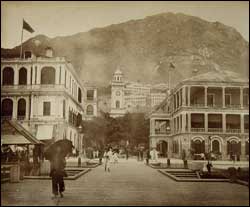 An exhibition that celebrates Hong
Kong's past is an important chronicle of the city's development, writes Michelle
Chan; Picture a monochrome European setting with rickshaws parked in front of
buildings and Chinese junks anchored on a shoreline overlooked by
Renaissance-style architecture. A contrast of cultures it may seem, but also
typical of Hong Kong when it first became a British colony in the 1840s. Such
photographs are part of more than 100 artifacts on display in the exhibition "A
Nostalgic View of Hong Kong and China," at Picture This Gallery, a chronicle of
the city's growth. Englishman Christopher Bailey, owner of the gallery, has
spent years accumulating them from private collectors, dealers and auctions all
around the world. The pictures differ from those usually seen in history
textbooks and museum exhibitions, which are mostly copied from government
records. Rather, they were taken by Europeans who had once lived, or traveled to
Hong Kong. In an era when cameras were housed in a huge case with a hood,
photography was an extravagance that not many people could afford. Bailey
admitted that pictures were "becoming more difficult to find. Almost everything
in China was destroyed in the Cultural Revolution an the Great Leap Forward.
Little has survived."
An exhibition that celebrates Hong
Kong's past is an important chronicle of the city's development, writes Michelle
Chan; Picture a monochrome European setting with rickshaws parked in front of
buildings and Chinese junks anchored on a shoreline overlooked by
Renaissance-style architecture. A contrast of cultures it may seem, but also
typical of Hong Kong when it first became a British colony in the 1840s. Such
photographs are part of more than 100 artifacts on display in the exhibition "A
Nostalgic View of Hong Kong and China," at Picture This Gallery, a chronicle of
the city's growth. Englishman Christopher Bailey, owner of the gallery, has
spent years accumulating them from private collectors, dealers and auctions all
around the world. The pictures differ from those usually seen in history
textbooks and museum exhibitions, which are mostly copied from government
records. Rather, they were taken by Europeans who had once lived, or traveled to
Hong Kong. In an era when cameras were housed in a huge case with a hood,
photography was an extravagance that not many people could afford. Bailey
admitted that pictures were "becoming more difficult to find. Almost everything
in China was destroyed in the Cultural Revolution an the Great Leap Forward.
Little has survived."
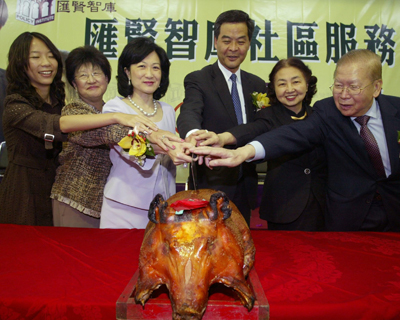 Regina Ip (third left) is joined by Federation of Women chairwoman Peggy Lam
(second left), Leung Chun-ying (fourth left), Elsie Leung (second right) and
other guests at the opening of the Savantas center.
Regina Ip (third left) is joined by Federation of Women chairwoman Peggy Lam
(second left), Leung Chun-ying (fourth left), Elsie Leung (second right) and
other guests at the opening of the Savantas center.
 China:
Lenovo Group, China's only worldwide Olympic partner, is expecting a windfall
from its 2008 Beijing Olympics marketing campaigns, the company said on Friday.
"In 2007 and 2008 all of our marketing campaigns will be focused on the Olympic
Games," said Chen Shaopeng, Lenovo's senior vice-president and president of
China operations. Lenovo signed a deal with the International Olympic Committee
(IOC) in 2004 to join the sponsorship program, becoming the first Chinese
company in the high-profile club. Lenovo's brand awareness has since received a
boost after a series of Olympics-related marketing blitzes, including a campaign
at the 2006 Turin Olympics, Chen said. Lenovo's share in China's PC market rose
to 36.7 percent in December 2006, compared with 32.7 percent late 2004.
"Excluding the boost from Lenovo's acquisition of IBM's PC-making business, I
believe the Olympic marketing has played a vital role" in the company's growth,
Chen said. Lenovo's $1.25-million acquisition of IBM's PC unit in 2005 helped
boost Lenovo's international profile, but the firm is still struggling with poor
brand awareness in overseas markets. In the third quarter of last year, Taiwan's
Acer Computers surpassed Lenovo as the world's third-largest computer maker in
terms of global sales, according to a report by Gartner, a US research firm.
Acer generates about 50 percent of its total sales in the US, and 20 in Europe.
Lenovo is hoping the Olympics campaign will move the company closer to rivals
Hewlett-Packard and Dell. Meanwhile, Chen also announced Friday that Lenovo
would contribute 15,000 computing devices including desktops, laptops, computer
servers, and display monitors to 2008 Games, almost twice what the company sent
to Turin. It will also establish the Games' first ever computer maintenance
centers to fix computer problems on Lenovo and competing computers at Olympic
venues. Lenovo designed the Beijing Olympic torch, unveiled Thursday night. The
firm has also become the first Olympic torch relay partner from China. Lenovo
vice-president Li Lan said the company plans to sign a number of Olympic
champions in countries and regions along the torch relay route. During last
year's World Cup of soccer, Lenovo signed Brazilian star Ronaldinho as an image
ambassador. The company is also the "Official PC Partner" of the National
Basketball Association (NBA). Recent reports say Lenovo plans to sign Liu Xiang,
China's 110m hurdles world record holder and Olympics champion, but Chen would
not confirm the rumours.
China:
Lenovo Group, China's only worldwide Olympic partner, is expecting a windfall
from its 2008 Beijing Olympics marketing campaigns, the company said on Friday.
"In 2007 and 2008 all of our marketing campaigns will be focused on the Olympic
Games," said Chen Shaopeng, Lenovo's senior vice-president and president of
China operations. Lenovo signed a deal with the International Olympic Committee
(IOC) in 2004 to join the sponsorship program, becoming the first Chinese
company in the high-profile club. Lenovo's brand awareness has since received a
boost after a series of Olympics-related marketing blitzes, including a campaign
at the 2006 Turin Olympics, Chen said. Lenovo's share in China's PC market rose
to 36.7 percent in December 2006, compared with 32.7 percent late 2004.
"Excluding the boost from Lenovo's acquisition of IBM's PC-making business, I
believe the Olympic marketing has played a vital role" in the company's growth,
Chen said. Lenovo's $1.25-million acquisition of IBM's PC unit in 2005 helped
boost Lenovo's international profile, but the firm is still struggling with poor
brand awareness in overseas markets. In the third quarter of last year, Taiwan's
Acer Computers surpassed Lenovo as the world's third-largest computer maker in
terms of global sales, according to a report by Gartner, a US research firm.
Acer generates about 50 percent of its total sales in the US, and 20 in Europe.
Lenovo is hoping the Olympics campaign will move the company closer to rivals
Hewlett-Packard and Dell. Meanwhile, Chen also announced Friday that Lenovo
would contribute 15,000 computing devices including desktops, laptops, computer
servers, and display monitors to 2008 Games, almost twice what the company sent
to Turin. It will also establish the Games' first ever computer maintenance
centers to fix computer problems on Lenovo and competing computers at Olympic
venues. Lenovo designed the Beijing Olympic torch, unveiled Thursday night. The
firm has also become the first Olympic torch relay partner from China. Lenovo
vice-president Li Lan said the company plans to sign a number of Olympic
champions in countries and regions along the torch relay route. During last
year's World Cup of soccer, Lenovo signed Brazilian star Ronaldinho as an image
ambassador. The company is also the "Official PC Partner" of the National
Basketball Association (NBA). Recent reports say Lenovo plans to sign Liu Xiang,
China's 110m hurdles world record holder and Olympics champion, but Chen would
not confirm the rumours.
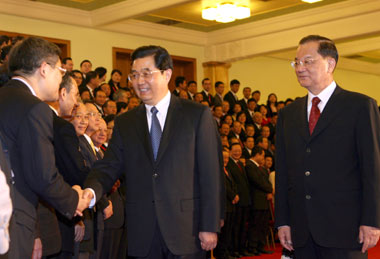 Hu Jintao (2nd, R),
general secretary of the Central Committee of the Communist Party of China,
shakes hands with one of the participants attending the third cross-Taiwan
Strait economic, trade and cultural forum, while KMT Honorary Chairman Lien Chan
(1st, R) looks, at the Great Hall of the People in Beijing, capital of China,
April 28, 2007. Hu Jintao (2nd, R),
general secretary of the Central Committee of the Communist Party of China,
shakes hands with one of the participants attending the third cross-Taiwan
Strait economic, trade and cultural forum, while KMT Honorary Chairman Lien Chan
(1st, R) looks, at the Great Hall of the People in Beijing, capital of China,
April 28, 2007.
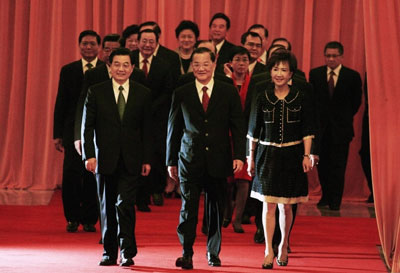 Hu Jintao (L), general secretary of
the Communist Party of China enters the hall with Lien Chan, honorary chairman
of Kuomintang and wife Lien Fangyu (R) at the Great Hall of the People in
Beijing April 28, 2007. About 300 Taiwan and 200 mainland businessmen and
representatives are attending the Cross-Strait Economic and Trade Forum.
Hu Jintao (L), general secretary of
the Communist Party of China enters the hall with Lien Chan, honorary chairman
of Kuomintang and wife Lien Fangyu (R) at the Great Hall of the People in
Beijing April 28, 2007. About 300 Taiwan and 200 mainland businessmen and
representatives are attending the Cross-Strait Economic and Trade Forum.
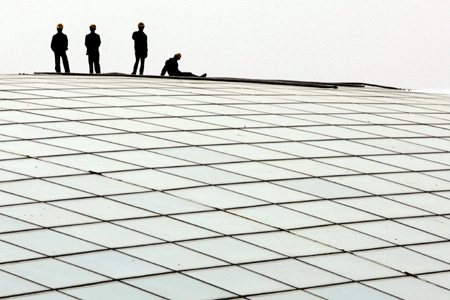 Chinese workers
take a break on the roof of the still under onstruction new terminal of Beijing
Capital International Airport April 27, 2007. The new airport terminal, which
was designed by Lord Norman Foster, will become the world's largest and most
advanced airport building when completed with a floor area of more than a
million square metres (247.1 acres) and is designed to accommodate an estimated
43 million passengers per annum.
Chinese workers
take a break on the roof of the still under onstruction new terminal of Beijing
Capital International Airport April 27, 2007. The new airport terminal, which
was designed by Lord Norman Foster, will become the world's largest and most
advanced airport building when completed with a floor area of more than a
million square metres (247.1 acres) and is designed to accommodate an estimated
43 million passengers per annum.
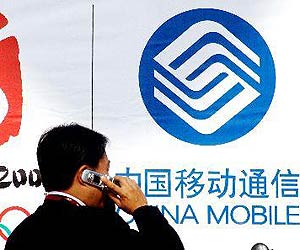 More than 467
million Chinese mobile phone users will be able to enjoy free incoming calls
within two years, regulators said yesterday. In addition, the roaming fee, which
is more than six times the cost of intracity-mobile communications, is expected
to be regulated and probably dropped, according to the Ministry of Information
Industry and the National Development and Reform Commission. More than 467
million Chinese mobile phone users will be able to enjoy free incoming calls
within two years, regulators said yesterday. In addition, the roaming fee, which
is more than six times the cost of intracity-mobile communications, is expected
to be regulated and probably dropped, according to the Ministry of Information
Industry and the National Development and Reform Commission.
Shanghai Pudong Development Bank Co., the Chinese partner
of Citigroup Inc., said first-quarter profit rose 34 percent as it increased
loan margins and boosted lending in a surging economy. Net income at the
Shanghai-based national bank climbed to 978.3 million yuan ($126.8 million) from
732.1 million yuan a year ago, the firm said in a statement to the city's stock
exchange yesterday. Earnings per share rose 20 percent to 0.23 yuan in the
period, the statement said. China's economy expanded at 11.1 percent in the
first quarter, driving consumer and corporate demand for loans. The central bank
raised lending rates three times in the past year while boosting deposit rates
only twice, making loans more profitable for banks including Pudong Development
and China Minsheng Bank Corp. Pudong Bank said first-quarter non-performing
loans were 1.8 percent of the overall, down from 1.83 percent at the end of
2006. The bank's capital adequacy ratio, a measure of financial strength, fell
to 9.02 percent from 9.27 percent. Net interest income gained 31 percent from a
year earlier to 5.07 billion yuan, according to the statement, and net
intermediary income rose 39 percent to 153 million yuan. Total loans expanded
7.6 percent from the end of the year to 495.8 million yuan, while deposits over
that period grew 0.9 percent to 601.7 million yuan, the company said. The
People's Bank of China is trying to curb bank loans to slow surging property
prices and investment that threaten to overheat the economy. It raised the
benchmark one-year lending rate by 0.27 percent point to 6.39 percent on March
17 and increased the one-year deposit rate by the same, to 2.79 percent. Pudong
Development Bank released earnings after the markets closed. The bank's shares
fell 3.1 percent to close at 27.49 yuan today in Shanghai. They have climbed 29
percent since the end of last year, underperforming a 40.5 percent gain in the
benchmark Shanghai Composite Index. The unaudited results were based on domestic
accounting standards.
Shanghai Automotive Co., China's largest carmaker, said
first-quarter profit more than quadrupled, after it bought stakes in ventures
with General Motors Corp. and Volkswagen AG from its parent. Net income rose to
1.16 billion yuan ($150 million), or 0.18 yuan per share, from a restated 245.6
million yuan, or 0.08 yuan per share, a year earlier, the company said in a
statement to the Shanghai Stock Exchange today. Sales increased to 25.5 billion
yuan from a restated 1.08 billion yuan, based on Chinese accounting standards.
Shanghai Auto shifted its focus to car assembly from auto parts through a 19.1
billion yuan asset swap with its parent in December. The company acquired stakes
in ventures with General Motors Corp. and Volkswagen AG, giving it direct access
to the world's fastest-growing vehicle market. SAIC Motor Corp. and Shanghai
Auto plan to boost sales by more than 15 percent this year, beating the
estimated industry average, according to company President Chen Hong. The parent
sold 1.34 million vehicles in 2006, surpassing China FAW Group Corp. to become
China's largest automaker. The company's shares fell 2.4 percent to 14.16 yuan
in Shanghai yesterday. The stock has surged almost fourfold in the past 12
months. GM's two joint ventures with Shanghai Auto sold 26 percent more
vehicles, or 272,911 units, in the first quarter, helped by its best-selling
model Excelle sedans, according to the China Association of Automobile
Manufacturers. Sales Goal - GM expanded its market share in China to 13.9
percent in the first quarter from 13.5 percent a year ago. The U.S. automaker
plans to introduce about 10 new or revamped models in China this year to help it
meet a 2007 sales target of "close to 1 million units" in the country. Shanghai
Auto's venture with Volkswagen, Europe's largest carmaker, sold 97,385 cars in
the first three months, an increase of 56 percent from a year earlier, according
to the auto association's statistics. Volkswagen aims to introduce as many as 14
new models in the country by 2009. China's economy grew 10.7 percent last year,
the fastest rate in 11 years, boosting auto sales. Vehicle sales may rise to 9
million by 2010, according to the National Development and Reform Commission.
Sales last year were 7.22 million. Sales of the company's first self-branded
sedan, the Roewe 750, exceeded 7,000 units by April 20, according to Hu Maoyuan,
chairman of Shanghai Auto. The Roewe is based on design rights bought from the
bankrupt British automaker MG Rover Group Ltd. SAIC Motor received 3.28 billion
shares from Shanghai Auto in November in exchange for stakes in 11 auto
ventures, three parts-makers and an auto finance company. Its stake in Shanghai
Auto rose to 84 percent through the deal. Shanghai Auto booked profits from the
ventures in the last two months of 2006.
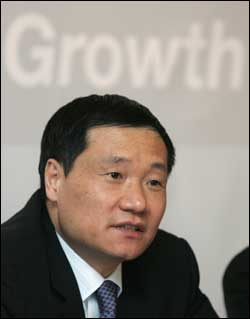 Bank of China (3988), the mainland's No2 lender, said first-quarter net profit
rose 17.62 percent to 11.72 billion yuan (HK$11.87 billion) on strong growth of
both net interest income and net fee and commission income. Net interest income
rose 31.1 percent to 34.37 billion yuan, largely attributable to an increase in
average interest-earning assets and a widening net interest margin. The bank
recorded a net trading loss of 735 million yuan compared with a gain of 1.14
billion as a rising yuan continues to hurt the bank's foreign exchange position.
"We will continue to focus on all business risks to ensure healthy and balanced
development, and manage foreign currency exposure to mitigate the business
impact of RMB [yuan] appreciation," chairman Xiao Gang said in BOC's annual
report Wednesday. But the loss was mostly offset by a 606 million yuan gain on
investment securities, up 298.68 percent compared with the 152 million yuan
recorded in the corresponding quarter last year.
Bank of China (3988), the mainland's No2 lender, said first-quarter net profit
rose 17.62 percent to 11.72 billion yuan (HK$11.87 billion) on strong growth of
both net interest income and net fee and commission income. Net interest income
rose 31.1 percent to 34.37 billion yuan, largely attributable to an increase in
average interest-earning assets and a widening net interest margin. The bank
recorded a net trading loss of 735 million yuan compared with a gain of 1.14
billion as a rising yuan continues to hurt the bank's foreign exchange position.
"We will continue to focus on all business risks to ensure healthy and balanced
development, and manage foreign currency exposure to mitigate the business
impact of RMB [yuan] appreciation," chairman Xiao Gang said in BOC's annual
report Wednesday. But the loss was mostly offset by a 606 million yuan gain on
investment securities, up 298.68 percent compared with the 152 million yuan
recorded in the corresponding quarter last year.
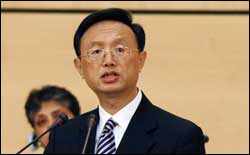 China's choice of a former ambassador with
personal ties to the Bush family as its new foreign minister shows the priority
Beijing places on its relationship with Washington, analysts said. Yang Jiechi,
who turns 57 next month, was ambassador to Washington from 2001 to 2005 and has
spent most of his diplomatic career focused on China's most important strategic
relationship. Beijing will call on his expertise in handling that relationship,
which is marked by an increasing economic interdependence but still dogged by
stubborn tensions on trade, human rights and China's growing presence in the
world. "This won't change Sino-US relations, but since [Yang] was ambassador to
the US, he knows a lot about the relationship between the two countries," said
Niu Jun, a professor with Peking University's School of International Studies.
"It will help China handle issues between China and the US." A Shanghai native
who has served since 2005 as one of seven vice foreign ministers, Yang replaces
Li Zhaoxing, who stepped down after four years in the post. Yang has a
reputation as a pragmatic and competent diplomat, but his longtime familiarity
with the Bush family may have also played a part in his selection, according to
observers. China's choice of a former ambassador with
personal ties to the Bush family as its new foreign minister shows the priority
Beijing places on its relationship with Washington, analysts said. Yang Jiechi,
who turns 57 next month, was ambassador to Washington from 2001 to 2005 and has
spent most of his diplomatic career focused on China's most important strategic
relationship. Beijing will call on his expertise in handling that relationship,
which is marked by an increasing economic interdependence but still dogged by
stubborn tensions on trade, human rights and China's growing presence in the
world. "This won't change Sino-US relations, but since [Yang] was ambassador to
the US, he knows a lot about the relationship between the two countries," said
Niu Jun, a professor with Peking University's School of International Studies.
"It will help China handle issues between China and the US." A Shanghai native
who has served since 2005 as one of seven vice foreign ministers, Yang replaces
Li Zhaoxing, who stepped down after four years in the post. Yang has a
reputation as a pragmatic and competent diplomat, but his longtime familiarity
with the Bush family may have also played a part in his selection, according to
observers.
Banks'
required reserves could rise as high as 14 percent by the end of the year, from
10.5 percent now, as the central bank strives to mop up surplus cash from the
system, a prominent academic says.
When Joseph Yam called early this
year for a system to take advantage of the gaping price differential between the
same shares trading in Hong Kong and on the mainland, he set off a debate that
cuts to the heart of the mainland's market and currency controls.
Being the factory for the world,
China is highly reliant on its ability to move cargo. While the country has
already built a string of first-class ports, its railway network leaves a lot to
be desired. At the end of 2005, the mainland's railway system stretched
75,000km, the most in Asia and ranked third in the world. But the density of
railroad and average usage per person was far behind that of many countries. On
average, 20 per cent of cargo movement around the world is dependent on
railways; in China it is less than 2 per cent. No wonder the central government
plans to develop a high-speed and high-density railway system.

*News information are obtained via various
sources deemed reliable, but not guaranteed

|
![]()
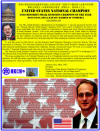 USA Small Business Administration (SBA)
Selected Johnson Choi/HKCHcc
2008 United States
National Champion
USA Small Business Administration (SBA)
Selected Johnson Choi/HKCHcc
2008 United States
National Champion![]()
![]() and follow us
on
and follow us
on
![]()

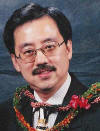
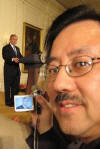
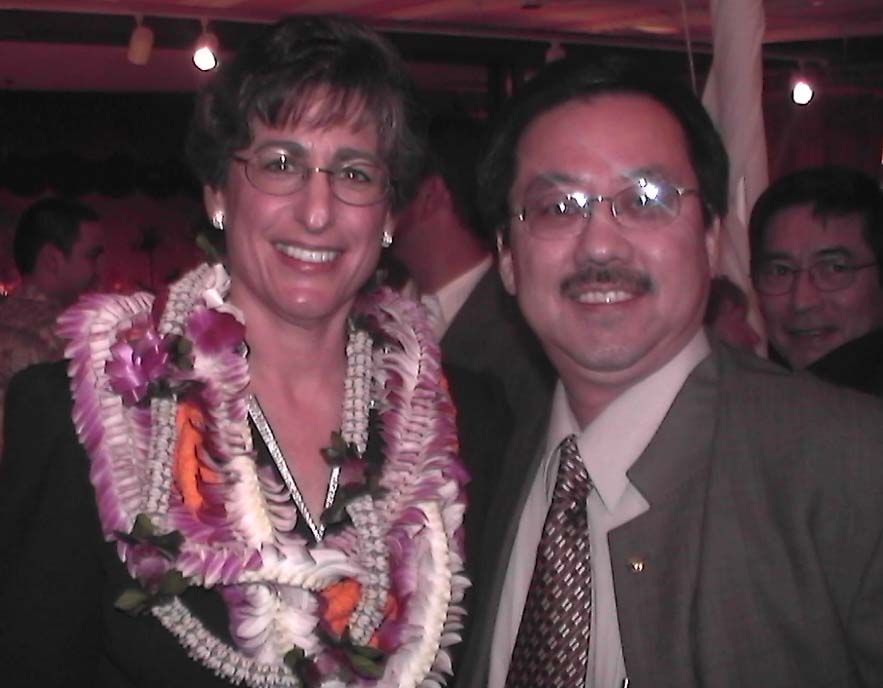
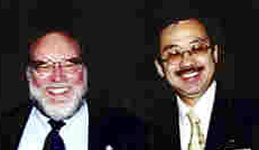
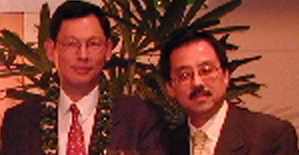
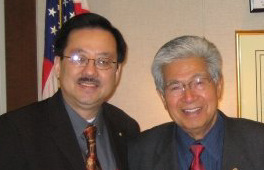


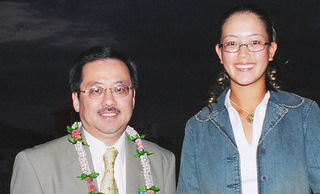
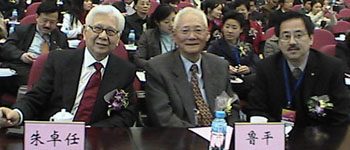
















 A prospective buyer views an oil on
canvas painting by Chinese artist Xu Beihong entitled "Portrait of a Lady". Two
contemporary Chinese works of art sold Sunday for record prices at auction in
Hong Kong, underlining a growing demand for modern Asian art. An abstract
painting by Zhao Wuji entitled "14.12.59" set a record for the artist when it
went under the hammer for 29.44 million Hong Kong dollars (3.78 million US
dollars). And two hulking brass sculptures called "Taiji Series -- Big Sparring"
by Ju Ming also set a record for the artist at 14.89 million dollars. The two
items were among hundreds of lots worth more than a billion dollars that are
going under the hammer at the Christie's Spring sale of Asian art over the next
four days. Although the identity of the buyers was not revealed, Eric Chang,
senior vice-president of 20th century Chinese art at Christie's, said all buyers
were Asia-based. Among other big sellers was the elegant "Portrait of a Lady" by
Xu Beihong, the current darling of the Asian art world, which fetched nearly 30
million dollars with fees taken into account. Xu's "Put Down That Whip" sold
earlier this year for 72 million dollars -- the highest price commanded for a
Chinese painting at auction. Also on Sunday, the stark "Scenery of Northern
China" by Wu Guangzhong sold for 31.68 million dollars. Christie's and its rival
Sotheby's have been holding twice-yearly sales in Hong Kong since the mid-1990s
as growing wealth in China has fuelled a bonanza in the Asian art market. Some
art historians have criticized the recent explosion in the prices for Asian art,
which 10 years ago was struggling to attract any interest, and have criticized
over-exuberant first-time buyers for sending prices sky-high.
A prospective buyer views an oil on
canvas painting by Chinese artist Xu Beihong entitled "Portrait of a Lady". Two
contemporary Chinese works of art sold Sunday for record prices at auction in
Hong Kong, underlining a growing demand for modern Asian art. An abstract
painting by Zhao Wuji entitled "14.12.59" set a record for the artist when it
went under the hammer for 29.44 million Hong Kong dollars (3.78 million US
dollars). And two hulking brass sculptures called "Taiji Series -- Big Sparring"
by Ju Ming also set a record for the artist at 14.89 million dollars. The two
items were among hundreds of lots worth more than a billion dollars that are
going under the hammer at the Christie's Spring sale of Asian art over the next
four days. Although the identity of the buyers was not revealed, Eric Chang,
senior vice-president of 20th century Chinese art at Christie's, said all buyers
were Asia-based. Among other big sellers was the elegant "Portrait of a Lady" by
Xu Beihong, the current darling of the Asian art world, which fetched nearly 30
million dollars with fees taken into account. Xu's "Put Down That Whip" sold
earlier this year for 72 million dollars -- the highest price commanded for a
Chinese painting at auction. Also on Sunday, the stark "Scenery of Northern
China" by Wu Guangzhong sold for 31.68 million dollars. Christie's and its rival
Sotheby's have been holding twice-yearly sales in Hong Kong since the mid-1990s
as growing wealth in China has fuelled a bonanza in the Asian art market. Some
art historians have criticized the recent explosion in the prices for Asian art,
which 10 years ago was struggling to attract any interest, and have criticized
over-exuberant first-time buyers for sending prices sky-high.
 Riyo Mori, Miss Japan 2007, right, reacts as she wins the Miss Universe 2007
title in Mexico City, early on Tuesday (HK time) as Zuleyka Rivera, Miss
Universe 2006, looks on.
Riyo Mori, Miss Japan 2007, right, reacts as she wins the Miss Universe 2007
title in Mexico City, early on Tuesday (HK time) as Zuleyka Rivera, Miss
Universe 2006, looks on. China: China
has allowed its currency, the yuan, to appreciate by more than 7.5 percent
against the U.S. dollar since it scrapped the yuan-dollar peg in July 2005, said
the country's central bank.
China: China
has allowed its currency, the yuan, to appreciate by more than 7.5 percent
against the U.S. dollar since it scrapped the yuan-dollar peg in July 2005, said
the country's central bank. Tianjin FAW
Toyota Motor Co., LTD. holds the unveiling ceremony for its third plant and
Corolla at Tianjin Economic and Technological Development Zone on Monday. The
plant occupies 400,000 square meters, with an annual output capacity of 200,000
popular sedans.
Tianjin FAW
Toyota Motor Co., LTD. holds the unveiling ceremony for its third plant and
Corolla at Tianjin Economic and Technological Development Zone on Monday. The
plant occupies 400,000 square meters, with an annual output capacity of 200,000
popular sedans. Zheng Xiaoyu,
former director of China's State Food and Drug Administration (SFDA), was
sentenced to death by a Beijing court Tuesday morning. Zheng, 63, was convicted
of taking bribes and dereliction of duty, according to the first instance
hearing of the Beijing Municipal No. 1 Intermediate People's Court. He received
the death penalty on the graft charge and 7 years in imprisonment for the charge
of dereliction of duty. All Zheng's personal property was confiscated and he was
deprived of his political rights for life. The death sentence was appropriate,
according to the court, given the "huge bribes involved and the great damage
inflicted on the country and the public by Zheng's dereliction of duty". The
bribes taken by Zheng, including cash and gifts, were worth more than 6.49
million yuan (about 850,000 U.S. dollars), according to the court. The bribes
were given either directly or through his wife and son. The court said Zheng
"sought benefits" for eight pharmaceutical companies by approving their drugs
and medical devices during his tenure as China's chief drug and food official
from June 1997 to December 2006. "(Zheng's acts) greatly undermined the
uprightness of an official post and the efficiency of China's drug monitoring
and supervision, endangered public life and health and had a very negative
social impact," the court said. Zheng violated reporting rules and
decision-making processes when approving medicines from 2001 to 2003. He failed
to make careful arrangements for the supervision of medicine production, which
is of critical importance to people's lives, said the court. The consequences of
Zheng's dereliction of duty have proved extremely serious. Six types of medicine
approved by the administration during that period were fake medicines. Some
pharmaceutical companies used false documents to apply for approvals, the court
said. It is not yet known whether Zheng will appeal.
Zheng Xiaoyu,
former director of China's State Food and Drug Administration (SFDA), was
sentenced to death by a Beijing court Tuesday morning. Zheng, 63, was convicted
of taking bribes and dereliction of duty, according to the first instance
hearing of the Beijing Municipal No. 1 Intermediate People's Court. He received
the death penalty on the graft charge and 7 years in imprisonment for the charge
of dereliction of duty. All Zheng's personal property was confiscated and he was
deprived of his political rights for life. The death sentence was appropriate,
according to the court, given the "huge bribes involved and the great damage
inflicted on the country and the public by Zheng's dereliction of duty". The
bribes taken by Zheng, including cash and gifts, were worth more than 6.49
million yuan (about 850,000 U.S. dollars), according to the court. The bribes
were given either directly or through his wife and son. The court said Zheng
"sought benefits" for eight pharmaceutical companies by approving their drugs
and medical devices during his tenure as China's chief drug and food official
from June 1997 to December 2006. "(Zheng's acts) greatly undermined the
uprightness of an official post and the efficiency of China's drug monitoring
and supervision, endangered public life and health and had a very negative
social impact," the court said. Zheng violated reporting rules and
decision-making processes when approving medicines from 2001 to 2003. He failed
to make careful arrangements for the supervision of medicine production, which
is of critical importance to people's lives, said the court. The consequences of
Zheng's dereliction of duty have proved extremely serious. Six types of medicine
approved by the administration during that period were fake medicines. Some
pharmaceutical companies used false documents to apply for approvals, the court
said. It is not yet known whether Zheng will appeal.  Residents
dressed as cartoon characters parade during the opening of the Jinlv traditional
cultural festival in Suzhou, East China's Jiangsu Province May 29, 2007.
Residents
dressed as cartoon characters parade during the opening of the Jinlv traditional
cultural festival in Suzhou, East China's Jiangsu Province May 29, 2007. A girl is listening to cell phone music in Beijing
International High-tech Expo May 27, 2007. Up to the end of April, the country's
cell phone penetration ratio has hit 35.3%, according to the latest statistics
from the Ministry of Information Industry. The number of China's cell phone
users amounted to 480.43 million by the end of April, increasing 26.35 million
from the end of last year. About 182.6 billion short messages were sent in April
with a 38.1 percent growth year-on-year.
A girl is listening to cell phone music in Beijing
International High-tech Expo May 27, 2007. Up to the end of April, the country's
cell phone penetration ratio has hit 35.3%, according to the latest statistics
from the Ministry of Information Industry. The number of China's cell phone
users amounted to 480.43 million by the end of April, increasing 26.35 million
from the end of last year. About 182.6 billion short messages were sent in April
with a 38.1 percent growth year-on-year.
 David Eldon,
former chairman of the influential Hong Kong General Chamber of Commerce,
published an article in the chamber newsletter urging the government to further
simplify its immigration procedures for foreign employees of local businesses.
His view is a reflection of the strong demand for foreign talent by local
businesses. It is part of coping with economic restructuring to meet rising
competition from various mainland cities, particularly Shanghai. Many business
leaders in Hong Kong are beginning to realize that the biggest talent pool
waiting to be tapped lies on the mainland. This was not obvious in the past.
Mainland business executives and professionals were seen by many Hong Kong
business people as unsuitable for a fast changing and highly competitive
business environment which rewards only those with initiative and daring. But
this bias against mainland managers is fast melting away. Rapid economic
development and the opening of the mainland market have produced a new crop of
mainland managers and professionals. They have shown that they can be as
adaptable to a competitive environment as their Hong Kong counterparts. This
change is anything but subtle. In our office in Shanghai, I have the pleasure of
watching the transformation of a few young and timid interns, fresh out of
college, into hard-charging, inquisitive and thoughtful reporters full of
self-confidence. All they needed was a bit of guidance, encouragement and, more
importantly, a keen sense of competitiveness not only with reporters on the
rival papers but also with their colleagues in other bureaus. My personal
judgment was confirmed when I had dinner with a senior expatriate editor in
Beijing the other evening. He asked me about a reporter in the Shanghai bureau
whom he thought was particularly outstanding on her beat. He was hugely
surprised when I told him that this reporter joined us about six months ago and
had never worked at any foreign media as he had assumed. She is simply more
combative than others. To survive in a work environment where rewards are
closely tied to individual performance, most young Hong Kong executives learn
the lesson of competitiveness early on. Such a lesson has taught them to be
efficient, adaptive and innovative, the common traits widely attributed to Hong
Kong people. There is, of course, a less flattering side to the stereotype. Hong
Kongers, who are also characterized as needlessly aggressive, inconsiderate to
the point of rudeness, uncaring and impatient. But on balance, most Hong Kong
people feel pretty comfortable about how they are seen by outsiders. Based on my
experience in working with young reporters on the mainland, I believe that most
young mainland executives will have no problem picking up the lesson on
competitiveness very quickly if they have a chance to work in Hong Kong. This
would be an excellent opportunity for them to gain the exposure to a free
international marketplace that is so close to home. It appears that a growing
number of Hong Kong business owners are keen on recruiting talent from the
mainland. To satisfy their needs, it may make sense for the Chamber of Commerce,
one of Hong Kong's more powerful business groups, to take the initiative of
setting up recruitment offices in Beijing, Shanghai and some other major cities
to publicize employment opportunities in Hong Kong and to build a data base of
qualified talent willing to work in Hong Kong.
David Eldon,
former chairman of the influential Hong Kong General Chamber of Commerce,
published an article in the chamber newsletter urging the government to further
simplify its immigration procedures for foreign employees of local businesses.
His view is a reflection of the strong demand for foreign talent by local
businesses. It is part of coping with economic restructuring to meet rising
competition from various mainland cities, particularly Shanghai. Many business
leaders in Hong Kong are beginning to realize that the biggest talent pool
waiting to be tapped lies on the mainland. This was not obvious in the past.
Mainland business executives and professionals were seen by many Hong Kong
business people as unsuitable for a fast changing and highly competitive
business environment which rewards only those with initiative and daring. But
this bias against mainland managers is fast melting away. Rapid economic
development and the opening of the mainland market have produced a new crop of
mainland managers and professionals. They have shown that they can be as
adaptable to a competitive environment as their Hong Kong counterparts. This
change is anything but subtle. In our office in Shanghai, I have the pleasure of
watching the transformation of a few young and timid interns, fresh out of
college, into hard-charging, inquisitive and thoughtful reporters full of
self-confidence. All they needed was a bit of guidance, encouragement and, more
importantly, a keen sense of competitiveness not only with reporters on the
rival papers but also with their colleagues in other bureaus. My personal
judgment was confirmed when I had dinner with a senior expatriate editor in
Beijing the other evening. He asked me about a reporter in the Shanghai bureau
whom he thought was particularly outstanding on her beat. He was hugely
surprised when I told him that this reporter joined us about six months ago and
had never worked at any foreign media as he had assumed. She is simply more
combative than others. To survive in a work environment where rewards are
closely tied to individual performance, most young Hong Kong executives learn
the lesson of competitiveness early on. Such a lesson has taught them to be
efficient, adaptive and innovative, the common traits widely attributed to Hong
Kong people. There is, of course, a less flattering side to the stereotype. Hong
Kongers, who are also characterized as needlessly aggressive, inconsiderate to
the point of rudeness, uncaring and impatient. But on balance, most Hong Kong
people feel pretty comfortable about how they are seen by outsiders. Based on my
experience in working with young reporters on the mainland, I believe that most
young mainland executives will have no problem picking up the lesson on
competitiveness very quickly if they have a chance to work in Hong Kong. This
would be an excellent opportunity for them to gain the exposure to a free
international marketplace that is so close to home. It appears that a growing
number of Hong Kong business owners are keen on recruiting talent from the
mainland. To satisfy their needs, it may make sense for the Chamber of Commerce,
one of Hong Kong's more powerful business groups, to take the initiative of
setting up recruitment offices in Beijing, Shanghai and some other major cities
to publicize employment opportunities in Hong Kong and to build a data base of
qualified talent willing to work in Hong Kong. Cast member Jackie Chan attends a photocall to introduce
his film 'Rob-B-Hood' at the Venice Film Festival September 8, 2006. Jackie
Chan's production company has sold the remake rights for the action-comedy
"Enter the Phoenix" to a producer of "The Bourne Ultimatum." The 2004
Cantonese-language original was directed and co-written by its star, Stephen
Fung. The plot centers on the gay son of a boss whose dying wish is that he take
over the family business. Chan was one of the producers. Hollywood remakes of
Asian films are hot, with such properties as "The Grudge" and "The Ring"
storming the box office. Earlier this year "The Departed," Martin Scorsese's
remake of Hong Kong box office winner "Infernal Affairs," won four Oscars,
including best picture and director. Andrew Tennenbaum will produce the remake,
according to a statement from his L.A.-based Flashpoint Entertainment. "This is
my first Asian film remake and I couldn't be more excited," said Tennenbaum, who
also helped make "The Bourne Supremacy." He said he was meeting with writers and
directors to create the adaptation.
Cast member Jackie Chan attends a photocall to introduce
his film 'Rob-B-Hood' at the Venice Film Festival September 8, 2006. Jackie
Chan's production company has sold the remake rights for the action-comedy
"Enter the Phoenix" to a producer of "The Bourne Ultimatum." The 2004
Cantonese-language original was directed and co-written by its star, Stephen
Fung. The plot centers on the gay son of a boss whose dying wish is that he take
over the family business. Chan was one of the producers. Hollywood remakes of
Asian films are hot, with such properties as "The Grudge" and "The Ring"
storming the box office. Earlier this year "The Departed," Martin Scorsese's
remake of Hong Kong box office winner "Infernal Affairs," won four Oscars,
including best picture and director. Andrew Tennenbaum will produce the remake,
according to a statement from his L.A.-based Flashpoint Entertainment. "This is
my first Asian film remake and I couldn't be more excited," said Tennenbaum, who
also helped make "The Bourne Supremacy." He said he was meeting with writers and
directors to create the adaptation.  Nicholas
Sallnow-Smith, chairman of the controversy-laden Link REIT (0823), has accepted
a job as regional chief executive for northeast Asia at Standard Chartered
(2888) - less than two months after he took over the politically charged helm at
the real estate investment trust. He will assume his new position at Standard
Chartered July 1, the lender announced Monday. While Sallnow-Smith plans to hold
down both posts, market watchers are dubious. "It may send signals that he may
not see his employment with The Link as a long-term relationship," said Phillip
Securities director Louis Wong Wai-kit. "Already, for The Link, the reshuffle at
the senior level has undermined confidence in the investor community." Fulbright
Securities general manager Francis Leung Sheung-nim said: "He wants to work for
a bigger company. Basically, he's getting the best of both worlds." His
independent, non-executive role at The Link has drawn fire from lawmakers and
public housing residents. "I think it's quite hard to take up two important
jobs," said Tung Tai Securities director Kenny Tang Sing-hing. "I think
eventually he may need to give up one job, maybe The Link." Sallnow-Smith became
chairman at Link REIT April 1 after Paul Cheng Ming-fun resigned for personal
reasons. It was then expected that Sallnow- Smith's extensive experience as
chairman of Hongkong Land could help improve returns at The Link. "Apparently,
people will be very disappointed," said Lun. "They placed their faith in the
wrong person." Three senior executives have left Link REIT since the beginning
of the year amid repeated demands from the largest shareholder, British hedge
fund The Children's Fund Investment Management, for significant rent increases.
Sallnow-Smith, whose Standard Chartered position will be based in Hong Kong,
will oversee governance, strategy and financial performance in northeast Asia
for the emerging- markets lender.
Nicholas
Sallnow-Smith, chairman of the controversy-laden Link REIT (0823), has accepted
a job as regional chief executive for northeast Asia at Standard Chartered
(2888) - less than two months after he took over the politically charged helm at
the real estate investment trust. He will assume his new position at Standard
Chartered July 1, the lender announced Monday. While Sallnow-Smith plans to hold
down both posts, market watchers are dubious. "It may send signals that he may
not see his employment with The Link as a long-term relationship," said Phillip
Securities director Louis Wong Wai-kit. "Already, for The Link, the reshuffle at
the senior level has undermined confidence in the investor community." Fulbright
Securities general manager Francis Leung Sheung-nim said: "He wants to work for
a bigger company. Basically, he's getting the best of both worlds." His
independent, non-executive role at The Link has drawn fire from lawmakers and
public housing residents. "I think it's quite hard to take up two important
jobs," said Tung Tai Securities director Kenny Tang Sing-hing. "I think
eventually he may need to give up one job, maybe The Link." Sallnow-Smith became
chairman at Link REIT April 1 after Paul Cheng Ming-fun resigned for personal
reasons. It was then expected that Sallnow- Smith's extensive experience as
chairman of Hongkong Land could help improve returns at The Link. "Apparently,
people will be very disappointed," said Lun. "They placed their faith in the
wrong person." Three senior executives have left Link REIT since the beginning
of the year amid repeated demands from the largest shareholder, British hedge
fund The Children's Fund Investment Management, for significant rent increases.
Sallnow-Smith, whose Standard Chartered position will be based in Hong Kong,
will oversee governance, strategy and financial performance in northeast Asia
for the emerging- markets lender.  Spiraling pork prices in the mainland have fanned prices of food and
agricultural products as well as shares of companies listed in Hong Kong with no
direct link to the sector. Shares of China Yurun Food (1068), the mainland pork
distributor and meat processor that is also a wholesale supplier to Hong Kong,
hit a high of HK$9.52 Wednesday. They eased 0.85 percent to close at HK$9.37
Monday. However, edible oil trader Aptus Holdings (8212) and edible oil refiner
Hop Hing Holdings (0047) started the week with surges of about 30 percent.
Shares of CP Pokphand (0043), which mainly trades agricultural products as well
as operate feedmills and poultry farms, also drove up 17.11 percent to close at
HK$0.445. Analysts said investors believe pork prices will continue to rise for
at least six to nine months and that the increases will spill over into other
food categories, causing speculative buying. According to Ministry of Commerce
data, wholesale pork prices in 36 major cities jumped 43.1 percent in the first
three weeks of this month from a year earlier, or 17 percent up from March.
"Pork accounted for about 5-6 percent of the mainland CPI basket in the past
but, with the price gains, it now makes up more than 20 percent," Chen Xindong,
senior economist at BNP Paribas Securities, told The Standard. With the surge in
pork prices, economists said, inflation in the coming months will surpass the 3
percent target set by Premier Wen Jiabao in March. The price increases came as
Beijing was having initial success in inflation, with the consumer price index
dipping to 3 percent last month following a 3.3 percent increase in March over a
year earlier.
Spiraling pork prices in the mainland have fanned prices of food and
agricultural products as well as shares of companies listed in Hong Kong with no
direct link to the sector. Shares of China Yurun Food (1068), the mainland pork
distributor and meat processor that is also a wholesale supplier to Hong Kong,
hit a high of HK$9.52 Wednesday. They eased 0.85 percent to close at HK$9.37
Monday. However, edible oil trader Aptus Holdings (8212) and edible oil refiner
Hop Hing Holdings (0047) started the week with surges of about 30 percent.
Shares of CP Pokphand (0043), which mainly trades agricultural products as well
as operate feedmills and poultry farms, also drove up 17.11 percent to close at
HK$0.445. Analysts said investors believe pork prices will continue to rise for
at least six to nine months and that the increases will spill over into other
food categories, causing speculative buying. According to Ministry of Commerce
data, wholesale pork prices in 36 major cities jumped 43.1 percent in the first
three weeks of this month from a year earlier, or 17 percent up from March.
"Pork accounted for about 5-6 percent of the mainland CPI basket in the past
but, with the price gains, it now makes up more than 20 percent," Chen Xindong,
senior economist at BNP Paribas Securities, told The Standard. With the surge in
pork prices, economists said, inflation in the coming months will surpass the 3
percent target set by Premier Wen Jiabao in March. The price increases came as
Beijing was having initial success in inflation, with the consumer price index
dipping to 3 percent last month following a 3.3 percent increase in March over a
year earlier. Greenpeace activists turn the Golden
Bauhinia into a symbolic energy-efficient light bulb to demand stronger action
on climate change. The three-day International Conference on Climate Change has
brought hundreds of representatives from 26 nations to Hong Kong.
Greenpeace activists turn the Golden
Bauhinia into a symbolic energy-efficient light bulb to demand stronger action
on climate change. The three-day International Conference on Climate Change has
brought hundreds of representatives from 26 nations to Hong Kong. Hong Kong Heritage Museum staff check the
mounting of Bronze Mask with Protruding Pupils, which will be on display at the
museum from June 6. The piece, dated 1200 BC, is among 120 treasures on display
from the Sanxingdui Museum, Chengdu Museum and Sichuan Provincial Institute of
Archaeology, all in Sichuan.
Hong Kong Heritage Museum staff check the
mounting of Bronze Mask with Protruding Pupils, which will be on display at the
museum from June 6. The piece, dated 1200 BC, is among 120 treasures on display
from the Sanxingdui Museum, Chengdu Museum and Sichuan Provincial Institute of
Archaeology, all in Sichuan.

 Hong Kong will continue to strengthen its role as China's
international financial center, although the stock exchange will not be the sole
beneficiary of mainland policies, a senior executive said. Ronald Arculli,
chairman of Hong Kong Exchanges and Clearing (0388), told The Standard the
exchange is ready to play a greater role in China's economic development, while
also aiming to become a leading regional market by attracting more overseas
listings. Arculli said the exchange could not depend entirely on the mainland to
develop further despite the expansion of the qualified domestic institutional
investor scheme. The move, announced May 11, helped to drive turnover May 14 up
to HK$94.99 billion and lifted the Hang Seng Index to a record closing high of
20,979.24 points. "QDII is not only designed for the Hong Kong market. It is a
measure to give mainlanders more investment choices," he said. "[The quotas] may
be enlarged, but we can't absorb it all." Arculli said the news that about US$7
billion (HK$54.6 billion) would be made available for investment propelled daily
turnover to a record and that it meant the bourse would be swamped with huge
capital flows if all of the mainland's financial policies were to be decided in
favor of Hong Kong. And as the bourse evolves, the exchange is strengthening its
market infrastructure. "Our trading system is ready. It can handle more than 1.5
million transactions per day, while the current daily average is only 400,000
transactions." Since the 1970s, Hong Kong has played an important role in
China's economic development, contributing to and benefiting from the country's
robust economic growth, Arculli said. Now, 10 years after the handover, Hong
Kong should look at the bigger picture and develop a tighter relationship with
the nation, Arculli said. "China has upcoming macro plans. Areas such as
railways development, customs cooperation and financial market convergence are
areas in which Hong Kong has a role. This will be long term and might need more
than three to five years to be implemented. The central government has clearly
said Hong Kong's status as an international financial center is irreplaceable.
Their support for us will not change." He said the bourse is eager to become the
region's leading financial center. "We have been focused on attracting mainland
enterprises to use Hong Kong as a platform for overseas fund raising. And now
our goal is to be the time zone's regional financial center, like London or New
York," Arculli said. "We do not fear competition from our mainland peers.
Competition is not only from the mainland but also from overseas counterparts
such as Nasdaq." Overseas exchanges such as the New York Stock Exchange, Nasdaq
and Deutsche Borse are planning to set foot in China with the aim of attracting
major issuers. Rules allowing them to open offices take effect July 1.
Hong Kong will continue to strengthen its role as China's
international financial center, although the stock exchange will not be the sole
beneficiary of mainland policies, a senior executive said. Ronald Arculli,
chairman of Hong Kong Exchanges and Clearing (0388), told The Standard the
exchange is ready to play a greater role in China's economic development, while
also aiming to become a leading regional market by attracting more overseas
listings. Arculli said the exchange could not depend entirely on the mainland to
develop further despite the expansion of the qualified domestic institutional
investor scheme. The move, announced May 11, helped to drive turnover May 14 up
to HK$94.99 billion and lifted the Hang Seng Index to a record closing high of
20,979.24 points. "QDII is not only designed for the Hong Kong market. It is a
measure to give mainlanders more investment choices," he said. "[The quotas] may
be enlarged, but we can't absorb it all." Arculli said the news that about US$7
billion (HK$54.6 billion) would be made available for investment propelled daily
turnover to a record and that it meant the bourse would be swamped with huge
capital flows if all of the mainland's financial policies were to be decided in
favor of Hong Kong. And as the bourse evolves, the exchange is strengthening its
market infrastructure. "Our trading system is ready. It can handle more than 1.5
million transactions per day, while the current daily average is only 400,000
transactions." Since the 1970s, Hong Kong has played an important role in
China's economic development, contributing to and benefiting from the country's
robust economic growth, Arculli said. Now, 10 years after the handover, Hong
Kong should look at the bigger picture and develop a tighter relationship with
the nation, Arculli said. "China has upcoming macro plans. Areas such as
railways development, customs cooperation and financial market convergence are
areas in which Hong Kong has a role. This will be long term and might need more
than three to five years to be implemented. The central government has clearly
said Hong Kong's status as an international financial center is irreplaceable.
Their support for us will not change." He said the bourse is eager to become the
region's leading financial center. "We have been focused on attracting mainland
enterprises to use Hong Kong as a platform for overseas fund raising. And now
our goal is to be the time zone's regional financial center, like London or New
York," Arculli said. "We do not fear competition from our mainland peers.
Competition is not only from the mainland but also from overseas counterparts
such as Nasdaq." Overseas exchanges such as the New York Stock Exchange, Nasdaq
and Deutsche Borse are planning to set foot in China with the aim of attracting
major issuers. Rules allowing them to open offices take effect July 1. As the mainland continues to reform
its economy to align its business environment with international standards, it
will become one of the top three epicenters for private equity money. Gene
Donnelly, global managing partner, advisory and tax, at PricewaterhouseCoopers,
said there will soon be "three epicenters of private equity in the world - New
York, London, and we think China is going to be the third." He told The Standard
private equity activity in the mainland is "booming." "There are too many firms
to mention that are opening." Changes in the tax law that take effect from the
start of next year provide a high degree of certainty. The unified tax system, a
major part of the mainland's accession to the World Trade Organization, provides
a clarity that will help foreign investors such as private equity firms manage
their risks better. At the moment, foreign-funded enterprises get preferential
tax treatment - 15 percent on average as opposed to 25 percent for domestic
companies. "I think this tax change is a good example of how China is quickly
conforming to the rules of the game around the world," Donnelly said. Private
equity firms have so far been taking smaller stakes in mainland deals, than in
other markets. As they adapt to the culture, however, big value deals will
become possible. "Learning the new culture, learning how to get along with
regulators, who the regulators are, is all part of the natural evolution of
private equity as it moves into new markets," Donnelly said. Private equity
players still have a lot to learn about doing deals in China.
As the mainland continues to reform
its economy to align its business environment with international standards, it
will become one of the top three epicenters for private equity money. Gene
Donnelly, global managing partner, advisory and tax, at PricewaterhouseCoopers,
said there will soon be "three epicenters of private equity in the world - New
York, London, and we think China is going to be the third." He told The Standard
private equity activity in the mainland is "booming." "There are too many firms
to mention that are opening." Changes in the tax law that take effect from the
start of next year provide a high degree of certainty. The unified tax system, a
major part of the mainland's accession to the World Trade Organization, provides
a clarity that will help foreign investors such as private equity firms manage
their risks better. At the moment, foreign-funded enterprises get preferential
tax treatment - 15 percent on average as opposed to 25 percent for domestic
companies. "I think this tax change is a good example of how China is quickly
conforming to the rules of the game around the world," Donnelly said. Private
equity firms have so far been taking smaller stakes in mainland deals, than in
other markets. As they adapt to the culture, however, big value deals will
become possible. "Learning the new culture, learning how to get along with
regulators, who the regulators are, is all part of the natural evolution of
private equity as it moves into new markets," Donnelly said. Private equity
players still have a lot to learn about doing deals in China.  Nine thousand children take part in a
mass drum-banging rehearsal at the Hong Kong Coliseum, for the Dragon Jamboree.
The students will join hundreds of others from the mainland, Taiwan and Macau
for a 10,000-strong event on June 30 in an attempt to set a Guinness world
record for the largest simultaneous percussion performance.
Nine thousand children take part in a
mass drum-banging rehearsal at the Hong Kong Coliseum, for the Dragon Jamboree.
The students will join hundreds of others from the mainland, Taiwan and Macau
for a 10,000-strong event on June 30 in an attempt to set a Guinness world
record for the largest simultaneous percussion performance. Chinese Premier Wen Jiabao (C) talks with
customers on the pork prices at a supermarket in Xi'an, capital of northwest
China's Shaanxi Province, May 26, 2007. Wen visited Shaanxi Saturday for an
investigation into pig-raising and pork market.
Chinese Premier Wen Jiabao (C) talks with
customers on the pork prices at a supermarket in Xi'an, capital of northwest
China's Shaanxi Province, May 26, 2007. Wen visited Shaanxi Saturday for an
investigation into pig-raising and pork market. Nasdaq is working closely with the
Chinese authorities to open a representative office in Beijing, said Nasdaq's
chief representative of China Xu Guangxun on Sunday.
Nasdaq is working closely with the
Chinese authorities to open a representative office in Beijing, said Nasdaq's
chief representative of China Xu Guangxun on Sunday.


 Manulife Financial, the Canadian
insurer and wealth management firm, is pulling out one of its two ventures, a
move that is making the industry regulator nervous as it is unprecedented and
the deal could help it set up related rules, according to an industry source.
Manulife's sale of its John Hancock Tianan Life stake comes as foreign insurers
seek to tap China's largely uninsured 1.3 billion people. For most foreign
insurance firms, a licence in the mainland is much coveted as a large portion of
the country's 1.3 billion people is still uninsured and the economy has been
rising rapidly, boosting policy sales. But Manulife Financial, the Canadian
insurer and wealth management firm, is pulling out one of its two ventures, a
move that is making the industry regulator nervous as it is unprecedented and
the deal could help it set up related rules, according to an industry source.
Manulife was in talks with several non-Chinese insurers to sell its 50 per cent
stake in John Hancock Tianan Life Insurance because it wanted to focus on its
first venture with Sinochem International, Robert Cook, Manulife Financial's
newly appointed senior executive vice-president and general manager of its Asia
division, said in an interview. An insurance industry source said the China
Insurance Regulatory Commission was deeply worried about the deal as this would
the first time the regulator had to handle a stake sale of a Sino-foreign
insurance joint venture. "The procedures and regulations applied to this case
may well become a precedent of how Sino-foreign joint ventures will have their
stakes change hands in future," the source said. "The CIRC is very careful in
making a decision because it wants to make sure the negotiations and the sale
will be smooth and orderly." China has not yet set clear rules on stake sales by
a foreign firm in a domestic venture because foreign insurers are still hungry
for a licence to tap the market and few would consider a retreat. With more
global mergers and acquisitions, it appears the CIRC will need to come up with
related rules. The Netherlands-based ING also has two life insurance ventures in
the mainland - Pacific Antai, which it inherited from a merger, and ING Capital
Life. ING has expressed its desire to keep both ventures. Manulife bought out
the global operations of US insurance company John Hancock in 2004, in a deal
that also gave it 50 per cent of John Hancock Tianan Life Insurance - a joint
venture between John Hancock and Tianan Insurance. That was Manulife's second
venture, as the Canadian insurer and Sinochem International set up
Manulife-Sinochem Life Insurance in 1996, the first and now the largest
Sino-foreign insurance venture in the mainland. Mr Cook said the group wanted to
sell the stake in John Hancock Tianan to allow Manulife to concentrate on its
joint venture with Sinochem International. "We have a very good relationship
with Sinochem for the past 10 years and we want to focus on this first joint
venture. We do not want to engage in another joint venture to compete against
it," Mr Cook said. "We also consider merging the two joint ventures would not
work as they have different set-ups and management." Mr Cook said several
non-Chinese companies had shown interest in the stake, while its mainland
partner, Tianan Insurance, might also buy it out. "We are still negotiating with
all the potential buyers and the regulator. We keep a close dialogue with the
China Insurance Regulatory Commission. I hope we can reach a solution by the end
of this year," he said. "Tianan Insurance also understands our position and why
we want to sell the shares. We would continue to keep a good relationship with
the company." Mr Cook said although John Hancock Tianan is smaller than
Manulife-Sinochem, it was growing fast. Last year, John Hancock Tianan had
premium income of 200 million yuan, three times that of 2004, compared with 890
million yuan at Manulife-Sinochem. Mr Cook said although Sinochem was not an
insurance company, it provided good knowledge and network to support Manulife in
China. "Manulife is an insurance company and we do not need another firm to tell
us how to do insurance business," Mr Cook said. "Sinochem has been a terrific,
good joint-venture partner. It helped us establish the joint venture and helped
us understand the market and regulations in China. It is a true partnership and
not just someone providing some money for the company to grow."
Manulife Financial, the Canadian
insurer and wealth management firm, is pulling out one of its two ventures, a
move that is making the industry regulator nervous as it is unprecedented and
the deal could help it set up related rules, according to an industry source.
Manulife's sale of its John Hancock Tianan Life stake comes as foreign insurers
seek to tap China's largely uninsured 1.3 billion people. For most foreign
insurance firms, a licence in the mainland is much coveted as a large portion of
the country's 1.3 billion people is still uninsured and the economy has been
rising rapidly, boosting policy sales. But Manulife Financial, the Canadian
insurer and wealth management firm, is pulling out one of its two ventures, a
move that is making the industry regulator nervous as it is unprecedented and
the deal could help it set up related rules, according to an industry source.
Manulife was in talks with several non-Chinese insurers to sell its 50 per cent
stake in John Hancock Tianan Life Insurance because it wanted to focus on its
first venture with Sinochem International, Robert Cook, Manulife Financial's
newly appointed senior executive vice-president and general manager of its Asia
division, said in an interview. An insurance industry source said the China
Insurance Regulatory Commission was deeply worried about the deal as this would
the first time the regulator had to handle a stake sale of a Sino-foreign
insurance joint venture. "The procedures and regulations applied to this case
may well become a precedent of how Sino-foreign joint ventures will have their
stakes change hands in future," the source said. "The CIRC is very careful in
making a decision because it wants to make sure the negotiations and the sale
will be smooth and orderly." China has not yet set clear rules on stake sales by
a foreign firm in a domestic venture because foreign insurers are still hungry
for a licence to tap the market and few would consider a retreat. With more
global mergers and acquisitions, it appears the CIRC will need to come up with
related rules. The Netherlands-based ING also has two life insurance ventures in
the mainland - Pacific Antai, which it inherited from a merger, and ING Capital
Life. ING has expressed its desire to keep both ventures. Manulife bought out
the global operations of US insurance company John Hancock in 2004, in a deal
that also gave it 50 per cent of John Hancock Tianan Life Insurance - a joint
venture between John Hancock and Tianan Insurance. That was Manulife's second
venture, as the Canadian insurer and Sinochem International set up
Manulife-Sinochem Life Insurance in 1996, the first and now the largest
Sino-foreign insurance venture in the mainland. Mr Cook said the group wanted to
sell the stake in John Hancock Tianan to allow Manulife to concentrate on its
joint venture with Sinochem International. "We have a very good relationship
with Sinochem for the past 10 years and we want to focus on this first joint
venture. We do not want to engage in another joint venture to compete against
it," Mr Cook said. "We also consider merging the two joint ventures would not
work as they have different set-ups and management." Mr Cook said several
non-Chinese companies had shown interest in the stake, while its mainland
partner, Tianan Insurance, might also buy it out. "We are still negotiating with
all the potential buyers and the regulator. We keep a close dialogue with the
China Insurance Regulatory Commission. I hope we can reach a solution by the end
of this year," he said. "Tianan Insurance also understands our position and why
we want to sell the shares. We would continue to keep a good relationship with
the company." Mr Cook said although John Hancock Tianan is smaller than
Manulife-Sinochem, it was growing fast. Last year, John Hancock Tianan had
premium income of 200 million yuan, three times that of 2004, compared with 890
million yuan at Manulife-Sinochem. Mr Cook said although Sinochem was not an
insurance company, it provided good knowledge and network to support Manulife in
China. "Manulife is an insurance company and we do not need another firm to tell
us how to do insurance business," Mr Cook said. "Sinochem has been a terrific,
good joint-venture partner. It helped us establish the joint venture and helped
us understand the market and regulations in China. It is a true partnership and
not just someone providing some money for the company to grow."  Mainland bourses
are likely to remain jittery today after falling slightly in volatile trade
Thursday following comments by former US Federal Reserve chairman Alan Greenspan
that shares are overvalued and might be heading for a "dramatic contraction."
Analysts in Hong Kong believe sentiment has weakened, while retail investors in
the mainland are treating the 81-year-old retired Fed chief's comments with
skepticism. Still, investor nervousness will be further exacerbated by the
"Friday effect" - announcements of recent tightening measures have come as the
working week winds down. Speaking to a conference in Madrid via satellite
Wednesday, Greenspan said the bull run in the mainland market could not last for
much longer. "It is clearly unsustainable. There is going to be a dramatic
contraction at some point," he was quoted by Reuters as saying. His remarks
spurred some selloffs in New York and Asia. The benchmark CSI 300, which tracks
A shares listed on the two mainland exchanges, fell 19.20 points or 0.49 percent
to 3,919.75 after swinging between gains and losses earlier in the day.
Foreign-currency B shares, open to both Chinese and overseas investors, plunged
for the third straight day after gaining 70 percent in the previous three weeks.
The Shanghai B-share Index fell 7.97 percent or 25.79 after losing 5.03 percent
Wednesday, while the Shenzhen B-share Index fell 4.41 percent or 32.80 points to
711.17. Stocks fell after the China Securities Regulatory Commission also
demanded brokerage houses step up investor education programs. Mainland
officials, senior Hong Kong government figures and tycoons have also raised the
alarm about a bubble. Last week, billionaire Li Ka- shing, Financial Secretary
Henry Tang Ying-yen and Lee Shau-kee, chairman of Henderson Land Development
(0012), warned of a possible plunge. " I think sentiment in the A-share market
has turned a little weak after several influential people warned about a bubble
and a correction," said Eugene Law Sheung-pui, head of research at Cash
Securities. "[Thursday's] correction will have some effect psychologically, but
there is still quite a lot of liquidity, plus China expanded the QFII investment
quota. So I don't think there will be a big correction in the short term." The
People's Bank of China has raised interest rates four times in the past 12
months, and revised the reserve ratio for banks eight times in 10 months, but
investors have continued to bet on stocks, driving a rally. Law said the Hong
Kong market, closed Thursday for a holiday, is likely to track the A-share
market. "Hong Kong investors are quite worried about the bubble in the A-share
market. So I think both the Hang Seng and H-share indexes will have a correction
Friday," he said. "I will closely look at the turnover. If the turnover, which
has dropped quite a lot in the past few days, continues to fall, then it
indicates investors have lost [the risk appetite] on concerns over the A-share
market."
Mainland bourses
are likely to remain jittery today after falling slightly in volatile trade
Thursday following comments by former US Federal Reserve chairman Alan Greenspan
that shares are overvalued and might be heading for a "dramatic contraction."
Analysts in Hong Kong believe sentiment has weakened, while retail investors in
the mainland are treating the 81-year-old retired Fed chief's comments with
skepticism. Still, investor nervousness will be further exacerbated by the
"Friday effect" - announcements of recent tightening measures have come as the
working week winds down. Speaking to a conference in Madrid via satellite
Wednesday, Greenspan said the bull run in the mainland market could not last for
much longer. "It is clearly unsustainable. There is going to be a dramatic
contraction at some point," he was quoted by Reuters as saying. His remarks
spurred some selloffs in New York and Asia. The benchmark CSI 300, which tracks
A shares listed on the two mainland exchanges, fell 19.20 points or 0.49 percent
to 3,919.75 after swinging between gains and losses earlier in the day.
Foreign-currency B shares, open to both Chinese and overseas investors, plunged
for the third straight day after gaining 70 percent in the previous three weeks.
The Shanghai B-share Index fell 7.97 percent or 25.79 after losing 5.03 percent
Wednesday, while the Shenzhen B-share Index fell 4.41 percent or 32.80 points to
711.17. Stocks fell after the China Securities Regulatory Commission also
demanded brokerage houses step up investor education programs. Mainland
officials, senior Hong Kong government figures and tycoons have also raised the
alarm about a bubble. Last week, billionaire Li Ka- shing, Financial Secretary
Henry Tang Ying-yen and Lee Shau-kee, chairman of Henderson Land Development
(0012), warned of a possible plunge. " I think sentiment in the A-share market
has turned a little weak after several influential people warned about a bubble
and a correction," said Eugene Law Sheung-pui, head of research at Cash
Securities. "[Thursday's] correction will have some effect psychologically, but
there is still quite a lot of liquidity, plus China expanded the QFII investment
quota. So I don't think there will be a big correction in the short term." The
People's Bank of China has raised interest rates four times in the past 12
months, and revised the reserve ratio for banks eight times in 10 months, but
investors have continued to bet on stocks, driving a rally. Law said the Hong
Kong market, closed Thursday for a holiday, is likely to track the A-share
market. "Hong Kong investors are quite worried about the bubble in the A-share
market. So I think both the Hang Seng and H-share indexes will have a correction
Friday," he said. "I will closely look at the turnover. If the turnover, which
has dropped quite a lot in the past few days, continues to fall, then it
indicates investors have lost [the risk appetite] on concerns over the A-share
market." 
 More than 20,000 visitors packed the streets of Cheung
Chau Thursday as celebrations marking the annual Bun Festival got underway, with
the traditional bun-scrambling competition and parade of "floating" children
being the highlights. The atmosphere was jubilant, although the number of
visitors was well short of the 40,000 expected by event organizers. Thousands
went to the island to watch the bun-scrambling contest, held at midnight Friday
as part of the festival that was started in 1894 by survivors of a deadly
epidemic. Eleven men and a woman took part in the scramble up the 14-meter bun
tower at the Pak Tai Temple playground, watched by an excited crowd. The
scramble, restored for the third straight year with tighter security precautions
after a bun tower collapse in 1978 led to the competition being banned for 26
years, involves athletes racing to the top of the tower to collect as many buns
as possible. But the buns, which used to be edible, were replaced by plastic
ones this year as they had become rotten and were deemed unhygienic after being
exposed to rain and sunlight over the years. A three-hour parade through the
island's streets, which began at 2pm from Pak Tai Temple, kicked off the
celebrations. "Floating" girls, dressed in costumes denoting characters from
ancient myths to current affairs personalities, riding tiny seats attached to
steel rods, stole the show. Among 15 groups of "floating" children, a remarkable
pair of characters were dressed like Education and Manpower Secretary Arthur Li
Kwok- cheung and former permanent secretary for education Fanny Law Fan Chiu-fun
- in a suit and tie and green mandarin gown, respectively.
More than 20,000 visitors packed the streets of Cheung
Chau Thursday as celebrations marking the annual Bun Festival got underway, with
the traditional bun-scrambling competition and parade of "floating" children
being the highlights. The atmosphere was jubilant, although the number of
visitors was well short of the 40,000 expected by event organizers. Thousands
went to the island to watch the bun-scrambling contest, held at midnight Friday
as part of the festival that was started in 1894 by survivors of a deadly
epidemic. Eleven men and a woman took part in the scramble up the 14-meter bun
tower at the Pak Tai Temple playground, watched by an excited crowd. The
scramble, restored for the third straight year with tighter security precautions
after a bun tower collapse in 1978 led to the competition being banned for 26
years, involves athletes racing to the top of the tower to collect as many buns
as possible. But the buns, which used to be edible, were replaced by plastic
ones this year as they had become rotten and were deemed unhygienic after being
exposed to rain and sunlight over the years. A three-hour parade through the
island's streets, which began at 2pm from Pak Tai Temple, kicked off the
celebrations. "Floating" girls, dressed in costumes denoting characters from
ancient myths to current affairs personalities, riding tiny seats attached to
steel rods, stole the show. Among 15 groups of "floating" children, a remarkable
pair of characters were dressed like Education and Manpower Secretary Arthur Li
Kwok- cheung and former permanent secretary for education Fanny Law Fan Chiu-fun
- in a suit and tie and green mandarin gown, respectively. The Hong Kong
Monetary Authority, the territory's de facto central bank, said Thursday it is
worried about the persistent weakening of the Hong Kong dollar as the city may
suffer from an interest rate shock if lagging local rates suddenly jump to match
US rates. "I fear that if the gap closes abruptly, then firms and households and
the financial system in Hong Kong might suffer from a large interest rate shock,
which is not good for financial stability," HKMA chief executive Joseph Yam Chi-kwong
said in his weekly online column Viewpoint. The local currency hit a 22-year low
Wednesday, trading at 7.8256 to the US dollar as the Hong Kong dollar has been
used by many arbitrage traders as a "carry trade" tool owing to its relatively
low interest rates. Carry trade is the process by which traders borrow a
low-interest-rate currency - in this case the Hong Kong dollar - to purchase
higher-yielding equities elsewhere to make a profit. Yam said he could not be
certain for now how the market would react if the Hong Kong dollar continues to
fall, and the authority will have to intervene with the market, ensuring the
currency is traded between the convertibility zone of 7.75 to 7.85 against the
greenback. "It remains to be seen how the spot exchange rate will behave when it
is close to the weak-side convertibility undertaking," Yam said. "But I can
assure you that the HKMA has both the will and the wherewithal to defend the
linked exchange rate system." Yam said he is not so much worried about how low
the Hong Kong dollar will hit, but is more concerned about the pace of the
currency's weakening. "Under the refined regime, the natural tendency for the
interest rate spreads to become zero may not necessarily happen," Yam said. "It
is the speed of change rather than the level of the interest rate spreads that
concerns me more." HKMA introduced refinement measures in 2005 to better align
Hong Kong dollar interest rates with their US dollar counterparts.
The Hong Kong
Monetary Authority, the territory's de facto central bank, said Thursday it is
worried about the persistent weakening of the Hong Kong dollar as the city may
suffer from an interest rate shock if lagging local rates suddenly jump to match
US rates. "I fear that if the gap closes abruptly, then firms and households and
the financial system in Hong Kong might suffer from a large interest rate shock,
which is not good for financial stability," HKMA chief executive Joseph Yam Chi-kwong
said in his weekly online column Viewpoint. The local currency hit a 22-year low
Wednesday, trading at 7.8256 to the US dollar as the Hong Kong dollar has been
used by many arbitrage traders as a "carry trade" tool owing to its relatively
low interest rates. Carry trade is the process by which traders borrow a
low-interest-rate currency - in this case the Hong Kong dollar - to purchase
higher-yielding equities elsewhere to make a profit. Yam said he could not be
certain for now how the market would react if the Hong Kong dollar continues to
fall, and the authority will have to intervene with the market, ensuring the
currency is traded between the convertibility zone of 7.75 to 7.85 against the
greenback. "It remains to be seen how the spot exchange rate will behave when it
is close to the weak-side convertibility undertaking," Yam said. "But I can
assure you that the HKMA has both the will and the wherewithal to defend the
linked exchange rate system." Yam said he is not so much worried about how low
the Hong Kong dollar will hit, but is more concerned about the pace of the
currency's weakening. "Under the refined regime, the natural tendency for the
interest rate spreads to become zero may not necessarily happen," Yam said. "It
is the speed of change rather than the level of the interest rate spreads that
concerns me more." HKMA introduced refinement measures in 2005 to better align
Hong Kong dollar interest rates with their US dollar counterparts.  More than 10,000 people crowded into
the Hong Kong Convention and Exhibition Centre in Wan Chai Thursday for the
official ceremony marking the Buddha's birthday. The eighth day of the fourth
lunar month marked the 2,551st anniversary of the birth of the Buddha. Hong Kong
Buddhist Association president Kok Kwong presided at the ceremony and led other
Buddhist leaders in prayers. The official guests included the commissioner of
the Ministry of Foreign Affairs in the HKSAR Gao Siren, Secretary for Home
Affairs Patrick Ho Chi-ping, Legislative Council president Rita Fan Hsu Lai-tai,
and former secretary of justice Elsie Leung Oi- sie. Among others at the
ceremony were National People's Congress Standing Committee delegate Tsang Hin-chi,
Confucian Academy president Tong Yun-kai and Cantonese opera star Liza Wang
Ming-chuen. They performed a ceremony called "bathing the Buddha," by pouring
consecrated water and flower petals on a statue of the Buddha. The organizer
expects that up to 50,000 people will attend the four-day function, for which
entrance is free. Kok said this year's celebrations were a "doubly happy" event
for Hong Kong as it marked the ninth year since the Buddha's birthday became a
recognized holiday and the 10th year since the territory rejoined the
motherland. "This shows the central government's commitment to the freedom of
religion and the SAR's government fair treatment of all religions in Hong Kong,"
Kok said. "The public holiday also allows Hong Kong people the opportunity to
leave their work behind and to understand more about Buddhism."
More than 10,000 people crowded into
the Hong Kong Convention and Exhibition Centre in Wan Chai Thursday for the
official ceremony marking the Buddha's birthday. The eighth day of the fourth
lunar month marked the 2,551st anniversary of the birth of the Buddha. Hong Kong
Buddhist Association president Kok Kwong presided at the ceremony and led other
Buddhist leaders in prayers. The official guests included the commissioner of
the Ministry of Foreign Affairs in the HKSAR Gao Siren, Secretary for Home
Affairs Patrick Ho Chi-ping, Legislative Council president Rita Fan Hsu Lai-tai,
and former secretary of justice Elsie Leung Oi- sie. Among others at the
ceremony were National People's Congress Standing Committee delegate Tsang Hin-chi,
Confucian Academy president Tong Yun-kai and Cantonese opera star Liza Wang
Ming-chuen. They performed a ceremony called "bathing the Buddha," by pouring
consecrated water and flower petals on a statue of the Buddha. The organizer
expects that up to 50,000 people will attend the four-day function, for which
entrance is free. Kok said this year's celebrations were a "doubly happy" event
for Hong Kong as it marked the ninth year since the Buddha's birthday became a
recognized holiday and the 10th year since the territory rejoined the
motherland. "This shows the central government's commitment to the freedom of
religion and the SAR's government fair treatment of all religions in Hong Kong,"
Kok said. "The public holiday also allows Hong Kong people the opportunity to
leave their work behind and to understand more about Buddhism." People
parade in Kowloon Park as part of a project to encourage senior citizens to do
more exercise. Up to 1,000 people worked out together in the park's sports
centre. The project is jointly organized by 17 welfare groups.
People
parade in Kowloon Park as part of a project to encourage senior citizens to do
more exercise. Up to 1,000 people worked out together in the park's sports
centre. The project is jointly organized by 17 welfare groups. Mary Ma to take a non-executive
advisory role at Lenovo.
Mary Ma to take a non-executive
advisory role at Lenovo.  Chinese Vice Premier Wu Yi (R) meets with US President
George W. Bush in the White House, Washington, capital of US, May 24, 2007. Wu
Yi led a Chinese high-level delegation for the second meeting of China-U.S.
Strategic Economic Dialogue (SED). Bush says China-U.S. Strategic Economic
Dialogue "important" - U.S. President George W. Bush, at a White House press
conference on Thursday, said the just- concluded China-U.S. Strategic Economic
Dialogue is "important" and there has been some progress achieved at the
dialogue. "This is an important dialogue. And it's one that I thank the Chinese
government for engaging in," Bush said. Bush said he met with Chinese Vice
Premier Wu Yi in the White House Oval Office on Thursday, and asked her to pass
a message to Chinese President Hu Jintao that he appreciates China's willingness
"to work with strategic dialogues in order to put in place the type of measures
that reflect a complex relationship." Bush also said that the United States
values its relationship with China. The president made the remarks after the
second China-U.S. Strategic Economic Dialogue, co-chaired by Chinese Vice
Premier Wu Yi and U.S. Secretary of Treasury Henry Paulson, concluded on
Wednesday. During the two-day closed-door talks in Washington, top economic
officials from the two countries, including dozens of cabinet ministers,
discussed topics covering areas of service, investment and transparency, energy
and environment, as well as growth balance and innovation. Both sides reached
consensus on how to move forward in financial services, civil aviation, and
energy and environment, and signed a number of specific agreements. The United
States, by right of its competitive advantages, has become the biggest
beneficiary of the opening of services by China, Chinese Vice Premier Wu Yi said
in Washington Thursday. In the past five year, for example, shares held by
American financial institutions in Chinese banks have taken up nearly 40 percent
of the total FDI (foreign direct investment) used by China's banking industry,
Wu said while delivering a speech at a welcome banquet hosted by six American
organizations. According to Wu, the number of representative offices of American
law firms in China has accounted for nearly 45 percent of the total of overseas
firms, and their business revenues have accounted for more than 50 percent of
the aggregate. The number of American companies awarded a direct selling license
has been 55 percent of FIEs (foreign invested enterprises) in China. China has
imported 121 American movies on both lump-sum and revenue-sharing basis,
accounting for 52 percent of all films imported and the share of imported
American AV products has always been between 50 percent to 75 percent. Of the
nearly 50,000 American invested enterprises in China, over 90 percent have
obtained right to trading and to distribution, the vice premier said. Wu said
that the rapid development of services market in China and the notable
advantages of modern American services sector mean enormous cooperation
potential enjoyed by the two sides. "We agree to the U.S. proposal on developing
an innovative and effective services sector," she said. "But at the same time,
we want to draw the American attention to the fact that China is a developing
country, whose modern services industry starts late and is still at a very low
level." Further opening up of China's services sector can only be realized
steadily and safely in light of its national conditions and cannot be achieved
overnight, Wu said, adding "acting with undue haste will harm both sides'
interests instead." China is willing to strengthen cooperation with the United
States in services on the basis of equality, mutual benefit and complementarity,
addressing problems emerging from bilateral cooperation through consultation and
striving for a balanced outcome, the vice premier said. The six organizations
are the U.S.-China Business Council, the U.S. Chamber of Commerce, the China
General Chamber of Commerce-USA, the American Bankers Association, the American
Council of Life Insurers and Financial Services Forum.
Chinese Vice Premier Wu Yi (R) meets with US President
George W. Bush in the White House, Washington, capital of US, May 24, 2007. Wu
Yi led a Chinese high-level delegation for the second meeting of China-U.S.
Strategic Economic Dialogue (SED). Bush says China-U.S. Strategic Economic
Dialogue "important" - U.S. President George W. Bush, at a White House press
conference on Thursday, said the just- concluded China-U.S. Strategic Economic
Dialogue is "important" and there has been some progress achieved at the
dialogue. "This is an important dialogue. And it's one that I thank the Chinese
government for engaging in," Bush said. Bush said he met with Chinese Vice
Premier Wu Yi in the White House Oval Office on Thursday, and asked her to pass
a message to Chinese President Hu Jintao that he appreciates China's willingness
"to work with strategic dialogues in order to put in place the type of measures
that reflect a complex relationship." Bush also said that the United States
values its relationship with China. The president made the remarks after the
second China-U.S. Strategic Economic Dialogue, co-chaired by Chinese Vice
Premier Wu Yi and U.S. Secretary of Treasury Henry Paulson, concluded on
Wednesday. During the two-day closed-door talks in Washington, top economic
officials from the two countries, including dozens of cabinet ministers,
discussed topics covering areas of service, investment and transparency, energy
and environment, as well as growth balance and innovation. Both sides reached
consensus on how to move forward in financial services, civil aviation, and
energy and environment, and signed a number of specific agreements. The United
States, by right of its competitive advantages, has become the biggest
beneficiary of the opening of services by China, Chinese Vice Premier Wu Yi said
in Washington Thursday. In the past five year, for example, shares held by
American financial institutions in Chinese banks have taken up nearly 40 percent
of the total FDI (foreign direct investment) used by China's banking industry,
Wu said while delivering a speech at a welcome banquet hosted by six American
organizations. According to Wu, the number of representative offices of American
law firms in China has accounted for nearly 45 percent of the total of overseas
firms, and their business revenues have accounted for more than 50 percent of
the aggregate. The number of American companies awarded a direct selling license
has been 55 percent of FIEs (foreign invested enterprises) in China. China has
imported 121 American movies on both lump-sum and revenue-sharing basis,
accounting for 52 percent of all films imported and the share of imported
American AV products has always been between 50 percent to 75 percent. Of the
nearly 50,000 American invested enterprises in China, over 90 percent have
obtained right to trading and to distribution, the vice premier said. Wu said
that the rapid development of services market in China and the notable
advantages of modern American services sector mean enormous cooperation
potential enjoyed by the two sides. "We agree to the U.S. proposal on developing
an innovative and effective services sector," she said. "But at the same time,
we want to draw the American attention to the fact that China is a developing
country, whose modern services industry starts late and is still at a very low
level." Further opening up of China's services sector can only be realized
steadily and safely in light of its national conditions and cannot be achieved
overnight, Wu said, adding "acting with undue haste will harm both sides'
interests instead." China is willing to strengthen cooperation with the United
States in services on the basis of equality, mutual benefit and complementarity,
addressing problems emerging from bilateral cooperation through consultation and
striving for a balanced outcome, the vice premier said. The six organizations
are the U.S.-China Business Council, the U.S. Chamber of Commerce, the China
General Chamber of Commerce-USA, the American Bankers Association, the American
Council of Life Insurers and Financial Services Forum.  Any attempt to impose pressure on the Chinese currency,
the yuan or RMB, to force a considerable revaluation cannot help at all, Chinese
Vice-Premier Wu Yi said in Washington Thursday. Since China introduced a RMB
exchange rate reform in July, 2005, the new RMB exchange rate mechanism has been
functioning smoothly, said Wu while giving a speech at the welcome banquet
hosted by six American organizations. She said that the RMB has now appreciated
by 8.1 percent in cumulative terms. "I believe the floating band of the RMB
exchange rate will be constantly expanded with the market change," Wu said.
"China's exchange rate reform will be advanced in an orderly way under the
principle of self-initiative, controllability and gradual progress," she added.
Wu said that the elasticity of the RMB exchange rate will be continuously
increased through the reform, with a roughly stable RMB exchange rate maintained
at a reasonable equilibrium. "In the meantime, we must take measures to
effectively control and duly dispose of risks within the financial system," she
said. Wu said that it is recognized by many internationally renowned economists
that the RMB exchange rate is not the main cause of the huge U.S. trade deficit.
"Any attempt to impose pressure on the RMB for its considerable revaluation
cannot help at all and could probably injure the interests of the two countries
and the public," she stressed. The six organizations hosting the banquet are the
U.S.-China Business Council, the U.S. Chamber of Commerce, the China General
Chamber of Commerce-USA, the American Bankers Association, the American Council
of Life Insurers and the Financial Services Forum.
Any attempt to impose pressure on the Chinese currency,
the yuan or RMB, to force a considerable revaluation cannot help at all, Chinese
Vice-Premier Wu Yi said in Washington Thursday. Since China introduced a RMB
exchange rate reform in July, 2005, the new RMB exchange rate mechanism has been
functioning smoothly, said Wu while giving a speech at the welcome banquet
hosted by six American organizations. She said that the RMB has now appreciated
by 8.1 percent in cumulative terms. "I believe the floating band of the RMB
exchange rate will be constantly expanded with the market change," Wu said.
"China's exchange rate reform will be advanced in an orderly way under the
principle of self-initiative, controllability and gradual progress," she added.
Wu said that the elasticity of the RMB exchange rate will be continuously
increased through the reform, with a roughly stable RMB exchange rate maintained
at a reasonable equilibrium. "In the meantime, we must take measures to
effectively control and duly dispose of risks within the financial system," she
said. Wu said that it is recognized by many internationally renowned economists
that the RMB exchange rate is not the main cause of the huge U.S. trade deficit.
"Any attempt to impose pressure on the RMB for its considerable revaluation
cannot help at all and could probably injure the interests of the two countries
and the public," she stressed. The six organizations hosting the banquet are the
U.S.-China Business Council, the U.S. Chamber of Commerce, the China General
Chamber of Commerce-USA, the American Bankers Association, the American Council
of Life Insurers and the Financial Services Forum.  Beer firms
must focus on top end - To fend off international giants from gobbling up
Chinese market share, local beer makers need to produce profitable beers aimed
at the high-end market. There's no doubt the local premium beer market is the
key to long-tern growth: profits from one bottle of high-end beer are over 10
times of that of a low-end substitute. Additionally, market size is growing
rapidly. It's estimated that by the end of 2010, China will have the largest
middle-class in the world at over 490 million. Public entertainment venues,
including KTV, cafs and Western-style restaurants and bars, are the hottest
sellers of premium beers. Take Beijing's many bars, for example. There are about
500 bars in the capital, dotted around Sanlitun, Houhai, Chaoyang Park and
Weigongcun. A recent study shows about 70 percent of beer consumption takes
place in bars. Frequent bar visitors usually come from the middle-class. They
are around 35 years old, fashionable and generous spenders. Local beer producers
have been losing ground to international competitors in China's high-end market.
Their sales volume may be smaller, but international brands continue to grow in
China simply because they dominate the lucrative high-end market. They are also
strengthening efforts to increase their share of the pie. Companies such as
UK-based InBev and Canadian-based Molson Coors are launching their best-selling
premium brands in China and are seeking out mergers and acquisitions to increase
local market share. Their marketing strategy is simple but straightforward -
target the bars. The study indicates four major international breweries are best
sellers in Beijing's bars, and 90 percent of bars are selling all four brands,
including US-based Budweiser, Holland-based Heineken, Denmark-based Carlsberg,
and Mexico-based Corona. But local brands are trying to catch with their global
competitors. In 2005, two local brands - Tsingtao and Yanjing - entered the Top
10 World Brewery Brands list, ranking ninth and tenth place respectively. In
recent years, the top three local brands - Tsingtao, Yanjing and China Resources
Snow - have been leading the way by throwing huge sums of money into high-end
brands, which has lifted sales volume and revenue. Pearl River Beer, Harbin
Beer, Kingway Beer and Chongqing Beer have all followed with premium brands. But
there seems to be only a small difference between the high-end products and
other brands, and local beers sell for much less than international competitors.
More importantly, local brands haven't caught on in the bars and suffer from
weak marketing and promotional initiatives. According to the study, about 70
percent of Beijing's bars sell Tsingtao beer, and just 14 percent sell Yanjing
beer. There is always a misconception circling the brewery industry that says
local brands can't compete with international ones. This statement is false.
Local brands can eventually succeed through strategic and innovating marketing
campaigns. After all, there is little difference between the brewery techniques
of local and global brands. In terms of branding, local brewers should promote
unique taste, top-quality packaging and novelty brand names. Marketing
initiatives should be consistent and comprehensive. Prices should be set at the
average premium level, or offered at a higher price than international brands to
draw consumers' attention. Setting up at bars that only serve local brands'
high-end beers is another effective practice, although it is costly. From a
long-term perspective, the practice will drive profits and brand image as well.
Lastly, local manufactures should be trendsetters and create innovate lifestyle
concepts whenever launching a new product. The author is an expert in beer
marketing.
Beer firms
must focus on top end - To fend off international giants from gobbling up
Chinese market share, local beer makers need to produce profitable beers aimed
at the high-end market. There's no doubt the local premium beer market is the
key to long-tern growth: profits from one bottle of high-end beer are over 10
times of that of a low-end substitute. Additionally, market size is growing
rapidly. It's estimated that by the end of 2010, China will have the largest
middle-class in the world at over 490 million. Public entertainment venues,
including KTV, cafs and Western-style restaurants and bars, are the hottest
sellers of premium beers. Take Beijing's many bars, for example. There are about
500 bars in the capital, dotted around Sanlitun, Houhai, Chaoyang Park and
Weigongcun. A recent study shows about 70 percent of beer consumption takes
place in bars. Frequent bar visitors usually come from the middle-class. They
are around 35 years old, fashionable and generous spenders. Local beer producers
have been losing ground to international competitors in China's high-end market.
Their sales volume may be smaller, but international brands continue to grow in
China simply because they dominate the lucrative high-end market. They are also
strengthening efforts to increase their share of the pie. Companies such as
UK-based InBev and Canadian-based Molson Coors are launching their best-selling
premium brands in China and are seeking out mergers and acquisitions to increase
local market share. Their marketing strategy is simple but straightforward -
target the bars. The study indicates four major international breweries are best
sellers in Beijing's bars, and 90 percent of bars are selling all four brands,
including US-based Budweiser, Holland-based Heineken, Denmark-based Carlsberg,
and Mexico-based Corona. But local brands are trying to catch with their global
competitors. In 2005, two local brands - Tsingtao and Yanjing - entered the Top
10 World Brewery Brands list, ranking ninth and tenth place respectively. In
recent years, the top three local brands - Tsingtao, Yanjing and China Resources
Snow - have been leading the way by throwing huge sums of money into high-end
brands, which has lifted sales volume and revenue. Pearl River Beer, Harbin
Beer, Kingway Beer and Chongqing Beer have all followed with premium brands. But
there seems to be only a small difference between the high-end products and
other brands, and local beers sell for much less than international competitors.
More importantly, local brands haven't caught on in the bars and suffer from
weak marketing and promotional initiatives. According to the study, about 70
percent of Beijing's bars sell Tsingtao beer, and just 14 percent sell Yanjing
beer. There is always a misconception circling the brewery industry that says
local brands can't compete with international ones. This statement is false.
Local brands can eventually succeed through strategic and innovating marketing
campaigns. After all, there is little difference between the brewery techniques
of local and global brands. In terms of branding, local brewers should promote
unique taste, top-quality packaging and novelty brand names. Marketing
initiatives should be consistent and comprehensive. Prices should be set at the
average premium level, or offered at a higher price than international brands to
draw consumers' attention. Setting up at bars that only serve local brands'
high-end beers is another effective practice, although it is costly. From a
long-term perspective, the practice will drive profits and brand image as well.
Lastly, local manufactures should be trendsetters and create innovate lifestyle
concepts whenever launching a new product. The author is an expert in beer
marketing. Chinese plans to
resume issuing licenses for securities ventures in the second half of this year
could allow a long line of foreign hopefuls to enter a market long tainted by
scandals and poor management. Since a huge, two-year overhaul of the country's
brokerage sector, hard lobbying for Beijing to allow foreign players to set up
brokerage joint ventures has largely fallen on deaf ears. But China heeded US
calls for further opening its financial sector during high-level talks in
Washington Wednesday, unveiling its intention to resume licensing for securities
firms, including joint ventures, this year. "It is very positive that China has
agreed to give foreign financial firms greater access to the booming domestic
market," said Jing Ulrich, managing director and chairman of China Equities at
JPMorgan. "Over time, this will help improve the efficiency and governance of
the Chinese brokerage industry," she said. Beijing was scant on detail and all
eyes will be on the speed at which the securities regulator allows in foreign
players. "We welcome the further opening of China's financial sector and look
forward to additional details regarding the new policy," said Hans Schuettler,
chief executive of Morgan Stanley Asia. Overseas players have long argued they
could help bring much-needed expertise to a domestic securities market famed for
its insider trading scandals and poor management. With a surging stock market,
the stakes are high. As of Monday, Chinese brokerages had already earned a total
of 66 billion yuan (HK$67.46 billion) in stock trading commissions this year,
according to the China Securities Journal - more than double the sum for all of
last year. Overseas banks looking for new sources of growth see a winning ticket
as long as they can get a toe-hold in a market benefiting from growing
investments by a nation of savers. Citigroup and Merrill Lynch are tipped to be
among the first beneficiaries of the fresh market opening, China watchers say.
Others circling China's brokerage market include HSBC (0005), Credit Suisse and
JPMorgan. Those already active in China and those looking to enter will watch
closely for signs that the authorities may lift investment caps in securities
joint ventures.
Chinese plans to
resume issuing licenses for securities ventures in the second half of this year
could allow a long line of foreign hopefuls to enter a market long tainted by
scandals and poor management. Since a huge, two-year overhaul of the country's
brokerage sector, hard lobbying for Beijing to allow foreign players to set up
brokerage joint ventures has largely fallen on deaf ears. But China heeded US
calls for further opening its financial sector during high-level talks in
Washington Wednesday, unveiling its intention to resume licensing for securities
firms, including joint ventures, this year. "It is very positive that China has
agreed to give foreign financial firms greater access to the booming domestic
market," said Jing Ulrich, managing director and chairman of China Equities at
JPMorgan. "Over time, this will help improve the efficiency and governance of
the Chinese brokerage industry," she said. Beijing was scant on detail and all
eyes will be on the speed at which the securities regulator allows in foreign
players. "We welcome the further opening of China's financial sector and look
forward to additional details regarding the new policy," said Hans Schuettler,
chief executive of Morgan Stanley Asia. Overseas players have long argued they
could help bring much-needed expertise to a domestic securities market famed for
its insider trading scandals and poor management. With a surging stock market,
the stakes are high. As of Monday, Chinese brokerages had already earned a total
of 66 billion yuan (HK$67.46 billion) in stock trading commissions this year,
according to the China Securities Journal - more than double the sum for all of
last year. Overseas banks looking for new sources of growth see a winning ticket
as long as they can get a toe-hold in a market benefiting from growing
investments by a nation of savers. Citigroup and Merrill Lynch are tipped to be
among the first beneficiaries of the fresh market opening, China watchers say.
Others circling China's brokerage market include HSBC (0005), Credit Suisse and
JPMorgan. Those already active in China and those looking to enter will watch
closely for signs that the authorities may lift investment caps in securities
joint ventures. Chinese Vice Premier Wu
Yi, right, looks at chairman and CEO of Boeing and chairman of the China-US
Business Council Jim McNemey, left, as he reads her a question, during a dinner
reception in her honor on Friday. The agreements reached during the Strategic
Economic Dialogue talks between the mainland and the US in Washington this week
failed to placate critics in the US Senate, who lashed out at the moves as too
little too late. Many now advocate legislation to force the Bush administration
to impose sanctions on Beijing. "For years we have heard vague assurances of
greater market access for American financial institutions, but they rarely seem
to become reality from China," Democratic Senator Charles Schumer, a leading
critic of Beijing, said in a statement. "In addition, there is a glaring
omission to the White House press release: an eight-letter word, `currency'."
The two-day economic summit ended on Wednesday. US Secretary Treasury Henry
Paulson and Vice-Premier Wu Yi announced new agreements that will lift a ban on
new foreign firms and joint-ventures entering the mainland's securities industry
and allow overseas banks to offer yuan-denominated credit and debit cards.
Beijing will also raise the maximum limit for approved international investors
to purchase domestic Chinese stocks from US$10 billion to US$30 billion.
However, there was no accord on the appreciation of the yuan, although the
People's Bank of China did increase the trading band for the currency last week.
Democrat Max Baucus, the chairman of the Senate finance committee, expressed
"deep concern" that the currency issue was not addressed. While welcoming the
agreements, Democratic Senator Chris Dodd said significant discriminatory
policies remained that protected the mainland's financial sector from foreign
competition, such as restrictions on foreign banks offering full domestic
currency services. "These policies hinder the ability of US firms to compete in
China and to expand their market presence among a consumer population in need of
financial services, products and expertise," Senator Dodd said. The criticism of
the financial agreements follows intense negotiations during the dialogue
meetings, with Mr Paulson unsuccessfully seeking to persuade Beijing to lift the
25 per cent ceiling on foreign ownership of domestic banks. At a Senate security
and international trade and finance subcommittee session, Democratic Senator
Evan Bayh said the financial reforms, and particularly the appreciation of the
yuan, were symbolic and moving at a "glacial" pace and warned that Washington
must take action. "The Chinese don't seem to take us seriously," he said. The
senators said they would push legislation seeking to impose sanctions on the
mainland over the value of the yuan, which they said was undervalued by as much
as 40 per cent. Senator Dodd has asked the US Treasury Department to cite the
mainland as a currency manipulator. The designation would allow the US to impose
sanctions on imported Chinese goods.
Chinese Vice Premier Wu
Yi, right, looks at chairman and CEO of Boeing and chairman of the China-US
Business Council Jim McNemey, left, as he reads her a question, during a dinner
reception in her honor on Friday. The agreements reached during the Strategic
Economic Dialogue talks between the mainland and the US in Washington this week
failed to placate critics in the US Senate, who lashed out at the moves as too
little too late. Many now advocate legislation to force the Bush administration
to impose sanctions on Beijing. "For years we have heard vague assurances of
greater market access for American financial institutions, but they rarely seem
to become reality from China," Democratic Senator Charles Schumer, a leading
critic of Beijing, said in a statement. "In addition, there is a glaring
omission to the White House press release: an eight-letter word, `currency'."
The two-day economic summit ended on Wednesday. US Secretary Treasury Henry
Paulson and Vice-Premier Wu Yi announced new agreements that will lift a ban on
new foreign firms and joint-ventures entering the mainland's securities industry
and allow overseas banks to offer yuan-denominated credit and debit cards.
Beijing will also raise the maximum limit for approved international investors
to purchase domestic Chinese stocks from US$10 billion to US$30 billion.
However, there was no accord on the appreciation of the yuan, although the
People's Bank of China did increase the trading band for the currency last week.
Democrat Max Baucus, the chairman of the Senate finance committee, expressed
"deep concern" that the currency issue was not addressed. While welcoming the
agreements, Democratic Senator Chris Dodd said significant discriminatory
policies remained that protected the mainland's financial sector from foreign
competition, such as restrictions on foreign banks offering full domestic
currency services. "These policies hinder the ability of US firms to compete in
China and to expand their market presence among a consumer population in need of
financial services, products and expertise," Senator Dodd said. The criticism of
the financial agreements follows intense negotiations during the dialogue
meetings, with Mr Paulson unsuccessfully seeking to persuade Beijing to lift the
25 per cent ceiling on foreign ownership of domestic banks. At a Senate security
and international trade and finance subcommittee session, Democratic Senator
Evan Bayh said the financial reforms, and particularly the appreciation of the
yuan, were symbolic and moving at a "glacial" pace and warned that Washington
must take action. "The Chinese don't seem to take us seriously," he said. The
senators said they would push legislation seeking to impose sanctions on the
mainland over the value of the yuan, which they said was undervalued by as much
as 40 per cent. Senator Dodd has asked the US Treasury Department to cite the
mainland as a currency manipulator. The designation would allow the US to impose
sanctions on imported Chinese goods.  International
action star and heartthrob Chow Yun-Fat, who plays the pirate lord Captain Sao
Feng in "Pirates of the Caribbean: At World's End," says he'd like to snag a
leading-man role in a Hollywood drama or romance but is getting lost in
translation. Chow, whose acting range and stature in Asia have been compared
with that of Robert De Niro, voiced frustration at racial barriers that persist
in America's movie industry. "Honestly, I prefer (to do) more dramas. In
American society ... Asian actors are not accepted as leading men," he said in
an interview last week for the "Pirates" publicity tour. "Maybe we have to wait
for a few more years." "Pirates" director Gore Verbinski said that as soon as
the writers decided the plot would take the film to Singapore, he knew he would
try to cast Chow. "Once we knew that, there was nobody else," Verbinski said. "Yun-Fat
is a living legend." The 51-year-old Hong Kong actor is known to Asian audiences
as a cross between Cary Grant and James Bond, but in Hollywood he has had
trouble moving beyond the period films like "Anna and the King" and martial arts
fare like "Crouching Tiger, Hidden Dragon" that U.S. audiences know best. "He
has experienced a glass ceiling in Hollywood," said filmmaker Jeff Adachi, who
explored the topic in his PBS documentary "The Slanted Screen." "The tragedy is
that there are roles that should be offered to Asian leading men but people are
not used to seeing that ... so it's something that studios are not willing to
invest in," Adachi said. SILENT FILM PHENOMENON - The first Asian actor to
achieve stardom rivaling that of Caucasian actors in U.S. films was Japanese
actor Sessue Hayakawa, who became a silent film phenomenon after his turn as a
merchant who extorts a white woman to have an affair with him, then brands her
when she tries to leave him, in Cecil B. DeMille's "The Cheat" in 1915. The role
propelled Hayakawa to silent film superstardom, and saw him playing romantic
leads frequently opposite white actresses, said Stephen Gong, executive director
of the Center for Asian American Media in San Francisco. "The amazing thing that
happened is that suddenly Hayakawa overnight became a huge star and his fan base
was American women," Gong said. "They didn't know what to make of him."
Hawaiian-born actor James Shigeta also broke the racial barrier in the late
1950s and 1960 with leading roles including "Bridge to the Sun," opposite
Carroll Baker and the 1961 musical "Flower Drum Song." But those roles have been
less plentiful than "Yellow Peril" villain roles, such as Ming the Merciless
from "Flash Gordon," "asexual beings" like the comic character Long Duk Dong
from "Sixteen Candles," or martial arts roles made popular by Hong Kong imports
Jackie Chan and Jet Li, Adachi said. Film historian David Thomson said that
while Chow has a shot at landing dramatic roles of the type popularized by
action star Harrison Ford, he still faces an uphill struggle for romantic leads.
"We break down these barriers very slowly and I don't think we are doing we are
doing it quickly enough to encourage an actor like Chow to think he will get
away with it," Thomson said. "I think there is a great deal of racism in the
country too."
International
action star and heartthrob Chow Yun-Fat, who plays the pirate lord Captain Sao
Feng in "Pirates of the Caribbean: At World's End," says he'd like to snag a
leading-man role in a Hollywood drama or romance but is getting lost in
translation. Chow, whose acting range and stature in Asia have been compared
with that of Robert De Niro, voiced frustration at racial barriers that persist
in America's movie industry. "Honestly, I prefer (to do) more dramas. In
American society ... Asian actors are not accepted as leading men," he said in
an interview last week for the "Pirates" publicity tour. "Maybe we have to wait
for a few more years." "Pirates" director Gore Verbinski said that as soon as
the writers decided the plot would take the film to Singapore, he knew he would
try to cast Chow. "Once we knew that, there was nobody else," Verbinski said. "Yun-Fat
is a living legend." The 51-year-old Hong Kong actor is known to Asian audiences
as a cross between Cary Grant and James Bond, but in Hollywood he has had
trouble moving beyond the period films like "Anna and the King" and martial arts
fare like "Crouching Tiger, Hidden Dragon" that U.S. audiences know best. "He
has experienced a glass ceiling in Hollywood," said filmmaker Jeff Adachi, who
explored the topic in his PBS documentary "The Slanted Screen." "The tragedy is
that there are roles that should be offered to Asian leading men but people are
not used to seeing that ... so it's something that studios are not willing to
invest in," Adachi said. SILENT FILM PHENOMENON - The first Asian actor to
achieve stardom rivaling that of Caucasian actors in U.S. films was Japanese
actor Sessue Hayakawa, who became a silent film phenomenon after his turn as a
merchant who extorts a white woman to have an affair with him, then brands her
when she tries to leave him, in Cecil B. DeMille's "The Cheat" in 1915. The role
propelled Hayakawa to silent film superstardom, and saw him playing romantic
leads frequently opposite white actresses, said Stephen Gong, executive director
of the Center for Asian American Media in San Francisco. "The amazing thing that
happened is that suddenly Hayakawa overnight became a huge star and his fan base
was American women," Gong said. "They didn't know what to make of him."
Hawaiian-born actor James Shigeta also broke the racial barrier in the late
1950s and 1960 with leading roles including "Bridge to the Sun," opposite
Carroll Baker and the 1961 musical "Flower Drum Song." But those roles have been
less plentiful than "Yellow Peril" villain roles, such as Ming the Merciless
from "Flash Gordon," "asexual beings" like the comic character Long Duk Dong
from "Sixteen Candles," or martial arts roles made popular by Hong Kong imports
Jackie Chan and Jet Li, Adachi said. Film historian David Thomson said that
while Chow has a shot at landing dramatic roles of the type popularized by
action star Harrison Ford, he still faces an uphill struggle for romantic leads.
"We break down these barriers very slowly and I don't think we are doing we are
doing it quickly enough to encourage an actor like Chow to think he will get
away with it," Thomson said. "I think there is a great deal of racism in the
country too."  Fresh buns, with characters denoting peace and safety, are sold on Cheung Chau -
Cheung Chau's bakers have been busy churning out thousands of fresh buns for
today's festival after rain in the past few days ruined about 20,000 of them. As
skies cleared yesterday, the festival's committee chairman, Yung Chi-ming, said
he expected the festivities to run smoothly despite a forecast of a few showers
for today and a few thunderstorms tomorrow. Heavy rain earlier in the week
damaged buns stacked on three towers outside the Pak Tai Temple for distribution
to the public. "We have made another 6,000 fresh buns to replace the loss and we
will give them away at 8am on Friday," Mr Yung said. Bakers and owners of
holiday villas are crossing their fingers that the mixed weather won't keep away
festival visitors who usually give their businesses a boost. One of the two
master bakers on the island, Kwok Kam-chuen, said yesterday he had already made
20,000 buns and was making more for customers who are expected to form long
queues outside the bakery today. "As we have for the past, we keep making fresh
festive buns for people. The business has been good these past two days and I
expect it will get even better [today]." Mr Kwok, who sells the buns for HK$5
each, said not everyone bought the buns to eat, as many would buy one or two to
perform rituals at the temple. The buns - round and white, with red characters
on top denoting peace and safety - are an essential part of the Tai Ping Qing
Jiao festival, which began to pacify spirits believed to haunt the island after
an outbreak of the plague in 1894. The 70 rooms in the Warwick Hotel - the only
hotel on Cheung Chau - are booked out, with the earliest reservation made two
months ago. Agents for holiday villas say about 90 per cent of their
accommodation has been let. The main event, the parade featuring children in
colourful costumes "floating" above the crowd on concealed poles starts at 2pm.
It will climax at midnight with the bun-scrambling competition in which 12
individuals and eight teams - including entrants from Shenzhen, Guangdong and
Macau - will set out to grab the most plastic buns from a steel tower next to
the three towers bearing the real buns. The 15-metre tower is decorated with
8,000 plastic replicas, which are being used for the first time this year. A
crowd of 1,500 will receive tickets to enter the Pak Tai Temple playground where
the competition will be held. Up to 1,000 people will be able to watch it on a
big screen at the Cheung Chau Sports Centre. There will be extra ferry sailings
after midnight when visitors leave after watching the bun scramble.
Fresh buns, with characters denoting peace and safety, are sold on Cheung Chau -
Cheung Chau's bakers have been busy churning out thousands of fresh buns for
today's festival after rain in the past few days ruined about 20,000 of them. As
skies cleared yesterday, the festival's committee chairman, Yung Chi-ming, said
he expected the festivities to run smoothly despite a forecast of a few showers
for today and a few thunderstorms tomorrow. Heavy rain earlier in the week
damaged buns stacked on three towers outside the Pak Tai Temple for distribution
to the public. "We have made another 6,000 fresh buns to replace the loss and we
will give them away at 8am on Friday," Mr Yung said. Bakers and owners of
holiday villas are crossing their fingers that the mixed weather won't keep away
festival visitors who usually give their businesses a boost. One of the two
master bakers on the island, Kwok Kam-chuen, said yesterday he had already made
20,000 buns and was making more for customers who are expected to form long
queues outside the bakery today. "As we have for the past, we keep making fresh
festive buns for people. The business has been good these past two days and I
expect it will get even better [today]." Mr Kwok, who sells the buns for HK$5
each, said not everyone bought the buns to eat, as many would buy one or two to
perform rituals at the temple. The buns - round and white, with red characters
on top denoting peace and safety - are an essential part of the Tai Ping Qing
Jiao festival, which began to pacify spirits believed to haunt the island after
an outbreak of the plague in 1894. The 70 rooms in the Warwick Hotel - the only
hotel on Cheung Chau - are booked out, with the earliest reservation made two
months ago. Agents for holiday villas say about 90 per cent of their
accommodation has been let. The main event, the parade featuring children in
colourful costumes "floating" above the crowd on concealed poles starts at 2pm.
It will climax at midnight with the bun-scrambling competition in which 12
individuals and eight teams - including entrants from Shenzhen, Guangdong and
Macau - will set out to grab the most plastic buns from a steel tower next to
the three towers bearing the real buns. The 15-metre tower is decorated with
8,000 plastic replicas, which are being used for the first time this year. A
crowd of 1,500 will receive tickets to enter the Pak Tai Temple playground where
the competition will be held. Up to 1,000 people will be able to watch it on a
big screen at the Cheung Chau Sports Centre. There will be extra ferry sailings
after midnight when visitors leave after watching the bun scramble.  Chinese President Hu Jintao,who is also chairman of the
Central Military Commission, meets delegates to the Beijing Military Area
Command's ninth congress of the Communist Party of China, in Beijing, capital of
China.
Chinese President Hu Jintao,who is also chairman of the
Central Military Commission, meets delegates to the Beijing Military Area
Command's ninth congress of the Communist Party of China, in Beijing, capital of
China. Chinese Vice
Premier Wu Yi (L) and US Treasury Secretary Henry Paulson deliver statements at
the conclusion of the second meeting of the China-US Strategic Economic Dialogue
in Washington, capital of U.S., May 23, 2007. US Treasury Secretary Henry
Paulson, ending a meeting with China's top economic leaders, said the
negotiations had produced "tangible results" including agreement on financial
services and aviation that would help build confidence in bilateral trade ties.
His counterpart, Vice-Premier Wu Yi , called the two days of top-level talks a
"great success". "While we have much more work to do, we have tangible results
for our efforts thus far," Mr Paulson said at the end of the two-day "strategic
economic dialogue". Ms Wu said the high-powered lineup of officials representing
each side in the talks showed the importance the countries attached to
maintaining an ongoing dialogue. She again called for the United States to
rebuff protectionist trade pressures. "The China-US economic and trade
relationship is one of the most complicated in today's world," Ms Wu said. "It
calls for direct consultation and dialogue between us, instead of easy resort to
threat or sanctions. "Secretary Paulson and myself have the responsibility and
courage to carry out the important task of [removing] barriers of all kinds and
[making] the strategic economic dialogue a genuine, important platform for
China-US economic trade relations and overall bilateral relations to grow." The
strategic-level talks began in Beijing last year. The "tangible results" to
which Mr Paulson referred included greater access for US firms to the coveted
mainland financial sector. Beijing will remove a bar on new foreign securities
firms and resume licensing securities companies, including joint ventures, in
the second half of this year, the US Treasury said. Beijing also agreed to allow
foreign securities firms to expand their operations on the mainland to include
brokerage, proprietary trading and fund management, the Treasury said. Mr
Paulson said: "[We] spent a lot of time talking about financial and capital
markets. One of the points I made is that China has come a long way on its
economy. It has achieved meaningful reform of financial markets but this is not
reflective of the overall economy." Mr Paulson made no mention of progress on
achieving a stronger exchange rate for the yuan, the main bone of contention
among US lawmakers, but he emphasised that the "real test of flexibility on the
yuan is whether it moves on a daily basis and over time". "The way I think about
it is this - the Chinese clearly see the need and stated in principle the need
for greater [yuan] flexibility," he said. Legislators have pledged to proceed
with sanctions on Chinese imports unless the yuan climbs faster than its 8 per
cent gain against the dollar since July 2005. Mr Paulson said both sides agreed
on the need for China to "rebalance its economic growth, encourage consumption
and spread development more broadly among its people". The US trade deficit with
China, which reached a record US$232.5 billion last year, is fuelling complaints
in the Congress that the US is becoming a dumping ground for China's excess
production, harming American businesses. Ms Wu will today meet President George
W. Bush at the White House, and members of the US Congress. What was agreed: 1)
China to allow foreign securities firms to expand their activities, including
brokerage, proprietary trading and fund management 2) China to raise the quota
for Qualified Foreign Institutional Investors from US$10 billion to US$30
billion 3) Foreign-invested banks to be allowed to offer own-brand, yuan-denominated
credit and debit cards 4) US, China to develop up to 15 coal-mine methane
capture plants 5) Enforcement of intellectual property rights laws to be
strengthened through exchange of information on fake-goods seizures and dialogue
among customs officers on both sides 6) Both sides committed to further
liberalising air services rights and signed a declaration of intent to negotiate
facilitating Chinese group tours to US.
Chinese Vice
Premier Wu Yi (L) and US Treasury Secretary Henry Paulson deliver statements at
the conclusion of the second meeting of the China-US Strategic Economic Dialogue
in Washington, capital of U.S., May 23, 2007. US Treasury Secretary Henry
Paulson, ending a meeting with China's top economic leaders, said the
negotiations had produced "tangible results" including agreement on financial
services and aviation that would help build confidence in bilateral trade ties.
His counterpart, Vice-Premier Wu Yi , called the two days of top-level talks a
"great success". "While we have much more work to do, we have tangible results
for our efforts thus far," Mr Paulson said at the end of the two-day "strategic
economic dialogue". Ms Wu said the high-powered lineup of officials representing
each side in the talks showed the importance the countries attached to
maintaining an ongoing dialogue. She again called for the United States to
rebuff protectionist trade pressures. "The China-US economic and trade
relationship is one of the most complicated in today's world," Ms Wu said. "It
calls for direct consultation and dialogue between us, instead of easy resort to
threat or sanctions. "Secretary Paulson and myself have the responsibility and
courage to carry out the important task of [removing] barriers of all kinds and
[making] the strategic economic dialogue a genuine, important platform for
China-US economic trade relations and overall bilateral relations to grow." The
strategic-level talks began in Beijing last year. The "tangible results" to
which Mr Paulson referred included greater access for US firms to the coveted
mainland financial sector. Beijing will remove a bar on new foreign securities
firms and resume licensing securities companies, including joint ventures, in
the second half of this year, the US Treasury said. Beijing also agreed to allow
foreign securities firms to expand their operations on the mainland to include
brokerage, proprietary trading and fund management, the Treasury said. Mr
Paulson said: "[We] spent a lot of time talking about financial and capital
markets. One of the points I made is that China has come a long way on its
economy. It has achieved meaningful reform of financial markets but this is not
reflective of the overall economy." Mr Paulson made no mention of progress on
achieving a stronger exchange rate for the yuan, the main bone of contention
among US lawmakers, but he emphasised that the "real test of flexibility on the
yuan is whether it moves on a daily basis and over time". "The way I think about
it is this - the Chinese clearly see the need and stated in principle the need
for greater [yuan] flexibility," he said. Legislators have pledged to proceed
with sanctions on Chinese imports unless the yuan climbs faster than its 8 per
cent gain against the dollar since July 2005. Mr Paulson said both sides agreed
on the need for China to "rebalance its economic growth, encourage consumption
and spread development more broadly among its people". The US trade deficit with
China, which reached a record US$232.5 billion last year, is fuelling complaints
in the Congress that the US is becoming a dumping ground for China's excess
production, harming American businesses. Ms Wu will today meet President George
W. Bush at the White House, and members of the US Congress. What was agreed: 1)
China to allow foreign securities firms to expand their activities, including
brokerage, proprietary trading and fund management 2) China to raise the quota
for Qualified Foreign Institutional Investors from US$10 billion to US$30
billion 3) Foreign-invested banks to be allowed to offer own-brand, yuan-denominated
credit and debit cards 4) US, China to develop up to 15 coal-mine methane
capture plants 5) Enforcement of intellectual property rights laws to be
strengthened through exchange of information on fake-goods seizures and dialogue
among customs officers on both sides 6) Both sides committed to further
liberalising air services rights and signed a declaration of intent to negotiate
facilitating Chinese group tours to US.
 World famous Chinese
actor Zhang Ziyi is expected to play a supporting role in a film about Peking
Opera legend Mei Lanfang. Zhang Ziyi will play the role of Meng Xiaodong, a
female friend and rumored lover of Mei Lanfang. Whilst the films director Chen
Kaige has met with the actress during the Cannes Film Festival in France. He
said it would "take some time" before a final agreement is reached. Another
Chinese actor, Chen Hong, also the wife of the director, will play the heroine,
or wife of the renowned artist. Three actors of different ages, including Hong
Kong star Leon Lai, will portray the life story of Mei Lanfang. All the cast
members will undergo training in performing Peking Opera before the film starts
shooting in the second half of the year.
World famous Chinese
actor Zhang Ziyi is expected to play a supporting role in a film about Peking
Opera legend Mei Lanfang. Zhang Ziyi will play the role of Meng Xiaodong, a
female friend and rumored lover of Mei Lanfang. Whilst the films director Chen
Kaige has met with the actress during the Cannes Film Festival in France. He
said it would "take some time" before a final agreement is reached. Another
Chinese actor, Chen Hong, also the wife of the director, will play the heroine,
or wife of the renowned artist. Three actors of different ages, including Hong
Kong star Leon Lai, will portray the life story of Mei Lanfang. All the cast
members will undergo training in performing Peking Opera before the film starts
shooting in the second half of the year. China produces more steel than the
US, Russia and Japan combined. These workers are loading steel cables onto a
truck in Beijing - Huang Yong, the top economic-policy official in Zhejiang
province , boasts of the prosperity that textile and shoe manufacturing have
brought to his area. And that's just the beginning - no matter what the
officials who met in Washington this week might think - he said in an interview
at a tea house in Hangzhou . The next step is developing industries like
petrochemicals, pharmaceuticals and steel. Such aspirations, typical of Mr
Huang's counterparts throughout mainland China, frustrate Beijing's efforts to
slow expansion in industries that are plagued with overcapacity. Too much
investment in unneeded factories may lead to lower profits, national financial
instability and increased tensions with the US. "As long as producers have the
support of local governments, who are most worried about employment and growth
in their own backyards, they will find ways to put the central government off,"
said Jonathan Anderson, chief Asia economist for UBS in Hong Kong. As
Vice-Premier Wu Yi was on her way to Washington, the Finance Ministry announced
an export tax of as much as 15 per cent on steel slabs and 10 per cent on steel
wire and rods to reduce exports of "energy consuming, polluting and
resource-intensive products". But Tom Danjczek, the president of the
Washington-based Steel Manufacturers Association, said he did not expect the tax
to do much to curb overproduction. "Will the tax possibly close any of the
inefficient 60 to 80 million tons of subsidized capacity?" he said. "Probably
not." Since 2003 the central government has been trying to reduce overcapacity
in industries including steel, aluminium, cement and cars, creating a list of
"no go" sectors where investment would be restricted. The plan has not worked.
"It's difficult to think of a single sector where the moratorium on investment
approvals was actually effective," UBS analysts said in August. Over the past
three years, mainland authorities have tightened lending and closed smaller,
inefficient steel mills, efforts they predict will eliminate 35 million tonnes
of capacity this year. In reality, mainland China will not only replace that
amount, but add another 70 million tonnes this year, bringing total steelmaking
capacity to 591 million tonnes, according to a forecast by CBI Research &
Consulting in Shanghai. By comparison, total US capacity this year will be about
115 million tonnes, according to the Steel Manufacturers Association, which
represents 45 mainly North American steel manufacturers. Beijing's ambitions in
steelmaking date back to the 1950s, when backyard mills were part of Mao
Zedong's "Great Leap Forward". Now, mainland China's modern mills turn out more
than the US, Japan and Russia combined. "China has more unused capacity than we
have capacity," Mr Danjczek said. More is being added. Baosteel Group, the
mainland's biggest steelmaker, and Handan Iron & Steel Group plan to build a
19-billion-yuan plant in Handan , Hebei province , to boost production. "China's
steel industry has no concept of profits and costs, and is only interested in
creating jobs," said Daniel Dimicco, chairman of Nucor Corp, the second-largest
US steelmaker. "In many product categories it has destroyed pricing." The
aluminium industry looks much the same. Investment in smelting more than doubled
this year, and the National Development and Reform Commission reiterated last
month plans to halt construction on new plants that breach rules designed to
curb overcapacity.
China produces more steel than the
US, Russia and Japan combined. These workers are loading steel cables onto a
truck in Beijing - Huang Yong, the top economic-policy official in Zhejiang
province , boasts of the prosperity that textile and shoe manufacturing have
brought to his area. And that's just the beginning - no matter what the
officials who met in Washington this week might think - he said in an interview
at a tea house in Hangzhou . The next step is developing industries like
petrochemicals, pharmaceuticals and steel. Such aspirations, typical of Mr
Huang's counterparts throughout mainland China, frustrate Beijing's efforts to
slow expansion in industries that are plagued with overcapacity. Too much
investment in unneeded factories may lead to lower profits, national financial
instability and increased tensions with the US. "As long as producers have the
support of local governments, who are most worried about employment and growth
in their own backyards, they will find ways to put the central government off,"
said Jonathan Anderson, chief Asia economist for UBS in Hong Kong. As
Vice-Premier Wu Yi was on her way to Washington, the Finance Ministry announced
an export tax of as much as 15 per cent on steel slabs and 10 per cent on steel
wire and rods to reduce exports of "energy consuming, polluting and
resource-intensive products". But Tom Danjczek, the president of the
Washington-based Steel Manufacturers Association, said he did not expect the tax
to do much to curb overproduction. "Will the tax possibly close any of the
inefficient 60 to 80 million tons of subsidized capacity?" he said. "Probably
not." Since 2003 the central government has been trying to reduce overcapacity
in industries including steel, aluminium, cement and cars, creating a list of
"no go" sectors where investment would be restricted. The plan has not worked.
"It's difficult to think of a single sector where the moratorium on investment
approvals was actually effective," UBS analysts said in August. Over the past
three years, mainland authorities have tightened lending and closed smaller,
inefficient steel mills, efforts they predict will eliminate 35 million tonnes
of capacity this year. In reality, mainland China will not only replace that
amount, but add another 70 million tonnes this year, bringing total steelmaking
capacity to 591 million tonnes, according to a forecast by CBI Research &
Consulting in Shanghai. By comparison, total US capacity this year will be about
115 million tonnes, according to the Steel Manufacturers Association, which
represents 45 mainly North American steel manufacturers. Beijing's ambitions in
steelmaking date back to the 1950s, when backyard mills were part of Mao
Zedong's "Great Leap Forward". Now, mainland China's modern mills turn out more
than the US, Japan and Russia combined. "China has more unused capacity than we
have capacity," Mr Danjczek said. More is being added. Baosteel Group, the
mainland's biggest steelmaker, and Handan Iron & Steel Group plan to build a
19-billion-yuan plant in Handan , Hebei province , to boost production. "China's
steel industry has no concept of profits and costs, and is only interested in
creating jobs," said Daniel Dimicco, chairman of Nucor Corp, the second-largest
US steelmaker. "In many product categories it has destroyed pricing." The
aluminium industry looks much the same. Investment in smelting more than doubled
this year, and the National Development and Reform Commission reiterated last
month plans to halt construction on new plants that breach rules designed to
curb overcapacity.
 China Eastern Airlines (0670), the nation's No3 carrier, plans to bring in
Singapore Airlines as a strategic investor to acquire a 24 percent stake for a
total equity injection of HK$15.8 billion, in a bid to compete with rival
strategic alliance Air China (0753) and Cathay Pacific Airways (0293). China
Eastern and Singapore Airlines halted trading of their shares on the Hong Kong,
Shanghai and Singapore bourses. China Eastern will issue new Hshares to
Singapore Airlines, while the state, the major shareholder, will buy new A
shares to keep its stake no lower than the regulatory requirement of 51 percent,
according to one source. China Eastern's H shares closed at HK$3.73, while its A
shares closed Monday at 9.6 yuan. Singapore Airlines, the world's biggest
airline by market value, said in a statement late Tuesday to the Singapore
exchange that it is in advanced discussions for a potential strategic investment
- but did not say if it is in talks with China Eastern. At this stage, the
statement said: "The agreement has not been finalized and is subject to official
approval." Singapore Airlines said trading in its shares would resume today.
Talks between China Eastern and Singapore Airlines have been in progress for a
year. The carrier had been asking the government about restrictions on foreign
strategic investors for a long time but had failed to obtain approval.
Currently, a single foreign investor can own up to 25 percent of a mainland
airline, while multiple investors can hold a combined 49 percent. China
Eastern's share price has gained 60 percent in the past three weeks amid
speculation it was close to a deal with the Singaporean carrier. China Southern
Airlines (1055), the mainland's largest carrier by fleet size, has also
benefited from Beijing's cash injection into China Eastern to secure a foreign
partner. Its shares rose 3.37 percent Tuesday to a record HK$4.60. "Emirates and
Air France-KLM [are the] most likely suitors for CSA," Merrill Lynch said
earlier this month. From Singapore Airlines' viewpoint, buying a stake gives it
access to Shanghai and helps it compete with rivals Cathay Pacific and Air China
to attract more international travelers to China from Singapore. Meanwhile, Air
China plans to use its alliance with Cathay to capitalize on networking between
Hong Kong, Shanghai and Beijing and to attract more passengers through Beijing.
It has also gained 12 percent of Shanghai market share while China Eastern has
kept 33 percent in its hub market, Air China president Cai Jianjiang said in
March. Analysts said the introduction of a foreign investor is undoubtedly
positive for China Eastern, which is facing fierce competition as Air China and
Shanghai Airlines increase their presence in the Shanghai passenger market. Its
cargo business is also under assault from start- up cargo carriers, and Cathay
Pacific. China Eastern posted a loss of 2.78 billion yuan (HK$2.84 billion) for
2006 and expects to post a first-half loss this year. Air China and China
Southern Airlines were both profitable last year.
China Eastern Airlines (0670), the nation's No3 carrier, plans to bring in
Singapore Airlines as a strategic investor to acquire a 24 percent stake for a
total equity injection of HK$15.8 billion, in a bid to compete with rival
strategic alliance Air China (0753) and Cathay Pacific Airways (0293). China
Eastern and Singapore Airlines halted trading of their shares on the Hong Kong,
Shanghai and Singapore bourses. China Eastern will issue new Hshares to
Singapore Airlines, while the state, the major shareholder, will buy new A
shares to keep its stake no lower than the regulatory requirement of 51 percent,
according to one source. China Eastern's H shares closed at HK$3.73, while its A
shares closed Monday at 9.6 yuan. Singapore Airlines, the world's biggest
airline by market value, said in a statement late Tuesday to the Singapore
exchange that it is in advanced discussions for a potential strategic investment
- but did not say if it is in talks with China Eastern. At this stage, the
statement said: "The agreement has not been finalized and is subject to official
approval." Singapore Airlines said trading in its shares would resume today.
Talks between China Eastern and Singapore Airlines have been in progress for a
year. The carrier had been asking the government about restrictions on foreign
strategic investors for a long time but had failed to obtain approval.
Currently, a single foreign investor can own up to 25 percent of a mainland
airline, while multiple investors can hold a combined 49 percent. China
Eastern's share price has gained 60 percent in the past three weeks amid
speculation it was close to a deal with the Singaporean carrier. China Southern
Airlines (1055), the mainland's largest carrier by fleet size, has also
benefited from Beijing's cash injection into China Eastern to secure a foreign
partner. Its shares rose 3.37 percent Tuesday to a record HK$4.60. "Emirates and
Air France-KLM [are the] most likely suitors for CSA," Merrill Lynch said
earlier this month. From Singapore Airlines' viewpoint, buying a stake gives it
access to Shanghai and helps it compete with rivals Cathay Pacific and Air China
to attract more international travelers to China from Singapore. Meanwhile, Air
China plans to use its alliance with Cathay to capitalize on networking between
Hong Kong, Shanghai and Beijing and to attract more passengers through Beijing.
It has also gained 12 percent of Shanghai market share while China Eastern has
kept 33 percent in its hub market, Air China president Cai Jianjiang said in
March. Analysts said the introduction of a foreign investor is undoubtedly
positive for China Eastern, which is facing fierce competition as Air China and
Shanghai Airlines increase their presence in the Shanghai passenger market. Its
cargo business is also under assault from start- up cargo carriers, and Cathay
Pacific. China Eastern posted a loss of 2.78 billion yuan (HK$2.84 billion) for
2006 and expects to post a first-half loss this year. Air China and China
Southern Airlines were both profitable last year.
 Belle
International, which begins trading under the stock code 1880 today, is poised
for a strong performance after surging 40 percent in the gray market Tuesday.
The mainland shoe retail chain traded at HK$8.71 in the gray market, up 40
percent over its offer price of HK$6.20, according to the trading platform run
by Phillip Securities. "The market likes consumer-related China stocks,
encouraged by the country's growing affluence," said a fund manager. Belle,
which runs more than 3,800 outlets in Greater China, was 515 times
oversubscribed in its retail tranche, locking up HK$443.8 billion. It surpassed
Industrial and Commercial Bank of China (1398), which tied up a record of HK$416
billion when it listed October 27 last year. Belle's HK$8.6 billion share sale
received 687,000 retail application forms, and the probability of being allotted
a board lot of 1,000 shares was only 25 percent, according to a company
announcement. Such overwhelming demand for the shares was also partly due to
support from reputable investors. The family of French billionaire Bernard
Arnault, chairman of luxury goods group LVMH Moet Hennessy Louis Vuitton, took a
US$30 million stake in the company's IPO. The deal is led by Morgan Stanley and
Credit Suisse. Meanwhile, listing candidate Walker Group is targeting HK$579
million by offering 150 million shares in an indicative price range of HK$3.18
to HK$3.86. This values the stock at 23.3 times to 28.2 times forecast earnings,
compared with its peer, footwear chain Mirabell (1179), at 27.6 times earnings.
Belle is estimated to post no less than HK$80 million net profit for the year
ending March 2007, a 48 percent increase over a year ago, according to a fund
manager who attended the investor presentation Tuesday. Walker Group has 392
points of sale in Greater China, including 330 in the mainland, covering 23
provinces and 50 cities. It has 56 in Hong Kong and six franchise stores in
Taiwan. Walker has six in-house brands - Couber.G, Artemis, Forleria, Ox-x-ox,
Tru-Nari and Walaci. These account for 90 percent of turnover. The company will
use 66 percent of the proceeds to expand its network while 15 percent will be
used for developing two licensed brands, Acupuncture and Pink Panther. The
remainder of the proceeds will be used for marketing and general working
capital.
Belle
International, which begins trading under the stock code 1880 today, is poised
for a strong performance after surging 40 percent in the gray market Tuesday.
The mainland shoe retail chain traded at HK$8.71 in the gray market, up 40
percent over its offer price of HK$6.20, according to the trading platform run
by Phillip Securities. "The market likes consumer-related China stocks,
encouraged by the country's growing affluence," said a fund manager. Belle,
which runs more than 3,800 outlets in Greater China, was 515 times
oversubscribed in its retail tranche, locking up HK$443.8 billion. It surpassed
Industrial and Commercial Bank of China (1398), which tied up a record of HK$416
billion when it listed October 27 last year. Belle's HK$8.6 billion share sale
received 687,000 retail application forms, and the probability of being allotted
a board lot of 1,000 shares was only 25 percent, according to a company
announcement. Such overwhelming demand for the shares was also partly due to
support from reputable investors. The family of French billionaire Bernard
Arnault, chairman of luxury goods group LVMH Moet Hennessy Louis Vuitton, took a
US$30 million stake in the company's IPO. The deal is led by Morgan Stanley and
Credit Suisse. Meanwhile, listing candidate Walker Group is targeting HK$579
million by offering 150 million shares in an indicative price range of HK$3.18
to HK$3.86. This values the stock at 23.3 times to 28.2 times forecast earnings,
compared with its peer, footwear chain Mirabell (1179), at 27.6 times earnings.
Belle is estimated to post no less than HK$80 million net profit for the year
ending March 2007, a 48 percent increase over a year ago, according to a fund
manager who attended the investor presentation Tuesday. Walker Group has 392
points of sale in Greater China, including 330 in the mainland, covering 23
provinces and 50 cities. It has 56 in Hong Kong and six franchise stores in
Taiwan. Walker has six in-house brands - Couber.G, Artemis, Forleria, Ox-x-ox,
Tru-Nari and Walaci. These account for 90 percent of turnover. The company will
use 66 percent of the proceeds to expand its network while 15 percent will be
used for developing two licensed brands, Acupuncture and Pink Panther. The
remainder of the proceeds will be used for marketing and general working
capital.  A rice dumpling sample collected from a Chinese restaurant in Yuen Long
contained a trace amount of Sudan Red dye, the Centre for Food Safety said
Tuesday. It was the only one of 49 samples that tested positive and contained
just 0.12 parts per million of the banned dye. "The Sudan Red level is very low,
under normal consumption we do not expect any adverse health effects on humans,
but it is an industrial dye and is banned from being used as a food additive,"
said Tina Mok, the center's principal medical officer. She said the center had
requested the restaurant in Yuen Long to stop selling the batch of rice
dumplings in question, and also ordered the supplier - a food factory in Yuen
Long - to withdraw it from the market. The center is investigating the source of
the dye and the number of dumplings the food supplier had distributed. Mok said
prosecutions would be brought depending on evidence. This year the center tested
more than 80 food samples, including products containing eggs, meat, herbs and
sauces, but has not found contamination. The tainted sample is believed to come
from the Tai Wing Wah restaurant in Yuen Long, which belongs to the Wing Wah
Group of restaurants and cake shops with a long history of specializing in
Chinese delicacies. Wing Wah Group spokeswoman Lee Ying-kuen said the rice
dumplings in question are believed to have contained duck eggs tainted with
Sudan Red dye. Lee said the problematic batch comprised 1,200 rice dumplings, of
which more than 170 had been sold. People may return the dumplings to the
restaurant or call its hotline on 2477-9947. Apart from Sudan coloring, the
center has also conducted chemical tests on the samples to detect preservatives
(such as boric acid, salicylic acid and benzoic acid), heavy metals (such as
arsenic, cadmium and mercury), pesticide residues (such as methamidophos and
DDT) and microbiological tests on pathogenic bacteria (such as salmonella,
Staphylococcus aureus and Bacillus cereus), all of which had negative results.
Mok said consumers should store rice dumplings at below four degrees Celsius.
A rice dumpling sample collected from a Chinese restaurant in Yuen Long
contained a trace amount of Sudan Red dye, the Centre for Food Safety said
Tuesday. It was the only one of 49 samples that tested positive and contained
just 0.12 parts per million of the banned dye. "The Sudan Red level is very low,
under normal consumption we do not expect any adverse health effects on humans,
but it is an industrial dye and is banned from being used as a food additive,"
said Tina Mok, the center's principal medical officer. She said the center had
requested the restaurant in Yuen Long to stop selling the batch of rice
dumplings in question, and also ordered the supplier - a food factory in Yuen
Long - to withdraw it from the market. The center is investigating the source of
the dye and the number of dumplings the food supplier had distributed. Mok said
prosecutions would be brought depending on evidence. This year the center tested
more than 80 food samples, including products containing eggs, meat, herbs and
sauces, but has not found contamination. The tainted sample is believed to come
from the Tai Wing Wah restaurant in Yuen Long, which belongs to the Wing Wah
Group of restaurants and cake shops with a long history of specializing in
Chinese delicacies. Wing Wah Group spokeswoman Lee Ying-kuen said the rice
dumplings in question are believed to have contained duck eggs tainted with
Sudan Red dye. Lee said the problematic batch comprised 1,200 rice dumplings, of
which more than 170 had been sold. People may return the dumplings to the
restaurant or call its hotline on 2477-9947. Apart from Sudan coloring, the
center has also conducted chemical tests on the samples to detect preservatives
(such as boric acid, salicylic acid and benzoic acid), heavy metals (such as
arsenic, cadmium and mercury), pesticide residues (such as methamidophos and
DDT) and microbiological tests on pathogenic bacteria (such as salmonella,
Staphylococcus aureus and Bacillus cereus), all of which had negative results.
Mok said consumers should store rice dumplings at below four degrees Celsius. The former director of the State
Council's Hong Kong and Macau Affairs Office, Lu Ping, said that when he helped
draft the Basic Law he did not foresee that the right-of-abode issue would have
to be reinterpreted by the Standing Committee of the National People's Congress.
Lu also said Hong Kong had missed many economic partnership opportunities with
mainland cities, such as the Hong Kong-Zhuhai-Macau Bridge. In a Cable TV
interview broadcast Tuesday, Lu said the Basic Law drafters had intended to be
very specific with the wording concerning Hong Kong citizenship, but that some
others had disagreed and suggested they use the same wording that appeared in
the Sino- British Joint Declaration. "We thought of the possibility that this
could put pressure on the population of Hong Kong. But I thought it's a Hong
Kong issue and Hong Kong would be able to solve it by passing certain laws. I
did not foresee problems. I was subjective and I took it for granted." From the
point of view of the mainland authority, there was no need for the Standing
Committee to reinterpret the Basic Law, Lu said. "The interpretation was not
done for the mainland but for Hong Kong's sake, to relieve any population
pressure." Lu said another point that was not foreseen was the soaring number of
pregnant mainland women traveling to Hong Kong to give birth in order to obtain
citizenship rights for their children. Lu said Hong Kong's position as an
international trade capital has not been marginalized - yet. But there was now a
sense of crisis as there had been substantial economic development in the Pearl
River Delta area. He said the construction of the Hong Kong-Zhuhai-Macau Bridge
had been on the agenda for a long time. "We had forecast it would be beneficial
to Hong Kong when we were in the preparatory committee of the National People's
Congress on the HKSAR. It is the only way for Hong Kong to expand its
transportation channels in the mainland as the Pearl River Delta area will reach
its maximum capacity soon. I said to my Hong Kong friends it was a project that
had to be speeded up. But Hong Kong paid no attention to the proposal and
refused to talk to the mainland," he said. "Now Hong Kong is very anxious but
Guangdong isn't anxious anymore. Guangdong had raised many proposals for
partnership but Hong Kong kept turning a blind eye. Guangdong could not wait and
conducted its own developments," Lu said. He said Hong Kong needs a strong
economic structure and can not rely on CEPA or the independent visitors scheme
for its future prosperity. Lu, who retired 10 years ago, has maintained contact
with Hong Kong. He surfs the Web sites of Hong Kong newspapers every day and
checks the Hang Seng Index at 4.30pm daily. "I do not have a single share and I
do not invest in the stock market. Yet I care about it and it is a must-read, as
an index of Hong Kong's economy," he said. Lu also said he believes that Hong
Kong people are more concerned with economic issues rather than political ones.
The former director of the State
Council's Hong Kong and Macau Affairs Office, Lu Ping, said that when he helped
draft the Basic Law he did not foresee that the right-of-abode issue would have
to be reinterpreted by the Standing Committee of the National People's Congress.
Lu also said Hong Kong had missed many economic partnership opportunities with
mainland cities, such as the Hong Kong-Zhuhai-Macau Bridge. In a Cable TV
interview broadcast Tuesday, Lu said the Basic Law drafters had intended to be
very specific with the wording concerning Hong Kong citizenship, but that some
others had disagreed and suggested they use the same wording that appeared in
the Sino- British Joint Declaration. "We thought of the possibility that this
could put pressure on the population of Hong Kong. But I thought it's a Hong
Kong issue and Hong Kong would be able to solve it by passing certain laws. I
did not foresee problems. I was subjective and I took it for granted." From the
point of view of the mainland authority, there was no need for the Standing
Committee to reinterpret the Basic Law, Lu said. "The interpretation was not
done for the mainland but for Hong Kong's sake, to relieve any population
pressure." Lu said another point that was not foreseen was the soaring number of
pregnant mainland women traveling to Hong Kong to give birth in order to obtain
citizenship rights for their children. Lu said Hong Kong's position as an
international trade capital has not been marginalized - yet. But there was now a
sense of crisis as there had been substantial economic development in the Pearl
River Delta area. He said the construction of the Hong Kong-Zhuhai-Macau Bridge
had been on the agenda for a long time. "We had forecast it would be beneficial
to Hong Kong when we were in the preparatory committee of the National People's
Congress on the HKSAR. It is the only way for Hong Kong to expand its
transportation channels in the mainland as the Pearl River Delta area will reach
its maximum capacity soon. I said to my Hong Kong friends it was a project that
had to be speeded up. But Hong Kong paid no attention to the proposal and
refused to talk to the mainland," he said. "Now Hong Kong is very anxious but
Guangdong isn't anxious anymore. Guangdong had raised many proposals for
partnership but Hong Kong kept turning a blind eye. Guangdong could not wait and
conducted its own developments," Lu said. He said Hong Kong needs a strong
economic structure and can not rely on CEPA or the independent visitors scheme
for its future prosperity. Lu, who retired 10 years ago, has maintained contact
with Hong Kong. He surfs the Web sites of Hong Kong newspapers every day and
checks the Hang Seng Index at 4.30pm daily. "I do not have a single share and I
do not invest in the stock market. Yet I care about it and it is a must-read, as
an index of Hong Kong's economy," he said. Lu also said he believes that Hong
Kong people are more concerned with economic issues rather than political ones. Li Sze-man
(left) and Wong Wing-chung at the post office's launch of special stamps
featuring the Chinese martial arts styles "Southern Lion Dance", "Nanquan",
"Northern Lion Dance" and "Beitui".
Li Sze-man
(left) and Wong Wing-chung at the post office's launch of special stamps
featuring the Chinese martial arts styles "Southern Lion Dance", "Nanquan",
"Northern Lion Dance" and "Beitui". Parkson Retail
Group, the Beijing department store unit of Malaysia's Lion Group, received more
than US$1 billion in initial orders when it returned to the Asian high-yield
bond market yesterday to raise US$125 million, a source said. Pricing for the
five-year bond sale would be fixed today after the market close to include one
London investor, said the source, who expected total orders to top US$2 billion.
The bond was expected to be priced between 7.125 per cent and 7.25 per cent, the
source said. The sale is being arranged by JP Morgan, which arranged the
company's first bond sale in November last year when Parkson raised US$200
million. Parkson, which owns 25 stores and manages 11 in 26 cities, will use the
new funds for acquisitions and refinancing. The only mainland retailer so far to
sell high-yield or below investment-grade bonds, Parkson saw strong demand for
the paper even as it faces intensifying competition from larger local rivals and
overseas entrants to the mainland retail stores market. Overseas high-yield
investors were keen to hold the Parkson bond as a way to gain exposure to the
booming retail sector, the source said. The high-yield market in Asia has seen
five new issues from the mainland this year, with four from property developers.
Parkson will use US$50 million of the proceeds to repay a bridge loan from JP
Morgan Chase Bank, which the company took out in March. Another US$50 million
will help fund acquisitions the company announced last month. It plans to pay
730 million yuan for the 49 per cent it does not already own in its flagship
store in Anshan, Liaoning province and the property in which it is located. The
store's after-tax profit rose 55.5 per cent to 32.2 million yuan last year while
operating revenue rose 25 per cent to 130.5 million yuan. The rest of the bond
proceeds will go to general corporate and working capital purposes. The bond was
not callable for three years, an option designed to help the company to seek
cheaper financing on the expectation that Parkson will attract an
investment-grade rating in about three years, the source said. The proposed bond
was rated Ba1 by Moody's, one step below investment grade and one step lower at
BB by Standard & Poor's. Parkson raised US$200 million in November by selling a
five-year senior note that attracted orders of US$1.45 billion, giving room for
the note to be priced tighter at 7.85 per cent from a proposed 8 per cent. The
old Parkson bond was bid at 6.57 per cent mid-day yesterday, according to a Hong
Kong-based trader in a European bank. Parkson, whose first-quarter earnings also
jumped 55.5 per cent to 160.5 million yuan from 103.2 million yuan a year ago,
earlier said that it planned to spend up to 150 million yuan to open five stores
this year. The retailer last night said it would buy the 40 per cent stake it
does not already own in a store in Mianyang, Sichuan province, for 99.9 million
yuan. Shares of Parkson, which have gained 42 per cent this year and were
suspended from trading yesterday pending an announcement, will resume trading
today. The stock closed 1.28 per cent lower at HK$54 on Monday.
Parkson Retail
Group, the Beijing department store unit of Malaysia's Lion Group, received more
than US$1 billion in initial orders when it returned to the Asian high-yield
bond market yesterday to raise US$125 million, a source said. Pricing for the
five-year bond sale would be fixed today after the market close to include one
London investor, said the source, who expected total orders to top US$2 billion.
The bond was expected to be priced between 7.125 per cent and 7.25 per cent, the
source said. The sale is being arranged by JP Morgan, which arranged the
company's first bond sale in November last year when Parkson raised US$200
million. Parkson, which owns 25 stores and manages 11 in 26 cities, will use the
new funds for acquisitions and refinancing. The only mainland retailer so far to
sell high-yield or below investment-grade bonds, Parkson saw strong demand for
the paper even as it faces intensifying competition from larger local rivals and
overseas entrants to the mainland retail stores market. Overseas high-yield
investors were keen to hold the Parkson bond as a way to gain exposure to the
booming retail sector, the source said. The high-yield market in Asia has seen
five new issues from the mainland this year, with four from property developers.
Parkson will use US$50 million of the proceeds to repay a bridge loan from JP
Morgan Chase Bank, which the company took out in March. Another US$50 million
will help fund acquisitions the company announced last month. It plans to pay
730 million yuan for the 49 per cent it does not already own in its flagship
store in Anshan, Liaoning province and the property in which it is located. The
store's after-tax profit rose 55.5 per cent to 32.2 million yuan last year while
operating revenue rose 25 per cent to 130.5 million yuan. The rest of the bond
proceeds will go to general corporate and working capital purposes. The bond was
not callable for three years, an option designed to help the company to seek
cheaper financing on the expectation that Parkson will attract an
investment-grade rating in about three years, the source said. The proposed bond
was rated Ba1 by Moody's, one step below investment grade and one step lower at
BB by Standard & Poor's. Parkson raised US$200 million in November by selling a
five-year senior note that attracted orders of US$1.45 billion, giving room for
the note to be priced tighter at 7.85 per cent from a proposed 8 per cent. The
old Parkson bond was bid at 6.57 per cent mid-day yesterday, according to a Hong
Kong-based trader in a European bank. Parkson, whose first-quarter earnings also
jumped 55.5 per cent to 160.5 million yuan from 103.2 million yuan a year ago,
earlier said that it planned to spend up to 150 million yuan to open five stores
this year. The retailer last night said it would buy the 40 per cent stake it
does not already own in a store in Mianyang, Sichuan province, for 99.9 million
yuan. Shares of Parkson, which have gained 42 per cent this year and were
suspended from trading yesterday pending an announcement, will resume trading
today. The stock closed 1.28 per cent lower at HK$54 on Monday. 
 Playing to each other in the press, the stage was set for productive diplomacy
at the current round of China-US Strategic Economic Dialogue with US Secretary
of Treasury Henry Paulson's interview in the Chinese newspaper 21st Century
Business Herald and Chinese Vice-Premier Wu Yi's writing in the Wall Street
Journal. As the second day of the two-day talks unfolds in Washington, key
players not at the table are the US Congresspeople putting heat on the Bush
administration in its China dealings. Ignoring Congress for the moment, the two
countries' expectations can be summarized as: China and the US should handle
their bilateral issues with an eye on the world economy as a whole and
strategic, long-term and macro-thinking rather than handling issues with local,
tactical, short-term and micro-thinking; adhere to and implement the principles
of the World Trade Organization (WTO) as best they can and join efforts in
opposing trade protectionism; avoid politicizing bilateral trade issues and
attempts to use trade issues for political gains. In the first round of dialogue
last year, the two countries reached an understanding that caught the world's
attention. But some US lawmakers still question the framework of the dialogue
and its effectiveness. Their main argument is that China is achieving economic
modernization (building the world's factory) on two wheels - one is manipulating
the low exchange rate of the renminbi to gain a huge trade surplus; the other is
violating intellectual property rights (IPR) and stealing other countries'
technology to gain competitive advantages. They believe these two wheels have
been turning faster, not slowing, since the first round of the bilateral
strategic dialogue last year. As congressional pressure increased, Treasury
Secretary Paulson came under attack by the "contain China" camp, which accused
him of maintaining good personal relations with Chinese leaders at the expense
of US interests. Soon afterwards, Washington announced the decision to slap
anti-dumping tariffs on several Chinese glossy paper exporters and threatened to
bring the issue of alleged China's of intellectual property rights (IPR)
violation to the WTO. Some US lawmakers plan to demand an investigation into
supposed exchange rate manipulation by China and launch economic sanctions
accordingly. In terms of unilateral measures, the US has put China on the
blacklist of countries to be investigated for unfair trade as prescribed in the
US Trade Representative Special 301 Report and will apply anti-dumping or
anti-subsidy tariffs on imports from China. In terms of bilateral measures, the
US has signed free trade agreements with China's trade rivals including Peru,
Colombia and the Republic of Korea to offset China's impact with trade favors.
In terms of regional measures, the US has Europe's and Japan's cooperation in
tightening their China-oriented economic policies, especially in China-specific
policies on IPR and related export control, to maintain an advantage over China
in science and technology. In terms of multilateral measures, the US plans to
bring issues related to bilateral trade and IPR to the WTO if the unilateral and
bilateral measures fail to achieve results. Of course, the second round of
dialogue cannot cover all the issues, but US concerns will focus on whether
Congress is satisfied with the results of the two-day meeting. In fact, the
dialogue is actually between the Chinese government and the US Congress.
Therefore, it is particularly important for both countries to have Paulson help
steer the dialogue between Wu Yi and the United States. This arrangement will
facilitate communication and understanding between the two governments. It is
important in efforts to clear up misunderstandings between the two countries
while building mutual trust over economic and trade issues. The
checks-and-balances power struggle between the US Congress and the executive
branch is one of the major factors affecting the China-US dialogue.
Congresspersons answer to the voters in their districts and the bills they
present usually reflect their constituents' interests. Some bills relating to
Sino-US economic and trade ties may appear beneficial to local districts but
could harm long-term US interests on an overall and strategic level. They could
also hurt sustainable development of the two countries' economies. Above all, US
lawmakers care about votes. They will say anything necessary to win votes
whether the bilateral trade issue is appropriate or not. Thus, one important
goal of the second round of dialogue is to placate Congress. The series of
hard-hitting moves taken by the Bush administration against China was apparently
meant to prevent Congress from passing legislation harmful to long-term benefits
from a healthy bilateral economic and trade relationship. As for the issue of
the renminbi exchange rate, which Congress seems to believe is key to the trade
imbalance, both former Federal Reserve Chairman Alan Greenspan and current
Chairman Ben Bernanke believe the renminbi exchange rate is China's own business
and has no direct effect on the US trade deficit. Some members of Congress have
linked the renminbi exchange rate to US-China trade policy, threatening trade
sanctions against China if their demand for revaluation is not satisfied. But
the exchange rate is an economic issue whereas trade policy is political. It
will only complicate the matter if the two are forcibly tied together. As China
speeds up its economic reform and process of opening to the world, the
internationalization of the renminbi will also accelerate. Compared with
America's mature management of its market economy, China is still faced with the
problems of a weak banking industry and too many bad debts owed by State-owned
enterprises. Besides, China also suffers from inadequate domestic consumption, a
widening gap between rich and poor and a growing population of the unemployed.
These economic and social problems dictate that it is not wise for China to
appreciate the yuan too fast, a move that would seriously affect China's
economic development and hurt that of the US as well. In fact, US companies with
investments in China, including members of the American Manufacturers'
Association, are among the loudest voices against drastic rises in the value of
the renminbi. An unstable yuan will directly hurt their economic interests in
China. Morgan Stanley's chief economist and Vice-President Leo Roche recently
pointed out that many fundamental economic factors will cause trade imbalance
between China and the US even if the yuan exchange rate is raised by a large
margin. For instance, the American people's savings rate has remained at a
meager 1 percent over the past three years. This has forced the country to tread
the trade deficit path. It is relying on growing imports to sustain economic
growth, because only by running a huge current account and trade deficit can it
attract foreign investment. The fact that China accounts for a large portion of
the US trade deficit indicates China enjoys a relative advantage in supplying
Americans with the commodities they need. The US has only itself to blame for
the economic problems it is suffering, but some US politicians refuse to
acknowledge this, blaming China. It is easier to find a scapegoat elsewhere than
at home. In fact, China's foreign trade policies have undertaken significant
changes. The country's 11th Five-Year Plan (2006-10) states clearly that the
country will try to maintain economic growth and sustain foreign trade balance
and macroeconomic stability by increasing domestic demand, especially consumer
demand. It will also take effective measures to limit the export of
"energy-consuming, polluting and natural resource-based" products and increase
imports by simplifying procedures. Obviously, it won't be so hard to solve the
issue of the renminbi exchange rate in relation to bilateral trade imbalance if
the two countries both make some concessions and compromises. Another bad habit
the United States should get rid of is its double standards. Economists at the
Federal Reserve believe it is more important to appreciate the Japanese yen
against the dollar than revalue the Chinese yuan. This view is based on the fact
that Japan's trade surplus with the US is increasing faster than that of
China's. However, the Fed's view on Chinese yuan and Japanese yen exchange rates
is different from that of the US Treasury Department. It is fair to say the
Federal Reserve is more realistic. The US Treasury Department's emphasis on the
appreciation of the yuan rather than on a stronger yen is apparently motivated
by political concerns. This kind of double standard won't help resolve foreign
exchange rate issues. The other issue that Congress has been heating up is IPR
protection. Personally, I am still of the view I had during the first round of
dialogue. Intellectual property rights constitute a critical part of the
competitive advantages that affect America's well-being. No wonder the United
States will stop at nothing to protect its property rights. China is a member of
the WTO and will follow the international rules without question. When handling
the issue of IPR protection, the two countries should treat three relationships
with extra care. 1) The relationship between securing national interests and
fulfilling international obligations. This means they should strike a balance
between protecting sovereignty and being a responsible stakeholder. A country's
IPR protection can only be as good as a its economic and social development. The
subjects and focus of such protection change in different stages of development.
No one should take a country's economic and social development out of the
equation when talking about IPR protection. 2) The relationship between IPR
protection (monopoly) and market competition. We should balance the promotion of
creativity and competitiveness. 3) The relationship between IPR protection
(monopoly) and the public interest. This refers to the need to balance the
interests of IPR owners and that of society as a whole. We should oppose both
the violation of IPR and violation of the public interest by abusing IPR. The
strategic economic dialogue offers an opportunity for the representatives of the
two countries to sit down and try to resolve WTO-related issues through amicable
discussion. I believe, on the basis of the WTO mechanism for resolving trade
disputes, China and the US will ultimately find a solution to each and every one
of their trade disputes. The second round of China-US Strategic Economic
Dialogue is all about enhancing mutual trust, reducing friction, reaching
compromises and achieving win-win results. The author is a researcher with
the Institute of World Economics and Politics of the Chinese Academy of Social
Sciences
Playing to each other in the press, the stage was set for productive diplomacy
at the current round of China-US Strategic Economic Dialogue with US Secretary
of Treasury Henry Paulson's interview in the Chinese newspaper 21st Century
Business Herald and Chinese Vice-Premier Wu Yi's writing in the Wall Street
Journal. As the second day of the two-day talks unfolds in Washington, key
players not at the table are the US Congresspeople putting heat on the Bush
administration in its China dealings. Ignoring Congress for the moment, the two
countries' expectations can be summarized as: China and the US should handle
their bilateral issues with an eye on the world economy as a whole and
strategic, long-term and macro-thinking rather than handling issues with local,
tactical, short-term and micro-thinking; adhere to and implement the principles
of the World Trade Organization (WTO) as best they can and join efforts in
opposing trade protectionism; avoid politicizing bilateral trade issues and
attempts to use trade issues for political gains. In the first round of dialogue
last year, the two countries reached an understanding that caught the world's
attention. But some US lawmakers still question the framework of the dialogue
and its effectiveness. Their main argument is that China is achieving economic
modernization (building the world's factory) on two wheels - one is manipulating
the low exchange rate of the renminbi to gain a huge trade surplus; the other is
violating intellectual property rights (IPR) and stealing other countries'
technology to gain competitive advantages. They believe these two wheels have
been turning faster, not slowing, since the first round of the bilateral
strategic dialogue last year. As congressional pressure increased, Treasury
Secretary Paulson came under attack by the "contain China" camp, which accused
him of maintaining good personal relations with Chinese leaders at the expense
of US interests. Soon afterwards, Washington announced the decision to slap
anti-dumping tariffs on several Chinese glossy paper exporters and threatened to
bring the issue of alleged China's of intellectual property rights (IPR)
violation to the WTO. Some US lawmakers plan to demand an investigation into
supposed exchange rate manipulation by China and launch economic sanctions
accordingly. In terms of unilateral measures, the US has put China on the
blacklist of countries to be investigated for unfair trade as prescribed in the
US Trade Representative Special 301 Report and will apply anti-dumping or
anti-subsidy tariffs on imports from China. In terms of bilateral measures, the
US has signed free trade agreements with China's trade rivals including Peru,
Colombia and the Republic of Korea to offset China's impact with trade favors.
In terms of regional measures, the US has Europe's and Japan's cooperation in
tightening their China-oriented economic policies, especially in China-specific
policies on IPR and related export control, to maintain an advantage over China
in science and technology. In terms of multilateral measures, the US plans to
bring issues related to bilateral trade and IPR to the WTO if the unilateral and
bilateral measures fail to achieve results. Of course, the second round of
dialogue cannot cover all the issues, but US concerns will focus on whether
Congress is satisfied with the results of the two-day meeting. In fact, the
dialogue is actually between the Chinese government and the US Congress.
Therefore, it is particularly important for both countries to have Paulson help
steer the dialogue between Wu Yi and the United States. This arrangement will
facilitate communication and understanding between the two governments. It is
important in efforts to clear up misunderstandings between the two countries
while building mutual trust over economic and trade issues. The
checks-and-balances power struggle between the US Congress and the executive
branch is one of the major factors affecting the China-US dialogue.
Congresspersons answer to the voters in their districts and the bills they
present usually reflect their constituents' interests. Some bills relating to
Sino-US economic and trade ties may appear beneficial to local districts but
could harm long-term US interests on an overall and strategic level. They could
also hurt sustainable development of the two countries' economies. Above all, US
lawmakers care about votes. They will say anything necessary to win votes
whether the bilateral trade issue is appropriate or not. Thus, one important
goal of the second round of dialogue is to placate Congress. The series of
hard-hitting moves taken by the Bush administration against China was apparently
meant to prevent Congress from passing legislation harmful to long-term benefits
from a healthy bilateral economic and trade relationship. As for the issue of
the renminbi exchange rate, which Congress seems to believe is key to the trade
imbalance, both former Federal Reserve Chairman Alan Greenspan and current
Chairman Ben Bernanke believe the renminbi exchange rate is China's own business
and has no direct effect on the US trade deficit. Some members of Congress have
linked the renminbi exchange rate to US-China trade policy, threatening trade
sanctions against China if their demand for revaluation is not satisfied. But
the exchange rate is an economic issue whereas trade policy is political. It
will only complicate the matter if the two are forcibly tied together. As China
speeds up its economic reform and process of opening to the world, the
internationalization of the renminbi will also accelerate. Compared with
America's mature management of its market economy, China is still faced with the
problems of a weak banking industry and too many bad debts owed by State-owned
enterprises. Besides, China also suffers from inadequate domestic consumption, a
widening gap between rich and poor and a growing population of the unemployed.
These economic and social problems dictate that it is not wise for China to
appreciate the yuan too fast, a move that would seriously affect China's
economic development and hurt that of the US as well. In fact, US companies with
investments in China, including members of the American Manufacturers'
Association, are among the loudest voices against drastic rises in the value of
the renminbi. An unstable yuan will directly hurt their economic interests in
China. Morgan Stanley's chief economist and Vice-President Leo Roche recently
pointed out that many fundamental economic factors will cause trade imbalance
between China and the US even if the yuan exchange rate is raised by a large
margin. For instance, the American people's savings rate has remained at a
meager 1 percent over the past three years. This has forced the country to tread
the trade deficit path. It is relying on growing imports to sustain economic
growth, because only by running a huge current account and trade deficit can it
attract foreign investment. The fact that China accounts for a large portion of
the US trade deficit indicates China enjoys a relative advantage in supplying
Americans with the commodities they need. The US has only itself to blame for
the economic problems it is suffering, but some US politicians refuse to
acknowledge this, blaming China. It is easier to find a scapegoat elsewhere than
at home. In fact, China's foreign trade policies have undertaken significant
changes. The country's 11th Five-Year Plan (2006-10) states clearly that the
country will try to maintain economic growth and sustain foreign trade balance
and macroeconomic stability by increasing domestic demand, especially consumer
demand. It will also take effective measures to limit the export of
"energy-consuming, polluting and natural resource-based" products and increase
imports by simplifying procedures. Obviously, it won't be so hard to solve the
issue of the renminbi exchange rate in relation to bilateral trade imbalance if
the two countries both make some concessions and compromises. Another bad habit
the United States should get rid of is its double standards. Economists at the
Federal Reserve believe it is more important to appreciate the Japanese yen
against the dollar than revalue the Chinese yuan. This view is based on the fact
that Japan's trade surplus with the US is increasing faster than that of
China's. However, the Fed's view on Chinese yuan and Japanese yen exchange rates
is different from that of the US Treasury Department. It is fair to say the
Federal Reserve is more realistic. The US Treasury Department's emphasis on the
appreciation of the yuan rather than on a stronger yen is apparently motivated
by political concerns. This kind of double standard won't help resolve foreign
exchange rate issues. The other issue that Congress has been heating up is IPR
protection. Personally, I am still of the view I had during the first round of
dialogue. Intellectual property rights constitute a critical part of the
competitive advantages that affect America's well-being. No wonder the United
States will stop at nothing to protect its property rights. China is a member of
the WTO and will follow the international rules without question. When handling
the issue of IPR protection, the two countries should treat three relationships
with extra care. 1) The relationship between securing national interests and
fulfilling international obligations. This means they should strike a balance
between protecting sovereignty and being a responsible stakeholder. A country's
IPR protection can only be as good as a its economic and social development. The
subjects and focus of such protection change in different stages of development.
No one should take a country's economic and social development out of the
equation when talking about IPR protection. 2) The relationship between IPR
protection (monopoly) and market competition. We should balance the promotion of
creativity and competitiveness. 3) The relationship between IPR protection
(monopoly) and the public interest. This refers to the need to balance the
interests of IPR owners and that of society as a whole. We should oppose both
the violation of IPR and violation of the public interest by abusing IPR. The
strategic economic dialogue offers an opportunity for the representatives of the
two countries to sit down and try to resolve WTO-related issues through amicable
discussion. I believe, on the basis of the WTO mechanism for resolving trade
disputes, China and the US will ultimately find a solution to each and every one
of their trade disputes. The second round of China-US Strategic Economic
Dialogue is all about enhancing mutual trust, reducing friction, reaching
compromises and achieving win-win results. The author is a researcher with
the Institute of World Economics and Politics of the Chinese Academy of Social
Sciences 


 A designer
was inspired by physically-challenged athletes when he created the pictograms
for the Beijing 2008 Paralympic Games. The 20 logos were unveiled at a press
conference Wednesday held by the Beijing Organizing Committee for the Games of
the XXIX Olympiad (BOCOG), which coincided with the Month for Publicity for the
17th National Help-the-Disabled Day. Hang Hai is an associate professor of the
Central Academy of Fine Arts and chief designer of the Beijing 2008 Paralympics
Games Pictograms. "Before, I didn't know anything about the Paralympics. But as
I got to know some physically-challenged athletes and their stories, I was moved
many times," he explained. "So I just tried to convey the dynamics of their body
movements through the pictograms," said Hang. Following the design styles of the
pictograms of the Beijing Olympic Games, the Paralympics Pictograms use the
Chinese seal script as their basic form while incorporating the pictographic
elements of oracle bone writing (jia gu wen, dating back from 14th century B.C.)
and the bronze-ware script (jin wen) with the individual event. The logo for
wheelchair basketball features a stick figure seated in a wheelchair while
getting ready to shoot the basketball. Hang explained they chose the seal script
as the basic from because it is graceful and liquid, which embodies Chinese
traditional aesthetics. "The pictogram is a good combination of body movement
and rich cultural connotation," Hang said. "Pictograms must be easy to recognize
even without captions, so we incorporated the charm of oracle bone writing,"
Hang told Chinadaily.com.cn. When asked if he had considered other Chinese
writing styles, Hang replied the other scripts would have been too complex to
modify into a pictogram.
A designer
was inspired by physically-challenged athletes when he created the pictograms
for the Beijing 2008 Paralympic Games. The 20 logos were unveiled at a press
conference Wednesday held by the Beijing Organizing Committee for the Games of
the XXIX Olympiad (BOCOG), which coincided with the Month for Publicity for the
17th National Help-the-Disabled Day. Hang Hai is an associate professor of the
Central Academy of Fine Arts and chief designer of the Beijing 2008 Paralympics
Games Pictograms. "Before, I didn't know anything about the Paralympics. But as
I got to know some physically-challenged athletes and their stories, I was moved
many times," he explained. "So I just tried to convey the dynamics of their body
movements through the pictograms," said Hang. Following the design styles of the
pictograms of the Beijing Olympic Games, the Paralympics Pictograms use the
Chinese seal script as their basic form while incorporating the pictographic
elements of oracle bone writing (jia gu wen, dating back from 14th century B.C.)
and the bronze-ware script (jin wen) with the individual event. The logo for
wheelchair basketball features a stick figure seated in a wheelchair while
getting ready to shoot the basketball. Hang explained they chose the seal script
as the basic from because it is graceful and liquid, which embodies Chinese
traditional aesthetics. "The pictogram is a good combination of body movement
and rich cultural connotation," Hang said. "Pictograms must be easy to recognize
even without captions, so we incorporated the charm of oracle bone writing,"
Hang told Chinadaily.com.cn. When asked if he had considered other Chinese
writing styles, Hang replied the other scripts would have been too complex to
modify into a pictogram. Internationally acclaimed Chinese
director Zhang Yimou will chair the jury of this year's Venice film festival,
organizers said on Tuesday. Zhang, a member of China's "Fifth generation" of
filmmakers, is best known in the West for his movies "Raise the Red Lantern"
(1991) and "House of Flying Daggers" (2004), both of which were nominated for
Oscars. He is a darling on the Venice Lido, where his films have scooped four
major awards in less than 10 years, making him the festival's biggest prize
winner. He took the Golden Lion in 1992 and 1999 and a Silver Lion in 1991. Once
the bad boy of Chinese cinema whose films were banned on the mainland, Zhang has
been recruited by Beijing's Olympics organizers to direct the opening and
closing ceremonies of the 2008 Games. He is the second Chinese national to have
presided on the jury of the world's oldest film festival, at its 75th edition
this year. Actress Gong Li, whom Zhang made into an international star and with
whom he had a long personal relationship, chaired the Venice jury in 2002. She
stars in Zhang's latest film, "Curse of the Golden Flower," which has been
criticized at home for its violent content and skimpily attired actresses. The
festival runs from Aug 29 to Sept 8.
Internationally acclaimed Chinese
director Zhang Yimou will chair the jury of this year's Venice film festival,
organizers said on Tuesday. Zhang, a member of China's "Fifth generation" of
filmmakers, is best known in the West for his movies "Raise the Red Lantern"
(1991) and "House of Flying Daggers" (2004), both of which were nominated for
Oscars. He is a darling on the Venice Lido, where his films have scooped four
major awards in less than 10 years, making him the festival's biggest prize
winner. He took the Golden Lion in 1992 and 1999 and a Silver Lion in 1991. Once
the bad boy of Chinese cinema whose films were banned on the mainland, Zhang has
been recruited by Beijing's Olympics organizers to direct the opening and
closing ceremonies of the 2008 Games. He is the second Chinese national to have
presided on the jury of the world's oldest film festival, at its 75th edition
this year. Actress Gong Li, whom Zhang made into an international star and with
whom he had a long personal relationship, chaired the Venice jury in 2002. She
stars in Zhang's latest film, "Curse of the Golden Flower," which has been
criticized at home for its violent content and skimpily attired actresses. The
festival runs from Aug 29 to Sept 8.  The United
States and China have opened a new round of high-level economic talks with the
Bush administration pushing for concrete results and China saying efforts to
politicize trade disagreements would be a mistake. Breakthroughs were expected
in the areas of boosting sales of American energy technology and banking
services in China. Both sides were also scheduled to review the issue of food
safety, highlighted by the deaths of pets after eating Chinese-made pet food.
Speaking in an ornate auditorium decked out with flags from both nations, Vice
Premier Wu Yi said it was important to resist "trade protectionism of all
kinds." She said attempts to "politicize" the economic relationship between the
two nations would be "absolutely unacceptable." "We should not easily blame the
other side for our own domestic problems," she said, speaking through an
interpreter. "Confrontation does no good at all to problem-solving." Treasury
Secretary Henry Paulson called the second round of meetings under the Strategic
Economic Dialogue historic because of the number of cabinet officials from both
sides who are participating. "Never before have so many ministers from China
gathered in one place in the United States. We both realize how critical it is
for our countries that we get our long-term economic relationship right,"
Paulson said. He said it was important for the two countries to work toward
"near-term agreements that build confidence on both sides." In an interview on
cable television CNBC earlier, Paulson said: "We obviously need some concrete
progress. It is very important to have some signposts along the way ... so we
can have enough confidence on both sides to keep moving forward." The Chinese
are expected to announce that they are cutting tariffs on the imports of energy
services and technologies, which would boost the market for US products. The
Chinese are also expected to increase the stake US and other foreign companies
can own in Chinese banks. That ownership level is currently capped at 25
percent. The administration also hopes to reach a deal expanding opportunities
for US airlines in China. Among the officials participating in the talks are
Health and Human Services Secretary Michael Leavitt and Agriculture Secretary
Mike Johanns, whose agencies are dealing with issues of food safety from Chinese
imports. Paulson was leading a US delegation that includes top officials from 11
cabinet-level agencies and Federal Reserve chairman Ben Bernanke. Wu's team
includes 14 cabinet-level ministers. A similar collection of high- powered
talent assembled for the first session of the dialogue last December in Beijing.
Under an agreement announced last fall, the two countries plan to meet twice a
year to discuss a wide range of economic issues. The two sides were scheduled to
dine Tuesday night at the State Department, and the Chinese delegation was
scheduled to meet with President George W Bush during the visit and to have
closed-door talks with key members of Congress. Unhappiness about America's
growing trade deficit with China is threatening to provoke a protectionist
backlash in Congress. Lawmakers are expressing outrage over a trade gap that
last year hit US$232.5 billion (HK$1.81 trillion), the largest deficit ever
recorded with a single country. Members of Congress are promoting a number of
bills that would slam penalty tariffs on Chinese products unless China does more
to halt what US critics see as unfair trade practices such as China's currency
system and the rampant piracy of American products. China in recent days has
made a number of moves in an effort to defuse American unhappiness. In addition
to announcing the slight change in its currency band, China earlier in the month
said it would purchase US$4.3 billion in American high-technology products and
in recent days announced that it would invest US$3 billion of its US$1.2
trillion in foreign currency reserves in Blackstone Group, the second-largest US
private equity firm.
The United
States and China have opened a new round of high-level economic talks with the
Bush administration pushing for concrete results and China saying efforts to
politicize trade disagreements would be a mistake. Breakthroughs were expected
in the areas of boosting sales of American energy technology and banking
services in China. Both sides were also scheduled to review the issue of food
safety, highlighted by the deaths of pets after eating Chinese-made pet food.
Speaking in an ornate auditorium decked out with flags from both nations, Vice
Premier Wu Yi said it was important to resist "trade protectionism of all
kinds." She said attempts to "politicize" the economic relationship between the
two nations would be "absolutely unacceptable." "We should not easily blame the
other side for our own domestic problems," she said, speaking through an
interpreter. "Confrontation does no good at all to problem-solving." Treasury
Secretary Henry Paulson called the second round of meetings under the Strategic
Economic Dialogue historic because of the number of cabinet officials from both
sides who are participating. "Never before have so many ministers from China
gathered in one place in the United States. We both realize how critical it is
for our countries that we get our long-term economic relationship right,"
Paulson said. He said it was important for the two countries to work toward
"near-term agreements that build confidence on both sides." In an interview on
cable television CNBC earlier, Paulson said: "We obviously need some concrete
progress. It is very important to have some signposts along the way ... so we
can have enough confidence on both sides to keep moving forward." The Chinese
are expected to announce that they are cutting tariffs on the imports of energy
services and technologies, which would boost the market for US products. The
Chinese are also expected to increase the stake US and other foreign companies
can own in Chinese banks. That ownership level is currently capped at 25
percent. The administration also hopes to reach a deal expanding opportunities
for US airlines in China. Among the officials participating in the talks are
Health and Human Services Secretary Michael Leavitt and Agriculture Secretary
Mike Johanns, whose agencies are dealing with issues of food safety from Chinese
imports. Paulson was leading a US delegation that includes top officials from 11
cabinet-level agencies and Federal Reserve chairman Ben Bernanke. Wu's team
includes 14 cabinet-level ministers. A similar collection of high- powered
talent assembled for the first session of the dialogue last December in Beijing.
Under an agreement announced last fall, the two countries plan to meet twice a
year to discuss a wide range of economic issues. The two sides were scheduled to
dine Tuesday night at the State Department, and the Chinese delegation was
scheduled to meet with President George W Bush during the visit and to have
closed-door talks with key members of Congress. Unhappiness about America's
growing trade deficit with China is threatening to provoke a protectionist
backlash in Congress. Lawmakers are expressing outrage over a trade gap that
last year hit US$232.5 billion (HK$1.81 trillion), the largest deficit ever
recorded with a single country. Members of Congress are promoting a number of
bills that would slam penalty tariffs on Chinese products unless China does more
to halt what US critics see as unfair trade practices such as China's currency
system and the rampant piracy of American products. China in recent days has
made a number of moves in an effort to defuse American unhappiness. In addition
to announcing the slight change in its currency band, China earlier in the month
said it would purchase US$4.3 billion in American high-technology products and
in recent days announced that it would invest US$3 billion of its US$1.2
trillion in foreign currency reserves in Blackstone Group, the second-largest US
private equity firm. 
 Hong Kong's
financial chief and yet another billionaire weighed in with warnings Monday over
a possible correction in mainland equities as investors gave a wide berth to
news of monetary tightening and continued to pour money into a raging bull
market, which rallied to another high. Henderson Land Development (0012)
chairman Lee Shau-kee, dubbed "Asia's Warren Buffett" for his stock- picking
prowess, said mainland investors were fast losing their senses chasing A shares
which have reached unrealistic levels. Speaking after the annual general meeting
of Hong Kong and China Gas (003), of which he is chairman, Lee said investors
were "crazy," adding that Ashares are much more expensive than H shares. "Some
of the A shares have a 50 percent premium over the H shares, which is
unreasonable," Lee said. "Investors in the mainland are too keen to win in the
stock market, chasing stocks no matter how high prices are, which is
irrational." Financial Secretary Henry Tang Ying-yen said mainland stocks will
become more volatile and this will also have a major impact on Hong Kong and
global equity markets. "We expect the mainland authorities to heighten
macroeconomic tightening measures, increasing the volatility in the Chinese
stock market," Tang said. "Unavoidably, the Hong Kong market will also
experience more volatility." Investment bank Morgan Stanley also said Beijing
will likely introduce more macroeconomic measures. "I have always held the view
that China needs unconventional tightening measures to bring domestic prices
under control, especially in its stock market, [and] the People's Bank of China
hints of more in the pipeline," research analyst Jerry Lou said. "Even more
worrying, the last time the [central bank] raised the saving rate more than the
lending rate was in 1993, before the crash of the property and stock markets."
Last week, billionaire Li Ka-shing, the chairman of Cheung Kong (Holdings)
(0001) and Hutchison Whampoa (0013), cautioned "there is indeed a bubble
phenomenon." "As a Chinese, I am worried about the [mainland] stock market," Li
said. Despite warning signals from various quarters, shares rallied again. The
CSI 300 Index, which tracks yuan- denominated A shares on the Shanghai and
Shenzhen exchanges, rose 1.45 percent Monday to close at a record 3,831.44
points. So far this year it has surged 87.7 percent, compared with a modest 4.8
percent gain for the Hang Seng Index. He Guangbei, vice chairman and chief
executive of BOC Hong Kong (2388), said measures to curb growth were "timely and
necessary" and he expects another round sooner or later. But he foresees only a
limited impact on the domestic banking industry. However, sources cited China
Securities Regulatory Commission chairman Shang Fulin as saying domestic retail
investors were actually not as crazy as depicted by the media. In a meeting
Monday, Shang said while there were 90 million investors, only 30 million were
active traders, so the figure "may not be that serious."
Hong Kong's
financial chief and yet another billionaire weighed in with warnings Monday over
a possible correction in mainland equities as investors gave a wide berth to
news of monetary tightening and continued to pour money into a raging bull
market, which rallied to another high. Henderson Land Development (0012)
chairman Lee Shau-kee, dubbed "Asia's Warren Buffett" for his stock- picking
prowess, said mainland investors were fast losing their senses chasing A shares
which have reached unrealistic levels. Speaking after the annual general meeting
of Hong Kong and China Gas (003), of which he is chairman, Lee said investors
were "crazy," adding that Ashares are much more expensive than H shares. "Some
of the A shares have a 50 percent premium over the H shares, which is
unreasonable," Lee said. "Investors in the mainland are too keen to win in the
stock market, chasing stocks no matter how high prices are, which is
irrational." Financial Secretary Henry Tang Ying-yen said mainland stocks will
become more volatile and this will also have a major impact on Hong Kong and
global equity markets. "We expect the mainland authorities to heighten
macroeconomic tightening measures, increasing the volatility in the Chinese
stock market," Tang said. "Unavoidably, the Hong Kong market will also
experience more volatility." Investment bank Morgan Stanley also said Beijing
will likely introduce more macroeconomic measures. "I have always held the view
that China needs unconventional tightening measures to bring domestic prices
under control, especially in its stock market, [and] the People's Bank of China
hints of more in the pipeline," research analyst Jerry Lou said. "Even more
worrying, the last time the [central bank] raised the saving rate more than the
lending rate was in 1993, before the crash of the property and stock markets."
Last week, billionaire Li Ka-shing, the chairman of Cheung Kong (Holdings)
(0001) and Hutchison Whampoa (0013), cautioned "there is indeed a bubble
phenomenon." "As a Chinese, I am worried about the [mainland] stock market," Li
said. Despite warning signals from various quarters, shares rallied again. The
CSI 300 Index, which tracks yuan- denominated A shares on the Shanghai and
Shenzhen exchanges, rose 1.45 percent Monday to close at a record 3,831.44
points. So far this year it has surged 87.7 percent, compared with a modest 4.8
percent gain for the Hang Seng Index. He Guangbei, vice chairman and chief
executive of BOC Hong Kong (2388), said measures to curb growth were "timely and
necessary" and he expects another round sooner or later. But he foresees only a
limited impact on the domestic banking industry. However, sources cited China
Securities Regulatory Commission chairman Shang Fulin as saying domestic retail
investors were actually not as crazy as depicted by the media. In a meeting
Monday, Shang said while there were 90 million investors, only 30 million were
active traders, so the figure "may not be that serious."

 Plans are
afoot to impose a tax of 50 HK cents on each plastic bag by the end of next year
as part of the government's campaign to reduce indiscriminate use of bags by
shoppers. The Environmental Protection Department plans to introduce the scheme
in phases, with supermarkets, convenience stores, and personal health and beauty
stores the first to enforce the levy. According to a government source Monday,
the retailers involved in the scheme will include those selling three categories
of products - food and beverages, including confectionery or snacks;
nonprescribed medicine, first- aid items and dietary or herbal supplements; and
personal hygiene and beauty products. Such businesses will either have two or
more retail outlets owned or controlled by a person; or businesses with a single
retail outlet and a retail floor area of not less than 200 square meters. The
environmental levy will apply to plastic shopping bags that are made wholly or
predominantly of plastic; and have carrying handles, holes or strings. Bags with
no carrying handles, holes or strings for wrapping unpacked fresh food would be
exempted. Sealed plastic bags applied before goods are offered for sale, such as
rice, boxes of tissues; plastic bags sold as packaging materials, such as
sandwich bags, or bin liners, would also not be covered. Reusable shopping bags
sold for HK$5 or more each would be exempted too.
Plans are
afoot to impose a tax of 50 HK cents on each plastic bag by the end of next year
as part of the government's campaign to reduce indiscriminate use of bags by
shoppers. The Environmental Protection Department plans to introduce the scheme
in phases, with supermarkets, convenience stores, and personal health and beauty
stores the first to enforce the levy. According to a government source Monday,
the retailers involved in the scheme will include those selling three categories
of products - food and beverages, including confectionery or snacks;
nonprescribed medicine, first- aid items and dietary or herbal supplements; and
personal hygiene and beauty products. Such businesses will either have two or
more retail outlets owned or controlled by a person; or businesses with a single
retail outlet and a retail floor area of not less than 200 square meters. The
environmental levy will apply to plastic shopping bags that are made wholly or
predominantly of plastic; and have carrying handles, holes or strings. Bags with
no carrying handles, holes or strings for wrapping unpacked fresh food would be
exempted. Sealed plastic bags applied before goods are offered for sale, such as
rice, boxes of tissues; plastic bags sold as packaging materials, such as
sandwich bags, or bin liners, would also not be covered. Reusable shopping bags
sold for HK$5 or more each would be exempted too.  A chemist tests vegetable samples
for contaminants yesterday at the Nanshan distribution centre under tightened
regulations governing exports to Hong Kong. Mainland authorities have stepped up
regulation of vegetable exports to Hong Kong this year, but a survey shows more
than 75 per cent of Hongkongers have no confidence in the new measures. After a
series of food scares last year, the Shenzhen Entry-Exit Inspection and
Quarantine Bureau last month introduced a new management system to step up
regulation of vegetable exports to the city. From April 1, the bureau has
required all suppliers of vegetables to Hong Kong to be registered with its
Nanshan agricultural products wholesale distribution centre. All vegetable
exports to Hong Kong are transported to the centre, where samples are tested and
the exports are labelled after preliminary inspections. The trucks are also
sealed to prevent contamination before they set off to Hong Kong. But as tests
may take 40 minutes to two days, some of the vegetables will be transported to
Hong Kong before the results are available. The head of the quarantine bureau's
department for vegetable inspection, Chen Xiaoying, said if samples were
contaminated, the centre would immediately notify suppliers and importers to
recall vegetables. Between April 1 and May 15, Mr Chen said, the centre took
more than 4,200 samples and only six were found to be contaminated with
excessive pesticides or heavy metals. The contaminated vegetables had been
recalled, he told Hong Kong reporters on a media tour. Meanwhile a political
party's telephone survey of 869 adults found more than three-quarters had no
confidence in the new measures. But their views were not entirely the result of
doubts about the mainland authorities. Almost 40 per cent said their lack of
confidence was because of food smuggling, while 36.5 per cent said local
inspections were not strict enough. "The government should carry out inspections
at borders and in wholesale and retailing markets more often," said legislator
Wong Yung-kan, food safety spokesman for the Democratic Alliance for the
Betterment and Progress of Hong Kong, which carried out the poll between May 12
and 17. Nearly 60 per cent of the interviewees gave a bare pass to the Hong Kong
government for its efforts in ensuring food safety. More than 30 per cent said
it had totally failed. And almost 70 per cent of the respondents said they had
seen little improvement in food safety since the Centre for Food Safety was set
up last May.
A chemist tests vegetable samples
for contaminants yesterday at the Nanshan distribution centre under tightened
regulations governing exports to Hong Kong. Mainland authorities have stepped up
regulation of vegetable exports to Hong Kong this year, but a survey shows more
than 75 per cent of Hongkongers have no confidence in the new measures. After a
series of food scares last year, the Shenzhen Entry-Exit Inspection and
Quarantine Bureau last month introduced a new management system to step up
regulation of vegetable exports to the city. From April 1, the bureau has
required all suppliers of vegetables to Hong Kong to be registered with its
Nanshan agricultural products wholesale distribution centre. All vegetable
exports to Hong Kong are transported to the centre, where samples are tested and
the exports are labelled after preliminary inspections. The trucks are also
sealed to prevent contamination before they set off to Hong Kong. But as tests
may take 40 minutes to two days, some of the vegetables will be transported to
Hong Kong before the results are available. The head of the quarantine bureau's
department for vegetable inspection, Chen Xiaoying, said if samples were
contaminated, the centre would immediately notify suppliers and importers to
recall vegetables. Between April 1 and May 15, Mr Chen said, the centre took
more than 4,200 samples and only six were found to be contaminated with
excessive pesticides or heavy metals. The contaminated vegetables had been
recalled, he told Hong Kong reporters on a media tour. Meanwhile a political
party's telephone survey of 869 adults found more than three-quarters had no
confidence in the new measures. But their views were not entirely the result of
doubts about the mainland authorities. Almost 40 per cent said their lack of
confidence was because of food smuggling, while 36.5 per cent said local
inspections were not strict enough. "The government should carry out inspections
at borders and in wholesale and retailing markets more often," said legislator
Wong Yung-kan, food safety spokesman for the Democratic Alliance for the
Betterment and Progress of Hong Kong, which carried out the poll between May 12
and 17. Nearly 60 per cent of the interviewees gave a bare pass to the Hong Kong
government for its efforts in ensuring food safety. More than 30 per cent said
it had totally failed. And almost 70 per cent of the respondents said they had
seen little improvement in food safety since the Centre for Food Safety was set
up last May.  A life-sized Mars probe model is
displayed on Shanghai Aerospace Technology Exhibition in on May 21, 2007. China
will launch its first Mars probe in October 2009 as part of a joint mission with
Russia, said sources with the Shanghai Space Administration, the main developer
of the probe, on Monday.
A life-sized Mars probe model is
displayed on Shanghai Aerospace Technology Exhibition in on May 21, 2007. China
will launch its first Mars probe in October 2009 as part of a joint mission with
Russia, said sources with the Shanghai Space Administration, the main developer
of the probe, on Monday. Chinese Vice-Premier Wu Yi arrived in
Washington Monday morning to co-chair with US Secretary of Treasury Henry
Paulson the second meeting of the Strategic Economic Dialogue (SED) scheduled to
begin Tuesday. This meeting will focus on topics in areas of service, investment
and transparency, energy and environment, growth balance and innovation,
according to Chinese Foreign Ministry. Henry Paulson says reducing trade
friction with China is mostly a matter of time - something he is running out of.
Tomorrow, the US Treasury secretary opens a two-day meeting in Washington with
China's top economic officials, the second such gathering of his term and the
first on US soil. After December talks in Beijing failed to produce the progress
Paulson wants, his strategy of seeking to coax policy changes will now play out
in direct view of members of Congress who demand he employ a cudgel rather than
persuasion. "Paulson, as somebody who understood China, was trying to reach a
conciliatory approach," said Nobel laureate Joseph Stiglitz, an economics
professor at Columbia University in New York. "The question is, has the
political pressure taken away his freedom to move?" Paulson, 61, went to Capitol
Hill last week to make plans for mainland officials, led by Vice Premier Wu Yi,
to meet with members of the Senate Finance and House Ways and Means committees,
which are responsible for trade policy. "It's up to the Chinese to give tangible
signals or action on the things that concern Congress, or else they are going to
end up with a piece of legislation that they are not going to like," said
Senator Charles Grassley of Iowa, the ranking Republican on the finance panel.
The record US trade deficit with China - US$232.5 billion (HK$1.81 trillion)
last year, up from US$201.5 billion in 2005 - is feeding complaints in Congress
that China artificially keeps its currency cheap to give its exporters an
advantage. China said Friday it will allow the yuan to rise or fall as much as
0.5 percent from the daily fixing rate against the dollar. The government also
raised interest rates and ordered banks to put aside more money for reserves.
While the changes are "a useful step," the United States "will continue to press
the Chinese" to move faster toward a more flexible currency, Alan Holmer, the
top China official at the Treasury, said. "To widen the band is well and good,
but if they don't use the band, nothing will happen," said Senator Charles
Schumer, the New York Democrat sponsoring the main China sanctions bill. "In the
past, most of their gestures have not produced any concrete change." One Senate
subcommittee has scheduled a hearing on currency manipulation tomorrow. At this
week's session, officials including Federal Reserve chairman Ben Bernanke, 53,
People's Bank of China governor Zhou Xiaochuan, 59, and Wu, 68, will pick up
where they left off in December. Sino-United States economic talks are under
pressure to make progress because of the looming US presidential election, US
Treasury Secretary Henry Paulson said in remarks published in Chinese state
media on Tuesday.
Chinese Vice-Premier Wu Yi arrived in
Washington Monday morning to co-chair with US Secretary of Treasury Henry
Paulson the second meeting of the Strategic Economic Dialogue (SED) scheduled to
begin Tuesday. This meeting will focus on topics in areas of service, investment
and transparency, energy and environment, growth balance and innovation,
according to Chinese Foreign Ministry. Henry Paulson says reducing trade
friction with China is mostly a matter of time - something he is running out of.
Tomorrow, the US Treasury secretary opens a two-day meeting in Washington with
China's top economic officials, the second such gathering of his term and the
first on US soil. After December talks in Beijing failed to produce the progress
Paulson wants, his strategy of seeking to coax policy changes will now play out
in direct view of members of Congress who demand he employ a cudgel rather than
persuasion. "Paulson, as somebody who understood China, was trying to reach a
conciliatory approach," said Nobel laureate Joseph Stiglitz, an economics
professor at Columbia University in New York. "The question is, has the
political pressure taken away his freedom to move?" Paulson, 61, went to Capitol
Hill last week to make plans for mainland officials, led by Vice Premier Wu Yi,
to meet with members of the Senate Finance and House Ways and Means committees,
which are responsible for trade policy. "It's up to the Chinese to give tangible
signals or action on the things that concern Congress, or else they are going to
end up with a piece of legislation that they are not going to like," said
Senator Charles Grassley of Iowa, the ranking Republican on the finance panel.
The record US trade deficit with China - US$232.5 billion (HK$1.81 trillion)
last year, up from US$201.5 billion in 2005 - is feeding complaints in Congress
that China artificially keeps its currency cheap to give its exporters an
advantage. China said Friday it will allow the yuan to rise or fall as much as
0.5 percent from the daily fixing rate against the dollar. The government also
raised interest rates and ordered banks to put aside more money for reserves.
While the changes are "a useful step," the United States "will continue to press
the Chinese" to move faster toward a more flexible currency, Alan Holmer, the
top China official at the Treasury, said. "To widen the band is well and good,
but if they don't use the band, nothing will happen," said Senator Charles
Schumer, the New York Democrat sponsoring the main China sanctions bill. "In the
past, most of their gestures have not produced any concrete change." One Senate
subcommittee has scheduled a hearing on currency manipulation tomorrow. At this
week's session, officials including Federal Reserve chairman Ben Bernanke, 53,
People's Bank of China governor Zhou Xiaochuan, 59, and Wu, 68, will pick up
where they left off in December. Sino-United States economic talks are under
pressure to make progress because of the looming US presidential election, US
Treasury Secretary Henry Paulson said in remarks published in Chinese state
media on Tuesday. Young
colleagues compare notes (front row) in an abacus and mental arithmetic contest
in Huaibei in eastern Anhui province, on Sunday. The contest for the northern
part of the province attracted more than 200 participants aged between 4 and 8
years old.
Young
colleagues compare notes (front row) in an abacus and mental arithmetic contest
in Huaibei in eastern Anhui province, on Sunday. The contest for the northern
part of the province attracted more than 200 participants aged between 4 and 8
years old. Global economic growth remains robust and is becoming more balanced across
regions, finance ministers from the Group of Eight major industrial nations said
on Saturday.
Global economic growth remains robust and is becoming more balanced across
regions, finance ministers from the Group of Eight major industrial nations said
on Saturday. Listing candidate
Walker Group, a footwear retailer with a portfolio of several brands, has
earmarked HK$200 million in capital expenditure to open 190 points of sale in
Hong Kong and the mainland over the next two years.
Listing candidate
Walker Group, a footwear retailer with a portfolio of several brands, has
earmarked HK$200 million in capital expenditure to open 190 points of sale in
Hong Kong and the mainland over the next two years. Ta Yang
chairman Huang Sheng-shun (left) and chief executive Wu Ih-chen will control
about 60 per cent of the firm's post IPO shares. Taiwan-based Ta Yang Group, the
world's biggest maker of silicone rubber parts and components, plans to raise up
to HK$700 million in a Hong Kong initial public offering next month. Sources
said the company, which kicks off its roadshow today, aims to sell 200 million
new shares for between HK$2.72 and HK$3.50 each. Pricing will be set on June 1,
ahead of a trading debut scheduled for June 8, the source familiar with the deal
said. Ta Yang will use 70 to 80 per cent of the proceeds from the share sale to
increase capacity and purchase new machinery, chairman Huang Sheng-shun said
yesterday at a press briefing. The deal is being arranged by Cazenove Asia. Ta
Yang has five manufacturing plants on the mainland making components such as
rubber-based keypad underlays for electronics companies such as Casio,
Mitsubishi, Panasonic, Tectronic and Thompson. Last year, it launched a new
facility in Dongguan to supply parts to mobile handset companies Nokia and
Motorola. Mr Huang said revenue growth had averaged 20 per cent in the past
three years while net profit had increased at a 30 per cent rate. In addition to
components, the company in-sources production of steel moulds and rubber-based
raw materials at a dedicated facility in Dongguan - a strategy that helps
control costs and increase profit margins. Raw materials account for between 33
per cent and 50 per cent of all input costs. By next year, the company aims to
lift its monthly raw materials manufacturing capacity to 700 tons, up from 500
tons. Ta Yang, the first Taiwan company in its field to establish manufacturing
facilities on the mainland, employs 5,000 workers at its four plants in Dongguan
and one in Huzhou, Zhejiang province. Last year the company held 9.9 per cent of
the global market for silicone rubber parts, and 14.6 per cent of the mainland
market, according to executives. Last year, consumer electronics companies
accounted for 59 per cent of Ta Yang's revenue, with computer makers making up
21 per cent and the remainder coming from mobile phones and auto parts
manufacturers. By 2010, Ta Yang hopes each of the three segments will contribute
an equal share of revenue. Strategic investors in Ta Yang include Japanese
partners Mitsubishi and Shin-Etsu Polymer which will each hold a 1.5 per cent
stake in Ta Yang following the share shale. Their shares are subject to a
one-year lockup. Following the listing, the company's public float will be 25
per cent. Mr Huang and co-founder Ted Wu Ih-chen will control around 60 per cent
of Ta Yang's shares with other management and directors holding another 8 per
cent. Established in 1991, Ta Yang produces a wide range of silicone and
plastic-related products for global electronics and telecommunications
manufacturers including Casio, Philips and Microsoft.
Ta Yang
chairman Huang Sheng-shun (left) and chief executive Wu Ih-chen will control
about 60 per cent of the firm's post IPO shares. Taiwan-based Ta Yang Group, the
world's biggest maker of silicone rubber parts and components, plans to raise up
to HK$700 million in a Hong Kong initial public offering next month. Sources
said the company, which kicks off its roadshow today, aims to sell 200 million
new shares for between HK$2.72 and HK$3.50 each. Pricing will be set on June 1,
ahead of a trading debut scheduled for June 8, the source familiar with the deal
said. Ta Yang will use 70 to 80 per cent of the proceeds from the share sale to
increase capacity and purchase new machinery, chairman Huang Sheng-shun said
yesterday at a press briefing. The deal is being arranged by Cazenove Asia. Ta
Yang has five manufacturing plants on the mainland making components such as
rubber-based keypad underlays for electronics companies such as Casio,
Mitsubishi, Panasonic, Tectronic and Thompson. Last year, it launched a new
facility in Dongguan to supply parts to mobile handset companies Nokia and
Motorola. Mr Huang said revenue growth had averaged 20 per cent in the past
three years while net profit had increased at a 30 per cent rate. In addition to
components, the company in-sources production of steel moulds and rubber-based
raw materials at a dedicated facility in Dongguan - a strategy that helps
control costs and increase profit margins. Raw materials account for between 33
per cent and 50 per cent of all input costs. By next year, the company aims to
lift its monthly raw materials manufacturing capacity to 700 tons, up from 500
tons. Ta Yang, the first Taiwan company in its field to establish manufacturing
facilities on the mainland, employs 5,000 workers at its four plants in Dongguan
and one in Huzhou, Zhejiang province. Last year the company held 9.9 per cent of
the global market for silicone rubber parts, and 14.6 per cent of the mainland
market, according to executives. Last year, consumer electronics companies
accounted for 59 per cent of Ta Yang's revenue, with computer makers making up
21 per cent and the remainder coming from mobile phones and auto parts
manufacturers. By 2010, Ta Yang hopes each of the three segments will contribute
an equal share of revenue. Strategic investors in Ta Yang include Japanese
partners Mitsubishi and Shin-Etsu Polymer which will each hold a 1.5 per cent
stake in Ta Yang following the share shale. Their shares are subject to a
one-year lockup. Following the listing, the company's public float will be 25
per cent. Mr Huang and co-founder Ted Wu Ih-chen will control around 60 per cent
of Ta Yang's shares with other management and directors holding another 8 per
cent. Established in 1991, Ta Yang produces a wide range of silicone and
plastic-related products for global electronics and telecommunications
manufacturers including Casio, Philips and Microsoft. 
 After extending an
olive branch to the United States by broadening its yuan trading range, mainland
officials are likely to focus on other issues to cement progress in high-level
discussions this week in Washington focusing on long- term strategic issues and
economic challenges. Senior officials of both countries meet in Washington
tomorrow and Wednesday in the second session of the strategic economic dialogue,
which was launched in December in Beijing. Vice Premier Wu Yi will head the
mainland delegation, which will include 14 Cabinet-level ministers, while
Treasury Secretary Henry Paulson will head the US team, which includes officials
from 10 Cabinet-level departments and Federal Reserve chairman Ben Bernanke. Few
analysts on either side of the Pacific read Friday's move by the People's Bank
of China to let the yuan range up or down by 0.5 percent each day as a sign that
it was ready to let the currency's gradual climb gather more pace, as US
lawmakers, including senator Charles Schumer - one of the harshest China critics
- have demanded. A bipartisan group of 42 House members Thursday filed a
petition pushing for a trade case. Officials will probably aim to identify new
fields - such as energy and the environment - where the two can find win-win
solutions, analysts say. "There won't be any big breakthroughs on problems like
the yuan and market access, but there will definitely be some small
improvements," said Shi Yinhong, a professor at the People's University of China
in Beijing. "China will tell the Americans: `We shouldn't just look at how much
progress has been made specifically on old points of contention - we need to
look at all of these little improvements in both new and old areas."' Much of
the frustration in Washington over the US trade deficit with the mainland -
which hit US$233 billion (HK$1.82 trillion) last year - has focused on the yuan.
The mainland has plenty of reasons for standing firm on letting the yuan
strengthen only gradually, said Yin Jianfeng, a researcher at the Chinese
Academy of Social Sciences. "There's little chance of making concessions - not
from the economic angle nor the political one," Yin said. Authorities will want
to avoid mass layoffs in export industries such as textiles and light
manufacturing that employ millions of rural migrant workers, Yin added. Further,
with the five-yearly Communist Party congress in the fall - at which key posts
in the party bureaucracy will be filled - officials will avoid bold reforms that
could cause economic bumps, he said. One area where Beijing might hold out a
carrot is financial services, lifting the 25 percent cap on foreign ownership of
banks and allowing more joint- ventures of securities firms. Beijing's
willingness to move will no doubt depend on whether the United States
compromises on issues such as curbs on exports of high-tech goods with dual
civil-military applications. "Everything is on a give-and-take basis. If the
United States moved unilaterally on some anti-subsidy policies, it could cause
the process to backfire," said Ha Jiming, chief economist at China International
Capital Corp.
After extending an
olive branch to the United States by broadening its yuan trading range, mainland
officials are likely to focus on other issues to cement progress in high-level
discussions this week in Washington focusing on long- term strategic issues and
economic challenges. Senior officials of both countries meet in Washington
tomorrow and Wednesday in the second session of the strategic economic dialogue,
which was launched in December in Beijing. Vice Premier Wu Yi will head the
mainland delegation, which will include 14 Cabinet-level ministers, while
Treasury Secretary Henry Paulson will head the US team, which includes officials
from 10 Cabinet-level departments and Federal Reserve chairman Ben Bernanke. Few
analysts on either side of the Pacific read Friday's move by the People's Bank
of China to let the yuan range up or down by 0.5 percent each day as a sign that
it was ready to let the currency's gradual climb gather more pace, as US
lawmakers, including senator Charles Schumer - one of the harshest China critics
- have demanded. A bipartisan group of 42 House members Thursday filed a
petition pushing for a trade case. Officials will probably aim to identify new
fields - such as energy and the environment - where the two can find win-win
solutions, analysts say. "There won't be any big breakthroughs on problems like
the yuan and market access, but there will definitely be some small
improvements," said Shi Yinhong, a professor at the People's University of China
in Beijing. "China will tell the Americans: `We shouldn't just look at how much
progress has been made specifically on old points of contention - we need to
look at all of these little improvements in both new and old areas."' Much of
the frustration in Washington over the US trade deficit with the mainland -
which hit US$233 billion (HK$1.82 trillion) last year - has focused on the yuan.
The mainland has plenty of reasons for standing firm on letting the yuan
strengthen only gradually, said Yin Jianfeng, a researcher at the Chinese
Academy of Social Sciences. "There's little chance of making concessions - not
from the economic angle nor the political one," Yin said. Authorities will want
to avoid mass layoffs in export industries such as textiles and light
manufacturing that employ millions of rural migrant workers, Yin added. Further,
with the five-yearly Communist Party congress in the fall - at which key posts
in the party bureaucracy will be filled - officials will avoid bold reforms that
could cause economic bumps, he said. One area where Beijing might hold out a
carrot is financial services, lifting the 25 percent cap on foreign ownership of
banks and allowing more joint- ventures of securities firms. Beijing's
willingness to move will no doubt depend on whether the United States
compromises on issues such as curbs on exports of high-tech goods with dual
civil-military applications. "Everything is on a give-and-take basis. If the
United States moved unilaterally on some anti-subsidy policies, it could cause
the process to backfire," said Ha Jiming, chief economist at China International
Capital Corp. (Fake medicines, such as these being
burned by officials in Liaoning province, will be a key point of debate at this
week's Sino-US dialogue) Copyright piracy row casts shadow over Sino-US talks -
American drug firms raise concerns over counterfeits, We don't have any pirated
products here," the saleswoman at Chaoyang Hospital pharmacy in central Beijing
said firmly, pointing towards an expensive pack of genuine Viagra. But at the
sex shop across the road, anxious men could choose from an impressive array of
chemical pick-me-ups, including a seductively packaged box of "Viagia", a packet
of genuine-looking Viagra and fluorescent blue "Wei Ge" ("mighty brother") pills
- all sold at a fraction of the price of the Viagra in the hospital pharmacy.
When Vice-Premier Wu Yi and US Treasury Secretary Henry Paulson meet for the
second round of the US-China Strategic Economic Dialogue (SED) in Washington
this week, the abuse of intellectual property rights (IPR) - including the issue
of counterfeit drugs - will be a key point of contention. Pfizer, the US
pharmaceuticals company that makes Viagra, recently lost a long-running battle
to block mainland drug companies from branding their product "wei ge", the
popular translation for Viagra. Pfizer sells Viagra as "Wan Ai Ke", which few
customers have heard of. American firms such as Pfizer, whose business is based
on intellectual property ownership, complain that IPR breaches on the mainland
threaten to make doing business untenable. Having spent nothing on research and
development, domestic copycats undercut established foreign brands and skim off
the profits. "Pharmaceutical companies are cautious about manufacturing in China
because of concerns about jeopardising IPR protection. The IPR issue remains
extremely significant and is a priority issue at the SED," said Lester Ross,
managing partner in Beijing for US law firm WilmerHale. Another concern for US
drug makers is the prevalence of chemical companies on the mainland that legally
sell bulk pharmaceutical ingredients to downstream counterfeiters, which are
then processed into unregulated drugs. Some of these find their way into the US
market. In a recent white paper, the American Chamber of Commerce in China said
"improving the IPR environment in China is a key to strengthening the US-China
commercial dialogue". It also maintains that widespread counterfeiting
effectively closes the mainland market to many US technology firms. Improvements
in enforcement would encourage US exports and "help to redress the trade
imbalance", the key sticking point of Sino-US economic relations, it said. Shi
Yinhong , director of the Centre for American Studies at Renmin University in
Beijing, takes the view that market access is at the heart of American aims.
"The true goal of the US government is not to protect IPR per se, but to give US
companies greater access to the Chinese market," he said. "IPR connects with
various structural problems of the Chinese economy, as well as problems with
domestic governance. "In this area, China is worse than any of the other big
developing countries, and it will take a lot of time and effort to turn the
situation around." Some foreign pharmaceuticals companies could also be more
vigilant about protecting their intellectual property from theft, Mr Ross said.
"Not everybody has been as zealous as they should have been with respect to the
protection that Chinese law provides," he said. "There is a problem among
western companies in not filing for patents because it is very costly and time
consuming. But if you miss that opportunity, generic-drug manufacturers will
move in before you have legal protection." The central government argues that it
has done much to improve the general IPR situation. Aside from strengthening the
legal framework for IPR protection, it conducts well-publicised periodic
crackdowns on illegal DVDs and clothing. Last year, it took action before
President Hu Jintao's visit to Washington by replacing pirated computer software
used in government departments with legal copies. "I believe there has been a
significant improvement in the overall environment for IPR, but there are still
some gaps in the law and in terms of penalties for violations and enforcement,"
Mr Ross said.
(Fake medicines, such as these being
burned by officials in Liaoning province, will be a key point of debate at this
week's Sino-US dialogue) Copyright piracy row casts shadow over Sino-US talks -
American drug firms raise concerns over counterfeits, We don't have any pirated
products here," the saleswoman at Chaoyang Hospital pharmacy in central Beijing
said firmly, pointing towards an expensive pack of genuine Viagra. But at the
sex shop across the road, anxious men could choose from an impressive array of
chemical pick-me-ups, including a seductively packaged box of "Viagia", a packet
of genuine-looking Viagra and fluorescent blue "Wei Ge" ("mighty brother") pills
- all sold at a fraction of the price of the Viagra in the hospital pharmacy.
When Vice-Premier Wu Yi and US Treasury Secretary Henry Paulson meet for the
second round of the US-China Strategic Economic Dialogue (SED) in Washington
this week, the abuse of intellectual property rights (IPR) - including the issue
of counterfeit drugs - will be a key point of contention. Pfizer, the US
pharmaceuticals company that makes Viagra, recently lost a long-running battle
to block mainland drug companies from branding their product "wei ge", the
popular translation for Viagra. Pfizer sells Viagra as "Wan Ai Ke", which few
customers have heard of. American firms such as Pfizer, whose business is based
on intellectual property ownership, complain that IPR breaches on the mainland
threaten to make doing business untenable. Having spent nothing on research and
development, domestic copycats undercut established foreign brands and skim off
the profits. "Pharmaceutical companies are cautious about manufacturing in China
because of concerns about jeopardising IPR protection. The IPR issue remains
extremely significant and is a priority issue at the SED," said Lester Ross,
managing partner in Beijing for US law firm WilmerHale. Another concern for US
drug makers is the prevalence of chemical companies on the mainland that legally
sell bulk pharmaceutical ingredients to downstream counterfeiters, which are
then processed into unregulated drugs. Some of these find their way into the US
market. In a recent white paper, the American Chamber of Commerce in China said
"improving the IPR environment in China is a key to strengthening the US-China
commercial dialogue". It also maintains that widespread counterfeiting
effectively closes the mainland market to many US technology firms. Improvements
in enforcement would encourage US exports and "help to redress the trade
imbalance", the key sticking point of Sino-US economic relations, it said. Shi
Yinhong , director of the Centre for American Studies at Renmin University in
Beijing, takes the view that market access is at the heart of American aims.
"The true goal of the US government is not to protect IPR per se, but to give US
companies greater access to the Chinese market," he said. "IPR connects with
various structural problems of the Chinese economy, as well as problems with
domestic governance. "In this area, China is worse than any of the other big
developing countries, and it will take a lot of time and effort to turn the
situation around." Some foreign pharmaceuticals companies could also be more
vigilant about protecting their intellectual property from theft, Mr Ross said.
"Not everybody has been as zealous as they should have been with respect to the
protection that Chinese law provides," he said. "There is a problem among
western companies in not filing for patents because it is very costly and time
consuming. But if you miss that opportunity, generic-drug manufacturers will
move in before you have legal protection." The central government argues that it
has done much to improve the general IPR situation. Aside from strengthening the
legal framework for IPR protection, it conducts well-publicised periodic
crackdowns on illegal DVDs and clothing. Last year, it took action before
President Hu Jintao's visit to Washington by replacing pirated computer software
used in government departments with legal copies. "I believe there has been a
significant improvement in the overall environment for IPR, but there are still
some gaps in the law and in terms of penalties for violations and enforcement,"
Mr Ross said.  A top executive at Hongkong and Shanghai Banking Corporation said Friday that
China's decision to raise interest rates is likely to dampen Hong Kong stocks,
40 percent of which are related to China. "China will definitely implement some
policies to cool down the market, and when they do that, these [Chinese] stocks
will be directly affected," said HSBC executive director Peter Wong Tung-shun
during a radio show. As retail investors turned cautious towards the weekend,
the Shanghai Composite Index closed Friday at 4,030.258 points, down 18.035
points or 0.45 percent, with turnover at 166.3 billion yuan (HK$169.48 billion).
Despite widely held fears of a developing A-share market bubble, HSBC chief
executive Michael Smith said the bank "would love to" bring the London-based
banking group back to its roots - Shanghai. "The market will change at some
stage and we would love to be first off the rail," Smith said Friday. Louis Shum
Chun-ying, director at Sincere Securities, said Chinese stocks are seriously
overpriced as there is too much money in the market with too few stocks to
absorb the funds. "The situation in Hong Kong is not any better, with retail
investors coming to us [fund managers] asking for numbers [stock codes] all the
time without even bothering to know what the companies' names are."
A top executive at Hongkong and Shanghai Banking Corporation said Friday that
China's decision to raise interest rates is likely to dampen Hong Kong stocks,
40 percent of which are related to China. "China will definitely implement some
policies to cool down the market, and when they do that, these [Chinese] stocks
will be directly affected," said HSBC executive director Peter Wong Tung-shun
during a radio show. As retail investors turned cautious towards the weekend,
the Shanghai Composite Index closed Friday at 4,030.258 points, down 18.035
points or 0.45 percent, with turnover at 166.3 billion yuan (HK$169.48 billion).
Despite widely held fears of a developing A-share market bubble, HSBC chief
executive Michael Smith said the bank "would love to" bring the London-based
banking group back to its roots - Shanghai. "The market will change at some
stage and we would love to be first off the rail," Smith said Friday. Louis Shum
Chun-ying, director at Sincere Securities, said Chinese stocks are seriously
overpriced as there is too much money in the market with too few stocks to
absorb the funds. "The situation in Hong Kong is not any better, with retail
investors coming to us [fund managers] asking for numbers [stock codes] all the
time without even bothering to know what the companies' names are." The Hong Kong economy grew slower than
expected in the first quarter, due to weak investment spending and exports.
The Hong Kong economy grew slower than
expected in the first quarter, due to weak investment spending and exports.  The Hong Kong and
central governments have turned down requests for Britain to take part in the
celebrations planned to mark the 10th anniversary of the handover. Officials
have made it clear there is to be no role for Hong Kong's former rulers in the
ceremonies, which include a flag-raising event on the morning of July 1 and the
swearing-in of chief executive Donald Tsang Yam-kuen for a new five-year term.
The Communist Party leadership in Beijing will be well represented. President Hu
Jintao and Prime Minister Wen Jiabao are both expected to attend. "We were
rebuffed," one diplomat in Beijing told The Daily Telegraph. A British Foreign
Office source added: "We didn't quite beg. But when we asked what representation
we would be likely to have, we were basically shuffled from pillar to post." The
source said after initial inquiries of the Hong Kong government were
unsuccessful, there was an "appeal" to the central government in Beijing which
also foundered. Responding to The Standard, a spokeswoman from the Celebrations
Coordination Office of the Home Affairs Bureau said: "The invitation lists to
the various 10th anniversary events are still being finalized.
The Hong Kong and
central governments have turned down requests for Britain to take part in the
celebrations planned to mark the 10th anniversary of the handover. Officials
have made it clear there is to be no role for Hong Kong's former rulers in the
ceremonies, which include a flag-raising event on the morning of July 1 and the
swearing-in of chief executive Donald Tsang Yam-kuen for a new five-year term.
The Communist Party leadership in Beijing will be well represented. President Hu
Jintao and Prime Minister Wen Jiabao are both expected to attend. "We were
rebuffed," one diplomat in Beijing told The Daily Telegraph. A British Foreign
Office source added: "We didn't quite beg. But when we asked what representation
we would be likely to have, we were basically shuffled from pillar to post." The
source said after initial inquiries of the Hong Kong government were
unsuccessful, there was an "appeal" to the central government in Beijing which
also foundered. Responding to The Standard, a spokeswoman from the Celebrations
Coordination Office of the Home Affairs Bureau said: "The invitation lists to
the various 10th anniversary events are still being finalized. Canto-pop singers Alan Tam Wing-lun
(left) and Hacken Lee Hak-kan help promote RTHK shows to mark the 10th
anniversary of the handover. Tam and Lee are among stars who have recorded a
theme song for the event.
Canto-pop singers Alan Tam Wing-lun
(left) and Hacken Lee Hak-kan help promote RTHK shows to mark the 10th
anniversary of the handover. Tam and Lee are among stars who have recorded a
theme song for the event. Card spending in Hong Kong and Macau by
mainland visitors rose 70 per cent in the first quarter, according to Wan
Jianhua, the president of China UnionPay. Mr Wan (right) joined HSBC executive
director Peter Wong Tung-shun at the launch of HSBC's new ATM card yesterday.
UnionPay, a provider of payment networks, reported spending of HK$8.9 billion
with its cards in the two markets; HK$4.2 billion was in Hong Kong.
Card spending in Hong Kong and Macau by
mainland visitors rose 70 per cent in the first quarter, according to Wan
Jianhua, the president of China UnionPay. Mr Wan (right) joined HSBC executive
director Peter Wong Tung-shun at the launch of HSBC's new ATM card yesterday.
UnionPay, a provider of payment networks, reported spending of HK$8.9 billion
with its cards in the two markets; HK$4.2 billion was in Hong Kong. Cooling
towers are imploded at Yongchang Power Plant in Yongchang, Southwest China's
Gansu Province, May 16, 2007. Gansu Province plans to shut down more
high-energy-consuming power stations in an effort to save the energy and reduce
the pollution. Chinese Premier Wen Jiabao said in late April that the current
macro-control policy must focus on energy conservation and emission reduction in
order to develop the economy while protecting the environment.
Cooling
towers are imploded at Yongchang Power Plant in Yongchang, Southwest China's
Gansu Province, May 16, 2007. Gansu Province plans to shut down more
high-energy-consuming power stations in an effort to save the energy and reduce
the pollution. Chinese Premier Wen Jiabao said in late April that the current
macro-control policy must focus on energy conservation and emission reduction in
order to develop the economy while protecting the environment.

 Hutchison Whampoa
(0013), the ports-to-telecoms conglomerate controlled by Li Ka-shing, said its
telecom business in Britain has been stabilizing and fewer customers are
abandoning its network. Speaking after the company's annual general meeting,
group managing director Canning Fok Kin- ning said: "The churn rate is
improving. But today is not the time to announce details. The business has
progressed according to plans." The churn rate refers to the rate of customer
loss in the telecom industry. The company declined to give any financial data
related to the telecom business. Fok also said there are no plans to spin off
any of its global telecom operations. According to Hutchison, the 3 UK operation
had a combined 3.9 million customers as of March this year, while the churn rate
improved to 3.8 percent in the second half last year from 6 percent in the first
half. The 3 Group narrowed losses, reporting a HK$19.9 billion loss before
interest and tax, against HK$36.2 billion a year ago. Chairman Li Ka-shing said
in March that he remained confident of achieving break-even in earnings before
interest, tax, depreciation and amortization, or EBITDA, this year. "This result
was achieved by effectively not competing for new subscribers last year. We
estimate the average active subscriber base in the UK increased only 1.5 percent
to 2,719,000 subscribers last year," Citigroup wrote in a report. "With the
competitive landscape in Europe, we do not expect the group to break even on an
EBIT basis until late 2009." The 3 Group operates mobile networks in Italy,
Britain, Ireland, Australia, Sweden, Denmark and Austria.
Hutchison Whampoa
(0013), the ports-to-telecoms conglomerate controlled by Li Ka-shing, said its
telecom business in Britain has been stabilizing and fewer customers are
abandoning its network. Speaking after the company's annual general meeting,
group managing director Canning Fok Kin- ning said: "The churn rate is
improving. But today is not the time to announce details. The business has
progressed according to plans." The churn rate refers to the rate of customer
loss in the telecom industry. The company declined to give any financial data
related to the telecom business. Fok also said there are no plans to spin off
any of its global telecom operations. According to Hutchison, the 3 UK operation
had a combined 3.9 million customers as of March this year, while the churn rate
improved to 3.8 percent in the second half last year from 6 percent in the first
half. The 3 Group narrowed losses, reporting a HK$19.9 billion loss before
interest and tax, against HK$36.2 billion a year ago. Chairman Li Ka-shing said
in March that he remained confident of achieving break-even in earnings before
interest, tax, depreciation and amortization, or EBITDA, this year. "This result
was achieved by effectively not competing for new subscribers last year. We
estimate the average active subscriber base in the UK increased only 1.5 percent
to 2,719,000 subscribers last year," Citigroup wrote in a report. "With the
competitive landscape in Europe, we do not expect the group to break even on an
EBIT basis until late 2009." The 3 Group operates mobile networks in Italy,
Britain, Ireland, Australia, Sweden, Denmark and Austria. 
 Jackie Chan
Kong-sang vs Jet Li, the kung fu movie fan's fantasy has become reality. Chan
and Li are currently in China shooting their first movie together, the Hollywood
production The Forbidden Kingdom, and Chan said in his Chinese-language blog
Thursday they recently shot their first on-screen duel. "I finally `fought' with
Jet Li today. We've never fought before having known each other for so many
years," he said. The fight scene went smoothly and the two actors finished what
was expected to be a daylong shoot in a few hours. "The short sparring that
lasted a few moves went very smoothly. It was like fighting with a brother from
the same school of martial arts. We blended easily on every move, be it in terms
of timing or rhythm," he said. "The feeling was like shooting with Sammo Hung or
Yuen Biao. Whether it's a look, an expression or a turn, we were well
coordinated. It feels great," Chan wrote, referring to two fellow action stars.
He added he and Li also worked well with choreographer Yuen Woo-ping, who
designed action sequences for The Matrix trilogy. "We worked together
seamlessly," Chan said. The Forbidden Kingdom is about an American teenager's
fantasy journey to ancient China to rescue a mythological monkey king. The idea
for the film originates with the classic Chinese novel Journey to the West, in
which a monkey king, a pig and a friar help guard a Buddhist monk searching for
religious texts.
Jackie Chan
Kong-sang vs Jet Li, the kung fu movie fan's fantasy has become reality. Chan
and Li are currently in China shooting their first movie together, the Hollywood
production The Forbidden Kingdom, and Chan said in his Chinese-language blog
Thursday they recently shot their first on-screen duel. "I finally `fought' with
Jet Li today. We've never fought before having known each other for so many
years," he said. The fight scene went smoothly and the two actors finished what
was expected to be a daylong shoot in a few hours. "The short sparring that
lasted a few moves went very smoothly. It was like fighting with a brother from
the same school of martial arts. We blended easily on every move, be it in terms
of timing or rhythm," he said. "The feeling was like shooting with Sammo Hung or
Yuen Biao. Whether it's a look, an expression or a turn, we were well
coordinated. It feels great," Chan wrote, referring to two fellow action stars.
He added he and Li also worked well with choreographer Yuen Woo-ping, who
designed action sequences for The Matrix trilogy. "We worked together
seamlessly," Chan said. The Forbidden Kingdom is about an American teenager's
fantasy journey to ancient China to rescue a mythological monkey king. The idea
for the film originates with the classic Chinese novel Journey to the West, in
which a monkey king, a pig and a friar help guard a Buddhist monk searching for
religious texts. Many red chips are considering a return to the domestic equity markets to raise
capital or as a way of supporting Beijing's policy to enhance the quality of
bourses - but only few of them can issue yuan-denominated A shares, given the
relatively high requirements. Red chips are companies registered and listed in
Hong Kong but controlled by mainland shareholders and have a majority of assets
or business in the mainland. They are required to report a minimum annual net
profit of 1 billion yuan (HK$1.02 billion) to be eligible to list on mainland
bourses, state-run Securities Times reported Thursday, citing unidentified
sources. The regulator aims to attract mainly large corporations to the domestic
market and will not encourage small enterprises. But those with a history of
less than three years in business are exempted from the 1 billion yuan rule. Red
chips with a parent or subsidiaries listed in Shenzhen or Shanghai are not
eligible to issue A shares. Market watchers generally believe China Mobile
(0941) will be the first red chip to return to the domestic market, issuing
shares in the second half of this year, to be followed on to the market by CNOOC
(0883).
Many red chips are considering a return to the domestic equity markets to raise
capital or as a way of supporting Beijing's policy to enhance the quality of
bourses - but only few of them can issue yuan-denominated A shares, given the
relatively high requirements. Red chips are companies registered and listed in
Hong Kong but controlled by mainland shareholders and have a majority of assets
or business in the mainland. They are required to report a minimum annual net
profit of 1 billion yuan (HK$1.02 billion) to be eligible to list on mainland
bourses, state-run Securities Times reported Thursday, citing unidentified
sources. The regulator aims to attract mainly large corporations to the domestic
market and will not encourage small enterprises. But those with a history of
less than three years in business are exempted from the 1 billion yuan rule. Red
chips with a parent or subsidiaries listed in Shenzhen or Shanghai are not
eligible to issue A shares. Market watchers generally believe China Mobile
(0941) will be the first red chip to return to the domestic market, issuing
shares in the second half of this year, to be followed on to the market by CNOOC
(0883). Mainland
workers collect rubbish floating on the Shenzhen River, which has been widened,
straightened and deepened under a 12-year project commissioned by Shenzhen and
Hong Kong. The HK$645 million program, which is now complete, has made the 18km
waterway four times wider on average. It should now be able to take heavier
flows, ending flooding caused by downpours and water releases that has plagued
parts of the northern New Territories.
Mainland
workers collect rubbish floating on the Shenzhen River, which has been widened,
straightened and deepened under a 12-year project commissioned by Shenzhen and
Hong Kong. The HK$645 million program, which is now complete, has made the 18km
waterway four times wider on average. It should now be able to take heavier
flows, ending flooding caused by downpours and water releases that has plagued
parts of the northern New Territories. The Houkeng
Timber-Arched Corridor Bridge spans a river in Qingyuan county, Zhejiang
province. Originally erected during the 17th century, the bridge was built
without nails. Restoration work on the bridge was rewarded with Unesco's Award
of Excellence during the organisation's 2005 Asia-Pacific Heritage Award for
Culture Heritage Conservation.
The Houkeng
Timber-Arched Corridor Bridge spans a river in Qingyuan county, Zhejiang
province. Originally erected during the 17th century, the bridge was built
without nails. Restoration work on the bridge was rewarded with Unesco's Award
of Excellence during the organisation's 2005 Asia-Pacific Heritage Award for
Culture Heritage Conservation. Actress Andie MacDowell arrives for
an evening gala screening of Chinese director Wong Kar Wai's in-competition film
"My Blueberry Nights" at the 60th Cannes Film Festival May 16, 2007.
Actress Andie MacDowell arrives for
an evening gala screening of Chinese director Wong Kar Wai's in-competition film
"My Blueberry Nights" at the 60th Cannes Film Festival May 16, 2007.

 Telecom behemoth China Mobile (0941)
will move to a caller-pays policy and eliminate roaming fees - two central
government initiatives designed to reform the telecom industry - but in a
gradual way, according to senior officials. Chairman Wang Jianzhou said the
red-chip company is actively working to return home to float shares in the
A-share market. The mainland authorities are supportive of the plan, according
to Wang, who did not give a timetable for the listing. Current regulations
prevent companies such as China Mobile, which are registered outside the
mainland, from issuing yuan-denominated shares on a mainland bourse. After an
annual general meeting in Hong Kong Wednesday, vice president and chief
financial officer Xue Taohai said that 50 percent of its customers were already
on plans under "one-way billing," or "caller-pays policy," at the end of 2006.
Although he did not specify exact numbers, Xue said he believed more than 50
percent of customers were on such plans at the end of the first quarter of 2007.
Telecom behemoth China Mobile (0941)
will move to a caller-pays policy and eliminate roaming fees - two central
government initiatives designed to reform the telecom industry - but in a
gradual way, according to senior officials. Chairman Wang Jianzhou said the
red-chip company is actively working to return home to float shares in the
A-share market. The mainland authorities are supportive of the plan, according
to Wang, who did not give a timetable for the listing. Current regulations
prevent companies such as China Mobile, which are registered outside the
mainland, from issuing yuan-denominated shares on a mainland bourse. After an
annual general meeting in Hong Kong Wednesday, vice president and chief
financial officer Xue Taohai said that 50 percent of its customers were already
on plans under "one-way billing," or "caller-pays policy," at the end of 2006.
Although he did not specify exact numbers, Xue said he believed more than 50
percent of customers were on such plans at the end of the first quarter of 2007.
 CITIC Pacific (0267) plans to sell its 25 percent interest in a mainland air
cargo joint venture to Air China (0753), clearing the way for Cathay Pacific
(0293) to buy a stake. "We are talking with Air China and intend to sell the
whole stake," managing director Henry Fan Hung Ling said after the annual
general meeting. The joint venture, in which Air China holds a 51 percent stake
and Beijing Capital International Airport (0694) owns 24 percent, handles all of
the carrier's international and domestic cargo and related ground service
business. The total freight handled by the venture increased 15 percent to
817,178 tonnes last year compared with 2005. But it recorded a HK$1 million loss
compared with a HK$44 million profit in 2005. Fan said the stake sale is
intended to clear the way for Cathay Pacific to invest in the venture after Air
China sold its indirectly held 43.29 percent stake in Dragonair to Cathay for
HK$430 million in cash and 289 million shares in Cathay in September, giving the
mainland carrier a 10.16 percent strategic stake.
CITIC Pacific (0267) plans to sell its 25 percent interest in a mainland air
cargo joint venture to Air China (0753), clearing the way for Cathay Pacific
(0293) to buy a stake. "We are talking with Air China and intend to sell the
whole stake," managing director Henry Fan Hung Ling said after the annual
general meeting. The joint venture, in which Air China holds a 51 percent stake
and Beijing Capital International Airport (0694) owns 24 percent, handles all of
the carrier's international and domestic cargo and related ground service
business. The total freight handled by the venture increased 15 percent to
817,178 tonnes last year compared with 2005. But it recorded a HK$1 million loss
compared with a HK$44 million profit in 2005. Fan said the stake sale is
intended to clear the way for Cathay Pacific to invest in the venture after Air
China sold its indirectly held 43.29 percent stake in Dragonair to Cathay for
HK$430 million in cash and 289 million shares in Cathay in September, giving the
mainland carrier a 10.16 percent strategic stake. A
helicopter industry group is stepping up efforts to get support for a proposal
to connect Pearl River Delta cities with a "flying taxi" service following
lukewarm responses from the government. The Hong Kong Regional Heliport Working
Group - of which the Heliservices company, owned by the Kadoorie family, is a
prominent member - has revived a 2005 proposal for a four-pad ground-level
heliport at the northeast corner of Golden Bauhinia Square in Wan Chai. The
working group's proposal is an expansion of a Planning Department blueprint that
features two helipads in Wan Chai North, which is under review by the Town
Planning Board. The two helipads on the government blueprint are primarily for
Government Flying Service use even though the administration has agreed to share
them with a commercial operator for domestic services on condition government
operations have priority.
A
helicopter industry group is stepping up efforts to get support for a proposal
to connect Pearl River Delta cities with a "flying taxi" service following
lukewarm responses from the government. The Hong Kong Regional Heliport Working
Group - of which the Heliservices company, owned by the Kadoorie family, is a
prominent member - has revived a 2005 proposal for a four-pad ground-level
heliport at the northeast corner of Golden Bauhinia Square in Wan Chai. The
working group's proposal is an expansion of a Planning Department blueprint that
features two helipads in Wan Chai North, which is under review by the Town
Planning Board. The two helipads on the government blueprint are primarily for
Government Flying Service use even though the administration has agreed to share
them with a commercial operator for domestic services on condition government
operations have priority. Cyclists pedal in the Ride of
Silence last night in Kowloon. Yan Kin-wai, a member of the Cycling Alliance
which organised the event, urged drivers to be more alert.
Cyclists pedal in the Ride of
Silence last night in Kowloon. Yan Kin-wai, a member of the Cycling Alliance
which organised the event, urged drivers to be more alert. China's
Ministry of Information Industry approved Wednesday the use of European and
American standards for third generation (3G) mobile phones that are rivals to
China's homegrown TD-SCDMA. China's TD-SCDMA has been called the "Chinese 3G
standard", WCDMA is European and CDMA2000 is American. TD-SCDMA, a Chinese
home-grown standard for third-generation (3G) mobile telephony, is set to
dominate the country's 3G market, an industry group said.
China's
Ministry of Information Industry approved Wednesday the use of European and
American standards for third generation (3G) mobile phones that are rivals to
China's homegrown TD-SCDMA. China's TD-SCDMA has been called the "Chinese 3G
standard", WCDMA is European and CDMA2000 is American. TD-SCDMA, a Chinese
home-grown standard for third-generation (3G) mobile telephony, is set to
dominate the country's 3G market, an industry group said.
 This undated photo features former
Chinese actress Chen Xiaoxu in famous Chinese TV series "Dream of the Red
Mansion" back in 1980s. Chen Xiaoxu, the actress starring as Lin Daiyu in "Dream
of the Red Mansion" passed away on May 13 in Shenzhen. She took the tonsure at a
Buddhist temple in Changchun, capital of Jilin province in northeast China in
February. Chen Xiaoxu became a household name in China in the 1980s after being
cast the lead role as Lin Daiyu in the TV soap opera "Dream of the Red Mansion",
an adaptation of the Chinese Qing Dynasty literary classic of the same name.
Following this popular role, however, Chen Xiaoxu did not pursue an acting
career. She disappeared from public view for several years until re-catching
people's attention as a successful businesswoman and billionaire in advertising.
The news of her tonsure was first disclosed by some "well-informed" fans online
and was confirmed by her husband, Hao Tong, who, he had himself said, would soon
follow his wife's suit to become a monk in another monastery. Hao said such
decision, which however sounds much striking to the public, was their ideal.
Chen Xiaoxu was reported to be at Baiguoxinglong Temple, the Buddhist monastery
where she received the tonsure ceremony. Chen then concentrated on Buddhist
studies at the monastery, according to staff from her company. An unconfirmed
source added that Chen Xiaoxu had been following the Buddhist life credo for
seven years.
This undated photo features former
Chinese actress Chen Xiaoxu in famous Chinese TV series "Dream of the Red
Mansion" back in 1980s. Chen Xiaoxu, the actress starring as Lin Daiyu in "Dream
of the Red Mansion" passed away on May 13 in Shenzhen. She took the tonsure at a
Buddhist temple in Changchun, capital of Jilin province in northeast China in
February. Chen Xiaoxu became a household name in China in the 1980s after being
cast the lead role as Lin Daiyu in the TV soap opera "Dream of the Red Mansion",
an adaptation of the Chinese Qing Dynasty literary classic of the same name.
Following this popular role, however, Chen Xiaoxu did not pursue an acting
career. She disappeared from public view for several years until re-catching
people's attention as a successful businesswoman and billionaire in advertising.
The news of her tonsure was first disclosed by some "well-informed" fans online
and was confirmed by her husband, Hao Tong, who, he had himself said, would soon
follow his wife's suit to become a monk in another monastery. Hao said such
decision, which however sounds much striking to the public, was their ideal.
Chen Xiaoxu was reported to be at Baiguoxinglong Temple, the Buddhist monastery
where she received the tonsure ceremony. Chen then concentrated on Buddhist
studies at the monastery, according to staff from her company. An unconfirmed
source added that Chen Xiaoxu had been following the Buddhist life credo for
seven years. 
 Tycoon Joseph Lau
Luen-hung has abandoned a HK$30 billion privatization plan for Chinese Estates
Holdings (0127) after failing to rally support from major shareholders including
institutional stakeholders. Hedge fund The Children's Investment Fund
Management, which holds 7.9 percent of Chinese Estates, is understood to have
demanded a price too high for Lau to accept. His decision to withdraw the buyout
offer came a few days after Chinese Estates announced a possible deal last
Thursday. Shares of Chinese Estates jumped nearly 9 percent Tuesday. The
property investment and development firm is controlled by Lau and his younger
brother Thomas Lau Luen-hung, who hold a combined 53.6 interest. The shares
closed at a record high HK$12.76 on the news that the buyout plan was dropped.
Joseph Lau halted talks with other unidentified major shareholders, saying the
gap between the price demanded by the shareholders and his expectations was
between HK$3 and HK$4 per share. He declined to reveal the price. Analysts
estimated the plan to acquire the shares the Lau brothers do not already own in
Chinese Estates, at between HK$14 and HK$15 apiece, priced the deal at about
HK$15 billion, excluding costs. TCI was not available for comment Tuesday. The
HK$30 billion outlay is a combination of the buyout of shares, Chinese Estates
debts of HK$9 billion, as well as its HK$6 billion property project in Chengdu,
Sichuan province, Lau said after the annual general meeting Tuesday. "The
privatization proposal is to make it easier for the company to operate. The
[fund] shareholders are now more demanding. For example, some shareholders
usually ask for share buybacks, hopefully at higher prices so they can take
profit.
Tycoon Joseph Lau
Luen-hung has abandoned a HK$30 billion privatization plan for Chinese Estates
Holdings (0127) after failing to rally support from major shareholders including
institutional stakeholders. Hedge fund The Children's Investment Fund
Management, which holds 7.9 percent of Chinese Estates, is understood to have
demanded a price too high for Lau to accept. His decision to withdraw the buyout
offer came a few days after Chinese Estates announced a possible deal last
Thursday. Shares of Chinese Estates jumped nearly 9 percent Tuesday. The
property investment and development firm is controlled by Lau and his younger
brother Thomas Lau Luen-hung, who hold a combined 53.6 interest. The shares
closed at a record high HK$12.76 on the news that the buyout plan was dropped.
Joseph Lau halted talks with other unidentified major shareholders, saying the
gap between the price demanded by the shareholders and his expectations was
between HK$3 and HK$4 per share. He declined to reveal the price. Analysts
estimated the plan to acquire the shares the Lau brothers do not already own in
Chinese Estates, at between HK$14 and HK$15 apiece, priced the deal at about
HK$15 billion, excluding costs. TCI was not available for comment Tuesday. The
HK$30 billion outlay is a combination of the buyout of shares, Chinese Estates
debts of HK$9 billion, as well as its HK$6 billion property project in Chengdu,
Sichuan province, Lau said after the annual general meeting Tuesday. "The
privatization proposal is to make it easier for the company to operate. The
[fund] shareholders are now more demanding. For example, some shareholders
usually ask for share buybacks, hopefully at higher prices so they can take
profit. Aluminum Corp of China
(2600), the mainland's largest alumina maker, said Tuesday it may sell as much
as 5 billion yuan (HK$5.09 billion) of short-term financing bills to replenish
capital and fund raw materials purchases. It plans to issue the bills to
domestic institutional investors on the interbank debt market. The bills will
have a maturity of no longer than one year, according to a statement filed with
the Shanghai bourse. Chalco said the interest rate will depend on market
sentiment, but will not be higher than the prime rate, with the same maturity
set by the People's Bank of China. Proceeds from the bill issuance will be
mainly used to buy raw materials such as alumina imports, as well as to pay off
bank loans if there were to be a surplus, Chalco said. The proposed bills
issuance is subject to shareholder approval at the annual general meeting
Friday. Earlier, Chalco, one the biggest metals stocks traded in the domestic
market in terms of market capitalization, set a target of 16 billion yuan capex
to boost capacity and for acquisitions. Chalco aims to boost output of alumina -
the raw material used to produce aluminum - by 13.5 percent to 10 million tonnes
this year, while production of aluminum will reach 2.48 million tonnes, 28.5
percent more than last year, chairman and chief executive Xiao Yaqing said in
March. Chalco produced 2.39 million tonnes of alumina in the three months ended
March 31, compared with 2.11 million tonnes during the same period last year.
Aluminum Corp of China
(2600), the mainland's largest alumina maker, said Tuesday it may sell as much
as 5 billion yuan (HK$5.09 billion) of short-term financing bills to replenish
capital and fund raw materials purchases. It plans to issue the bills to
domestic institutional investors on the interbank debt market. The bills will
have a maturity of no longer than one year, according to a statement filed with
the Shanghai bourse. Chalco said the interest rate will depend on market
sentiment, but will not be higher than the prime rate, with the same maturity
set by the People's Bank of China. Proceeds from the bill issuance will be
mainly used to buy raw materials such as alumina imports, as well as to pay off
bank loans if there were to be a surplus, Chalco said. The proposed bills
issuance is subject to shareholder approval at the annual general meeting
Friday. Earlier, Chalco, one the biggest metals stocks traded in the domestic
market in terms of market capitalization, set a target of 16 billion yuan capex
to boost capacity and for acquisitions. Chalco aims to boost output of alumina -
the raw material used to produce aluminum - by 13.5 percent to 10 million tonnes
this year, while production of aluminum will reach 2.48 million tonnes, 28.5
percent more than last year, chairman and chief executive Xiao Yaqing said in
March. Chalco produced 2.39 million tonnes of alumina in the three months ended
March 31, compared with 2.11 million tonnes during the same period last year.
 Hong Kong and the
mainland are to step up food-safety measures by tightening rules on the export
of food products to the territory. Vegetables from the mainland will not be
allowed into the SAR unless they are from approved farms and processing plants.
Live freshwater fish and eggs will need to be accompanied by certificates to be
allowed into Hong Kong in the future. The measures were agreed Tuesday at the
second working meeting in Beijing of mainland and SAR officials to promote
cross-border food safety. Permanent Secretary for Health, Welfare and Food
Carrie Yau Tsang Ka-lai, who led the Hong Kong delegation, said putting in place
an effective importer or supplier registration system is very important. "This
can help trace the source of food, identify problems early on and proactively
guard against dubious food entering the supply chain to protect the public
health," she said. Yau said Hong Kong will seek a consensus with the mainland on
food-safety inspection standards. "We want the mainland authorities to issue
health certificates for food, so we must reach a consensus on what these
certificates will contain," Yau said.
Hong Kong and the
mainland are to step up food-safety measures by tightening rules on the export
of food products to the territory. Vegetables from the mainland will not be
allowed into the SAR unless they are from approved farms and processing plants.
Live freshwater fish and eggs will need to be accompanied by certificates to be
allowed into Hong Kong in the future. The measures were agreed Tuesday at the
second working meeting in Beijing of mainland and SAR officials to promote
cross-border food safety. Permanent Secretary for Health, Welfare and Food
Carrie Yau Tsang Ka-lai, who led the Hong Kong delegation, said putting in place
an effective importer or supplier registration system is very important. "This
can help trace the source of food, identify problems early on and proactively
guard against dubious food entering the supply chain to protect the public
health," she said. Yau said Hong Kong will seek a consensus with the mainland on
food-safety inspection standards. "We want the mainland authorities to issue
health certificates for food, so we must reach a consensus on what these
certificates will contain," Yau said.  Aspiring action stars take note: You
do not have to crack heads in kung fu to make it big. And that is coming from
Jackie Chan Kong-sang, one of the biggest names in the business. Chan has been
canvassing applicants to his new talent TV show, The Disciple, and he is
frustrated by the emphasis placed on kung fu skills. He said in a blog entry on
his Web site Monday that he is looking for grace in movement, be it from sports,
dance or kung fu. "One of the people who registered for the competition did a
sword dance on her demo tape. It was awful! But then she also did a regular
dance and it was just beautiful. She was a terrific dancer," the actor wrote.
Chan said a background in kung fu was not necessary to succeed as an action
star, citing former Bond girl Michelle Yeoh Choo Kheng and Crouching Tiger,
Hidden Dragon star Zhang Ziyi as examples. "Michelle Yeoh and Zhang Ziyi knew
nothing about kung fu - but they were dancers. "With their dancing skills, they
quickly and easily learned the stunts and movements from the stunt
choreographers." Chan said modern movie technology can enhance the look of kung
fu moves. "Action actors today are not required to be able to knock down an
opponent such as George Foreman! "As long as you have basic skills in action or
movement and you can take direction from the stunt choreographers, the skills of
the cameraman and the other technical staff will make you look like a kung fu
master even if you're not," he said. "In my movies, I don't want any violent
action. "I'm looking for people who have beautiful and rhythmic movement so that
the action can look something like dancing." Chan was trained in Peking Opera
and is known for his comical, dance-like moves and stunts. By contrast, another
action star, Jet Li, was a national kung fu champion in China before he crossed
over to the film industry.
Aspiring action stars take note: You
do not have to crack heads in kung fu to make it big. And that is coming from
Jackie Chan Kong-sang, one of the biggest names in the business. Chan has been
canvassing applicants to his new talent TV show, The Disciple, and he is
frustrated by the emphasis placed on kung fu skills. He said in a blog entry on
his Web site Monday that he is looking for grace in movement, be it from sports,
dance or kung fu. "One of the people who registered for the competition did a
sword dance on her demo tape. It was awful! But then she also did a regular
dance and it was just beautiful. She was a terrific dancer," the actor wrote.
Chan said a background in kung fu was not necessary to succeed as an action
star, citing former Bond girl Michelle Yeoh Choo Kheng and Crouching Tiger,
Hidden Dragon star Zhang Ziyi as examples. "Michelle Yeoh and Zhang Ziyi knew
nothing about kung fu - but they were dancers. "With their dancing skills, they
quickly and easily learned the stunts and movements from the stunt
choreographers." Chan said modern movie technology can enhance the look of kung
fu moves. "Action actors today are not required to be able to knock down an
opponent such as George Foreman! "As long as you have basic skills in action or
movement and you can take direction from the stunt choreographers, the skills of
the cameraman and the other technical staff will make you look like a kung fu
master even if you're not," he said. "In my movies, I don't want any violent
action. "I'm looking for people who have beautiful and rhythmic movement so that
the action can look something like dancing." Chan was trained in Peking Opera
and is known for his comical, dance-like moves and stunts. By contrast, another
action star, Jet Li, was a national kung fu champion in China before he crossed
over to the film industry. Connoisseurs try
out a range of boutique red and white Australian wines at the Convention and
Exhibition Centre yesterday during Hofex, the international food, drink and
hospitality exhibition.
Connoisseurs try
out a range of boutique red and white Australian wines at the Convention and
Exhibition Centre yesterday during Hofex, the international food, drink and
hospitality exhibition.  Chinese Premier Wen Jiabao speaks during the opening
ceremony of the 2007 Annual Meetings of the Boards of Governors of the African
Development Bank (ADB) Group in Shanghai, east China, May 16, 2007. The ADB
Wednesday opened its annual board meetings in Shanghai, which are widely seen as
a move to deepen China-Africa cooperation.
Chinese Premier Wen Jiabao speaks during the opening
ceremony of the 2007 Annual Meetings of the Boards of Governors of the African
Development Bank (ADB) Group in Shanghai, east China, May 16, 2007. The ADB
Wednesday opened its annual board meetings in Shanghai, which are widely seen as
a move to deepen China-Africa cooperation. Construction of an assembly line for Airbus A320 planes
began on Tuesday in north China's port city Tianjin with a ceremony to mark the
occasion. The plant in the Tianjin Binhai New Area, the first for Airbus outside
Europe, is expected to start operating in August next year and have an annual
capacity of 44 aircraft in 2011, sources with the project said.
Construction of an assembly line for Airbus A320 planes
began on Tuesday in north China's port city Tianjin with a ceremony to mark the
occasion. The plant in the Tianjin Binhai New Area, the first for Airbus outside
Europe, is expected to start operating in August next year and have an annual
capacity of 44 aircraft in 2011, sources with the project said. Bank of Communications (3328), the
fifth-largest lender in China, saw its A shares soar as much as 80 percent on
its first trading day, bucking the plunge of stock markets in the mainland and
registering a substantial premium over its Hong Kong-listed counterpart. The
wider investment scope for the mainland's Qualified Domestic Institutional
Investor scheme - intended in part to narrow the gap between the yuan-denominated
A shares and Hong Kong's H shares - did not sour the mood as investors grabbed
the more expensive BoCom A shares. These beat analysts' forecasts to close at
14.11 yuan in the morning trading session on the Shanghai Stock Exchange. The
early surge brought BoCom's Hong Kong-listed counterpart to HK$8.88 per share,
the highest in four months. BoCom's A shares closed at 13.54 yuan Tuesday. This
represented a 58.9 percent premium over the H shares, which closed at HK$8.52
per share, up 1.07 percent or 9 HK cents. The China Banking Regulatory
Commission said last week it would permit banks to invest in overseas equity
markets, allowing them to place up to 50 percent of their existing QDII quotas
into foreign stock markets.
Bank of Communications (3328), the
fifth-largest lender in China, saw its A shares soar as much as 80 percent on
its first trading day, bucking the plunge of stock markets in the mainland and
registering a substantial premium over its Hong Kong-listed counterpart. The
wider investment scope for the mainland's Qualified Domestic Institutional
Investor scheme - intended in part to narrow the gap between the yuan-denominated
A shares and Hong Kong's H shares - did not sour the mood as investors grabbed
the more expensive BoCom A shares. These beat analysts' forecasts to close at
14.11 yuan in the morning trading session on the Shanghai Stock Exchange. The
early surge brought BoCom's Hong Kong-listed counterpart to HK$8.88 per share,
the highest in four months. BoCom's A shares closed at 13.54 yuan Tuesday. This
represented a 58.9 percent premium over the H shares, which closed at HK$8.52
per share, up 1.07 percent or 9 HK cents. The China Banking Regulatory
Commission said last week it would permit banks to invest in overseas equity
markets, allowing them to place up to 50 percent of their existing QDII quotas
into foreign stock markets.  Handicapped people gather in wheelchairs given by the Beilin district government
of Xian, Shaanxi province, ahead of Aiding the Handicapped Day on Sunday. The
gift was organised by the Beilin District Handicapped Association and the World
Wheelchair Foundation.
Handicapped people gather in wheelchairs given by the Beilin district government
of Xian, Shaanxi province, ahead of Aiding the Handicapped Day on Sunday. The
gift was organised by the Beilin District Handicapped Association and the World
Wheelchair Foundation. Hong Kong-listed
mainland shares surged Monday after Beijing Friday allowed mainland investors to
purchase overseas equities for the first time, sending the Hang Seng Index to a
new record on unprecedented turnover. Analysts said the strong momentum may
continue, at least in the short term. But some mainland stocks listed on the
local exchange had outpaced their fundamentals, making them vulnerable to a
correction. The Hang Seng Index set a new record closing high of 20,979.24, a
jump of 511 points, or 2.5 percent, on record turnover of HK$94.99 billion. The
last closing record high was 20,896.64 set May 7. The previous record turnover,
HK$80.49 billion, was registered February 28. Monday's intraday high of
21,065.59 - hit in early trading - was just 4.62 points away from the all-time
intraday high of 21,070.21. The H-share gauge, the Hang Seng China Enterprises
Index, outperformed the blue-chip index, surging 556.71 points or 5.36 percent
to close at 10,948.72, a record. Regional markets were mostly up after the Dow
Jones Industrial Average made a triple-digit gain Friday on mild inflation data.
Hong Kong-listed
mainland shares surged Monday after Beijing Friday allowed mainland investors to
purchase overseas equities for the first time, sending the Hang Seng Index to a
new record on unprecedented turnover. Analysts said the strong momentum may
continue, at least in the short term. But some mainland stocks listed on the
local exchange had outpaced their fundamentals, making them vulnerable to a
correction. The Hang Seng Index set a new record closing high of 20,979.24, a
jump of 511 points, or 2.5 percent, on record turnover of HK$94.99 billion. The
last closing record high was 20,896.64 set May 7. The previous record turnover,
HK$80.49 billion, was registered February 28. Monday's intraday high of
21,065.59 - hit in early trading - was just 4.62 points away from the all-time
intraday high of 21,070.21. The H-share gauge, the Hang Seng China Enterprises
Index, outperformed the blue-chip index, surging 556.71 points or 5.36 percent
to close at 10,948.72, a record. Regional markets were mostly up after the Dow
Jones Industrial Average made a triple-digit gain Friday on mild inflation data.
 Belle International
Holdings reached an initial public offering milestone Monday, locking up a
record HK$430 billion in funds - the biggest amount in Hong Kong IPO history.
Sources said the shoe retail chain's share sale is at least 500 times
oversubscribed. It surpassed Industrial and Commercial Bank of China (1398),
which tied up a record HK$416 billion when it listed October 27 last year. In
the wake of such a staggering demand for its shares, Belle may price its offer
at the high end, sources said. The company, which is set to begin trading May
23, will raise the allotment from 10 percent to 50 percent of the total
available shares. The deal is led by Morgan Stanley and Credit Suisse. The
scramble for its shares is being partly attributed to support from reputed
investors. LVMH Group, which has a portfolio of 60 prestigious brands, is
subscribing to about HK$234.6 million worth of shares in Belle, or 3.1 percent
of the offering. On the other hand, investors continue to flock to
consumer-related China stocks, encouraged by the mainland's growing affluence.
Most brokerages reached the limit of their loan quotas on the first day of
Belle's share offering.
Belle International
Holdings reached an initial public offering milestone Monday, locking up a
record HK$430 billion in funds - the biggest amount in Hong Kong IPO history.
Sources said the shoe retail chain's share sale is at least 500 times
oversubscribed. It surpassed Industrial and Commercial Bank of China (1398),
which tied up a record HK$416 billion when it listed October 27 last year. In
the wake of such a staggering demand for its shares, Belle may price its offer
at the high end, sources said. The company, which is set to begin trading May
23, will raise the allotment from 10 percent to 50 percent of the total
available shares. The deal is led by Morgan Stanley and Credit Suisse. The
scramble for its shares is being partly attributed to support from reputed
investors. LVMH Group, which has a portfolio of 60 prestigious brands, is
subscribing to about HK$234.6 million worth of shares in Belle, or 3.1 percent
of the offering. On the other hand, investors continue to flock to
consumer-related China stocks, encouraged by the mainland's growing affluence.
Most brokerages reached the limit of their loan quotas on the first day of
Belle's share offering. The Hong Kong Applied
Science and Technology Research Institute - already reeling from a feng-shui
scandal and allegations of mismanagement - suffered a further blow Monday when
it was revealed a senior director had bypassed the government's recruitment
procedures and interviewed candidates overseas without first conducting a local
recruitment exercise. Permanent Secretary for Commerce, Industry and Technology
Francis Ho Suen-wai also came under fire when he said he had supported the
decision of the board of directors to renew the contract of former chief
executive Robert Yang Jih-chang in March even though he thought Yang lacked
management skills. The latest revelation came at Monday's meeting of Legco's
public accounts committee meeting when Kitty Lam Lee Mei-hung, the institute's
human resources director, said a research and development director, who she
declined to name, had breached recruitment guidelines. When asked by legislators
to explain, she said the director conducted several interviews with individuals
in the United States while attempting to fill three posts in early 2006 without
first advertising the vacancies in the local press.
The Hong Kong Applied
Science and Technology Research Institute - already reeling from a feng-shui
scandal and allegations of mismanagement - suffered a further blow Monday when
it was revealed a senior director had bypassed the government's recruitment
procedures and interviewed candidates overseas without first conducting a local
recruitment exercise. Permanent Secretary for Commerce, Industry and Technology
Francis Ho Suen-wai also came under fire when he said he had supported the
decision of the board of directors to renew the contract of former chief
executive Robert Yang Jih-chang in March even though he thought Yang lacked
management skills. The latest revelation came at Monday's meeting of Legco's
public accounts committee meeting when Kitty Lam Lee Mei-hung, the institute's
human resources director, said a research and development director, who she
declined to name, had breached recruitment guidelines. When asked by legislators
to explain, she said the director conducted several interviews with individuals
in the United States while attempting to fill three posts in early 2006 without
first advertising the vacancies in the local press.
 John Woo must be wondering: will the
musical chairs ever end? Woo's new Chinese epic, Red Cliff, has gone through a
dizzying and embarrassing round of casting changes that saw another twist
Monday. After dropping out earlier, actor Chow Yun-fat has tentatively agreed to
rejoin the cast, a publicist for one of the film's investors said. Chow and
Cannes best actor winner Tony Leung Chiu-wai were originally slated to play the
general Zhou Yu and strategist Zhuge Liang in the movie about an ancient Chinese
battle. Leung first dropped out, saying Red Cliff came too closely to his last
movie. He was replaced by Taiwanese-Japanese heartthrob Takeshi Kaneshiro. Then
Chow followed, saying he got the movie's script late, an allegation Woo's
producer has disputed. In the first unexpected development, Leung, sympathetic
to Woo's predicament, agreed to return to the movie to take Chow's old role as
general Zhou. Now Chow wants back in too, after a round of negative press that
has given the impression that the Lamma-Island born actor was behaving like a
prima donna. Spokesman Wen Wengli of state- run China Film Group said Monday
Chow has verbally agreed to return to Red Cliff for a role to be determined,
although he hasn't signed a contract yet. "This big production has more than 400
characters," he said, adding, however, the major casting decisions will not be
changed. Chow's departure generated headlines because of his famous on-screen
partnership with Woo. Woo made Chow an icon after casting him as a trenchcoat-wearing,
gun-toting gangster in the 1986 Hong Kong classic A Better Tomorrow. At a press
conference Thursday, Woo said Chow's withdrawal dealt him a heavy blow while he
paid an emotional tribute to Leung for taking Chow's place. The casting changes
put pressure on Woo because Red Cliff is a politically important big-budget
production. Red Cliff's producer says the Chinese government wants the film
released before the 2008 Olympic Games so that foreigners can learn more about
the country's history. Woo, however, said Thursday that the shoot is going
smoothly despite the casting problems.
John Woo must be wondering: will the
musical chairs ever end? Woo's new Chinese epic, Red Cliff, has gone through a
dizzying and embarrassing round of casting changes that saw another twist
Monday. After dropping out earlier, actor Chow Yun-fat has tentatively agreed to
rejoin the cast, a publicist for one of the film's investors said. Chow and
Cannes best actor winner Tony Leung Chiu-wai were originally slated to play the
general Zhou Yu and strategist Zhuge Liang in the movie about an ancient Chinese
battle. Leung first dropped out, saying Red Cliff came too closely to his last
movie. He was replaced by Taiwanese-Japanese heartthrob Takeshi Kaneshiro. Then
Chow followed, saying he got the movie's script late, an allegation Woo's
producer has disputed. In the first unexpected development, Leung, sympathetic
to Woo's predicament, agreed to return to the movie to take Chow's old role as
general Zhou. Now Chow wants back in too, after a round of negative press that
has given the impression that the Lamma-Island born actor was behaving like a
prima donna. Spokesman Wen Wengli of state- run China Film Group said Monday
Chow has verbally agreed to return to Red Cliff for a role to be determined,
although he hasn't signed a contract yet. "This big production has more than 400
characters," he said, adding, however, the major casting decisions will not be
changed. Chow's departure generated headlines because of his famous on-screen
partnership with Woo. Woo made Chow an icon after casting him as a trenchcoat-wearing,
gun-toting gangster in the 1986 Hong Kong classic A Better Tomorrow. At a press
conference Thursday, Woo said Chow's withdrawal dealt him a heavy blow while he
paid an emotional tribute to Leung for taking Chow's place. The casting changes
put pressure on Woo because Red Cliff is a politically important big-budget
production. Red Cliff's producer says the Chinese government wants the film
released before the 2008 Olympic Games so that foreigners can learn more about
the country's history. Woo, however, said Thursday that the shoot is going
smoothly despite the casting problems. Firemen pour
water into a duct atop the City One Plaza in Sha Tin just before noon yesterday.
More than 250 people had to flee the shopping centre when fire broke out in the
Fook Choi Seafood Restaurant's vents.
Firemen pour
water into a duct atop the City One Plaza in Sha Tin just before noon yesterday.
More than 250 people had to flee the shopping centre when fire broke out in the
Fook Choi Seafood Restaurant's vents. Students and designers for the Harbin Institute of
Technology Robot Soccer Team watch a match in Wuhan, China's Hubei, May 14. The
winners will represent China at the Federation of Int'l Robot-soccer Association
World Cup in San Francisco on June 13.
Students and designers for the Harbin Institute of
Technology Robot Soccer Team watch a match in Wuhan, China's Hubei, May 14. The
winners will represent China at the Federation of Int'l Robot-soccer Association
World Cup in San Francisco on June 13. Shares in Bank of
Communications surged a much stronger-than-expected 80 percent on their debut in
Shanghai on Tuesday after the offering attracted a record 1.455 trillion yuan
($189 billion) in subscriptions.
Shares in Bank of
Communications surged a much stronger-than-expected 80 percent on their debut in
Shanghai on Tuesday after the offering attracted a record 1.455 trillion yuan
($189 billion) in subscriptions. Jerry Hsu, president of DHL Greater
China and South Korea, told China Daily yesterday in Beijing that his company
will announce the Northeast Asia regional hub within two months, and Shanghai
and a South Korean city are in the running for the status. "We are still
evaluating factors like landing rights, oil prices and local infrastructure, and
will make a decision soon," said Hsu. If Shanghai is chosen, the investment to
build the facility may double the German logistics giant's total investment on
the mainland in the past five years. DHL has committed to invest $325 million on
the mainland from 2003 to 2007. China has been one of the fastest-growing
markets for the logistics firm under Deutsche Post, growing by about 35 percent
a year. Hsu said DHL has a 30 percent market share in the Chinese express
delivery segment, far ahead of its competitors such as Fedex, UPS or local
rivals like China Post and private firms. UPS, a major competitor of DHL, also
announced last month that it will establish an air delivery hub in Shanghai, the
fourth such facility in the Asia-Pacific region, with an initial investment of
$20 million. Fedex said in March that it would open a China regional hub in
Hangzhou, with a first-stage investment of $2 million. It also bought out its
Chinese partner DTW in their joint venture. DHL, the first foreign delivery firm
to launch domestic services in China, also announced yesterday that it will
partner the National Basketball Association (NBA) to promote its brand among the
Chinese. The firm will be the official express and logistics provider for NBA in
China and Asia for at least three years to ship equipment like professional
floors and backboards for NBA games in the region. DHL, following the other 18
marketing partners of NBA in China, including Adidas and Lenovo Group, will ship
the NBA trophy for a tour in Asia in 2007 and 2008 and participate in the
"Basketball without Borders" campaign in the region.
Jerry Hsu, president of DHL Greater
China and South Korea, told China Daily yesterday in Beijing that his company
will announce the Northeast Asia regional hub within two months, and Shanghai
and a South Korean city are in the running for the status. "We are still
evaluating factors like landing rights, oil prices and local infrastructure, and
will make a decision soon," said Hsu. If Shanghai is chosen, the investment to
build the facility may double the German logistics giant's total investment on
the mainland in the past five years. DHL has committed to invest $325 million on
the mainland from 2003 to 2007. China has been one of the fastest-growing
markets for the logistics firm under Deutsche Post, growing by about 35 percent
a year. Hsu said DHL has a 30 percent market share in the Chinese express
delivery segment, far ahead of its competitors such as Fedex, UPS or local
rivals like China Post and private firms. UPS, a major competitor of DHL, also
announced last month that it will establish an air delivery hub in Shanghai, the
fourth such facility in the Asia-Pacific region, with an initial investment of
$20 million. Fedex said in March that it would open a China regional hub in
Hangzhou, with a first-stage investment of $2 million. It also bought out its
Chinese partner DTW in their joint venture. DHL, the first foreign delivery firm
to launch domestic services in China, also announced yesterday that it will
partner the National Basketball Association (NBA) to promote its brand among the
Chinese. The firm will be the official express and logistics provider for NBA in
China and Asia for at least three years to ship equipment like professional
floors and backboards for NBA games in the region. DHL, following the other 18
marketing partners of NBA in China, including Adidas and Lenovo Group, will ship
the NBA trophy for a tour in Asia in 2007 and 2008 and participate in the
"Basketball without Borders" campaign in the region.  Commercial and
residential sites in the proposed West Kowloon cultural district will be sold to
pay for an arts component in an attempt to prevent a recurrence of the
controversy, a panel has recommended. This may breathe new life into a project
that ran into a firestorm of public anger, forcing a government climbdown last
year. The West Kowloon Consultative Committee, headed by Chief Secretary Rafael
Hui Si-yan, has recommended that residential and commercial sites be offloaded
through government land sales and that arts and cultural facilities be left in
government hands. The consultative panel was appointed to review the 40-hectare
cultural hub after it was shelved amid criticism that it is a property project
being palmed off on property heavyweights. An authority will be set up to manage
the cultural facilities and amenities with a HK$20 billion injection from the
government, compared with the HK$30 billion the government originally proposed
developers pay up front, Sing Tao Daily, sister newspaper of The Standard, has
learned. The committee will submit a comprehensive report to Chief Executive
Donald Tsang Yam-kuen shortly, sources said. Details are expected to be
announced in the second half.
Commercial and
residential sites in the proposed West Kowloon cultural district will be sold to
pay for an arts component in an attempt to prevent a recurrence of the
controversy, a panel has recommended. This may breathe new life into a project
that ran into a firestorm of public anger, forcing a government climbdown last
year. The West Kowloon Consultative Committee, headed by Chief Secretary Rafael
Hui Si-yan, has recommended that residential and commercial sites be offloaded
through government land sales and that arts and cultural facilities be left in
government hands. The consultative panel was appointed to review the 40-hectare
cultural hub after it was shelved amid criticism that it is a property project
being palmed off on property heavyweights. An authority will be set up to manage
the cultural facilities and amenities with a HK$20 billion injection from the
government, compared with the HK$30 billion the government originally proposed
developers pay up front, Sing Tao Daily, sister newspaper of The Standard, has
learned. The committee will submit a comprehensive report to Chief Executive
Donald Tsang Yam-kuen shortly, sources said. Details are expected to be
announced in the second half. Comba Telecom Systems
Holdings (2342), which provides equipment for mobile network operators, is
keeping its eyes on demand for technologies in the mainland once
third-generation mobile services are widely adopted. These include mobile WiMax,
or worldwide interoperability for microwave access. "We have started research
and development on WiMax, and I believe the business will be as huge as 3G in
the mainland," chairman Tony Fok Tung- ling told The Standard. Mobile WiMax -
generally regarded as a 4G standard - delivers wireless access to the Internet
at speeds faster than traditional wired broadband lines. "It is believed that
when 3G [licenses are] further postponed, telcos may switch to WiMax directly,
and I don't rule out that possibility." He said that 3G is slower than WiMax in
terms of Internet access and data transmission. But the company's growth drivers
will be mobile services expansion in rural areas and equipment orders for the
time-division synchronous code division multiple access mobile standard. TD-SCDMA
is a mobile services standard developed domestically. "The government plans to
introduce mobile services in rural areas in the next five years. So 2G will
still be our core business."
Comba Telecom Systems
Holdings (2342), which provides equipment for mobile network operators, is
keeping its eyes on demand for technologies in the mainland once
third-generation mobile services are widely adopted. These include mobile WiMax,
or worldwide interoperability for microwave access. "We have started research
and development on WiMax, and I believe the business will be as huge as 3G in
the mainland," chairman Tony Fok Tung- ling told The Standard. Mobile WiMax -
generally regarded as a 4G standard - delivers wireless access to the Internet
at speeds faster than traditional wired broadband lines. "It is believed that
when 3G [licenses are] further postponed, telcos may switch to WiMax directly,
and I don't rule out that possibility." He said that 3G is slower than WiMax in
terms of Internet access and data transmission. But the company's growth drivers
will be mobile services expansion in rural areas and equipment orders for the
time-division synchronous code division multiple access mobile standard. TD-SCDMA
is a mobile services standard developed domestically. "The government plans to
introduce mobile services in rural areas in the next five years. So 2G will
still be our core business." Five generations of one family,
ranging from a 13-month baby to a 101-year- old great-great-grandmother, shared
their joy and tips for a harmonious relationship while celebrating Mother's Day
Sunday. Surrounded by her daughter and grandchildren, centenarian Shum Siu
quietly sipped her tea and enjoyed dim sum. Although she could not speak
clearly, she replied "very happy" and looked at her 13-month-old granddaughter
when asked how she felt on this special day. Shum helped raise her first five
grandchildren when her only daughter and daughter-in-law had to work in
factories for a living. Shum's daughter, Lau Sau-ying, 70, said she was grateful
to her mother. "We were very poor at that time. My husband and I had to work 18
hours a day. Sometimes we stayed overnight in the factories," Lau said, "My
father had left the family when I was young. I know it's been hard work for her
to take care of the five kids. I'm very grateful to my mother. We've been living
together for 50 years." The "great great" grandmother's efforts have enabled the
family to grow into an extensive but closely knitted household with 30 members
across five generations. Her family took up two tables at Sunday's celebration.
"We've been going to yum cha with our grandmothers every day for almost 30
consecutive years," third-generation Ling Chi-leung said. "Grandmother Shum
loves to play mahjong, about about three times a week, with my mother and other
relatives.
Five generations of one family,
ranging from a 13-month baby to a 101-year- old great-great-grandmother, shared
their joy and tips for a harmonious relationship while celebrating Mother's Day
Sunday. Surrounded by her daughter and grandchildren, centenarian Shum Siu
quietly sipped her tea and enjoyed dim sum. Although she could not speak
clearly, she replied "very happy" and looked at her 13-month-old granddaughter
when asked how she felt on this special day. Shum helped raise her first five
grandchildren when her only daughter and daughter-in-law had to work in
factories for a living. Shum's daughter, Lau Sau-ying, 70, said she was grateful
to her mother. "We were very poor at that time. My husband and I had to work 18
hours a day. Sometimes we stayed overnight in the factories," Lau said, "My
father had left the family when I was young. I know it's been hard work for her
to take care of the five kids. I'm very grateful to my mother. We've been living
together for 50 years." The "great great" grandmother's efforts have enabled the
family to grow into an extensive but closely knitted household with 30 members
across five generations. Her family took up two tables at Sunday's celebration.
"We've been going to yum cha with our grandmothers every day for almost 30
consecutive years," third-generation Ling Chi-leung said. "Grandmother Shum
loves to play mahjong, about about three times a week, with my mother and other
relatives. Children
accompany their parents on a "Fight Hunger: Walk the World" event held yesterday
at The Peak. They were joined by hundreds of thousands of people worldwide who
took to the streets in support of the UN World Food Programme initiative against
child hunger. Funds raised will go to the Global School Feeding Program. Members
of the Commission on Poverty fear that the soon-to-be-disbanded body is trying
to minimise the number of measures to be adopted, after finding a draft report
only focuses on a few courses of action to ease poverty.
Children
accompany their parents on a "Fight Hunger: Walk the World" event held yesterday
at The Peak. They were joined by hundreds of thousands of people worldwide who
took to the streets in support of the UN World Food Programme initiative against
child hunger. Funds raised will go to the Global School Feeding Program. Members
of the Commission on Poverty fear that the soon-to-be-disbanded body is trying
to minimise the number of measures to be adopted, after finding a draft report
only focuses on a few courses of action to ease poverty. China on
early Monday morning launched a communications satellite for Nigeria, the first
of its kind in Africa and the first time a foreign buyer has purchased a Chinese
satellite and its launching service.
China on
early Monday morning launched a communications satellite for Nigeria, the first
of its kind in Africa and the first time a foreign buyer has purchased a Chinese
satellite and its launching service. Consumers shop at a supermarket in Suzhou, East China's
Jiangsu Province April 27, 2007. China's Consumer Price Index, a barometer of
inflation, rose three percent year-on-year, down from 3.3 percent in March, the
National Bureau of Statistics said on Monday.
Consumers shop at a supermarket in Suzhou, East China's
Jiangsu Province April 27, 2007. China's Consumer Price Index, a barometer of
inflation, rose three percent year-on-year, down from 3.3 percent in March, the
National Bureau of Statistics said on Monday. A
laborer walks toward the Jidong Nanpu oilfield in Bohai Bay of North China's
Hebei Province May 10, 2007. China's newly found oilfield in Bohai Bay has a
reserve of one billion tons, or about 7.35 billion barrels, the largest
discovery in the country over four decades, announced the China National
Petroleum Corporation.
A
laborer walks toward the Jidong Nanpu oilfield in Bohai Bay of North China's
Hebei Province May 10, 2007. China's newly found oilfield in Bohai Bay has a
reserve of one billion tons, or about 7.35 billion barrels, the largest
discovery in the country over four decades, announced the China National
Petroleum Corporation. Rumors increase as shares suspended - Rumours the general
manager of prestigious liquor maker Guizhou Moutai Co Ltd is under investigation
grew louder on Friday, after the company's shares were suddenly suspended from
trading on the Shanghai Stock Exchange on Thursday. The Beijing Times reported
yesterday that Qiao Hong was being investigated by the Guizhou provincial Party
commission for discipline inspection on April 30. His wife, youngest brother,
brother's wife and younger sister were all already being investigated. The only
members of Qiao's family not yet under investigation are his other younger
brother and son, but they have been told on several occasions to voluntarily
come in for questioning or face "legal proceedings", the newspaper said. Several
of Qiao's friends are also being investigated, as are other figures connected
with Moutai including former sales agents and suppliers. In the meantime, more
than 30 company officers nearly half the middle and top managers have had their
jobs reshuffled in a massive reorganisation of Moutai's executive structure. In
an effort to clean up the company's image, Moutai has moved junior managers less
closely associated with Qiao up the ranks, while those seen as "Qiao's men" have
been demoted. An insider said the reshuffle will be completed before next
Tuesday. Qiao, 54, became general manager of Moutai in 2000, his duties mainly
revolved around managing sales. Before taking the job he had been a
vice-director of Guizhou's provincial department for light industry management.
The investigation is believed to have been triggered by a series of anonymous
letters that claimed Qiao took bribes and sought to benefit other members of his
family through shady deals. Neither the distillery nor local discipline
department was willing to provide details of the case when China Daily contacted
them yesterday. Despite the investigation, company reshuffle and the shares'
suspension, Qiao has had a successful six years at Moutai, playing on the
liquor's well-known name to build strong profits. Sales value jumped from 980
million yuan ($127 million) in 1999 to 6.2 billion yuan ($807 million) last
year. Net profit in 2006 soared by 34.47 percent to 1.5 billion yuan ($195
million). The stock, a favorite with domestic and foreign investors, in January
became the first mainland stock to rise above 100 yuan ($13) in nearly six
years.
Rumors increase as shares suspended - Rumours the general
manager of prestigious liquor maker Guizhou Moutai Co Ltd is under investigation
grew louder on Friday, after the company's shares were suddenly suspended from
trading on the Shanghai Stock Exchange on Thursday. The Beijing Times reported
yesterday that Qiao Hong was being investigated by the Guizhou provincial Party
commission for discipline inspection on April 30. His wife, youngest brother,
brother's wife and younger sister were all already being investigated. The only
members of Qiao's family not yet under investigation are his other younger
brother and son, but they have been told on several occasions to voluntarily
come in for questioning or face "legal proceedings", the newspaper said. Several
of Qiao's friends are also being investigated, as are other figures connected
with Moutai including former sales agents and suppliers. In the meantime, more
than 30 company officers nearly half the middle and top managers have had their
jobs reshuffled in a massive reorganisation of Moutai's executive structure. In
an effort to clean up the company's image, Moutai has moved junior managers less
closely associated with Qiao up the ranks, while those seen as "Qiao's men" have
been demoted. An insider said the reshuffle will be completed before next
Tuesday. Qiao, 54, became general manager of Moutai in 2000, his duties mainly
revolved around managing sales. Before taking the job he had been a
vice-director of Guizhou's provincial department for light industry management.
The investigation is believed to have been triggered by a series of anonymous
letters that claimed Qiao took bribes and sought to benefit other members of his
family through shady deals. Neither the distillery nor local discipline
department was willing to provide details of the case when China Daily contacted
them yesterday. Despite the investigation, company reshuffle and the shares'
suspension, Qiao has had a successful six years at Moutai, playing on the
liquor's well-known name to build strong profits. Sales value jumped from 980
million yuan ($127 million) in 1999 to 6.2 billion yuan ($807 million) last
year. Net profit in 2006 soared by 34.47 percent to 1.5 billion yuan ($195
million). The stock, a favorite with domestic and foreign investors, in January
became the first mainland stock to rise above 100 yuan ($13) in nearly six
years.  Investors are
throwing money into China's share markets and the fever is nowhere more apparent
than in the speculative trade involving the mountain of money-losing listed
companies. Take Jiaozuo Xin'an Science and Technology. Last year the chemical
manufacturer lost 218.3 million yuan (HK$221.8 million) but its share price has
tripled in the last three months. According to various media reports the
inexorable rise was triggered by rumors that the troubled firm was in talks to
serve as a shell for a backdoor listing of a securities brokerage. The group
denied it repeatedly, but its share price only climbed higher - a reflection of
how China's overheated stock markets are defying economic logic and will
eventually cause major economic fallout. The shares of hundreds of low- quality
firms have rocketed in value, propped up by speculative retail funds, contrary
to developed bourses where a lack of demand for such stocks would mean certain
delisting. But in China, where last week the Shanghai Composite Index breached
the historic 4,000-point level for the first time, many, usually inexperienced
investors plunk down cash no matter what firm's balance sheet looks like. "These
retail investors enter the stock market for the first time and tend to avoid
large caps whose prices are already pushed to high levels by institutions and
favor cheap ones," Huang Yizhi, senior analyst with BNP Paribas Asset
Management, said.
Investors are
throwing money into China's share markets and the fever is nowhere more apparent
than in the speculative trade involving the mountain of money-losing listed
companies. Take Jiaozuo Xin'an Science and Technology. Last year the chemical
manufacturer lost 218.3 million yuan (HK$221.8 million) but its share price has
tripled in the last three months. According to various media reports the
inexorable rise was triggered by rumors that the troubled firm was in talks to
serve as a shell for a backdoor listing of a securities brokerage. The group
denied it repeatedly, but its share price only climbed higher - a reflection of
how China's overheated stock markets are defying economic logic and will
eventually cause major economic fallout. The shares of hundreds of low- quality
firms have rocketed in value, propped up by speculative retail funds, contrary
to developed bourses where a lack of demand for such stocks would mean certain
delisting. But in China, where last week the Shanghai Composite Index breached
the historic 4,000-point level for the first time, many, usually inexperienced
investors plunk down cash no matter what firm's balance sheet looks like. "These
retail investors enter the stock market for the first time and tend to avoid
large caps whose prices are already pushed to high levels by institutions and
favor cheap ones," Huang Yizhi, senior analyst with BNP Paribas Asset
Management, said. Adidas Group, the German footwear and sports apparel firm that also owns Reebok,
plans to increase the number of its self-owned and branded retail shops on the
mainland to 5,000 by 2010 from 3,000 today, according to Asia-Pacific chief
executive for marketing and sales Christophe Bezu. The company is targeting 30
per cent annual growth from China sales and expects turnover to hit €1 billion
(HK$10.57 billion) in three years. The ambitious goals would put China on par
with Japan as the group's second-largest global sales market after the US. "We
are walking with two legs in Asia - China and Japan," Mr Bezu said. "By 2009 or
2010, China will be even bigger than Japan." Adidas' aggressive introduction of
retail locations in the rapidly expanding mainland market aims to strengthen its
position against larger rival Nike and local competitors like Li Ning. Asia
accounts for about 24 per cent of the group's sales and profit, and that figure
is expected to rise as the company broadens its mainland retail network at a
rate of one to two new stores per day. "The impact of China when it grows so
fast is enormous for the region," Mr Bezu said. "We want to be No 1 in China
before the Olympics." Following the completion of its US$3.8 billion acquisition
of Reebok in January last year, Adidas now plans to launch a big push for the US
brand. The company aims to expand the network of Reebok-branded stores on the
mainland to 2,200 outlets by 2010, up from 550 today. Rivals are also expanding.
Adidas and Li Ning each has about 13 per cent of the mainland's sportswear
market, against Nike's 30 per cent share, according to estimates by Merrill
Lynch.
Adidas Group, the German footwear and sports apparel firm that also owns Reebok,
plans to increase the number of its self-owned and branded retail shops on the
mainland to 5,000 by 2010 from 3,000 today, according to Asia-Pacific chief
executive for marketing and sales Christophe Bezu. The company is targeting 30
per cent annual growth from China sales and expects turnover to hit €1 billion
(HK$10.57 billion) in three years. The ambitious goals would put China on par
with Japan as the group's second-largest global sales market after the US. "We
are walking with two legs in Asia - China and Japan," Mr Bezu said. "By 2009 or
2010, China will be even bigger than Japan." Adidas' aggressive introduction of
retail locations in the rapidly expanding mainland market aims to strengthen its
position against larger rival Nike and local competitors like Li Ning. Asia
accounts for about 24 per cent of the group's sales and profit, and that figure
is expected to rise as the company broadens its mainland retail network at a
rate of one to two new stores per day. "The impact of China when it grows so
fast is enormous for the region," Mr Bezu said. "We want to be No 1 in China
before the Olympics." Following the completion of its US$3.8 billion acquisition
of Reebok in January last year, Adidas now plans to launch a big push for the US
brand. The company aims to expand the network of Reebok-branded stores on the
mainland to 2,200 outlets by 2010, up from 550 today. Rivals are also expanding.
Adidas and Li Ning each has about 13 per cent of the mainland's sportswear
market, against Nike's 30 per cent share, according to estimates by Merrill
Lynch.  Weak payment
solutions have for some time been highlighted as a big obstacle to e-commerce
growth in China. Researchers claim this is one reason why virtual currencies
such as QQ coins have found a niche as a popular online exchange medium, despite
government disapproval. However, online payments have been gaining a foothold in
China over the past year or two, and are now much more accessible in the world's
second-largest internet market than many people realise. Beijing market research
firm Analysys estimates that 60 per cent of China's 130 million-strong internet
population has tried online payments, with 8 per cent active users who make
online payments at least once a month. The firm estimated that online
transactions totalled 50 billion yuan last year, and forecast 150 billion yuan
by 2009. By the end of last year, Alipay, the largest online payment service in
China, recorded 460,000 transactions a day, totalling 100 million yuan. The
number of registered users surpassed 33 million - almost 25 per cent of China's
internet population. The move towards e-payments is also leading to real revenue
for operators. Alipay, operated by Hangzhou-based Alibaba, is free for users of
Alibaba's business-to-business sites and its online auction service Taobao, but
it charges 1.5 per cent on third-party transactions.
Weak payment
solutions have for some time been highlighted as a big obstacle to e-commerce
growth in China. Researchers claim this is one reason why virtual currencies
such as QQ coins have found a niche as a popular online exchange medium, despite
government disapproval. However, online payments have been gaining a foothold in
China over the past year or two, and are now much more accessible in the world's
second-largest internet market than many people realise. Beijing market research
firm Analysys estimates that 60 per cent of China's 130 million-strong internet
population has tried online payments, with 8 per cent active users who make
online payments at least once a month. The firm estimated that online
transactions totalled 50 billion yuan last year, and forecast 150 billion yuan
by 2009. By the end of last year, Alipay, the largest online payment service in
China, recorded 460,000 transactions a day, totalling 100 million yuan. The
number of registered users surpassed 33 million - almost 25 per cent of China's
internet population. The move towards e-payments is also leading to real revenue
for operators. Alipay, operated by Hangzhou-based Alibaba, is free for users of
Alibaba's business-to-business sites and its online auction service Taobao, but
it charges 1.5 per cent on third-party transactions.  Prominent Hong Kong
banker David Li Kwok-po may step away from boardroom discussions at Dow Jones
where he is a director while the US regulatory inquiry into alleged insider
trading continues. Meanwhile, Dow Jones Friday denied media reports that Li has
been put under internal investigation regarding the leaking of sensitive
information regarding a pending bid by Rupert Murdoch's News Corporation for Dow
Jones. The New York Times reported Thursday that Dow Jones had opened an
internal review of Li, citing sources close to the investigation. "That report
is wrong. There is no internal investigation of Li," Joe Spitzer, a spokesman
for Dow Jones, told The Standard. Li, who attended the annual general meeting of
Hongkong and Shanghai Hotels (0045) Friday in his capacity as a director of the
hotel company, did not make any comment on the investigation. The Times report
also said the US Securities and Exchange Commission and the attorney general for
New York State may also question Li about the leak of confidential information
which enabled Hong Kong- based couple Charlotte Wong Leung Ka-on and her husband
Wong Kan-king to make a profit of US$8.2 million (HK$63.96 million). The focus
was on Li because of his close business relationship with Charlotte Wong's
father, Michael Leung Kai-hung. The Telegraph Friday reported that Li may offer
to absent himself from board discussions during the SEC investigation. A Dow
Jones board meeting is scheduled for next week. The Hong Kong couple bought a
total of 415,000 Dow Jones shares between April 13 and April 30 for US$15
million - about 20 percent of the daily trading turnover in Dow Jones shares -
before the buyout offer was made public on May 1. A transfer of US$3.1 million
from Leung was used to partly finance the stock purchase. The Times reported
Tuesday the SEC had accused the couple of insider trading, without indicating
how they had received information or mentioning Li.
Prominent Hong Kong
banker David Li Kwok-po may step away from boardroom discussions at Dow Jones
where he is a director while the US regulatory inquiry into alleged insider
trading continues. Meanwhile, Dow Jones Friday denied media reports that Li has
been put under internal investigation regarding the leaking of sensitive
information regarding a pending bid by Rupert Murdoch's News Corporation for Dow
Jones. The New York Times reported Thursday that Dow Jones had opened an
internal review of Li, citing sources close to the investigation. "That report
is wrong. There is no internal investigation of Li," Joe Spitzer, a spokesman
for Dow Jones, told The Standard. Li, who attended the annual general meeting of
Hongkong and Shanghai Hotels (0045) Friday in his capacity as a director of the
hotel company, did not make any comment on the investigation. The Times report
also said the US Securities and Exchange Commission and the attorney general for
New York State may also question Li about the leak of confidential information
which enabled Hong Kong- based couple Charlotte Wong Leung Ka-on and her husband
Wong Kan-king to make a profit of US$8.2 million (HK$63.96 million). The focus
was on Li because of his close business relationship with Charlotte Wong's
father, Michael Leung Kai-hung. The Telegraph Friday reported that Li may offer
to absent himself from board discussions during the SEC investigation. A Dow
Jones board meeting is scheduled for next week. The Hong Kong couple bought a
total of 415,000 Dow Jones shares between April 13 and April 30 for US$15
million - about 20 percent of the daily trading turnover in Dow Jones shares -
before the buyout offer was made public on May 1. A transfer of US$3.1 million
from Leung was used to partly finance the stock purchase. The Times reported
Tuesday the SEC had accused the couple of insider trading, without indicating
how they had received information or mentioning Li.  The owner of a
sports-equipment shop in Mong Kok has been sentenced to three months' jail for
possessing 800 prohibited weapons, including martial- arts accessories, without
a license. The weapo
The owner of a
sports-equipment shop in Mong Kok has been sentenced to three months' jail for
possessing 800 prohibited weapons, including martial- arts accessories, without
a license. The weapo The long anticipated plastic-bag
levy may soon become a reality. Secretary for the Environment, Transport and
Works Sarah Liao Sau-tung told legislators in a panel hearing Friday the
government would propose by July a bill calling for a levy of 50 HK cents on
every plastic bag distributed by supermarkets, retail chains and convenience
stores. Liao said the proposal would be released for public consultation and
debate by legislators, who have already suggested they will support the move.
Nevertheless, she said the details of how and when the levy can be implemented
needs to be carefully addressed. Liao said later that she believed the proposed
bill would have the support of the public. She said that action was needed to
drastically reduce the use of plastic bags because the remaining three landfills
in the territory would reach capacity in six to 10 years. Wet markets and small
retailers will be exempted at the beginning. Green Student Council chairman
Angus Ho Hon-wai said the government should start with supermarkets and
convenience stores before pushing the levy onto other retailers.
The long anticipated plastic-bag
levy may soon become a reality. Secretary for the Environment, Transport and
Works Sarah Liao Sau-tung told legislators in a panel hearing Friday the
government would propose by July a bill calling for a levy of 50 HK cents on
every plastic bag distributed by supermarkets, retail chains and convenience
stores. Liao said the proposal would be released for public consultation and
debate by legislators, who have already suggested they will support the move.
Nevertheless, she said the details of how and when the levy can be implemented
needs to be carefully addressed. Liao said later that she believed the proposed
bill would have the support of the public. She said that action was needed to
drastically reduce the use of plastic bags because the remaining three landfills
in the territory would reach capacity in six to 10 years. Wet markets and small
retailers will be exempted at the beginning. Green Student Council chairman
Angus Ho Hon-wai said the government should start with supermarkets and
convenience stores before pushing the levy onto other retailers. Passengers
queue at the Tung Chung terminal of the Ngong Ping 360 cable car yesterday,
forced to wait when a fault suspended operations for two hours. Staff were
alerted to the problem at 11.06am when an alarm sounded, indicating a rope used
to pull the cabins might be out of place. Service resumed briefly at 11.41am to
allow stranded passengers to finish their journey, after which staff carried out
system checks and inspections.
Passengers
queue at the Tung Chung terminal of the Ngong Ping 360 cable car yesterday,
forced to wait when a fault suspended operations for two hours. Staff were
alerted to the problem at 11.06am when an alarm sounded, indicating a rope used
to pull the cabins might be out of place. Service resumed briefly at 11.41am to
allow stranded passengers to finish their journey, after which staff carried out
system checks and inspections.


 China will allow commercial banks
and funds to buy overseas stocks in an effort to encourage more fund outflow and
ease the excess liquidity which has sent the domestic stock market to new highs.
Economists and analysts said the move would have a spillover effect onto the
H-share market and help ease upward pressure on the yuan, despite the fact that
the total amount allowed for investment under the Qualified Domestic
Institutional Investors scheme currently stands at only US$14.2 billion
(HK$110.76 billion). On Friday, the China Banking Regulatory Commission unveiled
its long- awaited plan to widen the investment scope of the QDII scheme to also
cover equities and structured products. The plan is effective immediately. "It
is definitely positive for the Hong Kong market because it means you have new
source of money for the Hong Kong bourse. "I think H shares will be the bigger
beneficiaries, especially those with complementary A shares, as many of those
are trading at a big discount to their A-share counterparts," said Lillian Co,
head of Hong Kong China equity at Baring Asset Management (Asia). "There will
certainly be some money flowing out from the A-share market to overseas stocks,
and Hong Kong H shares will benefit most," said Jun Ma, chief China economist at
Deutsche Bank. He estimates about US$10 billion will flow out of China over the
next 12 months, but the impact on the A-share market will be mild. "There will
be a
China will allow commercial banks
and funds to buy overseas stocks in an effort to encourage more fund outflow and
ease the excess liquidity which has sent the domestic stock market to new highs.
Economists and analysts said the move would have a spillover effect onto the
H-share market and help ease upward pressure on the yuan, despite the fact that
the total amount allowed for investment under the Qualified Domestic
Institutional Investors scheme currently stands at only US$14.2 billion
(HK$110.76 billion). On Friday, the China Banking Regulatory Commission unveiled
its long- awaited plan to widen the investment scope of the QDII scheme to also
cover equities and structured products. The plan is effective immediately. "It
is definitely positive for the Hong Kong market because it means you have new
source of money for the Hong Kong bourse. "I think H shares will be the bigger
beneficiaries, especially those with complementary A shares, as many of those
are trading at a big discount to their A-share counterparts," said Lillian Co,
head of Hong Kong China equity at Baring Asset Management (Asia). "There will
certainly be some money flowing out from the A-share market to overseas stocks,
and Hong Kong H shares will benefit most," said Jun Ma, chief China economist at
Deutsche Bank. He estimates about US$10 billion will flow out of China over the
next 12 months, but the impact on the A-share market will be mild. "There will
be a Pupils at a
primary school in Jinan, Shandong province, hunker down over wash bowls in the
playground as they learn how to wash their own clothes. The activity was aimed
at helping the youngsters ease their mums' burden on Mother's Day, to be
celebrated tomorrow.
Pupils at a
primary school in Jinan, Shandong province, hunker down over wash bowls in the
playground as they learn how to wash their own clothes. The activity was aimed
at helping the youngsters ease their mums' burden on Mother's Day, to be
celebrated tomorrow. China Unicom's income would be
affected by the scrapping of charges on incoming calls, said chairman Chang
Xiaobing. Mr Chang said the company hoped volume would increase to offset the
impact of the new call-party-pays billing rules, and the reduction of roaming
fees.
China Unicom's income would be
affected by the scrapping of charges on incoming calls, said chairman Chang
Xiaobing. Mr Chang said the company hoped volume would increase to offset the
impact of the new call-party-pays billing rules, and the reduction of roaming
fees. Financial wizard Joseph Lau Luen-hung
is said to be contemplating an estimated HK$16 billion privatization bid for
Chinese Estates Holdings (0127), a property investment and development company
he controls along with his younger brother. Analysts believe Lau's intention is
to fully reflect the hidden value of the company's redevelopment projects. The
firm also invests in securities and treasury products. The privatization move
marks the group's third buyout plan in six years. In 2005, the mid-sized
developer took its unit, Kwong Sang Hong International, private following the
privatization of Evergo China Holdings in late 2001. Capitalizing on the recent
stock market rally and robust luxury housing market, Lau and younger brother
Thomas Lau Luen-hung personally have enough financial strength to buy out shares
they do not already own in Chinese Estates, analysts said. The possible buyout
offer announcement came after Chinese Estates shares jumped 3.7 percent Thursday
morning to HK$11.72 - a record high since the stock's listing in 1983. Joseph
Lau is chairman and the largest shareholder of Chinese Estates with a 47 percent
stake, followed by British-based hedge fund The Children's Investment Fund
Management, which holds 7.9 percent, and then Thomas Lau with 6.6 percent.
Chinese Estates' market capitalization exceeds HK$25.54 billion.
Financial wizard Joseph Lau Luen-hung
is said to be contemplating an estimated HK$16 billion privatization bid for
Chinese Estates Holdings (0127), a property investment and development company
he controls along with his younger brother. Analysts believe Lau's intention is
to fully reflect the hidden value of the company's redevelopment projects. The
firm also invests in securities and treasury products. The privatization move
marks the group's third buyout plan in six years. In 2005, the mid-sized
developer took its unit, Kwong Sang Hong International, private following the
privatization of Evergo China Holdings in late 2001. Capitalizing on the recent
stock market rally and robust luxury housing market, Lau and younger brother
Thomas Lau Luen-hung personally have enough financial strength to buy out shares
they do not already own in Chinese Estates, analysts said. The possible buyout
offer announcement came after Chinese Estates shares jumped 3.7 percent Thursday
morning to HK$11.72 - a record high since the stock's listing in 1983. Joseph
Lau is chairman and the largest shareholder of Chinese Estates with a 47 percent
stake, followed by British-based hedge fund The Children's Investment Fund
Management, which holds 7.9 percent, and then Thomas Lau with 6.6 percent.
Chinese Estates' market capitalization exceeds HK$25.54 billion. A Chinese University
disciplinary committee said Thursday sex-related pages in its student newspaper
were causing unease and concern, but the paper's editorial board remained
defiant. The Television and Entertainment Licensing Authority said it had
received 26 complaints from the public since the controversy surfaced Monday and
that issues of the journal Student Press had been sent to the Obscene Articles
Tribunal for examination. However, the university committee comprising a student
and four teachers said the publication had damaged the reputation of the
university. "Material published in recent issues [since December] is way beyond
the commonly accepted standards of the community," the committee said. In a
stern warning, the university also demanded the board stop publishing or
distributing offensive material.
A Chinese University
disciplinary committee said Thursday sex-related pages in its student newspaper
were causing unease and concern, but the paper's editorial board remained
defiant. The Television and Entertainment Licensing Authority said it had
received 26 complaints from the public since the controversy surfaced Monday and
that issues of the journal Student Press had been sent to the Obscene Articles
Tribunal for examination. However, the university committee comprising a student
and four teachers said the publication had damaged the reputation of the
university. "Material published in recent issues [since December] is way beyond
the commonly accepted standards of the community," the committee said. In a
stern warning, the university also demanded the board stop publishing or
distributing offensive material. Le Le and Ying Ying are realizing
there is more to life than bamboo. Fans of the cuddly pair can simply check the
pandas' blog to find out what the twosome have been up to since their move last
month to Ocean Park
Le Le and Ying Ying are realizing
there is more to life than bamboo. Fans of the cuddly pair can simply check the
pandas' blog to find out what the twosome have been up to since their move last
month to Ocean Park A visitor watches statues featuring periodic table of
chemical elements at the 2007 Shanghai International Science and Arts
Exhibition, May 10, 2007. More than 70 works from eleven countries will be shown
at the exhibition that opened on Thursday.
A visitor watches statues featuring periodic table of
chemical elements at the 2007 Shanghai International Science and Arts
Exhibition, May 10, 2007. More than 70 works from eleven countries will be shown
at the exhibition that opened on Thursday. Young people walk in front of a huge picture of a city planning project at a
construction site in Beijing May 11, 2007. China's central bank vowed on
Thursday to use open market operations and higher bank reserve requirements to
mop up excess liquidity and prevent the world's fourth-largest economy from
overheating.
Young people walk in front of a huge picture of a city planning project at a
construction site in Beijing May 11, 2007. China's central bank vowed on
Thursday to use open market operations and higher bank reserve requirements to
mop up excess liquidity and prevent the world's fourth-largest economy from
overheating. A delegation of mainland business leaders has promised to
buy US$4.3 billion (HK$33.54 billion) in US technology, hoping to soften a
political backlash to the massive trade imbalance dividing the two economic
powers. The agreements were trumpeted at a ceremony in San Francisco Wednesday,
two weeks before government talks in Washington where leaders will try to tackle
the United States' US$232 billion trade deficit with China and other prickly
issues. California Lieutenant Governor John Garamendi hailed the 27 contracts
signed as an "important step in furthering the deep relationship between this
state, this country and China." But the event's timing spurred skepticism about
the sincerity of China's efforts to narrow a trade gap that has tormented the
United States for years. "They are not going to change their ways. This is all
part of a political smoke screen," said Peter Morici, a business professor at
the University of Maryland and the former chief economist for the US
International Trade Commission. To underscore China's resolve to explore more US
investments, executives from more than 200 mainland companies are meeting their
US counterparts in 24 cities across 23 states, Vice Minister of Commerce Ma
Xiuhong said. In its first stop, just north of Silicon Valley's high-tech
heartland, the mainland party primarily sealed deals with computer software,
semiconductor and telecommunications companies. The beneficiaries included
high-tech bellwethers Microsoft, Oracle, Cisco Systems and Hewlett-Packard.
China has become an increasingly attractive market for makers of high- tech gear
as its rapid economic growth feeds the demand for more powerful computers and
more sophisticated mobile phones. China's previous shopping sprees in the United
States have had little impact because of perceptions that mainland companies
were merely bundling together deals that were going to be made anyway, said
Nicholas Lardy, a China expert at the Peterson Institute for International
Economics in Washington.
A delegation of mainland business leaders has promised to
buy US$4.3 billion (HK$33.54 billion) in US technology, hoping to soften a
political backlash to the massive trade imbalance dividing the two economic
powers. The agreements were trumpeted at a ceremony in San Francisco Wednesday,
two weeks before government talks in Washington where leaders will try to tackle
the United States' US$232 billion trade deficit with China and other prickly
issues. California Lieutenant Governor John Garamendi hailed the 27 contracts
signed as an "important step in furthering the deep relationship between this
state, this country and China." But the event's timing spurred skepticism about
the sincerity of China's efforts to narrow a trade gap that has tormented the
United States for years. "They are not going to change their ways. This is all
part of a political smoke screen," said Peter Morici, a business professor at
the University of Maryland and the former chief economist for the US
International Trade Commission. To underscore China's resolve to explore more US
investments, executives from more than 200 mainland companies are meeting their
US counterparts in 24 cities across 23 states, Vice Minister of Commerce Ma
Xiuhong said. In its first stop, just north of Silicon Valley's high-tech
heartland, the mainland party primarily sealed deals with computer software,
semiconductor and telecommunications companies. The beneficiaries included
high-tech bellwethers Microsoft, Oracle, Cisco Systems and Hewlett-Packard.
China has become an increasingly attractive market for makers of high- tech gear
as its rapid economic growth feeds the demand for more powerful computers and
more sophisticated mobile phones. China's previous shopping sprees in the United
States have had little impact because of perceptions that mainland companies
were merely bundling together deals that were going to be made anyway, said
Nicholas Lardy, a China expert at the Peterson Institute for International
Economics in Washington.
 The aging
Queen's Pier in Central was Wednesday given a temporary stay of execution when
the Antiquities Advisory Board declared it a grade one monument, capping a day
of ferocious debate on the issue with the government standing firm on its plans
to relocate it. Twelve of the 25 voting board members supported giving the pier
a non- binding grade one status after an afternoon-long board meeting and a
public hearing at the Heritage Discovery Centre in Tsim Sha Tsui. Board chairman
Edmond Ho Sing- tin said the status meant the government must make every effort
to preserve the pier. "The government must now have very solid reasons if it
wants to demolish the site," Ho said. He agreed the best option would be to
leave the pier intact. Local Action representative Chu Hoi-dick, an activist who
took part in hunger strikes in an attempt to save the Star Ferry pier, declared
the decision a victory for the people. "The government must not treat the voice
of the people lightly," Chu said. But Secretary for Housing, Planning and Lands
Michael Suen Ming-yeung stressed it was not important whether the pier was
granted grade-one status. "There is no direct relationship between the grading
and whether we will demolish and relocate the pier. It does not mean we can't do
so," Suen said. He said there remains room for discussion on the pier's future.
"I strongly urge all stakeholders not to resort to the use of force to express
their views," Suen said. He stressed the government will apply to the
Legislative Council for funding to relocate the pier at the next public works
subcommittee meeting. Deputy Secretary for Home Affairs Esther Leung Yuet-yin
said the government had no plans to list the pier as a declared monument - which
would mean lawful protection for the site - as there were no suggestions from
the Antiquities Advisory Board that it should do so. Diverging views within the
board, which Ho admitted, were apparent during the open meeting. Barrister
Laurence Li Lu-jen said the pier was of great historical interest. "We need to
let our future generations know [the pier] was where former British governors,
in full military uniform, expressed their authority when they arrived in the
territory," Li said. However, National People's Congress deputy Yeung Yiu-chung
disagreed. "The Convention and Exhibition Center also held many ceremonies,
including leadership handovers, of historical importance," Yeung said. Urban
Renewal Authority managing director Billy Lam Chung-lun said the social value of
the pier was less significant when compared with the demolished Blake and Star
Ferry piers. But Simon Shen Xu-hui, a research assistant professor at the
Chinese University's Hong Kong Institute of Asia- Pacific Studies said: "Queen's
Pier's rarity now is exactly why we need to preserve it." The board meeting came
after 17 concern groups had, at a public hearing, overwhelmingly expressed their
desire for the government to leave the Queen's Pier intact. Harbor protection
activist Paul Zimmerman stressed the pier was part of a cluster, along with the
Edinburgh Place and the City Hall, which must be linked together. Hong Kong
University comparative literature assistant professor Mirana May Szeto stressed
the pier represented the people's public space. "The pier is not just a sign of
the colonial past. Diaoyu activists also departed from the pier, and doesn't
that represent the love for our country?" Szeto asked. Earlier in the day,
furious opposition from all parties during a Legco public works subcommittee
meeting forced the government to temporarily shelve its HK$50 million funding
application to relocate the pier. Medical-sector legislator and harbor
protection activist Kwok Ka-ki said the government's decision to apply for
funding before the board meeting later in the day was a humiliation for its
members. "It was also an insult to the people and Legco," Kwok said. Permanent
Secretary for Housing, Planning and Lands Rita Lau Ng Wai- lan stressed the
timing of the fund application was a coincidence. Assistant Director of Leisure
and Cultural Services Louis Ng Chi-wa stressed that even if the site was
pronounced a first-class monument, there remained no legally binding prohibition
against its demolition. Democratic Party lawmaker Yeung Sum took exception to
Ng's comment. "You don't even deserve to be in your post," Yeung said. Civic
Party lawmaker Fernando Cheung Chiu-hung accused the government of preempting
the funding. "From the government's attitude you can see there is no sincerity
to preserve historic venues," Cheung said. The hour-long exchange of furious
arguments between officials and legislators led to the shelving of the funding
plans. Lau's announcement that the funding application would be temporarily
shelved was met with cheers from observers in the conference room.
The aging
Queen's Pier in Central was Wednesday given a temporary stay of execution when
the Antiquities Advisory Board declared it a grade one monument, capping a day
of ferocious debate on the issue with the government standing firm on its plans
to relocate it. Twelve of the 25 voting board members supported giving the pier
a non- binding grade one status after an afternoon-long board meeting and a
public hearing at the Heritage Discovery Centre in Tsim Sha Tsui. Board chairman
Edmond Ho Sing- tin said the status meant the government must make every effort
to preserve the pier. "The government must now have very solid reasons if it
wants to demolish the site," Ho said. He agreed the best option would be to
leave the pier intact. Local Action representative Chu Hoi-dick, an activist who
took part in hunger strikes in an attempt to save the Star Ferry pier, declared
the decision a victory for the people. "The government must not treat the voice
of the people lightly," Chu said. But Secretary for Housing, Planning and Lands
Michael Suen Ming-yeung stressed it was not important whether the pier was
granted grade-one status. "There is no direct relationship between the grading
and whether we will demolish and relocate the pier. It does not mean we can't do
so," Suen said. He said there remains room for discussion on the pier's future.
"I strongly urge all stakeholders not to resort to the use of force to express
their views," Suen said. He stressed the government will apply to the
Legislative Council for funding to relocate the pier at the next public works
subcommittee meeting. Deputy Secretary for Home Affairs Esther Leung Yuet-yin
said the government had no plans to list the pier as a declared monument - which
would mean lawful protection for the site - as there were no suggestions from
the Antiquities Advisory Board that it should do so. Diverging views within the
board, which Ho admitted, were apparent during the open meeting. Barrister
Laurence Li Lu-jen said the pier was of great historical interest. "We need to
let our future generations know [the pier] was where former British governors,
in full military uniform, expressed their authority when they arrived in the
territory," Li said. However, National People's Congress deputy Yeung Yiu-chung
disagreed. "The Convention and Exhibition Center also held many ceremonies,
including leadership handovers, of historical importance," Yeung said. Urban
Renewal Authority managing director Billy Lam Chung-lun said the social value of
the pier was less significant when compared with the demolished Blake and Star
Ferry piers. But Simon Shen Xu-hui, a research assistant professor at the
Chinese University's Hong Kong Institute of Asia- Pacific Studies said: "Queen's
Pier's rarity now is exactly why we need to preserve it." The board meeting came
after 17 concern groups had, at a public hearing, overwhelmingly expressed their
desire for the government to leave the Queen's Pier intact. Harbor protection
activist Paul Zimmerman stressed the pier was part of a cluster, along with the
Edinburgh Place and the City Hall, which must be linked together. Hong Kong
University comparative literature assistant professor Mirana May Szeto stressed
the pier represented the people's public space. "The pier is not just a sign of
the colonial past. Diaoyu activists also departed from the pier, and doesn't
that represent the love for our country?" Szeto asked. Earlier in the day,
furious opposition from all parties during a Legco public works subcommittee
meeting forced the government to temporarily shelve its HK$50 million funding
application to relocate the pier. Medical-sector legislator and harbor
protection activist Kwok Ka-ki said the government's decision to apply for
funding before the board meeting later in the day was a humiliation for its
members. "It was also an insult to the people and Legco," Kwok said. Permanent
Secretary for Housing, Planning and Lands Rita Lau Ng Wai- lan stressed the
timing of the fund application was a coincidence. Assistant Director of Leisure
and Cultural Services Louis Ng Chi-wa stressed that even if the site was
pronounced a first-class monument, there remained no legally binding prohibition
against its demolition. Democratic Party lawmaker Yeung Sum took exception to
Ng's comment. "You don't even deserve to be in your post," Yeung said. Civic
Party lawmaker Fernando Cheung Chiu-hung accused the government of preempting
the funding. "From the government's attitude you can see there is no sincerity
to preserve historic venues," Cheung said. The hour-long exchange of furious
arguments between officials and legislators led to the shelving of the funding
plans. Lau's announcement that the funding application would be temporarily
shelved was met with cheers from observers in the conference room.

 Despite the widely held belief that guanxi,
or connections, hold the key to success for every business in the Chinese world,
Pan Shiyi said this was not the case for him and his Beijing- based property
development company, SOHO China. The firm, which he and his wife co- founded in
1995, has become the No 1 tax contributor among its peers in the mainland
capital and No 2 overall in the country in recent years - even without the all
important guanxi. Instead, Pan and his wife, Zhang Xin, rely on their Taoist
beliefs to guide their actions. "When I left the government in 1992 and started
doing my own business, there were two choices: either doing trade business or
entering the property market. I did not have any connections so I chose to be a
property developer," the 44-year-old Pan recalls. He experimented with property
investments in Hainan with five friends before moving to Beijing to start SOHO
China.
Despite the widely held belief that guanxi,
or connections, hold the key to success for every business in the Chinese world,
Pan Shiyi said this was not the case for him and his Beijing- based property
development company, SOHO China. The firm, which he and his wife co- founded in
1995, has become the No 1 tax contributor among its peers in the mainland
capital and No 2 overall in the country in recent years - even without the all
important guanxi. Instead, Pan and his wife, Zhang Xin, rely on their Taoist
beliefs to guide their actions. "When I left the government in 1992 and started
doing my own business, there were two choices: either doing trade business or
entering the property market. I did not have any connections so I chose to be a
property developer," the 44-year-old Pan recalls. He experimented with property
investments in Hainan with five friends before moving to Beijing to start SOHO
China. A herdsman
walks among his flock during snowfall in Tianshan, Northwest China's Xinjiang
Uygur Autonomous Region, May 9, 2007. A sudden wind-storm pushed the temperature
below 0 c. As much as 10 cm of snow fell in some mountainous regions.
A herdsman
walks among his flock during snowfall in Tianshan, Northwest China's Xinjiang
Uygur Autonomous Region, May 9, 2007. A sudden wind-storm pushed the temperature
below 0 c. As much as 10 cm of snow fell in some mountainous regions. Industrial and Commercial Bank of China (ICBC), on May 8 denied that it is in
talks about buying UK-based Travelex, which runs an airport currency exchange
network. If the deal proceeded, it would be one of the largest overseas
acquisitions for a Chinese company, said South China Morning Post, citing
unnamed sources close to the mainland firm.
Industrial and Commercial Bank of China (ICBC), on May 8 denied that it is in
talks about buying UK-based Travelex, which runs an airport currency exchange
network. If the deal proceeded, it would be one of the largest overseas
acquisitions for a Chinese company, said South China Morning Post, citing
unnamed sources close to the mainland firm. Jack Ma , chairman and
chief executive officer of Alibaba Group, China's largest e-commerce company, is
reportedly joining SoftBank Corporation's board of directors, the Beijing Times
reported yesterday, citing a company statement. The news followed an earlier
report that Alibaba is seeking a Hong Kong or NASDAQ IPO for its core
business-to-business (B2B) unit. Alibaba will raise $700 million to $1 billion,
reports said.
Jack Ma , chairman and
chief executive officer of Alibaba Group, China's largest e-commerce company, is
reportedly joining SoftBank Corporation's board of directors, the Beijing Times
reported yesterday, citing a company statement. The news followed an earlier
report that Alibaba is seeking a Hong Kong or NASDAQ IPO for its core
business-to-business (B2B) unit. Alibaba will raise $700 million to $1 billion,
reports said. A
worker climbs at a construction site in Beijing's central business district May
8, 2007. China's gross domestic product is forecast to rise 10.8 percent in the
second quarter of 2007, while the consumer price index is expected to gain 3
percent over the period, the State Information Center said on Tuesday. China's
gross domestic product is forecast to rise 10.8 percent in the second quarter of
2007, while the consumer price index is expected to gain 3 percent over the
period, the State Information Centre said on Tuesday.
A
worker climbs at a construction site in Beijing's central business district May
8, 2007. China's gross domestic product is forecast to rise 10.8 percent in the
second quarter of 2007, while the consumer price index is expected to gain 3
percent over the period, the State Information Center said on Tuesday. China's
gross domestic product is forecast to rise 10.8 percent in the second quarter of
2007, while the consumer price index is expected to gain 3 percent over the
period, the State Information Centre said on Tuesday.  Market watchers said the retail offering of shoe chain Belle International
Holdings is likely to be 300 times covered after investors responded well to the
share sale Wednesday, the first day of its public flotation. Belle's public
offer attracted margin orders worth HK$50.9 billion, according to eight
brokerage firms polled by The Standard. The amount represents about 58 times
more than the shares available for retail investors. "The response is hot. It is
likely that Belle will be more than 300 times oversubscribed," said Kingston Lin
King-kam, associate director at Prudential Brokerage. At least HK$258 billion in
capital could be tied up if the issue were more than 300 times covered. Sources
said Belle's international tranche was more than 10 times covered. Margin
financing choices offered by brokerages for three share sales this week
commanded interest rates ranging from 5 percent to 6.1 percent. Banks are
offering rates that are even more competitive. Hang Seng Bank, for example, is
providing margin financing at a rate as low as 4.95 percent. An investor may
borrow HK$450,000 for a fee of about HK$588, including interest. Most brokerages
have reached the limit of their loan quotas. Phillip Securities, for example,
has loaned about HK$8.7 billion for the initial public offerings, almost
reaching the limit of its loan quota of HK$9 billion. Cherrie Yan, analyst at
Phillip Securities, said the brokerage will end financing once the limit is
reached. "The overwhelming response [for Belle] is mainly because it is the
market leader in the sector and also its high profit growth," a fund manager
said. Belle, which runs more than 3,800 outlets in Hong Kong and the mainland,
aims to raise HK$8.6 billion by offering 1.39 billion shares at a price range of
HK$5.35 to HK$6.20 per share. Over the past few years, Belle has achieved high
profit growth. Income grew to 977 million yuan (HK$992.5 million) last year,
from 75 million yuan in 2004. The retail offering closes May 14 and trading is
set for May 23. Morgan Stanley and Credit Suisse are handling the deal. Belle
stole the market focus from two other IPO candidates, Pacific Textiles and
Jiahua Stores Holdings, which also kicked off their retail offerings this week.
Pacific Textiles drew the smallest orders for margin financing among the three
new flotations. Applications for loans to buy shares of the Hong Kong- based
textiles company amounted to HK$1.18 billion, just six times more than shares
available in the retail tranche, according to a poll of six brokers by The
Standard. Market watchers said some investors switched their orders from Pacific
Textiles to Belle. Department store operator Jiahua Stores received about
HK$1.85 billion in orders. Its retail tranche is at least 70 times covered.
Pacific Textiles closes the offering today and Jiahua closes its order book
tomorrow.
Market watchers said the retail offering of shoe chain Belle International
Holdings is likely to be 300 times covered after investors responded well to the
share sale Wednesday, the first day of its public flotation. Belle's public
offer attracted margin orders worth HK$50.9 billion, according to eight
brokerage firms polled by The Standard. The amount represents about 58 times
more than the shares available for retail investors. "The response is hot. It is
likely that Belle will be more than 300 times oversubscribed," said Kingston Lin
King-kam, associate director at Prudential Brokerage. At least HK$258 billion in
capital could be tied up if the issue were more than 300 times covered. Sources
said Belle's international tranche was more than 10 times covered. Margin
financing choices offered by brokerages for three share sales this week
commanded interest rates ranging from 5 percent to 6.1 percent. Banks are
offering rates that are even more competitive. Hang Seng Bank, for example, is
providing margin financing at a rate as low as 4.95 percent. An investor may
borrow HK$450,000 for a fee of about HK$588, including interest. Most brokerages
have reached the limit of their loan quotas. Phillip Securities, for example,
has loaned about HK$8.7 billion for the initial public offerings, almost
reaching the limit of its loan quota of HK$9 billion. Cherrie Yan, analyst at
Phillip Securities, said the brokerage will end financing once the limit is
reached. "The overwhelming response [for Belle] is mainly because it is the
market leader in the sector and also its high profit growth," a fund manager
said. Belle, which runs more than 3,800 outlets in Hong Kong and the mainland,
aims to raise HK$8.6 billion by offering 1.39 billion shares at a price range of
HK$5.35 to HK$6.20 per share. Over the past few years, Belle has achieved high
profit growth. Income grew to 977 million yuan (HK$992.5 million) last year,
from 75 million yuan in 2004. The retail offering closes May 14 and trading is
set for May 23. Morgan Stanley and Credit Suisse are handling the deal. Belle
stole the market focus from two other IPO candidates, Pacific Textiles and
Jiahua Stores Holdings, which also kicked off their retail offerings this week.
Pacific Textiles drew the smallest orders for margin financing among the three
new flotations. Applications for loans to buy shares of the Hong Kong- based
textiles company amounted to HK$1.18 billion, just six times more than shares
available in the retail tranche, according to a poll of six brokers by The
Standard. Market watchers said some investors switched their orders from Pacific
Textiles to Belle. Department store operator Jiahua Stores received about
HK$1.85 billion in orders. Its retail tranche is at least 70 times covered.
Pacific Textiles closes the offering today and Jiahua closes its order book
tomorrow.  Declining attendance
numbers and guest spending at Hong Kong Disneyland are likely to leave Walt
Disney Co unable to draw on a US$294 million (HK$2.29 billion) revolving credit
facility, the company said. "Hong Kong Disneyland may require alternative
sources of financing to meet its operating and development needs," Burbank,
California-based Disney said in a filing with the US securities regulator. "Hong
Kong Disneyland is engaged in discussions with the Walt Disney Company and Hong
Kong Disneyland's other shareholder regarding financing options aimed at
advancing its long-term financial and development needs," a spokesperson for
Hong Kong Disneyland said. The Hong Kong government owns 57 percent of Hongkong
International Theme Parks, which operates Hong Kong Disneyland in a joint
venture with the US giant, which holds the remaining 43 percent interest. "Our
discussion does not involve seeking additional funds from the government," the
spokesperson said. Disney expects to make an additional investment as part of
the new financing arrangement. Alternative financing arrangements would need to
be completed before September 30, when the performance stipulations of the
revolving credit facility will be measured. "Although there is no assurance that
acceptable financial arrangements can be obtained prior to September 30, 2007,
management currently expects that Hong Kong Disneyland will be successful in
developing financial arrangements necessary to meet its financial and
development needs," Disney said. Disney announced Wednesday that second-quarter
profits jumped 27 percent on the success of road-trip movie Wild Hogs and growth
at cable sports channel ESPN. Second-quarter revenues from Disney's parks and
resorts division climbed 9 percent to US$2.4 billion and segment operating
income increased 19 percent to US$254 million. Revenue increases from higher
theme park attendance, guest spending, and hotel occupancy at Disneyland Resort
Paris "were partially offset by lower guest spending and theme park attendance
at Hong Kong Disneyland Resort," Disney said. Hong Kong Disneyland also saw a
decline in operating income during the second quarter ended March 31. "We're
launching several marketing initiatives to boost attendance and address
seasonality of the [Hong Kong] park," Disney senior executive vice president and
chief financial officer Tom Staggs said in a conference call with analysts. "We
view Hong Kong Disneyland as a valuable asset in a rapidly growing market and
we're confident in and committed to this project. We'll likely continue to
invest in the park to help ensure its long-term success." A spokesperson for
Hong Kong Disneyland said the park recognizes that attendance and guest spending
have fallen short of initial expectations, although "guest satisfaction
continues to climb higher, reflecting continuous improvement in park operations
and guest service." Meanwhile, the Tourism Commission said the SAR government
has no plans to use public funds to increase its investment in the Hong Kong
Disneyland joint venture.
Declining attendance
numbers and guest spending at Hong Kong Disneyland are likely to leave Walt
Disney Co unable to draw on a US$294 million (HK$2.29 billion) revolving credit
facility, the company said. "Hong Kong Disneyland may require alternative
sources of financing to meet its operating and development needs," Burbank,
California-based Disney said in a filing with the US securities regulator. "Hong
Kong Disneyland is engaged in discussions with the Walt Disney Company and Hong
Kong Disneyland's other shareholder regarding financing options aimed at
advancing its long-term financial and development needs," a spokesperson for
Hong Kong Disneyland said. The Hong Kong government owns 57 percent of Hongkong
International Theme Parks, which operates Hong Kong Disneyland in a joint
venture with the US giant, which holds the remaining 43 percent interest. "Our
discussion does not involve seeking additional funds from the government," the
spokesperson said. Disney expects to make an additional investment as part of
the new financing arrangement. Alternative financing arrangements would need to
be completed before September 30, when the performance stipulations of the
revolving credit facility will be measured. "Although there is no assurance that
acceptable financial arrangements can be obtained prior to September 30, 2007,
management currently expects that Hong Kong Disneyland will be successful in
developing financial arrangements necessary to meet its financial and
development needs," Disney said. Disney announced Wednesday that second-quarter
profits jumped 27 percent on the success of road-trip movie Wild Hogs and growth
at cable sports channel ESPN. Second-quarter revenues from Disney's parks and
resorts division climbed 9 percent to US$2.4 billion and segment operating
income increased 19 percent to US$254 million. Revenue increases from higher
theme park attendance, guest spending, and hotel occupancy at Disneyland Resort
Paris "were partially offset by lower guest spending and theme park attendance
at Hong Kong Disneyland Resort," Disney said. Hong Kong Disneyland also saw a
decline in operating income during the second quarter ended March 31. "We're
launching several marketing initiatives to boost attendance and address
seasonality of the [Hong Kong] park," Disney senior executive vice president and
chief financial officer Tom Staggs said in a conference call with analysts. "We
view Hong Kong Disneyland as a valuable asset in a rapidly growing market and
we're confident in and committed to this project. We'll likely continue to
invest in the park to help ensure its long-term success." A spokesperson for
Hong Kong Disneyland said the park recognizes that attendance and guest spending
have fallen short of initial expectations, although "guest satisfaction
continues to climb higher, reflecting continuous improvement in park operations
and guest service." Meanwhile, the Tourism Commission said the SAR government
has no plans to use public funds to increase its investment in the Hong Kong
Disneyland joint venture.  Infants
(from left) Mark Ho, four, Natsuki Kamohara, four, and Hinata Ozawa, three, were
among those to surprise their mothers by baking them a cake at the "Flowers for
Mama" event at Harbour City in Tsim Sha Tsui. The event, in the run-up to
Mothers' Day on Sunday, gave children an early opportunity to celebrate with
their mothers.
Infants
(from left) Mark Ho, four, Natsuki Kamohara, four, and Hinata Ozawa, three, were
among those to surprise their mothers by baking them a cake at the "Flowers for
Mama" event at Harbour City in Tsim Sha Tsui. The event, in the run-up to
Mothers' Day on Sunday, gave children an early opportunity to celebrate with
their mothers. Richard Williams, head of stock
exchange listing committee, confirms that the exchange will review the minimum
public float to catch up with international practice. The Hong Kong stock
exchange will study a plan to relax the 25 per cent minimum public float
requirement for all listed firms to make it easier for mainland companies to
sell shares in the local and mainland markets, according to exchange sources.
Richard Williams, head of stock
exchange listing committee, confirms that the exchange will review the minimum
public float to catch up with international practice. The Hong Kong stock
exchange will study a plan to relax the 25 per cent minimum public float
requirement for all listed firms to make it easier for mainland companies to
sell shares in the local and mainland markets, according to exchange sources. A
shareholder smiles at a stock exchange in Shanghai, May 9, 2007. The benchmark
Shanghai Composite Index, the most widely watched indicator of the mainland's
stock market, sailed past the mark of 4,000 at 10:51am in morning trading.
A
shareholder smiles at a stock exchange in Shanghai, May 9, 2007. The benchmark
Shanghai Composite Index, the most widely watched indicator of the mainland's
stock market, sailed past the mark of 4,000 at 10:51am in morning trading. Posing naked isn't
something new for our actress Bai Ling. And the Chinese beauty has agreed to
again bare all, this time for German artist Udo Spreitzenbarth. The sexy actress
will bare all in a new exhibition of life-size prints at the Berlinale gallery
in Germany. A Chinese actress who also has fame in the United States, Bai Ling
once posed naked for the famous men's magazine Playboy back in 2005. She was
reportedly performing research for her upcoming film, an undisclosed film about
the sex trade.
Posing naked isn't
something new for our actress Bai Ling. And the Chinese beauty has agreed to
again bare all, this time for German artist Udo Spreitzenbarth. The sexy actress
will bare all in a new exhibition of life-size prints at the Berlinale gallery
in Germany. A Chinese actress who also has fame in the United States, Bai Ling
once posed naked for the famous men's magazine Playboy back in 2005. She was
reportedly performing research for her upcoming film, an undisclosed film about
the sex trade.  Beijing denied Wednesday media reports that Vice Premier Huang Ju, one of the
nine most powerful men in the Communist Party hierarchy, has died. The denial
came after Britain's The Times and Hong Kong's Phoenix Television both cited
sources as saying that Huang, 68, had died after a long battle with pancreatic
cancer. "It is our understanding that news regarding comrade Huang Ju's death is
totally unfounded," a Cabinet spokesman said. State television and radio made no
mention of Huang's condition, despite months of speculation over his health and
recent widespread rumors that he was in a critical condition. Huang is ranked
sixth in the Communist Party's politburo standing committee, the all-powerful
group of nine that rules China. He has been responsible for the key economic and
financial portfolios.
Beijing denied Wednesday media reports that Vice Premier Huang Ju, one of the
nine most powerful men in the Communist Party hierarchy, has died. The denial
came after Britain's The Times and Hong Kong's Phoenix Television both cited
sources as saying that Huang, 68, had died after a long battle with pancreatic
cancer. "It is our understanding that news regarding comrade Huang Ju's death is
totally unfounded," a Cabinet spokesman said. State television and radio made no
mention of Huang's condition, despite months of speculation over his health and
recent widespread rumors that he was in a critical condition. Huang is ranked
sixth in the Communist Party's politburo standing committee, the all-powerful
group of nine that rules China. He has been responsible for the key economic and
financial portfolios. The main building of the National Grand Theatre (right) and the Great Hall of
the People in Beijing are reflected in a large new pool after it was filled with
water for the first time yesterday. The theatre's shell, covered with titanium
panels, houses a 2,416-seat opera house, a 2,017-seat concert hall, a 1,040-seat
theatre and other supporting facilities.
The main building of the National Grand Theatre (right) and the Great Hall of
the People in Beijing are reflected in a large new pool after it was filled with
water for the first time yesterday. The theatre's shell, covered with titanium
panels, houses a 2,416-seat opera house, a 2,017-seat concert hall, a 1,040-seat
theatre and other supporting facilities. CapXon International Electronic (0469) bucked the trend of the record-setting
Hang Seng Index in its disappointing trading debut Monday as its share price
closed 8.6 percent below its initial public offering price - making it the worst
performing IPO so far this year. With 108.94 million shares changing hands, the
stock of the Shenzhen- based aluminum electrolytic capacitor maker closed at
HK$0.85, compared to its IPO price of HK$0.93. In contrast, the HSI gained 55
points to close Monday at 20,896.64, beating the previous high mark set last
Friday of 20,841.08. CapXon's poor trading debut exceeded that of Sino Gold
Mining (1862), whose shares closed 7.5 percent below their IPO price of HK$42.50
on their March 16 debut at HK$39.30 and have yet to rebound. The Australian gold
miner's stock closed Monday at HK$39.40, up 4.5 percent. Kingston Lin King-kam,
associate director of Prudential Brokerage, said CapXon's performance "would not
affect the IPO fever" in Hong Kong. Lin was not surprised, noting that the
subscription response from CapXon investors had already shown the company was
not that attractive. The company's retail tranche was only 46 times covered,
tying up about HK$870 million of funds, compared to at least 50 times
subscription for other recent IPOs. Of 20 companies that have floated shares so
far in 2007, only four fell below their IPO price on their trading debuts. These
include CapXon, Sino Gold, China Properties Group (1838) and Tai-I International
Holdings (1808). The average growth for the 20 companies was 15 percent. Emperor
Capital (0717) has been the year's best-performing new listing in terms of
percentage growth, jumping 79 percent on its trading debut April 24 to HK$0.68
from the IPO price of HK$0.38. Meanwhile, China Molybdenum (3993) has emerged as
the most profitable IPO so far, providing retail investors a gain of HK$4,020
per board lot of 1,000 shares, as its stock shot up 59 percent on its first
trading day April 26 to HK$10.82 from the IPO price of HK$6.80. Its Moly shares
closed Monday at HK$12.24, down 0.65 percent.
CapXon International Electronic (0469) bucked the trend of the record-setting
Hang Seng Index in its disappointing trading debut Monday as its share price
closed 8.6 percent below its initial public offering price - making it the worst
performing IPO so far this year. With 108.94 million shares changing hands, the
stock of the Shenzhen- based aluminum electrolytic capacitor maker closed at
HK$0.85, compared to its IPO price of HK$0.93. In contrast, the HSI gained 55
points to close Monday at 20,896.64, beating the previous high mark set last
Friday of 20,841.08. CapXon's poor trading debut exceeded that of Sino Gold
Mining (1862), whose shares closed 7.5 percent below their IPO price of HK$42.50
on their March 16 debut at HK$39.30 and have yet to rebound. The Australian gold
miner's stock closed Monday at HK$39.40, up 4.5 percent. Kingston Lin King-kam,
associate director of Prudential Brokerage, said CapXon's performance "would not
affect the IPO fever" in Hong Kong. Lin was not surprised, noting that the
subscription response from CapXon investors had already shown the company was
not that attractive. The company's retail tranche was only 46 times covered,
tying up about HK$870 million of funds, compared to at least 50 times
subscription for other recent IPOs. Of 20 companies that have floated shares so
far in 2007, only four fell below their IPO price on their trading debuts. These
include CapXon, Sino Gold, China Properties Group (1838) and Tai-I International
Holdings (1808). The average growth for the 20 companies was 15 percent. Emperor
Capital (0717) has been the year's best-performing new listing in terms of
percentage growth, jumping 79 percent on its trading debut April 24 to HK$0.68
from the IPO price of HK$0.38. Meanwhile, China Molybdenum (3993) has emerged as
the most profitable IPO so far, providing retail investors a gain of HK$4,020
per board lot of 1,000 shares, as its stock shot up 59 percent on its first
trading day April 26 to HK$10.82 from the IPO price of HK$6.80. Its Moly shares
closed Monday at HK$12.24, down 0.65 percent. A
bullet train is seen at Beijing railway station May 7, 2007. The new CRH (China
Railway High-speed) bullet train can run at 200km per hour. According to the
Ministry of Railways, a record 5.16 million people travelled on trains on last
Monday alone, and from April 28 to May 7, some 45 million people will take
trains, up 8 percent year-on-year.
A
bullet train is seen at Beijing railway station May 7, 2007. The new CRH (China
Railway High-speed) bullet train can run at 200km per hour. According to the
Ministry of Railways, a record 5.16 million people travelled on trains on last
Monday alone, and from April 28 to May 7, some 45 million people will take
trains, up 8 percent year-on-year. Jiang Bing, known
on the mainland by his nickname the "roasting king", shows off his skills at a
shopping mall plaza in Liuzhou, Guangxi. As part of the "golden week"
festivities, Mr Jiang (in chef's hat) roasted 128 lambs in just two hours on a
40-metre-long grill.
Jiang Bing, known
on the mainland by his nickname the "roasting king", shows off his skills at a
shopping mall plaza in Liuzhou, Guangxi. As part of the "golden week"
festivities, Mr Jiang (in chef's hat) roasted 128 lambs in just two hours on a
40-metre-long grill. French
right-wing presidential candidate of the Union for a Popular Movement (UMP)
Nicolas Sarkozy is applauded by the crowd as he arrives to deliver a speech, at
the "salle Gaveau" in Paris. Sarkozy scored an emphatic victory in the French
presidential election Sunday, trouncing Socialist rival Segolene Royal to win a
clear mandate for tough economic and social reforms.
French
right-wing presidential candidate of the Union for a Popular Movement (UMP)
Nicolas Sarkozy is applauded by the crowd as he arrives to deliver a speech, at
the "salle Gaveau" in Paris. Sarkozy scored an emphatic victory in the French
presidential election Sunday, trouncing Socialist rival Segolene Royal to win a
clear mandate for tough economic and social reforms. Despite China's
property market expecting another round of austerity measures, foreign investors
believe the sector has undergone consolidation leading to an opportunity to
invest, said Aetos Capital Asia managing director Kenny Tse Chiu-ping. "There
has been a lagged effect on the mainland property market resulting from
austerity measures since 2003," Tse said. "Increasing transparency and a more
regulated market through mergers and acquisitions during past years have made
property a more attractive investment as the risk is lower," he said. Tse said
these merger activities had given rise to new property giants such as Country
Gardens (2007), while eliminating unqualified corporations. This in turn
provided more quality investment choices for overseas investors. "Sustainable
profit growth for mainland developers could be as high 20 percent to 30
percent," Tse said. "We expect the total market capital of overseas listed
mainland property companies could jump to about US$100 billion (HK$780 billion)
from the current US$60 billion by the end of 2008."
Despite China's
property market expecting another round of austerity measures, foreign investors
believe the sector has undergone consolidation leading to an opportunity to
invest, said Aetos Capital Asia managing director Kenny Tse Chiu-ping. "There
has been a lagged effect on the mainland property market resulting from
austerity measures since 2003," Tse said. "Increasing transparency and a more
regulated market through mergers and acquisitions during past years have made
property a more attractive investment as the risk is lower," he said. Tse said
these merger activities had given rise to new property giants such as Country
Gardens (2007), while eliminating unqualified corporations. This in turn
provided more quality investment choices for overseas investors. "Sustainable
profit growth for mainland developers could be as high 20 percent to 30
percent," Tse said. "We expect the total market capital of overseas listed
mainland property companies could jump to about US$100 billion (HK$780 billion)
from the current US$60 billion by the end of 2008." Hong Kong will
have a fisherman's wharf by 2012 as one of the highlights of a redeveloped
Aberdeen traditional fishing harbor, according to the Tourism Commission. But
district councillors are concerned a lack of railway services may be a problem
for the growing number of visitors to the area. The commission said Sunday the
waterfront at both Aberdeen and Ap Lei Chau will be redeveloped with a
fisherman's wharf as the main theme. Work on the project will start in 2009 and
is due to be completed by 2012. Thematic architecture, with Chinese and Western
seafood restaurants, retail shops and open space for alfresco dining will spread
along the waterfront to blend tourism with the area's present culture. The
harborfront will also be a focal point for various festive and cultural
activities, and vantage points for viewing annual Dragon Boat Festival races.
Traditional sampans will be used as transport to connect both sides of the
harbor with Ocean Park. Other facilities such as a dragon boat gallery, a
floating maritime exhibition facility, heritage walks and signs will be
developed to highlight past and present traditions. The government will call for
public tenders to design, build and operate the facilities. However, the
government has ruled out the need to expand the area's transport system, saying
a study has shown that most tourists visit the area during off-peak hours. The
harbor development concept, which was presented to the Southern District Council
last week, has received support from councillors, with reservations. "The
project will help boost tourism in the district, but inadequate transport links
are the main concern," councillor Law Kam-hung said. The Aberdeen tunnel - the
district's main link with the city - is already over-crowded during rush hours
and cannot cope with the growing number of visitors to Aberdeen, he said. The
government should consider extending Mass Transit Railway services to the area
and include it as part of the tourism development plan, Law said. He welcomed
the idea of inviting private developers to design and operate the facilities,
but said he was worried about a possible clash of private property rights in the
area to be developed. Ap Lei Chau's main street, which is aligned with privately
owned shops, is where the government should resolve the issue of property rights
before proceeding with the redevelopment. According to Law, hotel accommodation
in the area is not a problem despite the surge in the number of tourists. He
said more than 10 industrial buildings in the Wong Chuk Hang industrial area
have been rezoned for hotel development. Another councillor, Shek Kwok- keung,
said he hopes the proposed redevelopment will help Aberdeen regain its
attraction. "More than 10 years ago, people came to Aberdeen for seafood, but
now all the seafood restaurants along the waterfront have disappeared, with only
some Chinese eateries left. "Aberdeen's tourism development is 15 years behind
that of other districts," he said.
Hong Kong will
have a fisherman's wharf by 2012 as one of the highlights of a redeveloped
Aberdeen traditional fishing harbor, according to the Tourism Commission. But
district councillors are concerned a lack of railway services may be a problem
for the growing number of visitors to the area. The commission said Sunday the
waterfront at both Aberdeen and Ap Lei Chau will be redeveloped with a
fisherman's wharf as the main theme. Work on the project will start in 2009 and
is due to be completed by 2012. Thematic architecture, with Chinese and Western
seafood restaurants, retail shops and open space for alfresco dining will spread
along the waterfront to blend tourism with the area's present culture. The
harborfront will also be a focal point for various festive and cultural
activities, and vantage points for viewing annual Dragon Boat Festival races.
Traditional sampans will be used as transport to connect both sides of the
harbor with Ocean Park. Other facilities such as a dragon boat gallery, a
floating maritime exhibition facility, heritage walks and signs will be
developed to highlight past and present traditions. The government will call for
public tenders to design, build and operate the facilities. However, the
government has ruled out the need to expand the area's transport system, saying
a study has shown that most tourists visit the area during off-peak hours. The
harbor development concept, which was presented to the Southern District Council
last week, has received support from councillors, with reservations. "The
project will help boost tourism in the district, but inadequate transport links
are the main concern," councillor Law Kam-hung said. The Aberdeen tunnel - the
district's main link with the city - is already over-crowded during rush hours
and cannot cope with the growing number of visitors to Aberdeen, he said. The
government should consider extending Mass Transit Railway services to the area
and include it as part of the tourism development plan, Law said. He welcomed
the idea of inviting private developers to design and operate the facilities,
but said he was worried about a possible clash of private property rights in the
area to be developed. Ap Lei Chau's main street, which is aligned with privately
owned shops, is where the government should resolve the issue of property rights
before proceeding with the redevelopment. According to Law, hotel accommodation
in the area is not a problem despite the surge in the number of tourists. He
said more than 10 industrial buildings in the Wong Chuk Hang industrial area
have been rezoned for hotel development. Another councillor, Shek Kwok- keung,
said he hopes the proposed redevelopment will help Aberdeen regain its
attraction. "More than 10 years ago, people came to Aberdeen for seafood, but
now all the seafood restaurants along the waterfront have disappeared, with only
some Chinese eateries left. "Aberdeen's tourism development is 15 years behind
that of other districts," he said.  A joint press
conference of the 10th ASEAN+3 Finance Minister's Meeting is held in Kyoto,
Japan, on May 5, 2007. The finance ministers of the Association of Southeast
Asian Nations (ASEAN) as well as China, Japan and South Korea (ASEAN+3)
concluded their 10th meeting on Saturday afternoon in Kyoto, vowing to further
deepen financial cooperation.
A joint press
conference of the 10th ASEAN+3 Finance Minister's Meeting is held in Kyoto,
Japan, on May 5, 2007. The finance ministers of the Association of Southeast
Asian Nations (ASEAN) as well as China, Japan and South Korea (ASEAN+3)
concluded their 10th meeting on Saturday afternoon in Kyoto, vowing to further
deepen financial cooperation.
 People's Bank of China governor Zhou
Xiaochuan acknowledged Sunday the country's stock market bubble is a concern and
said the central bank is watching asset prices as well as inflation. Zhou also
said there is room to raise the reserve ratio of lenders further after seven
increases in 11 months failed to slow lending and inflation. "There surely is
still room" to raise the reserve requirements, Zhou said on a flight to
Frankfurt. Zhou, on his way to a meeting at the Bank for International
Settlements in Basel, Switzerland, also said an acceleration in inflation to the
fastest pace in two years is "normal" and "not very unexpected." Through policy
moves, Premier Wen Jiabao is trying to prevent excess cash from a record trade
surplus from stoking inflation, fueling wasteful investment and creating more
bad loans. Economic growth accelerated to 11.1 percent in the first quarter from
10.4 percent in the previous three months, largely driven by exports that nearly
doubled the trade surplus to US$46.4 billion (HK$363 billion). The PBOC has
raised interest rates three times since April last year and sold bills to soak
up liquidity in the banking system and stem price increases. On the last
occasion, March 17, the benchmark one-year yuan lending and deposit rates were
adjusted upward by 0.27 percentage points each. That lifted the one-year deposit
rate to 2.79 percent and the lending rate to 6.39 percent. This was an
eight-year high. Despite the rates increases, inflation accelerated to 3.3
percent in March from 2.7 percent in February. It was the highest rate in more
than two years, and banks made 1.4 trillion yuan (HK$1.42 trillion) of new loans
in the first quarter alone, nearly half the lending last year.
People's Bank of China governor Zhou
Xiaochuan acknowledged Sunday the country's stock market bubble is a concern and
said the central bank is watching asset prices as well as inflation. Zhou also
said there is room to raise the reserve ratio of lenders further after seven
increases in 11 months failed to slow lending and inflation. "There surely is
still room" to raise the reserve requirements, Zhou said on a flight to
Frankfurt. Zhou, on his way to a meeting at the Bank for International
Settlements in Basel, Switzerland, also said an acceleration in inflation to the
fastest pace in two years is "normal" and "not very unexpected." Through policy
moves, Premier Wen Jiabao is trying to prevent excess cash from a record trade
surplus from stoking inflation, fueling wasteful investment and creating more
bad loans. Economic growth accelerated to 11.1 percent in the first quarter from
10.4 percent in the previous three months, largely driven by exports that nearly
doubled the trade surplus to US$46.4 billion (HK$363 billion). The PBOC has
raised interest rates three times since April last year and sold bills to soak
up liquidity in the banking system and stem price increases. On the last
occasion, March 17, the benchmark one-year yuan lending and deposit rates were
adjusted upward by 0.27 percentage points each. That lifted the one-year deposit
rate to 2.79 percent and the lending rate to 6.39 percent. This was an
eight-year high. Despite the rates increases, inflation accelerated to 3.3
percent in March from 2.7 percent in February. It was the highest rate in more
than two years, and banks made 1.4 trillion yuan (HK$1.42 trillion) of new loans
in the first quarter alone, nearly half the lending last year. Shareholders of Warren Buffett's
holding company Berkshire Hathaway have overwhelmingly defeated a proposal to
divest a US$3.31 billion (HK$25.81 billion) stake in PetroChina (0857) because
of its parent's alleged links to Sudan. Hong Kong analysts believe Saturday's
vote will help drive up Petrochina's share price further when the market opens
today. The shares rocketed 14 percent to close at HK$10.16 Friday on news that
its Jidong Nanpu field in Bohai Bay has proven reserves of about 3 billion
barrels of oil. Berkshire's shares are up about 3,600 percent since 1987. They
rose US$650, or 0.6 percent, to US$109,250 Friday in New York. At the annual
meeting in Omaha, Nebraska, less than 2 percent of votes were cast in favor of
the proposal by shareholder Judith Porter. Buffett, 76, opposed the proposal. By
the end of last year, Berkshire held a 1.3 percent interest in PetroChina,
making it the top foreign shareholder.
Shareholders of Warren Buffett's
holding company Berkshire Hathaway have overwhelmingly defeated a proposal to
divest a US$3.31 billion (HK$25.81 billion) stake in PetroChina (0857) because
of its parent's alleged links to Sudan. Hong Kong analysts believe Saturday's
vote will help drive up Petrochina's share price further when the market opens
today. The shares rocketed 14 percent to close at HK$10.16 Friday on news that
its Jidong Nanpu field in Bohai Bay has proven reserves of about 3 billion
barrels of oil. Berkshire's shares are up about 3,600 percent since 1987. They
rose US$650, or 0.6 percent, to US$109,250 Friday in New York. At the annual
meeting in Omaha, Nebraska, less than 2 percent of votes were cast in favor of
the proposal by shareholder Judith Porter. Buffett, 76, opposed the proposal. By
the end of last year, Berkshire held a 1.3 percent interest in PetroChina,
making it the top foreign shareholder. A guide
explains the interior structure of an atomic bomb yesterday at the site of the
mainland's first nuclear weapons base in Haiyan county, Qinghai province.
Beijing has declassified the base and is inviting the public and tourists to
visit the site.
A guide
explains the interior structure of an atomic bomb yesterday at the site of the
mainland's first nuclear weapons base in Haiyan county, Qinghai province.
Beijing has declassified the base and is inviting the public and tourists to
visit the site. In a rare
public appearance, Cannes best actress winner Maggie Cheung Man-yuk said she has
cut down her output because she does not like life on the set. "I don't take on
that many movies these days because I don't miss the set. "I enjoy the moment
when I'm acting, how to immerse in character, figuring out how to portray
something with my colleagues ... but sometimes waiting on the set for six hours
is very common," the Hong Kong actress said after attending a promotional event
for bank HSBC. "Sometimes I think, `Six hours! How much I could have done. How
many friends I could have seen. How many movies I could have watched,"' said
Cheung, who hasn't appeared in a movie since 2004. Cheung said she's in talks
about several movie projects and has met with directors Tsai Ming-liang of
Malaysia and Jia Zhangke from China, but has not committed to any roles. She
said she wants to stay away from heavy roles. "At this moment, I don't want to
portray characters that are too heavy," Cheung told reporters, adding she enjoys
the break from portraying tragic characters. "Because I haven't made any movies
recently, I don't have to think, `I need to cry in this scene. I need to be
emotionally immersed."' Cheung won the best actress award at the 2004 Cannes
Film Festival for her performance in Clean. Clean and another 2004 movie, Wong
Kar-wai's 2046, are her latest movies.
In a rare
public appearance, Cannes best actress winner Maggie Cheung Man-yuk said she has
cut down her output because she does not like life on the set. "I don't take on
that many movies these days because I don't miss the set. "I enjoy the moment
when I'm acting, how to immerse in character, figuring out how to portray
something with my colleagues ... but sometimes waiting on the set for six hours
is very common," the Hong Kong actress said after attending a promotional event
for bank HSBC. "Sometimes I think, `Six hours! How much I could have done. How
many friends I could have seen. How many movies I could have watched,"' said
Cheung, who hasn't appeared in a movie since 2004. Cheung said she's in talks
about several movie projects and has met with directors Tsai Ming-liang of
Malaysia and Jia Zhangke from China, but has not committed to any roles. She
said she wants to stay away from heavy roles. "At this moment, I don't want to
portray characters that are too heavy," Cheung told reporters, adding she enjoys
the break from portraying tragic characters. "Because I haven't made any movies
recently, I don't have to think, `I need to cry in this scene. I need to be
emotionally immersed."' Cheung won the best actress award at the 2004 Cannes
Film Festival for her performance in Clean. Clean and another 2004 movie, Wong
Kar-wai's 2046, are her latest movies. China Minsheng
Banking Corp., one of the country's 10 listed commercial banks, has reported net
profits up 47 percent year-on-year to 1.11 billion yuan (144.2 million U.S.
dollars) in the first quarter of the year.
China Minsheng
Banking Corp., one of the country's 10 listed commercial banks, has reported net
profits up 47 percent year-on-year to 1.11 billion yuan (144.2 million U.S.
dollars) in the first quarter of the year. Wheelock Properties (0049) has
triggered an auction for a waterfront site in West Kowloon with a bid of HK$4.2
billion, the biggest by a developer since 2004. The bid also marks another
successful attempt by the company to trigger a sale for a residential site in
the area as it aggressively seeks to replenish its land bank. Wheelock director
Ricky Wong Kwong-yiu confirmed Friday the company had submitted the price for
the latest site at West Kowloon Reclamation. Located at Hoi Fai Road, the
122,204-square-foot site adjacent to One SilverSea - which was developed by Sino
Land (0083) - is likely to draw potential bids from rival developers Sun Hung
Kai Properties (0016), Sino and K Wah International (0173), who have all
indicated they will study the site. The Lands Department announced Friday it had
accepted Wheelock's bid of HK$4.2 billion, or HK$4,583 per square foot, which
will also be the opening bid in the auction June 12.
Wheelock Properties (0049) has
triggered an auction for a waterfront site in West Kowloon with a bid of HK$4.2
billion, the biggest by a developer since 2004. The bid also marks another
successful attempt by the company to trigger a sale for a residential site in
the area as it aggressively seeks to replenish its land bank. Wheelock director
Ricky Wong Kwong-yiu confirmed Friday the company had submitted the price for
the latest site at West Kowloon Reclamation. Located at Hoi Fai Road, the
122,204-square-foot site adjacent to One SilverSea - which was developed by Sino
Land (0083) - is likely to draw potential bids from rival developers Sun Hung
Kai Properties (0016), Sino and K Wah International (0173), who have all
indicated they will study the site. The Lands Department announced Friday it had
accepted Wheelock's bid of HK$4.2 billion, or HK$4,583 per square foot, which
will also be the opening bid in the auction June 12. Hong Kong's image as a shoppers'
paradise has not been overly damaged by recent scandals, with the number of
visitors for the first six days of the Labor Day Golden Week soaring 20 percent,
the Tourism Commission said Friday. What damage was done was only noticeable in
the substantial drop in the number of mainlanders arriving in the SAR on group
tours. The commission said the number of mainlanders arriving in the first six
days increased 24 percent to 355,681, accounting for 61.7 percent of the total
576,752 arrivals. However, it said those traveling in tour groups fell 13.5
percent to 20,996 during the period, while those visiting independently jumped
43.5 percent to 238,442. The increase in the number of tourists came despite a
number of negative press reports on Hong Kong tourism that followed a China
Central Television expose last month which accused two local shops of deceiving
mainland visitors by selling counterfeit products passed off as luxury goods.
Since then the SAR and central governments have worked together to stamp out
dishonest retailers. Li Gang, deputy director of the Central Government Liaison
Office, said the increase of tourists showed the recent measures had been
effective. "All the comments I have heard from the mainland tourists were
positive," Li said after a flag-raising ceremony at Golden Bauhinia Square in
Wan Chai to commemorate Youth Day. "I am confident the future development of
tourism will be very good." Meanwhile, Hong Kong police confirmed a report in
The Standard Friday that about 100 tourists were abandoned in Yau Ma Tei
Wednesday night after their tour guide absconded with their money. A police
spokesman said the tourists were found sitting outside a hotel at Temple Street,
Yau Mau Tei, around 3pm Thursday. "We knew they were tourists so we contacted
the tour agency. They have solved the dispute among themselves," the spokesman
said.
Hong Kong's image as a shoppers'
paradise has not been overly damaged by recent scandals, with the number of
visitors for the first six days of the Labor Day Golden Week soaring 20 percent,
the Tourism Commission said Friday. What damage was done was only noticeable in
the substantial drop in the number of mainlanders arriving in the SAR on group
tours. The commission said the number of mainlanders arriving in the first six
days increased 24 percent to 355,681, accounting for 61.7 percent of the total
576,752 arrivals. However, it said those traveling in tour groups fell 13.5
percent to 20,996 during the period, while those visiting independently jumped
43.5 percent to 238,442. The increase in the number of tourists came despite a
number of negative press reports on Hong Kong tourism that followed a China
Central Television expose last month which accused two local shops of deceiving
mainland visitors by selling counterfeit products passed off as luxury goods.
Since then the SAR and central governments have worked together to stamp out
dishonest retailers. Li Gang, deputy director of the Central Government Liaison
Office, said the increase of tourists showed the recent measures had been
effective. "All the comments I have heard from the mainland tourists were
positive," Li said after a flag-raising ceremony at Golden Bauhinia Square in
Wan Chai to commemorate Youth Day. "I am confident the future development of
tourism will be very good." Meanwhile, Hong Kong police confirmed a report in
The Standard Friday that about 100 tourists were abandoned in Yau Ma Tei
Wednesday night after their tour guide absconded with their money. A police
spokesman said the tourists were found sitting outside a hotel at Temple Street,
Yau Mau Tei, around 3pm Thursday. "We knew they were tourists so we contacted
the tour agency. They have solved the dispute among themselves," the spokesman
said. A worthy sequel to
the "Bus Uncle" episode has made its way onto the video sharing website YouTube.
A clip from the video shows the older man standing while the young man stays
put.
A worthy sequel to
the "Bus Uncle" episode has made its way onto the video sharing website YouTube.
A clip from the video shows the older man standing while the young man stays
put. The price-to-rent ratio for
second-hand houses in some of China's big cities have gone over the
international warning line, said the 2007 real estate blue paper released by
China Academy of Social Sciences. The price-to-rent ratio, or the rent for one
sq. m. of floor space divided by its sales price, is an indicator of real estate
market move, said Shan Jingjing with the research center of urban development
and environment protection of CASS, adding that the lower the ratio is the
better the housing market does. A rapid increase of house prices combined with a
flat renting market can signal the onset of a bubble, said the researcher. The
report shows that the price of second hand houses in most large cities including
Beijing, Shenzhen, Shanghai and Hangzhou soared in 2006 while the renting price
were stable. In these cities' downtown areas, the ratio reached from 1:270 to
1:400, according to the report. "The international warning line is 1:200. Once
the ratio goes over the line, the market is in danger of a bubble," said Shan.
The researcher estimated that driven by strong demand and high land and new
house prices, China's second-hand house price would continue to rise with a
slower growing rate.
The price-to-rent ratio for
second-hand houses in some of China's big cities have gone over the
international warning line, said the 2007 real estate blue paper released by
China Academy of Social Sciences. The price-to-rent ratio, or the rent for one
sq. m. of floor space divided by its sales price, is an indicator of real estate
market move, said Shan Jingjing with the research center of urban development
and environment protection of CASS, adding that the lower the ratio is the
better the housing market does. A rapid increase of house prices combined with a
flat renting market can signal the onset of a bubble, said the researcher. The
report shows that the price of second hand houses in most large cities including
Beijing, Shenzhen, Shanghai and Hangzhou soared in 2006 while the renting price
were stable. In these cities' downtown areas, the ratio reached from 1:270 to
1:400, according to the report. "The international warning line is 1:200. Once
the ratio goes over the line, the market is in danger of a bubble," said Shan.
The researcher estimated that driven by strong demand and high land and new
house prices, China's second-hand house price would continue to rise with a
slower growing rate. A huge
PetroChina (0857) discovery in Bohai Bay has increased the nation's oil reserves
by one fifth, pushed China past Libya to ninth in the world's oil reserve
rankings and significantly boosted the oil giant's share price and analysts'
outlook. The surging share price pushed PetroChina to overtake BP to become the
world's third-largest oil company by market capitalization, after ExxonMobil and
Royal Dutch Shell. But even though Premier Wen Jiabao called the find "the most
encouraging discovery in over 40 years" - giving him a "sleepless night" - the
high cost of development and the speed that oil can be obtained from the field
are a concern. The news also throws into doubt Berkshire Hathaway Inc's planned
divestment of its 13.35 percent H-share stake in PetroChina as the new oil
reserves have provided a positive boost to the mainland oil producer. Berkshire
Hathaway, controlled by the world's third wealthiest man, Warren Buffett, holds
an extraordinary general meeting this weekend in the United States to vote on
the divestment. Concerns have been raised over links of PetroChina's parent,
China National Petroleum Corp, to the Sudanese government, which has been
condemned for supporting genocide in Darfur. The value of Berkshire Hathaway's
stake in PetroChina has soared fivefold since 2003 when it is reported to have
acquired the shares at an average HK$1.60 apiece. Buffett has said he disagrees
with the divestment as he believes it would not help improve the situation in
Sudan. PetroChina shares rocketed 14 percent Friday to close at HK$10.16, with
1.18 billion shares changing hands for turnover of HK$11.7 billion - nearly four
times that of HSBC (0005), the second most actively traded stock. Meanwhile, the
top 20 gainers and nine out of the 10 losers in the warrants market are all
related to PetroChina, with one of the warrants issued by KBC Financial soaring
2,614 percent in one day. PetroChina announced Thursday its Jidong Nanpu field
in Bohai Bay contained "proven reserves" of 405.07 million tonnes of oil
equivalent, or nearly three billion barrels; "probable reserves" of 298 million
tonnes; and "possible reserves" of 202 million tonnes. It also has 111.6 million
tonnes of oil equivalent natural gas reserve. The reserve in Jidong Nanpu
oilfield is about 68 percent the size of Daqing oilfield - the mainland's
largest, which is also owned by PetroChina - according to Citigroup analyst
Graham Cunningham. "The discovery could transform PetroChina from a company
struggling to keep its oil production flowing to a company with strong crude
growth in the coming years," he added. Goldman Sachs also believes the new
discovery "should help address a recurring concern investors have had over the
past few years about declining oil production from Daqing oil field."
A huge
PetroChina (0857) discovery in Bohai Bay has increased the nation's oil reserves
by one fifth, pushed China past Libya to ninth in the world's oil reserve
rankings and significantly boosted the oil giant's share price and analysts'
outlook. The surging share price pushed PetroChina to overtake BP to become the
world's third-largest oil company by market capitalization, after ExxonMobil and
Royal Dutch Shell. But even though Premier Wen Jiabao called the find "the most
encouraging discovery in over 40 years" - giving him a "sleepless night" - the
high cost of development and the speed that oil can be obtained from the field
are a concern. The news also throws into doubt Berkshire Hathaway Inc's planned
divestment of its 13.35 percent H-share stake in PetroChina as the new oil
reserves have provided a positive boost to the mainland oil producer. Berkshire
Hathaway, controlled by the world's third wealthiest man, Warren Buffett, holds
an extraordinary general meeting this weekend in the United States to vote on
the divestment. Concerns have been raised over links of PetroChina's parent,
China National Petroleum Corp, to the Sudanese government, which has been
condemned for supporting genocide in Darfur. The value of Berkshire Hathaway's
stake in PetroChina has soared fivefold since 2003 when it is reported to have
acquired the shares at an average HK$1.60 apiece. Buffett has said he disagrees
with the divestment as he believes it would not help improve the situation in
Sudan. PetroChina shares rocketed 14 percent Friday to close at HK$10.16, with
1.18 billion shares changing hands for turnover of HK$11.7 billion - nearly four
times that of HSBC (0005), the second most actively traded stock. Meanwhile, the
top 20 gainers and nine out of the 10 losers in the warrants market are all
related to PetroChina, with one of the warrants issued by KBC Financial soaring
2,614 percent in one day. PetroChina announced Thursday its Jidong Nanpu field
in Bohai Bay contained "proven reserves" of 405.07 million tonnes of oil
equivalent, or nearly three billion barrels; "probable reserves" of 298 million
tonnes; and "possible reserves" of 202 million tonnes. It also has 111.6 million
tonnes of oil equivalent natural gas reserve. The reserve in Jidong Nanpu
oilfield is about 68 percent the size of Daqing oilfield - the mainland's
largest, which is also owned by PetroChina - according to Citigroup analyst
Graham Cunningham. "The discovery could transform PetroChina from a company
struggling to keep its oil production flowing to a company with strong crude
growth in the coming years," he added. Goldman Sachs also believes the new
discovery "should help address a recurring concern investors have had over the
past few years about declining oil production from Daqing oil field." Shanghai's middle class may be embracing consumption, but mainlanders overall
are savers not spenders. For the central government, the country's overall
savings rate - which now stands at about 50 per cent of its gross domestic
product - has inhibited the mainland's evolution into a more mature,
consumption-based economy. For the retail sector and its growing cast of
investors, that thrift presents a major obstacle to unlocking the potential
buying power of mainland consumers. For Beijing's main trading partners, a
decline in savings would provide an easy fix to its huge current account
surplus. Yet even as the calls for a spendthrift mainland have grown louder, the
nation's savings deposits have topped 16 trillion yuan while consumption has
dropped as a percentage of the overall economy. Three recent papers by some of
the top experts on the mainland's economy suggest a significant fall in the
savings rate is unlikely anytime soon. "The high savings rate is not a temporary
problem," says Sun Lijian, an economics professor at Fudan University. "It is a
structural problem." In a historical sense, the mainland's penchant for savings
is a relatively new phenomenon. Until economic reforms began in 1978, household
savings stood at only about 5 per cent of disposable income; by the mid-1990s,
that figure had climbed to 30 per cent, and was widely credited for helping fuel
the country's rapid growth. Household savings have since dipped slightly, to
about 25 per cent, but still remain significantly higher than those of virtually
any other country in the world.
Shanghai's middle class may be embracing consumption, but mainlanders overall
are savers not spenders. For the central government, the country's overall
savings rate - which now stands at about 50 per cent of its gross domestic
product - has inhibited the mainland's evolution into a more mature,
consumption-based economy. For the retail sector and its growing cast of
investors, that thrift presents a major obstacle to unlocking the potential
buying power of mainland consumers. For Beijing's main trading partners, a
decline in savings would provide an easy fix to its huge current account
surplus. Yet even as the calls for a spendthrift mainland have grown louder, the
nation's savings deposits have topped 16 trillion yuan while consumption has
dropped as a percentage of the overall economy. Three recent papers by some of
the top experts on the mainland's economy suggest a significant fall in the
savings rate is unlikely anytime soon. "The high savings rate is not a temporary
problem," says Sun Lijian, an economics professor at Fudan University. "It is a
structural problem." In a historical sense, the mainland's penchant for savings
is a relatively new phenomenon. Until economic reforms began in 1978, household
savings stood at only about 5 per cent of disposable income; by the mid-1990s,
that figure had climbed to 30 per cent, and was widely credited for helping fuel
the country's rapid growth. Household savings have since dipped slightly, to
about 25 per cent, but still remain significantly higher than those of virtually
any other country in the world.  The government
collected a record HK$155 billion in tax revenue during the 2006-07 fiscal year,
it was revealed Wednesday. Commissioner for Inland Revenue Alice Lau Mak Yee-ming
said this was HK$10.1 billion, or 7 percent, higher than the previous year's tax
revenue. She attributed the increase to the rebounding economy, the extensive
improvement in the labor market and very active stock market transactions. Lau
said the biggest percentage growth was in stamp duty which, at HK$25 billion,
was 40 percent up on last year's HK$17 billion. "We attribute this to the
soaring stock market in 2006-07. The stamp duty on stocks alone was HK$15
billion, which was equivalent to 60 percent of the total sum and 250 percent
higher than the stamp duty on stocks collected during 1997-98," Lau said.
Average daily turnover on the stock market in 2006-07 was HK$40 billion, though
on some occasions it reached as high as HK$80 billion. However, Lau said the
department was taking a conservative approach and projecting a drop of around 10
percent on stamp duty for the next fiscal year. Overall, the department is
estimating a drop of 4 percent to HK$148.9 billion in total revenue for 2007-
08. Income from profits tax rose 3 percent to HK$71.9 billion, while income on
salaries tax also grew 3 percent to HK$38.6 billion. The department was
projecting an 8 percent increase in profits tax for 2007-08.
The government
collected a record HK$155 billion in tax revenue during the 2006-07 fiscal year,
it was revealed Wednesday. Commissioner for Inland Revenue Alice Lau Mak Yee-ming
said this was HK$10.1 billion, or 7 percent, higher than the previous year's tax
revenue. She attributed the increase to the rebounding economy, the extensive
improvement in the labor market and very active stock market transactions. Lau
said the biggest percentage growth was in stamp duty which, at HK$25 billion,
was 40 percent up on last year's HK$17 billion. "We attribute this to the
soaring stock market in 2006-07. The stamp duty on stocks alone was HK$15
billion, which was equivalent to 60 percent of the total sum and 250 percent
higher than the stamp duty on stocks collected during 1997-98," Lau said.
Average daily turnover on the stock market in 2006-07 was HK$40 billion, though
on some occasions it reached as high as HK$80 billion. However, Lau said the
department was taking a conservative approach and projecting a drop of around 10
percent on stamp duty for the next fiscal year. Overall, the department is
estimating a drop of 4 percent to HK$148.9 billion in total revenue for 2007-
08. Income from profits tax rose 3 percent to HK$71.9 billion, while income on
salaries tax also grew 3 percent to HK$38.6 billion. The department was
projecting an 8 percent increase in profits tax for 2007-08.
 Checking out the site for the
Central redevelopment in Peel Street yesterday are social worker Kam Nai-wan
(left), district councillor Yuen Bun-keung, conservation official Stephen Chan
and Cheng Po-hung, manager of Commonwealth Collections.
Checking out the site for the
Central redevelopment in Peel Street yesterday are social worker Kam Nai-wan
(left), district councillor Yuen Bun-keung, conservation official Stephen Chan
and Cheng Po-hung, manager of Commonwealth Collections. Seven Chinese oil workers kidnapped in a rebels raid on an oilfield in Ethiopia
last Tuesday go on board for home at an airport in Addis Ababa, capitall of of
Ethiopia May 2, 2007. They were released earlier on April 30.
Seven Chinese oil workers kidnapped in a rebels raid on an oilfield in Ethiopia
last Tuesday go on board for home at an airport in Addis Ababa, capitall of of
Ethiopia May 2, 2007. They were released earlier on April 30.
 Macau police fired at least five shots into the air Tuesday in one of the most
violent rallies seen in the former Portuguese enclave since the handover in
1999, witnesses said. A labor demonstration demanding tougher laws against
illegal workers entering Macau erupted into a series of violent scuffles. Acting
security police chief Lei Sio- peng said one officer fired blank shots. "The
officer fired the shots with the aim of dispersing the crowd as he saw some
people starting to fall and feared they could trample each other. We see that as
a justified reason [to fire shots]," he said.
Macau police fired at least five shots into the air Tuesday in one of the most
violent rallies seen in the former Portuguese enclave since the handover in
1999, witnesses said. A labor demonstration demanding tougher laws against
illegal workers entering Macau erupted into a series of violent scuffles. Acting
security police chief Lei Sio- peng said one officer fired blank shots. "The
officer fired the shots with the aim of dispersing the crowd as he saw some
people starting to fall and feared they could trample each other. We see that as
a justified reason [to fire shots]," he said. Companies in
Hong Kong and China are missing out on huge business opportunities in the Middle
East because of fear and lack of knowledge, says a Hong Kong business leader who
has been part of efforts to bring closer ties between the two regions. "Most
people will have a major reservation about it," said Hanson Cheah, chief
executive of Silkroad Capital, a Hong Kong-based private equity group. "They
perceive the Middle East as a war zone," he said on the sidelines of a
conference in Singapore. Cheah took part in a recent trade mission to Riyadh,
Saudi Arabia, and Dubai, in the United Arab Emirates, led by Financial Services
Secretary Frederick Ma Si-hing. "It's a perception issue," Cheah said. "People
have not traveled; they read the negative news in the newspaper." According to
Cheah, the safety issue in the Middle East is "not as crazy as what you think."
But "that perception is not going to go away." Ma's recent trip to the Middle
East will be followed by a delegation from Saudi Arabia that will visit Hong
Kong and Shanghai at the end of June.
Companies in
Hong Kong and China are missing out on huge business opportunities in the Middle
East because of fear and lack of knowledge, says a Hong Kong business leader who
has been part of efforts to bring closer ties between the two regions. "Most
people will have a major reservation about it," said Hanson Cheah, chief
executive of Silkroad Capital, a Hong Kong-based private equity group. "They
perceive the Middle East as a war zone," he said on the sidelines of a
conference in Singapore. Cheah took part in a recent trade mission to Riyadh,
Saudi Arabia, and Dubai, in the United Arab Emirates, led by Financial Services
Secretary Frederick Ma Si-hing. "It's a perception issue," Cheah said. "People
have not traveled; they read the negative news in the newspaper." According to
Cheah, the safety issue in the Middle East is "not as crazy as what you think."
But "that perception is not going to go away." Ma's recent trip to the Middle
East will be followed by a delegation from Saudi Arabia that will visit Hong
Kong and Shanghai at the end of June.  Banker-legislator David Li Kwok-po has topped this year's Honours List and will
be awarded the Grand Bauhinia Medal - the territory's highest honor - along with
four other luminaries. The five recipients, who also include retiring
Legislative Council president Rita Fan Hsu Lai-tai and prominent academic Chung
Chi-yung, are cited for their distinguished work in the social, political and
business fields, and for their lifelong contributions to Hong Kong. Li, 68,
chairman of the Bank of East Asia and also an executive councillor, earned
credit as campaign manager of Chief Executive Tsang Yam-kuen's successful
election campaigns in 2005 and in March this year. The philanthropist was
appointed a member of the Executive Council in October 2005 after abandoning his
British citizenship and is currently pro-chancellor of Hong Kong University. In
2001, Li was awarded the Gold Bauhinia Star by the SAR government, and in June
2005 he was conferred a Knight Bachelor by Britain for his contributions to
educational development.
Banker-legislator David Li Kwok-po has topped this year's Honours List and will
be awarded the Grand Bauhinia Medal - the territory's highest honor - along with
four other luminaries. The five recipients, who also include retiring
Legislative Council president Rita Fan Hsu Lai-tai and prominent academic Chung
Chi-yung, are cited for their distinguished work in the social, political and
business fields, and for their lifelong contributions to Hong Kong. Li, 68,
chairman of the Bank of East Asia and also an executive councillor, earned
credit as campaign manager of Chief Executive Tsang Yam-kuen's successful
election campaigns in 2005 and in March this year. The philanthropist was
appointed a member of the Executive Council in October 2005 after abandoning his
British citizenship and is currently pro-chancellor of Hong Kong University. In
2001, Li was awarded the Gold Bauhinia Star by the SAR government, and in June
2005 he was conferred a Knight Bachelor by Britain for his contributions to
educational development. About 300 people
gather in Repulse Bay yesterday for the second Hong Kong 3,000 metres swim
safety campaign, organised by the Swimming Teachers' Association. Organisers
stressed the event was not a competition but aimed at increasing public
awareness of swimming safety. The youngest swimmer taking part was seven, the
oldest was 70, and the event also attracted 10 mentally handicapped people to
take the plunge.
About 300 people
gather in Repulse Bay yesterday for the second Hong Kong 3,000 metres swim
safety campaign, organised by the Swimming Teachers' Association. Organisers
stressed the event was not a competition but aimed at increasing public
awareness of swimming safety. The youngest swimmer taking part was seven, the
oldest was 70, and the event also attracted 10 mentally handicapped people to
take the plunge. Chinese President Hu
Jintao talks with workers on the International Labor Day in central China's
Henan Province. Talking with some farmers in the wheat field in the outskirts of
Nanyang City, Hu assured them that the government will carry on the bottom price
for grain procurement, and the grain price this year will be no lower than that
in 2006.
Chinese President Hu
Jintao talks with workers on the International Labor Day in central China's
Henan Province. Talking with some farmers in the wheat field in the outskirts of
Nanyang City, Hu assured them that the government will carry on the bottom price
for grain procurement, and the grain price this year will be no lower than that
in 2006.

 Traditional Chinese musicians
perform at a temple fair on Wednesday on in Shanghai. May Day, on May 1, is
traditionally the day to honor workers, but in modern communist China the day
kicks off a week-long Golden Week holiday which the government hopes will
encourage its citizens to travel and spend, thereby boosting the economy.
Traditional Chinese musicians
perform at a temple fair on Wednesday on in Shanghai. May Day, on May 1, is
traditionally the day to honor workers, but in modern communist China the day
kicks off a week-long Golden Week holiday which the government hopes will
encourage its citizens to travel and spend, thereby boosting the economy. Traditional acrobatic dancers perform at a temple fair in Shanghai as May Day
marks the start of the Golden Week holiday, which the government hopes will
encourage people to boost the economy by travelling and spending.
Traditional acrobatic dancers perform at a temple fair in Shanghai as May Day
marks the start of the Golden Week holiday, which the government hopes will
encourage people to boost the economy by travelling and spending. Ending intense speculation over his tenure, the chief executive of The Link Real
Estate Investment Trust (0823) said Monday he is stepping down for health
reasons, becoming the third senior executive to leave the property trust this
year. Victor So Hing-woh announced he will not commit to another three-year term
as The Link's chief executive after his contract expires July 15. "I obtained
medical advice to take more rest as I am suffering from gout. I am still
recovering from surgery in February," So said. So's resignation follows the
departure of chairman Paul Cheng Ming- fun April 1, also for personal reasons.
In February, finance director Thomas Pang Pui-yin headed for the exit. New
chairman Nicholas Sallnow- Smith denied a local Chinese-language newspaper
report that So's departure is linked to growing pressure from The Link's biggest
individual shareholder, British hedge fund The Children's Fund Investment
Management, to improve earnings. The report said So has found it difficult to
entertain repeated demands from TCI for significant rent increases and had
decided to quit. Last July, TCI, which holds an 18.35 percent stake in The Link,
realized its wish to have a greater say in the property trust when it secured
approval to name a representative to the board. It promptly dispatched TCI
director John Ho Chi-on as a non-executive director. Sallnow-Smith, however,
dismissed reports of disagreements in the company's hierarchy. He also denied
plans to offload some of the shopping centers. The Link is made up of 180
shopping arcades and car parks previously owned by the Hong Kong Housing
Authority.
Ending intense speculation over his tenure, the chief executive of The Link Real
Estate Investment Trust (0823) said Monday he is stepping down for health
reasons, becoming the third senior executive to leave the property trust this
year. Victor So Hing-woh announced he will not commit to another three-year term
as The Link's chief executive after his contract expires July 15. "I obtained
medical advice to take more rest as I am suffering from gout. I am still
recovering from surgery in February," So said. So's resignation follows the
departure of chairman Paul Cheng Ming- fun April 1, also for personal reasons.
In February, finance director Thomas Pang Pui-yin headed for the exit. New
chairman Nicholas Sallnow- Smith denied a local Chinese-language newspaper
report that So's departure is linked to growing pressure from The Link's biggest
individual shareholder, British hedge fund The Children's Fund Investment
Management, to improve earnings. The report said So has found it difficult to
entertain repeated demands from TCI for significant rent increases and had
decided to quit. Last July, TCI, which holds an 18.35 percent stake in The Link,
realized its wish to have a greater say in the property trust when it secured
approval to name a representative to the board. It promptly dispatched TCI
director John Ho Chi-on as a non-executive director. Sallnow-Smith, however,
dismissed reports of disagreements in the company's hierarchy. He also denied
plans to offload some of the shopping centers. The Link is made up of 180
shopping arcades and car parks previously owned by the Hong Kong Housing
Authority. Henderson Land Development (0012) chairman Lee Shau-kee, dubbed "Asia's Warren
Buffett" because of his prowess at picking stocks, warns that investors -
especially mainland ones - may get burned if they lose all sense in their rush
to get rich quick from share trading. He noted that lately, mainland retail
investors have been opening stock trading accounts at a rate of up to 100,000 a
day, and some were borrowing from the bank as well as using their savings to
plow money into the market. With so many buyers, share prices could go in only
one direction. "It will definitely push share [prices] too high and will affect
the economy," Lee said Monday. The Shanghai Composite Index has jumped about 44
percent so far this year. It reached new heights Monday, rising 2.17 percent to
3,841.272 points. This despite China's central bank ordering mainland banks
Sunday to increase their reserves to reduce lending in an effort to cool the
stock market boom. The benchmark CSI 300 stock index, which tracks A shares in
both Shanghai and Shenzhen, has soared about 70 percent to date this year. "It's
getting a bit crazy," Lee added. The mainland's share trading fever was now
affecting the Hong Kong stock market, although investors here were more
rational. The tycoon repeated comments he made in March, saying it was safer to
buy when the Hang Seng Index was at 18,000 points, whereas buying while it was
nearing 22,000 points was risky. "Within this range, you need to balance whether
to buy or not," Lee said, following a ceremony to open a swimming pool named
after him at Pui Kiu College in Tai Wai. Too many investors, he said, were
blinded by the appealing prospect of waking up the next day to find themselves
richer. Instead, they should be patient and take a long-term approach. "Buying
shares cheaply and putting them aside to wait for them [to go up in price] is a
stable investment," Lee said.
Henderson Land Development (0012) chairman Lee Shau-kee, dubbed "Asia's Warren
Buffett" because of his prowess at picking stocks, warns that investors -
especially mainland ones - may get burned if they lose all sense in their rush
to get rich quick from share trading. He noted that lately, mainland retail
investors have been opening stock trading accounts at a rate of up to 100,000 a
day, and some were borrowing from the bank as well as using their savings to
plow money into the market. With so many buyers, share prices could go in only
one direction. "It will definitely push share [prices] too high and will affect
the economy," Lee said Monday. The Shanghai Composite Index has jumped about 44
percent so far this year. It reached new heights Monday, rising 2.17 percent to
3,841.272 points. This despite China's central bank ordering mainland banks
Sunday to increase their reserves to reduce lending in an effort to cool the
stock market boom. The benchmark CSI 300 stock index, which tracks A shares in
both Shanghai and Shenzhen, has soared about 70 percent to date this year. "It's
getting a bit crazy," Lee added. The mainland's share trading fever was now
affecting the Hong Kong stock market, although investors here were more
rational. The tycoon repeated comments he made in March, saying it was safer to
buy when the Hang Seng Index was at 18,000 points, whereas buying while it was
nearing 22,000 points was risky. "Within this range, you need to balance whether
to buy or not," Lee said, following a ceremony to open a swimming pool named
after him at Pui Kiu College in Tai Wai. Too many investors, he said, were
blinded by the appealing prospect of waking up the next day to find themselves
richer. Instead, they should be patient and take a long-term approach. "Buying
shares cheaply and putting them aside to wait for them [to go up in price] is a
stable investment," Lee said. Donald Tsang attends a Labour Day
reception hosted by the Economic Development and Labour Bureau at the Convention
and Exhibition Centre yesterday. Chief Executive Donald Tsang Yam-kuen yesterday
pledged a full-scale change in the government's attitude to policymaking, with
public opinion at the core of its new approach.
Donald Tsang attends a Labour Day
reception hosted by the Economic Development and Labour Bureau at the Convention
and Exhibition Centre yesterday. Chief Executive Donald Tsang Yam-kuen yesterday
pledged a full-scale change in the government's attitude to policymaking, with
public opinion at the core of its new approach. Hong Kong has jumped to fourth place in a global survey on
e-readiness - systems in place for running business electronically -
outperforming neighbours like Singapore (6th) and Japan (18th). Only Denmark,
which was ranked first, and the United States and Sweden, which tied for second,
were above Hong Kong in the rankings put together by the Economist Intelligence
Unit. The rankings are prepared using six categories, with the most weight given
to consumer and business adoption of e-technology (25 per cent), followed by
connectivity and infrastructure (20 per cent). The business environment, social
and cultural environment, and government policy and vision were all given 15 per
cent each, while legal and policy environment accounted for 10 per cent of the
total weighting. The Economist Intelligence Unit said Hong Kong's rise was due
to the government's "vision and commitment in pushing digital development" and
the continued adoption of broadband and other advanced infrastructure. Last
year, Hong Kong was ranked 10th out of 69 places. The mainland ranked 56th, a
slot higher than in last year's rankings, while Taiwan rated 17th in 2007
rankings. Billy Yeung Tak-wa, managing director of Y5Zone, which has 280 WiFi
"hot spots" around the city, said he was surprised Singapore, South Korea and
Japan were not ranked higher because of their emphasis on technological
development. "The survey doesn't reflect how important this is and Hong Kong
still has a way to go before they can catch up to these countries," he said.
"But in terms of infrastructure and business adoption of e-technology, we are
definitely on top of the list." The government recently pledged HK$210 million
over the next two years to install WiFi - as wireless internet is more commonly
known - in more than 200 venues across the city including all libraries, major
cultural and recreation centres and government offices. "Hong Kong people really
are walking robots, carrying at the very least a phone but usually a PDA or
laptop as well," Mr Yeung said. "Nowadays, if you had a choice between losing
your wallet or mobile phone, most people would keep the phone." Internet Society
chairman Charles Mok Nai-kwong, who has just returned from Britain, which
slipped from 5th to 7th place this year, said there was no doubt Hong Kong was
one of the most e-prepared places on the planet. "We are far better than London;
but just because we are e-prepared, it does not mean we are there yet," Mr Mok
said. "We have to make the next step and make sure businesses, especially small
and medium-sized enterprises, know how they can make the most of these
advantages."
Hong Kong has jumped to fourth place in a global survey on
e-readiness - systems in place for running business electronically -
outperforming neighbours like Singapore (6th) and Japan (18th). Only Denmark,
which was ranked first, and the United States and Sweden, which tied for second,
were above Hong Kong in the rankings put together by the Economist Intelligence
Unit. The rankings are prepared using six categories, with the most weight given
to consumer and business adoption of e-technology (25 per cent), followed by
connectivity and infrastructure (20 per cent). The business environment, social
and cultural environment, and government policy and vision were all given 15 per
cent each, while legal and policy environment accounted for 10 per cent of the
total weighting. The Economist Intelligence Unit said Hong Kong's rise was due
to the government's "vision and commitment in pushing digital development" and
the continued adoption of broadband and other advanced infrastructure. Last
year, Hong Kong was ranked 10th out of 69 places. The mainland ranked 56th, a
slot higher than in last year's rankings, while Taiwan rated 17th in 2007
rankings. Billy Yeung Tak-wa, managing director of Y5Zone, which has 280 WiFi
"hot spots" around the city, said he was surprised Singapore, South Korea and
Japan were not ranked higher because of their emphasis on technological
development. "The survey doesn't reflect how important this is and Hong Kong
still has a way to go before they can catch up to these countries," he said.
"But in terms of infrastructure and business adoption of e-technology, we are
definitely on top of the list." The government recently pledged HK$210 million
over the next two years to install WiFi - as wireless internet is more commonly
known - in more than 200 venues across the city including all libraries, major
cultural and recreation centres and government offices. "Hong Kong people really
are walking robots, carrying at the very least a phone but usually a PDA or
laptop as well," Mr Yeung said. "Nowadays, if you had a choice between losing
your wallet or mobile phone, most people would keep the phone." Internet Society
chairman Charles Mok Nai-kwong, who has just returned from Britain, which
slipped from 5th to 7th place this year, said there was no doubt Hong Kong was
one of the most e-prepared places on the planet. "We are far better than London;
but just because we are e-prepared, it does not mean we are there yet," Mr Mok
said. "We have to make the next step and make sure businesses, especially small
and medium-sized enterprises, know how they can make the most of these
advantages."  A stone with
"white hair" growing on it is displayed at an odd stone exhibition held in
Chengdu, China's Sichuan Province on April 28, 2007. The "white hair" growing is
a kind of halobios that has been attached to the stone for hundreds of millions
of years. It gradually extends upright and evolves as hollow-pipe-shaped
invertebrate fossil. Its assessed value is as much as 10 million yuan.
A stone with
"white hair" growing on it is displayed at an odd stone exhibition held in
Chengdu, China's Sichuan Province on April 28, 2007. The "white hair" growing is
a kind of halobios that has been attached to the stone for hundreds of millions
of years. It gradually extends upright and evolves as hollow-pipe-shaped
invertebrate fossil. Its assessed value is as much as 10 million yuan.
 Passengers taking international flights from the Beijing Capital International
Airport during the May Day holiday should arrive at the airport at least 2 hours
before departure because of extended security checks. A new rule starts today,
limiting passengers to carrying no more than 1 liter of liquid in their hand
luggage. "Security checks now may take longer than usual," Lu Haifeng, assistant
manager of quality and safety department at the airport, said. The airport is
expected to receive more than 1 million passengers during the weeklong holiday.
The General Administration of Civil Aviation (CAAC) introduced the new rule in
accordance with the recommendation by the International Civil Aviation
Organization. For passengers on international flights, all liquids carried in
hand luggage must be held in containers with a capacity of no more than 100
milliliters. The containers should be placed in a transparent, re-sealable bag
with a maximum capacity of 1 liter. Each passenger will be allowed to carry only
one bag. Exemptions will be made for baby milk and baby food in the baby's
presence as well as medications with prescriptions. Women passengers should also
be aware that facial cream, lip gloss, perfume and even mascara all come under
the liquid category. "The airport will provide free bags at counters in front of
the security check machine," Lu said. Big screens in the airport have started to
broadcast notices in both Chinese and English, reminding travelers of security
rules. The airport police will also boost patrols during the holiday, and there
will be more staff working at security checkpoints. The restrictions will not
affect customers shopping at duty-free shops, but shoppers must retain all
receipts and not open the package. "Those who need transfer flights at a foreign
airport should consult with their airlines to understand the different rules in
various countries," Lu said. On domestic flights, the restrictions are slightly
looser. Passengers are allowed to take no more than 1 liter of liquid in their
hand luggage, but there is no limit on the size of the containers. The liquid
ban was first introduced on December 11, 2006, after British police foiled a
terrorist plot to smuggle liquid explosives onto an aircraft that was scheduled
to fly from Britain to the United States in August 2006. Soon afterwards, the
CAAC adopted the measures for passengers flying to the US and have been
effective ever since.
Passengers taking international flights from the Beijing Capital International
Airport during the May Day holiday should arrive at the airport at least 2 hours
before departure because of extended security checks. A new rule starts today,
limiting passengers to carrying no more than 1 liter of liquid in their hand
luggage. "Security checks now may take longer than usual," Lu Haifeng, assistant
manager of quality and safety department at the airport, said. The airport is
expected to receive more than 1 million passengers during the weeklong holiday.
The General Administration of Civil Aviation (CAAC) introduced the new rule in
accordance with the recommendation by the International Civil Aviation
Organization. For passengers on international flights, all liquids carried in
hand luggage must be held in containers with a capacity of no more than 100
milliliters. The containers should be placed in a transparent, re-sealable bag
with a maximum capacity of 1 liter. Each passenger will be allowed to carry only
one bag. Exemptions will be made for baby milk and baby food in the baby's
presence as well as medications with prescriptions. Women passengers should also
be aware that facial cream, lip gloss, perfume and even mascara all come under
the liquid category. "The airport will provide free bags at counters in front of
the security check machine," Lu said. Big screens in the airport have started to
broadcast notices in both Chinese and English, reminding travelers of security
rules. The airport police will also boost patrols during the holiday, and there
will be more staff working at security checkpoints. The restrictions will not
affect customers shopping at duty-free shops, but shoppers must retain all
receipts and not open the package. "Those who need transfer flights at a foreign
airport should consult with their airlines to understand the different rules in
various countries," Lu said. On domestic flights, the restrictions are slightly
looser. Passengers are allowed to take no more than 1 liter of liquid in their
hand luggage, but there is no limit on the size of the containers. The liquid
ban was first introduced on December 11, 2006, after British police foiled a
terrorist plot to smuggle liquid explosives onto an aircraft that was scheduled
to fly from Britain to the United States in August 2006. Soon afterwards, the
CAAC adopted the measures for passengers flying to the US and have been
effective ever since.  Aluminum Corp of China (2600), or Chalco, the world's No2
aluminum producer - saw its yuan-denominated A shares triple at its Shanghai
debut Monday. Chalco A shares hit 20.10 yuan (HK$20.36) before closing at 18.51
yuan, about three times the 6.6 yuan offering price. Some 315.7 million shares
worth 5.97 billion yuan changed hands. The company's H shares fell 0.4 percent
to HK$9.29. With Chalco's A shares trading at more than double its H shares,
some market watchers said the mainland equities were overpriced. They anticipate
a correction in the shares after the current Golden Week national holiday,
giving time for the frenzy over the new listing to abate. China's bourses will
be closed from today until they resume trading May 8.
Aluminum Corp of China (2600), or Chalco, the world's No2
aluminum producer - saw its yuan-denominated A shares triple at its Shanghai
debut Monday. Chalco A shares hit 20.10 yuan (HK$20.36) before closing at 18.51
yuan, about three times the 6.6 yuan offering price. Some 315.7 million shares
worth 5.97 billion yuan changed hands. The company's H shares fell 0.4 percent
to HK$9.29. With Chalco's A shares trading at more than double its H shares,
some market watchers said the mainland equities were overpriced. They anticipate
a correction in the shares after the current Golden Week national holiday,
giving time for the frenzy over the new listing to abate. China's bourses will
be closed from today until they resume trading May 8. Mick Kinane takes Viva Pataca on a victory
parade after winning the HK$14 million Group One QE II Cup at Sha Tin yesterday.
He earlier won the Champions Mile on Able One. Both horses are trained by John
Moore.
Mick Kinane takes Viva Pataca on a victory
parade after winning the HK$14 million Group One QE II Cup at Sha Tin yesterday.
He earlier won the Champions Mile on Able One. Both horses are trained by John
Moore. Engaged
couple Edward Chiang and Candice Luk hike yesterday with 12 tree seedlings
weighing 8kg. About 700 people hiked 10km and planted seedlings on hills near
Wong Nai Tun Reservoir as part of Friends of the Earth's Tree Planting
Challenge, which was organised to replace thousands of seedlings destroyed last
year in the Tai Lam Country Park fires.
Engaged
couple Edward Chiang and Candice Luk hike yesterday with 12 tree seedlings
weighing 8kg. About 700 people hiked 10km and planted seedlings on hills near
Wong Nai Tun Reservoir as part of Friends of the Earth's Tree Planting
Challenge, which was organised to replace thousands of seedlings destroyed last
year in the Tai Lam Country Park fires. Residential property sales are expected to reach a
22-month high this month, boosted by new project launches and a revival of the
resale market, industry observers say. While official April figures will not be
released by the Land Registry until Wednesday, Patrick Chow Moon-kit, head of
research at Ricacorp Properties, said the number of flat transactions this month
in both the primary and secondary markets may jump by 25 percent to more than
10,000, compared to 8,039 last month. A total of 10,750 residential units were
sold in June 2005, when Hong Kong's home market was hot. "Positive factors such
as the ongoing mortgage rates battle between lenders and the government's recent
move to slash stamp duty for lower- priced flats will be reflected in this
month's Land Registry figures," Chow said. He expects primary market
transactions will more than double to exceed 2,000 units in April month on
month. Meanwhile, transactions in the resale market are likely to climb 13
percent to more than 8,000 units, he said.
Residential property sales are expected to reach a
22-month high this month, boosted by new project launches and a revival of the
resale market, industry observers say. While official April figures will not be
released by the Land Registry until Wednesday, Patrick Chow Moon-kit, head of
research at Ricacorp Properties, said the number of flat transactions this month
in both the primary and secondary markets may jump by 25 percent to more than
10,000, compared to 8,039 last month. A total of 10,750 residential units were
sold in June 2005, when Hong Kong's home market was hot. "Positive factors such
as the ongoing mortgage rates battle between lenders and the government's recent
move to slash stamp duty for lower- priced flats will be reflected in this
month's Land Registry figures," Chow said. He expects primary market
transactions will more than double to exceed 2,000 units in April month on
month. Meanwhile, transactions in the resale market are likely to climb 13
percent to more than 8,000 units, he said. Taiwan's hopes of rejoining the
World Health Organization have been dashed after the United Nations agency,
headed by Hong Kong's former health chief, said the island's membership is now a
"non issue." In a stern reply to a recent letter from President Chen Shui-bian
to the organization, the WHO secretariat said it will not consider Taipei's bid
now or in the future because Taiwan is not a sovereign state recognized by the
world body. It is the first time the WHO has rejected Taipei's bid in such blunt
language since Margaret Chan Fung Fu- chun became director-general in November
last year.
Taiwan's hopes of rejoining the
World Health Organization have been dashed after the United Nations agency,
headed by Hong Kong's former health chief, said the island's membership is now a
"non issue." In a stern reply to a recent letter from President Chen Shui-bian
to the organization, the WHO secretariat said it will not consider Taipei's bid
now or in the future because Taiwan is not a sovereign state recognized by the
world body. It is the first time the WHO has rejected Taipei's bid in such blunt
language since Margaret Chan Fung Fu- chun became director-general in November
last year.
 "I wanted to foster greater affinity
with things Chinese. It's natural for people to be xenophobic," says theatre
writer Dennis Law. Chinese-American surgeon Dennis Law Kai-yen used to run the
show in operating theatres. These days, the 59-year-old presides in stage
theatres, as part of his mission to revamp Chinese performing arts. Although it
seems a radical change of career, turning impresario isn't such a big leap, says
Law, who's in town to promote his action-musical Terracotta Warriors, which
opens at the Hong Kong Cultural Centre next week. "A lot of doctors in America
are also arts lovers. For me, it's a natural evolution from a surgeon to stage
producer because I've always been very fond of art and culture," he says. But
the Hong Kong-raised impresario says his role in the two arenas is totally
different. "In surgery, I'm the boss and don't depend on anybody," Law says. "I
don't have to care about marketing or money. [The patient's] life is in my
hands. Whether I make a right or wrong decision, I'm solely responsible. I
influence people one at a time. "In what I'm doing now, I have to depend on
other people such as creative partners and am subject to marketing campaigns,
labor conditions and different preferences in each city. So success is much more
out of my hands. I have to be more collaborative, which is fine because I
influence people more each time." Terracotta Warriors is a two- hour spectacle
tracing the rise of China's first emperor, Qin Shihuang, using a combination of
martial arts, acrobatics and Chinese dance. The US$3 million production boasts a
cast of 80 performers and an impressive production team from Beijing, including
set designer Tu Juhua and Mo Xiaomin, who created the costumes for the Chen
Kaige epic The Emperor and the Assassin. Hong Kong run is a sort of homecoming
for the company, Law says. Terracotta Warriors is one of seven shows that Law
has written and directed, and is co-produced by his wife, Lee Choi-fung, a
former actress in kung fu films. Law coined the term "action-musical" for his
productions to highlight the rapid pace of the performances. "Our shows are
tailored to give non-Chinese-speaking people a new appreciation for Chinese
performing arts," he says. By telling the story through action, non-Chinese
audiences don't have to keep looking at subtitles to understand what's
unfolding. We don't mimic Broadway shows or Cirque du Soleil. We extract the
best from Chinese arts and techniques, and repackage them into an
international-level production." However, singers will provide simple but
emotional narratives using original scores by Hao Weiya. Some scenes feature qin
qiang, an ancient operatic form with an atonal, dramatic quality. The staging is
based on the impresario's multi-cultural experiences. "I combine my Chinese
background with knowledge of the US to produce a Chinese-themed show that
appeals to North American audiences," says Law, who trained in medicine at the
University of Pennsylvania and practised as a thoracic surgeon in Denver. He
began focusing on Chinese performing arts 10 years ago with his first foray into
entertainment. With financial backing from his father, toy tycoon Joseph Law, he
collaborated with his three brothers, all surgeons, to produce a fantasy film
called Warriors of Virtue, about five kangaroo-like martial art experts who
embody virtuous forces of nature. But the movie - directed by Ronny Yu Yan-tai
and starring Angus Macfadyen - flopped at the box office. Law attributes the
failure to a release at "the wrong time in the wrong place". "We wanted to use
martial arts to give children a virtue lesson," he says. "But American kids
aren't interested in family films. They're taken by movies like Austin Powers."
It was on a trip to Beijing to produce the movie that Law realised he'd
neglected his cultural roots, but he found the mainland's performing arts scene
disappointing. "I went to the capital expecting to see great shows, but the pace
was too slow, the lighting poor and the humor mediocre," he says. Although
technically proficient, many productions were overly melodramatic and weighed
down by political propaganda that he couldn't relate to. Deciding that it would
be a shame if Chinese performing arts, which go back thousands of years, weren't
properly promoted, he set out to produce his own Chinese-themed shows. But
realizing dreams doesn't come cheap. In 2001, the Laws bought an ailing theatre
in Vancouver for US$8 million to test its line of action-musicals. "You don't
always get a chance to buy a theatre," he says. "It's a launch pad to try out
how to stage a Chinese show in North America." To ensure a reliable pool of
talent, he also set up an academy in Beijing, Law Brothers Chinese Performing
Arts International, to train performers. The project took up so much of his time
that Law quit medicine five years ago to concentrate on creating the shows. "I
changed my life because I wanted to foster greater affinity with things
Chinese," he says. "It's natural for people to be xenophobic. Foreigners don't
want to see a Chinese show because they don't understand the language and
culture. I want to bridge the gap with a new package and rich visual elements."
Whether Law's zeal is matched by the quality of the shows remains to be seen.
Terracotta Warriors has met with mixed reviews in North America. Although some
lauded his effort to introduce Chinese performing arts to western audiences, The
Globe and Mail of Toronto described the overall effect as "painfully amateur",
and the Los Angeles Times said the show was "obsessed with picturesque specifics
when there are great lessons to teach about naked ambition". The negative
reviews haven't dampened Law's spirit. "I don't need critics to praise me all
the time. It's good to start a debate," he says. Nevertheless, he blames some
censure on "cultural insensitivity". "Sometimes [critics] pan you because they
don't want to see you succeed. They take the attitude that I'm a rich man
dabbling in art and culture." Law certainly enjoys a luxury denied most
producers: he doesn't worry about making a profit. "I've never made one cent
from any of the shows," he says. "Culture isn't a money-making business."
"I wanted to foster greater affinity
with things Chinese. It's natural for people to be xenophobic," says theatre
writer Dennis Law. Chinese-American surgeon Dennis Law Kai-yen used to run the
show in operating theatres. These days, the 59-year-old presides in stage
theatres, as part of his mission to revamp Chinese performing arts. Although it
seems a radical change of career, turning impresario isn't such a big leap, says
Law, who's in town to promote his action-musical Terracotta Warriors, which
opens at the Hong Kong Cultural Centre next week. "A lot of doctors in America
are also arts lovers. For me, it's a natural evolution from a surgeon to stage
producer because I've always been very fond of art and culture," he says. But
the Hong Kong-raised impresario says his role in the two arenas is totally
different. "In surgery, I'm the boss and don't depend on anybody," Law says. "I
don't have to care about marketing or money. [The patient's] life is in my
hands. Whether I make a right or wrong decision, I'm solely responsible. I
influence people one at a time. "In what I'm doing now, I have to depend on
other people such as creative partners and am subject to marketing campaigns,
labor conditions and different preferences in each city. So success is much more
out of my hands. I have to be more collaborative, which is fine because I
influence people more each time." Terracotta Warriors is a two- hour spectacle
tracing the rise of China's first emperor, Qin Shihuang, using a combination of
martial arts, acrobatics and Chinese dance. The US$3 million production boasts a
cast of 80 performers and an impressive production team from Beijing, including
set designer Tu Juhua and Mo Xiaomin, who created the costumes for the Chen
Kaige epic The Emperor and the Assassin. Hong Kong run is a sort of homecoming
for the company, Law says. Terracotta Warriors is one of seven shows that Law
has written and directed, and is co-produced by his wife, Lee Choi-fung, a
former actress in kung fu films. Law coined the term "action-musical" for his
productions to highlight the rapid pace of the performances. "Our shows are
tailored to give non-Chinese-speaking people a new appreciation for Chinese
performing arts," he says. By telling the story through action, non-Chinese
audiences don't have to keep looking at subtitles to understand what's
unfolding. We don't mimic Broadway shows or Cirque du Soleil. We extract the
best from Chinese arts and techniques, and repackage them into an
international-level production." However, singers will provide simple but
emotional narratives using original scores by Hao Weiya. Some scenes feature qin
qiang, an ancient operatic form with an atonal, dramatic quality. The staging is
based on the impresario's multi-cultural experiences. "I combine my Chinese
background with knowledge of the US to produce a Chinese-themed show that
appeals to North American audiences," says Law, who trained in medicine at the
University of Pennsylvania and practised as a thoracic surgeon in Denver. He
began focusing on Chinese performing arts 10 years ago with his first foray into
entertainment. With financial backing from his father, toy tycoon Joseph Law, he
collaborated with his three brothers, all surgeons, to produce a fantasy film
called Warriors of Virtue, about five kangaroo-like martial art experts who
embody virtuous forces of nature. But the movie - directed by Ronny Yu Yan-tai
and starring Angus Macfadyen - flopped at the box office. Law attributes the
failure to a release at "the wrong time in the wrong place". "We wanted to use
martial arts to give children a virtue lesson," he says. "But American kids
aren't interested in family films. They're taken by movies like Austin Powers."
It was on a trip to Beijing to produce the movie that Law realised he'd
neglected his cultural roots, but he found the mainland's performing arts scene
disappointing. "I went to the capital expecting to see great shows, but the pace
was too slow, the lighting poor and the humor mediocre," he says. Although
technically proficient, many productions were overly melodramatic and weighed
down by political propaganda that he couldn't relate to. Deciding that it would
be a shame if Chinese performing arts, which go back thousands of years, weren't
properly promoted, he set out to produce his own Chinese-themed shows. But
realizing dreams doesn't come cheap. In 2001, the Laws bought an ailing theatre
in Vancouver for US$8 million to test its line of action-musicals. "You don't
always get a chance to buy a theatre," he says. "It's a launch pad to try out
how to stage a Chinese show in North America." To ensure a reliable pool of
talent, he also set up an academy in Beijing, Law Brothers Chinese Performing
Arts International, to train performers. The project took up so much of his time
that Law quit medicine five years ago to concentrate on creating the shows. "I
changed my life because I wanted to foster greater affinity with things
Chinese," he says. "It's natural for people to be xenophobic. Foreigners don't
want to see a Chinese show because they don't understand the language and
culture. I want to bridge the gap with a new package and rich visual elements."
Whether Law's zeal is matched by the quality of the shows remains to be seen.
Terracotta Warriors has met with mixed reviews in North America. Although some
lauded his effort to introduce Chinese performing arts to western audiences, The
Globe and Mail of Toronto described the overall effect as "painfully amateur",
and the Los Angeles Times said the show was "obsessed with picturesque specifics
when there are great lessons to teach about naked ambition". The negative
reviews haven't dampened Law's spirit. "I don't need critics to praise me all
the time. It's good to start a debate," he says. Nevertheless, he blames some
censure on "cultural insensitivity". "Sometimes [critics] pan you because they
don't want to see you succeed. They take the attitude that I'm a rich man
dabbling in art and culture." Law certainly enjoys a luxury denied most
producers: he doesn't worry about making a profit. "I've never made one cent
from any of the shows," he says. "Culture isn't a money-making business."  Mainland banks were
ordered Sunday to increase their reserves for the second time this month to
reduce their lending power in an effort to cool a stock boom that is
unprecedented in China's history. In an expected move, the central bank said
lenders are required to put aside another 50 basis points of their deposits as
reserves, bringing the total reserve ratio to 11 percent, effective May 15. The
tightening measure might push the domestic stock market lower today, the last
trading day ahead of the week-long Labor Day holidays, although the measure
alone will not trigger a major sell-off, analysts said. Economists said that
because first- quarter economic figures showed a high trade surplus and high
rates of lending, suggesting a possible rebound in fixed direct investment, the
central bank would be under pressure to impose more stringent measures.
Mainland banks were
ordered Sunday to increase their reserves for the second time this month to
reduce their lending power in an effort to cool a stock boom that is
unprecedented in China's history. In an expected move, the central bank said
lenders are required to put aside another 50 basis points of their deposits as
reserves, bringing the total reserve ratio to 11 percent, effective May 15. The
tightening measure might push the domestic stock market lower today, the last
trading day ahead of the week-long Labor Day holidays, although the measure
alone will not trigger a major sell-off, analysts said. Economists said that
because first- quarter economic figures showed a high trade surplus and high
rates of lending, suggesting a possible rebound in fixed direct investment, the
central bank would be under pressure to impose more stringent measures. A group
of 21 hearing-impaired artists of the China Disabled People's Performing Arts
Troupe perform repertoire dance -- One Thousand Hands Bodhisattva in
Shijiazhuang, capital of north China's Hebei Province, April 27, 2007. The
troupe gave a charity performance here on Friday night, appearing for public
donation and support for handicapped in Hebei Province.
A group
of 21 hearing-impaired artists of the China Disabled People's Performing Arts
Troupe perform repertoire dance -- One Thousand Hands Bodhisattva in
Shijiazhuang, capital of north China's Hebei Province, April 27, 2007. The
troupe gave a charity performance here on Friday night, appearing for public
donation and support for handicapped in Hebei Province. Baosteel Group
Xinjiang Bayi Iron and Steel Co. Ltd. was founded in Urumqi, capital city of
northwest China's Xinjiang Uygur Autonomous Region, on Saturday. Baosteel Group,
China's largest steel maker, acquired Bayi Iron and Steel Co. Ltd. in January by
investing 300,000 yuan in the corporation and becoming its controlling share
holder.
Baosteel Group
Xinjiang Bayi Iron and Steel Co. Ltd. was founded in Urumqi, capital city of
northwest China's Xinjiang Uygur Autonomous Region, on Saturday. Baosteel Group,
China's largest steel maker, acquired Bayi Iron and Steel Co. Ltd. in January by
investing 300,000 yuan in the corporation and becoming its controlling share
holder.

 China's
richest, thanks to an IPO and dad - It sounds like a fairy tale. Yang Huiyan, a
25-year-old woman, has virtually overnight become the richest person in China,
with a net worth of about US$9 billion, Forbes reported on Tuesday. Yang owes
her great fortune to the initial public offering of Country Garden Holdings, a
real estate developer run by her father that posted sharp gains after debuting
on the Hong Kong Stock Exchange on April 20. Shares of Guangdong-based Country
Garden surged 35.1 percent from the issue price of HK$5.38 (69 cents) to HK$7.27
on Friday, following strong demand from institutional and retail investors. The
shares slipped modestly to HK$7.17 today.
China's
richest, thanks to an IPO and dad - It sounds like a fairy tale. Yang Huiyan, a
25-year-old woman, has virtually overnight become the richest person in China,
with a net worth of about US$9 billion, Forbes reported on Tuesday. Yang owes
her great fortune to the initial public offering of Country Garden Holdings, a
real estate developer run by her father that posted sharp gains after debuting
on the Hong Kong Stock Exchange on April 20. Shares of Guangdong-based Country
Garden surged 35.1 percent from the issue price of HK$5.38 (69 cents) to HK$7.27
on Friday, following strong demand from institutional and retail investors. The
shares slipped modestly to HK$7.17 today.  With the Olympics looming, China
goes green - Vehicles are seen on the 3rd ring road during rush hour in Beijing
April 18, 2007. Beijing is hoping a 100 billion yuan ($13 billion) investment in
public transport will be enough to keep the traffic flowing at next year's
Olympic Games. In Beijing, 1,600 students attend the Number Two Middle School,
an institution widely regarded as one of the best secondary schools in China.
The school is revered for producing some of the country's best and brightest,
yielding students who receive top scores on China's annual college entrance
exams. The students at Number Two stand out, however, not only because of their
academic achievement, but because of their enlightened attitude toward the
environment. Over the last few years, especially since Beijing was awarded the
2008 Olympic Games, environmental awareness has gotten a new emphasis among
those who will be the next generation of China's educated leaders. At the
school, there is an environmental curriculum and an active environmental club.
All of the attention paid to the environment poses a fundamental question: Can
China sustain a booming economy and also protect its environment? China's
Schools Going Green - Many at this specific school would say yes, a better
environment makes for a better economy. But the balance is not easy to
accomplish. In fact, Beijing is struggling to improve its air quality in time
for the looming Olympic Games yet the city itself is under construction 24 hours
a day, seven days a week. There is no question China wants to put its best foot
forward for the Olympics, but there is a lot of work to be done. For example,
because the air in China is still many times dirtier than the air in Los Angles,
America's smoggiest city, the government is determined to increase China's air
quality and reduce the amount of air pollution. "We are faced with challenges in
our environmental protection work," said Du Shaozhong, Beijing's deputy director
of the municipality's Environmental Protection Bureau. He showed ABC News how
the city measured air quality around the clock. It turns out the most polluted
time of the day is 10 p.m., when the exhaust-belching commercial trucks make
their deliveries to the city. Olympics and the Environment - In fact, officials
like Du believe the constant clash between economic development and the
environment must be dealt with independent of the Olympics. "If we fail to
balance the relationship between development and the environment, we would not
be in a position to sustain development," he said. In economic terms alone,
pollution has been expensive for China. The World Bank estimates that 10 percent
of China's gross domestic product is lost to pollution, from workers calling in
sick to factory shutdowns. "China itself, it's facing an environmental crisis
across the board," said Elizabeth Economy, director of Asia studies at the
Counsel on Foreign Relations in New York. She says a major problem is 30 percent
of the water in China's rivers is too polluted, even for industrial use. "Just
this past year they're talking about $42 billion lost in industrial output
because the factories don't have enough water to run," she said. At the moment,
however, the Olympics are at the top of the Chinese agenda, not just in Beijing
but all across this country. Six years ago when it was awarded the Olympics, the
city of Beijing pledged $13 billion to clean up the city. China's Solar Cities -
Before the games, coal-burning factories around the city will be shut down.
Already Beijing's biggest industrial polluter, a steel plant, has been moved to
a neighboring province. Traffic will be sharply curtailed during the Games as it
was during the China-Africa summit in the fall. Despite all of this action, some
worry that fundamental changes have yet to come, and that the changes in Beijing
are just cosmetic and temporary. "I think that probably is the case at this
point in time," Economy said. "What we're going to get with these Olympics
really is just a shutdown of the city to make it work for those few weeks." At
the same time there are visible signs of change: Millions of electric bikes have
been sold, alternate energy sources are gaining popularity and China has become
a world leader in solar thermal production and use. The city of Dezhou is the
world's largest producer of solar water heaters and the city of Rizhou is
increasingly becoming a solar city. One in 10 Chinese homes has solar hot water.
"Change in China has got to come from the bottom up," Economy said. "I think
it's going to have to come from a new understanding by the Chinese people of how
to treat the environment and why the environment matters so much to us." And
that understanding is beginning in places like the Number Two Middle School, as
well as the 4,000 environmental groups that have sprung up in China since 1994.
With the Olympics looming, China
goes green - Vehicles are seen on the 3rd ring road during rush hour in Beijing
April 18, 2007. Beijing is hoping a 100 billion yuan ($13 billion) investment in
public transport will be enough to keep the traffic flowing at next year's
Olympic Games. In Beijing, 1,600 students attend the Number Two Middle School,
an institution widely regarded as one of the best secondary schools in China.
The school is revered for producing some of the country's best and brightest,
yielding students who receive top scores on China's annual college entrance
exams. The students at Number Two stand out, however, not only because of their
academic achievement, but because of their enlightened attitude toward the
environment. Over the last few years, especially since Beijing was awarded the
2008 Olympic Games, environmental awareness has gotten a new emphasis among
those who will be the next generation of China's educated leaders. At the
school, there is an environmental curriculum and an active environmental club.
All of the attention paid to the environment poses a fundamental question: Can
China sustain a booming economy and also protect its environment? China's
Schools Going Green - Many at this specific school would say yes, a better
environment makes for a better economy. But the balance is not easy to
accomplish. In fact, Beijing is struggling to improve its air quality in time
for the looming Olympic Games yet the city itself is under construction 24 hours
a day, seven days a week. There is no question China wants to put its best foot
forward for the Olympics, but there is a lot of work to be done. For example,
because the air in China is still many times dirtier than the air in Los Angles,
America's smoggiest city, the government is determined to increase China's air
quality and reduce the amount of air pollution. "We are faced with challenges in
our environmental protection work," said Du Shaozhong, Beijing's deputy director
of the municipality's Environmental Protection Bureau. He showed ABC News how
the city measured air quality around the clock. It turns out the most polluted
time of the day is 10 p.m., when the exhaust-belching commercial trucks make
their deliveries to the city. Olympics and the Environment - In fact, officials
like Du believe the constant clash between economic development and the
environment must be dealt with independent of the Olympics. "If we fail to
balance the relationship between development and the environment, we would not
be in a position to sustain development," he said. In economic terms alone,
pollution has been expensive for China. The World Bank estimates that 10 percent
of China's gross domestic product is lost to pollution, from workers calling in
sick to factory shutdowns. "China itself, it's facing an environmental crisis
across the board," said Elizabeth Economy, director of Asia studies at the
Counsel on Foreign Relations in New York. She says a major problem is 30 percent
of the water in China's rivers is too polluted, even for industrial use. "Just
this past year they're talking about $42 billion lost in industrial output
because the factories don't have enough water to run," she said. At the moment,
however, the Olympics are at the top of the Chinese agenda, not just in Beijing
but all across this country. Six years ago when it was awarded the Olympics, the
city of Beijing pledged $13 billion to clean up the city. China's Solar Cities -
Before the games, coal-burning factories around the city will be shut down.
Already Beijing's biggest industrial polluter, a steel plant, has been moved to
a neighboring province. Traffic will be sharply curtailed during the Games as it
was during the China-Africa summit in the fall. Despite all of this action, some
worry that fundamental changes have yet to come, and that the changes in Beijing
are just cosmetic and temporary. "I think that probably is the case at this
point in time," Economy said. "What we're going to get with these Olympics
really is just a shutdown of the city to make it work for those few weeks." At
the same time there are visible signs of change: Millions of electric bikes have
been sold, alternate energy sources are gaining popularity and China has become
a world leader in solar thermal production and use. The city of Dezhou is the
world's largest producer of solar water heaters and the city of Rizhou is
increasingly becoming a solar city. One in 10 Chinese homes has solar hot water.
"Change in China has got to come from the bottom up," Economy said. "I think
it's going to have to come from a new understanding by the Chinese people of how
to treat the environment and why the environment matters so much to us." And
that understanding is beginning in places like the Number Two Middle School, as
well as the 4,000 environmental groups that have sprung up in China since 1994.

 South Korean pop star
Rain, a pan-Asian heartthrob, has become the first entertainer from his country
to make People magazine's annual "100 Most Beautiful People" list. "I am very
honoured. This will be a great boon to my efforts to raise public awareness of
me in the United States," Rain, 25, was quoted as saying on his agent's website.
"I never expected this to happen to me. This is the best news for me this year."
Since his debut in 2002 Rain, whose real name is Jung Ji-Hoon, has personified
the "Korean Wave" of pop music, films and TV dramas sweeping across Asia.
Topping the list was former child star and "Charlie's Angels" actress Drew
Barrymore. Others on the list include Brad Pitt, George Clooney, Oprah Winfrey,
Leonardo DiCaprio, Scarlett Johansson, Jennifer Aniston, Reese Witherspoon,
Halle Berry and Jennifer Lopez.
South Korean pop star
Rain, a pan-Asian heartthrob, has become the first entertainer from his country
to make People magazine's annual "100 Most Beautiful People" list. "I am very
honoured. This will be a great boon to my efforts to raise public awareness of
me in the United States," Rain, 25, was quoted as saying on his agent's website.
"I never expected this to happen to me. This is the best news for me this year."
Since his debut in 2002 Rain, whose real name is Jung Ji-Hoon, has personified
the "Korean Wave" of pop music, films and TV dramas sweeping across Asia.
Topping the list was former child star and "Charlie's Angels" actress Drew
Barrymore. Others on the list include Brad Pitt, George Clooney, Oprah Winfrey,
Leonardo DiCaprio, Scarlett Johansson, Jennifer Aniston, Reese Witherspoon,
Halle Berry and Jennifer Lopez. Sparing the
manufacturer and its own maintenance crew from blame, the Kowloon-Canton Railway
Corp said Friday the fire on a West Rail train last February was a one-off
incident caused by an imperfect voltage transformer which had been subjected to
an unexpected surge of electricity. In its report on the February 14 incident to
the Legislative Council's transport panel, company chief executive James Blake
said the railway was planning to replace the transformers on all its 86 trains
with explosion-proof voltage transformers in 2008 for free. But some legislators
were dissatisfied with the company's explanation, fearing the real cause may not
have been uncovered. After weeks of investigation by its technical panel, KCRC
acting general manager (rolling stock) Tony Lee Kar- yun said Friday the smoke
and small fire on a West Rail train inside a tunnel 1.5 kilometers north of
Tsuen Wan station was caused by a voltage transformer failure. The incident
resulted in the evacuation of more than 1,000 passengers, although no one was
injured. Lee said the failure was caused by a combination of an insulation
imperfection hidden at the time of manufacture and a high voltage surge from
severe lightning while the train was in service. This eventually caused a short-
circuit. "We immediately conducted tests on all other voltage transformers after
the incident, but none appears to have problems. It is just a solitary case and
our train fleets are absolutely safe." Lee said investigators believe the
"imperfect" transformer may have been damaged by a severe voltage surge a few
months earlier. Blake said the incident was not the result of any manual or
maintenance error. He also said the KCRC would not seek compensation from the
transformer's manufacturer, as the device had passed all factory acceptance
tests before it was installed on the train. "It needs a combination. It needs
something else to trigger the event. The hypothesis is the lightning surge
through the transformer. It's powerful enough to trigger the imperfection into a
model failure which resulted in the event," Blake said. "That cannot be put down
to the manufacturer alone. That cannot be put down to the maintenance as all of
the maintenance procedures are correct. So we have to put it down to a natural
event in combination with the possible imperfection. In those circumstances, I
don't believe there is any court in the world that could say the manufacturer
should be held responsible." But the manufacturer agreed to replace the voltage
transformers on all 86 trains serving the KCRC's East Rail, West Rail and Ma On
Shan Rail with lightning-resistant and explosion-proof voltage transformers by
2008 free of charge, Blake said. The KCRC has also stepped up its maintenance
and monitoring work such as increasing the frequency of transformer checks from
once in three years to once a month, using the train-borne computer to monitor
the voltage level and conducting a temperature check of each transformer every
three days. But Legco transport panel chairman Andrew Cheng Kar-foo doubts
whether the KCRC had tackled the root of the transformer problem. "I'm most
dissatisfied as it seems the KCRC still has not totally grasped what caused the
transformer to short-circuit. It only said [there are] some potential,
incomplete and inconspicuous areas. Maybe there are many other problems which
have gone unnoticed." Cheng said instead of waiting for 20 months, the company
should replace all voltage transformers immediately. Panel vice chairman Lau
Kong-wah of the Democratic Alliance for the Betterment and Progress of Hong
Kong, was also dissatisfied with Blake's explanation. He said Blake, as project
coordinator of West Rail, should be held responsible.
Sparing the
manufacturer and its own maintenance crew from blame, the Kowloon-Canton Railway
Corp said Friday the fire on a West Rail train last February was a one-off
incident caused by an imperfect voltage transformer which had been subjected to
an unexpected surge of electricity. In its report on the February 14 incident to
the Legislative Council's transport panel, company chief executive James Blake
said the railway was planning to replace the transformers on all its 86 trains
with explosion-proof voltage transformers in 2008 for free. But some legislators
were dissatisfied with the company's explanation, fearing the real cause may not
have been uncovered. After weeks of investigation by its technical panel, KCRC
acting general manager (rolling stock) Tony Lee Kar- yun said Friday the smoke
and small fire on a West Rail train inside a tunnel 1.5 kilometers north of
Tsuen Wan station was caused by a voltage transformer failure. The incident
resulted in the evacuation of more than 1,000 passengers, although no one was
injured. Lee said the failure was caused by a combination of an insulation
imperfection hidden at the time of manufacture and a high voltage surge from
severe lightning while the train was in service. This eventually caused a short-
circuit. "We immediately conducted tests on all other voltage transformers after
the incident, but none appears to have problems. It is just a solitary case and
our train fleets are absolutely safe." Lee said investigators believe the
"imperfect" transformer may have been damaged by a severe voltage surge a few
months earlier. Blake said the incident was not the result of any manual or
maintenance error. He also said the KCRC would not seek compensation from the
transformer's manufacturer, as the device had passed all factory acceptance
tests before it was installed on the train. "It needs a combination. It needs
something else to trigger the event. The hypothesis is the lightning surge
through the transformer. It's powerful enough to trigger the imperfection into a
model failure which resulted in the event," Blake said. "That cannot be put down
to the manufacturer alone. That cannot be put down to the maintenance as all of
the maintenance procedures are correct. So we have to put it down to a natural
event in combination with the possible imperfection. In those circumstances, I
don't believe there is any court in the world that could say the manufacturer
should be held responsible." But the manufacturer agreed to replace the voltage
transformers on all 86 trains serving the KCRC's East Rail, West Rail and Ma On
Shan Rail with lightning-resistant and explosion-proof voltage transformers by
2008 free of charge, Blake said. The KCRC has also stepped up its maintenance
and monitoring work such as increasing the frequency of transformer checks from
once in three years to once a month, using the train-borne computer to monitor
the voltage level and conducting a temperature check of each transformer every
three days. But Legco transport panel chairman Andrew Cheng Kar-foo doubts
whether the KCRC had tackled the root of the transformer problem. "I'm most
dissatisfied as it seems the KCRC still has not totally grasped what caused the
transformer to short-circuit. It only said [there are] some potential,
incomplete and inconspicuous areas. Maybe there are many other problems which
have gone unnoticed." Cheng said instead of waiting for 20 months, the company
should replace all voltage transformers immediately. Panel vice chairman Lau
Kong-wah of the Democratic Alliance for the Betterment and Progress of Hong
Kong, was also dissatisfied with Blake's explanation. He said Blake, as project
coordinator of West Rail, should be held responsible.  An exhibition that celebrates Hong
Kong's past is an important chronicle of the city's development, writes Michelle
Chan; Picture a monochrome European setting with rickshaws parked in front of
buildings and Chinese junks anchored on a shoreline overlooked by
Renaissance-style architecture. A contrast of cultures it may seem, but also
typical of Hong Kong when it first became a British colony in the 1840s. Such
photographs are part of more than 100 artifacts on display in the exhibition "A
Nostalgic View of Hong Kong and China," at Picture This Gallery, a chronicle of
the city's growth. Englishman Christopher Bailey, owner of the gallery, has
spent years accumulating them from private collectors, dealers and auctions all
around the world. The pictures differ from those usually seen in history
textbooks and museum exhibitions, which are mostly copied from government
records. Rather, they were taken by Europeans who had once lived, or traveled to
Hong Kong. In an era when cameras were housed in a huge case with a hood,
photography was an extravagance that not many people could afford. Bailey
admitted that pictures were "becoming more difficult to find. Almost everything
in China was destroyed in the Cultural Revolution an the Great Leap Forward.
Little has survived."
An exhibition that celebrates Hong
Kong's past is an important chronicle of the city's development, writes Michelle
Chan; Picture a monochrome European setting with rickshaws parked in front of
buildings and Chinese junks anchored on a shoreline overlooked by
Renaissance-style architecture. A contrast of cultures it may seem, but also
typical of Hong Kong when it first became a British colony in the 1840s. Such
photographs are part of more than 100 artifacts on display in the exhibition "A
Nostalgic View of Hong Kong and China," at Picture This Gallery, a chronicle of
the city's growth. Englishman Christopher Bailey, owner of the gallery, has
spent years accumulating them from private collectors, dealers and auctions all
around the world. The pictures differ from those usually seen in history
textbooks and museum exhibitions, which are mostly copied from government
records. Rather, they were taken by Europeans who had once lived, or traveled to
Hong Kong. In an era when cameras were housed in a huge case with a hood,
photography was an extravagance that not many people could afford. Bailey
admitted that pictures were "becoming more difficult to find. Almost everything
in China was destroyed in the Cultural Revolution an the Great Leap Forward.
Little has survived." Regina Ip (third left) is joined by Federation of Women chairwoman Peggy Lam
(second left), Leung Chun-ying (fourth left), Elsie Leung (second right) and
other guests at the opening of the Savantas center.
Regina Ip (third left) is joined by Federation of Women chairwoman Peggy Lam
(second left), Leung Chun-ying (fourth left), Elsie Leung (second right) and
other guests at the opening of the Savantas center. Hu Jintao (2nd, R),
general secretary of the Central Committee of the Communist Party of China,
shakes hands with one of the participants attending the third cross-Taiwan
Strait economic, trade and cultural forum, while KMT Honorary Chairman Lien Chan
(1st, R) looks, at the Great Hall of the People in Beijing, capital of China,
April 28, 2007.
Hu Jintao (2nd, R),
general secretary of the Central Committee of the Communist Party of China,
shakes hands with one of the participants attending the third cross-Taiwan
Strait economic, trade and cultural forum, while KMT Honorary Chairman Lien Chan
(1st, R) looks, at the Great Hall of the People in Beijing, capital of China,
April 28, 2007.

 More than 467
million Chinese mobile phone users will be able to enjoy free incoming calls
within two years, regulators said yesterday. In addition, the roaming fee, which
is more than six times the cost of intracity-mobile communications, is expected
to be regulated and probably dropped, according to the Ministry of Information
Industry and the National Development and Reform Commission.
More than 467
million Chinese mobile phone users will be able to enjoy free incoming calls
within two years, regulators said yesterday. In addition, the roaming fee, which
is more than six times the cost of intracity-mobile communications, is expected
to be regulated and probably dropped, according to the Ministry of Information
Industry and the National Development and Reform Commission. Bank of China (3988), the mainland's No2 lender, said first-quarter net profit
rose 17.62 percent to 11.72 billion yuan (HK$11.87 billion) on strong growth of
both net interest income and net fee and commission income. Net interest income
rose 31.1 percent to 34.37 billion yuan, largely attributable to an increase in
average interest-earning assets and a widening net interest margin. The bank
recorded a net trading loss of 735 million yuan compared with a gain of 1.14
billion as a rising yuan continues to hurt the bank's foreign exchange position.
"We will continue to focus on all business risks to ensure healthy and balanced
development, and manage foreign currency exposure to mitigate the business
impact of RMB [yuan] appreciation," chairman Xiao Gang said in BOC's annual
report Wednesday. But the loss was mostly offset by a 606 million yuan gain on
investment securities, up 298.68 percent compared with the 152 million yuan
recorded in the corresponding quarter last year.
Bank of China (3988), the mainland's No2 lender, said first-quarter net profit
rose 17.62 percent to 11.72 billion yuan (HK$11.87 billion) on strong growth of
both net interest income and net fee and commission income. Net interest income
rose 31.1 percent to 34.37 billion yuan, largely attributable to an increase in
average interest-earning assets and a widening net interest margin. The bank
recorded a net trading loss of 735 million yuan compared with a gain of 1.14
billion as a rising yuan continues to hurt the bank's foreign exchange position.
"We will continue to focus on all business risks to ensure healthy and balanced
development, and manage foreign currency exposure to mitigate the business
impact of RMB [yuan] appreciation," chairman Xiao Gang said in BOC's annual
report Wednesday. But the loss was mostly offset by a 606 million yuan gain on
investment securities, up 298.68 percent compared with the 152 million yuan
recorded in the corresponding quarter last year. China's choice of a former ambassador with
personal ties to the Bush family as its new foreign minister shows the priority
Beijing places on its relationship with Washington, analysts said. Yang Jiechi,
who turns 57 next month, was ambassador to Washington from 2001 to 2005 and has
spent most of his diplomatic career focused on China's most important strategic
relationship. Beijing will call on his expertise in handling that relationship,
which is marked by an increasing economic interdependence but still dogged by
stubborn tensions on trade, human rights and China's growing presence in the
world. "This won't change Sino-US relations, but since [Yang] was ambassador to
the US, he knows a lot about the relationship between the two countries," said
Niu Jun, a professor with Peking University's School of International Studies.
"It will help China handle issues between China and the US." A Shanghai native
who has served since 2005 as one of seven vice foreign ministers, Yang replaces
Li Zhaoxing, who stepped down after four years in the post. Yang has a
reputation as a pragmatic and competent diplomat, but his longtime familiarity
with the Bush family may have also played a part in his selection, according to
observers.
China's choice of a former ambassador with
personal ties to the Bush family as its new foreign minister shows the priority
Beijing places on its relationship with Washington, analysts said. Yang Jiechi,
who turns 57 next month, was ambassador to Washington from 2001 to 2005 and has
spent most of his diplomatic career focused on China's most important strategic
relationship. Beijing will call on his expertise in handling that relationship,
which is marked by an increasing economic interdependence but still dogged by
stubborn tensions on trade, human rights and China's growing presence in the
world. "This won't change Sino-US relations, but since [Yang] was ambassador to
the US, he knows a lot about the relationship between the two countries," said
Niu Jun, a professor with Peking University's School of International Studies.
"It will help China handle issues between China and the US." A Shanghai native
who has served since 2005 as one of seven vice foreign ministers, Yang replaces
Li Zhaoxing, who stepped down after four years in the post. Yang has a
reputation as a pragmatic and competent diplomat, but his longtime familiarity
with the Bush family may have also played a part in his selection, according to
observers.